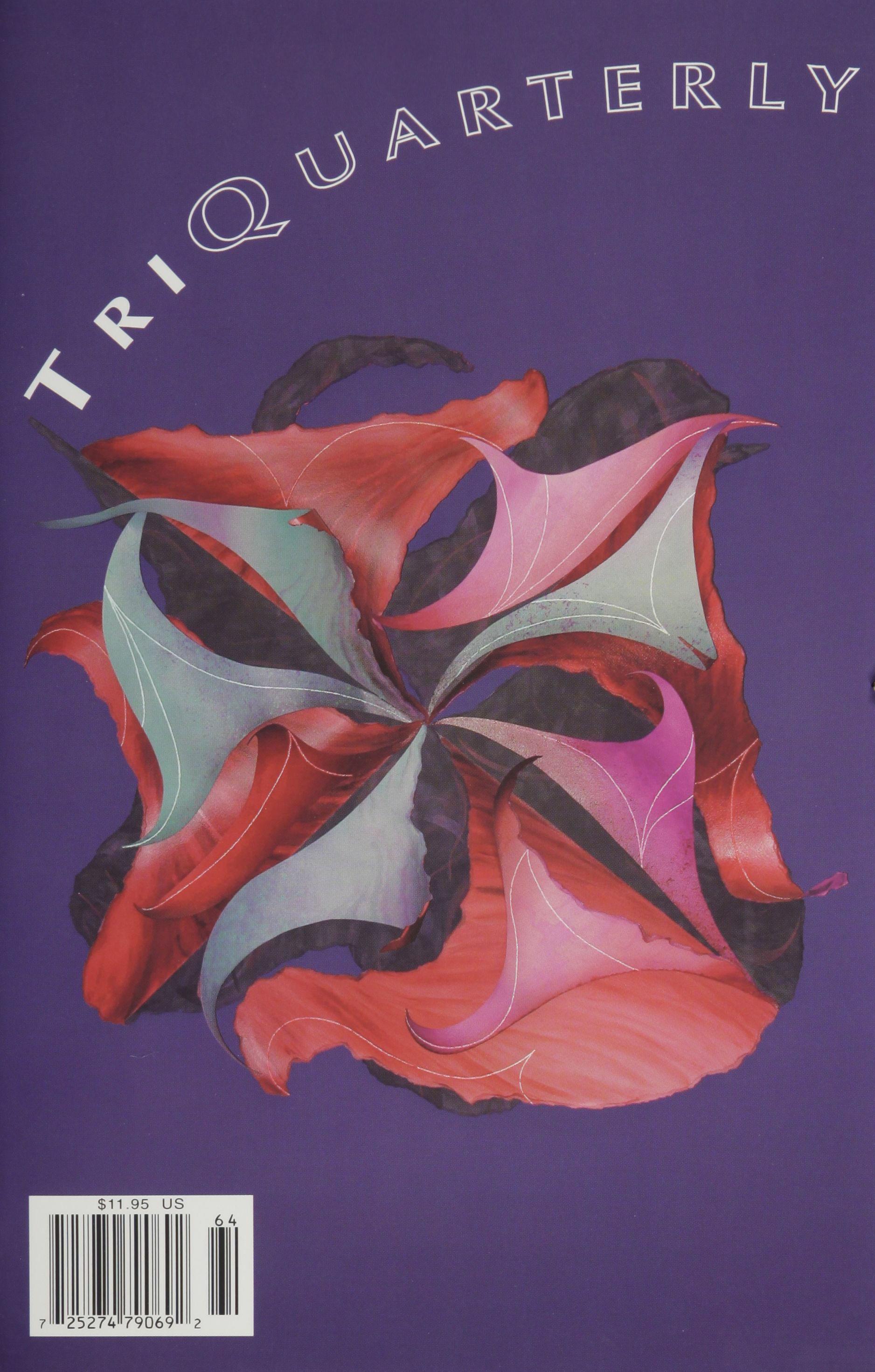


published
TriQuarterly TriQuarterly is an international journal of writing, art and cultural inquiry
at Northwestern University
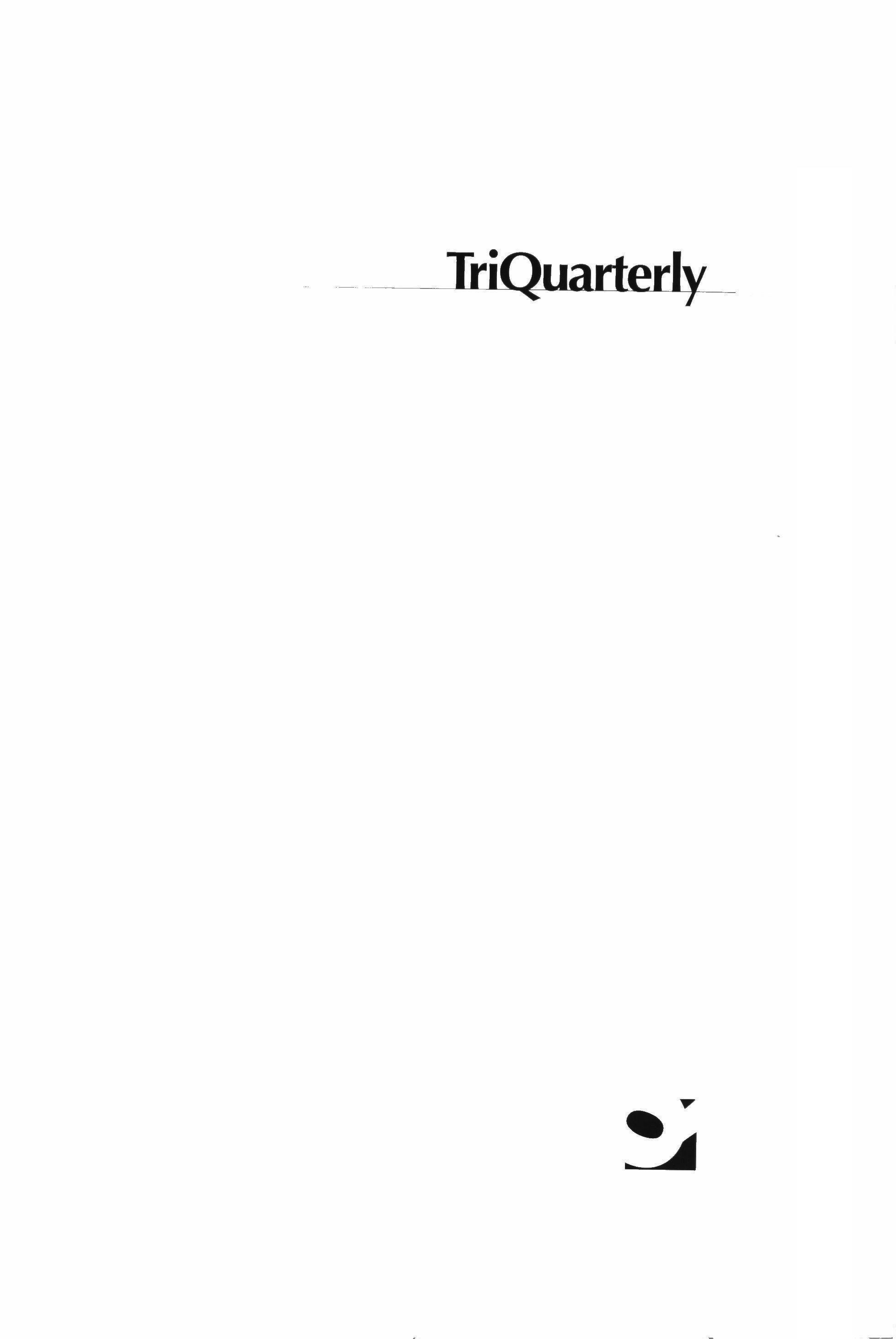
TriQuarterly
Editor
Susan Firestone Hahn
Associate Editor
Ian Morris
Operations Coordinator
Kirstie Felland
Production Manager
Siobhan Drummond
Cover Design
Gini Kondziolka
Editorial Assistant
Samantha Levine
Briget Ganske
Assistant Editor
Sarah Mesle
TriQuarterly Fellow
Joanne Diaz

Contributing Editors
John Barth
Lydia R. Diamond
Rita Dove
Stuart Dybek
Richard Ford
Sandra M. Gilbert
Robert Hass
Edward Hirsch
Li-Young Lee
Lorrie Moore
Alicia Ostriker
Carl Phillips
Robert Pinsky
Susan Stewart
Mark Strand
Alan Williamson
125
 Charles Newman
Charles Newman
Founder of TrrQuarrerlv
as an international journal ofwriting, art, and cultural inquiry
BRILLIANT EDITOR
essays
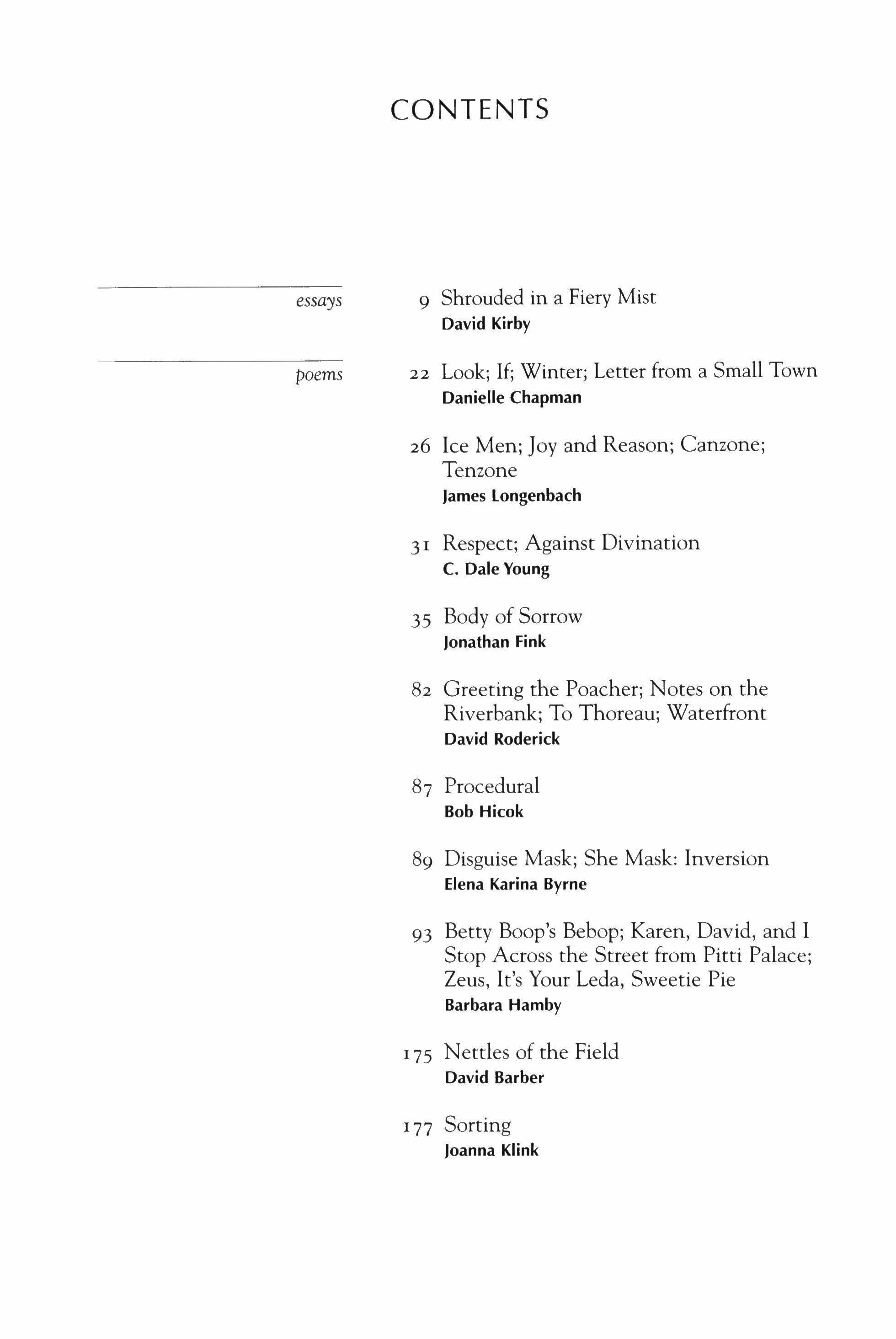
Shrouded in a Fiery Mist
David Kirby
Ice Men; Joy and Reason; Canzone; Tenzone
james longenbach 31 Respect; Against Divination
C. Dale Young
Body of Sorrow
jonathan Fink 82 Greeting the Poacher; Notes on the Riverbank; To Thoreau; Waterfront
David Roderick
Procedural
Bob Hicok
Disguise Mask; She Mask: Inversion
Elena Karina Byrne 93 Betty Boop's Bebop; Karen, David, and I Stop Across the Street from Pitti Palace; Zeus, It's Your Leda, Sweetie Pie
Barbara Hamby 175 Nettles of the Field
David Barber 177 Sorting
joanna Klink
CONTENTS
9
poems 22 Look;
26
If; Winter; Letter from a Small Town Danielle Chapman
35
87
89
Chana Bloch
Garth Greenwell 222 Inspiration (on being asked)
Brian Swann
The Unveiling; What She Knows; Irises; Specks
Harriet J. Melrose
Referral; Ceremony; First Egg; Papaya
Roy Jacobstein
Bruce
237 The Rice Bird; Hunters in the Snow
Ricardo Pau-Llosa
And Nothing Else Matters; Happy

Peter
John
Bruce
Brian
Kathleen
Adam
179 A Life on Earth; The Dead of Night; The Tree in Winter
183 Adoration; Rule
225
229
234
Flag
Bond
241
Neil;
244 The
Johnson
Great Fugue
Balaban fiction 38 The Secret Man
Jay Friedman 44 Train Delayed Due
Horrible, Horrible Accident
to
Booker 72 Together
Lost
We Are
de
96 The
Azevedo
Ice Garden
133 Debts
Moira Crone
and Debtors
Schuitema
translations
151 Mijo
Carolyn Alessio
159 The Stamp Collector
James D. Redwood
185 Life During Peacetime
Jason Brown
195 The Bones of Hagerman
Mitch Wieland
2 I 2 Think, Feel, See Molly Mcquade
170 Pointillism; "Hop, in the curtains, hop on the tabletop "; "I come from far away "; Around and About; "Choose me"
Herman de Coninck
Translated from the Dutch by Laure-Anne Bosselaar and Kurt Brown
248 Contributors
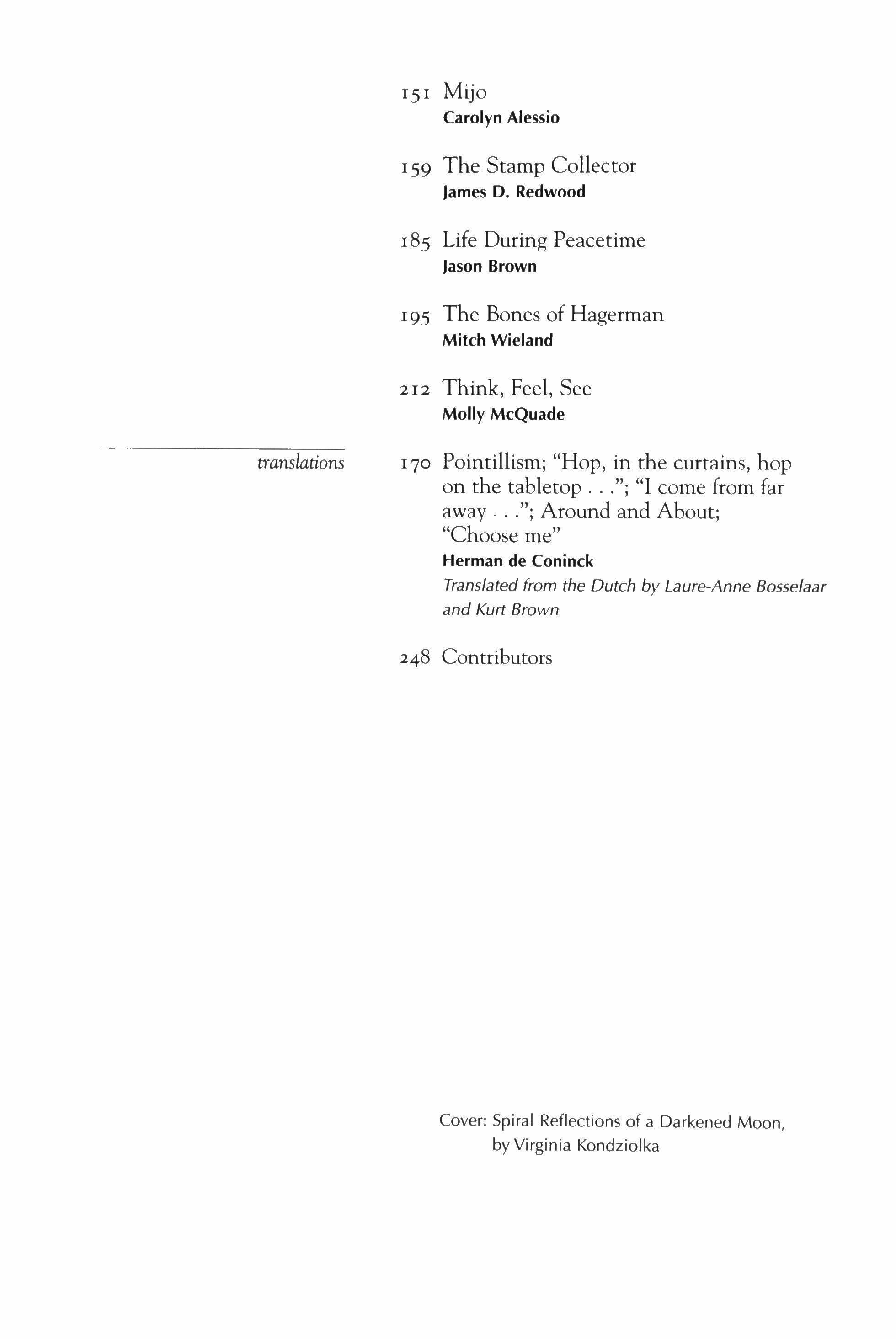
Cover: Spiral Reflections of a Darkened Moon, by Virginia Kondziolka

David Kirby
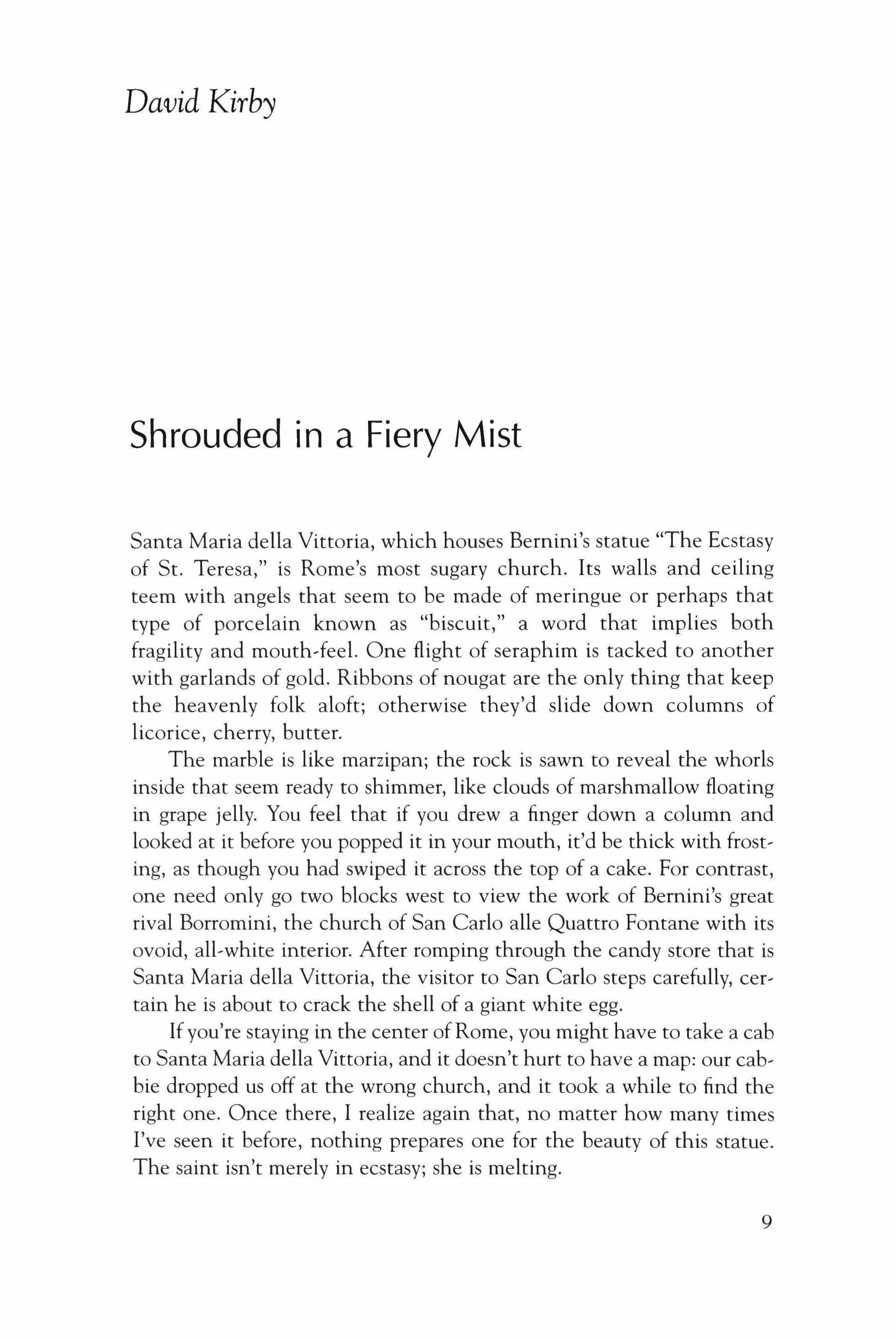
Shrouded ina Fiery Mist
Santa Maria della Vittoria, which houses Bernini's statue "The Ecstasy of St. Teresa," is Rome's most sugary church. Its walls and ceiling teem with angels that seem to be made of meringue or perhaps that type of porcelain known as "biscuit," a word that implies both fragility and mouth-feel. One flight of seraphim is tacked to another with garlands of gold. Ribbons of nougat are the only thing that keep the heavenly folk aloft; otherwise they'd slide down columns of licorice, cherry, butter.
The marble is like marzipan; the rock is sawn to reveal the whorls inside that seem ready to shimmer, like clouds of marshmallow floating in grape jelly. You feel that if you drew a finger down a column and looked at it before you popped it in your mouth, it'd be thick with frosting, as though you had swiped it across the top of a cake. For contrast, one need only go two blocks west to view the work of Bernini's great rival Borromini, the church of San Carlo alle Quattro Fontane with its ovoid, all-white interior. After romping through the candy store that is Santa Maria della Vittoria, the visitor to San Carlo steps carefully, certain he is about to crack the shell of a giant white egg.
Ifyou're staying in the center of Rome, you might have to take a cab to Santa Maria della Vittoria, and it doesn't hurt to have a map: our cabbie dropped us off at the wrong church, and it took a while to find the right one. Once there, I realize again that, no matter how many times I've seen it before, nothing prepares one for the beauty of this statue. The saint isn't merely in ecstasy; she is melting.
9
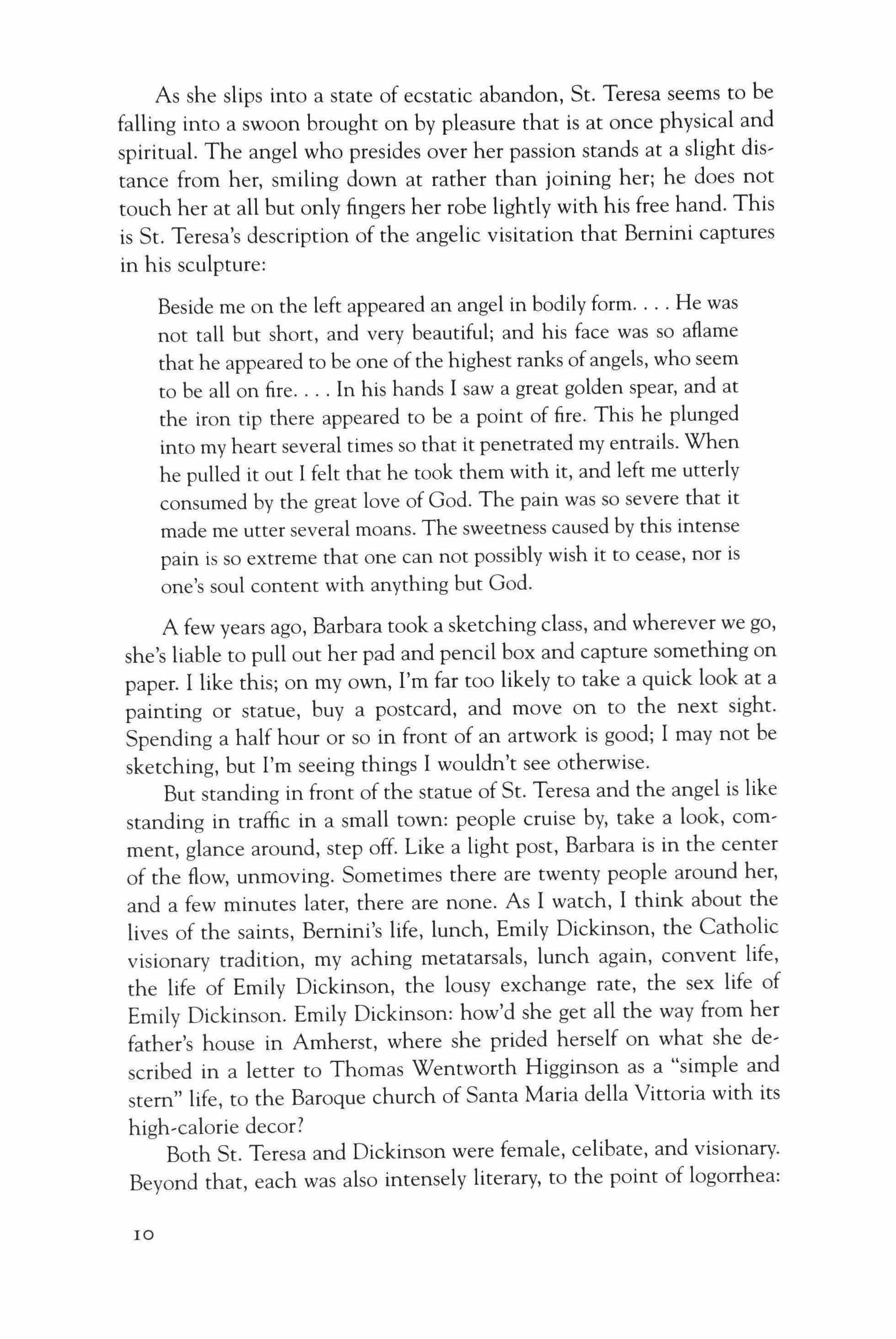
As she slips into a state of ecstatic abandon, St. Teresa seems to be falling into a swoon brought on by pleasure that is at once physical and spiritual. The angel who presides over her passion stands at a slight distance from her, smiling down at rather than joining her; he does not touch her at all but only fingers her robe lightly with his free hand. This is St. Teresa's description of the angelic visitation that Bernini captures in his sculpture:
Beside me on the left appeared an angel in bodily form He was not tall but short, and very beautiful; and his face was so aflame that he appeared to be one of the highest ranks of angels, who seem to be all on fire In his hands I saw a great golden spear, and at the iron tip there appeared to be a point of fire. This he plunged into my heart several times so that it penetrated my entrails. When he pulled it out I felt that he took them with it, and left me utterly consumed by the great love of God. The pain was so severe that it made me utter several moans. The sweetness caused by this intense pain is so extreme that one can not possibly wish it to cease, nor is one's soul content with anything but God.
A few years ago, Barbara took a sketching class, and wherever we go, she's liable to pull out her pad and pencil box and capture something on paper. I like this; on my own, I'm far too likely to take a quick look at a painting or statue, buy a postcard, and move on to the next sight. Spending a half hour or so in front of an artwork is good; I may not be sketching, but I'm seeing things I wouldn't see otherwise.
But standing in front of the statue of St. Teresa and the angel is like standing in traffic in a small town: people cruise by, take a look, comment, glance around, step off. Like a light post, Barbara is in the center of the flow, unmoving. Sometimes there are twenty people around her, and a few minutes later, there are none. As I watch, I think about the lives of the saints, Bernini's life, lunch, Emily Dickinson, the Catholic visionary tradition, my aching metatarsals, lunch again, convent life, the life of Emily Dickinson, the lousy exchange rate, the sex life of Emily Dickinson. Emily Dickinson: how'd she get all the way from her father's house in Amherst, where she prided herself on what she described in a letter to Thomas Wentworth Higginson as a "simple and stern" life, to the Baroque church of Santa Maria della Vittoria with its high-calorie decor?
Both St. Teresa and Dickinson were female, celibate, and visionary.
Beyond that, each was also intensely literary, to the point of logorrhea:
10
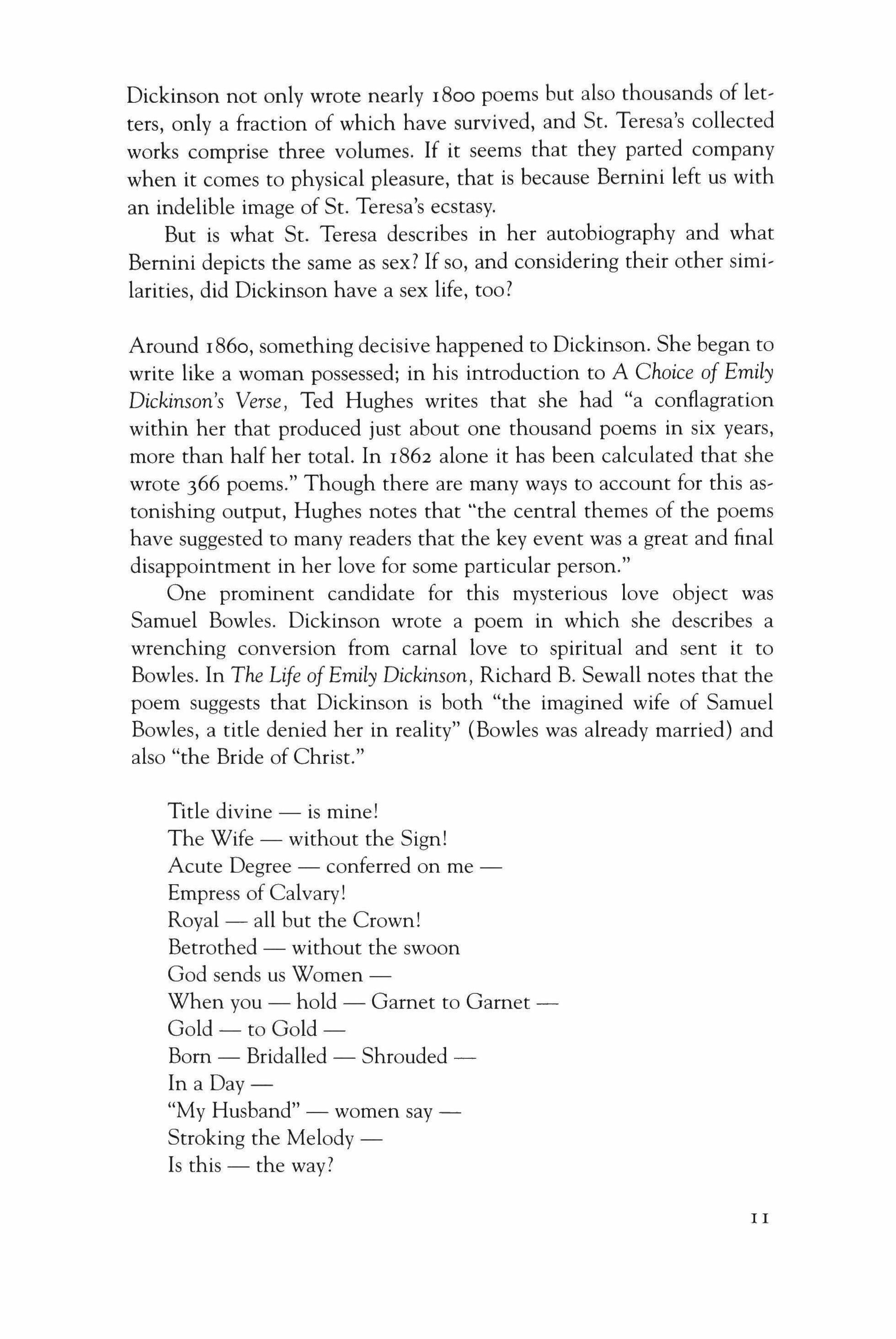
Dickinson not only wrote nearly 1800 poems but also thousands of letters, only a fraction of which have survived, and St. Teresa's collected works comprise three volumes. If it seems that they parted company when it comes to physical pleasure, that is because Bernini left us with an indelible image of St. Teresa's ecstasy.
But is what St. Teresa describes in her autobiography and what Bernini depicts the same as sex? If so, and considering their other similarities, did Dickinson have a sex life, too?
Around 1860, something decisive happened to Dickinson. She began to write like a woman possessed; in his introduction to A Choice of Emily Dickinson's Verse, Ted Hughes writes that she had "a conflagration within her that produced just about one thousand poems in six years, more than half her total. In 1862 alone it has been calculated that she wrote 366 poems." Though there are many ways to account for this astonishing output, Hughes notes that "the central themes of the poems have suggested to many readers that the key event was a great and final disappointment in her love for some particular person."
One prominent candidate for this mysterious love object was Samuel Bowles. Dickinson wrote a poem in which she describes a wrenching conversion from carnal love to spiritual and sent it to Bowles. In The Life ofEmily Dickinson, Richard B. Sewall notes that the poem suggests that Dickinson is both "the imagined wife of Samuel Bowles, a title denied her in reality" (Bowles was already married) and also "the Bride of Christ."
Title divine - is mine!
The Wife - without the Sign!
Acute Degree - conferred on meEmpress of Calvary!
Royal- all but the Crown!
Betrothed - without the swoon
God sends us Women -
When you - hold - Garnet to GarnetGold - to Gold -
Born - Bridalled - Shrouded -
In a Day"My Husband" - women say -
Stroking the MelodyIs this - the way?
II
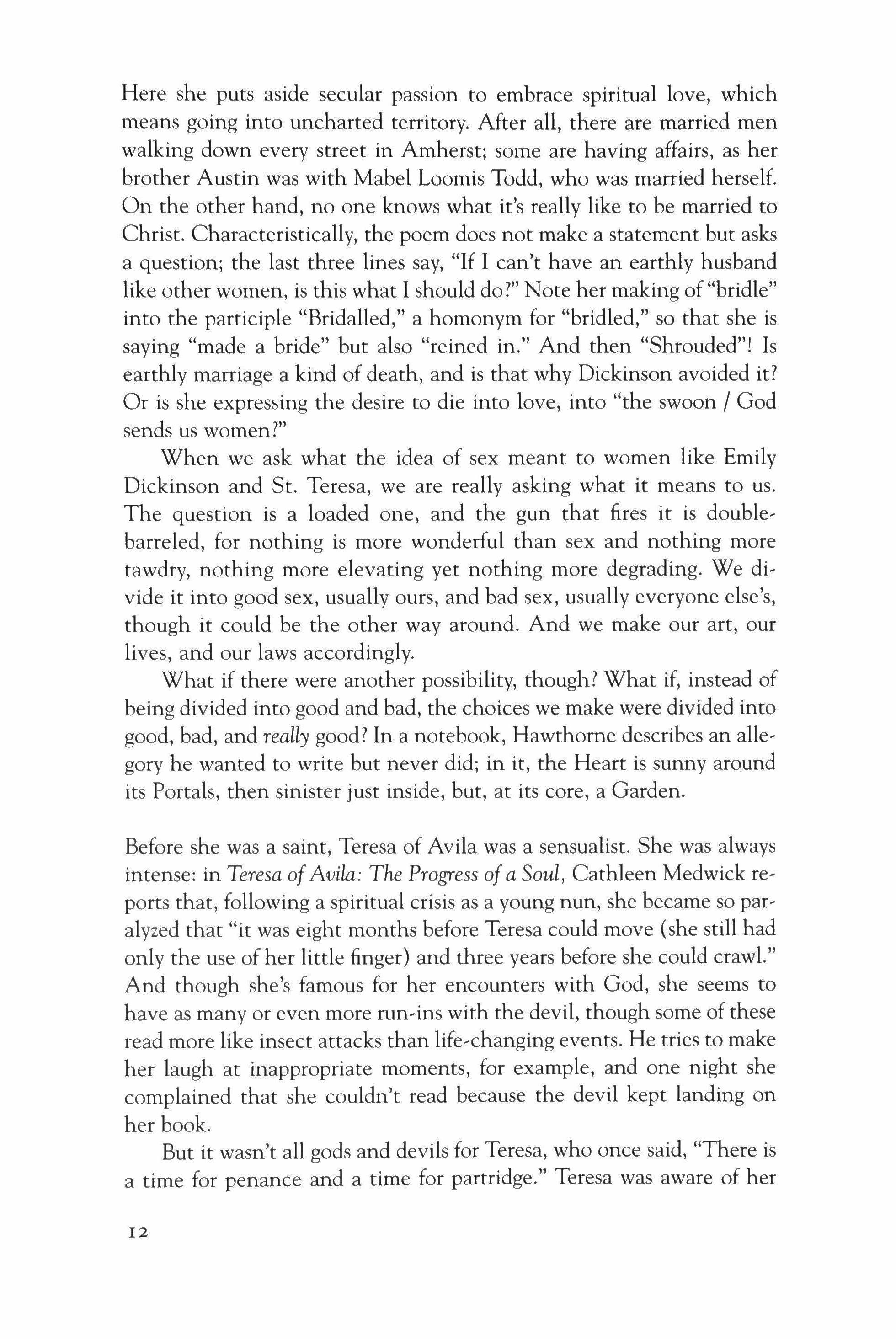
Here she puts aside secular passion to embrace spiritual love, which means going into uncharted territory. After all, there are married men walking down every street in Amherst; some are having affairs, as her brother Austin was with Mabel Loomis Todd, who was married herself. On the other hand, no one knows what it's really like to be married to Christ. Characteristically, the poem does not make a statement but asks a question; the last three lines say, "If I can't have an earthly husband like other women, is this what I should do?" Note her making of "bridle" into the participle "Bridalled," a homonym for "bridled," so that she is saying "made a bride" but also "reined in." And then "Shrouded"! Is earthly marriage a kind of death, and is that why Dickinson avoided it? Or is she expressing the desire to die into love, into "the swoon / God sends us women?"
When we ask what the idea of sex meant to women like Emily Dickinson and St. Teresa, we are really asking what it means to us. The question is a loaded one, and the gun that fires it is doublebarreled, for nothing is more wonderful than sex and nothing more tawdry, nothing more elevating yet nothing more degrading. We divide it into good sex, usually ours, and bad sex, usually everyone else's, though it could be the other way around. And we make our art, our lives, and our laws accordingly.
What if there were another possibility, though? What if, instead of being divided into good and bad, the choices we make were divided into good, bad, and really good? In a notebook, Hawthorne describes an allegory he wanted to write but never did; in it, the Heart is sunny around its Portals, then sinister just inside, but, at its core, a Garden.
Before she was a saint, Teresa of Avila was a sensualist. She was always intense: in Teresa ofAvila: The Progress of a Soul, Cathleen Medwick reports that, following a spiritual crisis as a young nun, she became so paralyzed that "it was eight months before Teresa could move (she still had only the use of her little finger) and three years before she could crawl." And though she's famous for her encounters with God, she seems to have as many or even more run-ins with the devil, though some of these read more like insect attacks than life-changing events. He tries to make her laugh at inappropriate moments, for example, and one night she complained that she couldn't read because the devil kept landing on her book.
But it wasn't all gods and devils for Teresa, who once said, "There is a time for penance and a time for partridge." Teresa was aware of her
12
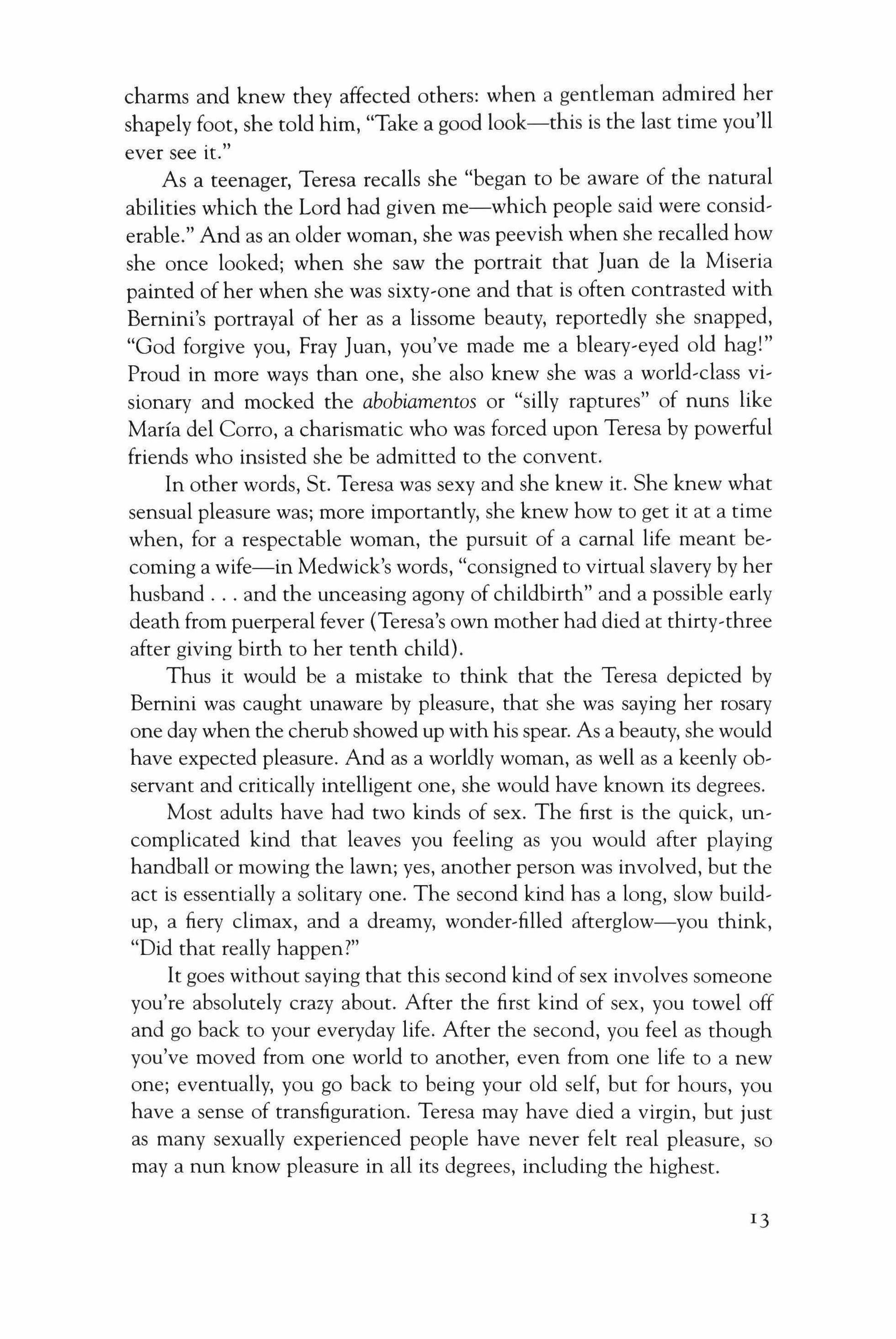
charms and knew they affected others: when a gentleman admired her shapely foot, she told him, "Take a good look-this is the last time you'll ever see it."
As a teenager, Teresa recalls she "began to be aware of the natural abilities which the Lord had given me-which people said were considerable." And as an older woman, she was peevish when she recalled how she once looked; when she saw the portrait that Juan de la Miseria painted of her when she was sixty-one and that is often contrasted with Bernini's portrayal of her as a lissome beauty, reportedly she snapped, "God forgive you, Fray Juan, you've made me a bleary-eyed old hag!"
Proud in more ways than one, she also knew she was a world-class visionary and mocked the abobiamentos or "silly raptures" of nuns like Marfa del Corro, a charismatic who was forced upon Teresa by powerful friends who insisted she be admitted to the convent.
In other words, St. Teresa was sexy and she knew it. She knew what sensual pleasure was; more importantly, she knew how to get it at a time when, for a respectable woman, the pursuit of a carnal life meant becoming a wife-in Medwick's words, "consigned to virtual slavery by her husband and the unceasing agony of childbirth" and a possible early death from puerperal fever (Teresa's own mother had died at thirty-three after giving birth to her tenth child).
Thus it would be a mistake to think that the Teresa depicted by Bernini was caught unaware by pleasure, that she was saying her rosary one day when the cherub showed up with his spear. As a beauty, she would have expected pleasure. And as a worldly woman, as well as a keenly observant and critically intelligent one, she would have known its degrees.
Most adults have had two kinds of sex. The first is the quick, uncomplicated kind that leaves you feeling as you would after playing handball or mowing the lawn; yes, another person was involved, but the act is essentially a solitary one. The second kind has a long, slow buildup, a fiery climax, and a dreamy, wonder-filled afterglow-you think, "Did that really happen?"
It goes without saying that this second kind of sex involves someone you're absolutely crazy about. After the first kind of sex, you towel off and go back to your everyday life. After the second, you feel as though you've moved from one world to another, even from one life to a new one; eventually, you go back to being your old self, but for hours, you have a sense of transfiguration. Teresa may have died a virgin, but just as many sexually experienced people have never felt real pleasure, so maya nun know pleasure in all its degrees, including the highest.
13
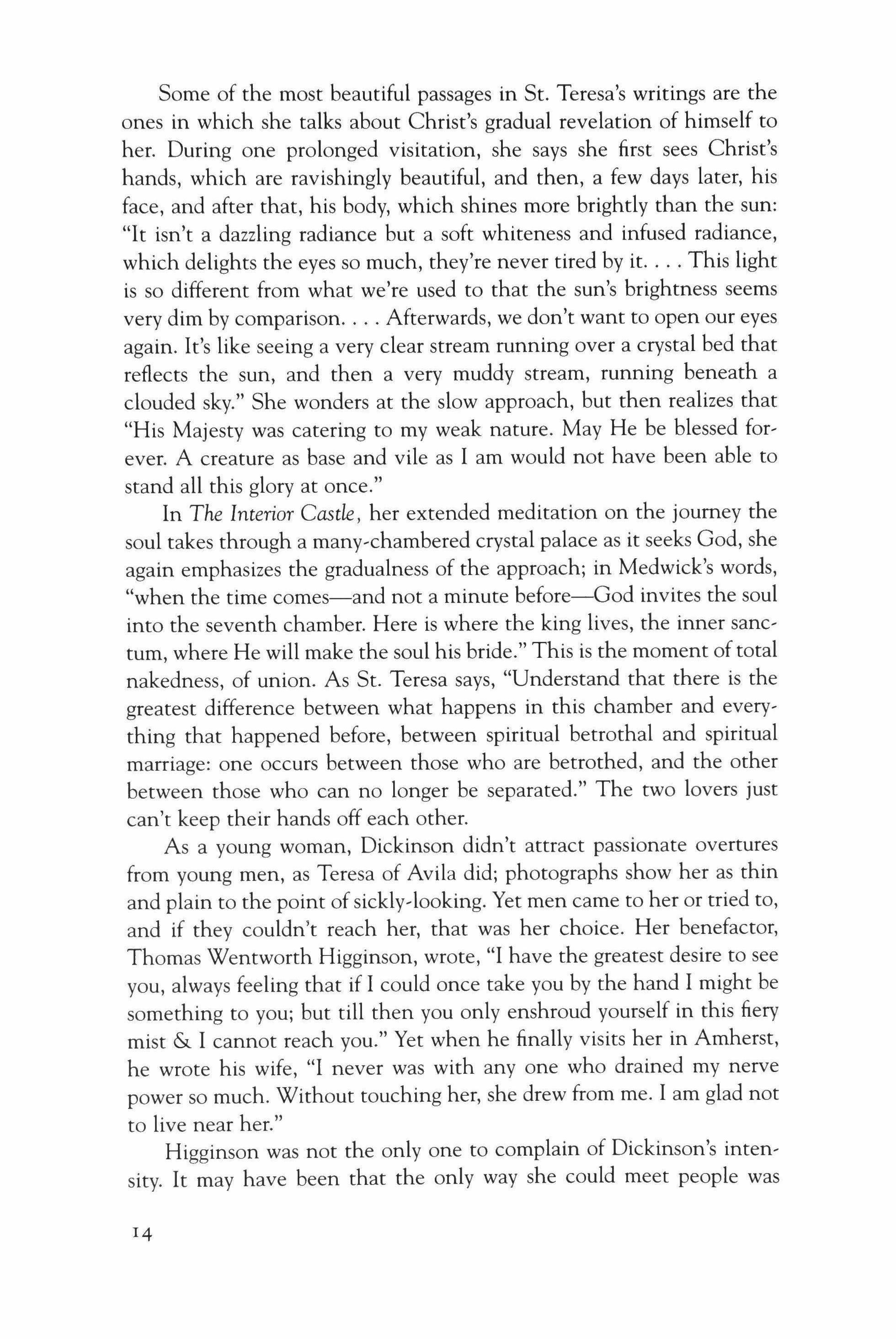
Some of the most beautiful passages in St. Teresa's writings are the ones in which she talks about Christ's gradual revelation of himself to her. During one prolonged visitation, she says she first sees Christ's hands, which are ravishinglv beautiful, and then, a few days later, his face, and after that, his body, which shines more brightly than the sun: "It isn't a dazzling radiance but a soft whiteness and infused radiance, which delights the eyes so much, they're never tired by it This light is so different from what we're used to that the sun's brightness seems very dim by comparison Afterwards, we don't want to open our eyes again. It's like seeing a very clear stream running over a crystal bed that reflects the sun, and then a very muddy stream, running beneath a clouded sky." She wonders at the slow approach, but then realizes that "His Majesty was catering to my weak nature. May He be blessed forever. A creature as base and vile as I am would not have been able to stand all this glory at once."
In The Interior Castle, her extended meditation on the journey the soul takes through a many-chambered crystal palace as it seeks God, she again emphasizes the gradualness of the approach; in Medwick's words, "when the time comes-and not a minute before-God invites the soul into the seventh chamber. Here is where the king lives, the inner sanctum, where He will make the soul his bride." This is the moment oftotal nakedness, of union. As St. Teresa says, "Understand that there is the greatest difference between what happens in this chamber and everything that happened before, between spiritual betrothal and spiritual marriage: one occurs between those who are betrothed, and the other between those who can no longer be separated." The two lovers just can't keep their hands off each other.
As a young woman, Dickinson didn't attract passionate overtures from young men, as Teresa of Avila did; photographs show her as thin and plain to the point ofsickly-looking. Yet men came to her or tried to, and if they couldn't reach her, that was her choice. Her benefactor, Thomas Wentworth Higginson, wrote, "I have the greatest desire to see you, always feeling that if I could once take you by the hand I might be something to you; but till then you only enshroud yourself in this fiery mist & I cannot reach you." Yet when he finally visits her in Amherst, he wrote his wife, "I never was with anyone who drained my nerve power so much. Without touching her, she drew from me. I am glad not to live near her."
Higginson was not the only one to complain of Dickinson's intensity. It may have been that the only way she could meet people was
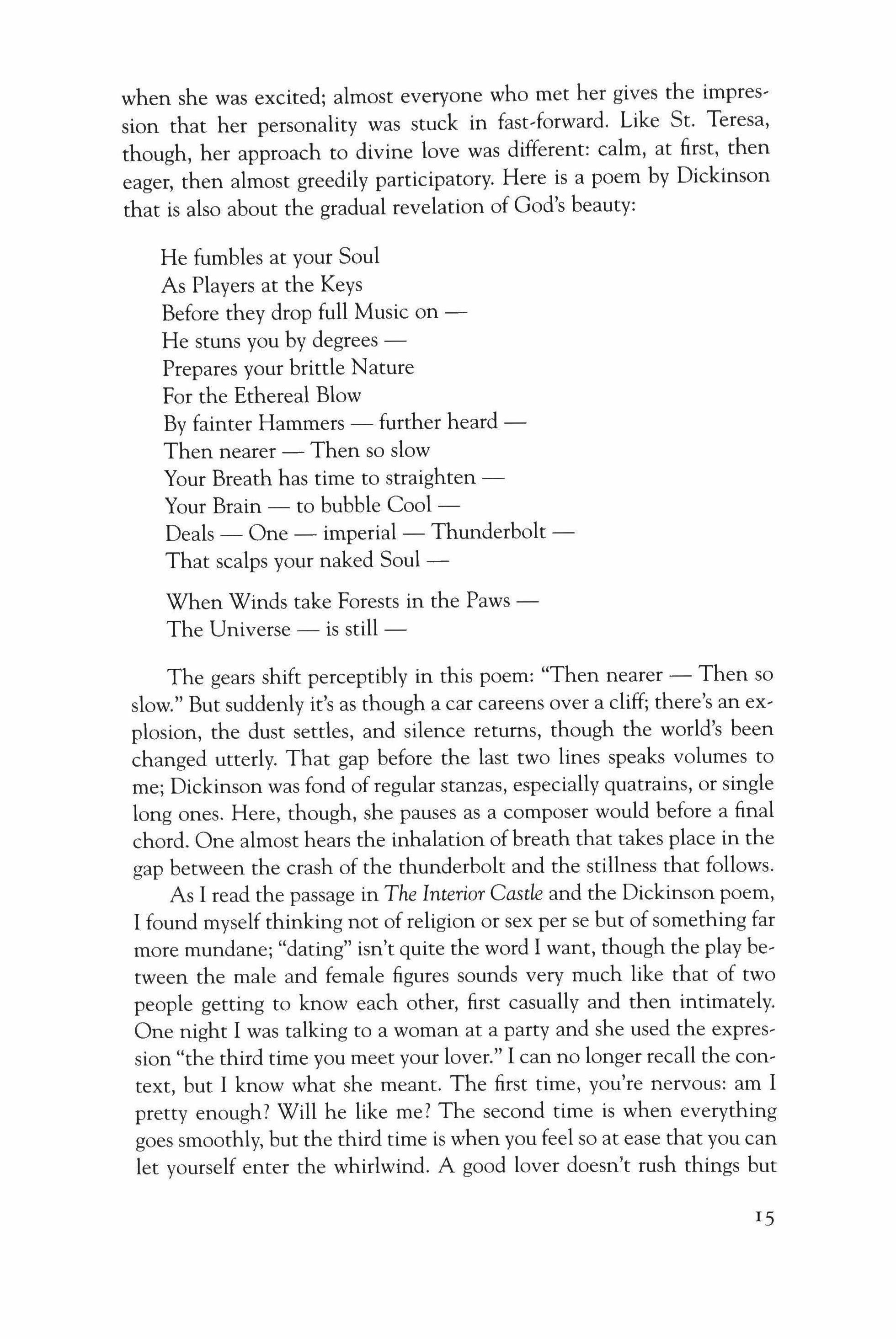
when she was excited; almost everyone who met her gives the impression that her personality was stuck in fast-forward. Like St. Teresa, though, her approach to divine love was different: calm, at first, then eager, then almost greedily participatory. Here is a poem by Dickinson that is also about the gradual revelation of God's beauty:
He fumbles at your Soul
As Players at the Keys
Before they drop full Music onHe stuns you by degreesPrepares your brittle Nature
For the Ethereal Blow
By fainter Hammers - further heard -
Then nearer - Then so slow
Your Breath has time to straightenYour Brain - to bubble CoolDeals - One - imperial - Thunderbolt -
That scalps your naked Soul -
When Winds take Forests in the PawsThe Universe - is still -
The gears shift perceptibly in this poem: "Then nearer - Then so slow." But suddenly it's as though a car careens over a cliff; there's an explosion, the dust settles, and silence returns, though the world's been changed utterly. That gap before the last two lines speaks volumes to me; Dickinson was fond of regular stanzas, especially quatrains, or single long ones. Here, though, she pauses as a composer would before a final chord. One almost hears the inhalation of breath that takes place in the gap between the crash of the thunderbolt and the stillness that follows.
As I read the passage in The Interior Castle and the Dickinson poem, I found myself thinking not of religion or sex per se but of something far more mundane; "dating" isn't quite the word I want, though the play between the male and female figures sounds very much like that of two people getting to know each other, first casually and then intimately. One night I was talking to a woman at a party and she used the expression "the third time you meet your lover." I can no longer recall the context, but I know what she meant. The first time, you're nervous: am I pretty enough? Will he like me? The second time is when everything goes smoothly, but the third time is when you feel so at ease that you can let yourself enter the whirlwind. A good lover doesn't rush things but IS
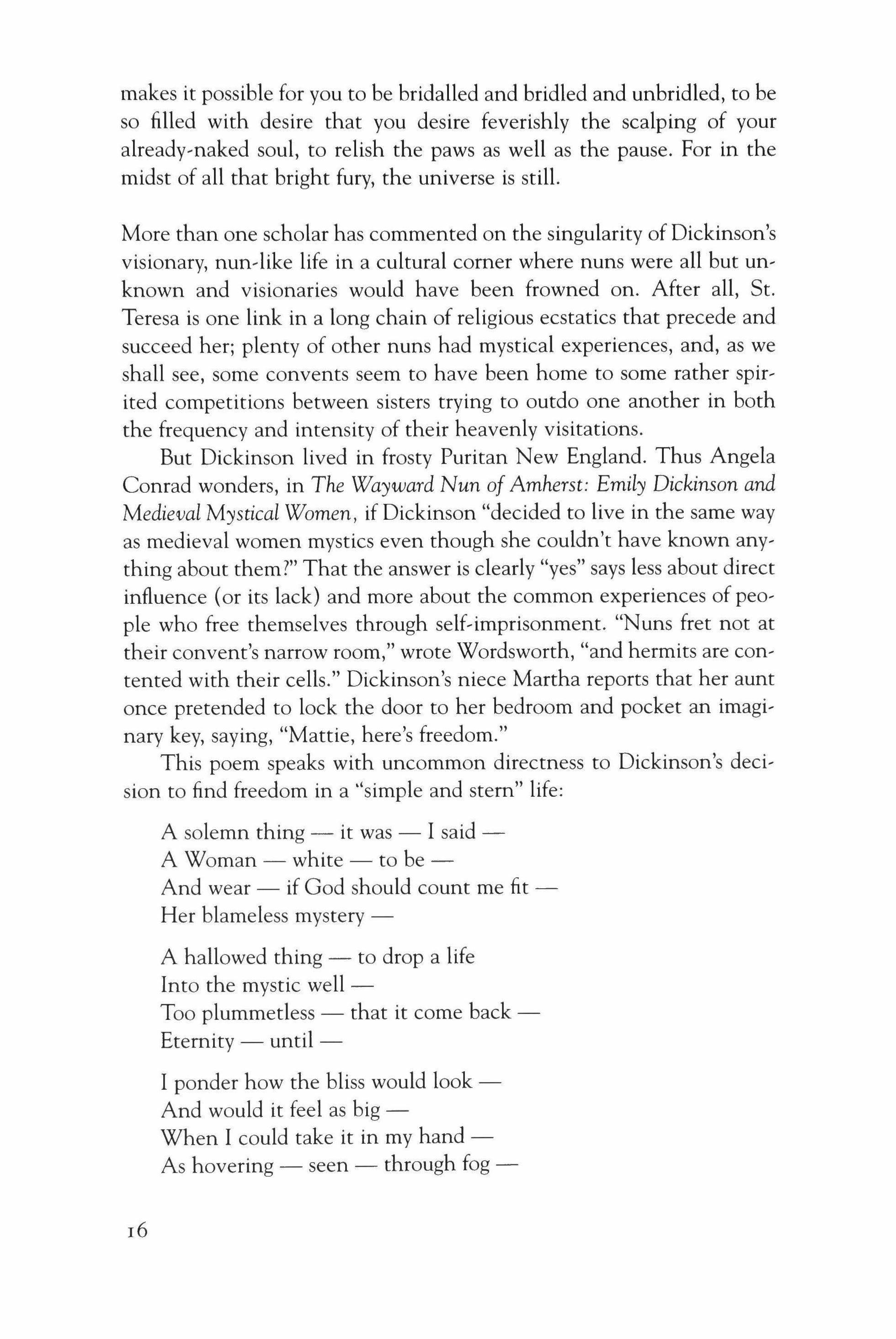
makes it possible for you to be bridalled and bridled and unbridled, to be so filled with desire that you desire feverishly the scalping of your already-naked soul, to relish the paws as well as the pause. For in the midst of all that bright fury, the universe is still.
More than one scholar has commented on the singularity of Dickinson's visionary, nun-like life in a cultural comer where nuns were all but unknown and visionaries would have been frowned on. After all, St. Teresa is one link in a long chain of religious ecstatics that precede and succeed her; plenty of other nuns had mystical experiences, and, as we shall see, some convents seem to have been home to some rather spirited competitions between sisters trying to outdo one another in both the frequency and intensity of their heavenly visitations.
But Dickinson lived in frosty Puritan New England. Thus Angela Conrad wonders, in The Wayward Nun of Amherst: Emily Dickinson and Medieval Mystical Women, if Dickinson "decided to live in the same way as medieval women mystics even though she couldn't have known anything about them?" That the answer is clearly "yes" says less about direct influence (or its lack) and more about the common experiences of people who free themselves through self-imprisonment. "Nuns fret not at their convent's narrow room," wrote Wordsworth, "and hermits are contented with their cells." Dickinson's niece Martha reports that her aunt once pretended to lock the door to her bedroom and pocket an imaginary key, saying, "Mattie, here's freedom."
This poem speaks with uncommon directness to Dickinson's decision to find freedom in a "simple and stem" life:
A solemn thing - it was - I said -
A Woman - white - to be -
And wear - if God should count me fitHer blameless mystery -
A hallowed thing - to drop a life
Into the mystic wellToo plummetless - that it come backEternity - until -
I ponder how the bliss would lookAnd would it feel as bigWhen I could take it in my hand -
As hovering - seen - through fog -
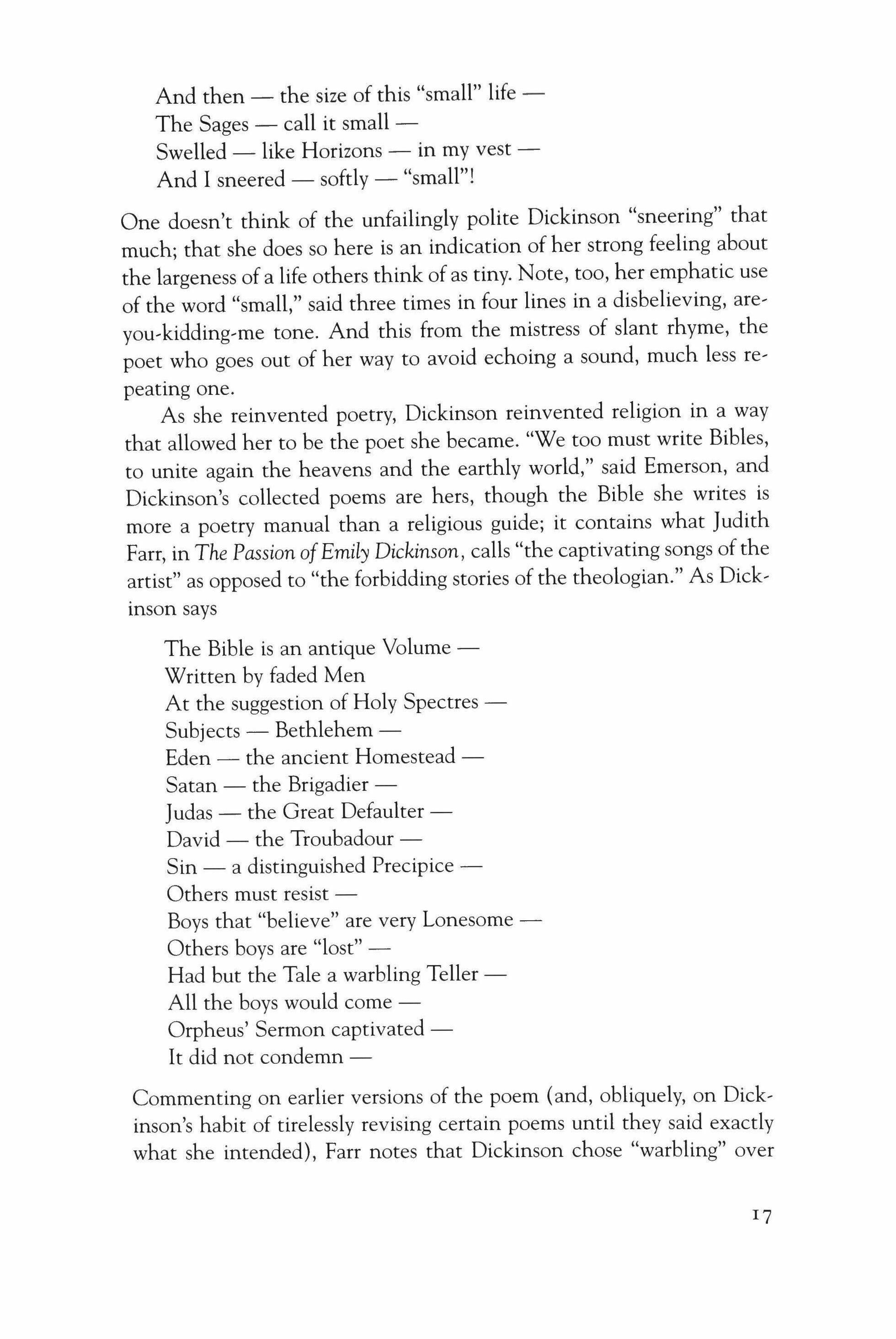
And then - the size of this "small" life -
The Sages - call it small -
Swelled - like Horizons - in my vest -
And I sneered - softly - "small"!
One doesn't think of the unfailingly polite Dickinson "sneering" that much; that she does so here is an indication of her strong feeling about the largeness of a life others think of as tiny. Note, too, her emphatic use of the word "small," said three times in four lines in a disbelieving, areyou-kidding-me tone. And this from the mistress of slant rhyme, the poet who goes out of her way to avoid echoing a sound, much less repeating one.
As she reinvented poetry, Dickinson reinvented religion in a way that allowed her to be the poet she became. "We too must write Bibles, to unite again the heavens and the earthly world," said Emerson, and Dickinson's collected poems are hers, though the Bible she writes is more a poetry manual than a religious guide; it contains what Judith Farr, in The Passion ofEmily Dickinson, calls "the captivating songs of the artist" as opposed to "the forbidding stories of the theologian." As Dickinson says
The Bible is an antique Volume -
Written by faded Men
At the suggestion of Holy Spectres -
Subjects - Bethlehem-
Eden - the ancient Homestead -
Satan - the Brigadier -
Judas - the Great Defaulter
David - the Troubadour -
Sin - a distinguished Precipice -
Others must resist -
Boys that "believe" are very Lonesome -
Others boys are "lost" -
Had but the Tale a warbling Teller -
All the boys would come -
Orpheus' Sermon captivated -
It did not condemn -
Commenting on earlier versions of the poem (and, obliquely, on Dickinson's habit of tirelessly revising certain poems until they said exactly what she intended), Farr notes that Dickinson chose "warbling" over

thirteen other adjectives: "typic," "thrilling," "hearty," "bonnie," "breathless," "spacious," "tropic," "ardent," "friendly," "magic," "pun' gent," "winning,"and "mellow." To Farr, each of these suggests "the humanity {and hence the beauty, energy, sympathy} of art by comparison with the strictures of Scripture." With all these choices, why choose "warbling,"then? Beyond the basic writing,workshop truism that a word with sense appeal is always better than an abstraction, only an auditory image can, to use Emerson's phrase, unite the heavens and the earthly world-or, in terms of the Orpheus myth, the afterlife and this one. The Bible's horizons are limited, in Dickinson's view; traditional scripture belongs to "faded Men" and their "Lonesome" adherents. But a song is heard by everyone.
What makes Dickinson and St. Teresa especially interesting cases is how free they were to do other than what they did; after all, there's no free, dom in practicing the only thing you can do. Just as Teresa could have cast her lot with the galllants of Avila who pursued her, so white' habited Emily, who meets the world as a virgin, had opportunities for earthly love. Even late in life: she had a second chance in 1882, when, apparently, Judge Otis Phillips Lord asked her to marry him. Dickinson seems to have genuinely loved Lord, and her letters to him are tender and affectionate, but she turned him down.
This decision made at least one person happy: his niece, Abby Far, ley, who stood to gain a good deal if Lord remained single, since he was wealthy and had no children. One measure of success in life is the envy we inspire in others, and Farley was bitterly jealous of Dickinson. Long after the poet's death, Farley denounced thus: "Little hussv=-didn't I know her? I should say I did. Loose morals. She was crazy about men. Even tried to get Judge Lord. Insane, too."
St. Teresa, too, inspired jealousy in her enemies. Her passionate nature was used against her by such rivals as Marfa del Corro, who brought the Inquisition to the convent when she charged that Teresa had had numerous lovers; that one of them liked to dance naked in front of the other nuns; and that at least one other nun, Isabel de San Jeronimo, a favorite of Teresa's, had had sex with devils. Though they stayed many days, the inquisitors decided that the 61 -year-old Teresa was behaving herself, that the other nuns had not been corrupted, and that Isabel de San Jeronimo was, at worst, slightly unbalanced.
As she aged, Teresa's ecstasies ceased, which allowed her to devote more time to the serious business of church reform. At the very end,
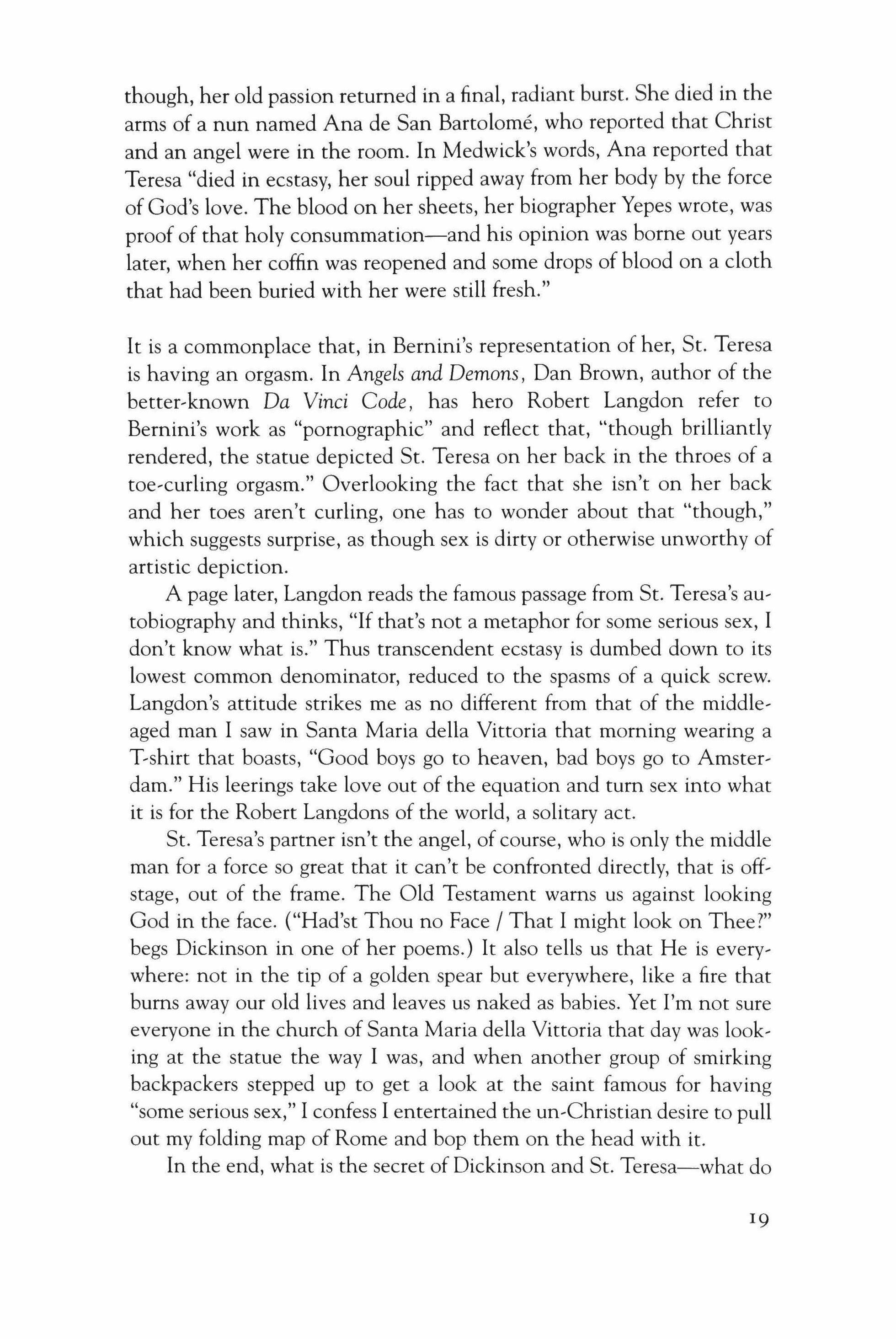
though, her old passion returned in a final, radiant burst. She died in the arms of a nun named Ana de San Bartolome, who reported that Christ and an angel were in the room. In Medwick's words, Ana reported that Teresa "died in ecstasy, her soul ripped away from her body by the force of God's love. The blood on her sheets, her biographer Yepes wrote, was proof of that holy consummation-and his opinion was borne out years later, when her coffin was reopened and some drops of blood on a cloth that had been buried with her were still fresh."
It is a commonplace that, in Bernini's representation of her, St. Teresa is having an orgasm. In Angels and Demons, Dan Brown, author of the better-known Da Vinci Code, has hero Robert Langdon refer to Bernini's work as "pornographic" and reflect that, "though brilliantly rendered, the statue depicted St. Teresa on her back in the throes of a toe-curling orgasm." Overlooking the fact that she isn't on her back and her toes aren't curling, one has to wonder about that "though," which suggests surprise, as though sex is dirty or otherwise unworthy of artistic depiction.
A page later, Langdon reads the famous passage from St. Teresa's autobiography and thinks, "If that's not a metaphor for some serious sex, I don't know what is." Thus transcendent ecstasy is dumbed down to its lowest common denominator, reduced to the spasms of a quick screw. Langdon's attitude strikes me as no different from that of the middleaged man I saw in Santa Maria della Vittoria that morning wearing a T-shirt that boasts, "Good boys go to heaven, bad boys go to Amsterdam." His leerings take love out of the equation and tum sex into what it is for the Robert Langdons of the world, a solitary act.
St. Teresa's partner isn't the angel, of course, who is only the middle man for a force so great that it can't be confronted directly, that is offstage, out of the frame. The Old Testament warns us against looking God in the face. ("Had'st Thou no Face / That I might look on Thee?" begs Dickinson in one of her poems.) It also tells us that He is everywhere: not in the tip of a golden spear but everywhere, like a fire that bums away our old lives and leaves us naked as babies. Yet I'm not sure everyone in the church of Santa Maria della Vittoria that day was looking at the statue the way I was, and when another group of smirking backpackers stepped up to get a look at the saint famous for having "some serious sex," I confess I entertained the un-Christian desire to pull out my folding map of Rome and bop them on the head with it.
In the end, what is the secret of Dickinson and St. Teresa-what do
19
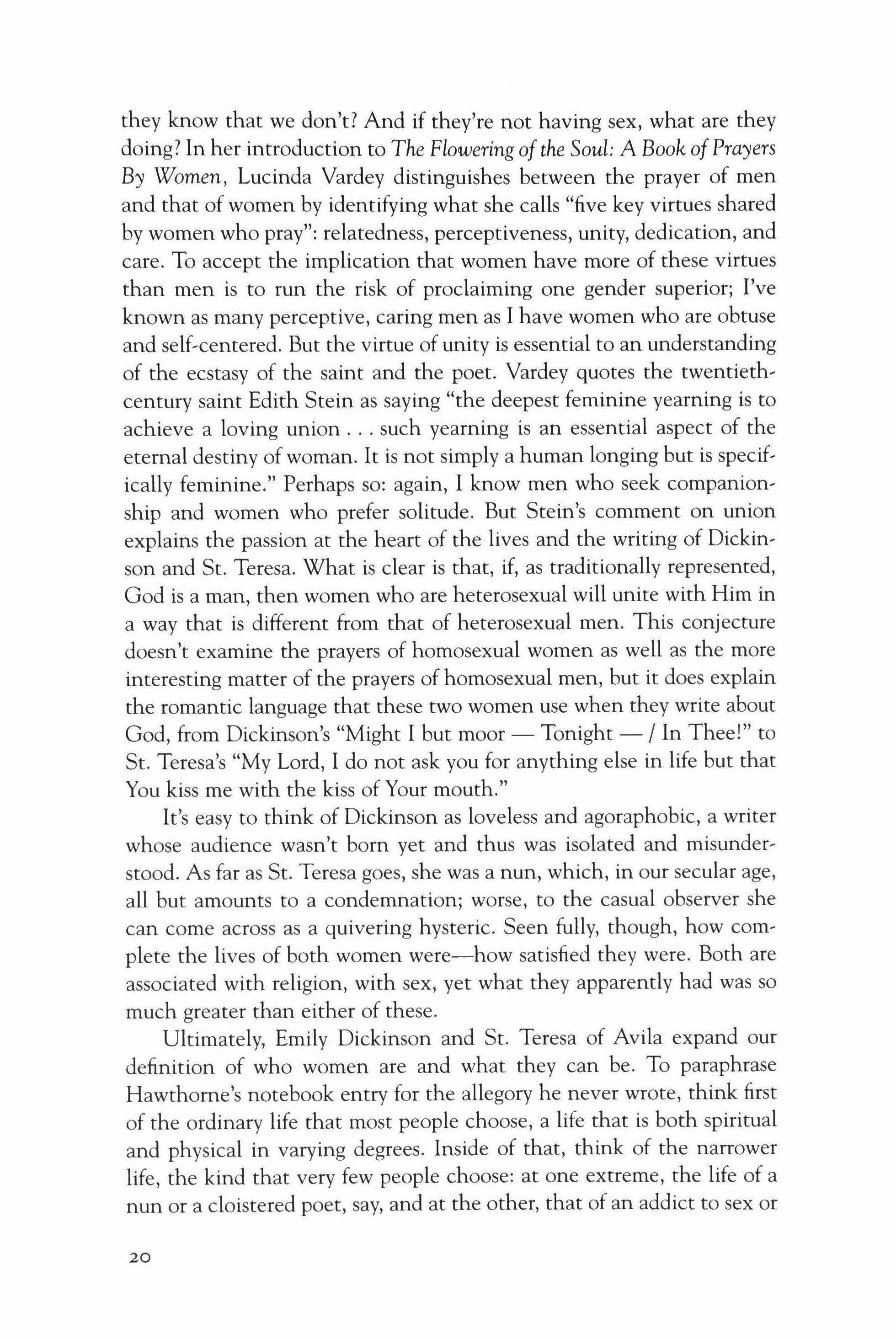
they know that we don't? And if they're not having sex, what are they doing? In her introduction to The Flowering of the Soul: A Book ofPrayers By Women, Lucinda Vardey distinguishes between the prayer of men and that of women by identifying what she calls "five key virtues shared by women who pray": relatedness, perceptiveness, unity, dedication, and care. To accept the implication that women have more of these virtues than men is to run the risk of proclaiming one gender superior; I've known as many perceptive, caring men as I have women who are obtuse and self-centered. But the virtue of unity is essential to an understanding of the ecstasy of the saint and the poet. Vardey quotes the twentiethcentury saint Edith Stein as saying "the deepest feminine yearning is to achieve a loving union such yearning is an essential aspect of the eternal destiny of woman. It is not simply a human longing but is specifically feminine." Perhaps so: again, I know men who seek companionship and women who prefer solitude. But Stein's comment on union explains the passion at the heart of the lives and the writing of Dickinson and St. Teresa. What is clear is that, if, as traditionally represented, God is a man, then women who are heterosexual will unite with Him in a way that is different from that of heterosexual men. This conjecture doesn't examine the prayers of homosexual women as well as the more interesting matter of the prayers of homosexual men, but it does explain the romantic language that these two women use when they write about God, from Dickinson's "Might I but moor - Tonight - / In Thee!" to St. Teresa's "My Lord, I do not ask you for anything else in life but that You kiss me with the kiss of Your mouth."
It's easy to think of Dickinson as loveless and agoraphobic, a writer whose audience wasn't born yet and thus was isolated and misunderstood. As far as St. Teresa goes, she was a nun, which, in our secular age, all but amounts to a condemnation; worse, to the casual observer she can come across as a quivering hysteric. Seen fully, though, how complete the lives of both women were-how satisfied they were. Both are associated with religion, with sex, yet what they apparently had was so much greater than either of these.
Ultimately, Emily Dickinson and St. Teresa of Avila expand our definition of who women are and what they can be. To paraphrase Hawthorne's notebook entry for the allegory he never wrote, think first of the ordinary life that most people choose, a life that is both spiritual and physical in varying degrees. Inside of that, think of the narrower life, the kind that very few people choose: at one extreme, the life of a nun or a cloistered poet, say, and at the other, that of an addict to sex or
20
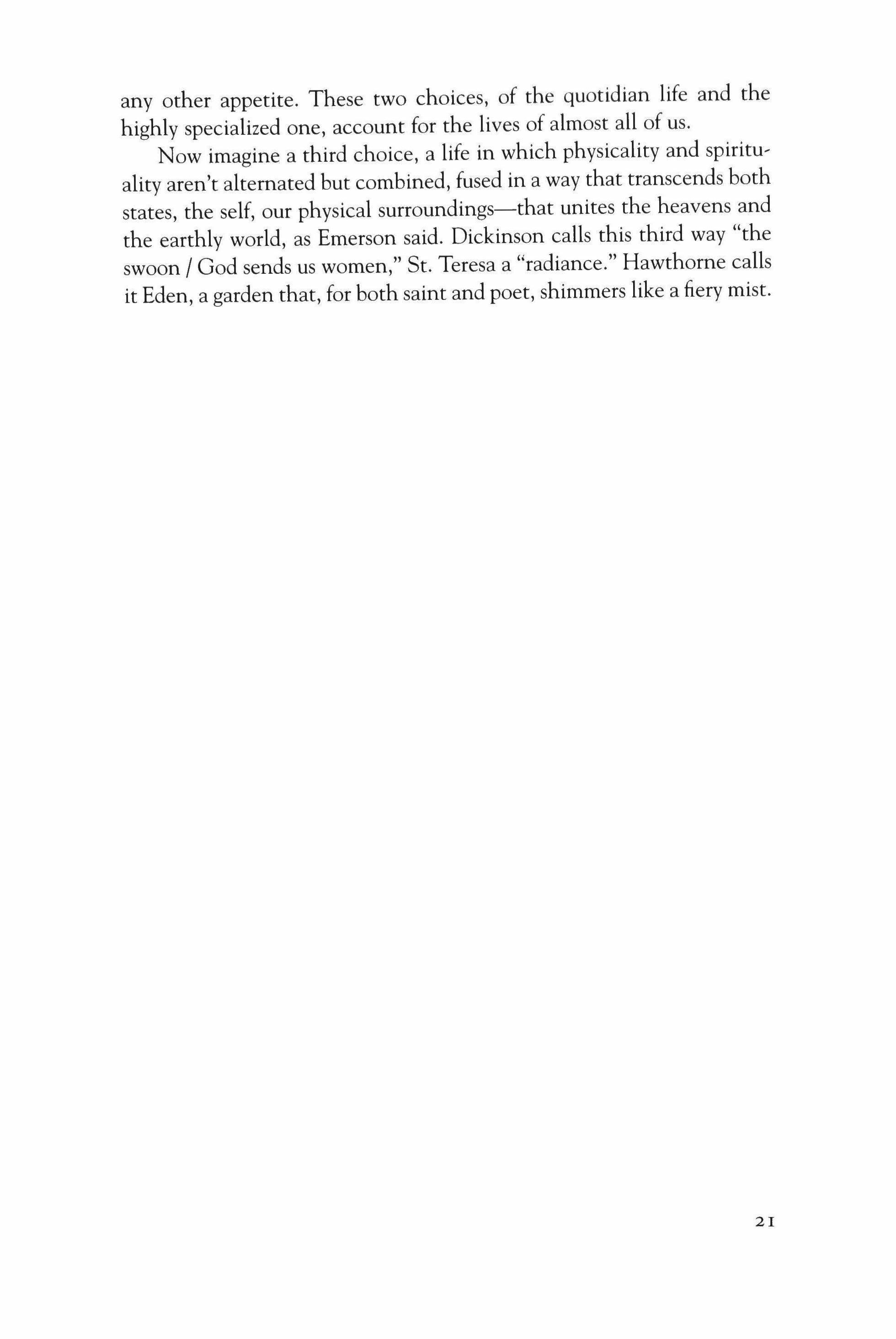
any other appetite. These two choices, of the quotidian life and the highly specialized one, account for the lives of almost all of us.
Now imagine a third choice, a life in which physicality and spirituality aren't alternated but combined, fused in a way that transcends both states, the self, our physical surroundings-that unites the heavens and the earthly world, as Emerson said. Dickinson calls this third way "the swoon / God sends us women," St. Teresa a "radiance." Hawthorne calls it Eden, a garden that, for both saint and poet, shimmers like a fiery mist.
21
Danielle Chapman
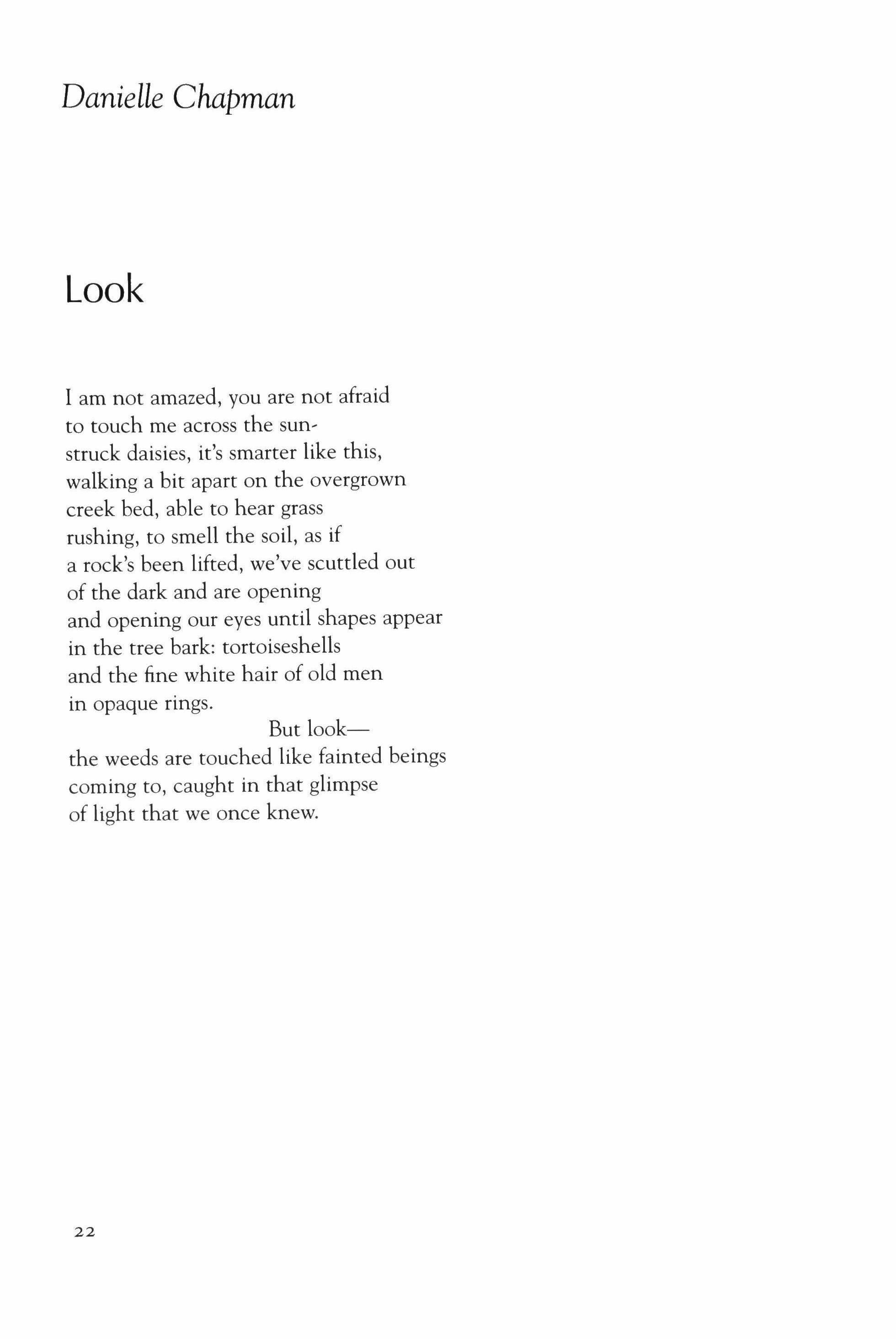
Look
I am not amazed, you are not afraid to touch me across the sunstruck daisies, it's smarter like this, walking a bit apart on the overgrown creek bed, able to hear grass rushing, to smell the soil, as if a rock's been lifted, we've scuttled out of the dark and are opening and opening our eyes until shapes appear in the tree bark: tortoiseshells and the fine white hair of old men in opaque rings.
But lookthe weeds are touched like fainted beings coming to, caught in that glimpse of light that we once knew.
22

IfI will drive to meet you in the middle of the night but if you forget or miss your plane or if the plane blows up in the Black Hills and gears go up in smoke and I become my mother treading water as my dad goes down, an orphan in a creek of snakes, if men decide to gut the creek, to build a freeway through it, if I become a creature of gasoline and static, my eyes outdone, men plowing past in I 8�wheelers, the night chopped up like crystal syllables, the road blasted into jagged ecstasies of concrete, some resembling God, others you, don't ask what I will choose.
23
Winter

Leaves like puckered lily pads cinch and whistle while the branches' black vials prick the clouds' lit clumps of pearl, which avalanche unencumbered past the last steeple careless of these words' wish to rip the great tree up by its roots and snip the delicate nerve-net like exhumed burlap that it might let out, in puffs of dirt, the secret stitch that holds the heart.
24
Letter from a Small Town
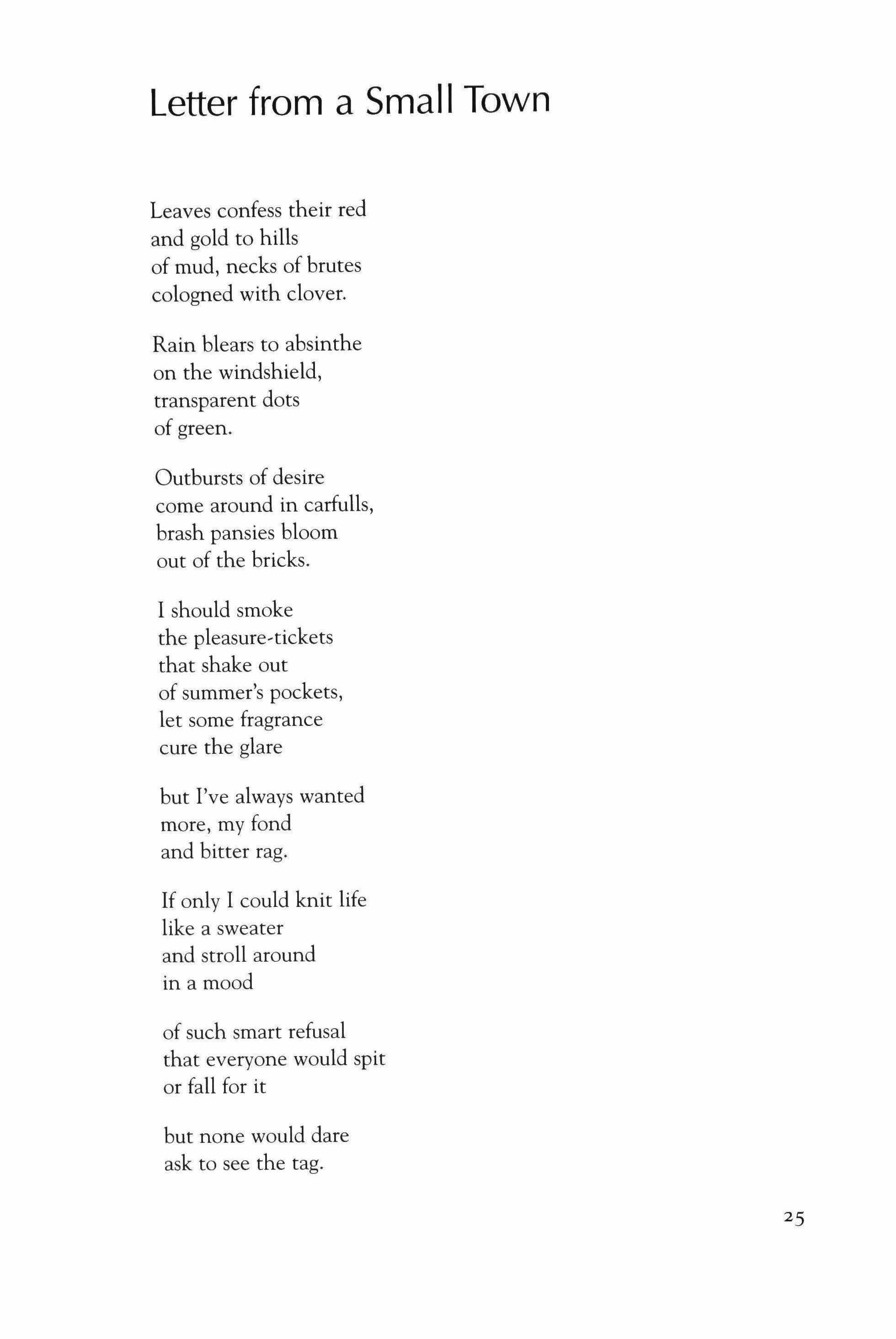
Leaves confess their red and gold to hills of mud, necks of brutes cologned with clover.
Rain blears to absinthe on the windshield, transparent dots of green.
Outbursts of desire come around in carfulls, brash pansies bloom out of the bricks.
I should smoke the pleasure-tickets that shake out of summer's pockets, let some fragrance cure the glare but I've always wanted more, my fond and bitter rag.
If only I could knit life like a sweater and stroll around in a mood of such smart refusal that everyone would spit or fall for it but none would dare ask to see the tag.
]ames Langenbach
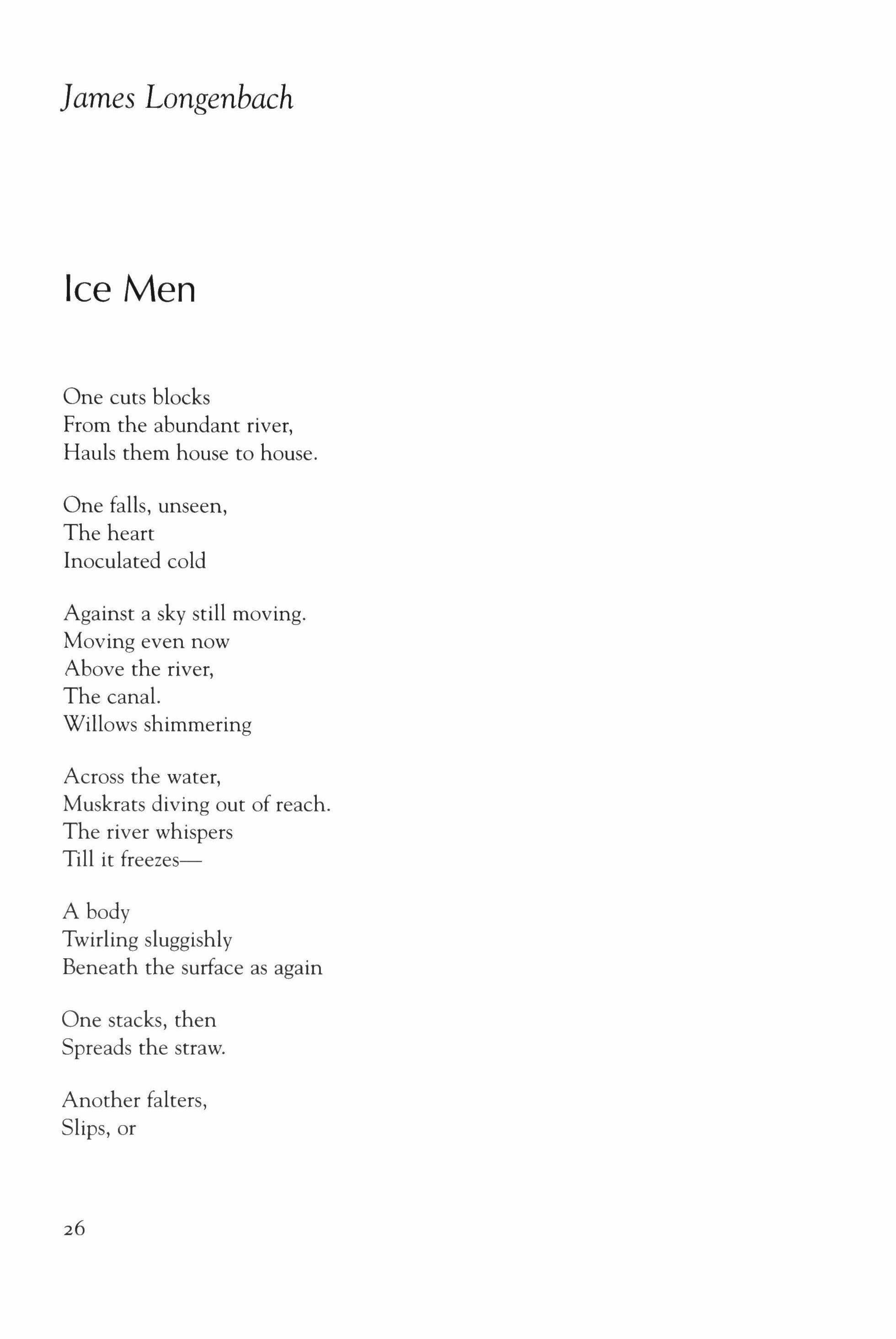
Ice Men
One cuts blocks
From the abundant river, Hauls them house to house.
One falls, unseen, The heart
Inoculated cold
Against a sky still moving. Moving even now
Above the river, The canal.
Willows shimmering
Across the water, Muskrats diving out of reach. The river whispers Till it freezes-
A body
Twirling sluggishly
Beneath the surface as again
One stacks, then Spreads the straw.
Another falters, Slips, or

Puts a sliver on your tongue
To feel it melting there
The ice-lit
Underworld
Of someone else.
Joy and Reason

1 am sailing happily.
Bait for shipwreck. People who dash about on Battlements, yardarms of ships, Are betrayed by level roads. The first age has spurs, The last a bridle.
The surface is calm. My swiftness is unheard of.
Your throat will wrinkle. Lines will furrow your soft cheeks And the brightness of your eyes Will be covered by a cloud. With the man who said virtue Is more pleasing in fine Forms, I can't agree.
Right now, at least, my body is exceptional. It is admired by everyone.
Whence this avalanche of water, These billowing waves? When what remains
Of your hair has fallen out, Your shoulders bent, Hands withered
And the radiant ivory Of your teeth turned black, You will recognize yourself.
I have sailed prosperously. I am already on shore.
Canzone
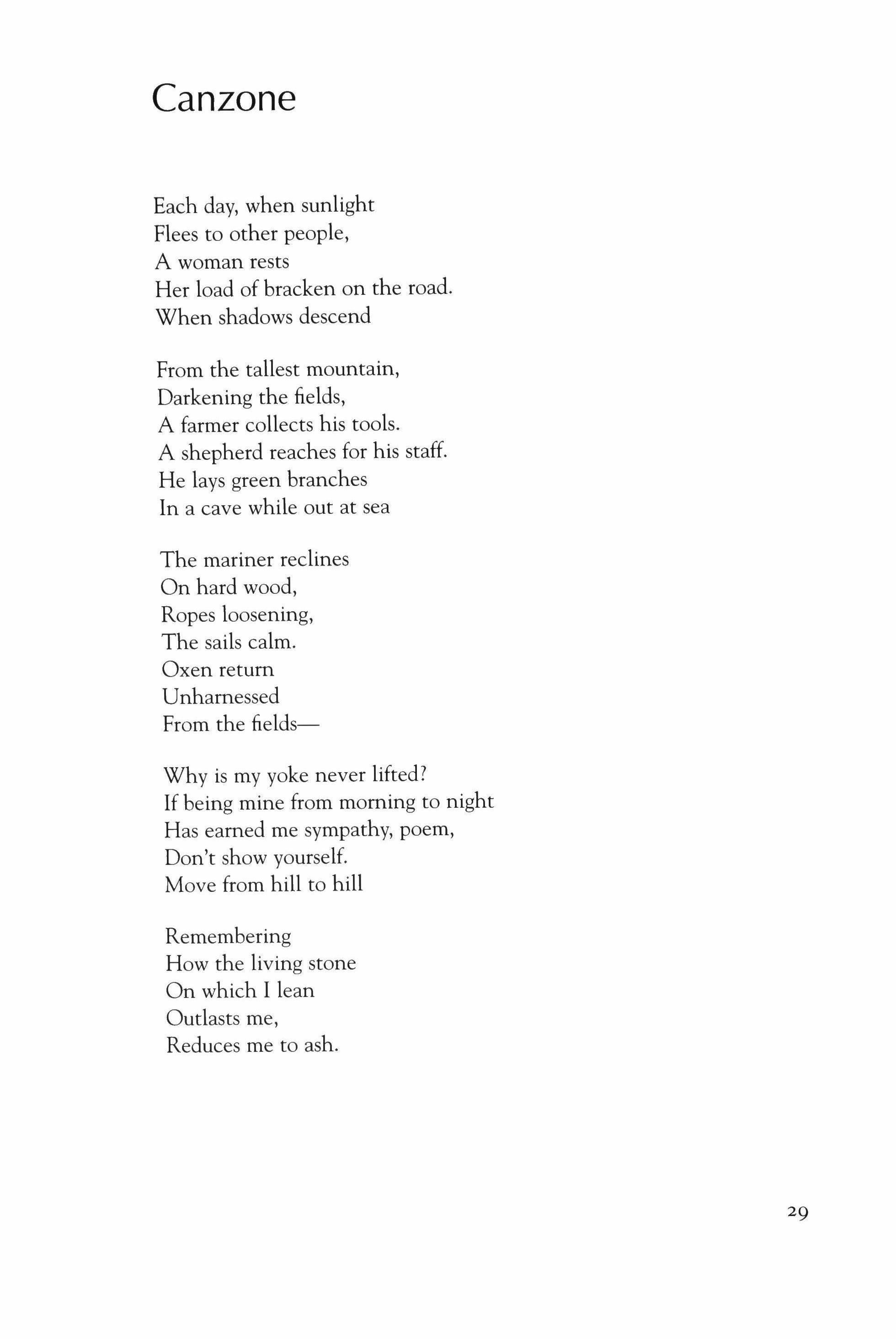
Each day, when sunlight Flees to other people, A woman rests Her load of bracken on the road. When shadows descend
From the tallest mountain, Darkening the fields, A farmer collects his tools. A shepherd reaches for his staff. He lays green branches In a cave while out at sea
The mariner reclines On hard wood, Ropes loosening, The sails calm. Oxen return
Unharnessed
From the fields-
Why is my yoke never lifted? If being mine from morning to night Has earned me sympathy, poem, Don't show yourself. Move from hill to hill
Remembering
How the living stone On which I lean Outlasts me, Reduces me to ash.
Tenzone
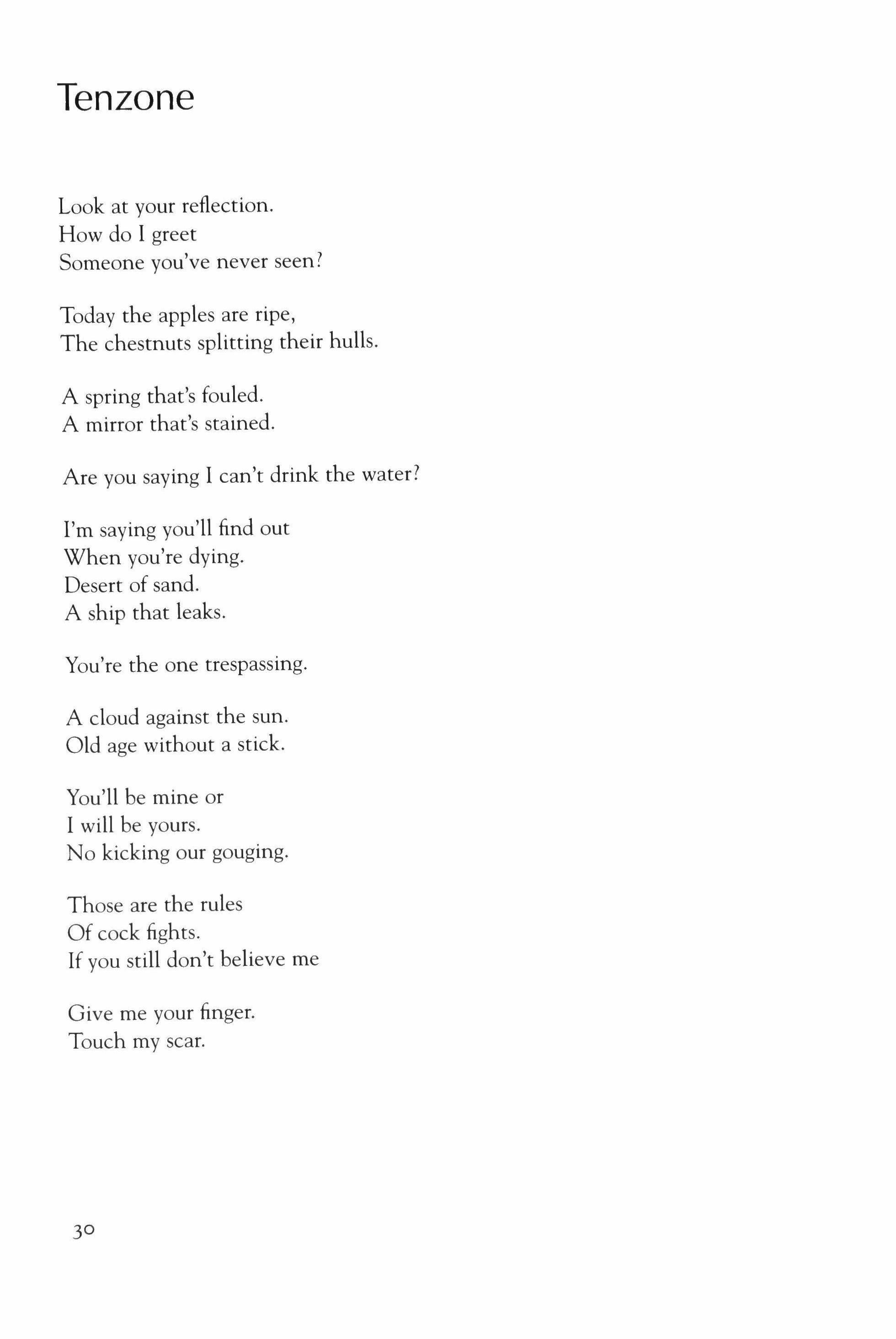
Look at your reflection.
How do I greet
Someone you've never seen?
Today the apples are ripe, The chestnuts splitting their hulls.
A spring that's fouled. A mirror that's stained.
Are you saying I can't drink the water?
I'm saying you'll find out When you're dying. Desert of sand. A ship that leaks.
You're the one trespassing.
A cloud against the sun. Old age without a stick.
You'll be mine or I will be yours. No kicking our gouging.
Those are the rules Of cock fights. If you still don't believe me
Give me your finger. Touch my scar.
30
C. Dale Young

Respect
I would rather fixate on the light in this room, the way it shadows the edge of the bed by the window, the way it gauzes everything close to the window, the light refracting through dirty glass. But I am not here to document the light for a painter in training. The woman lying in the bed is dying. There is nothing more I can do to prevent that, the cancer in her ovaries now filling her abdomen, and its virulent cells now lodged in her liver, her bones, sheltering in the basin of her skull against her brain.
You expect me to describe her, but I will not. Instead, there are the walls outside Port Royal, left long ago by Spanish settlers most would refer to as pirates. The bricks in those walls are crude, crumbling in the late afternoon faster than expected. And against those walls, the creeping flowers of the bougainvillaea, its petals rippling, from this distance, by a salty ocean breeze. I am more than this vessel, and so is she.
And then there is Geneva, the Alps' white caps bespeaking more than snow and the sight of snow. There is the lake, almost frozen, and the tree limbs bending under the weight of ice. There is the ravine, half-filled with ice and the memory of the body buried there.
31

No, I will not describe her or the way in which she holds the blank notebook to her chest, the way she refuses to look me in the face this morning.
We have looked on each other before and seen things beyond our vision: she, a lady in waiting, her servants yet to bring her tea; me, the usher, the one who precedes the Angel of Death. And if I say anything, it is out of respect, always out of respect. And if I touch her, it is to remind her of touch. See her reddish-brown hair clinging to her face, the sweat on her brow
No, I would rather fixate on the light in this room, the way it shadows the edge of the bed. And outside, the redwoods climb out of this light, climb into the atmosphere like fire.
32
Against Divination

The smudge pots' smoke foretold more than the frost we expected. Somewhere, in the center of the grove, the men huddled together to examine the beautiful
yellow-green rot consuming the wayward branch of the orange tree lying on the ground, examined the break in the wood to divine something about the nature of the situation. What surprises is their need to know and predict peril. The drama of peril. The pulse quickening, the blood pressure rising until we feel the vibration in our knees. Divination: by smoke, by fire, by mirror, by water itself. I have forgotten which one truly predicts the certainty of peril.
And because you have opened up another, because you have examined the cells of another, seen for yourself that we are primarily water, do you, too, have that ancient power?
Today, the tears from the woman who tells me her doctor gave her six months. Oh the gift of scrying, the gift of prophecy. There are twelve types of rot for the orange tree, but for the sake of mystery, I do not name them. And for the way demise inches down the leaves of the tiger lily, there are two names, verbs even.
That water holds the past, present, and the future is nothing new. Hippocrates, having examined tears, suspected as much. Over the years, I have perfected my suturing, have studied the tension of suture between my hand and the resisting tissue, learned how it reveals whether the closure will hold. The smudge pots' smoke
33

foretold more than we could ever have expectedthere would be frost and the threat of frost, fire and the fire of rot racing throughout the grove.
My attempts to depict that scene were failures. Once, I even tried to paint three doctors: one with his ears sewn shut, another, his eyes. Likewise, I never finished that painting, never completed the final doctor whose eyes are dark, menacing, and wide. Someday, I will close his mouth with red suture; I will conjure silence for that terrible oracle.
34
]onathan Fink

Body of Sorrow
I. Eye
How you alone discern the light from dark, the presence of a circling bird, the lone refraction of a reed, the shadow mark of willows bared that lilt like finger bones. The sunset and the dawn both pass to you. The iris, in its constant motion, breathes. When given to the night the pupil blooms. Your finest veins, like cracks in china, weave. Your labor is impartial, scant of dreams. Beloveds in their final beds, the four oak posts and linen sheets, must, dying, seem at length to you, no less than all before. How even lost in perfect dark you fill to hold, within your brimming, constant will.
II. Ear
The tunnel of your hearing is the song. The bones that rub like cricket wings to stir the thinnest stretch of skin were anchored long before their time when earth was dust conferred by wind. Consider all the voices borne within-the pitch of song released at birth, the mother's with her piercing trill that mourns your passing into form, and your own worth defined in tum by matching her true prayer with cries. Though words can rise to you alone
35

and bind with meaning all that's want or fair, the burden of your sorrow's single throne is held within the weight that judgment bringsa throttled, flightless bird that will not sing.
III. Nose
No keener hinge surrenders to the past. When languid drift of sewer rot ascends as fog from depths below to reach, at last, the passing crowds, see how, en masse, they bend in stride, their shoulders slumped and nostrils flared. As memory rises, each to each, one man recalls biology with students paired and reaching in formaldehyde to hand like surgeons back and forth the gleaming eyes of pigs. A woman sleek in suit and heels is given transport to the day that lies unspoken in her now, her father, sealed by stroke, at home. She shudders for his death to come, the rising scent of acrid breath.
IV. Tongue
You are the regulator of the law where thought is born of language first, unfurled within the mind like bolts of silk. Because of you, cathedrals rise to mark the curl of saints entombed, undone in time by words fallacious, lost. Though, pound for pound, your strength persists (how soon the heart relents, unheard within its cage) to claim dominion, length by width, of all the muscle body owns. Yet even in your power you are bound to writhe within the mouth's dark cave and hone, as voice escapes on wind, all words from sound. In prejudice you guard the body's gate as guide both forming and divining fate.
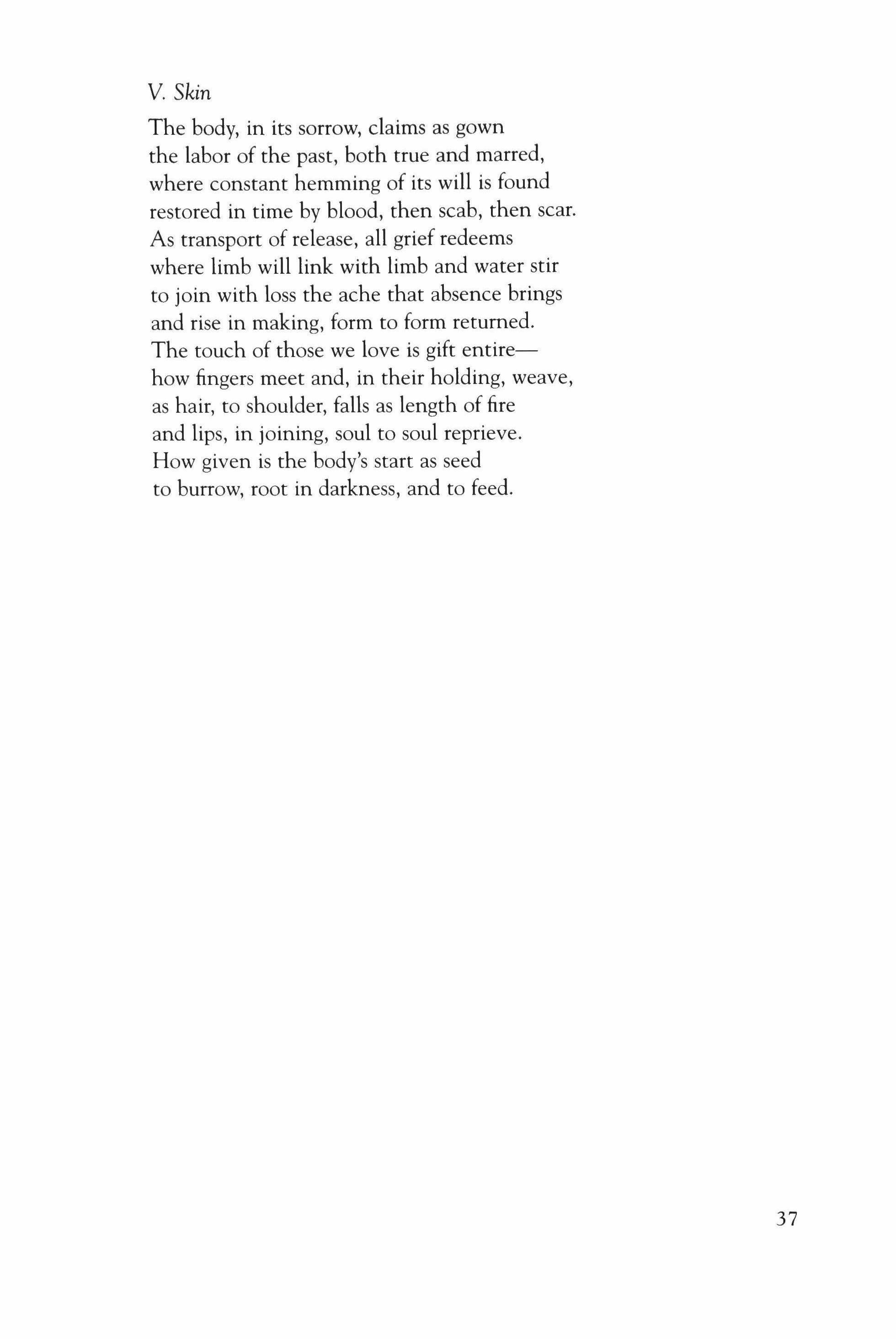
V. Skin
The body, in its sorrow, claims as gown the labor of the past, both true and marred, where constant hemming of its will is found restored in time by blood, then scab, then scar. As transport of release, all grief redeems where limb will link with limb and water stir to join with loss the ache that absence brings and rise in making, form to form returned. The touch of those we love is gift entirehow fingers meet and, in their holding, weave, as hair, to shoulder, falls as length of fire and lips, in joining, soul to soul reprieve. How given is the body's start as seed to burrow, root in darkness, and to feed.
37
Bruce Jay Friedman

The Secret Man
Herbert Plotkin did not so much appear in Jacob's new neighborhood as he seemed to loom up out of nowhere. He didn't look a bit like his name. He was tall and blonde and had Nordic features. His body was tightly carved as if he had been in prison. Though he disappeared into a good building at night, no one had ever seen his parents. There was some talk that he was adopted-a disgrace at the time-but you did not dare say it.
He took up a position in front of the neighborhood drugstore each day and used it as a guard post. Sweeping his hands back through his luxuriant hair, he peered out at the streets and monitored the traffic in all directions. There didn't seem to be any way to go anywhere or do anything without passing before him.
Jacob was afraid of Plotkin and spent seven years of his life trying not to show it.
It had begun as a happy time. Jacob's father, who worked in New York City's garment center, had gotten a raise. The extra money enabled Jacob and his parents to move into a new building with a white brick exterior and an elevator. The apartment was smaller than their old one, but it was fresh and cheery and had a step-down living room. His parents had bought an imitation fireplace with a radio built into the side of it. With a bowl of fruit in his lap, Jacob would lean in close to the speaker each night and listen to his favorite radio shows such as "I Love a Mystery" and "The Green Hornet." He made new friends, most of
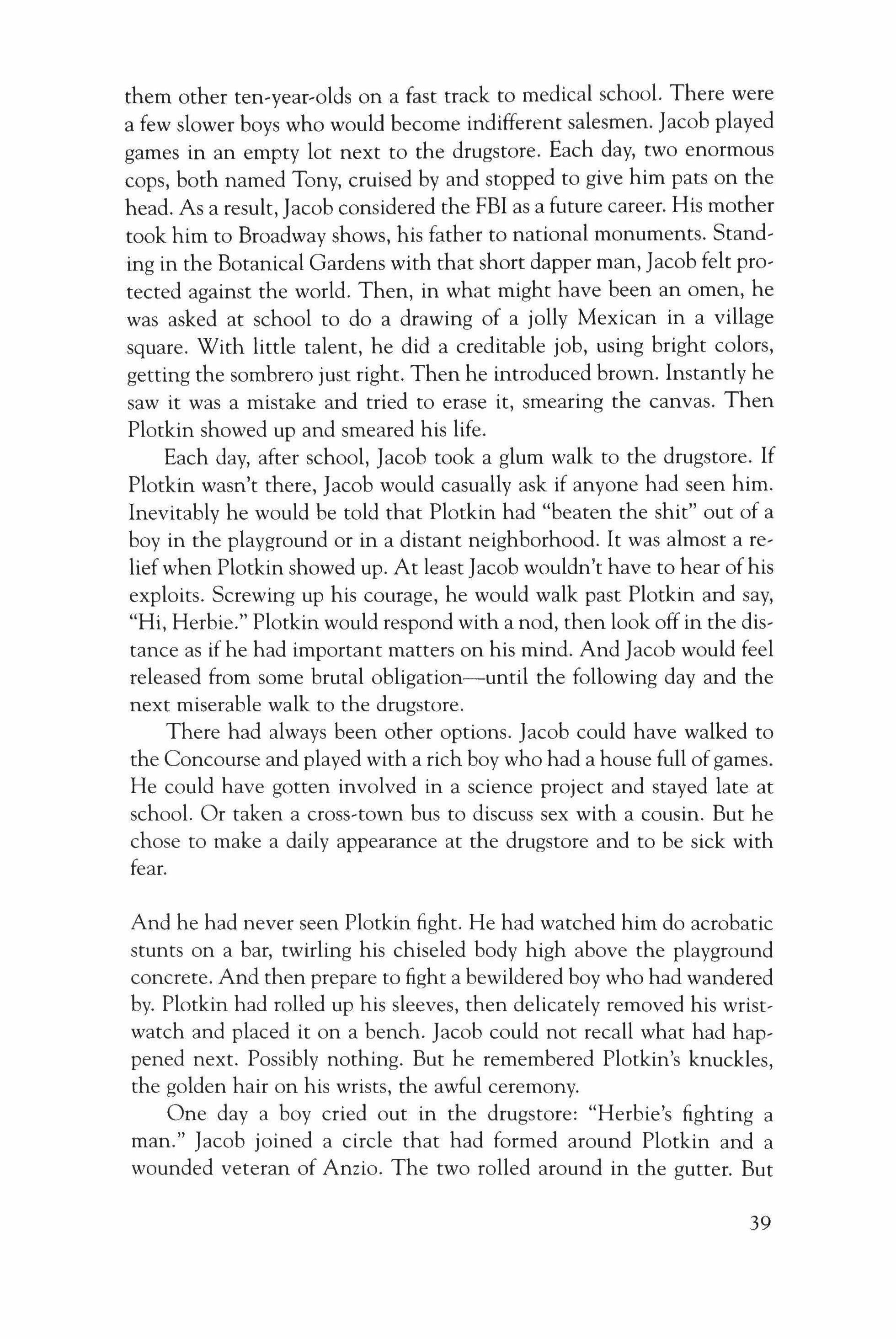
them other ten-year-olds on a fast track to medical school. There were a few slower boys who would become indifferent salesmen. Jacob played games in an empty lot next to the drugstore. Each day, two enormous cops, both named Tony, cruised by and stopped to give him pats on the head. As a result, Jacob considered the FBI as a future career. His mother took him to Broadway shows, his father to national monuments. Standing in the Botanical Gardens with that short dapper man, Jacob felt protected against the world. Then, in what might have been an omen, he was asked at school to do a drawing of a jolly Mexican in a village square. With little talent, he did a creditable job, using bright colors, getting the sombrero just right. Then he introduced brown. Instantly he saw it was a mistake and tried to erase it, smearing the canvas. Then Plotkin showed up and smeared his life.
Each day, after school, Jacob took a glum walk to the drugstore. If Plotkin wasn't there, Jacob would casually ask if anyone had seen him. Inevitably he would be told that Plotkin had "beaten the shit" out of a boy in the playground or in a distant neighborhood. It was almost a relief when Plotkin showed up. At least Jacob wouldn't have to hear ofhis exploits. Screwing up his courage, he would walk past Plotkin and say, "Hi, Herbie." Plotkin would respond with a nod, then look off in the distance as if he had important matters on his mind. And Jacob would feel released from some brutal obligation-until the following day and the next miserable walk to the drugstore.
There had always been other options. Jacob could have walked to the Concourse and played with a rich boy who had a house full of games. He could have gotten involved in a science project and stayed late at school. Or taken a cross-town bus to discuss sex with a cousin. But he chose to make a daily appearance at the drugstore and to be sick with fear.
And he had never seen Plotkin fight. He had watched him do acrobatic stunts on a bar, twirling his chiseled body high above the playground concrete. And then prepare to fight a bewildered boy who had wandered by. Plotkin had rolled up his sleeves, then delicately removed his wristwatch and placed it on a bench. Jacob could not recall what had happened next. Possibly nothing. But he remembered Plotkin's knuckles, the golden hair on his wrists, the awful ceremony.
One day a boy cried out in the drugstore: "Herbie's fighting a man." Jacob joined a circle that had formed around Plotkin and a wounded veteran of Anzio. The two rolled around in the gutter. But
39

here again, all Jacob saw were muffled blows in the dust and the flash of a metallic leg brace glinting in the sun. When the two were pulled apart, Jacob heard the veteran say: "I would have killed him, but he was a kid." But was he? Jacob and his friends were skinny boys who hadn't grown into their bodies. Jacob himself was given thyroid shots and forced to stand on the malted milk line at summer camp. Plotkin had a powerfully developed body with golden hair in his armpits. Was he a secret man?
As further evidence of his maturity, Plotkin began to show up with a small girl who lived in a cellar. Each day, Jacob watched them cross the vacant lot, Plotkin's arm gallantly draped across her shoulders. Then they ducked down and disappeared in the cellar. Jacob wondered what they did down there. Was Plotkin rough or gentle?
Never once did Plotkin lay a hand on Jacob which somehow added to his misery. There were times when Jacob wanted to get it over with, to be smashed in the face-so that he could get on with his life. An older boy stopped Jacob one day and said: "I notice Herbie never picks on you." Jacob nodded as if to say "He knows better"-but inwardly he trembled.
Jacob had a friend named Nathan, a poor boy whose father sent him out at fourteen to sell endowment policies. He had pitch-black hair and broad shoulders. Shy girls who passed him on the street said "Hi, Nate."
He was self-assured, but modest in nature and he was a hero to Jacob. One day Jacob and his friend walked past the drugstore. Plotkin was at his post. When he saw Nathan, he looked away.
"You know Herbie?" asked Jacob.
"Yes," said Nathan, "and he knows he's in trouble with me."
Jacob was startled. It was the most amazing thing he had ever heard. Plotkin in trouble with another person? You were supposed to be in trouble with Plotkin. Suddenly he saw the world from a different angle.
Emboldened by the incident, Jacob walked up to Plotkin the following day and slapped him with an open hand, then drew back.
"Let's go, Herbie," he said and put up his hands as if to fight.
A sleepy group looked on, including one adult. This gave Jacob courage. If matters got out of hand, surely they'd intervene. Plotkin slapped Jacob back with equal force, then withdrew, mumbling to himself as if to contemplate the awful consequences ifhe went further. Jacob virtually flew through the streets in triumph. He'd challenged Plotkin and come away unharmed. But the feeling didn't last. He'd accorn-
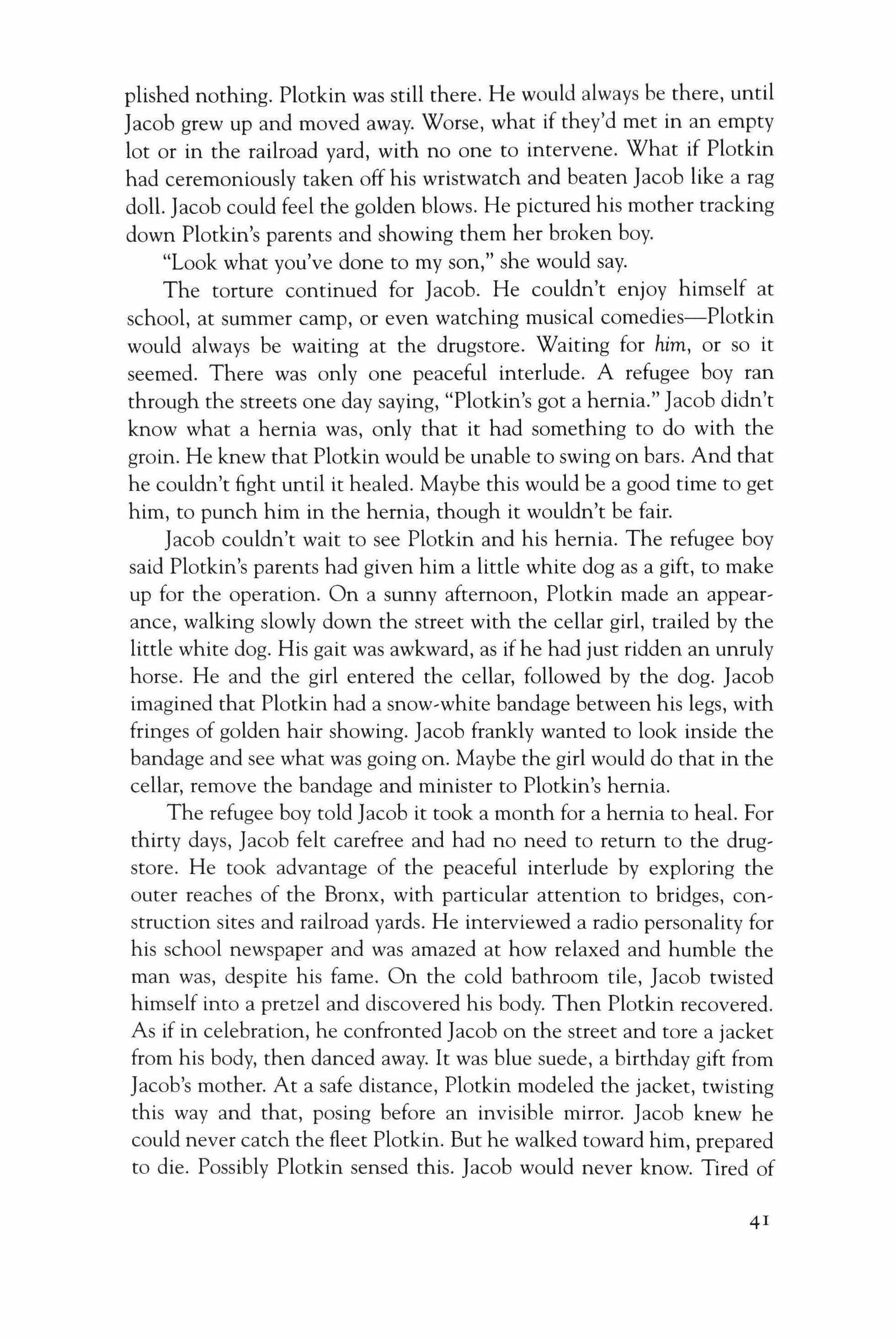
plished nothing. Plotkin was still there. He would always be there, until Jacob grew up and moved away. Worse, what if they'd met in an empty lot or in the railroad yard, with no one to intervene. What if Plotkin had ceremoniously taken off his wristwatch and beaten Jacob like a rag doll. Jacob could feel the golden blows. He pictured his mother tracking down Plotkin's parents and showing them her broken boy.
"Look what you've done to my son," she would say.
The torture continued for Jacob. He couldn't enjoy himself at school, at summer camp, or even watching musical comedies-Plotkin would always be waiting at the drugstore. Waiting for him, or so it seemed. There was only one peaceful interlude. A refugee boy ran through the streets one day saying, "Plotkin's got a hernia." Jacob didn't know what a hernia was, only that it had something to do with the groin. He knew that Plotkin would be unable to swing on bars. And that he couldn't fight until it healed. Maybe this would be a good time to get him, to punch him in the hernia, though it wouldn't be fair.
Jacob couldn't wait to see Plotkin and his hernia. The refugee boy said Plotkin's parents had given him a little white dog as a gift, to make up for the operation. On a sunny afternoon, Plotkin made an appearance, walking slowly down the street with the cellar girl, trailed by the little white dog. His gait was awkward, as if he had just ridden an unruly horse. He and the girl entered the cellar, followed by the dog. Jacob imagined that Plotkin had a snow-white bandage between his legs, with fringes of golden hair showing. Jacob frankly wanted to look inside the bandage and see what was going on. Maybe the girl would do that in the cellar, remove the bandage and minister to Plotkin's hernia.
The refugee boy told Jacob it took a month for a hernia to heal. For thirty days, Jacob felt carefree and had no need to return to the drugstore. He took advantage of the peaceful interlude by exploring the outer reaches of the Bronx, with particular attention to bridges, construction sites and railroad yards. He interviewed a radio personality for his school newspaper and was amazed at how relaxed and humble the man was, despite his fame. On the cold bathroom tile, Jacob twisted himself into a pretzel and discovered his body. Then Plotkin recovered. As if in celebration, he confronted Jacob on the street and tore a jacket from his body, then danced away. It was blue suede, a birthday gift from Jacob's mother. At a safe distance, Plotkin modeled the jacket, twisting this way and that, posing before an invisible mirror. Jacob knew he could never catch the fleet Plotkin. But he walked toward him, prepared to die. Possibly Plotkin sensed this. Jacob would never know. Tired of
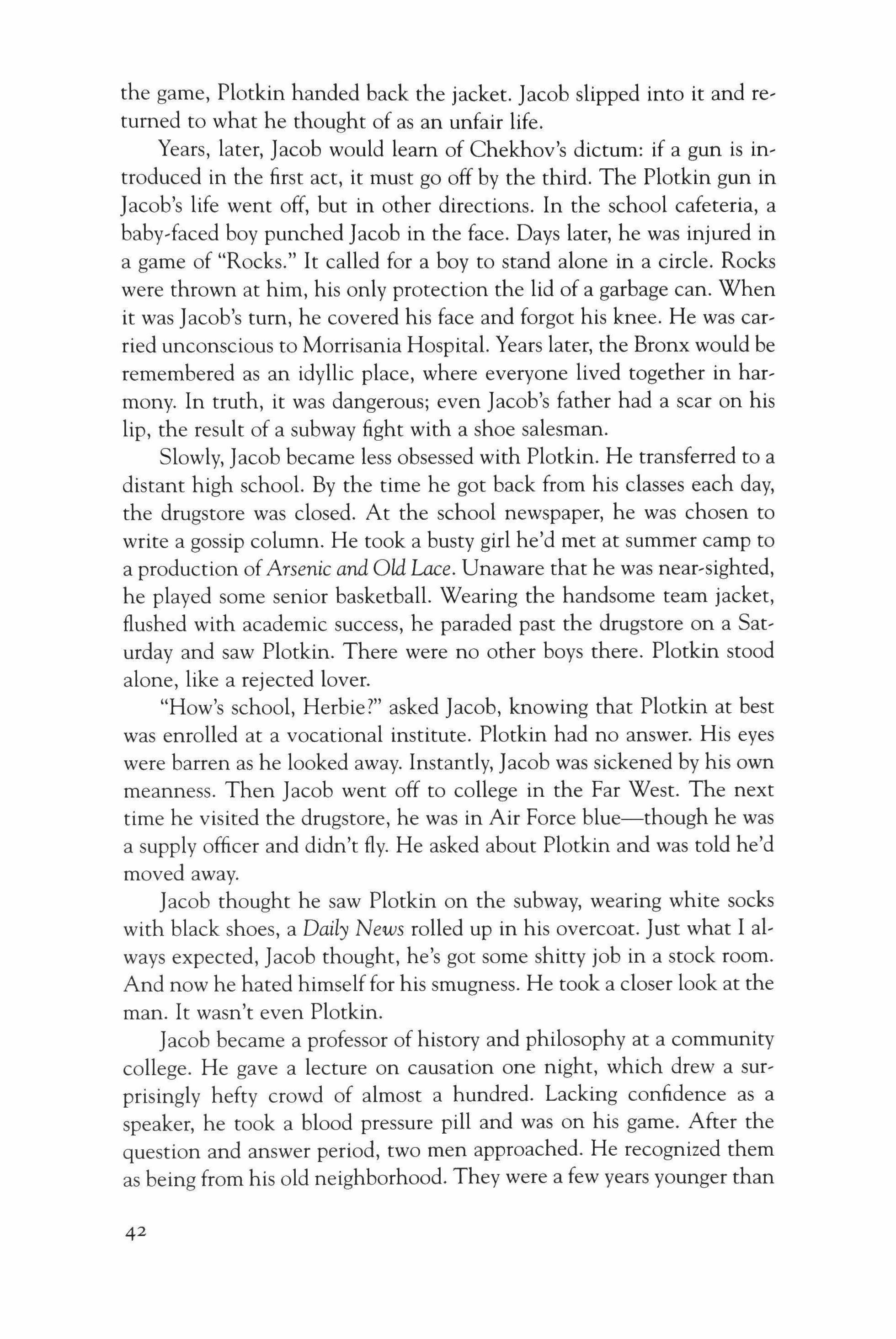
the game, Plotkin handed back the jacket. Jacob slipped into it and returned to what he thought of as an unfair life.
Years, later, Jacob would learn of Chekhov's dictum: if a gun is in; troduced in the first act, it must go off by the third. The Plotkin gun in Jacob's life went off, but in other directions. In the school cafeteria, a baby-faced boy punched Jacob in the face. Days later, he was injured in a game of "Rocks." It called for a boy to stand alone in a circle. Rocks were thrown at him, his only protection the lid of a garbage can. When it was Jacob's tum, he covered his face and forgot his knee. He was carried unconscious to Morrisania Hospital. Years later, the Bronx would be remembered as an idyllic place, where everyone lived together in harmony. In truth, it was dangerous; even Jacob's father had a scar on his lip, the result of a subway fight with a shoe salesman.
Slowly, Jacob became less obsessed with Plotkin. He transferred to a distant high school. By the time he got back from his classes each day, the drugstore was closed. At the school newspaper, he was chosen to write a gossip column. He took a busty girl he'd met at summer camp to a production ofArsenic and Old Lace. Unaware that he was near-sighted, he played some senior basketball. Wearing the handsome team jacket, flushed with academic success, he paraded past the drugstore on a Saturday and saw Plotkin. There were no other boys there. Plotkin stood alone, like a rejected lover.
"How's school, Herbie?" asked Jacob, knowing that Plotkin at best was enrolled at a vocational institute. Plotkin had no answer. His eyes were barren as he looked away. Instantly, Jacob was sickened by his own meanness. Then Jacob went off to college in the Far West. The next time he visited the drugstore, he was in Air Force blue-though he was a supply officer and didn't fly. He asked about Plotkin and was told he'd moved away.
Jacob thought he saw Plotkin on the subway, wearing white socks with black shoes, a Daily News rolled up in his overcoat. Just what I always expected, Jacob thought, he's got some shitty job in a stock room. And now he hated himselffor his smugness. He took a closer look at the man. It wasn't even Plotkin.
Jacob became a professor of history and philosophy at a community college. He gave a lecture on causation one night, which drew a surprisingly hefty crowd of almost a hundred. Lacking confidence as a speaker, he took a blood pressure pill and was on his game. After the question and answer period, two men approached. He recognized them as being from his old neighborhood. They were a few years younger than
42
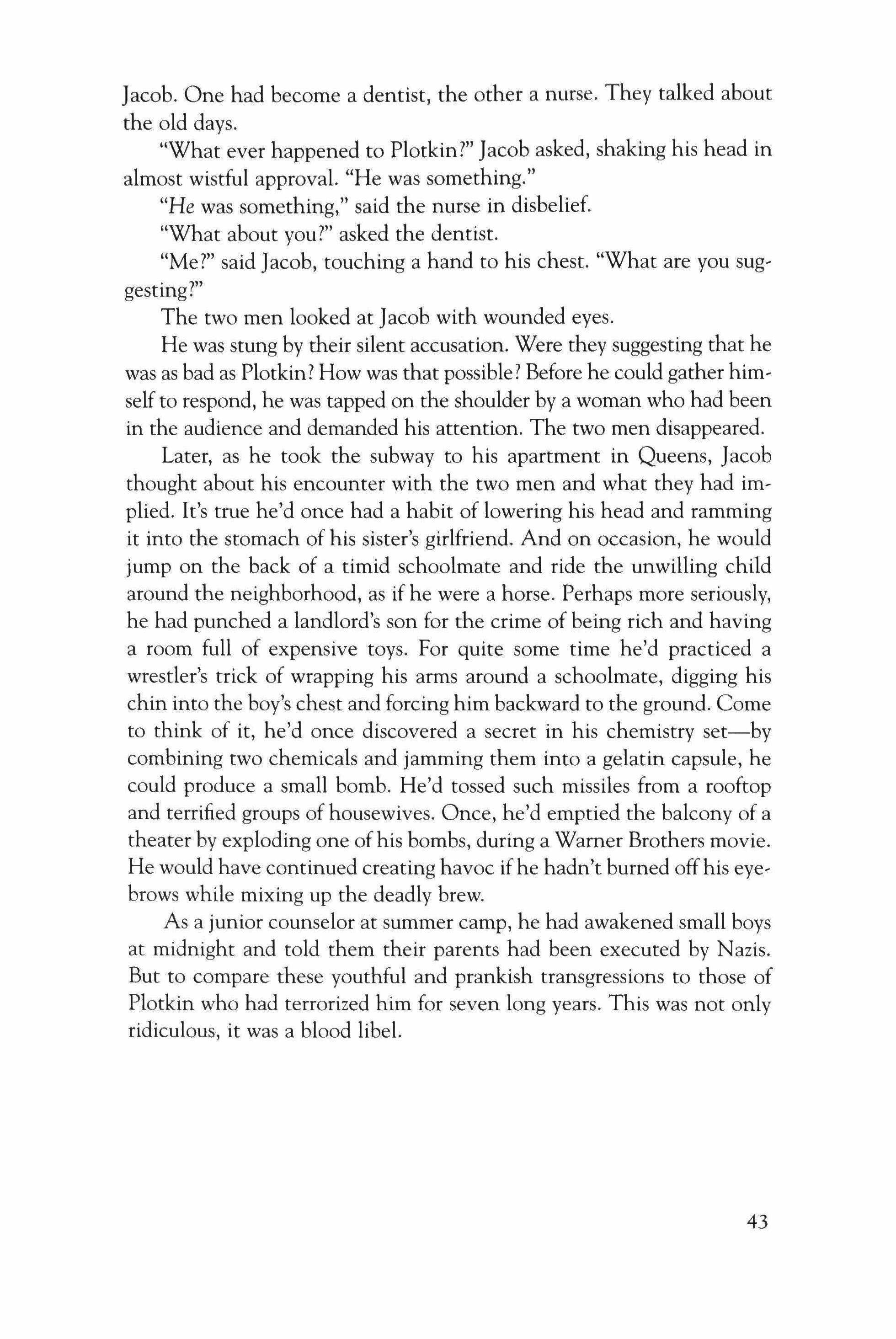
Jacob. One had become a dentist, the other a nurse. They talked about the old days.
"What ever happened to Plotkin?" Jacob asked, shaking his head in almost wistful approval. "He was something."
"He was something," said the nurse in disbelief.
"What about you?" asked the dentist.
"Me?" said Jacob, touching a hand to his chest. "What are you suggesting?"
The two men looked at Jacob with wounded eyes. He was stung by their silent accusation. Were they suggesting that he was as bad as Plotkin? How was that possible? Before he could gather him' self to respond, he was tapped on the shoulder by a woman who had been in the audience and demanded his attention. The two men disappeared.
Later, as he took the subway to his apartment in Queens, Jacob thought about his encounter with the two men and what they had implied. It's true he'd once had a habit of lowering his head and ramming it into the stomach of his sister's girlfriend. And on occasion, he would jump on the back of a timid schoolmate and ride the unwilling child around the neighborhood, as if he were a horse. Perhaps more seriously, he had punched a landlord's son for the crime of being rich and having a room full of expensive toys. For quite some time he'd practiced a wrestler's trick of wrapping his arms around a schoolmate, digging his chin into the boy's chest and forcing him backward to the ground. Come to think of it, he'd once discovered a secret in his chemistry set-by combining two chemicals and jamming them into a gelatin capsule, he could produce a small bomb. He'd tossed such missiles from a rooftop and terrified groups of housewives. Once, he'd emptied the balcony of a theater by exploding one ofhis bombs, during a Warner Brothers movie. He would have continued creating havoc ifhe hadn't burned offhis eye, brows while mixing up the deadly brew.
As a junior counselor at summer camp, he had awakened small boys at midnight and told them their parents had been executed by Nazis. But to compare these youthful and prankish transgressions to those of Plotkin who had terrorized him for seven long years. This was not only ridiculous, it was a blood libel.
43
Train Delayed Due to Horrible, Horrible Accident
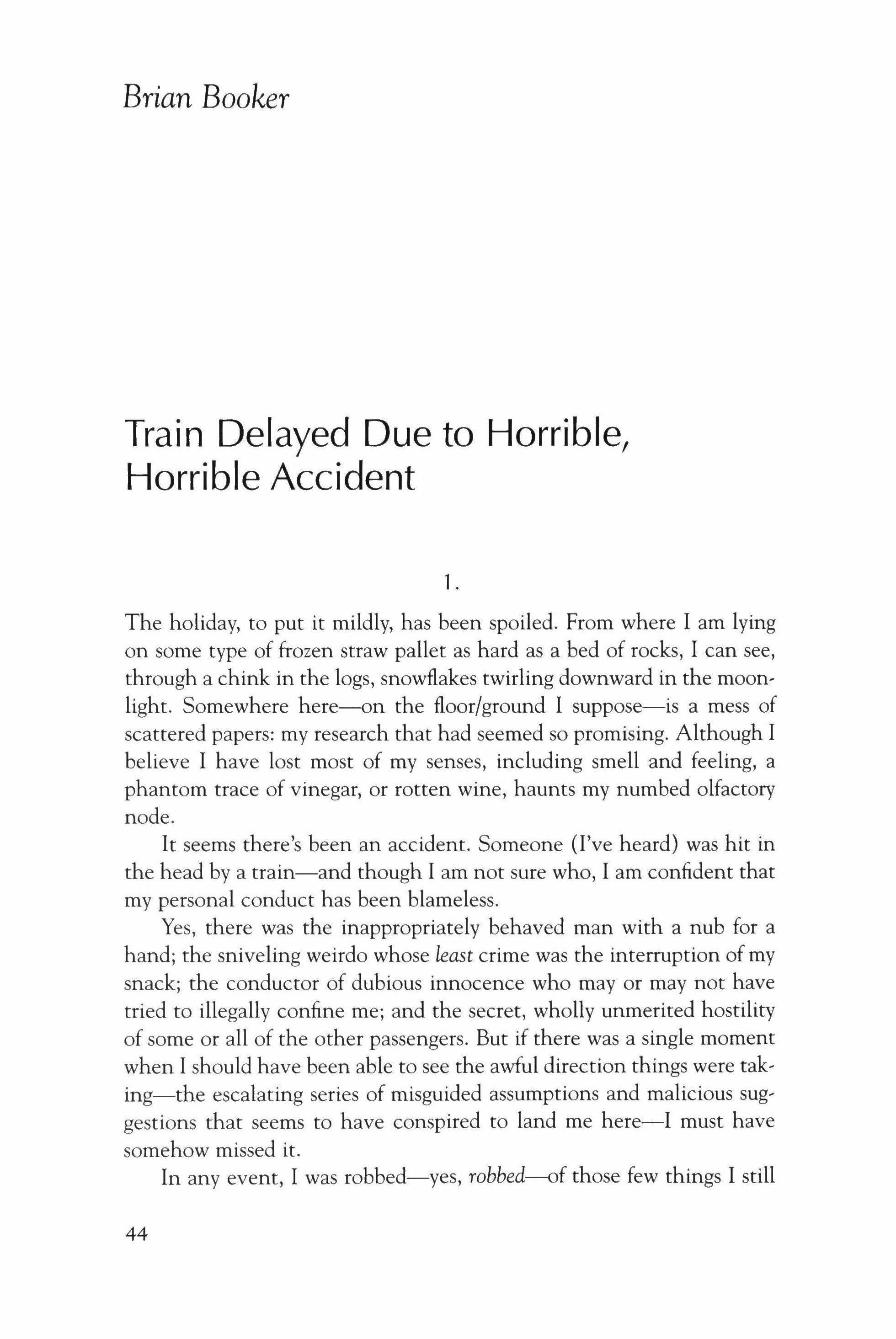
The holiday, to put it mildly, has been spoiled. From where I am lying on some type of frozen straw pallet as hard as a bed of rocks, I can see, through a chink in the logs, snowflakes twirling downward in the moonlight. Somewhere here-on the floor/ground I suppose-is a mess of scattered papers: my research that had seemed so promising. Although I believe I have lost most of my senses, including smell and feeling, a phantom trace of vinegar, or rotten wine, haunts my numbed olfactory node.
It seems there's been an accident. Someone (I've heard) was hit in the head by a train-and though I am not sure who, I am confident that my personal conduct has been blameless.
Yes, there was the inappropriately behaved man with a nub for a hand; the sniveling weirdo whose least crime was the interruption of my snack; the conductor of dubious innocence who may or may not have tried to illegally confine me; and the secret, wholly unmerited hostility of some or all of the other passengers. But if there was a single moment when I should have been able to see the awful direction things were taking-the escalating series of misguided assumptions and malicious suggestions that seems to have conspired to land me here-I must have somehow missed it.
In any event, I was robbed-yes, robbed-of those few things I still
Brian Booker
1.
44
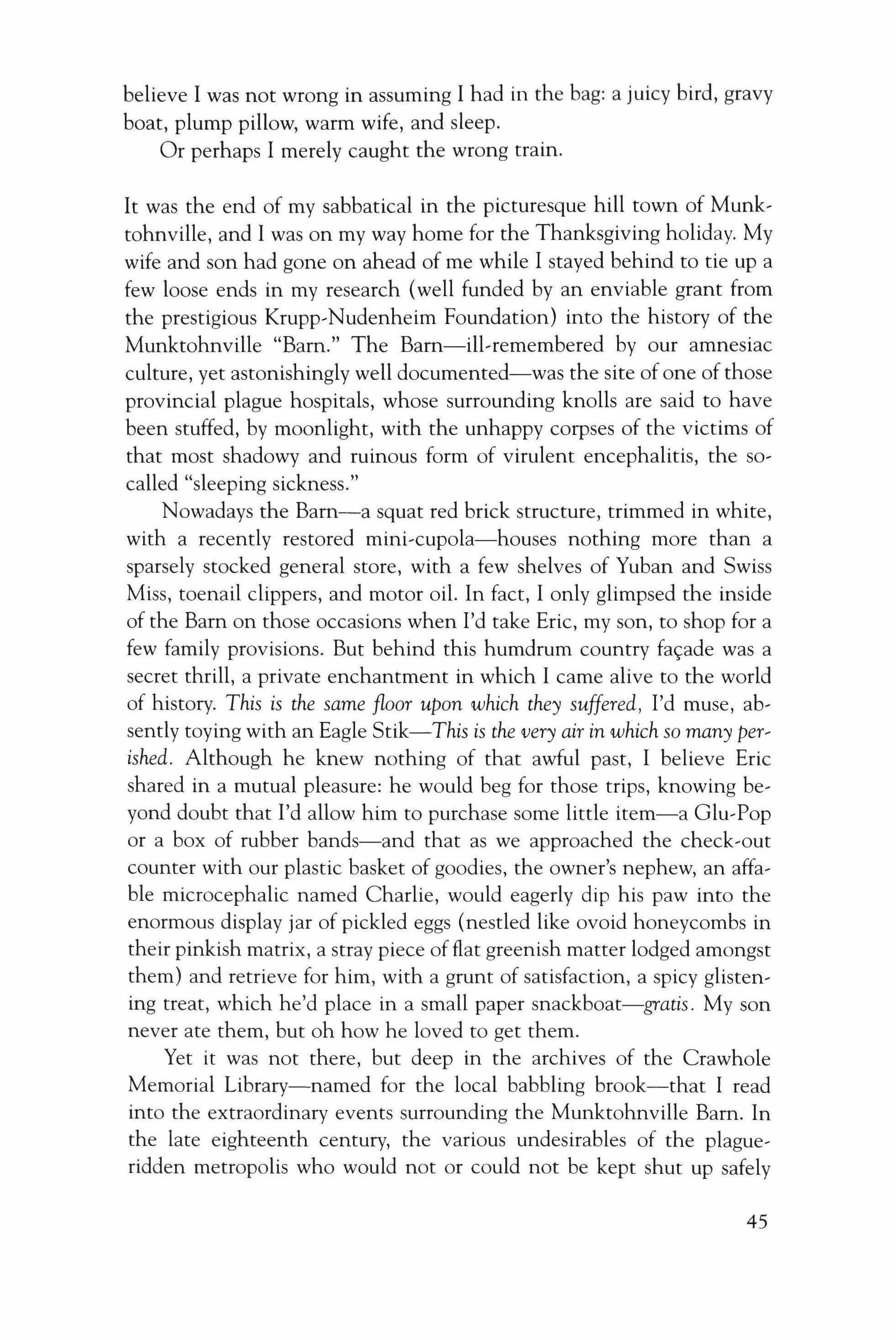
believe I was not wrong in assuming I had in the bag: a juicy bird, gravy boat, plump pillow, warm wife, and sleep. Or perhaps I merely caught the wrong train.
It was the end of my sabbatical in the picturesque hill town of Munktohnville, and I was on my way home for the Thanksgiving holiday. My wife and son had gone on ahead of me while I stayed behind to tie up a few loose ends in my research {well funded by an enviable grant from the prestigious Krupp-Nudenheim Foundation} into the history of the Munktohnville "Bam." The Bam-ill-remembered by our amnesiac culture, yet astonishingly well documented-was the site of one of those provincial plague hospitals, whose surrounding knolls are said to have been stuffed, by moonlight, with the unhappy corpses of the victims of that most shadowy and ruinous form of virulent encephalitis, the socalled "sleeping sickness."
Nowadays the Bam-a squat red brick structure, trimmed in white, with a recently restored mini-cupola-houses nothing more than a sparsely stocked general store, with a few shelves of Yuban and Swiss Miss, toenail clippers, and motor oil. In fact, I only glimpsed the inside of the Bam on those occasions when I'd take Eric, my son, to shop for a few family provisions. But behind this humdrum country facade was a secret thrill, a private enchantment in which I came alive to the world of history. This is the same floor upon which they suffered, I'd muse, absently toying with an Eagle Stik-This is the very air in which so many perished. Although he knew nothing of that awful past, I believe Eric shared in a mutual pleasure: he would beg for those trips, knowing beyond doubt that I'd allow him to purchase some little item-a Glu-Pop or a box of rubber bands-and that as we approached the check-out counter with our plastic basket of goodies, the owner's nephew, an affable microcephalic named Charlie, would eagerly dip his paw into the enormous display jar of pickled eggs {nestled like ovoid honeycombs in their pinkish matrix, a stray piece of flat greenish matter lodged amongst them} and retrieve for him, with a grunt of satisfaction, a spicy glistening treat, which he'd place in a small paper snackboat-gmtis. My son never ate them, but oh how he loved to get them.
Yet it was not there, but deep in the archives of the Crawhole Memorial Library-named for the local babbling brook-that I read into the extraordinary events surrounding the Munktohnville Bam. In the late eighteenth century, the various undesirables of the plagueridden metropolis who would not or could not be kept shut up safely
45

indoors were strongly urged to accept free transportation via "ambulance" (read: crude wooden cart over unpaved highway) to the newly, established "hospital" (read: brutally mismanaged death,trap-actually a country mansion expropriated by the municipal government against the vehement protests of its absentee landlord) in the outlying hamlet of Munktohnville.
It is recorded that certain of these unlucky individuals-some having unwittingly agreed to be taken to the hospital, some having been plucked off the curb and hoisted in the cart like horrifically mis-sculpted statues, all gnarled fingers and rolled-up eyeballs-"unfroze" from their catatonic states, at some point during the journey, long enough to escape from the cart as it approached Munktohnville, and fled into the village at large. City officials made some pained effort to recapture these so-called "walking cases" before they had irretrievably vanished, trailing their infectious brume, into the innocuous local citizenry. There are even some accounts of perfectly healthy Munktohnville residents who, caught napping on a streetside bench, were mistakenly identified as hospital escapees, "recaptured" by the quarantine committees and expatriated straight to the Bam.
The piecing-together of these accounts made for a deeply invigorating autumn-but alas, my work was complete. My wife, Lynne, had left on the train with young Eric. As I puttered about our rented cottage, switching off the water'heater and taking a few final notes for my book (which I'd been thinking of titling The Road to Unwellville) I was struck by a deep pang of nostalgia for a Munktohnville which even at that moment seemed far away from me, as if I were already long gone. As I latched my briefcase shut, I was embarrassed to find that my eyes had welled up with tears. On the front porch, having locked the door, I gazed at my stolid softwood pines through a trembling veil of memories: my little carrel in the Crawhole, dust-motes dancing in a beam of late, afternoon sunlight; Lynne's sharp cry as her inflatable Poke,Bote slithered over a tiny waterfall in the brook behind our cottage; the nervous smile on Eric's face as grinning Charlie delved for the lucky egg.
But no-I snapped to: the holidays were here again; my true home beckoned. Juicy bird, plump pillow, warm wife. Creaking down the porch steps with bags in hand, I vowed not to look back. Time marches on: I had a four o'clock train to catch.
As if to affirm my cheerful resignation, the train arrived on the dot. Soon I was settled into my window seat-I had both seats to
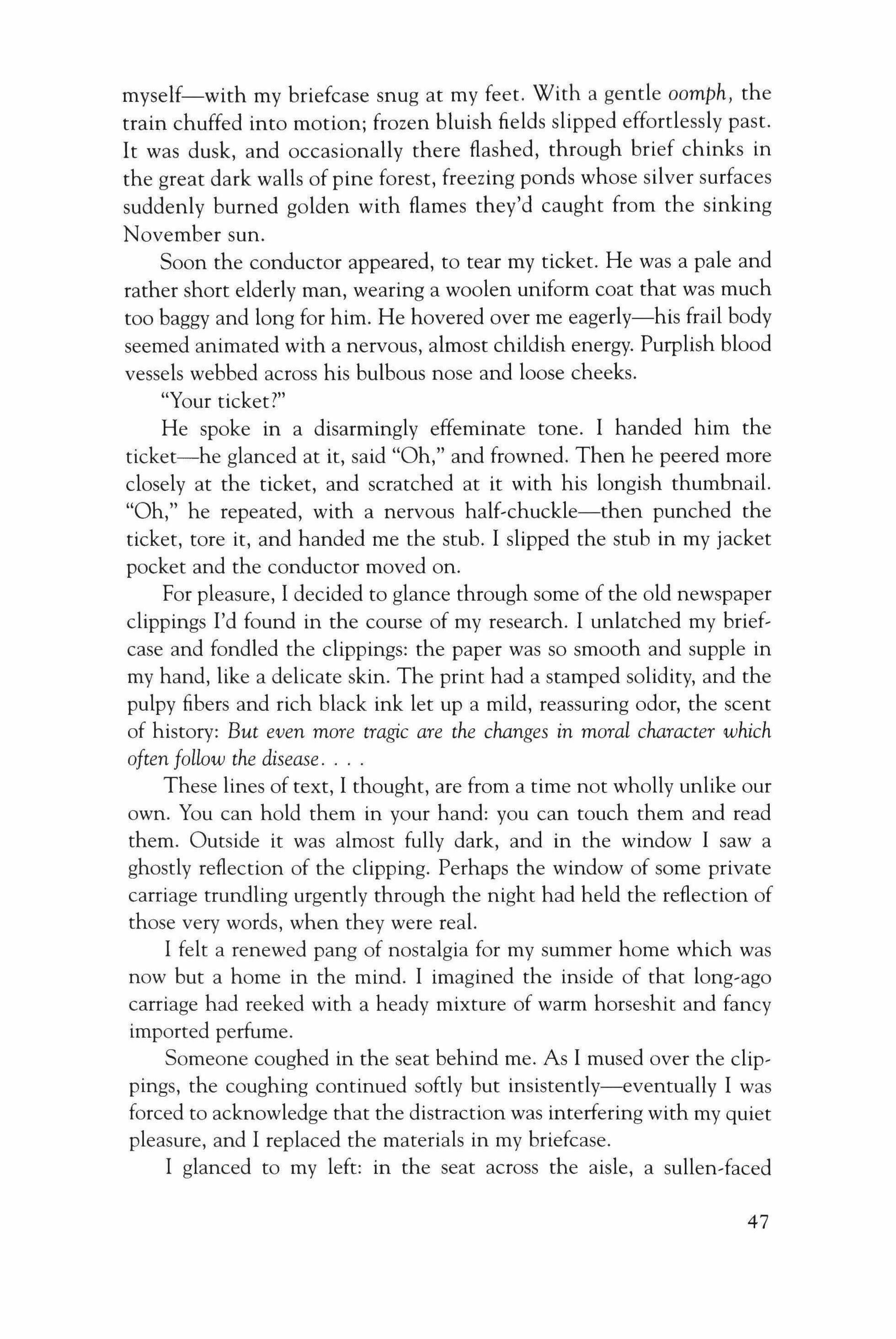
myself-with my briefcase snug at my feet. With a gentle oomph, the train chuffed into motion; frozen bluish fields slipped effortlessly past. It was dusk, and occasionally there flashed, through brief chinks in the great dark walls of pine forest, freezing ponds whose silver surfaces suddenly burned golden with flames they'd caught from the sinking November sun.
Soon the conductor appeared, to tear my ticket. He was a pale and rather short elderly man, wearing a woolen uniform coat that was much too baggy and long for him. He hovered over me eagerly-his frail body seemed animated with a nervous, almost childish energy. Purplish blood vessels webbed across his bulbous nose and loose cheeks.
"Your ticket?"
He spoke in a disarmingly effeminate tone. I handed him the ticket-he glanced at it, said "Oh," and frowned. Then he peered more closely at the ticket, and scratched at it with his longish thumbnail. "Oh," he repeated, with a nervous half-chuckle-then punched the ticket, tore it, and handed me the stub. I slipped the stub in my jacket pocket and the conductor moved on.
For pleasure, I decided to glance through some of the old newspaper clippings I'd found in the course of my research. I unlatched my briefcase and fondled the clippings: the paper was so smooth and supple in my hand, like a delicate skin. The print had a stamped solidity, and the pulpy fibers and rich black ink let up a mild, reassuring odor, the scent of history: But even more tragic are the changes in moral character which often follow the disease.
These lines of text, I thought, are from a time not wholly unlike our own. You can hold them in your hand: you can touch them and read them. Outside it was almost fully dark, and in the window I saw a ghostly reflection of the clipping. Perhaps the window of some private carriage trundling urgently through the night had held the reflection of those very words, when they were real.
I felt a renewed pang of nostalgia for my summer home which was now but a home in the mind. I imagined the inside of that long-ago carriage had reeked with a heady mixture of warm horseshit and fancy imported perfume.
Someone coughed in the seat behind me. As I mused over the clippings, the coughing continued softly but insistently-eventually I was forced to acknowledge that the distraction was interfering with my quiet pleasure, and I replaced the materials in my briefcase.
I glanced to my left: in the seat across the aisle, a sullen-faced
47

woman slouched against her window. She seemed enveloped within a shapeless, dull yellow sweatshirt-beneath which, to judge from her small but plainly pointed breasts, she wore no bra. Her eyes were shut, and her mouth hung partly open in a lazy grimace.
The coughing behind me continued. The coughs themselves seemed so weak and half-hearted that I began to believe the cougher wasn't trying hard enough, or was somehow perpetuating the tickle by virtue of the feathery coughs themselves. I imagined it must be some frail woman or aged person who couldn't (or perversely wouldn't) muster the strength to break through the mucous blockage and thereby conclude the fit.
I decided to venture off to the cafe car. After all, I was in need of a snack-and perhaps, by the time I returned, the coughing (or the whole person) might have managed to go away.
But when I stood up and began to move down the aisle, I saw that sitting in the seat behind me was not the pathetic valetudinarian I had pictured, but rather a squat, robust man with cropped black hair and a thick moustache. Although he scowled at me silently, he didn't appear to be doing any coughing.
Still-it seems unlikely that this, of all things, should have been my mistake.
On my approach to the cafe car I heard a loud voice and caught a strong whiff of the fumes of microwaved foods. Two, perhaps three passengers stood waiting in line for service. The man directly in front of me was tall and fit, with a crisp green polo shirt tucked into stone-colored pants, and a blow-dried sweep of chestnut hair. I was astonished to see that his left arm=-otherwise oddly well-tanned for the season-ended not in a hand but in a kind of smoothly fused nub. He held his arm bent at a ninety-degree angle (with the truncated forearm parallel to the floor) and impatiently tapped a suavely loafered foot. I wondered what he would order.
"Goddarnn unrecognizable," boomed the voice I'd heard from the entryway. I now saw that beyond the small group of customers, a corpulent man leant against the service counter. The elderly conductor who'd punched my ticket stood next to him, looking downward.
"Not something like a hunchback, or a clubbed foot," said the fat man. His voice was unusually loud and gregarious, with a folksy twang. He was bald, with a large moist forehead, and wore a conservative waistcoat against which his pneumatic torso strained. His shirtsleeves were
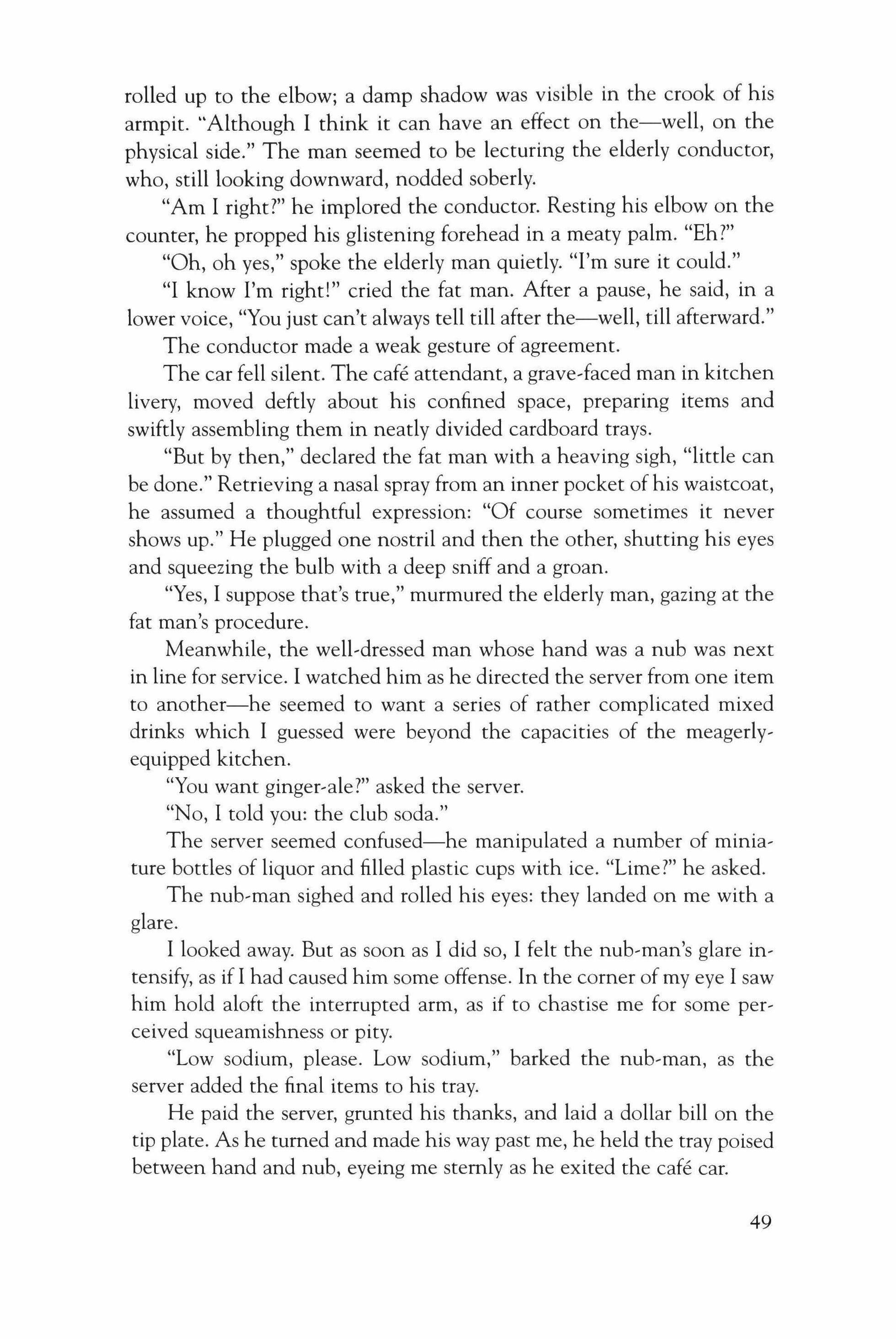
rolled up to the elbow; a damp shadow was visible in the crook of his armpit. "Although 1 think it can have an effect on the-well, on the physical side." The man seemed to be lecturing the elderly conductor, who, still looking downward, nodded soberly.
"Am 1 right?" he implored the conductor. Resting his elbow on the counter, he propped his glistening forehead in a meaty palm. "Eh?"
"Oh, oh yes," spoke the elderly man quietly. "I'm sure it could."
"I know I'm right!" cried the fat man. After a pause, he said, in a lower voice, "You just can't always tell till after the-well, till afterward."
The conductor made a weak gesture of agreement.
The car fell silent. The cafe attendant, a grave-faced man in kitchen livery, moved deftly about his confined space, preparing items and swiftly assembling them in neatly divided cardboard trays.
"But by then," declared the fat man with a heaving sigh, "little can be done." Retrieving a nasal spray from an inner pocket of his waistcoat, he assumed a thoughtful expression: "Of course sometimes it never shows up." He plugged one nostril and then the other, shutting his eyes and squeezing the bulb with a deep sniff and a groan.
"Yes, 1 suppose that's true," murmured the elderly man, gazing at the fat man's procedure.
Meanwhile, the well-dressed man whose hand was a nub was next in line for service. I watched him as he directed the server from one item to another-he seemed to want a series of rather complicated mixed drinks which 1 guessed were beyond the capacities of the meagerlyequipped kitchen.
"You want ginger-ale?" asked the server.
"No, I told you: the club soda."
The server seemed confused-he manipulated a number of miniature bottles of liquor and filled plastic cups with ice. "Lime?" he asked.
The nub-man sighed and rolled his eyes: they landed on me with a glare.
1 looked away. But as soon as 1 did so, I felt the nub-man's glare intensify, as if I had caused him some offense. In the corner of my eye I saw him hold aloft the interrupted arm, as if to chastise me for some perceived squeamishness or pity.
"Low sodium, please. Low sodium," barked the nub-man, as the server added the final items to his tray.
He paid the server, grunted his thanks, and laid a dollar bill on the tip plate. As he turned and made his way past me, he held the tray poised between hand and nub, eyeing me sternly as he exited the cafe car.
49
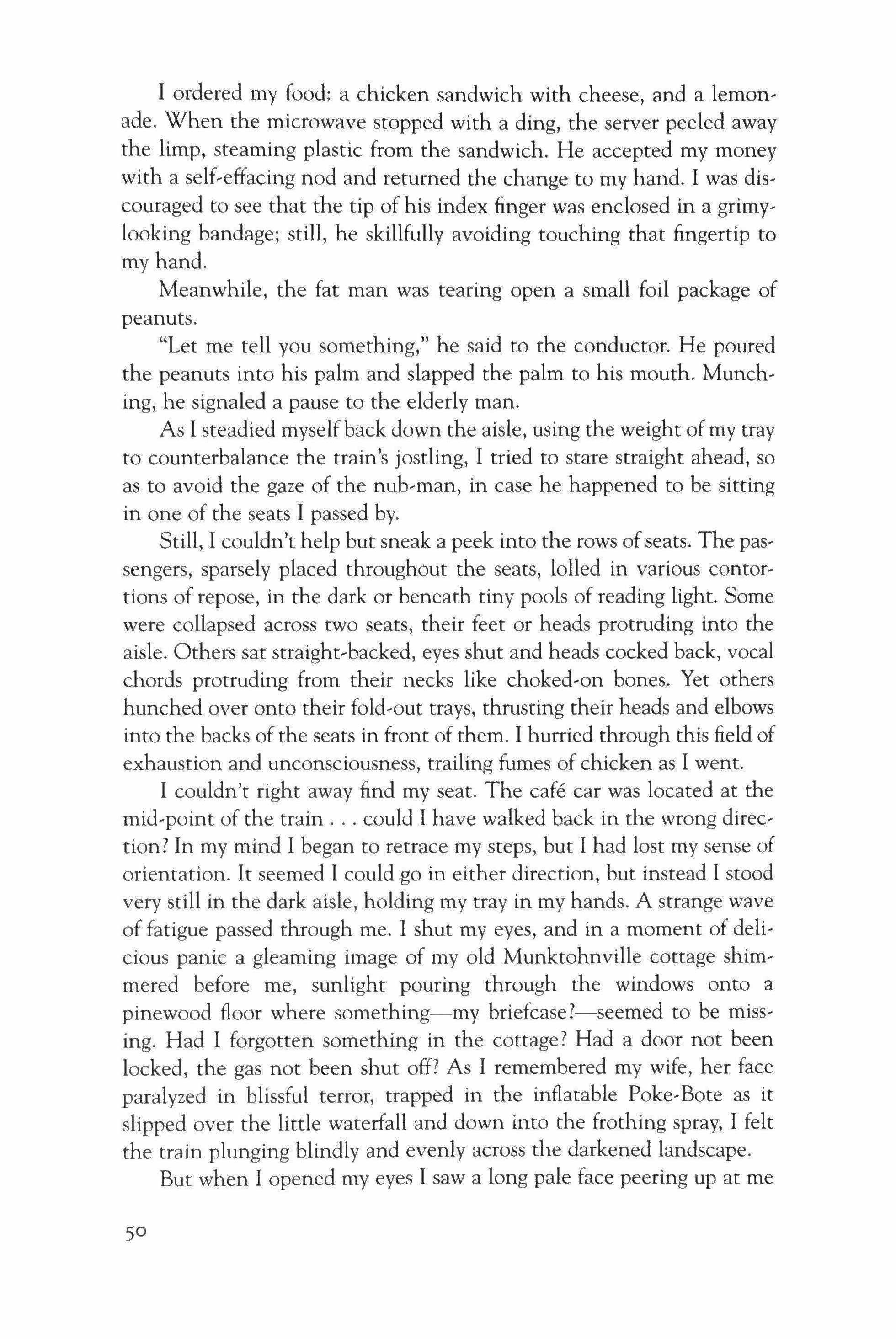
I ordered my food: a chicken sandwich with cheese, and a lemonade. When the microwave stopped with a ding, the server peeled away the limp, steaming plastic from the sandwich. He accepted my money with a self-effacing nod and returned the change to my hand. I was discouraged to see that the tip of his index finger was enclosed in a grimylooking bandage; still, he skillfully avoiding touching that fingertip to my hand.
Meanwhile, the fat man was tearing open a small foil package of peanuts.
"Let me tell you something," he said to the conductor. He poured the peanuts into his palm and slapped the palm to his mouth. Munching, he signaled a pause to the elderly man.
As I steadied myselfback down the aisle, using the weight of my tray to counterbalance the train's jostling, I tried to stare straight ahead, so as to avoid the gaze of the nub-man, in case he happened to be sitting in one of the seats I passed by.
Still, I couldn't help but sneak a peek into the rows of seats. The passengers, sparsely placed throughout the seats, lolled in various contortions of repose, in the dark or beneath tiny pools of reading light. Some were collapsed across two seats, their feet or heads protruding into the aisle. Others sat straight-backed, eyes shut and heads cocked back, vocal chords protruding from their necks like choked-on bones. Yet others hunched over onto their fold-out trays, thrusting their heads and elbows into the backs of the seats in front of them. I hurried through this field of exhaustion and unconsciousness, trailing fumes of chicken as I went.
I couldn't right away find my seat. The cafe car was located at the mid-point of the train could I have walked back in the wrong direction? In my mind I began to retrace my steps, but I had lost my sense of orientation. It seemed I could go in either direction, but instead I stood very still in the dark aisle, holding my tray in my hands. A strange wave of fatigue passed through me. I shut my eyes, and in a moment of delicious panic a gleaming image of my old Munktohnville cottage shimmered before me, sunlight pouring through the windows onto a pinewood floor where something-my briefcase?-seemed to be missing. Had I forgotten something in the cottage? Had a door not been locked, the gas not been shut off? As I remembered my wife, her face paralyzed in blissful terror, trapped in the inflatable Poke-Bote as it slipped over the little waterfall and down into the frothing spray, I felt the train plunging blindly and evenly across the darkened landscape.
But when I opened my eyes I saw a long pale face peering up at me
50
in the dimness. I was standing beside my own seat. There was a young retarded man sitting in it.
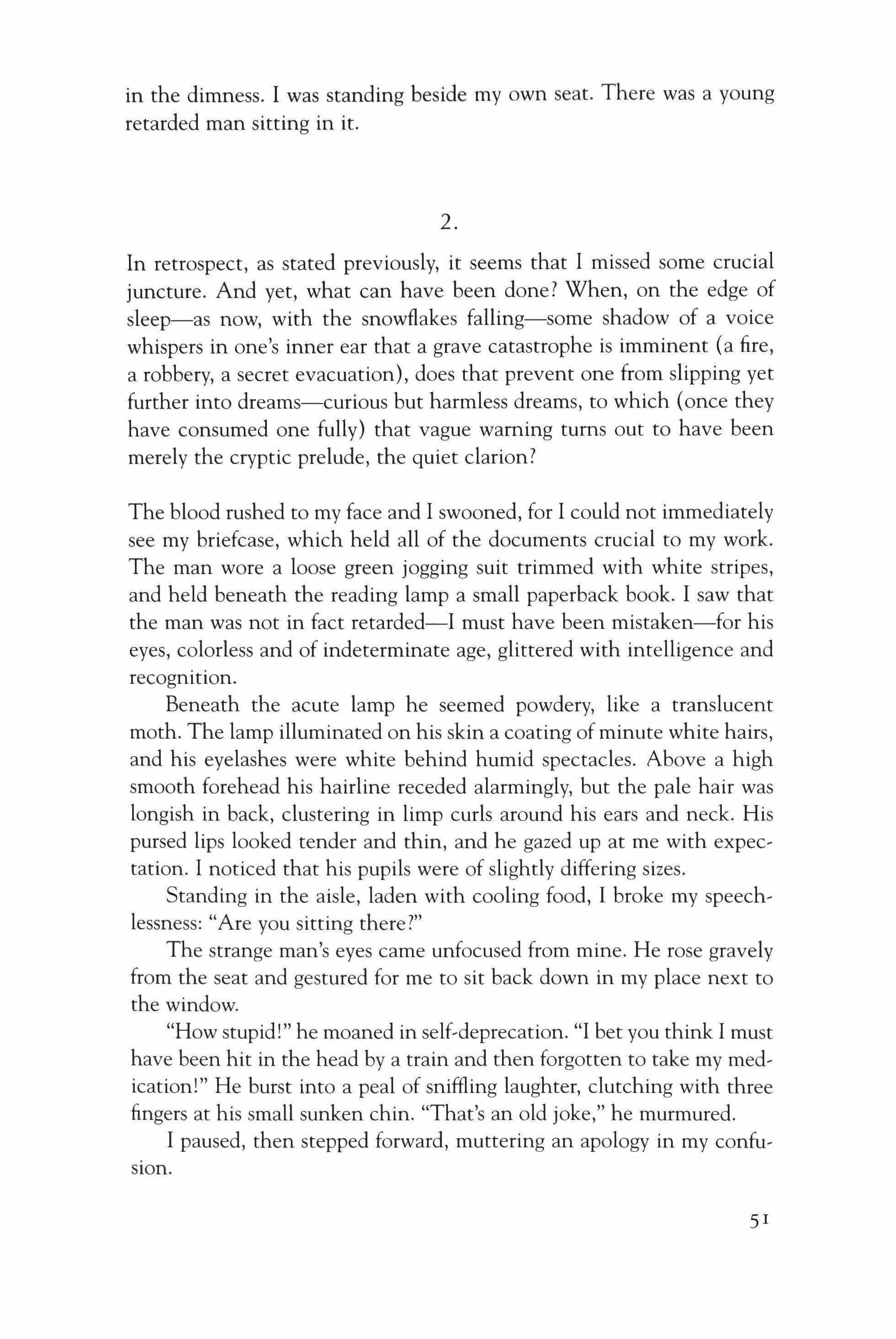
2.
In retrospect, as stated previously, it seems that I missed some crucial juncture. And yet, what can have been done? When, on the edge of sleep-as now, with the snowflakes falling-some shadow of a voice whispers in one's inner ear that a grave catastrophe is imminent (a fire, a robbery, a secret evacuation), does that prevent one from slipping yet further into dreams-curious but harmless dreams, to which (once they have consumed one fully) that vague warning turns out to have been merely the cryptic prelude, the quiet clarion?
The blood rushed to my face and I swooned, for I could not immediately see my briefcase, which held all of the documents crucial to my work. The man wore a loose green jogging suit trimmed with white stripes, and held beneath the reading lamp a small paperback book. I saw that the man was not in fact retarded-I must have been mistaken-for his eyes, colorless and of indeterminate age, glittered with intelligence and recognition.
Beneath the acute lamp he seemed powdery, like a translucent moth. The lamp illuminated on his skin a coating of minute white hairs, and his eyelashes were white behind humid spectacles. Above a high smooth forehead his hairline receded alarmingly, but the pale hair was longish in back, clustering in limp curls around his ears and neck. His pursed lips looked tender and thin, and he gazed up at me with expectation. I noticed that his pupils were of slightly differing sizes.
Standing in the aisle, laden with cooling food, I broke my speechlessness: "Are you sitting there?"
The strange man's eyes came unfocused from mine. He rose gravely from the seat and gestured for me to sit back down in my place next to the window.
"How stupid!" he moaned in self-deprecation. "I bet you think I must have been hit in the head by a train and then forgotten to take my medication!" He burst into a peal of sniffling laughter, clutching with three fingers at his small sunken chin. "That's an old joke," he murmured.
I paused, then stepped forward, muttering an apology in my confusion.

"Hot snacks," noted the man, oozing past me {almost through me} and re-seating himself immediately to my left.
I gathered together my things, concealing my aggravation, and hunched against the window. I released the fold-down tray, anxious to begin eating my modest meal, though somewhat vexed by my unexpected seatmate. Frankly I felt uncomfortable that he'd been left alone with my briefcase. I mulled over a plan to inconspicuously check over it-to make sure everything was in order-as soon as I'd finished eating.
The chicken sandwich was bland but warm. I ate quickly and mechanically, regretting the man's presence, and wiped my mouth with a napkin. Outside the window a cold moon fled through the dull purplish sky, keeping pace with the train over empty black-and-white towns.
"Clume," spoke the man sitting next to me. I turned: he extended a hand at me. "I'm Clume."
I wiped off my fingers, ruefully accepting his moist, limp grip, and told him my name.
"You know," he said, "that was pretty unfair. That scene back there in the cafe car."
"Scene?"
"You know, with the-." Clume balled his fist and retracted it into the sleeve of his warm-up jacket.
My face went hot with embarrassment. "You're referring to Clume nodded knowingly. "It was like he imposed his own selfconsciousness on you. Not your fault about the-you know very bad taste. Speaking of which-." He gestured at my partially eaten sandwich. I searched my memory, but was almost sure I hadn't seen this person"Clume"-in the cafe car with me. There had been the nub-man, the conductor and his corpulent friend, and the few other passengers in line
"I just wanted to express my sympathies," said Clume. Then, in an arch tone: "I tend to notice the little things." He winked.
Clume's unwrinkled skin gave off a strong medicinal odor, as if he'd been rubbing himself with lotions or salves. He began rummaging in a light cloth tote bag near his feet, eventually producing what looked like some kind of oversized, golden-brown baked dumpling, like a calzone or knish, enclosed in a clear plastic deli container. Clume popped open the container; the item smelled delicious.
"You sure didn't buy that on this train," I remarked.
Clume looked puzzled. "I didn't?"
"Back there," I said, gesturing in the direction of the cafe car. "I never saw anything like that on the menu."
52
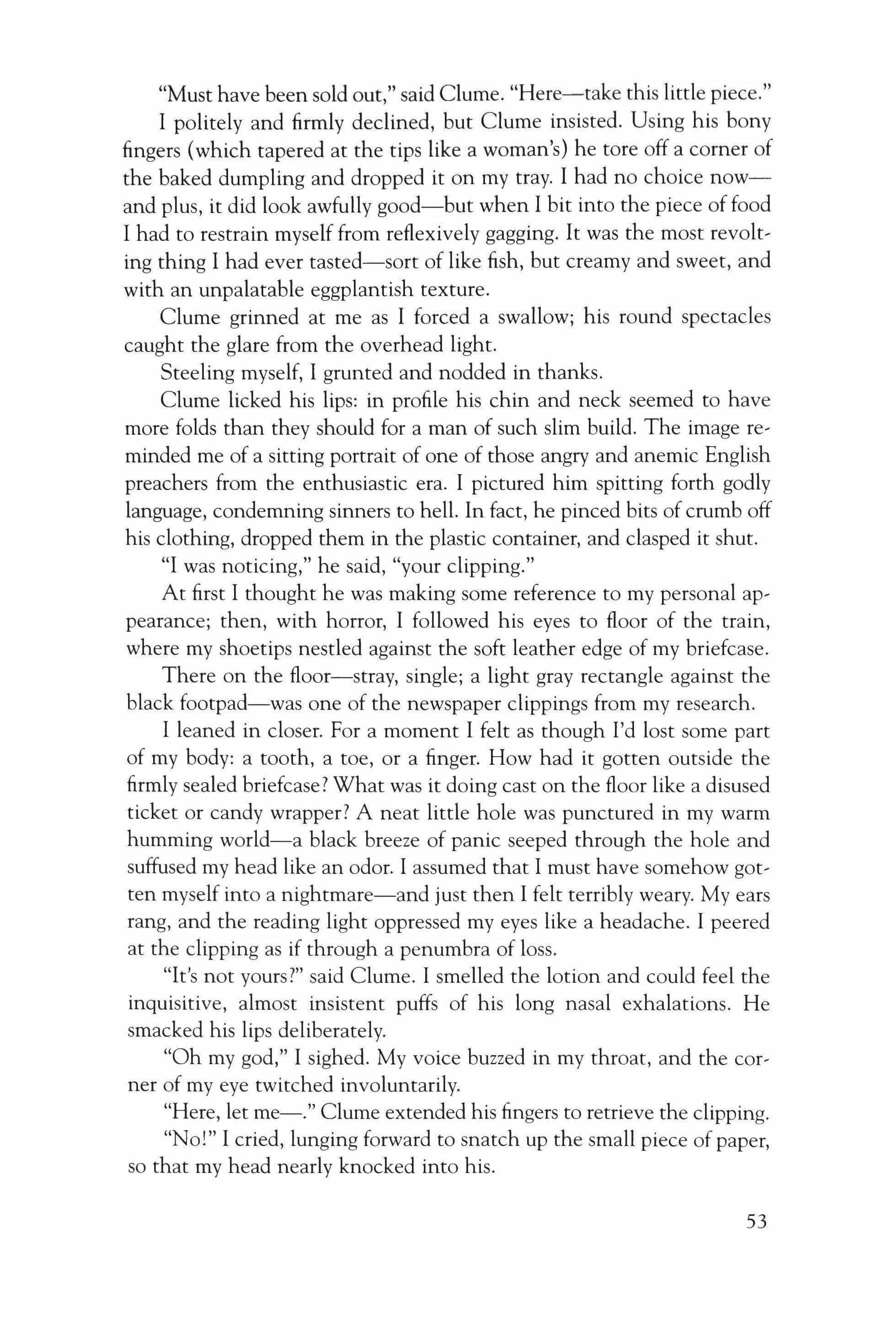
"Must have been sold out," said Clume. "Here-take this little piece."
I politely and firmly declined, but Clume insisted. Using his bony fingers (which tapered at the tips like a woman's) he tore off a corner of the baked dumpling and dropped it on my tray. I had no choice nowand plus, it did look awfully good-but when I bit into the piece of food I had to restrain myself from reflexively gagging. It was the most revolting thing I had ever tasted-sort of like fish, but creamy and sweet, and with an unpalatable eggplantish texture.
Clume grinned at me as I forced a swallow; his round spectacles caught the glare from the overhead light.
Steeling myself, I grunted and nodded in thanks.
Clume licked his lips: in profile his chin and neck seemed to have more folds than they should for a man of such slim build. The image reminded me of a sitting portrait of one of those angry and anemic English preachers from the enthusiastic era. I pictured him spitting forth godly language, condemning sinners to hell. In fact, he pinced bits of crumb off his clothing, dropped them in the plastic container, and clasped it shut.
"I was noticing," he said, "your clipping."
At first I thought he was making some reference to my personal appearance; then, with horror, I followed his eyes to floor of the train, where my shoetips nestled against the soft leather edge of my briefcase.
There on the floor-stray, single; a light gray rectangle against the black footpad-was one of the newspaper clippings from my research.
I leaned in closer. For a moment I felt as though I'd lost some part of my body: a tooth, a toe, or a finger. How had it gotten outside the firmly sealed briefcase? What was it doing cast on the floor like a disused ticket or candy wrapper? A neat little hole was punctured in my warm humming world-a black breeze of panic seeped through the hole and suffused my head like an odor. I assumed that I must have somehow gotten myself into a nightmare-and just then I felt terribly weary. My ears rang, and the reading light oppressed my eyes like a headache. I peered at the clipping as if through a penumbra of loss.
"It's not yours?" said Clume. I smelled the lotion and could feel the inquisitive, almost insistent puffs of his long nasal exhalations. He smacked his lips deliberately.
"Oh my god," I sighed. My voice buzzed in my throat, and the corner of my eye twitched involuntarily.
"Here, let me-." Clume extended his fingers to retrieve the clipping. "No!" I cried, lunging forward to snatch up the small piece of paper, so that my head nearly knocked into his.
53
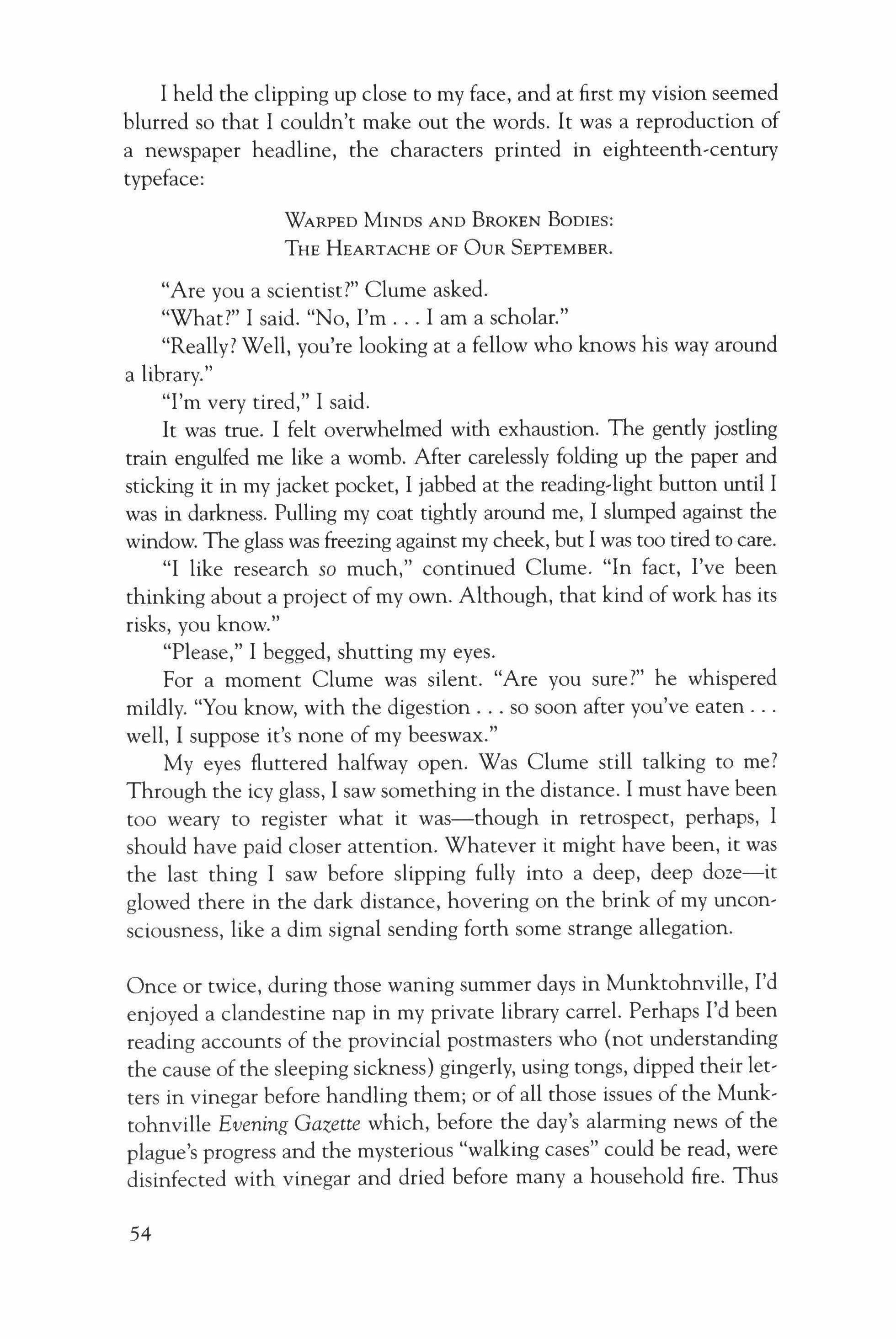
I held the clipping up close to my face, and at first my vision seemed blurred so that I couldn't make out the words. It was a reproduction of a newspaper headline, the characters printed in eighteenth-century typeface:
WARPED MINDS AND BROKEN BODIES: THE HEARTACHE OF OUR SEPTEMBER.
"Are you a scientist!" Clume asked.
"What!" I said. "No, I'm I am a scholar."
"Really! Well, you're looking at a fellow who knows his way around a library."
"I'm very tired," I said.
It was true. I felt overwhelmed with exhaustion. The gently jostling train engulfed me like a womb. After carelessly folding up the paper and sticking it in my jacket pocket, I jabbed at the reading-light button until I was in darkness. Pulling my coat tightly around me, I slumped against the window. The glass was freezing against my cheek, but I was too tired to care.
"I like research so much," continued Clume. "In fact, I've been thinking about a project of my own. Although, that kind of work has its risks, you know."
"Please," I begged, shutting my eyes.
For a moment Clume was silent. "Are you sure?" he whispered mildly. "You know, with the digestion so soon after you've eaten well, I suppose it's none of my beeswax."
My eyes fluttered halfway open. Was Clume still talking to me? Through the icy glass, I saw something in the distance. I must have been too weary to register what it was-though in retrospect, perhaps, I should have paid closer attention. Whatever it might have been, it was the last thing I saw before slipping fully into a deep, deep doze-it glowed there in the dark distance, hovering on the brink of my unconsciousness, like a dim signal sending forth some strange allegation.
Once or twice, during those waning summer days in Munktohnville, I'd enjoyed a clandestine nap in my private library carrel. Perhaps I'd been reading accounts of the provincial postmasters who (not understanding the cause of the sleeping sickness) gingerly, using tongs, dipped their letters in vinegar before handling them; or of all those issues of the Munktohnville Evening Gazette which, before the day's alarming news of the plague's progress and the mysterious "walking cases" could be read, were disinfected with vinegar and dried before many a household fire. Thus
54

would I slip off, my inner-ears softly filled with the imagined rustlings of vinegar-cleansed stories crisply crinkling on the hearth, that warm crackle of countrified superstition which wafted down the corridors of history to charm my drowsy head.
My current dream must have drawn me back to those recent yet faraway days, for I found myself seated over a large volume just retrieved for me. Oddly, the tome was still in its packaging: a wispy, translucent membrane which must have escaped the attention of the librarian. I hated to mar the delicate skin, to peel at it, but I was eager to look at the words inside, words that would help me to understand the terrible and unknown sickness, and to adumbrate the narrative which would form the evidence for my book. I used my fingernails, vaguely fearing that I might be wrecking some precious thing, and glanced about warily. The membrane/wrapping came away unevenly, uncleanly, but I was firmly resolved in my research, and rolled the moist bits into hard gray pellets, quickly flicking them under the table. I had just released the cover and was opening to the book's first pages when I sensed an unfamiliar presence, spied a glittering eye-and there was Clume, snooping among the stacks; Clume, disorganizing my information while I was distracted (0, that complicit librarianl) with the unpleasant packaging. The silence was punctuated by the weak burble of his flabby throat clearing; the odor of salves was unmistakable. I leapt from my seat, heart pounding, and caught Clume ducking into a restroom, avoiding eye contact yet obviously aware of my presence, feigning nonchalance yet hurrying in arrogant, effete little steps, a robust volume tucked upside-down in the crook of his arm
A clot of anxiety stopped up my chest, and I woke to a bony finger prodding me gently in the ribs.
It was Clume. I heard the whistling in his nostrils.
"I like the bones in your face," he said. "They settle nicely when you snooze. It reminds me of my cousin."
My head throbbed; my throat felt dry and constricted.
"Why isn't the train moving?" I asked.
Clume peered at me. "The train?"
In the wintry darkness outside the window, a cluster of lights, like flashlights or portable lamps, bobbed in the near distance.
"Did something happen out there?" I inquired.
Clume leaned past me to look out the window; his pale strands of hair nearly grazed my nostrils.
"Hmm," he mused. "I don't know what that was. Some kind of accident?" He leaned back and settled his hands in his lap.
55
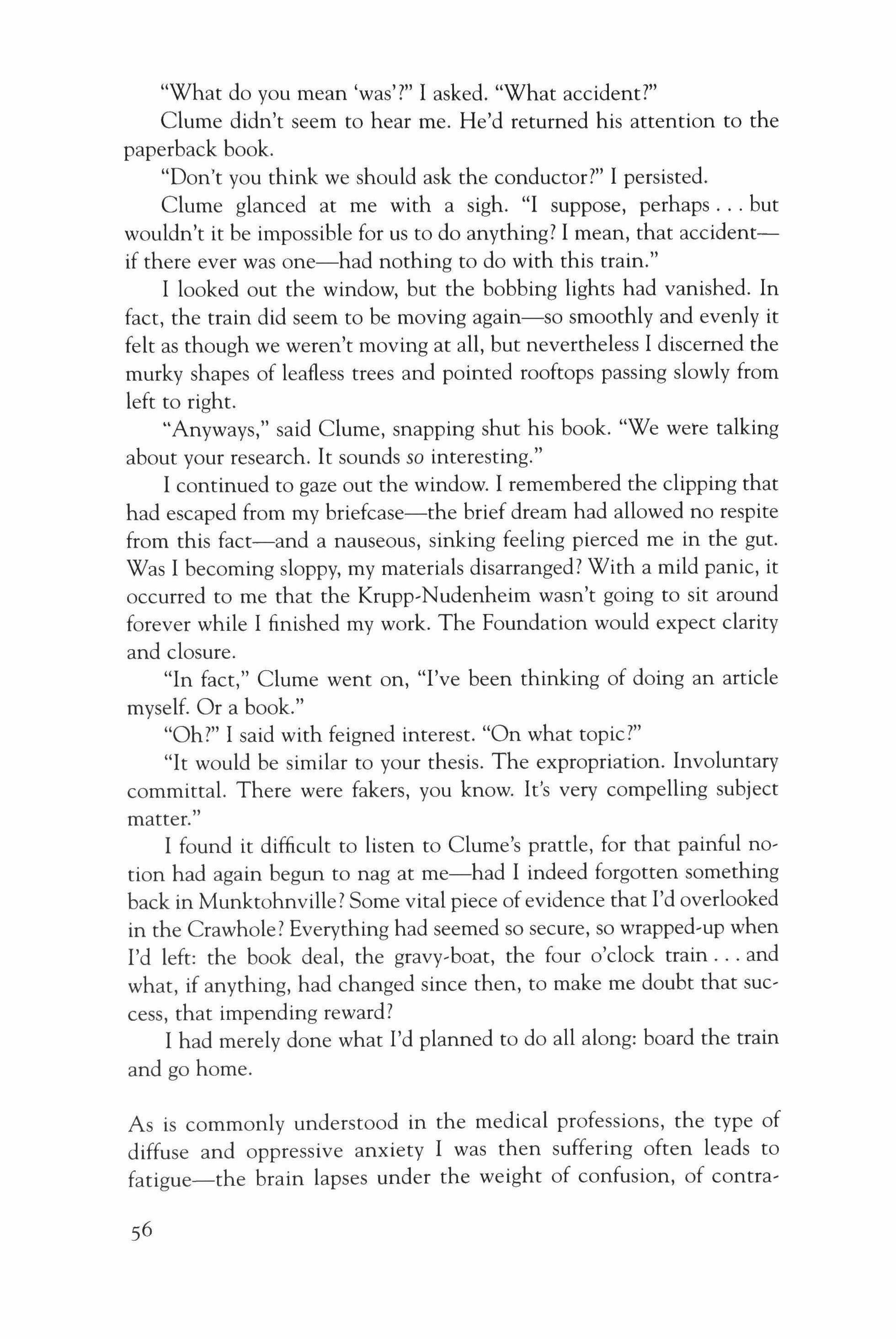
"What do you mean 'was'?" I asked. "What accident?"
Clume didn't seem to hear me. He'd returned his attention to the paperback book.
"Don't you think we should ask the conductor?" I persisted.
Clume glanced at me with a sigh. "I suppose, perhaps but wouldn't it be impossible for us to do anything? I mean, that accidentif there ever was one-had nothing to do with this train."
I looked out the window, but the bobbing lights had vanished. In fact, the train did seem to be moving again-so smoothly and evenly it felt as though we weren't moving at all, but nevertheless I discerned the murky shapes of leafless trees and pointed rooftops passing slowly from left to right.
"Anyways," said Clume, snapping shut his book. "We were talking about your research. It sounds so interesting."
I continued to gaze out the window. I remembered the clipping that had escaped from my briefcase-the brief dream had allowed no respite from this fact-and a nauseous, sinking feeling pierced me in the gut. Was I becoming sloppy, my materials disarranged? With a mild panic, it occurred to me that the Krupp-Nudenheirn wasn't going to sit around forever while I finished my work. The Foundation would expect clarity and closure.
"In fact," Clume went on, "I've been thinking of doing an article myself. Or a book."
"Oh?" I said with feigned interest. "On what topic?"
"It would be similar to your thesis. The expropriation. Involuntary committal. There were fakers, you know. It's very compelling subject matter."
I found it difficult to listen to Clume's prattle, for that painful notion had again begun to nag at me-had I indeed forgotten something back in Munktohnville? Some vital piece ofevidence that I'd overlooked in the Crawhole? Everything had seemed so secure, so wrapped-up when I'd left: the book deal, the gravy-boat, the four o'clock train and what, if anything, had changed since then, to make me doubt that success, that impending reward?
I had merely done what I'd planned to do all along: board the train and go home.
As is commonly understood in the medical professions, the type of diffuse and oppressive anxiety I was then suffering often leads to fatigue-the brain lapses under the weight of confusion, of contra-
56
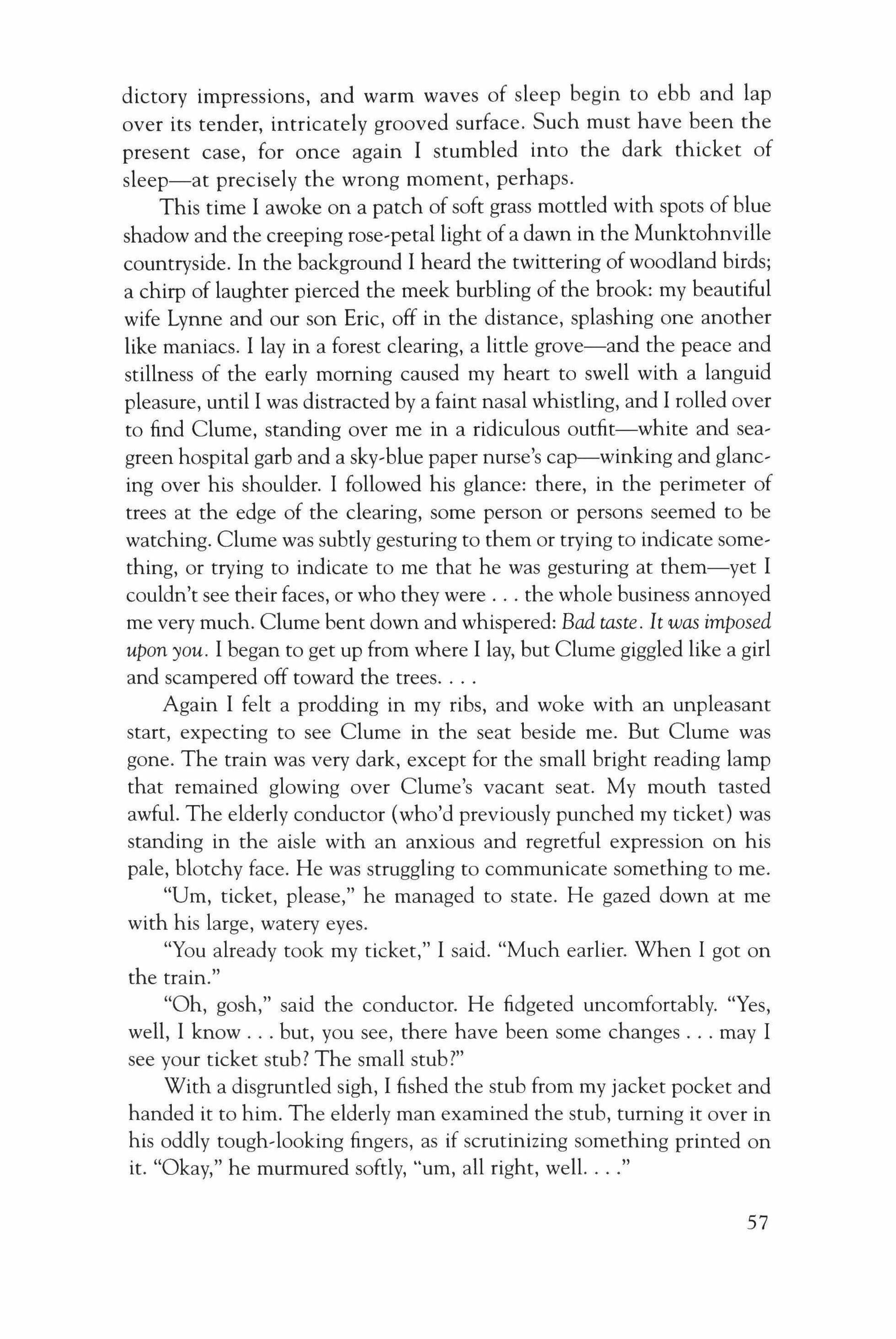
dictory impressions, and warm waves of sleep begin to ebb and lap over its tender, intricately grooved surface. Such must have been the present case, for once again I stumbled into the dark thicket of sleep-at precisely the wrong moment, perhaps.
This time I awoke on a patch of soft grass mottled with spots of blue shadow and the creeping rose-petal light of a dawn in the Munktohnville countryside. In the background I heard the twittering of woodland birds; a chirp of laughter pierced the meek burbling of the brook: my beautiful wife Lynne and our son Eric, off in the distance, splashing one another like maniacs. I lay in a forest clearing, a little grove-and the peace and stillness of the early morning caused my heart to swell with a languid pleasure, until I was distracted by a faint nasal whistling, and I rolled over to find Clume, standing over me in a ridiculous outfit-white and seagreen hospital garb and a sky-blue paper nurse's cap-winking and glancing over his shoulder. I followed his glance: there, in the perimeter of trees at the edge of the clearing, some person or persons seemed to be watching. Clume was subtly gesturing to them or trying to indicate something, or trying to indicate to me that he was gesturing at them-yet I couldn't see their faces, or who they were the whole business annoyed me very much. Clume bent down and whispered: Bad taste. It was imposed upon you. I began to get up from where I lay, but Clume giggled like a girl and scampered off toward the trees
Again I felt a prodding in my ribs, and woke with an unpleasant start, expecting to see Clume in the seat beside me. But Clume was gone. The train was very dark, except for the small bright reading lamp that remained glowing over Clume's vacant seat. My mouth tasted awful. The elderly conductor {who'd previously punched my ticket} was standing in the aisle with an anxious and regretful expression on his pale, blotchy face. He was struggling to communicate something to me.
"Urn, ticket, please," he managed to state. He gazed down at me with his large, watery eyes.
"You already took my ticket," I said. "Much earlier. When I got on the train."
"Oh, gosh," said the conductor. He fidgeted uncomfortably. "Yes, well, I know but, you see, there have been some changes may I see your ticket stub? The small stub?"
With a disgruntled sigh, I fished the stub from my jacket pocket and handed it to him. The elderly man examined the stub, turning it over in his oddly tough-looking fingers, as if scrutinizing something printed on it. "Okay," he murmured softly, "urn, all right, well.
57

"Is something wrong with this train?" I asked.
The conductor looked shocked. "Oh my!" he trembled. "Oh, of course not. It's only the train has been delayed. So, you know, in the meantime, because of the delay, you see, we won't be able to-."
"What delay?" I said indignantly, raising my voice more than I would have liked. "Does this have to do with an accident? There was a man, sitting in the seat next to me, I don't know whether you'd taken his ticket, but he must have he boarded late, or I somehow lost my train of thought.
The conductor patiently, almost pityingly, attended my rambling interrogation. Then he said-now in a kind of rapid cheerful monotone, as if repeating some official statement from memory-"Fortunately, because of your class of ticket, we are happy to provide you with a special accommodation for the length of tonight's trip."
"Accommodation?" I said.
"A Qvcompartment," he explained. "That's, well, a Quality Cornpartment."
"Compartment?"
"In, um, the sleeping car. Because of, you know, the delay."
"How long could the delay possibly be?" I demanded. "I certainly did not purchase a ticket for an overnight trip."
"Oh, oh dear," stammered the elderly man. "We like to please all of our customers. I, um Here he bent down close to my face, and lowered his voice. There was a babyish smell on his breath, like apple juice or custard. "I think you'll find the accommodation quite pleasant."
"I'm hardly concerned with that. As far as I know, this is not a sleeper train. What I wish to know, immediately, is when this train is expected to arrive."
"Oh, well," he continued, "a determination will be made, you know, in the morning. Or perhaps even sooner, sometime tonight. All passengers in the Q receive a complimentary muffin, as well as a Preferred Traveler's Kit."
"Couldn't I be let off at one of the intermediary stops? Surely there's another train on this route."
The elderly man licked his thin lips and smiled at me sadly. "I'm afraid there's only, um, the one stop," he spoke. "At the end. And the train, you know, just doesn't go any faster."
58
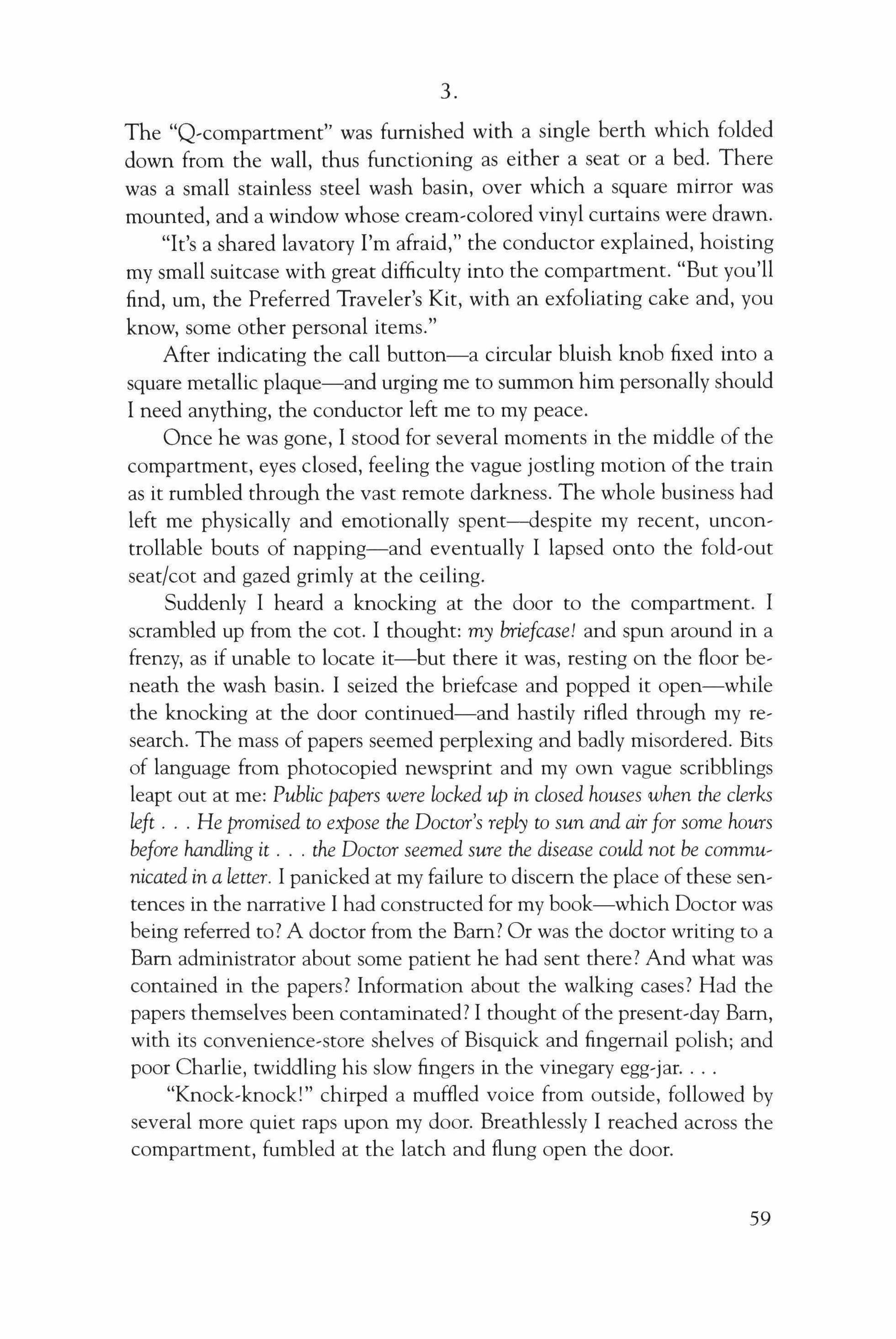
3.
The "Qvcompartment" was furnished with a single berth which folded down from the wall, thus functioning as either a seat or a bed. There was a small stainless steel wash basin, over which a square mirror was mounted, and a window whose cream-colored vinyl curtains were drawn.
"It's a shared lavatory I'm afraid," the conductor explained, hoisting my small suitcase with great difficulty into the compartment. "But you'll find, um, the Preferred Traveler's Kit, with an exfoliating cake and, you know, some other personal items."
After indicating the call button-a circular bluish knob fixed into a square metallic plaque-and urging me to summon him personally should I need anything, the conductor left me to my peace.
Once he was gone, I stood for several moments in the middle of the compartment, eyes closed, feeling the vague jostling motion of the train as it rumbled through the vast remote darkness. The whole business had left me physically and emotionally spent--despite my recent, uncontrollable bouts of napping-and eventually I lapsed onto the fold-out seat/cot and gazed grimly at the ceiling.
Suddenly I heard a knocking at the door to the compartment. I scrambled up from the cot. I thought: my briefcase! and spun around in a frenzy, as if unable to locate it-but there it was, resting on the floor beneath the wash basin. I seized the briefcase and popped it open-while the knocking at the door continued-and hastily rifled through my research. The mass of papers seemed perplexing and badly misordered. Bits of language from photocopied newsprint and my own vague scribblings leapt out at me: Public papers were locked up in closed houses when the clerks left He promised to expose the Doctor's reply to sun and air for some hours before handling it the Doctor seemed sure the disease could not be communicated in a letter. I panicked at my failure to discern the place of these sentences in the narrative I had constructed for my book-which Doctor was being referred to? A doctor from the Bam? Or was the doctor writing to a Bam administrator about some patient he had sent there? And what was contained in the papers? Information about the walking cases? Had the papers themselves been contaminated? I thought of the present-day Bam, with its convenience-store shelves of Bisquick and fingernail polish; and poor Charlie, twiddling his slow fingers in the vinegary egg-jar "Knock-knock!" chirped a muffled voice from outside, followed by several more quiet raps upon my door. Breathlessly I reached across the compartment, fumbled at the latch and flung open the door.
59
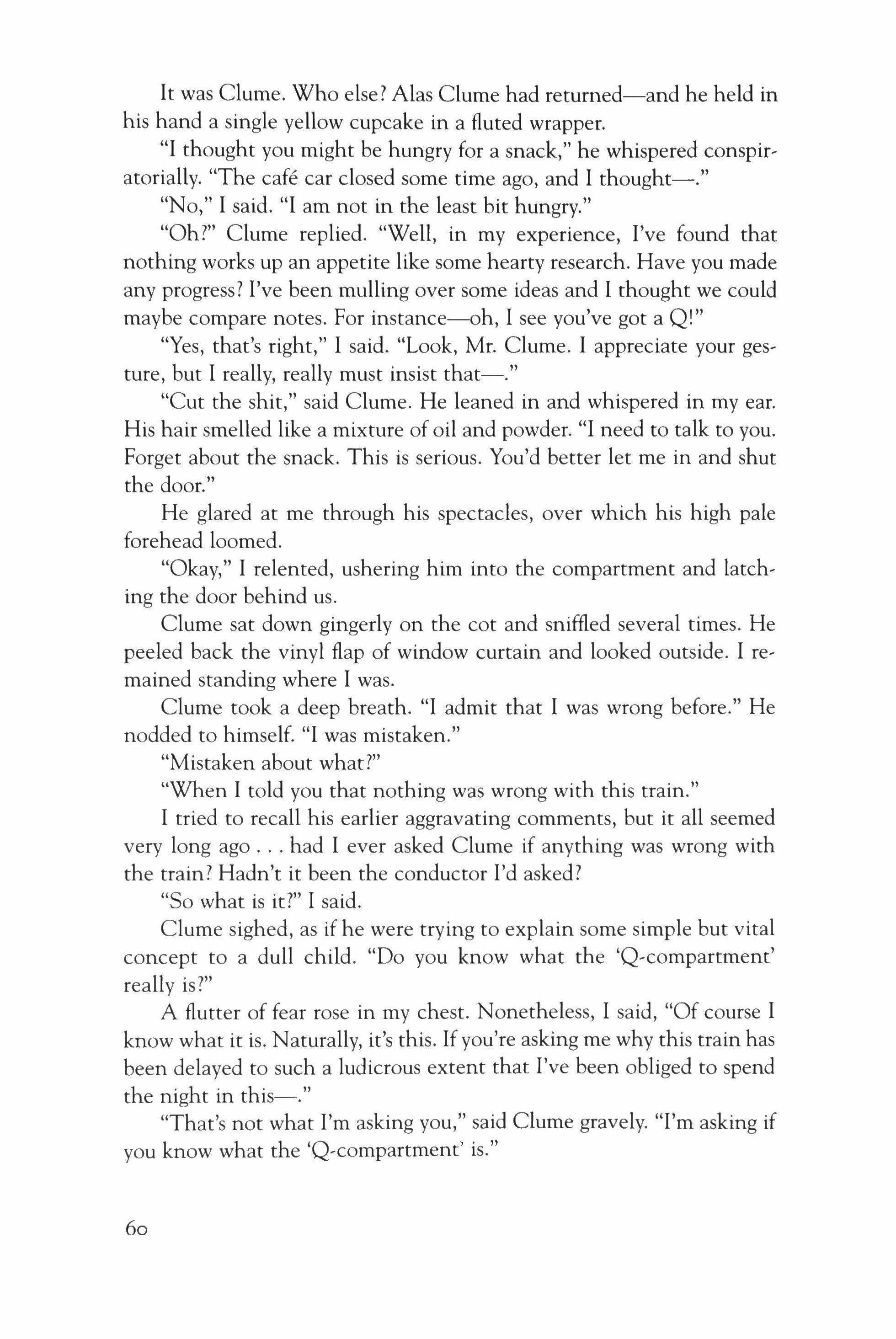
It was Clume. Who else? Alas Clume had returned-and he held in his hand a single yellow cupcake in a fluted wrapper.
"I thought you might be hungry for a snack," he whispered conspiratorially. "The cafe car closed some time ago, and I thought-."
"No," I said. "I am not in the least bit hungry."
"Oh?" Clume replied. "Well, in my experience, I've found that nothing works up an appetite like some hearty research. Have you made any progress? I've been mulling over some ideas and I thought we could maybe compare notes. For instance-oh, I see you've got a Q!"
"Yes, that's right," I said. "Look, Mr. Clume. I appreciate your gesture, but I really, really must insist that-."
"Cut the shit," said Clume. He leaned in and whispered in my ear. His hair smelled like a mixture of oil and powder. "I need to talk to you. Forget about the snack. This is serious. You'd better let me in and shut the door."
He glared at me through his spectacles, over which his high pale forehead loomed.
"Okay," I relented, ushering him into the compartment and latching the door behind us.
Clume sat down gingerly on the cot and sniffled several times. He peeled back the vinyl flap of window curtain and looked outside. I remained standing where I was.
Clume took a deep breath. "I admit that I was wrong before." He nodded to himself. "I was mistaken."
"Mistaken about what?"
"When I told you that nothing was wrong with this train." I tried to recall his earlier aggravating comments, but it all seemed very long ago had I ever asked Clume if anything was wrong with the train? Hadn't it been the conductor I'd asked?
"So what is it?" I said.
Clume sighed, as if he were trying to explain some simple but vital concept to a dull child. "Do you know what the 'Q-compartment' really is?"
A flutter of fear rose in my chest. Nonetheless, I said, "Of course I know what it is. Naturally, it's this. Ifyou're asking me why this train has been delayed to such a ludicrous extent that I've been obliged to spend the night in this-."
"That's not what I'm asking you," said Clume gravely. "I'm asking if you know what the 'Q-compartment' is."
60
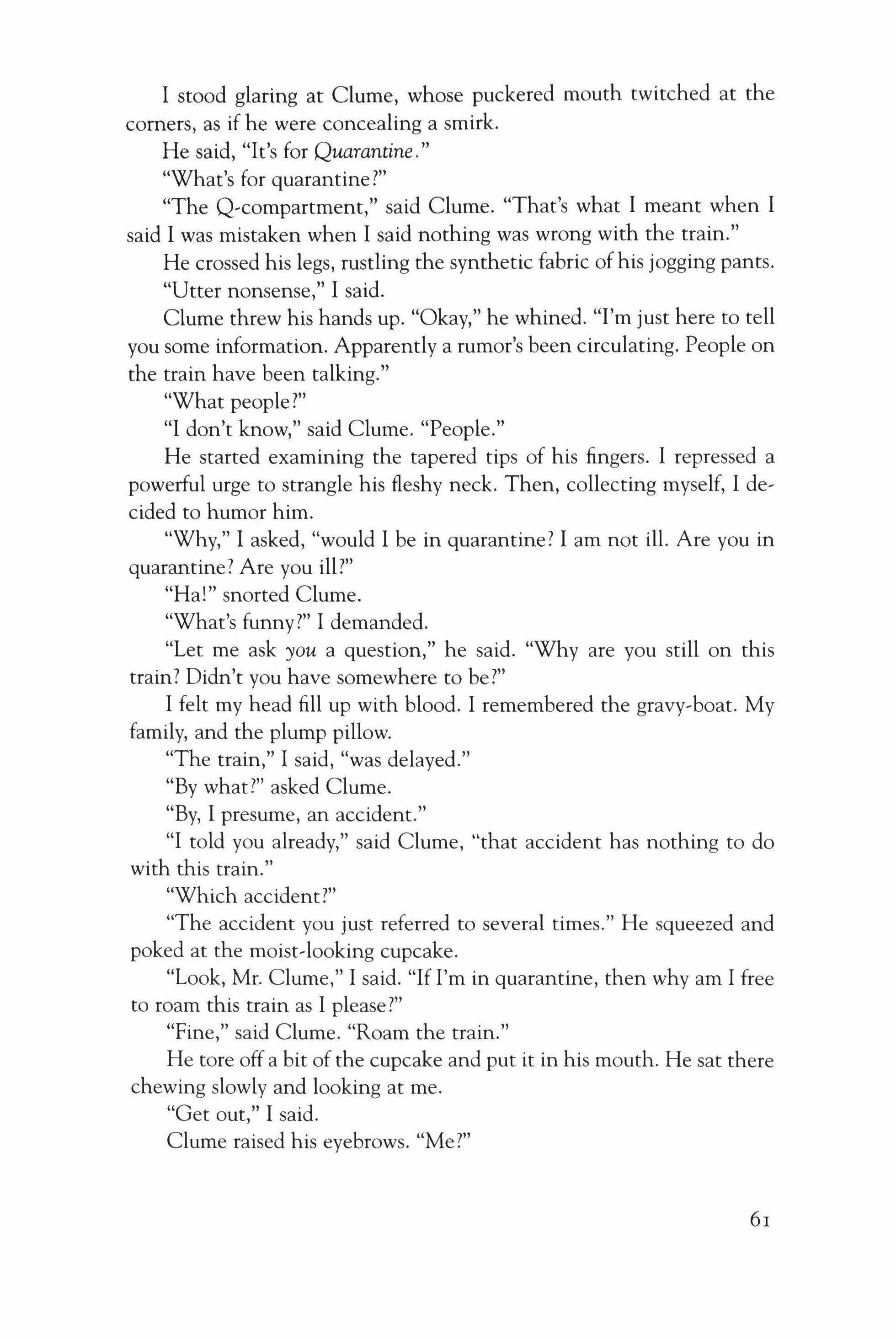
I stood glaring at Clume, whose puckered mouth twitched at the corners, as if he were concealing a smirk.
He said, "It's for Quarantine."
"What's for quarantine?"
"The Q-compartment," said Clume. "That's what I meant when I said I was mistaken when I said nothing was wrong with the train."
He crossed his legs, rustling the synthetic fabric of his jogging pants.
"Utter nonsense," I said.
Clume threw his hands up. "Okay," he whined. "I'm just here to tell you some information. Apparently a rumor's been circulating. People on the train have been talking."
"What people?"
"I don't know," said Clume. "People."
He started examining the tapered tips of his fingers. I repressed a powerful urge to strangle his fleshy neck. Then, collecting myself, I decided to humor him.
"Why," I asked, "would I be in quarantine? I am not ill. Are you in quarantine? Are you ill?"
"Ha!" snorted Clume.
"What's funny?" I demanded.
"Let me ask you a question," he said. "Why are you still on this train? Didn't you have somewhere to be?"
I felt my head fill up with blood. I remembered the gravy-boat. My family, and the plump pillow.
"The train," I said, "was delayed."
"By what?" asked Clume.
"By, I presume, an accident."
"I told you already," said Clume, "that accident has nothing to do with this train."
"Which accident?"
"The accident you just referred to several times." He squeezed and poked at the moist-looking cupcake.
"Look, Mr. Clume," I said. "If I'm in quarantine, then why am I free to roam this train as I please?"
"Fine," said Clume. "Roam the train."
He tore off a bit of the cupcake and put it in his mouth. He sat there chewing slowly and looking at me.
"Get out," I said.
Clume raised his eyebrows. "Me?"
61
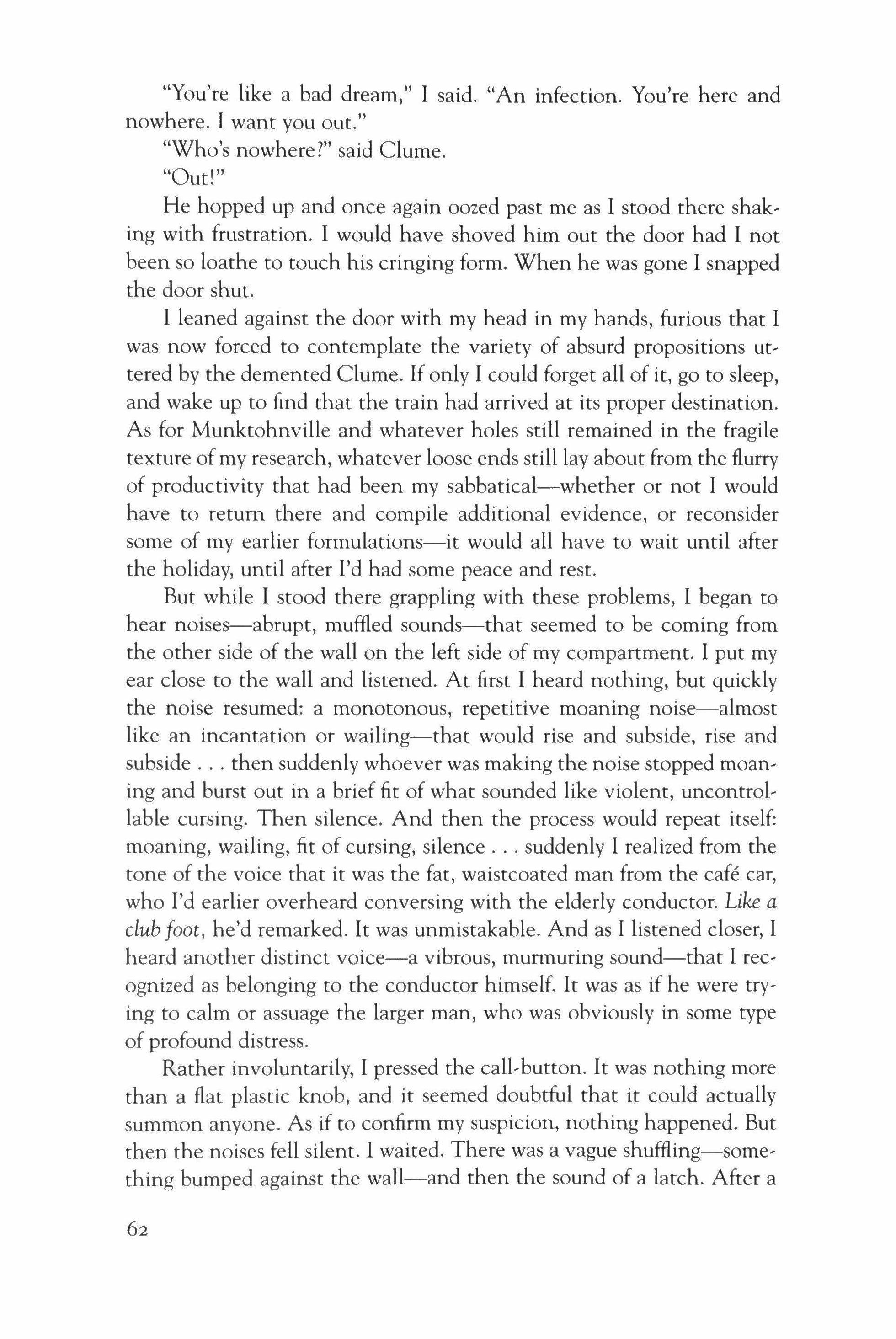
"You're like a bad dream," I said. "An infection. You're here and nowhere. I want you out."
"Who's nowhere?" said Clume.
"Out!"
He hopped up and once again oozed past me as I stood there shaking with frustration. I would have shoved him out the door had I not been so loathe to touch his cringing form. When he was gone I snapped the door shut.
I leaned against the door with my head in my hands, furious that I was now forced to contemplate the variety of absurd propositions uttered by the demented Clume. If only I could forget all of it, go to sleep, and wake up to find that the train had arrived at its proper destination. As for Munktohnville and whatever holes still remained in the fragile texture of my research, whatever loose ends still lay about from the flurry of productivity that had been my sabbatical-whether or not I would have to return there and compile additional evidence, or reconsider some of my earlier formulations-it would all have to wait until after the holiday, until after I'd had some peace and rest.
But while I stood there grappling with these problems, I began to hear noises-abrupt, muffled sounds-that seemed to be coming from the other side of the wall on the left side of my compartment. I put my ear close to the wall and listened. At first I heard nothing, but quickly the noise resumed: a monotonous, repetitive moaning noise-almost like an incantation or wailing-that would rise and subside, rise and subside then suddenly whoever was making the noise stopped moaning and burst out in a brief fit of what sounded like violent, uncontrollable cursing. Then silence. And then the process would repeat itself: moaning, wailing, fit of cursing, silence suddenly I realized from the tone of the voice that it was the fat, waistcoated man from the cafe car, who I'd earlier overheard conversing with the elderly conductor. Like a club foot, he'd remarked. It was unmistakable. And as I listened closer, I heard another distinct voice-a vibrous, murmuring sound-that I recognized as belonging to the conductor himself. It was as if he were trying to calm or assuage the larger man, who was obviously in some type of profound distress.
Rather involuntarily, I pressed the call-button. It was nothing more than a flat plastic knob, and it seemed doubtful that it could actually summon anyone. As if to confirm my suspicion, nothing happened. But then the noises fell silent. I waited. There was a vague shuffling-something bumped against the wall-and then the sound of a latch. After a

few seconds, there came a knock on my door. Hesitantly-as though I'd intruded upon or disrupted something, in some egregious but unaccountable way-I opened the door.
The conductor stood facing me. His thinnish gray hair was slightly disheveled, and his large watery eyes looked sad and red. He grinned up at me weakly.
"Is there, urn, something we can do?" he said.
I felt lowed him some kind of explanation. "I'm sorry," I said. "I was just wondering because of the unusual delay could you tell me, is this a 'normal' sleeping compartment?" I realized I had framed my question poorly.
"Oh, oh yes," he said, "it's quite normal. It's a normal one. But, you know, with the upgrade."
"The 'Quality'?"
He seemed confused. "Yes, it has full quality."
"But it's not special in any way."
The conductor worked his veiny hands nervously in front ofhis baggy uniform coat. "Oh, well, we consider all of our passengers special guests."
Whether or not it had something to do with the conductor's speech or mannerisms-he appeared to be alone in the passageway-I felt a strong impression that somehow Clume, wherever he might have been, was overhearing our conversation.
"Let me ask you this," I said. "I don't have to stay in this compartment for the duration of the night, do I? Naturally, the rest of the train is open to the passengers?"
"The rest of the train? Well, I suppose it is. Did you, urn, need something? A pillow?"
I thought of the warm pillow I'd anticipated earlier in the day-a crisp, sunny morning that now seemed so long ago. "No," I said. "But I might want to go stretch my legs a bit."
"Oh," said the conductor. "Stretch your legs."
After I apologized sheepishly (though unnecessarily) for bothering him, and after a bit of nodding and mumbled assurances, the conductor left me alone.
I listened to hear if he would re-enter the compartment adjacent to mine, but heard nothing. Beneath me and around me the train hummed steadily, a great blind machine, proceeding continuously onward, along its invisible track, into the night.
The walls were completely silent.
* * *
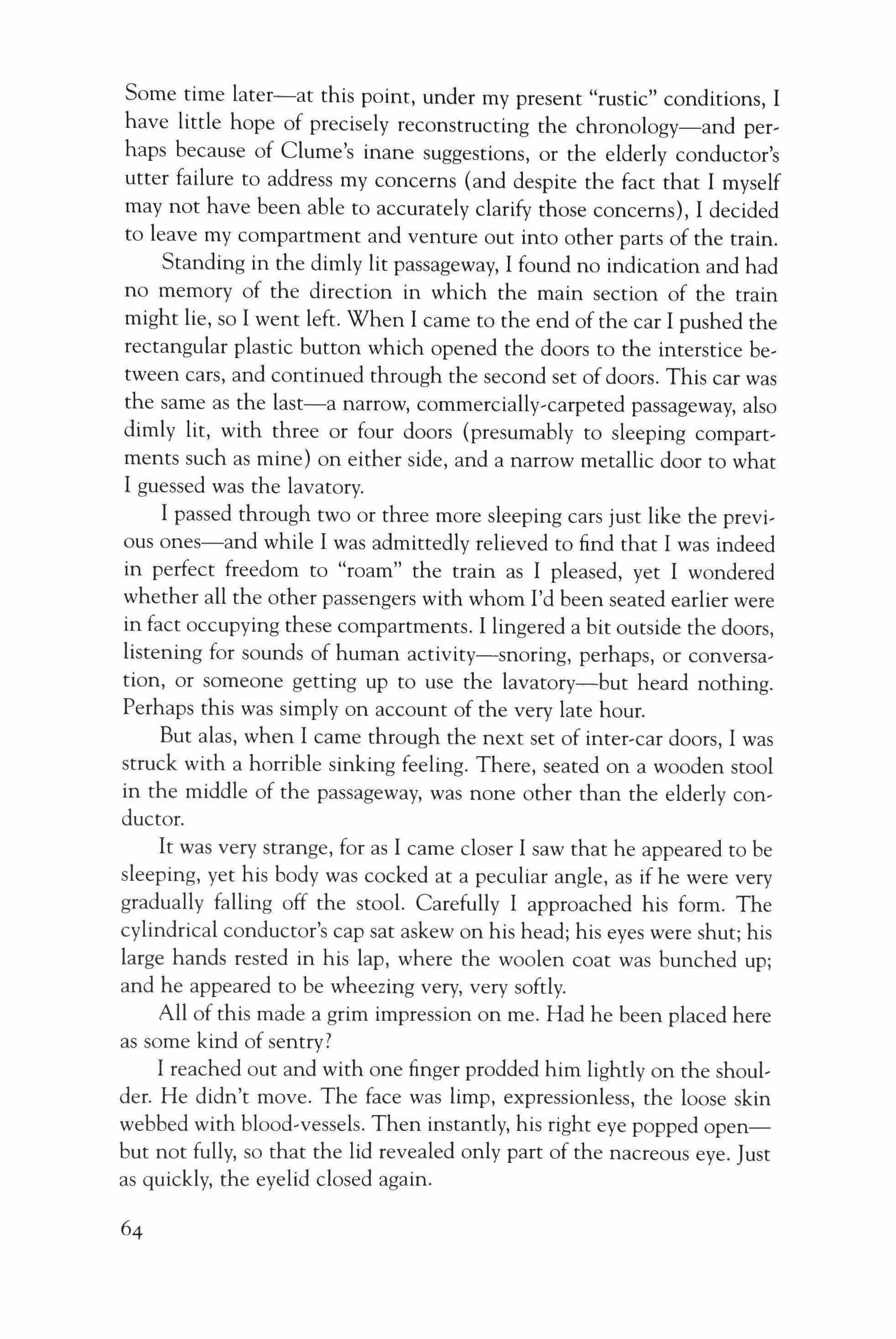
Some time later-at this point, under my present "rustic" conditions, I have little hope of precisely reconstructing the chronology-and perhaps because of Clume's inane suggestions, or the elderly conductor's utter failure to address my concerns (and despite the fact that I myself may not have been able to accurately clarify those concerns), I decided to leave my compartment and venture out into other parts of the train.
Standing in the dimly lit passageway, I found no indication and had no memory of the direction in which the main section of the train might lie, so I went left. When I came to the end of the car I pushed the rectangular plastic button which opened the doors to the interstice between cars, and continued through the second set of doors. This car was the same as the last-a narrow, commercially-carpeted passageway, also dimly lit, with three or four doors (presumably to sleeping compartments such as mine) on either side, and a narrow metallic door to what I guessed was the lavatory.
I passed through two or three more sleeping cars just like the previous ones-and while I was admittedly relieved to find that I was indeed in perfect freedom to "roam" the train as I pleased, yet I wondered whether all the other passengers with whom I'd been seated earlier were in fact occupying these compartments. I lingered a bit outside the doors, listening for sounds of human activity-snoring, perhaps, or conversation, or someone getting up to use the lavatory-but heard nothing. Perhaps this was simply on account of the very late hour.
But alas, when I came through the next set of inter-car doors, I was struck with a horrible sinking feeling. There, seated on a wooden stool in the middle of the passageway, was none other than the elderly conductor.
It was very strange, for as I came closer I saw that he appeared to be sleeping, yet his body was cocked at a peculiar angle, as if he were very gradually falling off the stool. Carefully I approached his form. The cylindrical conductor's cap sat askew on his head; his eyes were shut; his large hands rested in his lap, where the woolen coat was bunched up; and he appeared to be wheezing very, very softly.
All of this made a grim impression on me. Had he been placed here as some kind of sentry?
I reached out and with one finger prodded him lightly on the shoulder. He didn't move. The face was limp, expressionless, the loose skin webbed with blood-vessels. Then instantly, his right eye popped openbut not fully, so that the lid revealed only part of the nacreous eye. Just as quickly, the eyelid closed again.
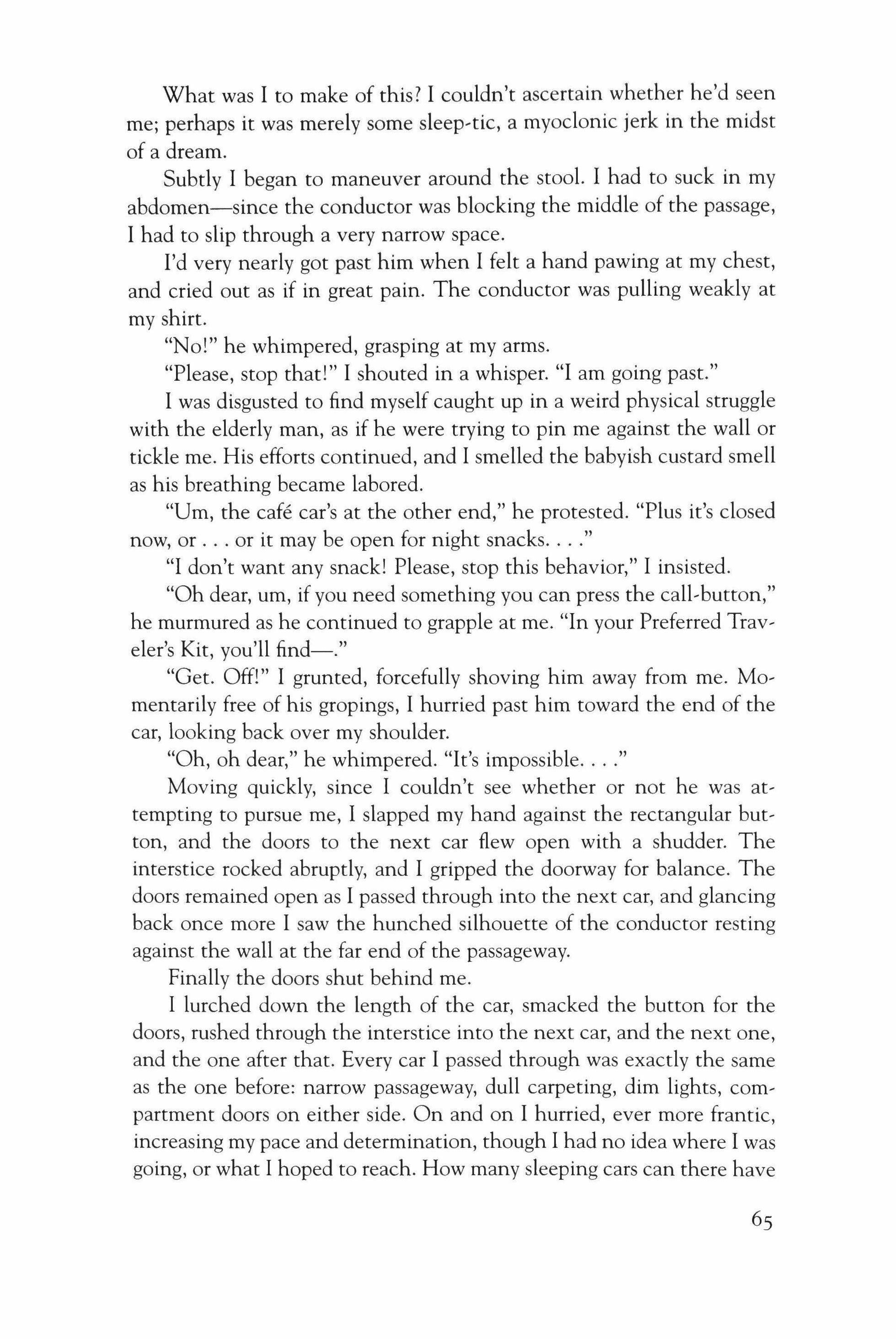
What was I to make of this? I couldn't ascertain whether he'd seen me; perhaps it was merely some sleep-tic, a myoclonic jerk in the midst of a dream.
Subtly I began to maneuver around the stool. I had to suck in my abdomen-since the conductor was blocking the middle of the passage, I had to slip through a very narrow space.
I'd very nearly got past him when I felt a hand pawing at my chest, and cried out as if in great pain. The conductor was pulling weakly at my shirt.
"No!" he whimpered, grasping at my arms.
"Please, stop that!" I shouted in a whisper. "I am going past."
I was disgusted to find myself caught up in a weird physical struggle with the elderly man, as if he were trying to pin me against the wall or tickle me. His efforts continued, and I smelled the babyish custard smell as his breathing became labored.
"Urn, the cafe car's at the other end," he protested. "Plus it's closed now, or or it may be open for night snacks "
"I don't want any snack! Please, stop this behavior," I insisted.
"Oh dear, um, if you need something you can press the call,button," he murmured as he continued to grapple at me. "In your Preferred Traveler's Kit, you'll find-."
"Get. Off!" I grunted, forcefully shoving him away from me. Momentarily free of his gropings, I hurried past him toward the end of the car, looking back over my shoulder.
"Oh, oh dear," he whimpered. "It's impossible
Moving quickly, since I couldn't see whether or not he was at, tempting to pursue me, I slapped my hand against the rectangular but, ton, and the doors to the next car flew open with a shudder. The interstice rocked abruptly, and I gripped the doorway for balance. The doors remained open as I passed through into the next car, and glancing back once more I saw the hunched silhouette of the conductor resting against the wall at the far end of the passageway.
Finally the doors shut behind me.
I lurched down the length of the car, smacked the button for the doors, rushed through the interstice into the next car, and the next one, and the one after that. Every car I passed through was exactly the same as the one before: narrow passageway, dull carpeting, dim lights, com, partment doors on either side. On and on I hurried, ever more frantic, increasing my pace and determination, though I had no idea where I was going, or what I hoped to reach. How many sleeping cars can there have
65
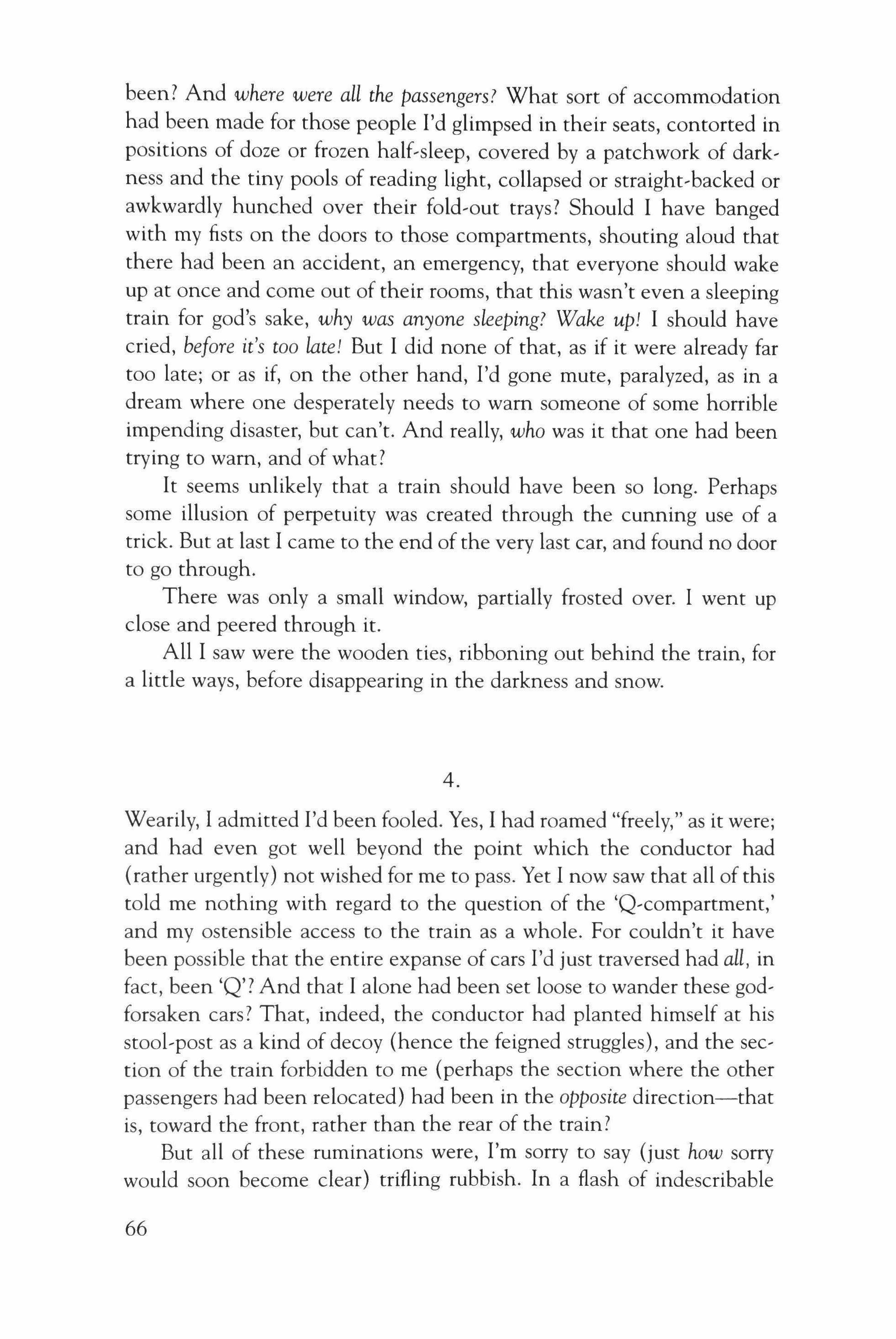
been? And where were all the passengers? What sort of accommodation had been made for those people I'd glimpsed in their seats, contorted in positions of doze or frozen half-sleep, covered by a patchwork of darkness and the tiny pools of reading light, collapsed or straight-backed or awkwardly hunched over their fold-out trays? Should I have banged with my fists on the doors to those compartments, shouting aloud that there had been an accident, an emergency, that everyone should wake up at once and come out of their rooms, that this wasn't even a sleeping train for god's sake, why was anyone sleeping? Wake uP! I should have cried, before it's too late! But I did none of that, as if it were already far too late; or as if, on the other hand, I'd gone mute, paralyzed, as in a dream where one desperately needs to warn someone of some horrible impending disaster, but can't. And really, who was it that one had been trying to warn, and of what?
It seems unlikely that a train should have been so long. Perhaps some illusion of perpetuity was created through the cunning use of a trick. But at last I came to the end of the very last car, and found no door to go through.
There was only a small window, partially frosted over. I went up close and peered through it.
All I saw were the wooden ties, ribboning out behind the train, for a little ways, before disappearing in the darkness and snow. 4.
Wearily, I admitted I'd been fooled. Yes, I had roamed "freely," as it were; and had even got well beyond the point which the conductor had (rather urgently) not wished for me to pass. Yet I now saw that all of this told me nothing with regard to the question of the 'Qvcompartment,' and my ostensible access to the train as a whole. For couldn't it have been possible that the entire expanse of cars I'd just traversed had all, in fact, been 'Q'? And that I alone had been set loose to wander these godforsaken cars? That, indeed, the conductor had planted himself at his stool-post as a kind of decoy (hence the feigned struggles), and the section of the train forbidden to me (perhaps the section where the other passengers had been relocated) had been in the opposite direction-that is, toward the front, rather than the rear of the train?
But all of these ruminations were, I'm sorry to say (just how sorry would soon become clear) trifling rubbish. In a flash of indescribable
66
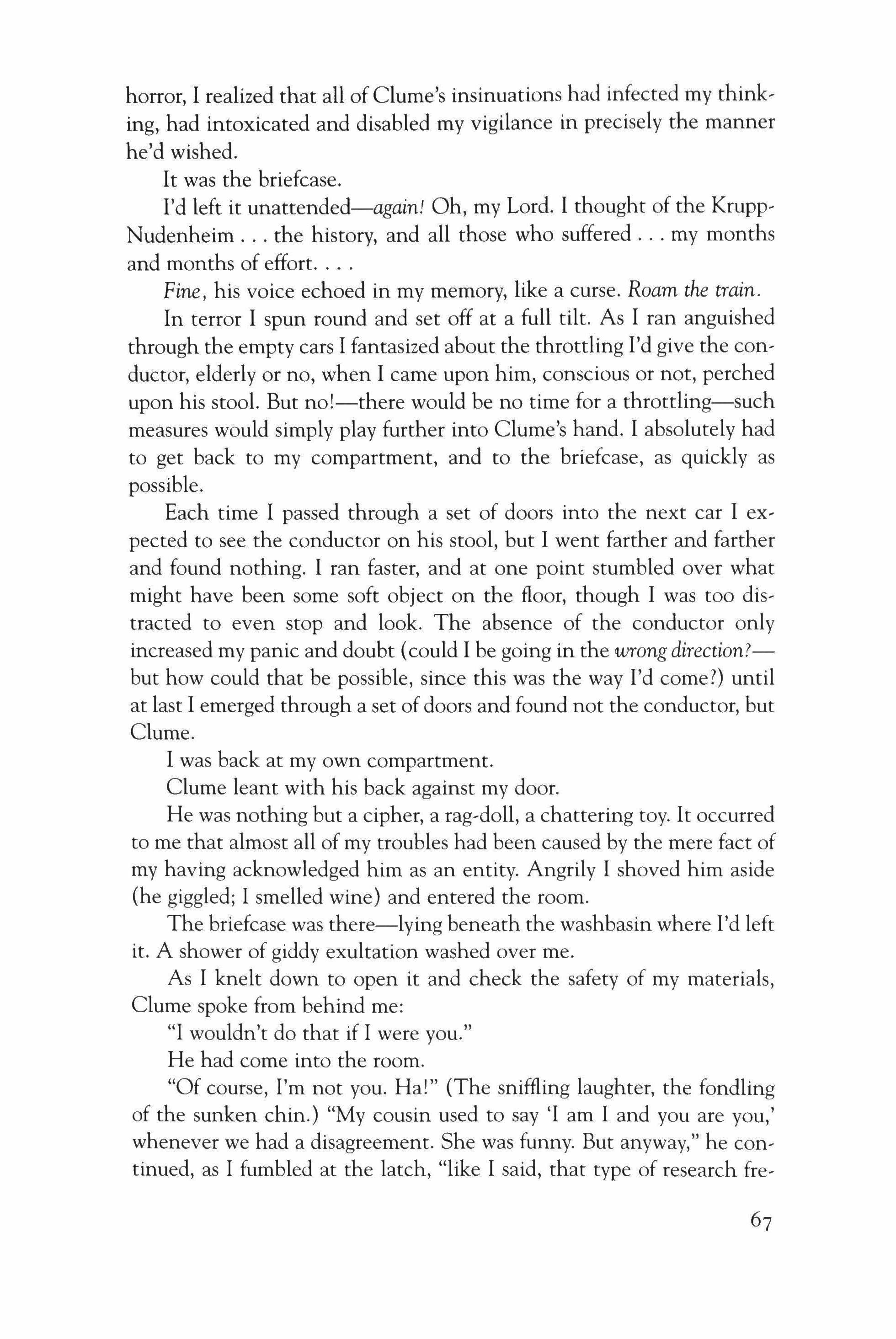
horror, I realized that all of Clume's insinuations had infected my think, ing, had intoxicated and disabled my vigilance in precisely the manner he'd wished.
It was the briefcase.
I'd left it unattended-again! Oh, my Lord. I thought of the Krupp, Nudenheim the history, and all those who suffered my months and months of effort
Fine, his voice echoed in my memory, like a curse. Roam the train.
In terror I spun round and set off at a full tilt. As I ran anguished through the empty cars I fantasized about the throttling I'd give the con, ductor, elderly or no, when I came upon him, conscious or not, perched upon his stool. But no!-there would be no time for a throttling-such measures would simply play further into Clume's hand. I absolutely had to get back to my compartment, and to the briefcase, as quickly as possible.
Each time I passed through a set of doors into the next car I ex, pected to see the conductor on his stool, but I went farther and farther and found nothing. I ran faster, and at one point stumbled over what might have been some soft object on the floor, though I was too dis, tracted to even stop and look. The absence of the conductor only increased my panic and doubt (could I be going in the wrong direction?but how could that be possible, since this was the way I'd come?) until at last I emerged through a set of doors and found not the conductor, but Clume.
I was back at my own compartment.
Clume leant with his back against my door.
He was nothing but a cipher, a rag-doll, a chattering toy. It occurred to me that almost all of my troubles had been caused by the mere fact of my having acknowledged him as an entity. Angrily I shoved him aside (he giggled; I smelled wine) and entered the room.
The briefcase was there-lying beneath the washbasin where I'd left it. A shower of giddy exultation washed over me.
As I knelt down to open it and check the safety of my materials, Clume spoke from behind me:
"I wouldn't do that if I were you."
He had come into the room.
"Of course, I'm not you. Ha!" (The sniffling laughter, the fondling of the sunken chin.) "My cousin used to say 'I am I and you are you,' whenever we had a disagreement. She was funny. But anyway," he con, tinued, as I fumbled at the latch, "like I said, that type of research fre-

quently has its hazards: there's the fatigue, plus always the chance that the subject matter has already been 'handled,' so to speak, by others-."
"Shut up!" I commanded.
"And those libraries-ugh! All the dust! One has to consider one's health."
Grabbing the briefcase by the handle, I stood up. The blood rushed from my head, and my vision went gray with a snow of spots.
"I am getting off this train," I said. "Immediately."
"How!" asked Clume.
"I don't care. I'll notify the engineer of an emergency. I'll feign an illness. I'll jump out of a damned window if I have to."
Clume stepped closer to me. He'd been sipping something loathsome: the fetid wine-smell was nauseating. "Well," he said, "I'll tell you a piece of information. I happen to know that shortly there is going to be a stop. An "unofficial" stop. The only one before the final destination-which, as you might fathom, is still quite a ways off."
"Hmm, that's interesting," I said. "Does it have to do with the 'quarantine'!"
Clume pretended offense at my condescending tone.
"Actually," he said, "it has to do with maintenance. No passengers allowed on or off. I think it's a place called Munktinburg, or Martinburg, or
Just then the train began to slow. I could feel it palpably-wheels and levers grinding and groaning deep underneath the floor.
As if sensing the same thing, Clume grinned.
"Get out of my way!" I cried. Briefcase in hand (forget the rest of my belongings) I pushed past Clume and made my way out into the passageway. This time I knew what I wanted: I turned right, toward the front. The train shuddered and I lost my balance as I came to the first set of doors. Clume was close behind me. As I hit the button, bells started ringing.
"We never finished discussing our research!" Clume called out.
The doors opened only a crack, but (holding the briefcase between my knees) I forced them several inches apart and squeezed through into the interstice between cars.
"You know," Clume continued (he too was trying to pull apart the doors), "I have to say that I think I disagree-respectfully, of coursewith some of your premises."
A loud siren began to whoop and wail over the noise ofthe bells and the sounds of the train grinding to a halt.
68

"For instance, some of those 'walking cases.' Couldn't it have been that they only thought they were sick-."
Thank God-immediately to my right was an exit. The doors were shut, but there was a red lever marked Emergency Use.
"And, could it be that they got in the ambulance, but somewhere along the way made a good-faith judgment that they were okay after all?"
I pressed on the lever and nothing happened. I gave the lever a sharp toe-kick. Clume had very nearly squeezed through the doors into the interstice, and was reaching out his arm, as if to grab me.
"Don't you agree," he continued, "that that would cast certain key events in a different light?"
"Aghh!" I grunted, and with all my strength yanked on the emergency door's handles. The train had come completely to a stop, and the bells and sirens had reached a deafening pitch, over which Clume shouted,
"Of course, it's easy to become confused-."
The doors sprung open-they were mounted on a sliding trackand a blast of cold wind rushed in. Getting on my knees, I began to lower myself off the side of the train.
"Deficiencies in moral character are sometimes known to result
My feet, kicking in air, at last found purchase, and I let myself down onto the ground. A little squeal of pain escaped from my throat-I'd set my briefcase down while I was struggling with the doors; but the doors were still open, so I lunged upward, reached inside and snatched it out. At the same time, Clume wedged his elbow in the doors, as though he were trying to follow me out of the train. I flung the briefcase behind me onto a bank of snow, and made a concerted effort to stuff Clume's arm back inside.
"Ow!" he yelped, and retracted the arm part way. I grabbed the handles on the outside of the sliding doors and tried to force them shut. But they kept jouncing off Clume's hand. And although I understood that rationally it didn't make sense for me to be slamming the doors over and over on Clume's hand, smashing it repeatedly, that was what seemed to be happening. In a kind ofhalf-dream, I flung the doors together, so that they rebounded off the hand and then came together once more, mechanically, crushing the hand to a bloody pulp. My face was bitten by the freezing wind and brittle flakes, and my leather shoes scrabbled on the snow and icy clumps as I threw all of my weight into the slamming of the doors.

"Uncanny behavior muttered Clume, who finally seemed to have pulled his pulverized hand all the way back inside the train.
I staggered backward and collapsed onto the snow bank next to my briefcase. Out of breath, and nearly delirious, I watched as the train's machinery rocked slowly into gear, and the train began to roll away.
And as I watched the cars slip slowly past, I thought I saw in the windows people looking out at me from softly lighted rooms: the elderly conductor and the sorrowful fat man in one window; in another, the sullen-faced woman with the pointed breasts, and the grave-mannered cafe car attendant; in yet another, the carefully coifed head of the man with a nub for a hand.
There were many other faces in many more windows, all peering out at me, all without expression, as they drifted past into the night. The one face I didn't see, thank heaven, was Clume's.
I am no longer convinced that it is, in fact, the holiday season. Holiday is a time of cheerful and restful celebration with one's family-and this is decidedly not that. There is no turkey here, and no pillow. There is no gravy here, unless by gravy you mean howling wind. It has been a long, long night.
Where is here? I am not, as yet, in a position to investigate that. Shortly after the train left, I was overcome with symptoms. Motor coordination mainly. A continuous ringing of bells in my ears. Certain ocular difficulties that would require far too much energy to describe. I suddenly felt as though I'd been hit in the head by a train, so to speak, and forgotten to take my medicine. (Ha!-is that an old saying?)
In any case, I staggered over a hill and through a wood, not to grandmother's house, but to this structure in which I am currentlytemporarily!-housed. I have no reason to doubt a prompt deliverance. Perhaps in the morning another train will pass through.
It now occurs to me that, in some sense (and despite the mess of papers scattered on the ground beside me), I believe I may have achieved the means to advance my research even further. True, I no longer have access to a library, and I may have to forego, for some time, the beneficence of a Krupp-Nudenheim. But I have attained a clarity of mind that only comes when most of the senses have gone. And, you know, I never expected the project to be easy. I like to think that today's scholar, plunging boldly into our collective dream of history, revivifying the dormant past, is the stolid pioneer of a new era: an era of knowledge.
There I believe I have just felt a sensation in my toe. Perhaps my
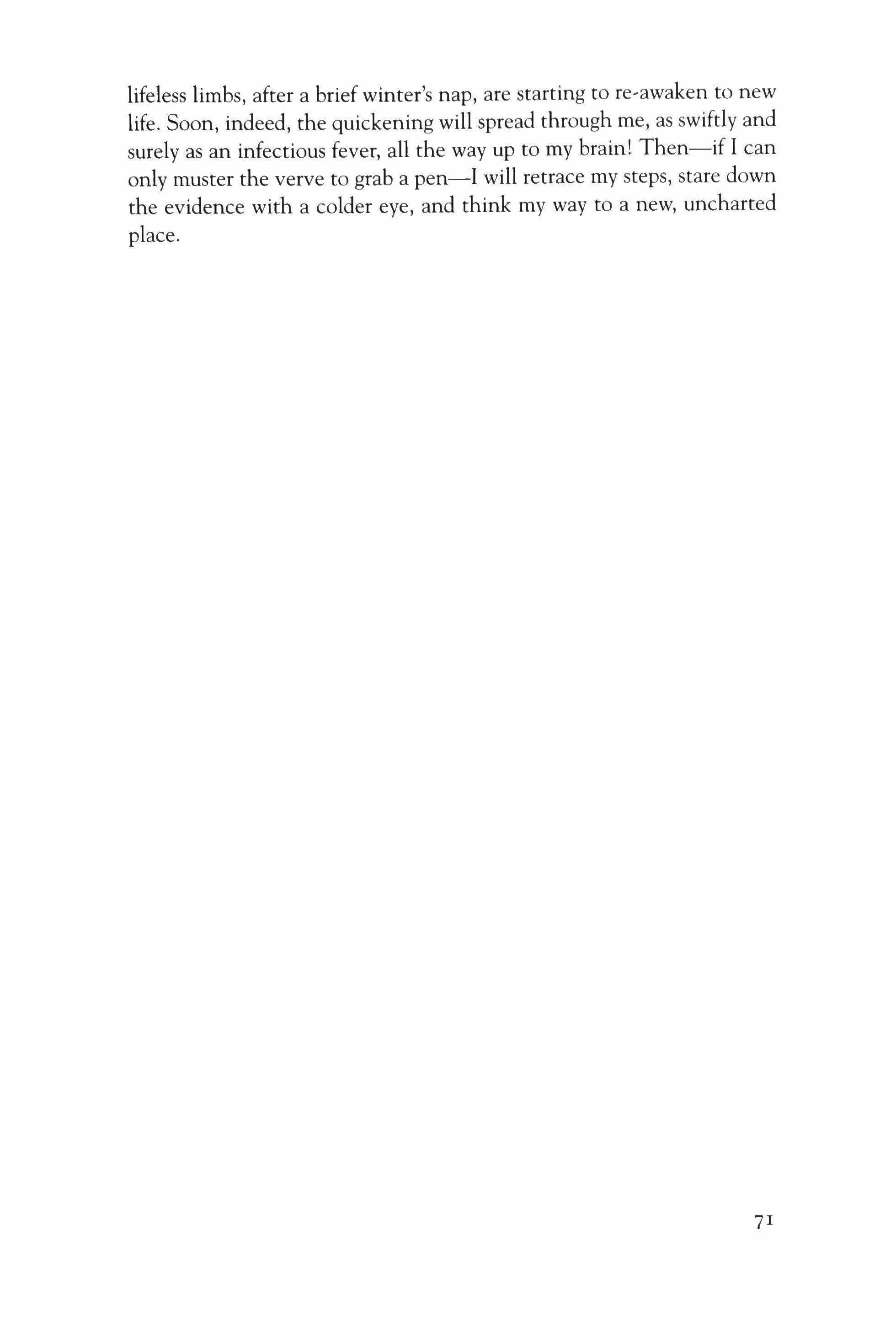
lifeless limbs, after a brief winter's nap, are starting to re-awaken to new life. Soon, indeed, the quickening will spread through me, as swiftly and surely as an infectious fever, all the way up to my brain! Then-if I can only muster the verve to grab a pen-I will retrace my steps, stare down the evidence with a colder eye, and think my way to a new, uncharted place.
71
Together We Are Lost

My final divorce papers were the great paper airplane that would fly out of my Nevada window and set me free. I rarely saw Conrad. He was always on the road in his eighteen-wheeler, his mind too crazy for anyone to help, too wild for me. My husband used to complain that a dozen black ravens flapped inside his head, beating their wings against his skull. He once told me that his eighteen wheeler had no more brakes, and that at certain points in the Nevada desert, he could bang bunnies crossing the road, killing them by the thousands, the thump and splat unbearable, tearing his sanity into bits. He told me that the sand glittered with thousands of watchful glass eyes and had put curses on him. There is no getting around it; untangling myself and my son Eric from that madness was no simple task. Still, Conrad and I clawed at each other whenever he went off the deep end, tumbling through his cloud of desert dust and raven feathers. Finally, I had to tell him no mas. No custody, no visits with Eric, no nada. In his condition, Conrad shouldn't even have been walking around.
He blamed the Mexican part of me, the one who knew of La Llorona, the mad ghost woman of the arroyos, crying for the children she killed, and who consorted with people who lit candles for saints and against evil eyes. Yeah, he grabbed at any excuse. Ghosts. Raven feathers. My supposed hex on him.
Once my divorce was final, I made the mistake of telling my mother that I'd had it with men, so she of course invited me over to her house for one of her ladies' parties, the ones that celebrated love. "Forget it
Kathleen de Azevedo

Ma," I said, "I'm through!" How ironic when I found myself repeating this above the din of her cadre of friends who filled her living room and kitchen, their voices more animated than the high-pitched chuckle of the mariachis on the record player (no CD's for Mal).
At her party, Ma wore a pale lavender tulle dress that swept over a purple satin slip underneath. Her hair was all poofed, with a flat lavender bow in back like a prom queen. "For goddsakes Ma," I complained, "you look like a bridesmaid."
She grabbed my arm and led me off to the side. "Aye, Celia, you look terrible like you drank the water from Pyramid Lake." I shrugged. I wasn't about to tell her of my surprising broken heart, the one I wasn't supposed to have because good-riddance was supposed to have crushed out the flame.
"Where's Eric?" She continued, asking about my son. "Why don't you ever bring Eric to see me?"
"I told you Ma, he doesn't like old ladies' parties."
"But honey, I'm celebrating love. LOVE. Amor. Tu sabes?"
The women around us danced, some with men, but mostly with each other because they were divorced or because their men were in Mexico, or were working, or were sitting in front of the TV at home. Some women wore button earrings and necklaces with big fat black shiny beads. A couple of women wore tunics splashed with two orchids in the back, and four orchids in the front, so their breasts gave the flowers little snout-like bumps. Another wore a turquoise jumpsuit and a Navajo necklace. The women with nice hips wore rayon dresses which rose up on their behinds as they walked in high heels. They danced salsa, moving together in such coordination they seemed like fourlegged creatures. And they chuckled to the tune of EI Amor, because EI Amor was the real purpose of the party: to introduce my mother's new boyfriend to her friends. It was like a quinceafiera for an old man.
My mom got herself an older Mexican man, sharp nose and elbows, like a three-pronged hood ornament. He wore an all-white suit like a hidalgo, his skin was as brown as a nut, and his long white hair shot back as if he had been riding on a motorcycle with his face against the wind. A small tuft of his white hair was in a ponytail that looked like a rabbit's foot. He was eyeing the ladies and holding his hat in front of him, fingering the brim. He was just another old fox she chased after. Just the other day, Ma had spoken to me ofJimmyJered-the Elvis impersonator she had been dating, the guy who performs in the Leprechaun Room at the Babaloo Casino, the one she visited every Saturday with her ram-
73
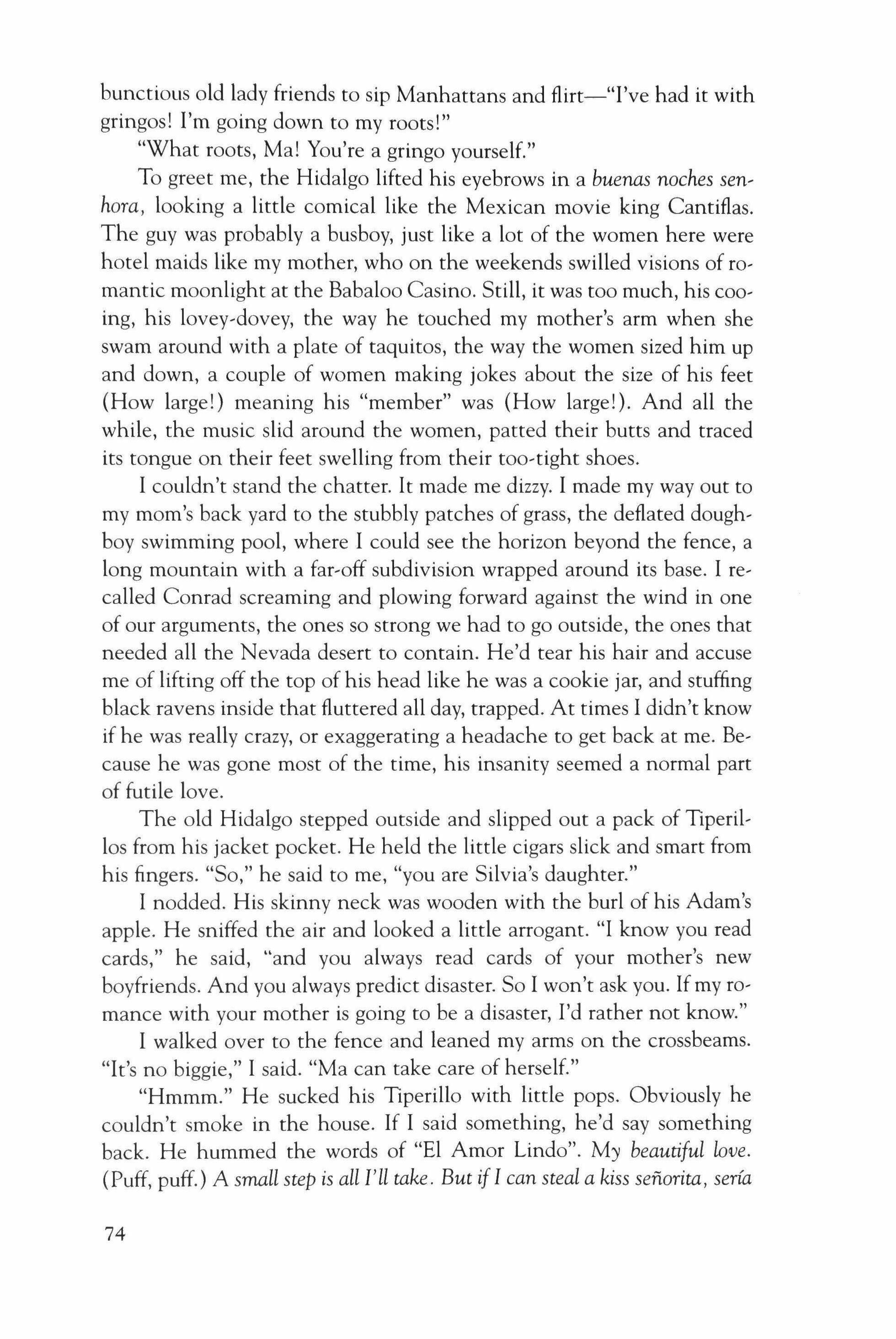
bunctious old lady friends to sip Manhattans and flirt-"I've had it with gringos! I'm going down to my roots!"
"What roots, Ma! You're a gringo yourself."
To greet me, the Hidalgo lifted his eyebrows in a buenas naches senhora, looking a little comical like the Mexican movie king Cantiflas. The guy was probably a busboy, just like a lot of the women here were hotel maids like my mother, who on the weekends swilled visions of romantic moonlight at the Babaloo Casino. Still, it was too much, his cooing, his Iovey-dovev, the way he touched my mother's arm when she swam around with a plate of taquitos, the way the women sized him up and down, a couple of women making jokes about the size of his feet (How large!) meaning his "member" was (How large!). And all the while, the music slid around the women, patted their butts and traced its tongue on their feet swelling from their too-tight shoes.
I couldn't stand the chatter. It made me dizzy. I made my way out to my mom's back yard to the stubbly patches of grass, the deflated doughboy swimming pool, where I could see the horizon beyond the fence, a long mountain with a far-off subdivision wrapped around its base. I recalled Conrad screaming and plowing forward against the wind in one of our arguments, the ones so strong we had to go outside, the ones that needed all the Nevada desert to contain. He'd tear his hair and accuse me of lifting off the top of his head like he was a cookie jar, and stuffing black ravens inside that fluttered all day, trapped. At times I didn't know if he was really crazy, or exaggerating a headache to get back at me. Because he was gone most of the time, his insanity seemed a normal part of futile love.
The old Hidalgo stepped outside and slipped out a pack of Tiperillos from his jacket pocket. He held the little cigars slick and smart from his fingers. "So," he said to me, "you are Silvia's daughter."
I nodded. His skinny neck was wooden with the burl of his Adam's apple. He sniffed the air and looked a little arrogant. "I know you read cards," he said, "and you always read cards of your mother's new boyfriends. And you always predict disaster. So I won't ask you. If my romance with your mother is going to be a disaster, I'd rather not know."
I walked over to the fence and leaned my arms on the crossbeams. "It's no biggie," I said. "Ma can take care of herself." "Hmmm." He sucked his Tiperillo with little pops. Obviously he couldn't smoke in the house. If I said something, he'd say something back. He hummed the words of "El Amor Lindo". My beautiful love. (Puff, puff.) A small step is all I'll take. But if I can steal a kiss senorita, sew
74
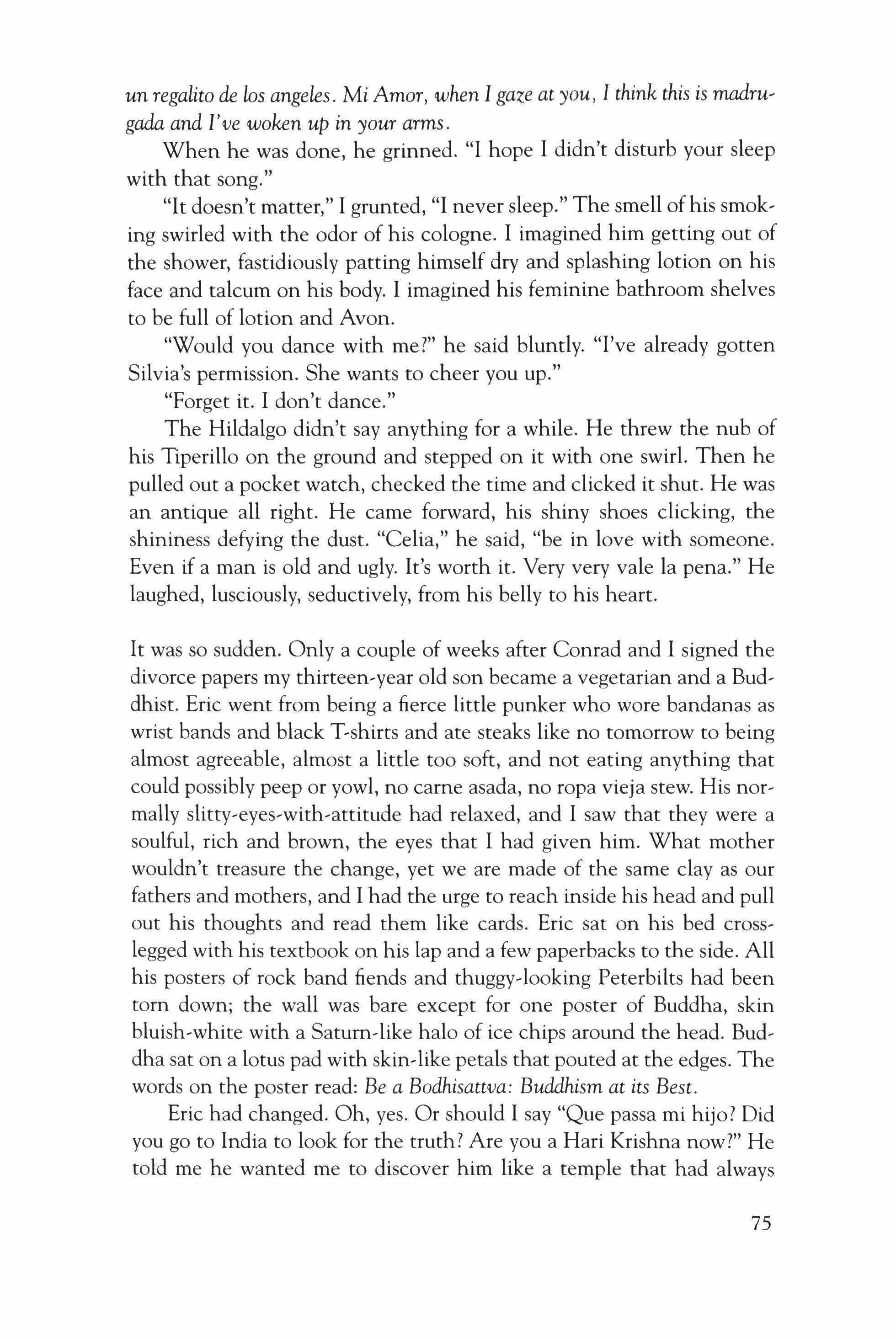
un regalito de los angeles. Mi Amor, when I gaze at you, I think this is madru, gada and 1've woken up in your arms.
When he was done, he grinned. "I hope I didn't disturb your sleep with that song."
"It doesn't matter," I grunted, "I never sleep." The smell ofhis smoking swirled with the odor of his cologne. I imagined him getting out of the shower, fastidiously patting himself dry and splashing lotion on his face and talcum on his body. I imagined his feminine bathroom shelves to be full of lotion and Avon.
"Would you dance with me?" he said bluntly. "I've already gotten Silvia's permission. She wants to cheer you up."
"Forget it. I don't dance."
The Hildalgo didn't say anything for a while. He threw the nub of his Tiperillo on the ground and stepped on it with one swirl. Then he pulled out a pocket watch, checked the time and clicked it shut. He was an antique all right. He came forward, his shiny shoes clicking, the shininess defying the dust. "Celia," he said, "be in love with someone. Even if a man is old and ugly. It's worth it. Very very vale la pena." He laughed, lusciously, seductively, from his belly to his heart.
It was so sudden. Only a couple of weeks after Conrad and I signed the divorce papers my thirteen-year old son became a vegetarian and a Bud, dhist. Eric went from being a fierce little punker who wore bandanas as wrist bands and black Tshirts and ate steaks like no tomorrow to being almost agreeable, almost a little too soft, and not eating anything that could possibly peep or yowl, no came asada, no ropa vieja stew. His nor, mally slittv-eyes-with-attitude had relaxed, and I saw that they were a soulful, rich and brown, the eyes that I had given him. What mother wouldn't treasure the change, yet we are made of the same clay as our fathers and mothers, and I had the urge to reach inside his head and pull out his thoughts and read them like cards. Eric sat on his bed cross' legged with his textbook on his lap and a few paperbacks to the side. All his posters of rock band fiends and thuggv-Iooking Peterbilts had been tom down; the wall was bare except for one poster of Buddha, skin bluish-white with a Saturn,like halo of ice chips around the head. Bud, dha sat on a lotus pad with skin'like petals that pouted at the edges. The words on the poster read: Be a Bodhisattva: Buddhism at its Best.
Eric had changed. Oh, yes. Or should I say "Que passa mi hijo? Did you go to India to look for the truth? Are you a Hari Krishna now?" He told me he wanted me to discover him like a temple that had always
75

been buried in the desert. But I was suspicious. I could not see the temple inside his head, the one I feared would be crumbling in pieces, the ones I'd have to mourn for because I couldn't put them back together. But instead, I did the motherly thing. "What, are you reading," I said, "Tell your rna." I had to start new, new conversations, new struggle, everything.
"My history book for one," Eric said. "And this pocket book here is about Zen and this one is about meditating. My counselor got me into this meditating class."
"What do you meditate about?" I asked rather clumsily, as I thought meditating was done by very thin people who ate strange things. "Do you think about me when you meditate?"
Eric rolled his eyes. "It's personal."
Oh. A little annoyed yes. Everyone with their secrets. All busybody. My mother would say, "Celia, at least he's now he's not taking drogas and smoking mota." "Yeah," my thoughts yelled over Ma's advice. "Sometimes you don't need those things to invite the devil into your house." I turned to go.
"Wait," Eric said. He turned serious and just like that, began talking about his father, the last time they were together, the time they ran off for a couple of days without telling me and I called the cops, thinking my son had been kidnapped. Those were the days when I swam in a pool of my La Uorona tears until my body went numb. But Eric not able to see the insanity of this memory, told me of how his father took him to a place in the desert, not far from here, he said, oh twenty or thirty miles or so. Eric said he wanted to go there again. "It's a real and spiritual place."
"You want to go there again? Do you have any idea-" I hissed, trying to tell him of the grief I had when I found his bed empty. But couldn't continue on as my anger cut my words off at the bud. Finally, I just said, "No way. Your father is dead to me."
Eric turned away from me deliberately, faced the wall, and he groaned as he unpretzelized his gangly westernized legs. "Fine," he said. "I'll go myself, even if I have to walk."
I boiled out of the room, roiled in the kitchen, got out my pack of cards, the ones I tell fortunes with. I sat at the table and shuffled and snapped the deck. What could I have done? Could I have spotted that crazy eye in the middle of Conrad's massive flesh? Conrad probably told Eric all the worst, that I drove him loco, that I drove him to see ghost women on the road and CIA henchmen riding motorcycles outside of
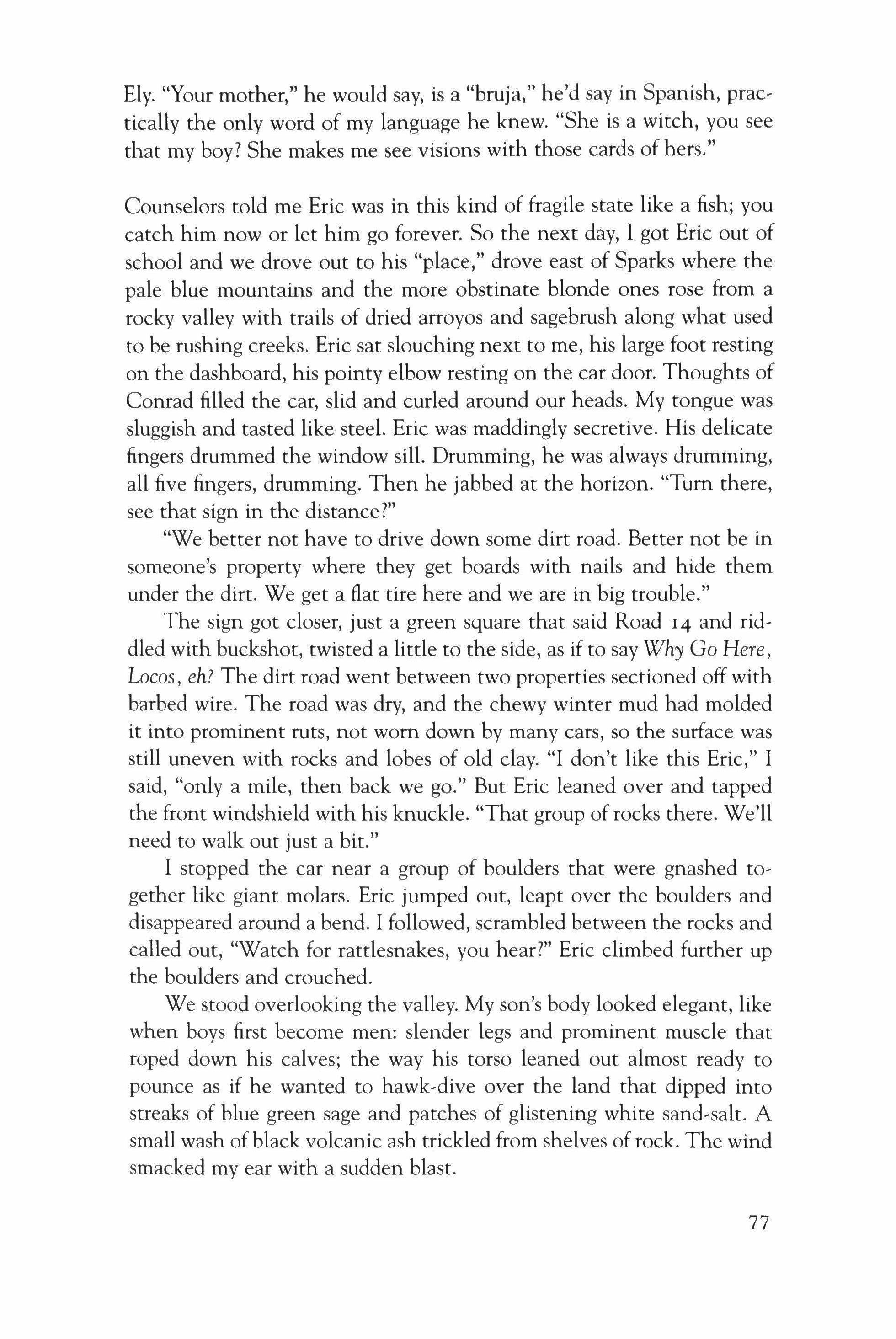
Ely. "Your mother," he would say, is a "bruja," he'd say in Spanish, practically the only word of my language he knew. "She is a witch, you see that my boy? She makes me see visions with those cards of hers."
Counselors told me Eric was in this kind of fragile state like a fish; you catch him now or let him go forever. So the next day, I got Eric out of school and we drove out to his "place," drove east of Sparks where the pale blue mountains and the more obstinate blonde ones rose from a rocky valley with trails of dried arroyos and sagebrush along what used to be rushing creeks. Eric sat slouching next to me, his large foot resting on the dashboard, his pointy elbow resting on the car door. Thoughts of Conrad filled the car, slid and curled around our heads. My tongue was sluggish and tasted like steel. Eric was maddingly secretive. His delicate fingers drummed the window sill. Drumming, he was always drumming, all five fingers, drumming. Then he jabbed at the horizon. "Tum there, see that sign in the distance?"
"We better not have to drive down some dirt road. Better not be in someone's property where they get boards with nails and hide them under the dirt. We get a flat tire here and we are in big trouble."
The sign got closer, just a green square that said Road 14 and riddled with buckshot, twisted a little to the side, as if to say Why Go Here, Locos, eh? The dirt road went between two properties sectioned off with barbed wire. The road was dry, and the chewy winter mud had molded it into prominent ruts, not worn down by many cars, so the surface was still uneven with rocks and lobes of old clay. "I don't like this Eric," I said, "only a mile, then back we go." But Eric leaned over and tapped the front windshield with his knuckle. "That group of rocks there. We'll need to walk out just a bit."
I stopped the car near a group of boulders that were gnashed together like giant molars. Eric jumped out, leapt over the boulders and disappeared around a bend. I followed, scrambled between the rocks and called out, "Watch for rattlesnakes, you hear?" Eric climbed further up the boulders and crouched.
We stood overlooking the valley. My son's body looked elegant, like when boys first become men: slender legs and prominent muscle that roped down his calves; the way his torso leaned out almost ready to pounce as if he wanted to hawk-dive over the land that dipped into streaks of blue green sage and patches of glistening white sand-salt. A small wash ofblack volcanic ash trickled from shelves of rock. The wind smacked my ear with a sudden blast.
77
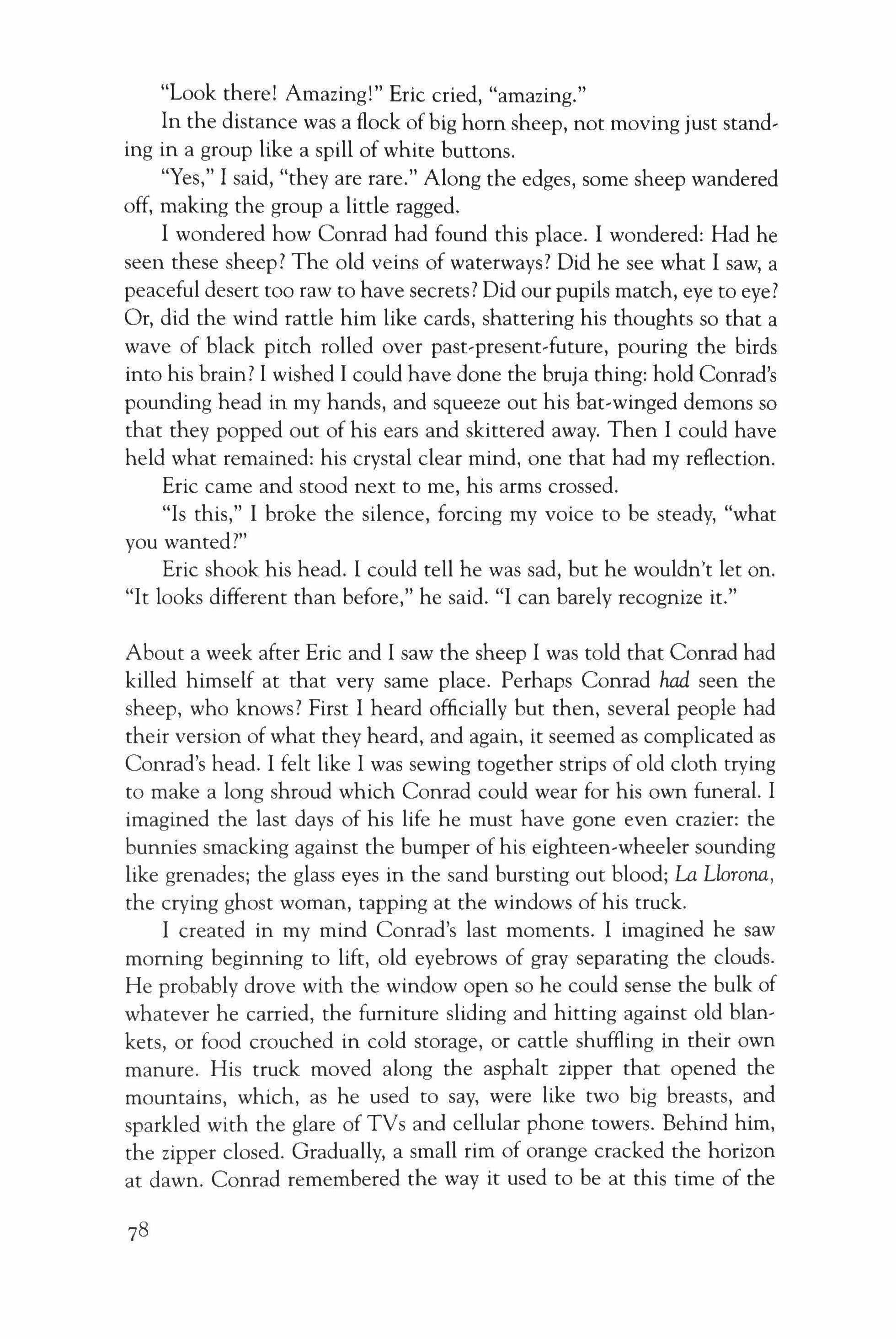
"Look there! Amazing!" Eric cried, "amazing."
In the distance was a flock of big horn sheep, not moving just standing in a group like a spill of white buttons.
"Yes," I said, "they are rare." Along the edges, some sheep wandered off, making the group a little ragged.
I wondered how Conrad had found this place. I wondered: Had he seen these sheep? The old veins of waterways? Did he see what I saw, a peaceful desert too raw to have secrets? Did our pupils match, eye to eye? Or, did the wind rattle him like cards, shattering his thoughts so that a wave of black pitch rolled over past-present-future, pouring the birds into his brain? I wished I could have done the bruja thing: hold Conrad's pounding head in my hands, and squeeze out his bat-winged demons so that they popped out of his ears and skittered away. Then I could have held what remained: his crystal clear mind, one that had my reflection.
Eric came and stood next to me, his arms crossed.
"Is this," I broke the silence, forcing my voice to be steady, "what you wanted?"
Eric shook his head. I could tell he was sad, but he wouldn't let on. "It looks different than before," he said. "I can barely recognize it."
About a week after Eric and I saw the sheep I was told that Conrad had killed himself at that very same place. Perhaps Conrad had seen the sheep, who knows? First I heard officially but then, several people had their version of what they heard, and again, it seemed as complicated as Conrad's head. I felt like I was sewing together strips of old cloth trying to make a long shroud which Conrad could wear for his own funeral. I imagined the last days of his life he must have gone even crazier: the bunnies smacking against the bumper of his eighteen-wheeler sounding like grenades; the glass eyes in the sand bursting out blood; La Llorona, the crying ghost woman, tapping at the windows of his truck.
I created in my mind Conrad's last moments. I imagined he saw morning beginning to lift, old eyebrows of gray separating the clouds. He probably drove with the window open so he could sense the bulk of whatever he carried, the furniture sliding and hitting against old blankets, or food crouched in cold storage, or cattle shuffling in their own manure. His truck moved along the asphalt zipper that opened the mountains, which, as he used to say, were like two big breasts, and sparkled with the glare of TVs and cellular phone towers. Behind him, the zipper closed. Gradually, a small rim of orange cracked the horizon at dawn. Conrad remembered the way it used to be at this time of the
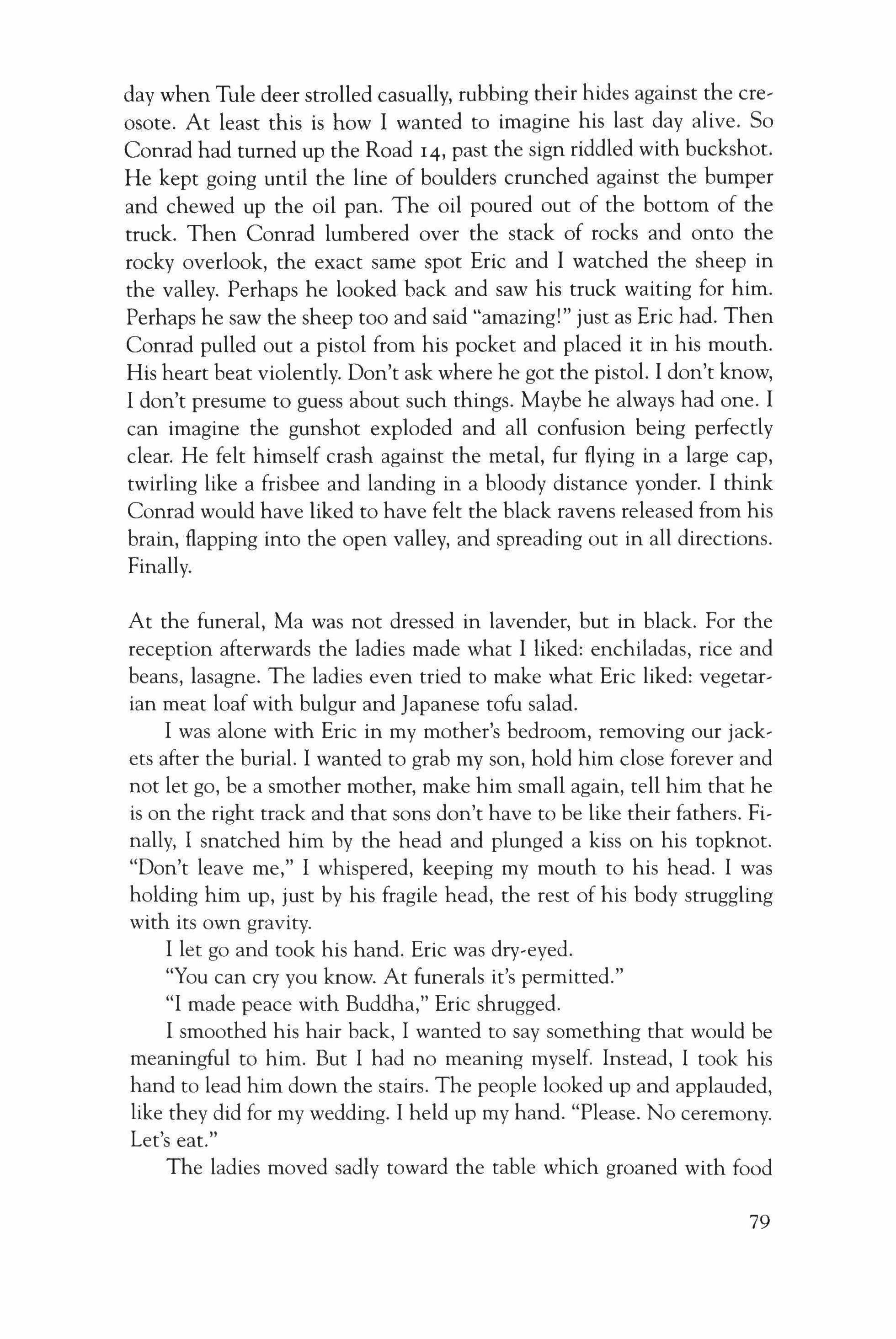
day when Tule deer strolled casually, rubbing their hides against the ereosote. At least this is how I wanted to imagine his last day alive. So Conrad had turned up the Road 14, past the sign riddled with buckshot. He kept going until the line of boulders crunched against the bumper and chewed up the oil pan. The oil poured out of the bottom of the truck. Then Conrad lumbered over the stack of rocks and onto the rocky overlook, the exact same spot Eric and I watched the sheep in the valley. Perhaps he looked back and saw his truck waiting for him. Perhaps he saw the sheep too and said "amazing!" just as Eric had. Then Conrad pulled out a pistol from his pocket and placed it in his mouth. His heart beat violently. Don't ask where he got the pistol. I don't know, I don't presume to guess about such things. Maybe he always had one. I can imagine the gunshot exploded and all confusion being perfectly clear. He felt himself crash against the metal, fur flying in a large cap, twirling like a frisbee and landing in a bloody distance yonder. I think Conrad would have liked to have felt the black ravens released from his brain, flapping into the open valley, and spreading out in all directions. finally.
At the funeral, Ma was not dressed in lavender, but in black. For the reception afterwards the ladies made what I liked: enchiladas, rice and beans, lasagne. The ladies even tried to make what Eric liked: vegetarian meat loaf with bulgur and Japanese tofu salad.
I was alone with Eric in my mother's bedroom, removing our jack, ets after the burial. I wanted to grab my son, hold him close forever and not let go, be a smother mother, make him small again, tell him that he is on the right track and that sons don't have to be like their fathers. Finally, 1 snatched him by the head and plunged a kiss on his topknot. "Don't leave me," 1 whispered, keeping my mouth to his head. 1 was holding him up, just by his fragile head, the rest of his body struggling with its own gravity.
1 let go and took his hand. Eric was dry-eyed. "You can cry you know. At funerals it's permitted."
"1 made peace with Buddha," Eric shrugged.
1 smoothed his hair back, 1 wanted to say something that would be meaningful to him. But 1 had no meaning myself. Instead, I took his hand to lead him down the stairs. The people looked up and applauded, like they did for my wedding. I held up my hand. "Please. No ceremony. Let's eat."
The ladies moved sadly toward the table which groaned with food
79
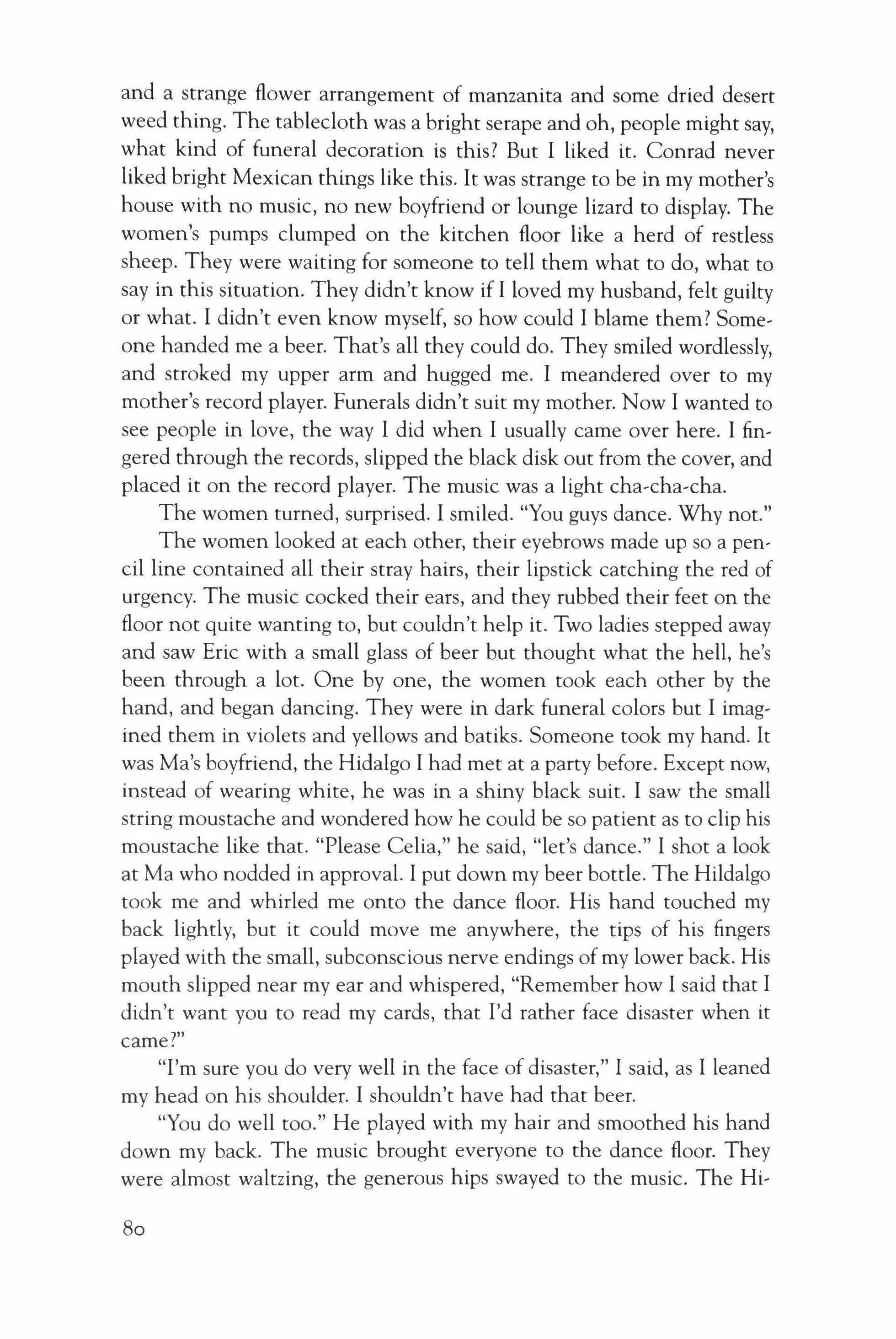
and a strange flower arrangement of manzanita and some dried desert weed thing. The tablecloth was a bright serape and oh, people might say, what kind of funeral decoration is this? But I liked it. Conrad never liked bright Mexican things like this. It was strange to be in my mother's house with no music, no new boyfriend or lounge lizard to display. The women's pumps clumped on the kitchen floor like a herd of restless sheep. They were waiting for someone to tell them what to do, what to say in this situation. They didn't know if I loved my husband, felt guilty or what. I didn't even know myself, so how could I blame them? Someone handed me a beer. That's all they could do. They smiled wordlessly, and stroked my upper arm and hugged me. I meandered over to my mother's record player. Funerals didn't suit my mother. Now I wanted to see people in love, the way I did when I usually came over here. I fingered through the records, slipped the black disk out from the cover, and placed it on the record player. The music was a light cha-cha-cha.
The women turned, surprised. I smiled. "You guys dance. Why not."
The women looked at each other, their eyebrows made up so a pencil line contained all their stray hairs, their lipstick catching the red of urgency. The music cocked their ears, and they rubbed their feet on the floor not quite wanting to, but couldn't help it. Two ladies stepped away and saw Eric with a small glass of beer but thought what the hell, he's been through a lot. One by one, the women took each other by the hand, and began dancing. They were in dark funeral colors but I imagined them in violets and yellows and batiks. Someone took my hand. It was Ma's boyfriend, the Hidalgo I had met at a party before. Except now, instead of wearing white, he was in a shiny black suit. I saw the small string moustache and wondered how he could be so patient as to clip his moustache like that. "Please Celia," he said, "let's dance." I shot a look at Ma who nodded in approval. I put down my beer bottle. The Hildalgo took me and whirled me onto the dance floor. His hand touched my back lightly, but it could move me anywhere, the tips of his fingers played with the small, subconscious nerve endings of my lower back. His mouth slipped near my ear and whispered, "Remember how I said that I didn't want you to read my cards, that I'd rather face disaster when it came?"
"I'm sure you do very well in the face of disaster," I said, as I leaned my head on his shoulder. I shouldn't have had that beer.
"You do well too." He played with my hair and smoothed his hand down my back. The music brought everyone to the dance floor. They were almost waltzing, the generous hips swayed to the music. The Hi-
80
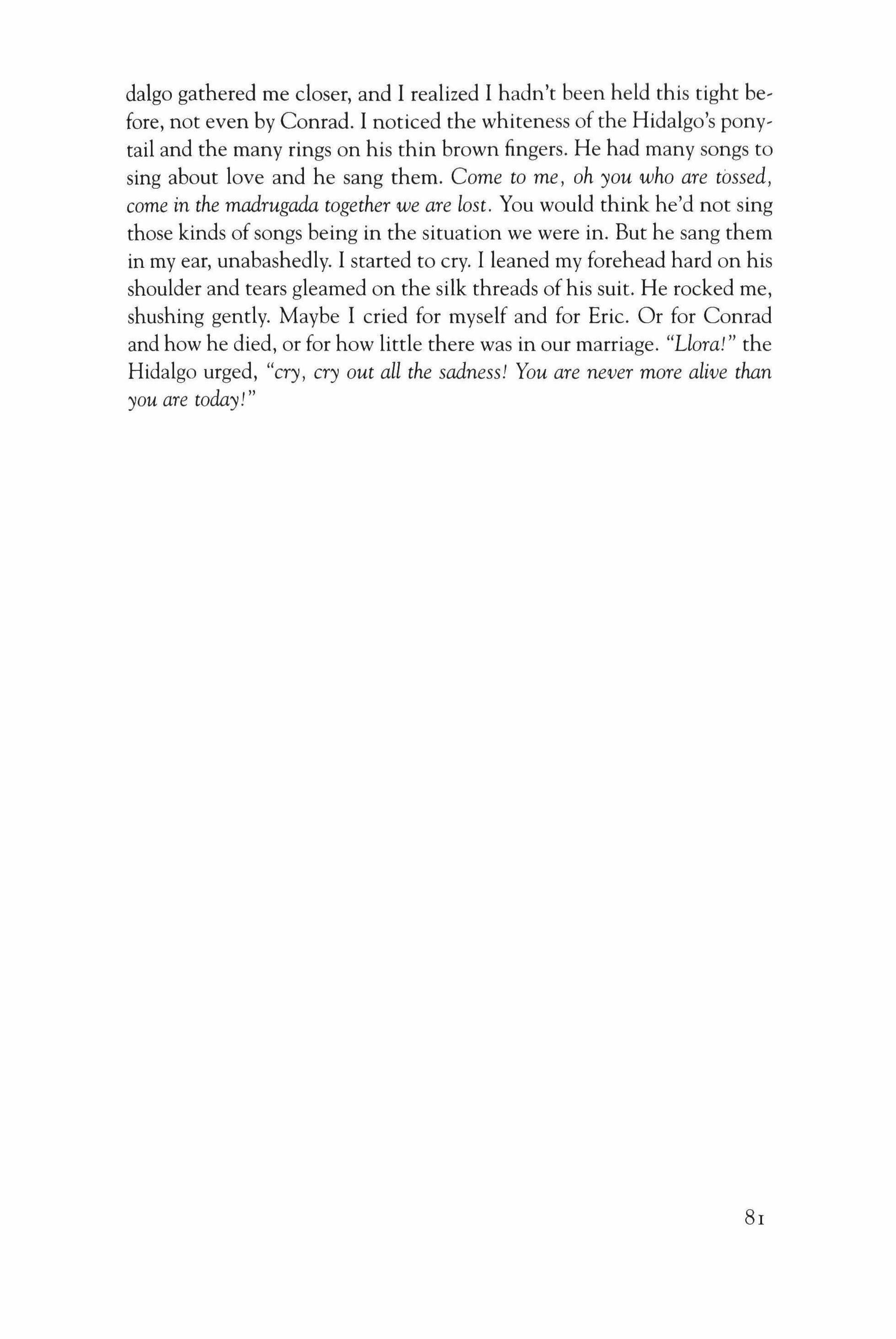
dalgo gathered me closer, and I realized I hadn't been held this tight before, not even by Conrad. I noticed the whiteness of the Hidalgo's ponytail and the many rings on his thin brown fingers. He had many songs to sing about love and he sang them. Come to me, oh you who are tossed, come in the madrugada together we are lost. You would think he'd not sing those kinds of songs being in the situation we were in. But he sang them in my ear, unabashedly. I started to cry. I leaned my forehead hard on his shoulder and tears gleamed on the silk threads of his suit. He rocked me, shushing gently. Maybe I cried for myself and for Eric. Or for Conrad and how he died, or for how little there was in our marriage. "Llora!" the Hidalgo urged, "cry, cry out all the sadness! You are never more alive than you are today!"
81
David Roderick

Greeting the Poacher
Son, our local myths were never written down, just breathed into the frozen air by hunters, woodjacks, trappers, because it was hard to track a place open and lean, where an Indian ghost mourned for his home, and a curious mist always burdened their tents with dew. Maybe the trees planning for snow were what they'd chosen, or the vapor of specified plants, or a fireside supper where they rested their mules and lanterns. Who knows? Now they're just bones clutched by the underbrush while you wait in this marsh, leaning in the weeds with a thumb on the safety of your gun.
What if those men barely spoke English or even patois? What if magnetic north was tilted in their minds, that the sun failed them or that wind
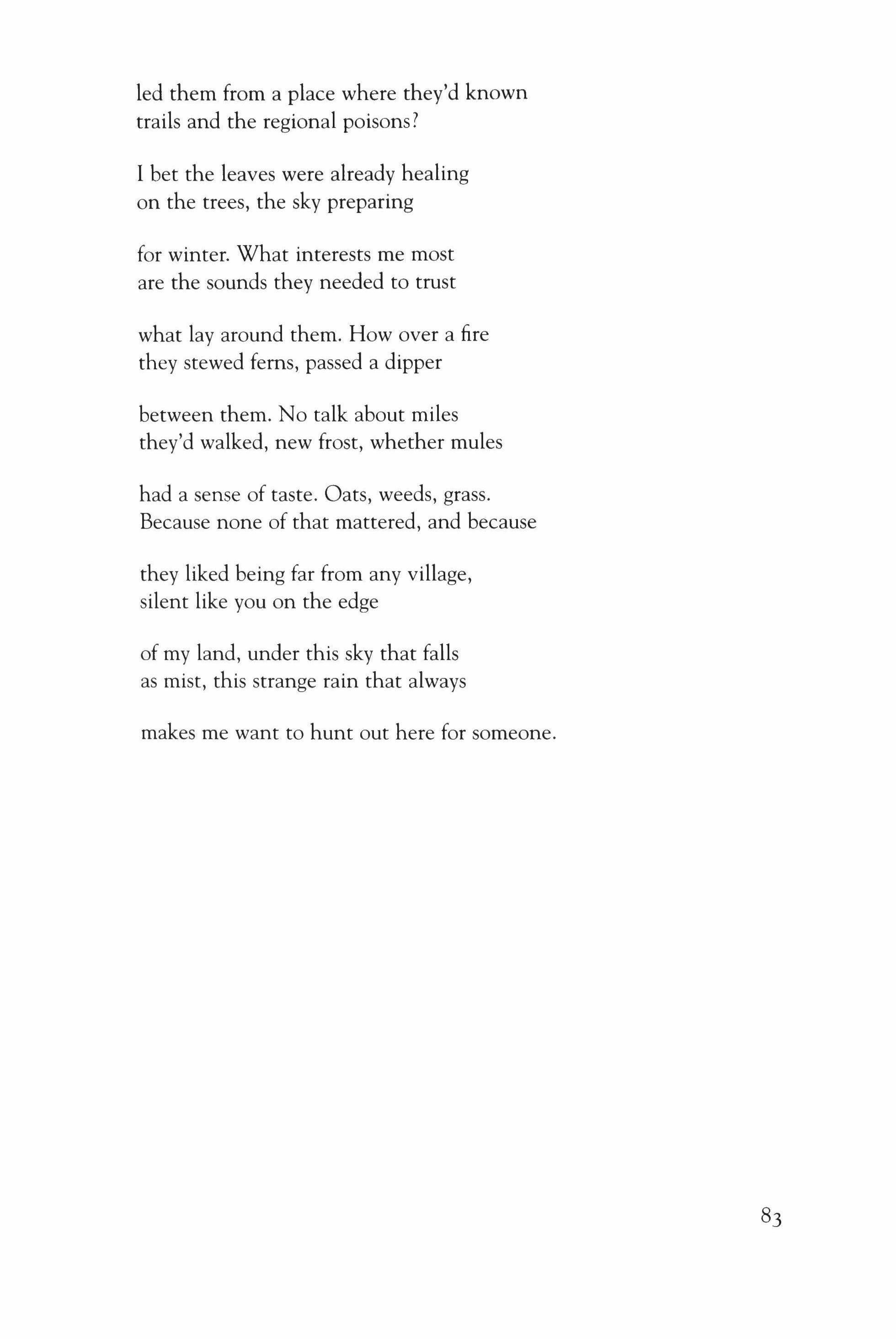
led them from a place where they'd known trails and the regional poisons?
1 bet the leaves were already healing on the trees, the sky preparing for winter. What interests me most are the sounds they needed to trust what lay around them. How over a fire they stewed ferns, passed a dipper between them. No talk about miles they'd walked, new frost, whether mules had a sense of taste. Oats, weeds, grass. Because none of that mattered, and because they liked being far from any village, silent like you on the edge of my land, under this sky that falls as mist, this strange rain that always makes me want to hunt out here for someone.
Notes on the Riverbank

Light opens the mind of the forest. What took me so long to find it?
Jingle-tlies on the compost pile, a punched-in face of a pumpkin.
At this casting hole, where the ground was worn by rain, I smell local dawn, a yeasty scent, vinegar the son of wine. Near my feet a rifle shell placed on a stump, a colony of spiders spreading from a cracked pod. Sun stirs out from the Billington. In its bed I see pulverized brick, the grayand-white shape of a pickerel. The marks along its sides are like spots on an old man's lung. The fish, my held breath, the toads emerging from camouflage all prove there is another language to live in, where leftover light finds my blood, and tree bark is the color of dark bread rising.
To Thoreau
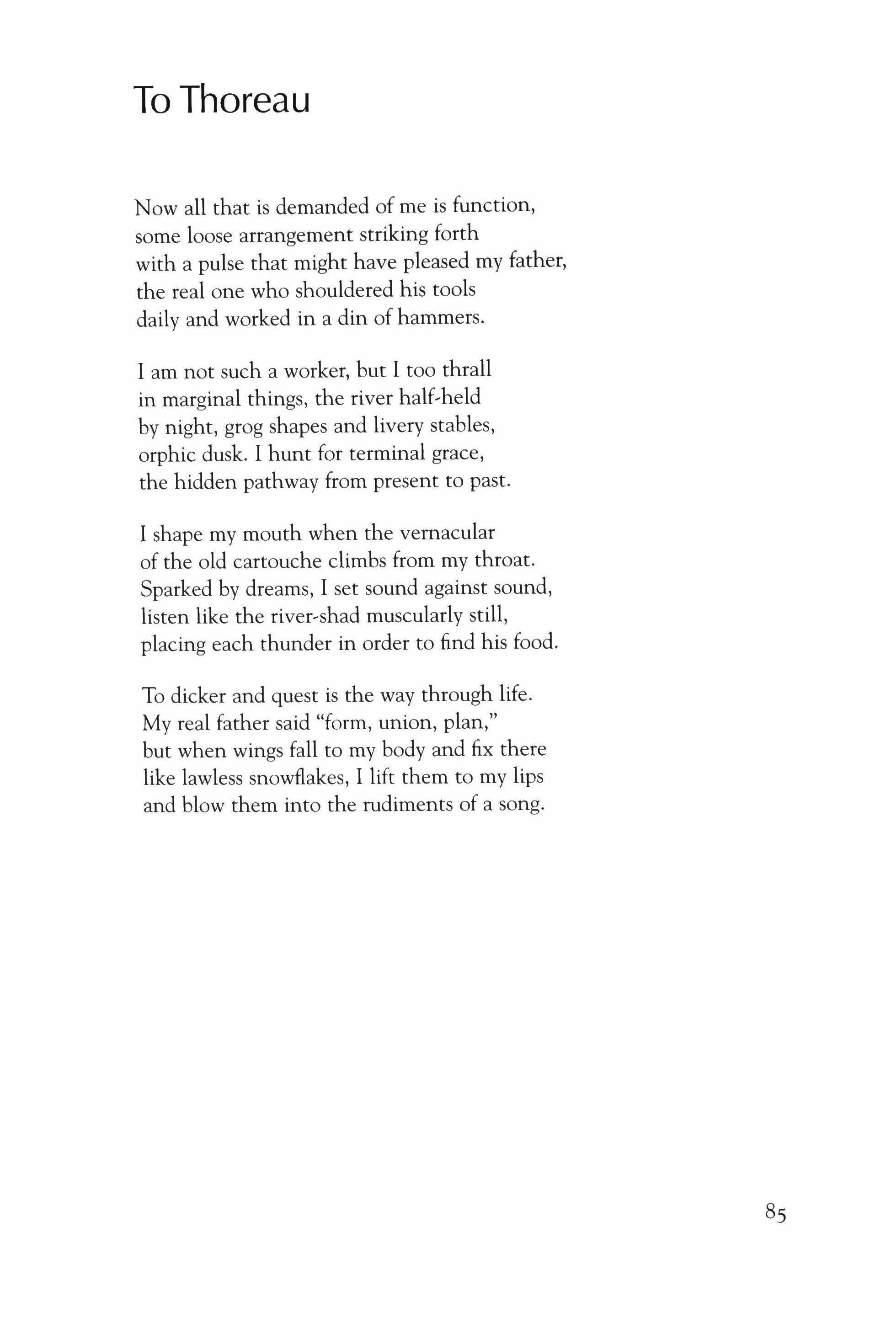
Now all that is demanded of me is function, some loose arrangement striking forth with a pulse that might have pleased my father, the real one who shouldered his tools daily and worked in a din of hammers.
I am not such a worker, but I too thrall in marginal things, the river half-held by night, grog shapes and livery stables, orphic dusk. I hunt for terminal grace, the hidden pathway from present to past.
I shape my mouth when the vernacular of the old cartouche climbs from my throat. Sparked by dreams, I set sound against sound, listen like the river-shad muscularly still, placing each thunder in order to find his food.
To dicker and quest is the way through life. My real father said "form, union, plan," but when wings fall to my body and fix there like lawless snowflakes, I lift them to my lips and blow them into the rudiments of a song.
85
Waterfront
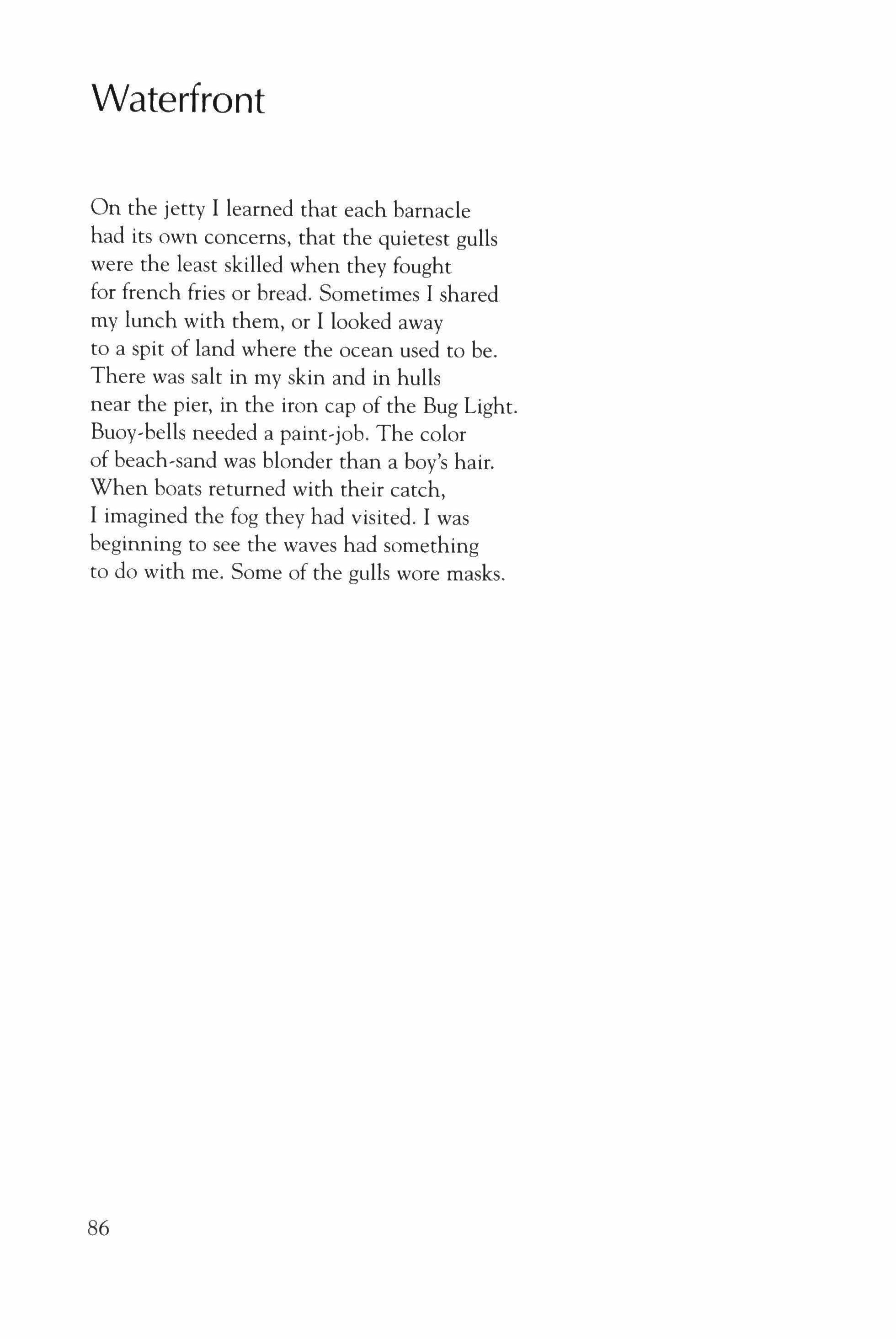
On the jetty I learned that each barnacle had its own concerns, that the quietest gulls were the least skilled when they fought for french fries or bread. Sometimes I shared my lunch with them, or I looked away to a spit of land where the ocean used to be. There was salt in my skin and in hulls near the pier, in the iron cap of the Bug Light. Buoy-bells needed a paint-job. The color of beach-sand was blonder than a boy's hair. When boats returned with their catch, I imagined the fog they had visited. I was beginning to see the waves had something to do with me. Some of the gulls wore masks.
86
Bob Hicok

Procedural
I asked Ralph what they call the thing that lowers the casket into the ground using straps
(like you'd find attached to an overhead crane in a factory and wrapped through a coil of steel that will be cleaned of slag, cut into twelve foot lengths, gathered into groups of forty or fifty rods, bundled in sheet metal bands and sold to a factory where they make hex head bolts.)
Ralph's name was on his olive colored shirt. The tattoo on the back of his hand had faded, an ace of spades. Imagine a game of poker played by moving ex-cons around, fifty-two right hands being shuffled. Ralph was short and thin as a cigarette that had smoked itself some clothes. When I spoke he stared at me and then the hole, at me and then the sky, which was out there, self-possessed doing its thing. I noticed on of his front teeth had been capped
{an impression of his upper left central incisor was sent to Adlers in Gainsville, makers of metalceramic crowns, he was shot three times with novocaine, his tooth was ground to a point, a temporary, acrylic crown was cemented in place, Ralph went home, watched TV, ate tomato soup, mowed the lawn, dug holes, came home, dug holes, came home,
ate half a can of beans and a grilled cheese, aimed his .38 at the Dobson's golden retriever at three-thirty-seven on a Tuesday morning, said bang, dug holes, went to "Trudys" without an apostrophe on the sign, felt he and Amber connected for a moment as she bent backwards and upside down on the pole, went to the dentist again, novocaine again, the temporary crown was removed, the permanent applied and ground just a bit on the bottom to fit Ralph's smile, which Ralph had kept hidden for fourteen years in his shoe) and had
more yellow in it than his other teeth, a bit of sun when he said that they call it the lowerer. Dirt was thudding against the top of the coffin as he said this, a knocking like the men and women in the black wanted in. Then the thudding turned soft, into a shushing, as if waves had found their way into the ground, and I thanked Ralph, kept saying lowerer, lowerer, in that part of the brain that's a tongue, that believes God is a sound. When the son of the dead man turned, I saw a hole in his face, he handed me the shovel
(the body must be covered in earth by the family, the body must be covered in earth by the family the body)
and I whispered what I know to say about loss
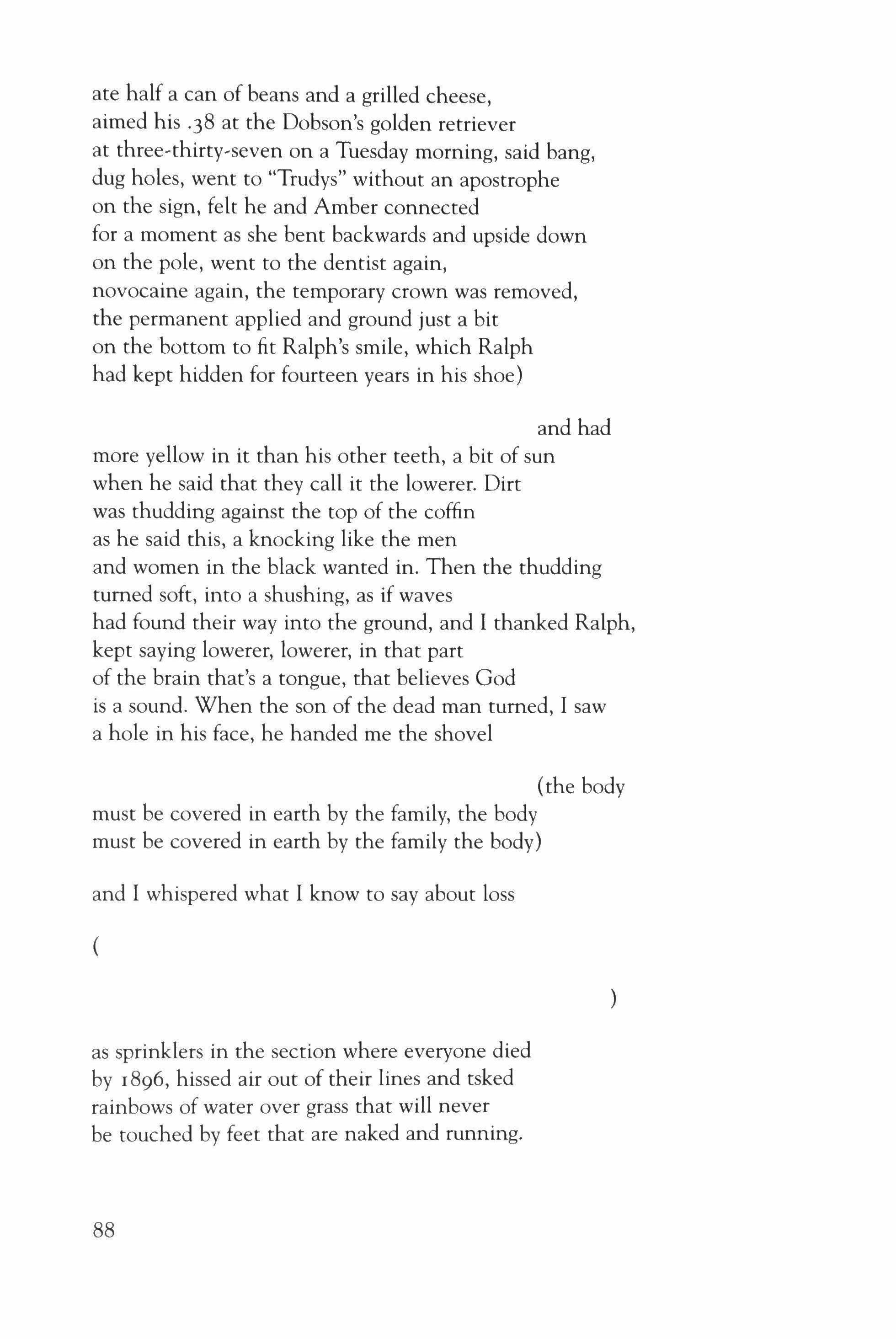
as sprinklers in the section where everyone died by 1896, hissed air out of their lines and tsked rainbows of water over grass that will never be touched by feet that are naked and running.
88
Elena Karina Byrne
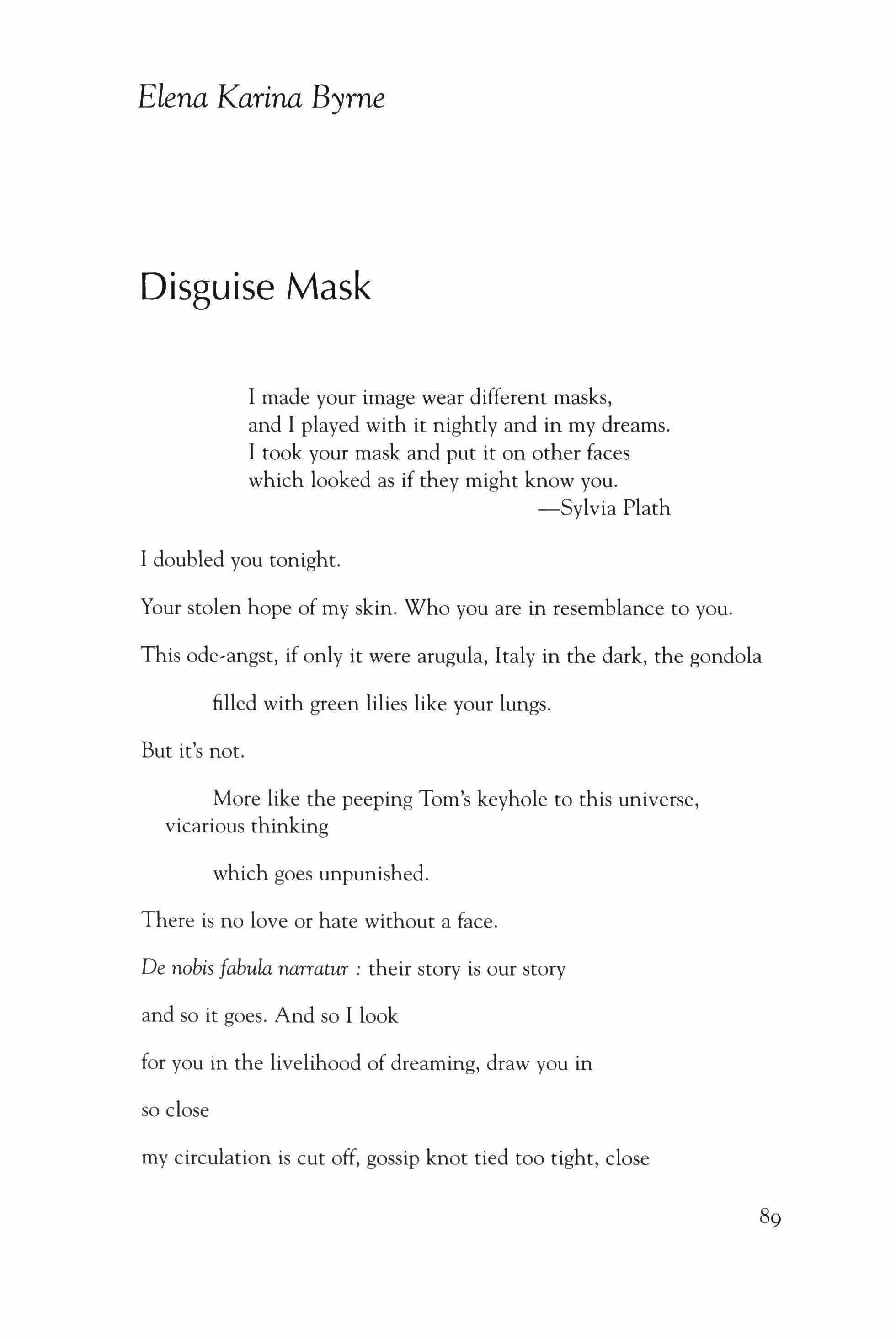
Disguise Mask
I made your image wear different masks, and I played with it nightly and in my dreams. I took your mask and put it on other faces which looked as if they might know you.
-Sylvia Plath
I doubled you tonight.
Your stolen hope of my skin. Who you are in resemblance to you.
This ode-angst, if only it were arugula, Italy in the dark, the gondola filled with green lilies like your lungs.
But it's not.
More like the peeping Tom's keyhole to this universe, vicarious thinking which goes unpunished.
There is no love or hate without a face.
De nobis fabula narratur : their story is our story and so it goes. And so I look for you in the livelihood of dreaming, draw you in so close my circulation is cut off, gossip knot tied too tight, close

enough to recognize you in the beforehand. When discourse was disguise, I carried your likeness in those other faces.
So speak to me, your spellbind just might get a message across my mouth. What I can't say in return won't hurt you. Speak book-backwards so I can read you in another language, then I will put you on, outnumbered by expressions on the expressionless. A mask for each body part, to fit the hands and feet looking up at me.
A kind of devotional quarantine, a snuff of your past which now looks like their future. But it's mine you're looking at; I am your only addict and I solemnly share you, your visceral ruin, a variation on the pale mask I pass around. Don't you see? Here: I take your face seriously. If I can't have you, everyone else will.

She Mask: Inversion
I had my luck, I met a lovely monster, And the story's this: I made the monster me.
-Stanley Kunitz
Her job's always been bad chime and tremble, the drumpomegranate anemone in the blood, my seed-wind, keeping keyboard averages between black and white. Outside.
Impersonator with no mercy, zealous seaweed-breed, proximate host to my bygones, on the chance for misfortune, she's half-naked for a swan-song, for a bedside letter with no manners.
Honestly,
I'm not dreaming though it suits me. You see, she's baited to be me: devourer of attention. She's right here, brooding the shape of fish. This version
always swerves apparent: She could be koi, saltwatered and retrieving O's for air, tied with cat-gut to the rust anchor, strung-out on the last happiness, white sand filling her ears. Now
you can hear the sound of the ocean approaching. Midway, the self has to sweat it out. So, I stand on shore, crowded by miscarry and blunder. Deemed everlasting, she's posturing for a chance to be forgiven, but I cannot say her name out loud
because it was me and not my amusement making it up.
Red tides distance themselves to descend shelves.
91
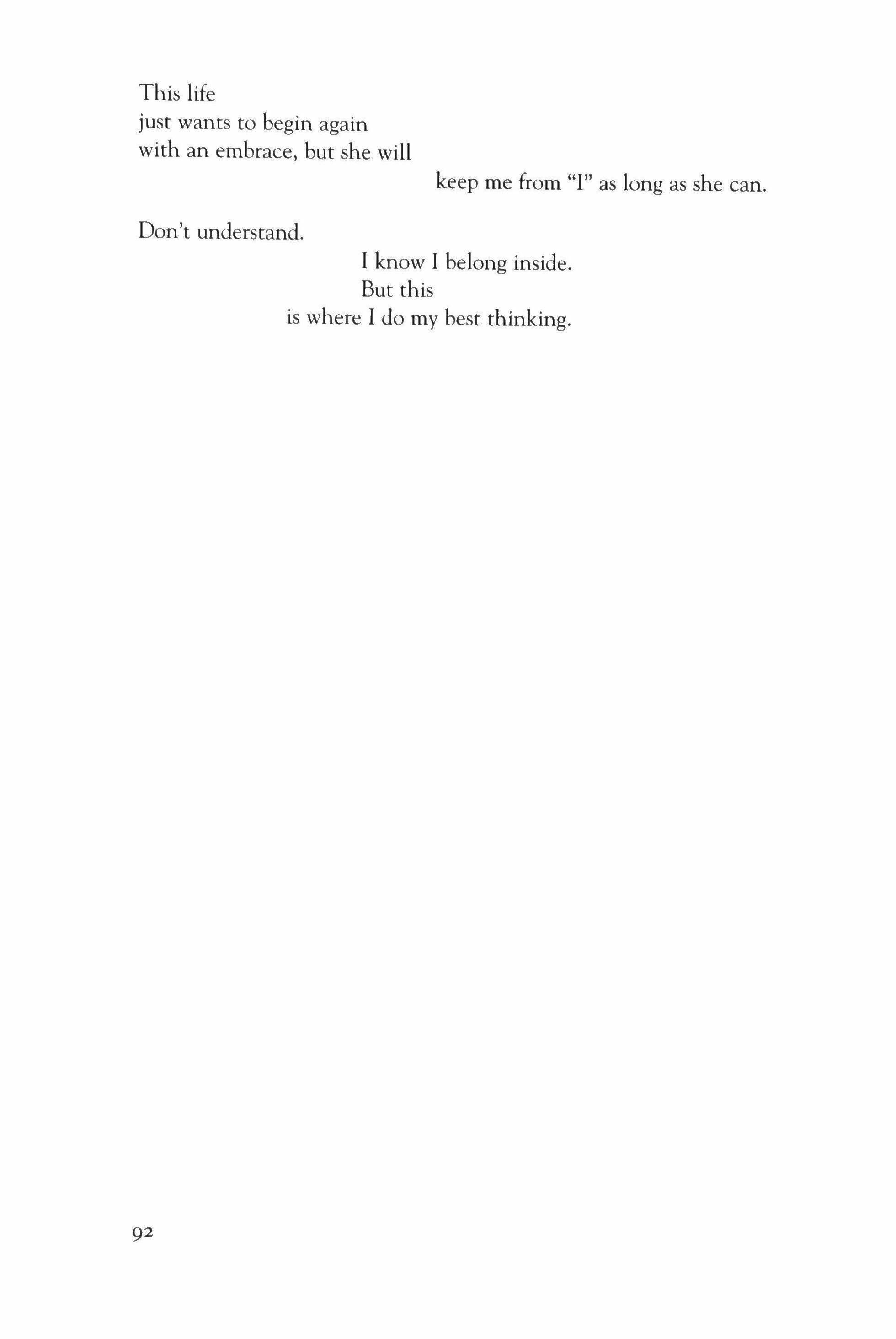
This life just wants to begin again with an embrace, but she will keep me from "I" as long as she can.
Don't understand.
I know I belong inside. But this is where I do my best thinking.
Barbara Hamby
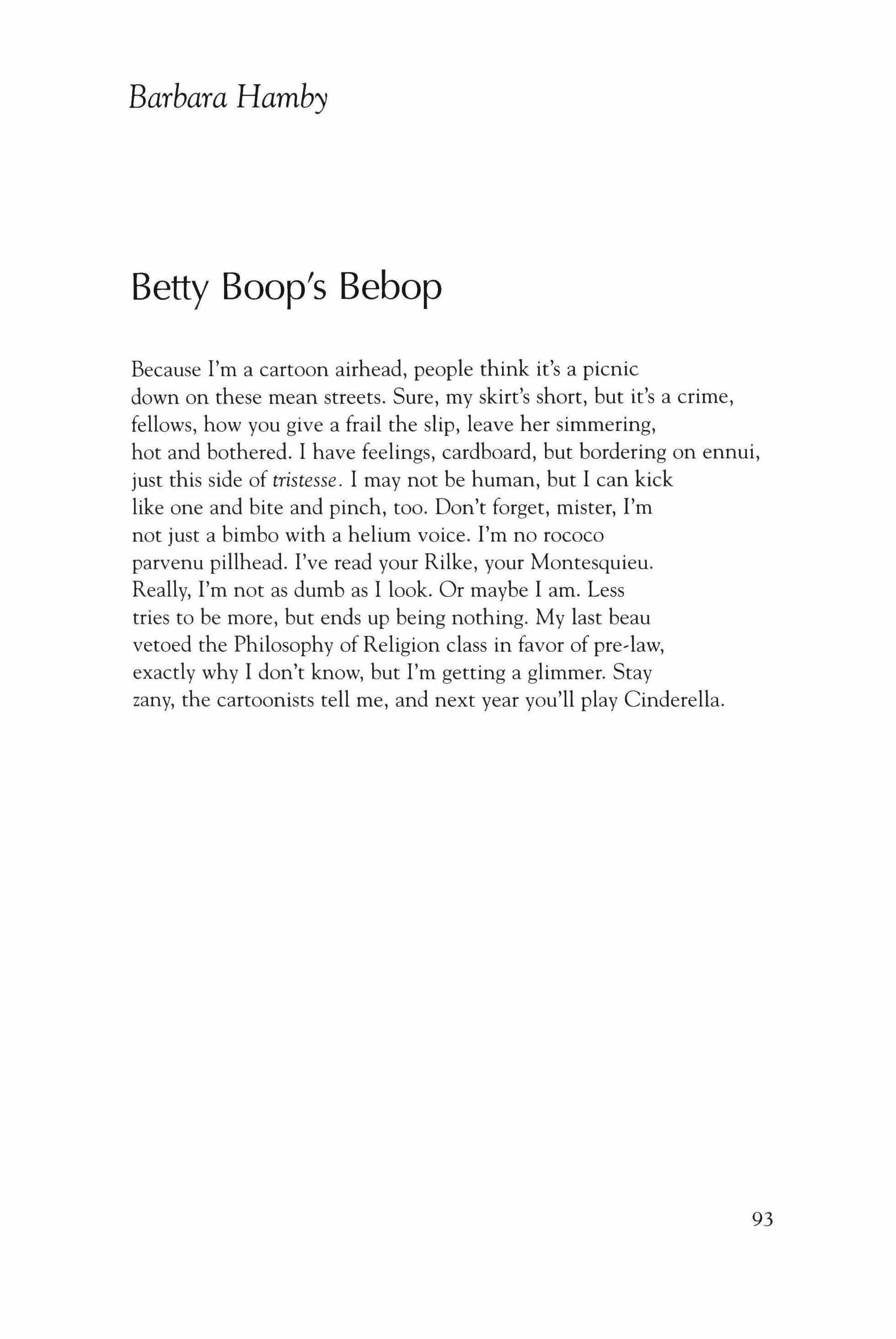
Betty Boop's Bebop
Because I'm a cartoon airhead, people think it's a picnic down on these mean streets. Sure, my skirt's short, but it's a crime, fellows, how you give a frail the slip, leave her simmering, hot and bothered. I have feelings, cardboard, but bordering on ennui, just this side of tristesse. I may not be human, but I can kick like one and bite and pinch, too. Don't forget, mister, I'm not just a bimbo with a helium voice. I'm no rococo parvenu pillhead. I've read your Rilke, your Montesquieu. Really, I'm not as dumb as I look. Or maybe I am. Less tries to be more, but ends up being nothing. My last beau vetoed the Philosophy of Religion class in favor of pre-law, exactly why I don't know, but I'm getting a glimmer. Stay zany, the cartoonists tell me, and next year you'll play Cinderella.
93
Karen, David, and I Stop Across the Street from the Pitti Palace
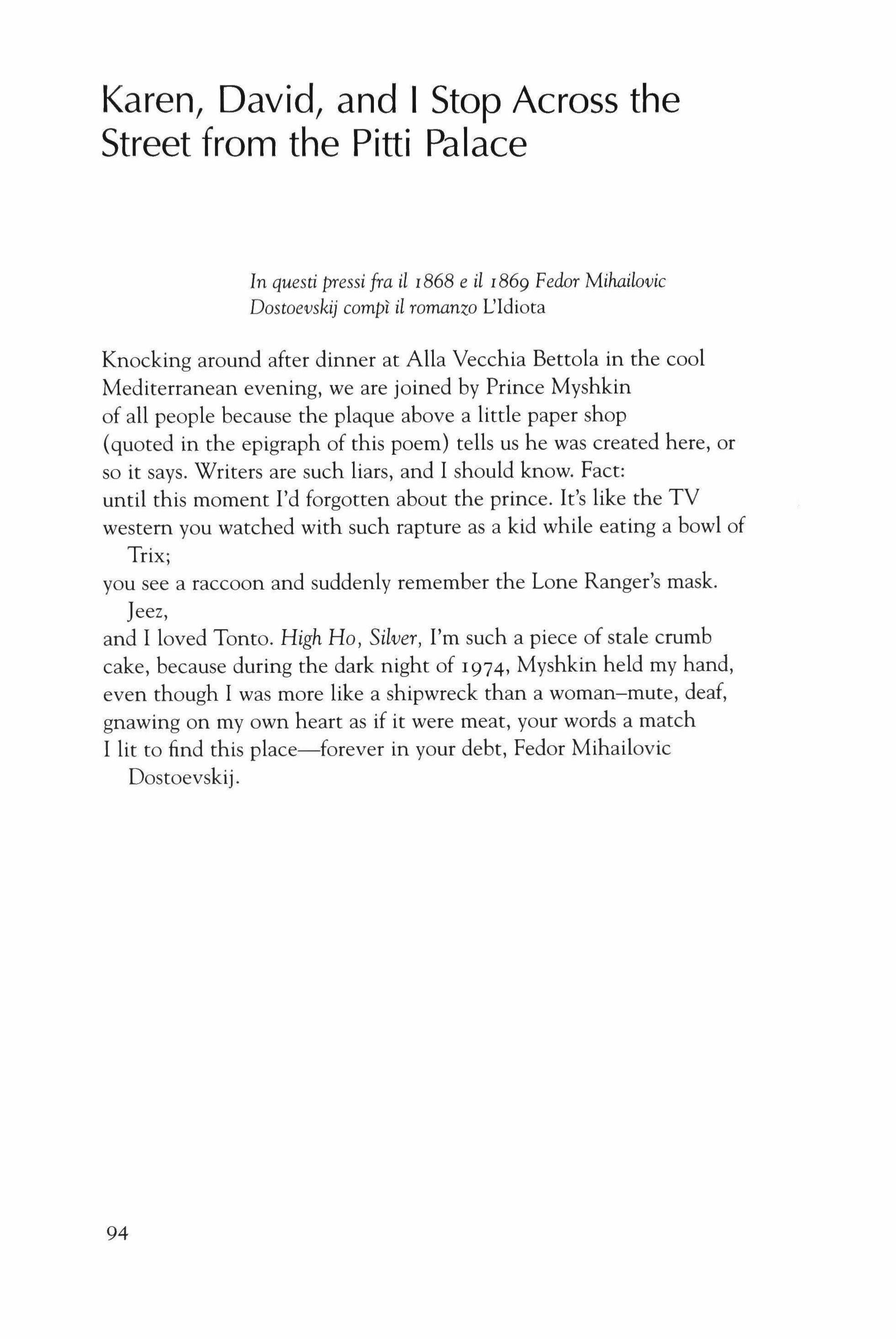
In questi pressi ira il r868 e il r869 Fedor Mihailovic
Dostoevskij compi il romanzo L'Idiota
Knocking around after dinner at Alla Vecchia Bettola in the cool Mediterranean evening, we are joined by Prince Myshkin of all people because the plaque above a little paper shop (quoted in the epigraph of this poem) tells us he was created here, or so it says. Writers are such liars, and I should know. Fact: until this moment I'd forgotten about the prince. It's like the TV western you watched with such rapture as a kid while eating a bowl of Trix; you see a raccoon and suddenly remember the Lone Ranger's mask. Jeez, and I loved Tonto. High Ho, Silver, I'm such a piece of stale crumb cake, because during the dark night of 1974, Myshkin held my hand, even though I was more like a shipwreck than a woman-mute, deaf, gnawing on my own heart as if it were meat, your words a match I lit to find this place-forever in your debt, Fedor Mihailovic Dostoevskij.
94
Zeus, It's Your Leda, Sweetie Pie
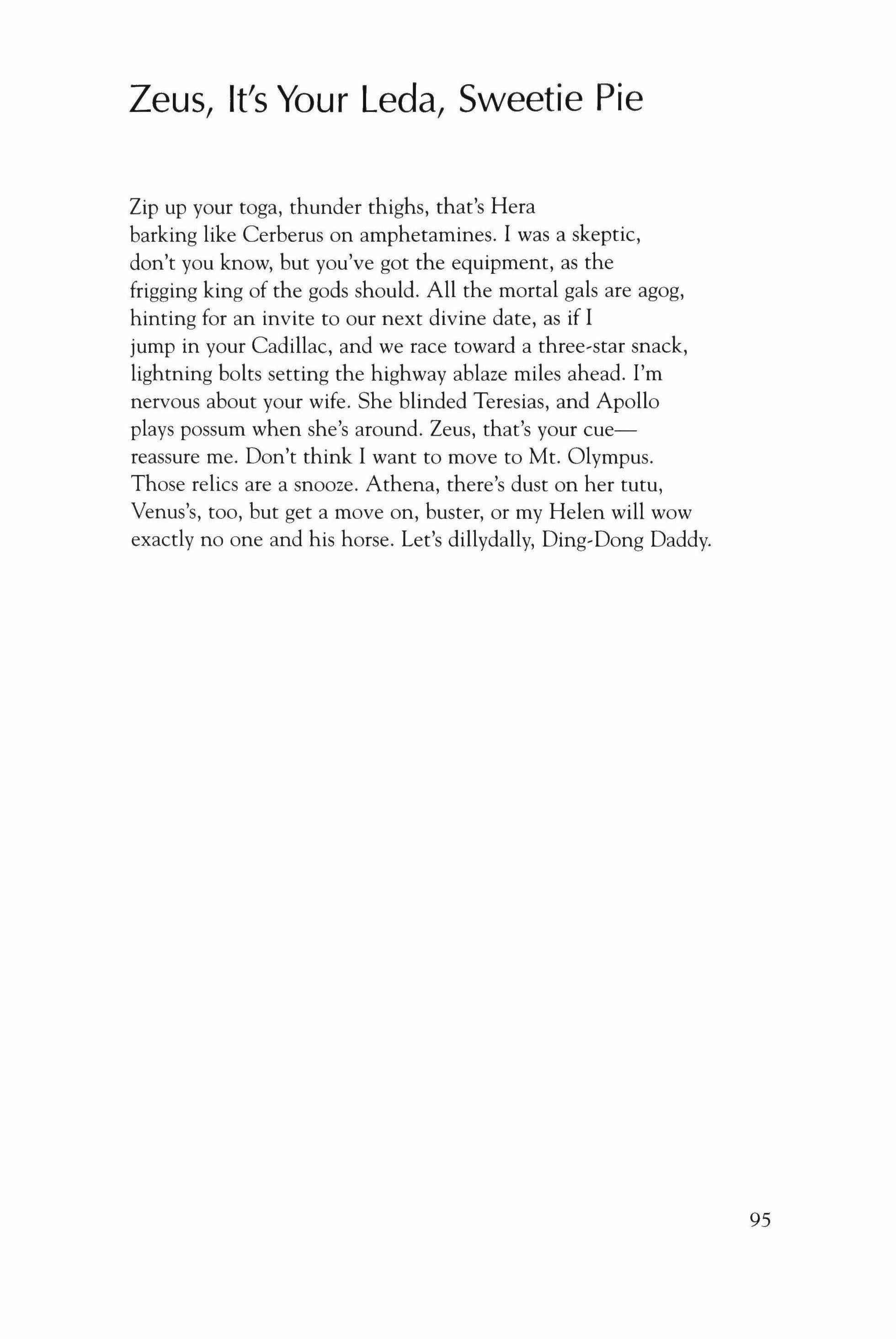
Zip up your toga, thunder thighs, that's Hera barking like Cerberus on amphetamines. I was a skeptic, don't you know, but you've got the equipment, as the frigging king of the gods should. All the mortal gals are agog, hinting for an invite to our next divine date, as if I jump in your Cadillac, and we race toward a three-star snack, lightning bolts setting the highway ablaze miles ahead. I'm nervous about your wife. She blinded Teresias, and Apollo plays possum when she's around. Zeus, that's your cuereassure me. Don't think I want to move to Mt. Olympus. Those relics are a snooze. Athena, there's dust on her tutu, Venus's, too, but get a move on, buster, or my Helen will wow exactly no one and his horse. Let's dillydally, Ding-Dong Daddy.
95
Moira Crone
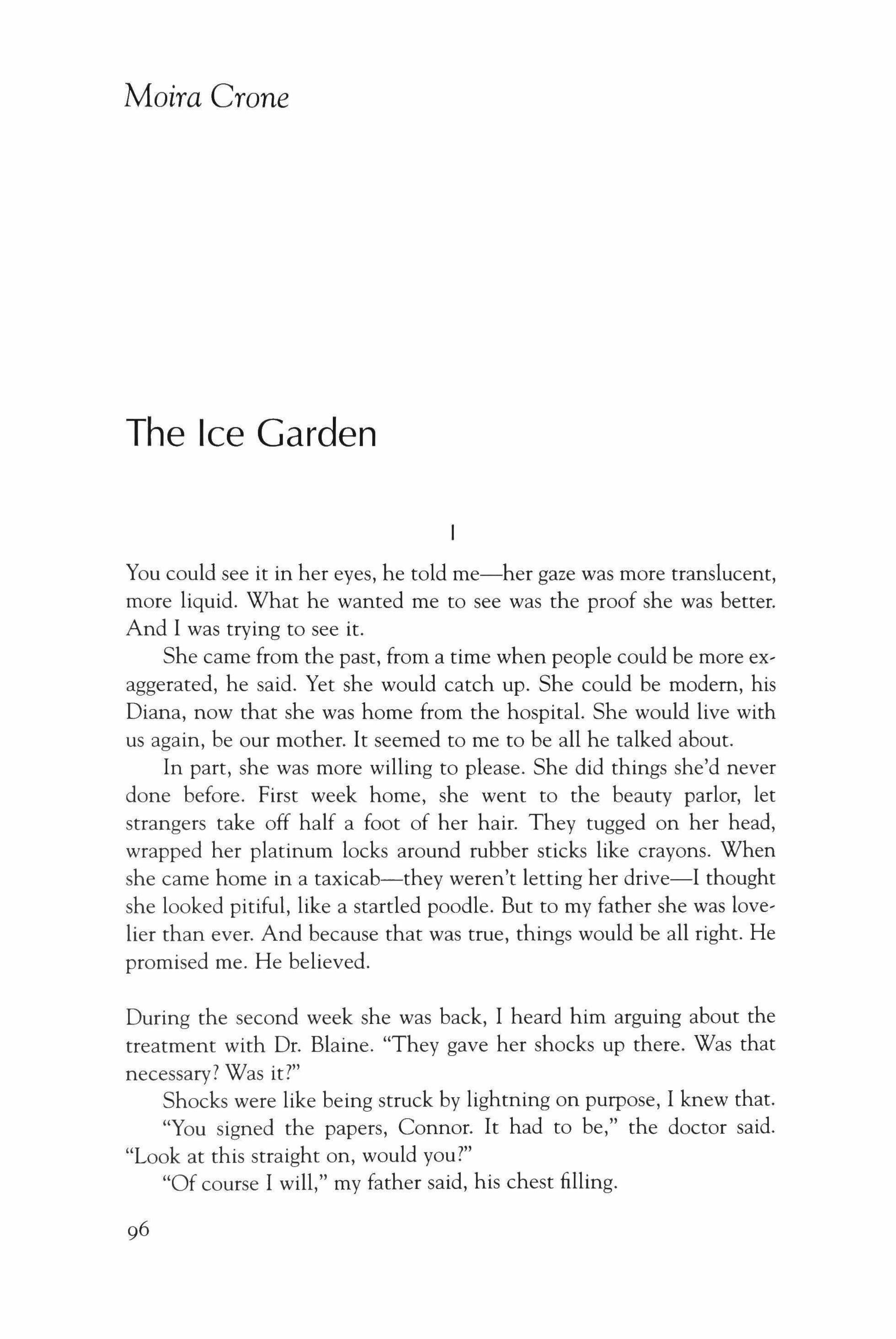
The Ice Garden
You could see it in her eyes, he told me-her gaze was more translucent, more liquid. What he wanted me to see was the proof she was better. And I was trying to see it.
She came from the past, from a time when people could be more ex, aggerated, he said. Yet she would catch up. She could be modem, his Diana, now that she was home from the hospital. She would live with us again, be our mother. It seemed to me to be all he talked about.
In part, she was more willing to please. She did things she'd never done before. First week home, she went to the beauty parlor, let strangers take off half a foot of her hair. They tugged on her head, wrapped her platinum locks around rubber sticks like crayons. When she came home in a taxicab-they weren't letting her drive-I thought she looked pitiful, like a startled poodle. But to my father she was love, lier than ever. And because that was true, things would be all right. He promised me. He believed.
During the second week she was back, I heard him arguing about the treatment with Dr. Blaine. "They gave her shocks up there. Was that necessary? Was it?"
Shocks were like being struck by lightning on purpose, I knew that.
"You signed the papers, Connor. It had to be," the doctor said. "Look at this straight on, would you?"
"Of course I will," my father said, his chest filling.
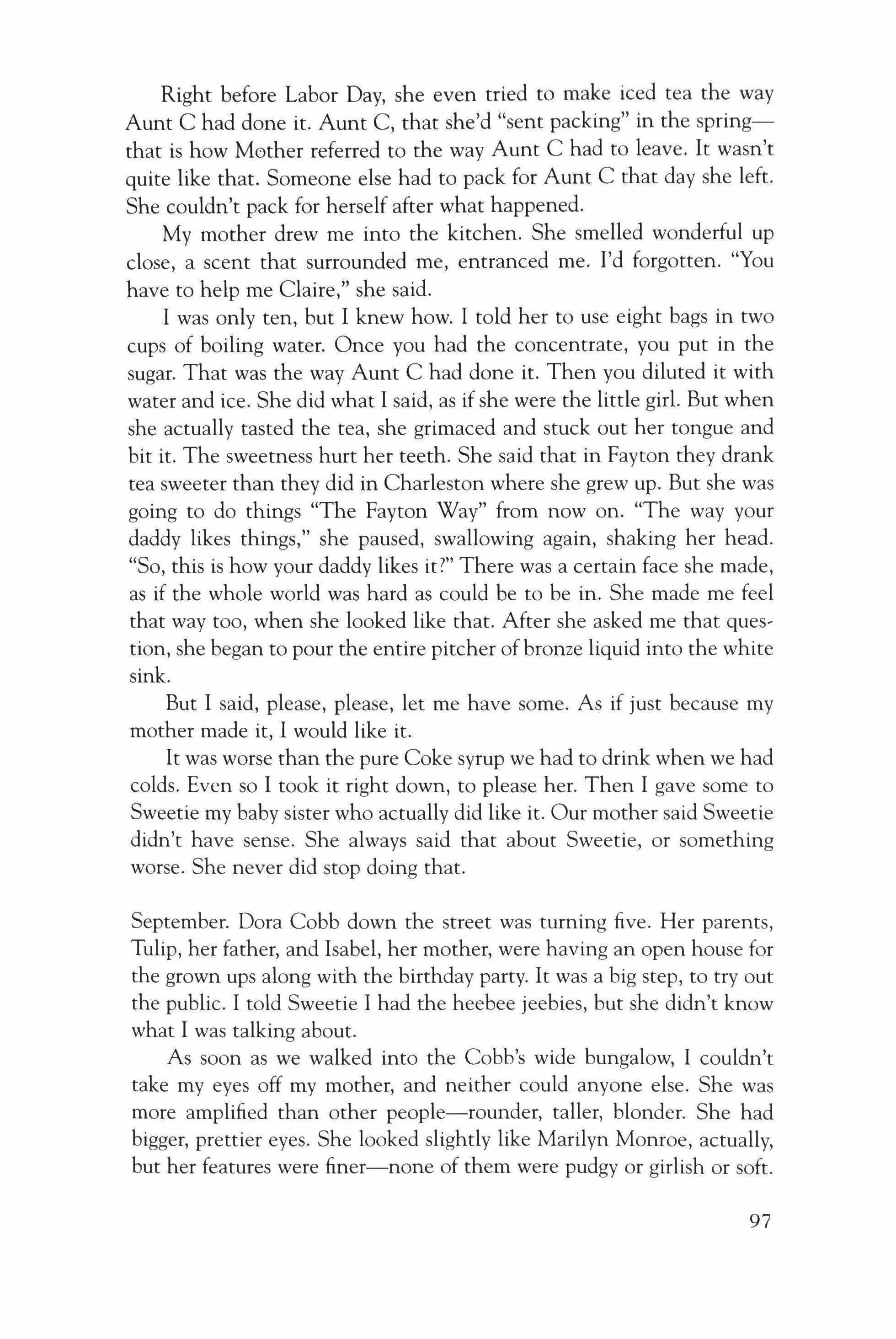
Right before Labor Day, she even tried to make iced tea the way Aunt C had done it. Aunt C, that she'd "sent packing" in the springthat is how Mother referred to the way Aunt C had to leave. It wasn't quite like that. Someone else had to pack for Aunt C that day she left. She couldn't pack for herself after what happened. My mother drew me into the kitchen. She smelled wonderful up close, a scent that surrounded me, entranced me. I'd forgotten. "You have to help me Claire," she said.
I was only ten, but I knew how. I told her to use eight bags in two cups of boiling water. Once you had the concentrate, you put in the sugar. That was the way Aunt C had done it. Then you diluted it with water and ice. She did what I said, as if she were the little girl. But when she actually tasted the tea, she grimaced and stuck out her tongue and bit it. The sweetness hurt her teeth. She said that in Fayton they drank tea sweeter than they did in Charleston where she grew up. But she was going to do things "The Fayton Way" from now on. "The way your daddy likes things," she paused, swallowing again, shaking her head. "So, this is how your daddy likes it?" There was a certain face she made, as if the whole world was hard as could be to be in. She made me feel that way too, when she looked like that. After she asked me that question, she began to pour the entire pitcher of bronze liquid into the white sink.
But I said, please, please, let me have some. As if just because my mother made it, I would like it.
It was worse than the pure Coke syrup we had to drink when we had colds. Even so I took it right down, to please her. Then I gave some to Sweetie my baby sister who actually did like it. Our mother said Sweetie didn't have sense. She always said that about Sweetie, or something worse. She never did stop doing that.
September. Dora Cobb down the street was turning five. Her parents, Tulip, her father, and Isabel, her mother, were having an open house for the grown ups along with the birthday party. It was a big step, to try out the public. I told Sweetie I had the heebee jeebies, but she didn't know what I was talking about.
As soon as we walked into the Cobb's wide bungalow, I couldn't take my eyes off my mother, and neither could anyone else. She was more amplified than other people-rounder, taller, blonder. She had bigger, prettier eyes. She looked slightly like Marilyn Monroe, actually, but her features were finer-none of them were pudgy or girlish or soft.
97
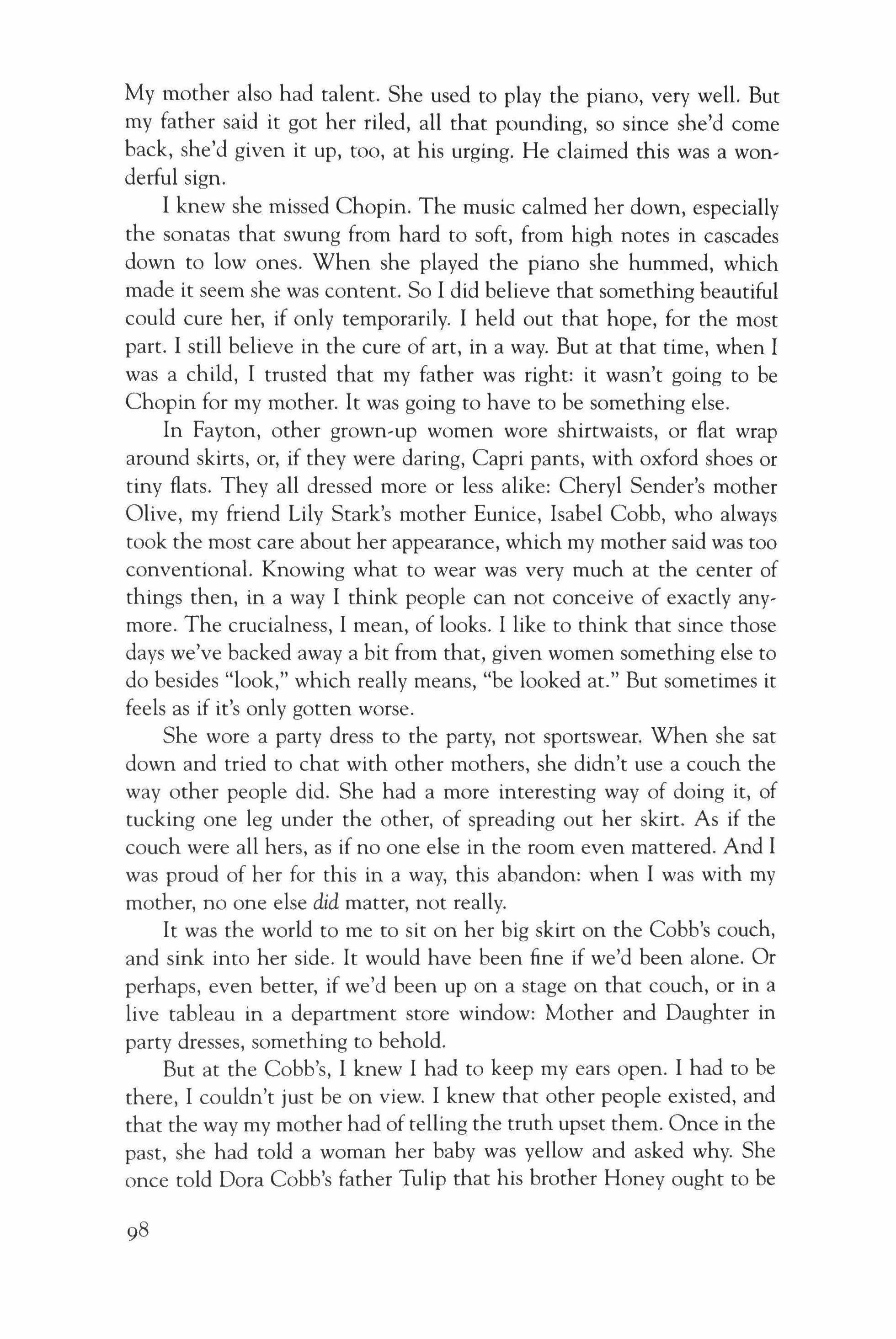
My mother also had talent. She used to play the piano, very well. But my father said it got her riled, all that pounding, so since she'd come back, she'd given it up, too, at his urging. He claimed this was a wonderful sign.
I knew she missed Chopin. The music calmed her down, especially the sonatas that swung from hard to soft, from high notes in cascades down to low ones. When she played the piano she hummed, which made it seem she was content. So I did believe that something beautiful could cure her, if only temporarily. I held out that hope, for the most part. I still believe in the cure of art, in a way. But at that time, when I was a child, I trusted that my father was right: it wasn't going to be Chopin for my mother. It was going to have to be something else.
In Fayton, other grown-up women wore shirtwaists, or flat wrap around skirts, or, if they were daring, Capri pants, with oxford shoes or tiny flats. They all dressed more or less alike: Cheryl Sender's mother Olive, my friend Lily Stark's mother Eunice, Isabel Cobb, who always took the most care about her appearance, which my mother said was too conventional. Knowing what to wear was very much at the center of things then, in a way I think people can not conceive of exactly anymore. The crucialness, I mean, of looks. I like to think that since those days we've backed away a bit from that, given women something else to do besides "look," which really means, "be looked at." But sometimes it feels as if it's only gotten worse.
She wore a party dress to the party, not sportswear. When she sat down and tried to chat with other mothers, she didn't use a couch the way other people did. She had a more interesting way of doing it, of tucking one leg under the other, of spreading out her skirt. As if the couch were all hers, as if no one else in the room even mattered. And I was proud of her for this in a way, this abandon: when I was with my mother, no one else did matter, not really.
It was the world to me to sit on her big skirt on the Cobb's couch, and sink into her side. It would have been fine if we'd been alone. Or perhaps, even better, if we'd been up on a stage on that couch, or in a live tableau in a department store window: Mother and Daughter in party dresses, something to behold.
But at the Cobb's, I knew I had to keep my ears open. I had to be there, I couldn't just be on view. I knew that other people existed, and that the way my mother had of telling the truth upset them. Once in the past, she had told a woman her baby was yellow and asked why. She once told Dora Cobb's father Tulip that his brother Honey ought to be
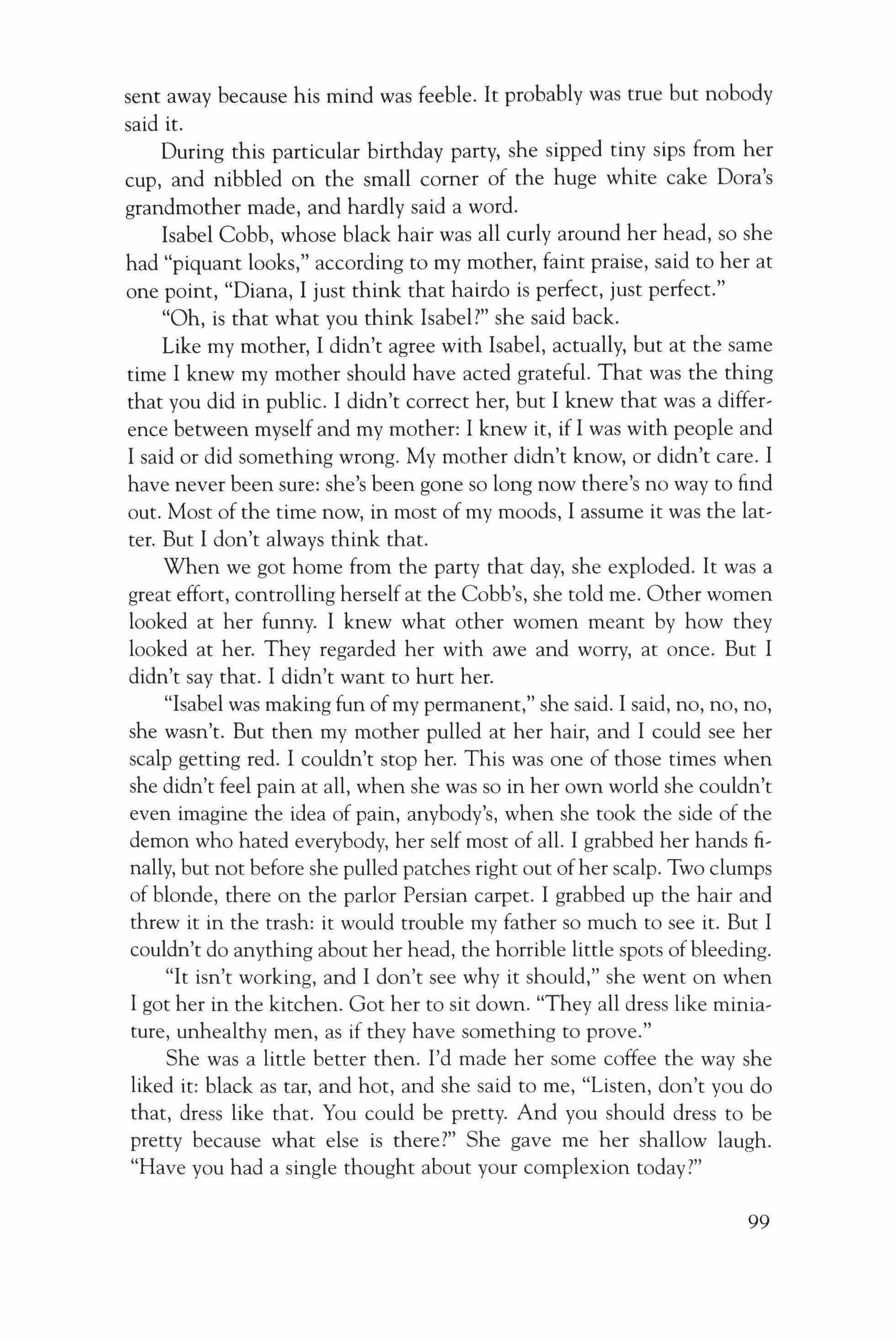
sent away because his mind was feeble. It probably was true but nobody said it.
During this particular birthday party, she sipped tiny sips from her cup, and nibbled on the small comer of the huge white cake Dora's grandmother made, and hardly said a word.
Isabel Cobb, whose black hair was all curly around her head, so she had "piquant looks," according to my mother, faint praise, said to her at one point, "Diana, I just think that hairdo is perfect, just perfect."
"Oh, is that what you think Isabel?" she said back.
Like my mother, I didn't agree with Isabel, actually, but at the same time I knew my mother should have acted grateful. That was the thing that you did in public. I didn't correct her, but I knew that was a difference between myself and my mother: I knew it, if I was with people and I said or did something wrong. My mother didn't know, or didn't care. I have never been sure: she's been gone so long now there's no way to find out. Most of the time now, in most of my moods, I assume it was the latter. But I don't always think that.
When we got home from the party that day, she exploded. It was a great effort, controlling herself at the Cobb's, she told me. Other women looked at her funny. I knew what other women meant by how they looked at her. They regarded her with awe and worry, at once. But I didn't say that. I didn't want to hurt her.
"Isabel was making fun of my permanent," she said. I said, no, no, no, she wasn't. But then my mother pulled at her hair, and I could see her scalp getting red. I couldn't stop her. This was one of those times when she didn't feel pain at all, when she was so in her own world she couldn't even imagine the idea of pain, anybody's, when she took the side of the demon who hated everybody, her self most of all. I grabbed her hands finally, but not before she pulled patches right out ofher scalp. Two clumps of blonde, there on the parlor Persian carpet. I grabbed up the hair and threw it in the trash: it would trouble my father so much to see it. But I couldn't do anything about her head, the horrible little spots ofbleeding.
"It isn't working, and I don't see why it should," she went on when I got her in the kitchen. Got her to sit down. "They all dress like miniature, unhealthy men, as if they have something to prove."
She was a little better then. I'd made her some coffee the way she liked it: black as tar, and hot, and she said to me, "Listen, don't you do that, dress like that. You could be pretty. And you should dress to be pretty because what else is there?" She gave me her shallow laugh. "Have you had a single thought about your complexion today?"
99
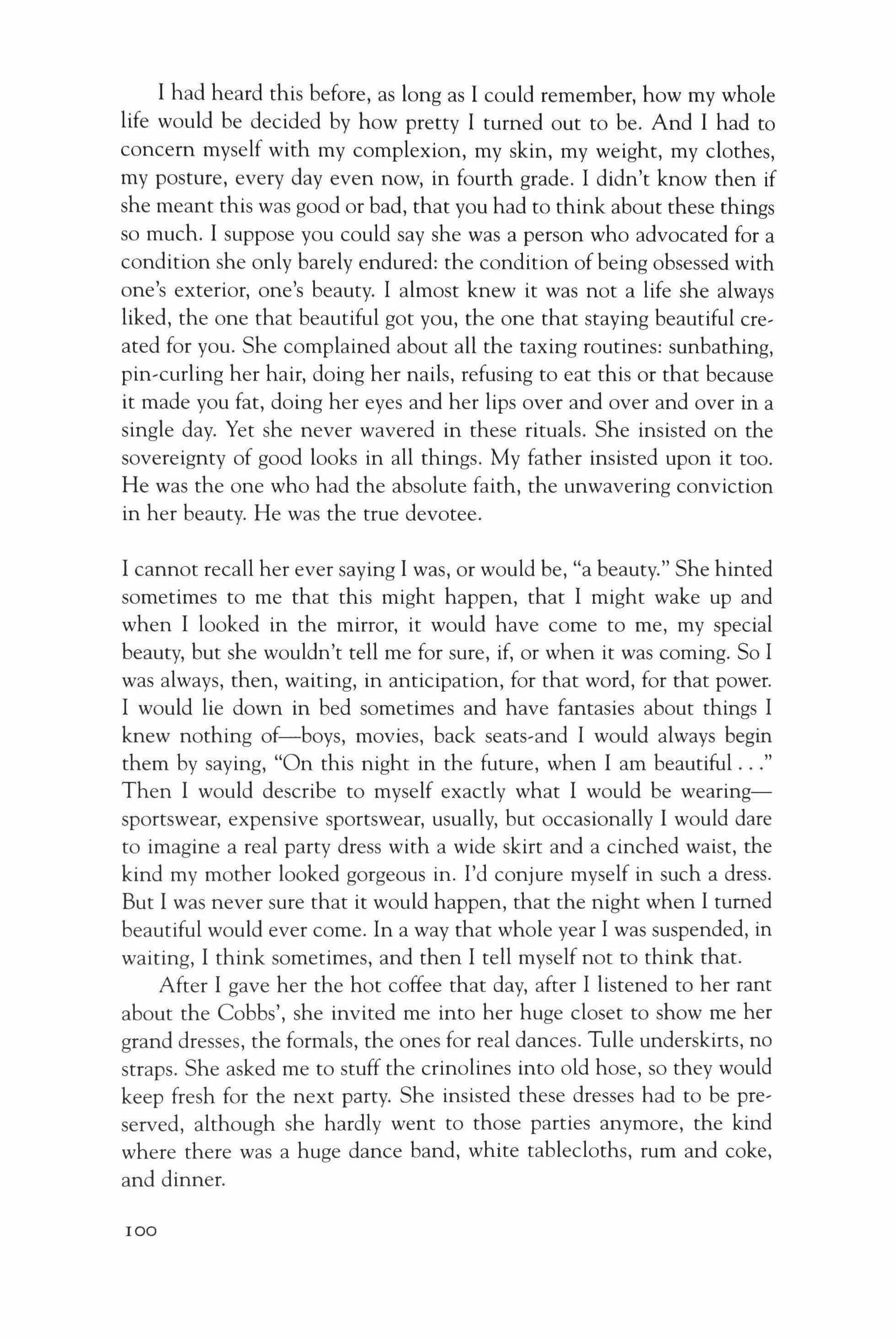
I had heard this before, as long as I could remember, how my whole life would be decided by how pretty I turned out to be. And I had to concern myself with my complexion, my skin, my weight, my clothes, my posture, every day even now, in fourth grade. I didn't know then if she meant this was good or bad, that you had to think about these things so much. I suppose you could say she was a person who advocated for a condition she only barely endured: the condition of being obsessed with one's exterior, one's beauty. I almost knew it was not a life she always liked, the one that beautiful got you, the one that staying beautiful created for you. She complained about all the taxing routines: sunbathing, pin-curling her hair, doing her nails, refusing to eat this or that because it made you fat, doing her eyes and her lips over and over and over in a single day. Yet she never wavered in these rituals. She insisted on the sovereignty of good looks in all things. My father insisted upon it too. He was the one who had the absolute faith, the unwavering conviction in her beauty. He was the true devotee.
I cannot recall her ever saying I was, or would be, "a beauty." She hinted sometimes to me that this might happen, that I might wake up and when I looked in the mirror, it would have come to me, my special beauty, but she wouldn't tell me for sure, if, or when it was coming. So I was always, then, waiting, in anticipation, for that word, for that power. I would lie down in bed sometimes and have fantasies about things I knew nothing of-boys, movies, back seats-and I would always begin them by saying, "On this night in the future, when I am beautiful Then I would describe to myself exactly what I would be wearingsportswear, expensive sportswear, usually, but occasionally I would dare to imagine a real party dress with a wide skirt and a cinched waist, the kind my mother looked gorgeous in. I'd conjure myself in such a dress. But I was never sure that it would happen, that the night when I turned beautiful would ever come. In a way that whole year I was suspended, in waiting, I think sometimes, and then I tell myself not to think that.
After I gave her the hot coffee that day, after I listened to her rant about the Cobbs', she invited me into her huge closet to show me her grand dresses, the formals, the ones for real dances. Tulle underskirts, no straps. She asked me to stuff the crinolines into old hose, so they would keep fresh for the next party. She insisted these dresses had to be preserved, although she hardly went to those parties anymore, the kind where there was a huge dance band, white tablecloths, rum and coke, and dinner.
100
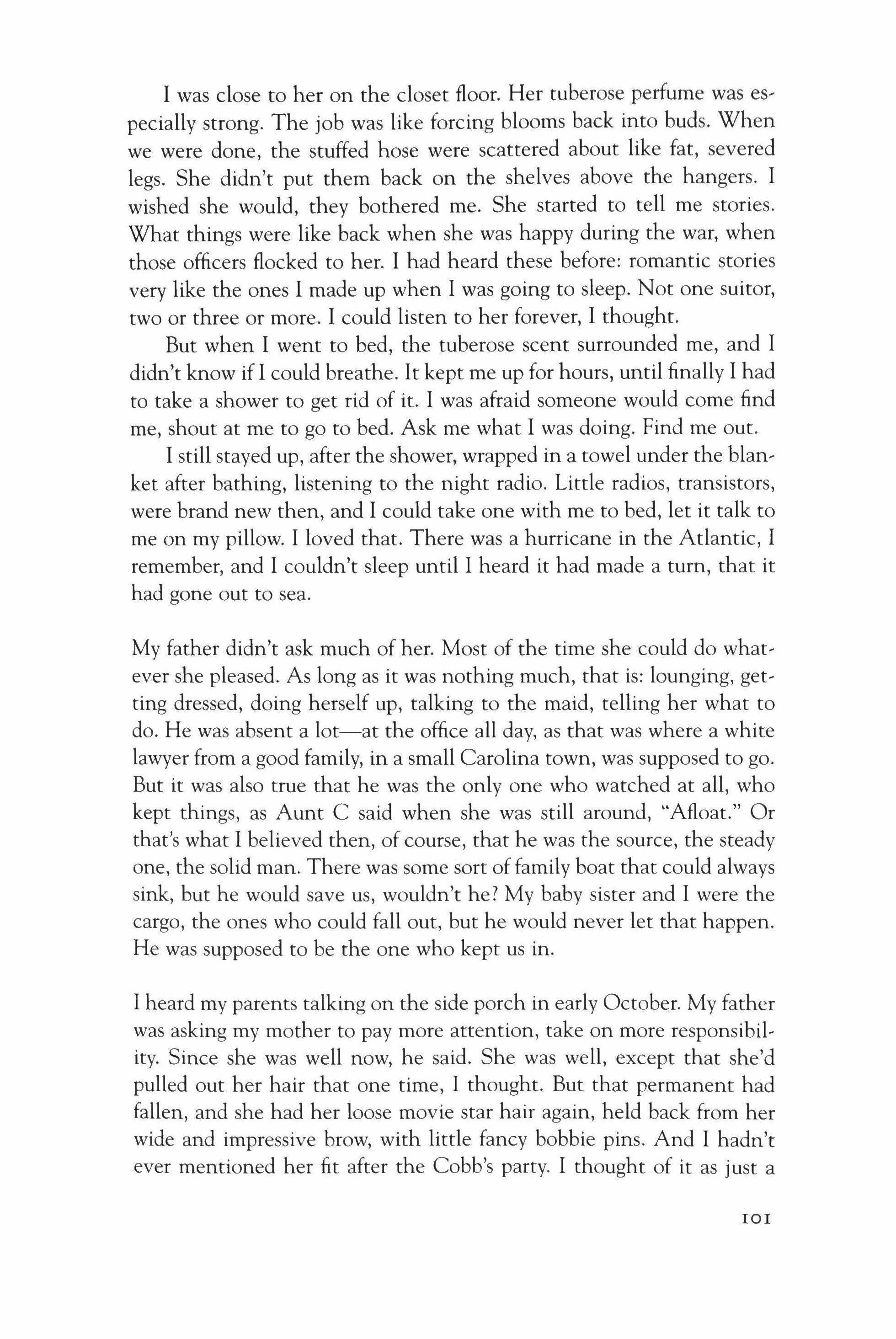
I was close to her on the closet floor. Her tuberose perfume was es� pecially strong. The job was like forcing blooms back into buds. When we were done, the stuffed hose were scattered about like fat, severed legs. She didn't put them back on the shelves above the hangers. I wished she would, they bothered me. She started to tell me stories. What things were like back when she was happy during the war, when those officers flocked to her. I had heard these before: romantic stories very like the ones I made up when I was going to sleep. Not one suitor, two or three or more. I could listen to her forever, I thought.
But when I went to bed, the tuberose scent surrounded me, and I didn't know if I could breathe. It kept me up for hours, until finally I had to take a shower to get rid of it. I was afraid someone would come find me, shout at me to go to bed. Ask me what I was doing. Find me out.
I still stayed up, after the shower, wrapped in a towel under the blanket after bathing, listening to the night radio. Little radios, transistors, were brand new then, and I could take one with me to bed, let it talk to me on my pillow. I loved that. There was a hurricane in the Atlantic, I remember, and I couldn't sleep until I heard it had made a turn, that it had gone out to sea.
My father didn't ask much of her. Most of the time she could do whatever she pleased. As long as it was nothing much, that is: lounging, getting dressed, doing herself up, talking to the maid, telling her what to do. He was absent a lot-at the office all day, as that was where a white lawyer from a good family, in a small Carolina town, was supposed to go. But it was also true that he was the only one who watched at all, who kept things, as Aunt C said when she was still around, "Afloat." Or that's what I believed then, of course, that he was the source, the steady one, the solid man. There was some sort of family boat that could always sink, but he would save us, wouldn't he? My baby sister and I were the cargo, the ones who could fall out, but he would never let that happen. He was supposed to be the one who kept us in.
I heard my parents talking on the side porch in early October. My father was asking my mother to pay more attention, take on more responsibility. Since she was well now, he said. She was well, except that she'd pulled out her hair that one time, I thought. But that permanent had fallen, and she had her loose movie star hair again, held back from her wide and impressive brow, with little fancy bobbie pins. And I hadn't ever mentioned her fit after the Cobb's party. I thought of it as just a
101

lapse, an error, and she had told me not to, to keep her secret. I held all her secrets, then. Everyone.
"You are letting things get out of hand," he said to her. He was talking about the household, about what should be bought at the grocer's, what kind of meat loaf should be made, what sort of desserts. "Sidney doesn't know what you want. You have to tell her. Talk to Isabel Cobb, get some ideas."
"I have nothing to say to Isabel Cobb," my mother answered. "I don't have any small talk. I never have. Small talk is as far as she goes."
It was true, I thought, listening. Nothing was small to my mother. Why should anything be? I thought.
"I try, do you have any idea how hard?" she added. "But you criticize everybody. Never see the good. Look at them as if they should have come from Charleston."
Fayton wasn't like Charleston, where she came from. The thing about Fayton was that everybody knew everybody else. You didn't live only your life, you lived the whole town's life. In cities people didn't do this. In cities-Aunt C had told me, she was from one-people lived by themselves, or families by themselves. She had told me I was lucky because I had the town, my friends, my teachers, the neighbor's mothers, and Sidney, our maid. That all of them would keep me safe, and raise me. She told me that the day she left. She stopped to tell me that even in the midst of all her trouble.
"I don't want you to be anything, or make any small talk," my father pleaded. "I want you to be happy, is that so hard, Diana?"
I could have told him the answer to that. But this was back in the days when I would tell him things, and he wouldn't even know I was speaking, he was so focused on her. I would tell him the same truth right now: for some people being happy is too much to ask.
Aunt C was the last of his family she turned her back on. She was a widow, with no children of her own, from big Washington, as we called it, because there was also a little Washington, the one up near Elizabeth City, North Carolina, near the Albemarle Sound. She came after Sweetie was born, because Sweetie was just too much trouble, my mother said. The year she spent with us was the best year of my life so far.
Aunt C knew what we needed. She listened to us and played games with us and read to us and made food we liked. We were hers, and we wanted to be hers.
102
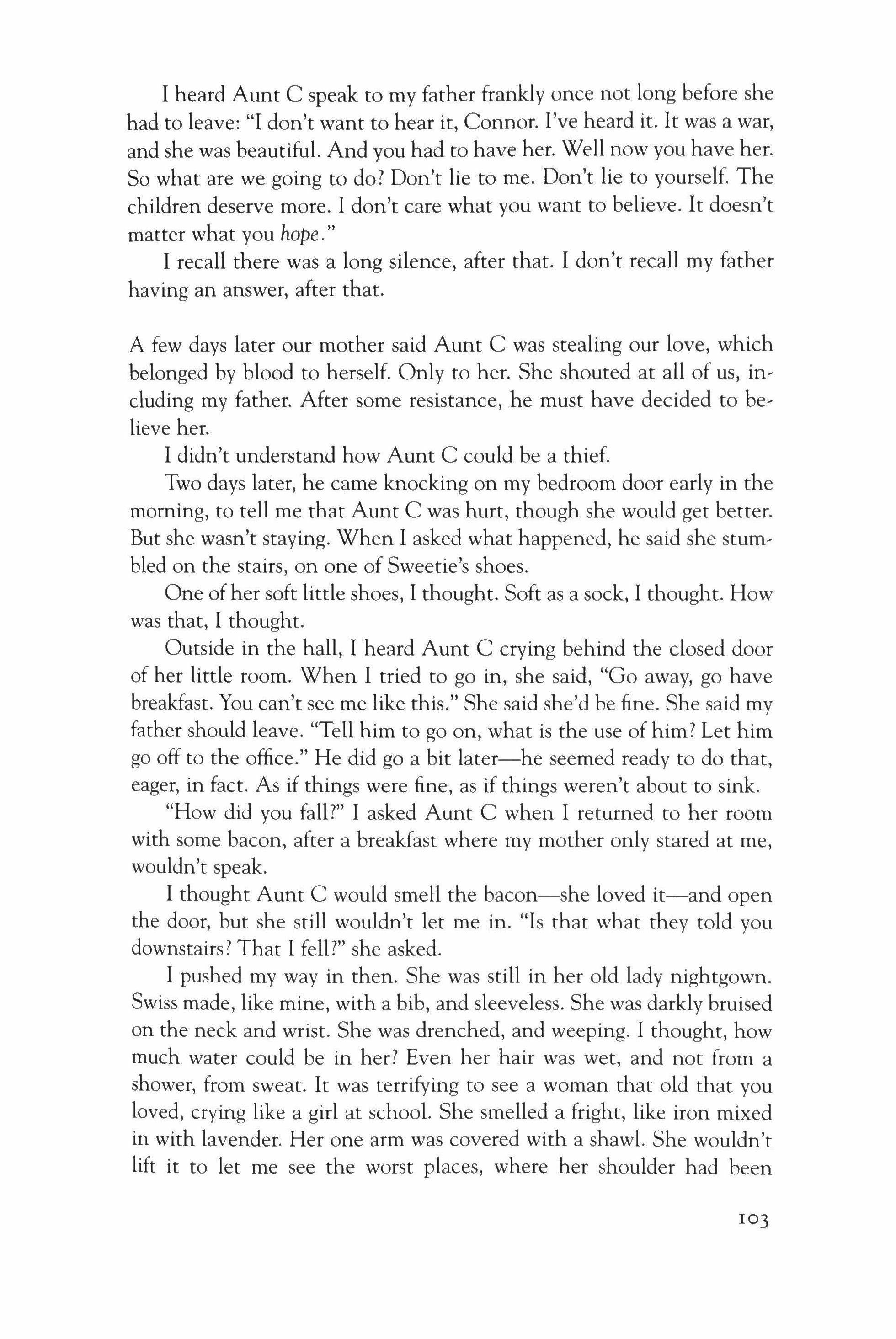
I heard Aunt C speak to my father frankly once not long before she had to leave: "I don't want to hear it, Connor. I've heard it. It was a war, and she was beautiful. And you had to have her. Well now you have her. So what are we going to do? Don't lie to me. Don't lie to yourself. The children deserve more. I don't care what you want to believe. It doesn't matter what you hope."
I recall there was a long silence, after that. I don't recall my father having an answer, after that.
A few days later our mother said Aunt C was stealing our love, which belonged by blood to herself. Only to her. She shouted at all of us, including my father. After some resistance, he must have decided to believe her.
I didn't understand how Aunt C could be a thief.
Two days later, he came knocking on my bedroom door early in the morning, to tell me that Aunt C was hurt, though she would get better. But she wasn't staying. When I asked what happened, he said she stumbled on the stairs, on one of Sweetie's shoes.
One ofher soft little shoes, I thought. Soft as a sock, I thought. How was that, I thought.
Outside in the hall, I heard Aunt C crying behind the closed door of her little room. When I tried to go in, she said, "Go away, go have breakfast. You can't see me like this." She said she'd be fine. She said my father should leave. "Tell him to go on, what is the use of him? Let him go off to the office." He did go a bit later-he seemed ready to do that, eager, in fact. As if things were fine, as if things weren't about to sink.
"How did you fall?" I asked Aunt C when I returned to her room with some bacon, after a breakfast where my mother only stared at me, wouldn't speak.
I thought Aunt C would smell the bacon-she loved it-and open the door, but she still wouldn't let me in. "Is that what they told you downstairs? That I fell?" she asked.
I pushed my way in then. She was still in her old lady nightgown. Swiss made, like mine, with a bib, and sleeveless. She was darkly bruised on the neck and wrist. She was drenched, and weeping. I thought, how much water could be in her? Even her hair was wet, and not from a shower, from sweat. It was terrifying to see a woman that old that you loved, crying like a girl at school. She smelled a fright, like iron mixed in with lavender. Her one arm was covered with a shawl. She wouldn't lift it to let me see the worst places, where her shoulder had been
103

wrenched, where she'd been thrown down, where the arm had nearly been pulled from the socket.
"Will you do something for me?" she said in a tiny voice. "Call Cheryl Ann. Tell her I have a little job for her, will you do that for me?"
I did what she asked, using the upstairs hall phone, and then returned, sat on the edge of the bed watching Aunt C on the vanity bench, and waited for Cheryl Ann Sender, a neighbor girl in junior high school. She lived down at the end of the block.
That's when Aunt C told me how I could trust my place, my town, and the people around me, my father, too, she said, "Although sometimes he's too idealistic, darling." My mother called from the hall outside the room, "Don't help her. Come to me Claire. Don't you see what she's been doing? What a liar she is?"
Aunt C reached over and put her good arm around me. I didn't pull away even though I knew I should. Finally my mother went downstairs to play music.
Cheryl Ann was the oldest girl on the street. My mother had already designated her a beauty, but I didn't despise Cheryl Ann for that. I worshipped her. After my mother had stopped hanging around in the hall, and started pounding out Chopin, I sneaked down to let Cheryl Ann in. Cheryl and I helped Aunt C go out the back way, on the servant stairs. Sidney saw us, told me my mother said I wasn't to leave the house. All by herself, Cheryl took Aunt C to the hospital where they put the cast on. That's when Dr. Blaine got involved. Later that day, Cheryl Ann came for Aunt C's clothes. She packed them all up in two plaid suitcases.
It was all over by six. Aunt C was gone in a taxicab with Cheryl, straight from the hospital. She left on the night train, so shaken she could hardly walk.
The next day, Dr. Blaine came by the house and spoke to my father in the library, and said it had to be. My mother had to go to the hospital. He didn't say what kind. I heard that later, when Sidney was talking on the phone.
The hospital for people not right in the head.
There were big state hospitals then, with nice grounds, which were peaceful, some of them-people lived in such places for years, their whole adult lives. Families could take a person there and drop them off. That was, to their minds, the solution, although my father never thought in those terms, I don't think, of a problem and a solution. He
104

had hope. It was always a sweet idiot hope that things would be something else, not what they were. Sort of presto, like that. I tried to correct for it, and also, I half-believed him, but young as I was, I knew he didn't have it quite right. I didn't want to know it, though.
These other families didn't feel terribly guilty about it. They didn't wrack their brains, when they dropped someone off. I've been told stories since, ones that don't end like this one does.
These big asylums were condemned and shut down later, and such people were put out to be with the rest of us, in grim apartments, and so forth. But there was, in the past, another way of doing things, and in a sense, people could go on.
They put my mother in a red brick building up near the state capitol. Her room had barely any furniture, there were tight white sheets and a thin blanket on the bed, which had a hard metal frame-silver, cold. She was there all summer with no air conditioning, just a box fan. My father took me to see her once. He didn't take Sweetie. My mother didn't want to see Sweetie, he said. That didn't seem to bother him.
When we got to the hospital, she cried and asked why we wouldn't let her come home. And I cried too, a great torrent of tears, for I felt several things. I felt as if I were in some way the cause of her being there. Because her fight with Aunt C, her attack on Aunt C, was what had caused her to come, and Sweetie and I were the issue in that fight. I felt enormous loss with Aunt C gone, as well. I felt terrible loneliness. Nothing was all right that summer. Nothing.
My solution was to insist that I stay, keep my mother company. I could lie down next to her, and she wouldn't have to be by herself. I will cure her, I thought, I can. I liked to think I had powers, somehow, that I could do it, all alone. I needed to think that, I suppose. Somehow at the time it must have been a help.
She said she had no one to talk to. I saw that was true. The people in the lounge on her floor were horrible: they picked their noses and beat on the table with their palms when they laughed at the Red Skelton skits on TV.
My father said I couldn't stay, and then he sent me into the hall with those crazy people. He closed the door, and spoke only to my mother, in low tones. I believed also that, inside there, he was kissing her over and over and I didn't want them kissing in that white blank room with that cold metal bed, I didn't, I wanted them to stop. I wanted to be taken home, if I couldn't spend the summer in that white room with my mother, lying down beside her on taut hospital sheets. I cer-
105
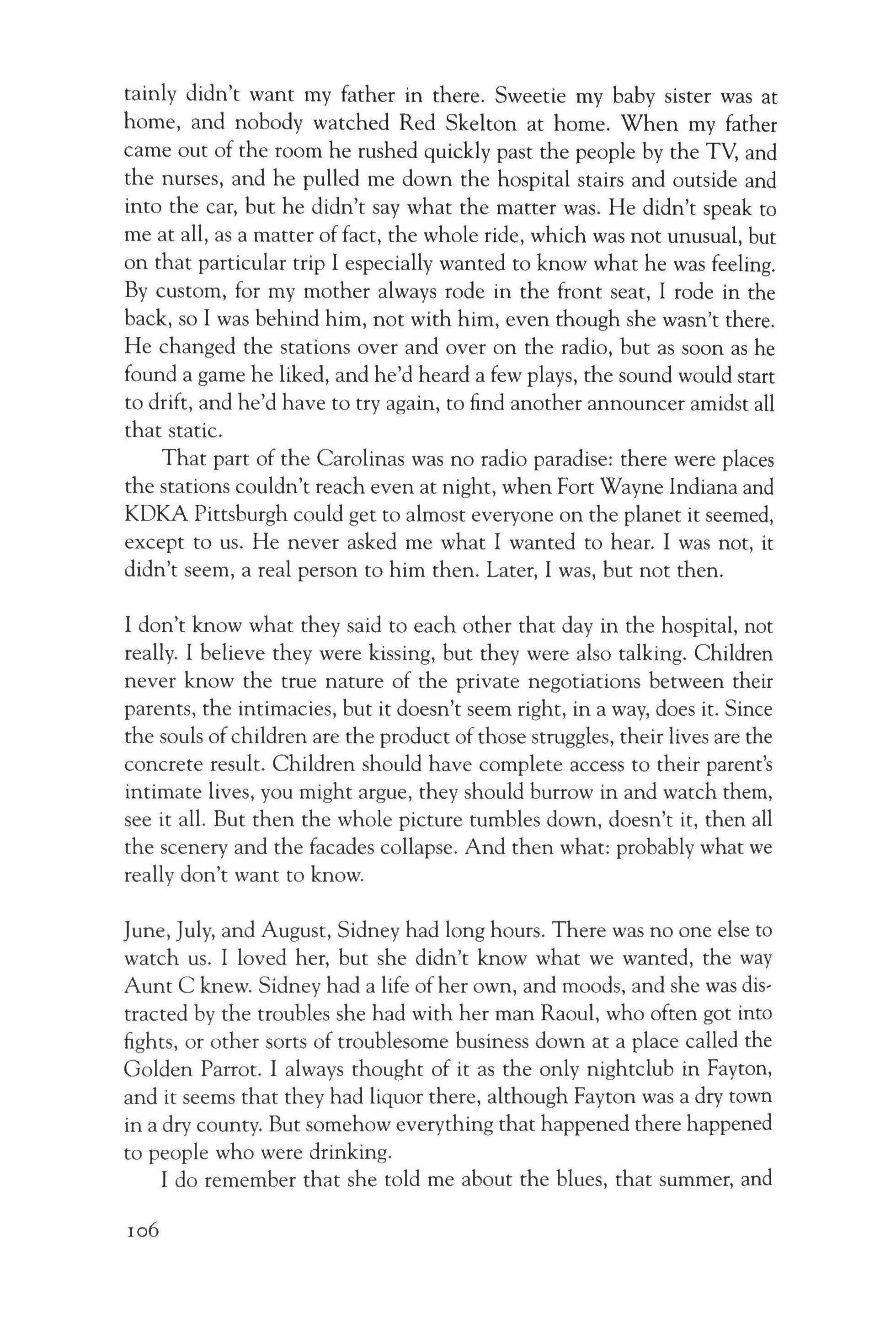
tainly didn't want my father in there. Sweetie my baby sister was at home, and nobody watched Red Skelton at home. When my father came out of the room he rushed quickly past the people by the TV, and the nurses, and he pulled me down the hospital stairs and outside and into the car, but he didn't say what the matter was. He didn't speak to me at all, as a matter of fact, the whole ride, which was not unusual, but on that particular trip I especially wanted to know what he was feeling. By custom, for my mother always rode in the front seat, I rode in the back, so I was behind him, not with him, even though she wasn't there. He changed the stations over and over on the radio, but as soon as he found a game he liked, and he'd heard a few plays, the sound would start to drift, and he'd have to try again, to find another announcer amidst all that static.
That part of the Carolinas was no radio paradise: there were places the stations couldn't reach even at night, when Fort Wayne Indiana and KDKA Pittsburgh could get to almost everyone on the planet it seemed, except to us. He never asked me what I wanted to hear. I was not, it didn't seem, a real person to him then. Later, I was, but not then.
I don't know what they said to each other that day in the hospital, not really. I believe they were kissing, but they were also talking. Children never know the true nature of the private negotiations between their parents, the intimacies, but it doesn't seem right, in a way, does it. Since the souls ofchildren are the product ofthose struggles, their lives are the concrete result. Children should have complete access to their parent's intimate lives, you might argue, they should burrow in and watch them, see it all. But then the whole picture tumbles down, doesn't it, then all the scenery and the facades collapse. And then what: probably what we really don't want to know.
June, July, and August, Sidney had long hours. There was no one else to watch us. I loved her, but she didn't know what we wanted, the way Aunt C knew. Sidney had a life ofher own, and moods, and she was distracted by the troubles she had with her man Raoul, who often got into fights, or other sorts of troublesome business down at a place called the Golden Parrot. I always thought of it as the only nightclub in Fayton, and it seems that they had liquor there, although Fayton was a dry town in a dry county. But somehow everything that happened there happened to people who were drinking.
I do remember that she told me about the blues, that summer, and
106
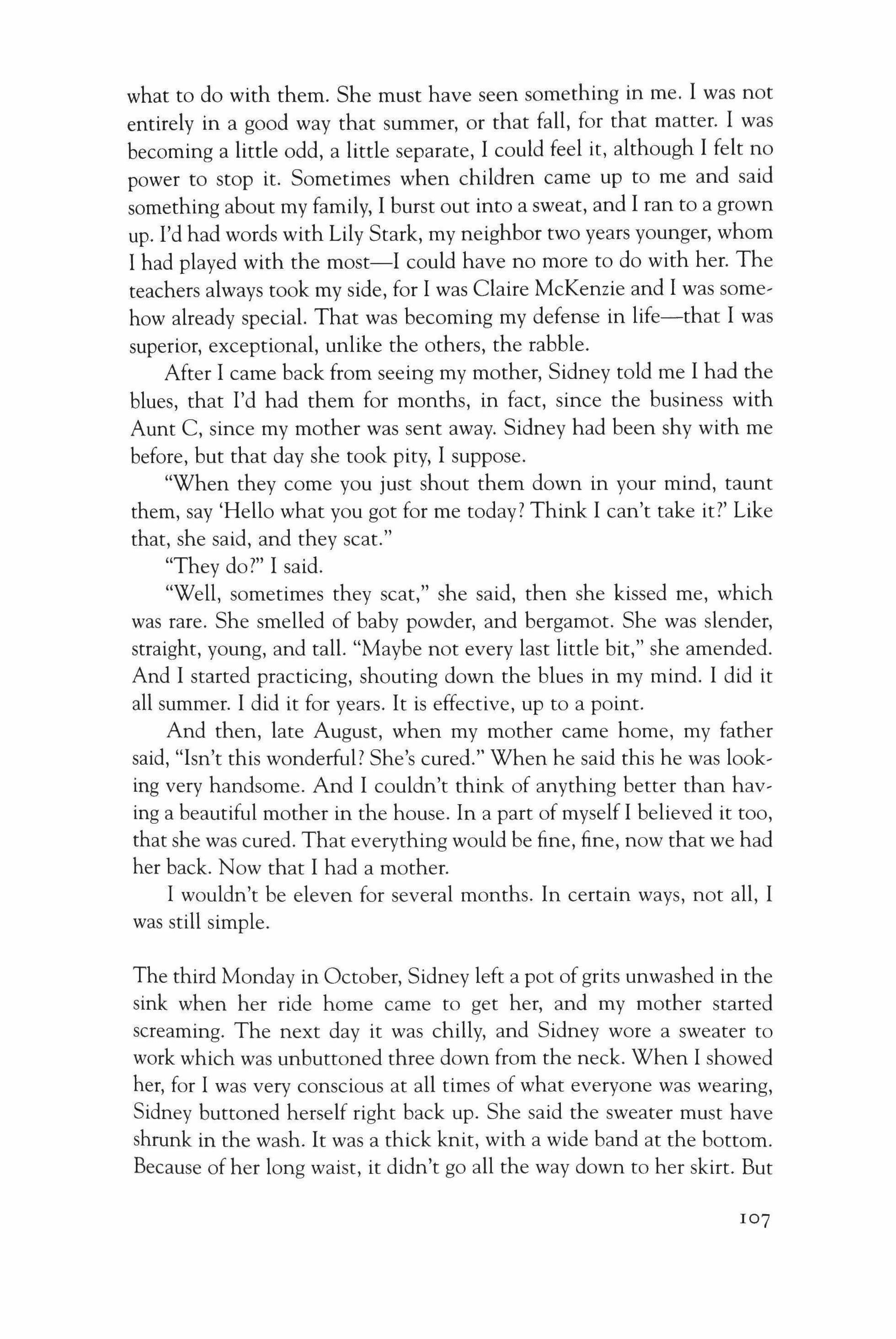
what to do with them. She must have seen something in me. I was not entirely in a good way that summer, or that fall, for that matter. I was becoming a little odd, a little separate, I could feel it, although I felt no power to stop it. Sometimes when children came up to me and said something about my family, I burst out into a sweat, and I ran to a grown up. I'd had words with Lily Stark, my neighbor two years younger, whom I had played with the most-I could have no more to do with her. The teachers always took my side, for I was Claire McKenzie and I was somehow already special. That was becoming my defense in life-that I was superior, exceptional, unlike the others, the rabble.
After I came back from seeing my mother, Sidney told me I had the blues, that I'd had them for months, in fact, since the business with Aunt C, since my mother was sent away. Sidney had been shy with me before, but that day she took pity, I suppose.
"When they come you just shout them down in your mind, taunt them, say 'Hello what you got for me today? Think I can't take it?' Like that, she said, and they scat."
"They do?" I said.
"Well, sometimes they scat," she said, then she kissed me, which was rare. She smelled of baby powder, and bergamot. She was slender, straight, young, and tall. "Maybe not every last little bit," she amended. And I started practicing, shouting down the blues in my mind. I did it all summer. I did it for years. It is effective, up to a point.
And then, late August, when my mother came home, my father said, "Isn't this wonderful? She's cured." When he said this he was looking very handsome. And I couldn't think of anything better than having a beautiful mother in the house. In a part of myself I believed it too, that she was cured. That everything would be fine, fine, now that we had her back. Now that I had a mother.
I wouldn't be eleven for several months. In certain ways, not all, I was still simple.
The third Monday in October, Sidney left a pot of grits unwashed in the sink when her ride home came to get her, and my mother started screaming. The next day it was chilly, and Sidney wore a sweater to work which was unbuttoned three down from the neck. When I showed her, for I was very conscious at all times of what everyone was wearing, Sidney buttoned herself right back up. She said the sweater must have shrunk in the wash. It was a thick knit, with a wide band at the bottom. Because of her long waist, it didn't go all the way down to her skirt. But
107
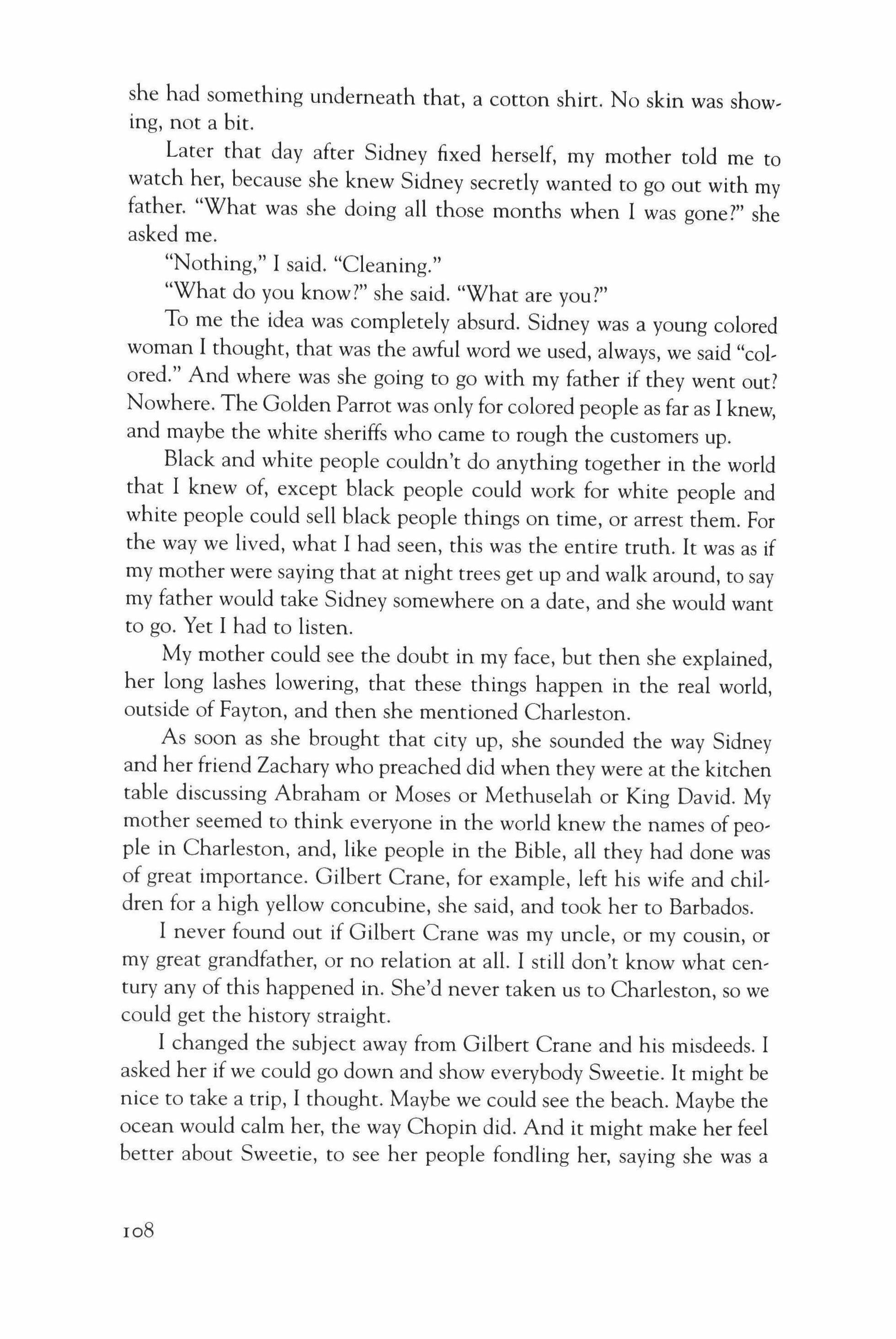
she had something underneath that, a cotton shirt. No skin was showing, not a bit.
Later that day after Sidney fixed herself, my mother told me to watch her, because she knew Sidney secretly wanted to go out with my father. "What was she doing all those months when I was gone?" she asked me.
"Nothing," I said. "Cleaning."
"What do you know?" she said. "What are you?"
To me the idea was completely absurd. Sidney was a young colored woman I thought, that was the awful word we used, always, we said "colored." And where was she going to go with my father if they went out? Nowhere. The Golden Parrot was only for colored people as far as I knew, and maybe the white sheriffs who came to rough the customers up.
Black and white people couldn't do anything together in the world that I knew of, except black people could work for white people and white people could sell black people things on time, or arrest them. For the way we lived, what I had seen, this was the entire truth. It was as if my mother were saying that at night trees get up and walk around, to say my father would take Sidney somewhere on a date, and she would want to go. Yet I had to listen.
My mother could see the doubt in my face, but then she explained, her long lashes lowering, that these things happen in the real world, outside of Fayton, and then she mentioned Charleston.
As soon as she brought that city up, she sounded the way Sidney and her friend Zachary who preached did when they were at the kitchen table discussing Abraham or Moses or Methuselah or King David. My mother seemed to think everyone in the world knew the names of people in Charleston, and, like people in the Bible, all they had done was of great importance. Gilbert Crane, for example, left his wife and children for a high yellow concubine, she said, and took her to Barbados.
I never found out if Gilbert Crane was my uncle, or my cousin, or my great grandfather, or no relation at all. I still don't know what century any of this happened in. She'd never taken us to Charleston, so we could get the history straight.
I changed the subject away from Gilbert Crane and his misdeeds. I asked her if we could go down and show everybody Sweetie. It might be nice to take a trip, I thought. Maybe we could see the beach. Maybe the ocean would calm her, the way Chopin did. And it might make her feel better about Sweetie, to see her people fondling her, saying she was a
108
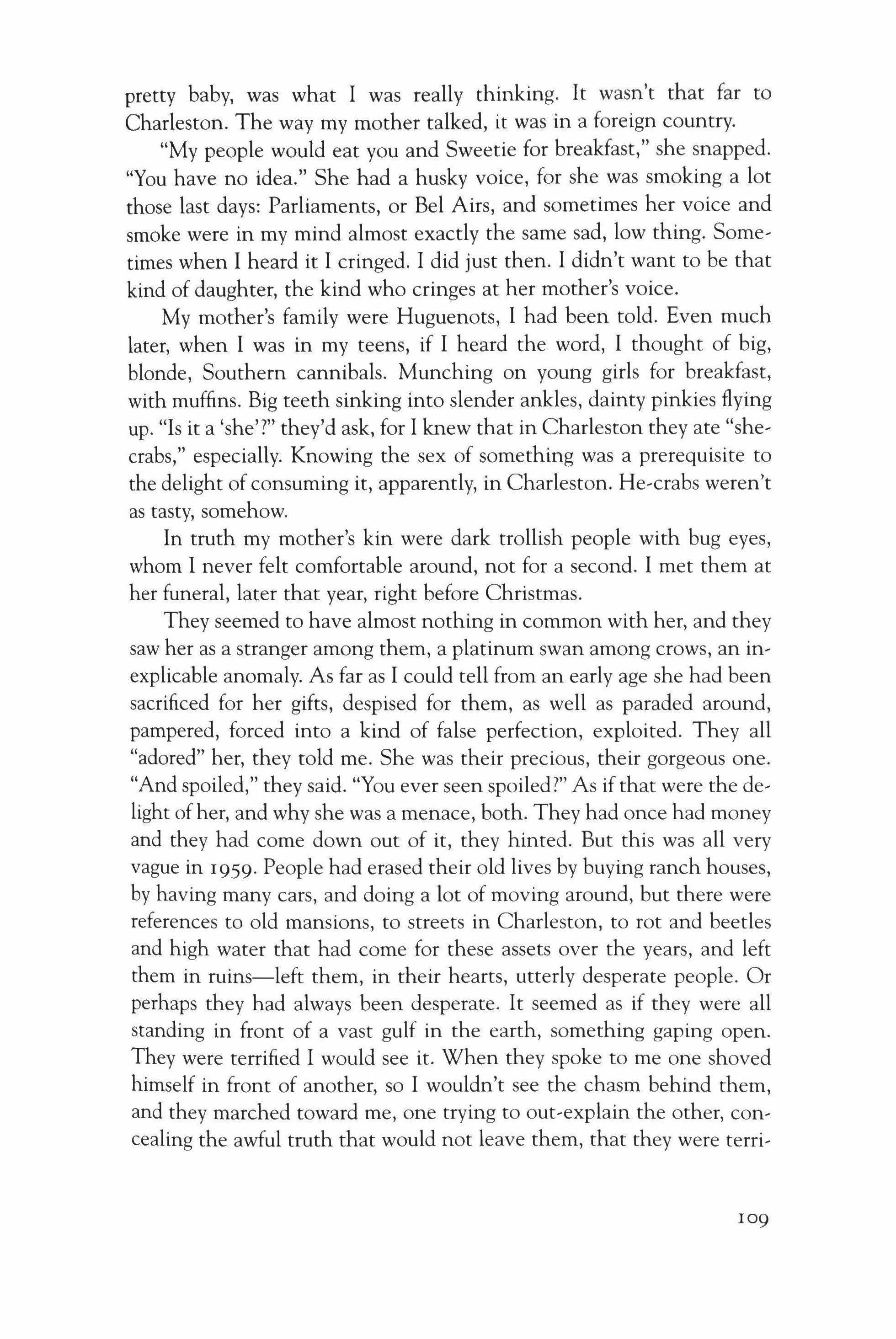
pretty baby, was what I was really thinking. It wasn't that far to Charleston. The way my mother talked, it was in a foreign country.
"My people would eat you and Sweetie for breakfast," she snapped. "You have no idea." She had a husky voice, for she was smoking a lot those last days: Parliaments, or Bel Airs, and sometimes her voice and smoke were in my mind almost exactly the same sad, low thing. Sometimes when I heard it I cringed. I did just then. I didn't want to be that kind of daughter, the kind who cringes at her mother's voice.
My mother's family were Huguenots, I had been told. Even much later, when I was in my teens, if I heard the word, I thought of big, blonde, Southern cannibals. Munching on young girls for breakfast, with muffins. Big teeth sinking into slender ankles, dainty pinkies flying up. "Is it a 'she'?" they'd ask, for I knew that in Charleston they ate "shecrabs," especially. Knowing the sex of something was a prerequisite to the delight of consuming it, apparently, in Charleston. He-crabs weren't as tasty, somehow.
In truth my mother's kin were dark trollish people with bug eyes, whom I never felt comfortable around, not for a second. I met them at her funeral, later that year, right before Christmas. They seemed to have almost nothing in common with her, and they saw her as a stranger among them, a platinum swan among crows, an inexplicable anomaly. As far as I could tell from an early age she had been sacrificed for her gifts, despised for them, as well as paraded around, pampered, forced into a kind of false perfection, exploited. They all "adored" her, they told me. She was their precious, their gorgeous one. "And spoiled," they said. "You ever seen spoiled?" As if that were the delight of her, and why she was a menace, both. They had once had money and they had come down out of it, they hinted. But this was all very vague in 1959. People had erased their old lives by buying ranch houses, by having many cars, and doing a lot of moving around, but there were references to old mansions, to streets in Charleston, to rot and beetles and high water that had come for these assets over the years, and left them in ruins-left them, in their hearts, utterly desperate people. Or perhaps they had always been desperate. It seemed as if they were all standing in front of a vast gulf in the earth, something gaping open. They were terrified I would see it. When they spoke to me one shoved himself in front of another, so I wouldn't see the chasm behind them, and they marched toward me, one trying to out-explain the other, concealing the awful truth that would not leave them, that they were terri-
109

fied I would see. One did not have to see it. It was enough to see how they felt about it.
My mother wanted to fire Sidney. Through the late fall, night after night, they fought about it. My father insisted Sidney had no designs. He wanted her to stay on. I felt the same way but no one asked me. There was too much to do without her. My mother wasn't good at certain things. I had seen her try, but she couldn't do them, nobody had ever shown her. She was used to the world doing for her. She couldn't sort Sweetie's tiny clothes, for example. Or clean up the nursery. She was no good at cooking-she knew absolutely nothing about it. Even iced tea was a struggle, that was proven. I wanted to weigh in, but of course I couldn't. Even if I had spoken, they would not have been able to hear me.
They settled it that Sidney could only be there when he was out of the house. My father said that was how my mother wanted it. And that was how it would be. This seemed reasonable to him, something we could do, put up with.
They took up this plan right after Halloween. I still wasn't sleeping well. It wasn't the perfume anymore. It was noise, my parents arguing. I stayed up late, listening to Ft. Wayne, Pittsburgh, Havana on stormy nights, WABC in New York City. A fall chill came on suddenly that week. Arctic air, swooping down into the Carolinas, the weathermen said. There was no in-between, just Indian summer heat, then a hard frost. The trees hardly had time to change. In a few days, some were blaring color, and as quickly, bare. This will be the pattern this year, they said. Hot, then freezing cold, they said.
In the end, the winter took us by complete surprise, which was why the wood was so brittle in the storm, in December, people said, why the damage was so severe.
I woke the Saturday before Thanksgiving to the sound of Sweetie crying. It seemed far away, almost in another world, but that could happen in that house. There were seven bedrooms, two parlors, a library, a butler's pantry, two staircases, a sleeping porch, and a room just for the piano, which was locked.
I went to the nursery, but Sweetie wasn't in her crib. The bathroom next to it was empty. As I got closer to my parent's bedroom, way down on the other end of the hall, I heard water running, but no Sweetie. Mother must be taking a bath, I thought. So Sweetie got into something, I thought. But where did she get to?
110
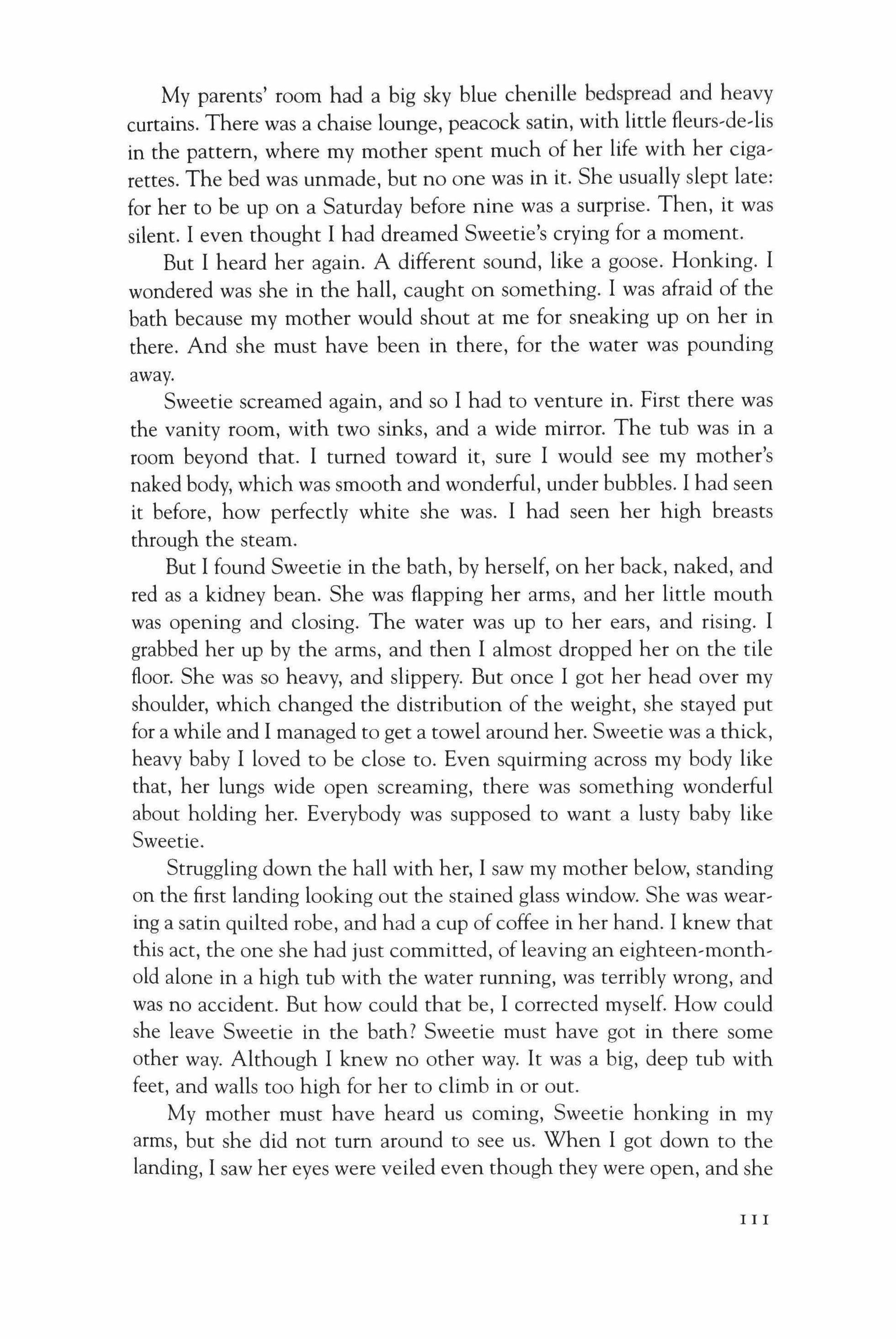
My parents' room had a big sky blue chenille bedspread and heavy curtains. There was a chaise lounge, peacock satin, with little fleurs-de-lis in the pattern, where my mother spent much of her life with her cigarettes. The bed was unmade, but no one was in it. She usually slept late: for her to be up on a Saturday before nine was a surprise. Then, it was silent. I even thought I had dreamed Sweetie's crying for a moment.
But I heard her again. A different sound, like a goose. Honking. I wondered was she in the hall, caught on something. I was afraid of the bath because my mother would shout at me for sneaking up on her in there. And she must have been in there, for the water was pounding away.
Sweetie screamed again, and so I had to venture in. First there was the vanity room, with two sinks, and a wide mirror. The tub was in a room beyond that. I turned toward it, sure I would see my mother's naked body, which was smooth and wonderful, under bubbles. I had seen it before, how perfectly white she was. I had seen her high breasts through the steam.
But I found Sweetie in the bath, by herself, on her back, naked, and red as a kidney bean. She was flapping her arms, and her little mouth was opening and closing. The water was up to her ears, and rising. I grabbed her up by the arms, and then I almost dropped her on the tile floor. She was so heavy, and slippery. But once I got her head over my shoulder, which changed the distribution of the weight, she stayed put for a while and I managed to get a towel around her. Sweetie was a thick, heavy baby I loved to be close to. Even squirming across my body like that, her lungs wide open screaming, there was something wonderful about holding her. Everybody was supposed to want a lusty baby like Sweetie.
Struggling down the hall with her, I saw my mother below, standing on the first landing looking out the stained glass window. She was wearing a satin quilted robe, and had a cup of coffee in her hand. I knew that this act, the one she had just committed, of leaving an eighteen-monthold alone in a high tub with the water running, was terribly wrong, and was no accident. But how could that be, I corrected myself. How could she leave Sweetie in the bath? Sweetie must have got in there some other way. Although I knew no other way. It was a big, deep tub with feet, and walls too high for her to climb in or out.
My mother must have heard us coming, Sweetie honking in my arms, but she did not turn around to see us. When I got down to the landing, I saw her eyes were veiled even though they were open, and she
I I I
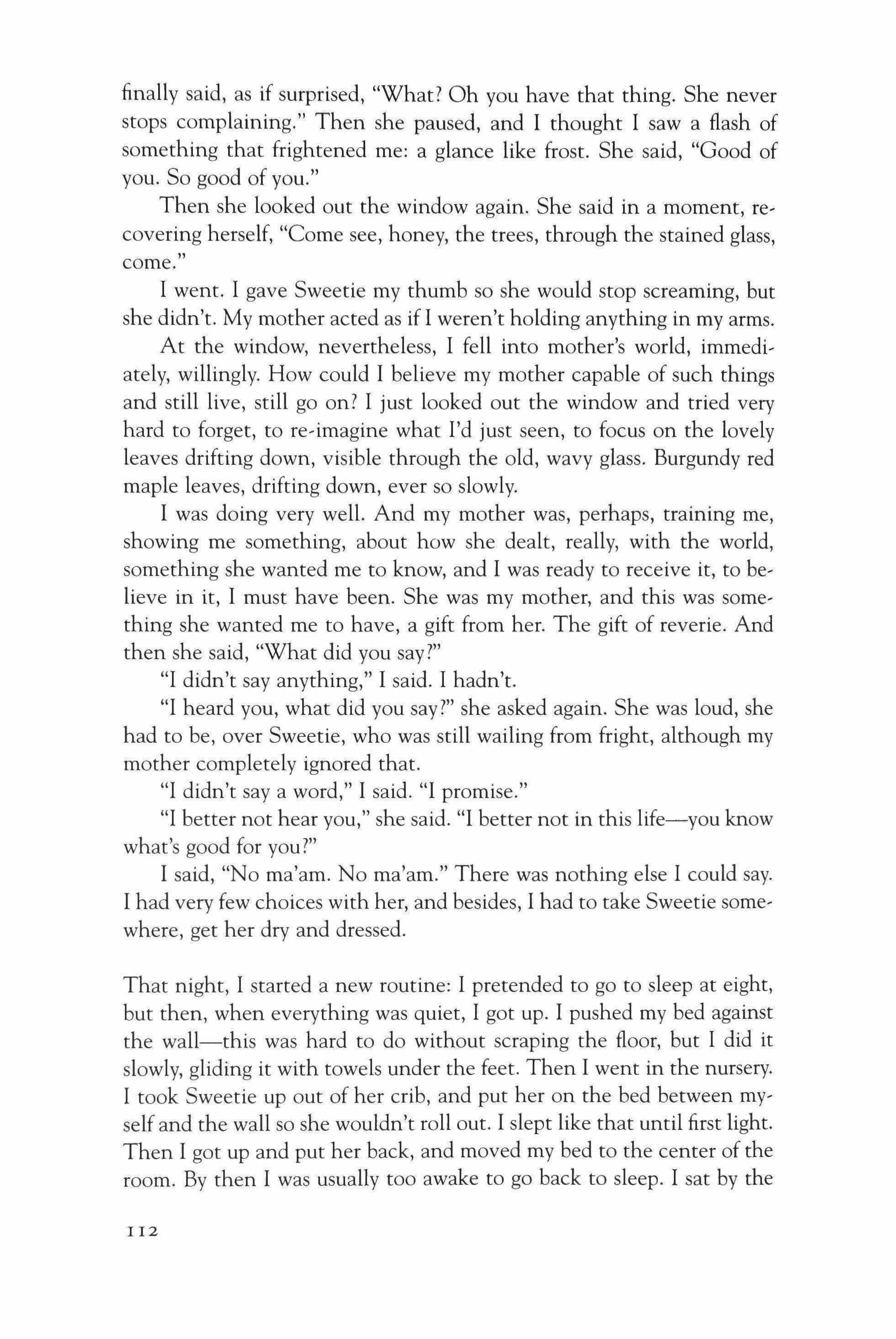
finally said, as if surprised, "What? Oh you have that thing. She never stops complaining." Then she paused, and I thought I saw a flash of something that frightened me: a glance like frost. She said, "Good of you. So good of you."
Then she looked out the window again. She said in a moment, recovering herself, "Come see, honey, the trees, through the stained glass, come."
I went. I gave Sweetie my thumb so she would stop screaming, but she didn't. My mother acted as if I weren't holding anything in my arms.
At the window, nevertheless, I fell into mother's world, immediately, willingly. How could I believe my mother capable of such things and still live, still go on? I just looked out the window and tried very hard to forget, to re-imagine what I'd just seen, to focus on the lovely leaves drifting down, visible through the old, wavy glass. Burgundy red maple leaves, drifting down, ever so slowly.
I was doing very well. And my mother was, perhaps, training me, showing me something, about how she dealt, really, with the world, something she wanted me to know, and I was ready to receive it, to believe in it, I must have been. She was my mother, and this was something she wanted me to have, a gift from her. The gift of reverie. And then she said, "What did you say?"
"I didn't say anything," I said. I hadn't.
"I heard you, what did you say?" she asked again. She was loud, she had to be, over Sweetie, who was still wailing from fright, although my mother completely ignored that.
"I didn't say a word," I said. "I promise."
"I better not hear you," she said. "I better not in this life-you know what's good for you?"
I said, "No ma'am. No ma'am." There was nothing else I could say. I had very few choices with her, and besides, I had to take Sweetie somewhere, get her dry and dressed.
That night, I started a new routine: I pretended to go to sleep at eight, but then, when everything was quiet, I got up. I pushed my bed against the wall-this was hard to do without scraping the floor, but I did it slowly, gliding it with towels under the feet. Then I went in the nursery. I took Sweetie up out of her crib, and put her on the bed between myself and the wall so she wouldn't roll out. I slept like that until first light. Then I got up and put her back, and moved my bed to the center of the room. By then I was usually too awake to go back to sleep. I sat by the
112
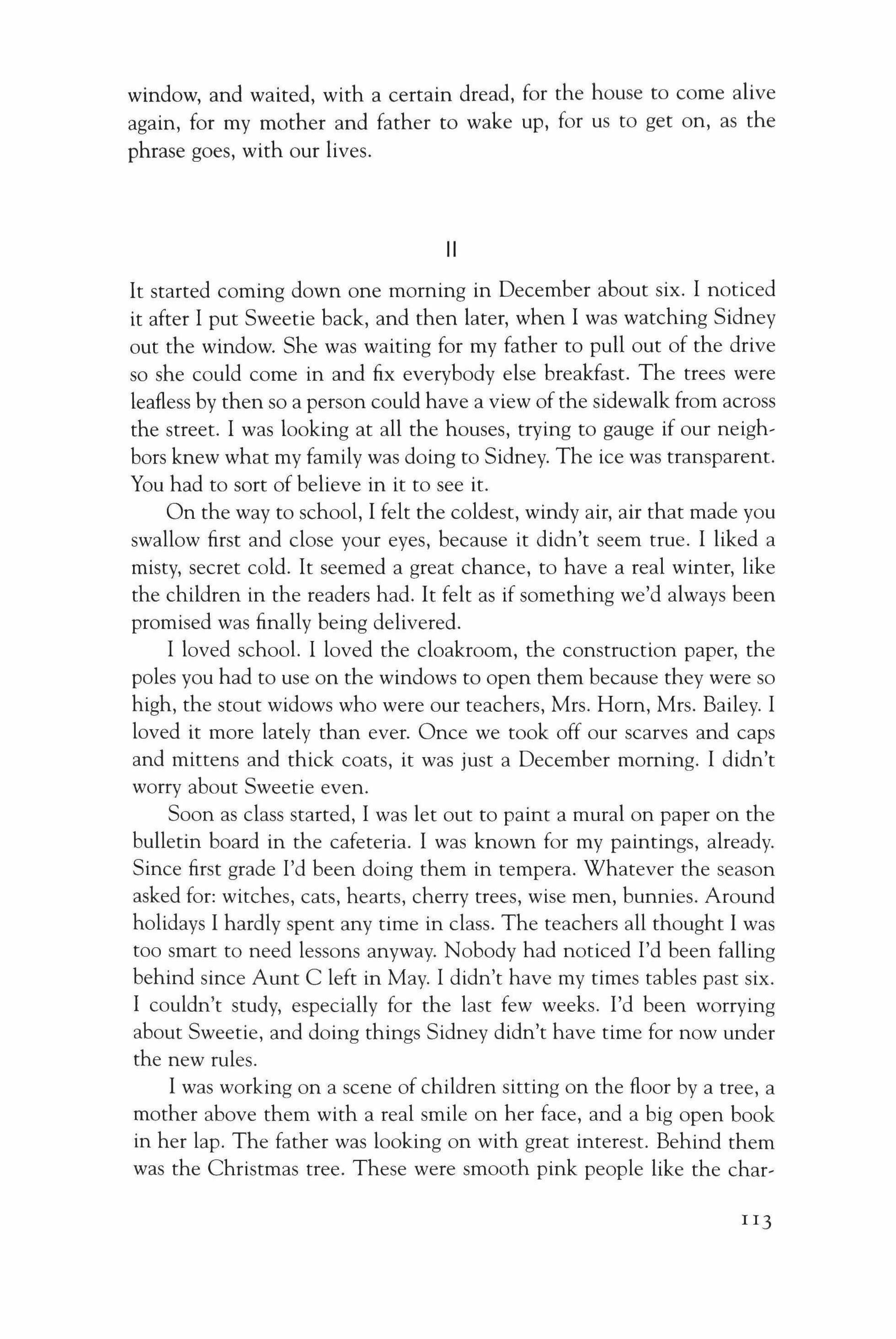
window, and waited, with a certain dread, for the house to come alive again, for my mother and father to wake up, for us to get on, as the phrase goes, with our lives. II
It started coming down one morning in December about six. I noticed it after I put Sweetie back, and then later, when I was watching Sidney out the window. She was waiting for my father to pull out of the drive so she could come in and fix everybody else breakfast. The trees were leafless by then so a person could have a view of the sidewalk from across the street. I was looking at all the houses, trying to gauge if our neighbors knew what my family was doing to Sidney. The ice was transparent. You had to sort of believe in it to see it.
On the way to school, I felt the coldest, windy air, air that made you swallow first and close your eyes, because it didn't seem true. I liked a misty, secret cold. It seemed a great chance, to have a real winter, like the children in the readers had. It felt as if something we'd always been promised was finally being delivered.
I loved school. I loved the cloakroom, the construction paper, the poles you had to use on the windows to open them because they were so high, the stout widows who were our teachers, Mrs. Horn, Mrs. Bailey. I loved it more lately than ever. Once we took off our scarves and caps and mittens and thick coats, it was just a December morning. I didn't worry about Sweetie even.
Soon as class started, I was let out to paint a mural on paper on the bulletin board in the cafeteria. I was known for my paintings, already. Since first grade I'd been doing them in tempera. Whatever the season asked for: witches, cats, hearts, cherry trees, wise men, bunnies. Around holidays I hardly spent any time in class. The teachers all thought I was too smart to need lessons anyway. Nobody had noticed I'd been falling behind since Aunt C left in May. I didn't have my times tables past six. I couldn't study, especially for the last few weeks. I'd been worrying about Sweetie, and doing things Sidney didn't have time for now under the new rules.
I was working on a scene of children sitting on the floor by a tree, a mother above them with a real smile on her face, and a big open book in her lap. The father was looking on with great interest. Behind them was the Christmas tree. These were smooth pink people like the char-
113

acters in the Dick and Jane books, or in the family TV shows. The mother looked a lot like my mother-her hair, her big eyes. But I remember thinking I couldn't draw someone as pretty as my real mother. Her beauty was too mysterious to capture, to even try. There was no point-she was so far past me.
After a while the first graders came in for lunch. They were all talking about the "stuff outside"-discussing whether it was snow or ice or sleet. I prayed for snow because I'd never really seen a good layer of it. And I thought how I might take Sweetie out and pull her on a garbage can lid with a rope tied to it. She'd go far, she'd slide down hills, we'd sled pure across town.
Around one-thirty the principal Mrs. Taylor announced school was let out. The highway department said the roads were freezing up. The cafeteria ladies let me phone home. Asking what the problem was, my mother said Isabel Cobb had called, and offered to fetch me along with the other children. My mother still wasn't driving-Dr. Blaine was against it. So I waited out on the sidewalk next to Bit Cobb, a wild boy, who was throwing wet iceballs, wanting to put them down our shirts, and his sister Dora, who was in kindergarten, who wouldn't let go of my leg. She was afraid of ice. Lily Stark was there too, smiling at me. Mrs. Cobb came in her big old Cadillac and stuffed us all in the back seat. Even though she went fifteen miles an hour, the car skidded twice, and we all slid in the back from side to side. There were no seatbelts then. Lily squealed and giggled. I couldn't help it, so did I. When she got to Winter Street Mrs. Cobb said she was glad we were all alive, but we were still laughing.
At home I found my mother in the living room with the drapes drawn. The heat was on high, and she was wearing a shirtwaist with no sweater. She looked lovely, flushed, and pink. I wanted to hug her, but first I searched around for Sweetie and found her in the playpen.
My mother said, "Is it that bad? I let that bitch Sidney go home. She begged. I told her not to come back. Ever."
"You fired her?" I asked. I couldn't bear it.
"What good was that hussy?" she asked.
I wasn't supposed to answer.
I knew this voice, this old, nothing-is-good-today voice. Hearing it this time, my shoulders rose up, I breathed more shallowly. To myself, I said, "What do you have for me today?" As Sidney had taught me. But my mother looked at me as if she could hear what went on underneath my breath. In a way I wanted her to know. I knew she ought to know my
114
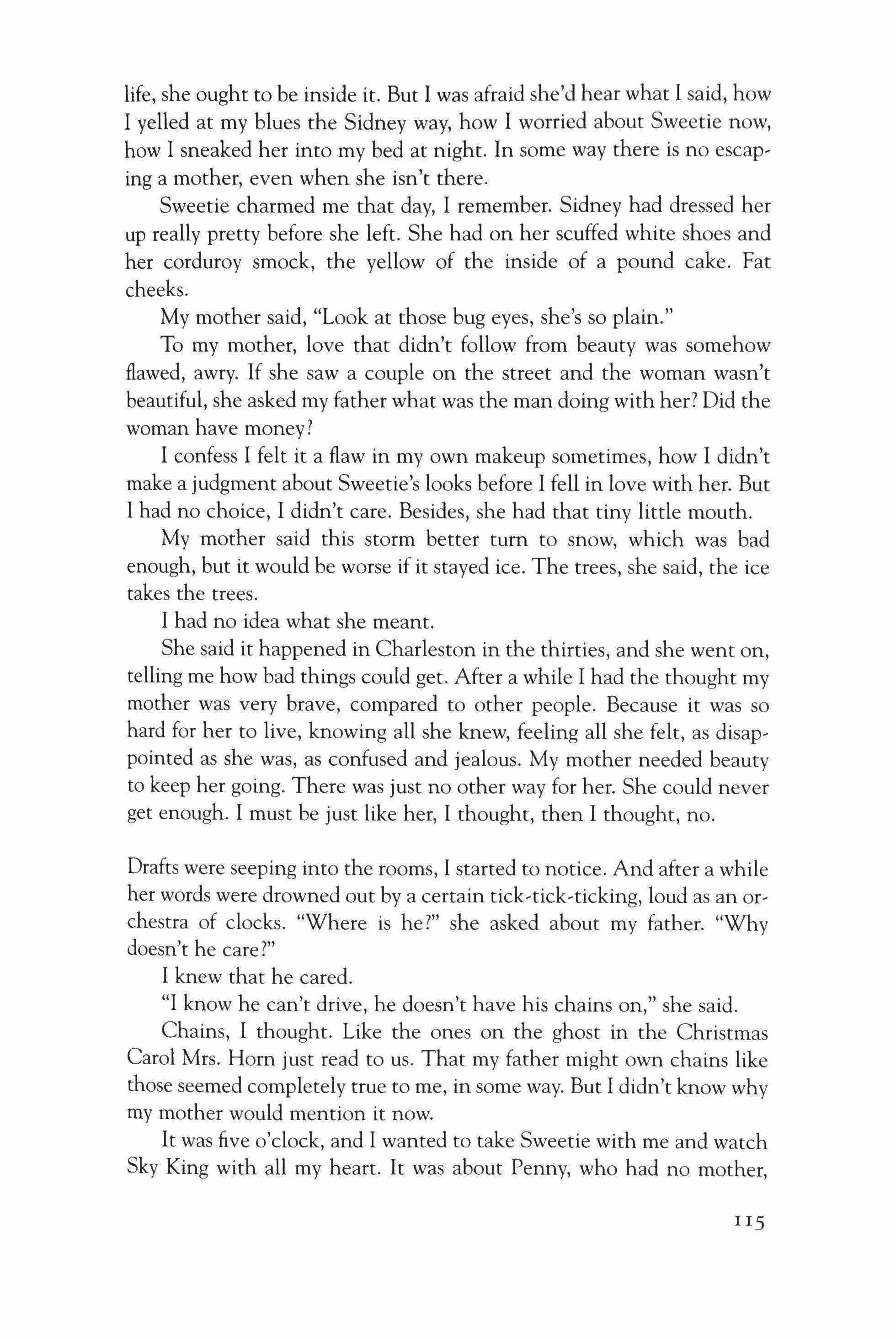
life, she ought to be inside it. But I was afraid she'd hear what I said, how I yelled at my blues the Sidney way, how I worried about Sweetie now, how I sneaked her into my bed at night. In some way there is no escaping a mother, even when she isn't there.
Sweetie charmed me that day, I remember. Sidney had dressed her up really pretty before she left. She had on her scuffed white shoes and her corduroy smock, the yellow of the inside of a pound cake. Fat cheeks.
My mother said, "Look at those bug eyes, she's so plain."
To my mother, love that didn't follow from beauty was somehow flawed, awry. If she saw a couple on the street and the woman wasn't beautiful, she asked my father what was the man doing with her? Did the woman have money?
I confess I felt it a flaw in my own makeup sometimes, how I didn't make a judgment about Sweetie's looks before I fell in love with her. But I had no choice, I didn't care. Besides, she had that tiny little mouth.
My mother said this storm better turn to snow, which was bad enough, but it would be worse if it stayed ice. The trees, she said, the ice takes the trees.
I had no idea what she meant.
She said it happened in Charleston in the thirties, and she went on, telling me how bad things could get. After a while I had the thought my mother was very brave, compared to other people. Because it was so hard for her to live, knowing all she knew, feeling all she felt, as disappointed as she was, as confused and jealous. My mother needed beauty to keep her going. There was just no other way for her. She could never get enough. I must be just like her, I thought, then I thought, no.
Drafts were seeping into the rooms, I started to notice. And after a while her words were drowned out by a certain tick-tick-ticking, loud as an orchestra of clocks. "Where is he?" she asked about my father. "Why doesn't he care?"
I knew that he cared.
"I know he can't drive, he doesn't have his chains on," she said.
Chains, I thought. Like the ones on the ghost in the Christmas Carol Mrs. Horn just read to us. That my father might own chains like those seemed completely true to me, in some way. But I didn't know why my mother would mention it now.
It was five o'clock, and I wanted to take Sweetie with me and watch Sky King with all my heart. It was about Penny, who had no mother,
lIS

whose father saved somebody every week in his airplane. My mother had things to ask me, though. I tried, but I didn't know many answers. Finally she let me go, said I should "Go see what that Sidney creature left in the oven."
I walked to the back den where we kept the TV in a cabinet. I could hear the dizzy ticking outside as I went-it was stimulating, interesting, after the heaviness in the living room. I told myself I was happy. Very, very happy, in fact. School had let out early. There would be none tomorrow, everybody said.
I could see out those diamond-paned windows that the twilight was coming soon, and it was greenish. The twigs and buds on the nearest trees were gleaming. Icicles were forming on the eaves of the house. Everything seemed dipped in glass. Like varnishes, and glazes do to paintings, and china, the ice brought all the beauty out, made things more precious somehow. As if everything in the world were getting polished. So it would be prettier. I wanted to show my mother. But she'd asked me to look in the oven.
It sounded like a huge giant cracking his knuckles just beyond the back steps. The whole kitchen shook. A great thud, then.
The overhead light died. Out the window I saw our one apple tree, a pockmarked favorite of woodpeckers, had fallen. Aunt C had told me once it was half-dead. I thought of an old soldier keeling over in battle. Then I heard my father's voice, and ran to it.
He was standing in the first parlor, in front of my mother. His cloth coat had white flecks on it, and he had taken off his felt hat. He was medium tall, with a round head, his hair thin. He had been very good looking ten years before, but his features were pliant and small, and the thickness of his face was taking over, his nose and eyes sinking in. Yet I still thought him then the handsomest man on earth.
He was talking to my mother about the country house, where my grandmother lived until she died. It was on a small farm that bordered Sweet Creek. We still owned it. We rented it out furnished when we could find a tenant. It was empty that fall, and next door to the county power station. The house was on the trunk line, he said. There was just one empty field standing between the power station and our house.
I didn't know what that was, the "trunk line." Ice and trunks made me think of Hannibal with his elephants, that Mrs. Horn had told us about.
The stove was gas there. There were fireplaces, he said. Our house
116
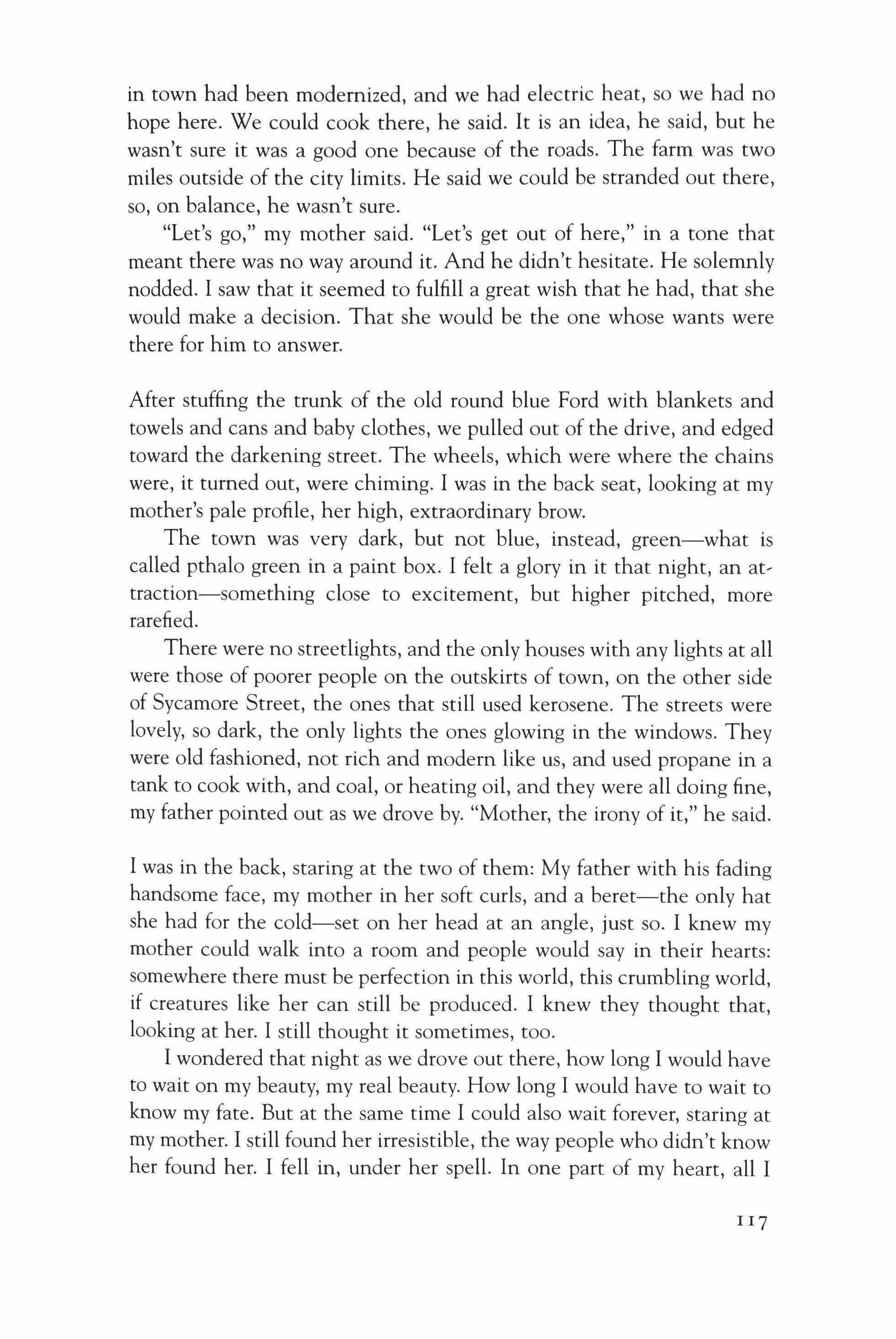
in town had been modernized, and we had electric heat, so we had no hope here. We could cook there, he said. It is an idea, he said, but he wasn't sure it was a good one because of the roads. The farm was two miles outside of the city limits. He said we could be stranded out there, so, on balance, he wasn't sure.
"Let's go," my mother said. "Let's get out of here," in a tone that meant there was no way around it. And he didn't hesitate. He solemnly nodded. I saw that it seemed to fulfill a great wish that he had, that she would make a decision. That she would be the one whose wants were there for him to answer.
After stuffing the trunk of the old round blue Ford with blankets and towels and cans and baby clothes, we pulled out of the drive, and edged toward the darkening street. The wheels, which were where the chains were, it turned out, were chiming. I was in the back seat, looking at my mother's pale profile, her high, extraordinary brow.
The town was very dark, but not blue, instead, green-what is called pthalo green in a paint box. I felt a glory in it that night, an attraction-something close to excitement, but higher pitched, more rarefied.
There were no streetlights, and the only houses with any lights at all were those of poorer people on the outskirts of town, on the other side of Sycamore Street, the ones that still used kerosene. The streets were lovely, so dark, the only lights the ones glowing in the windows. They were old fashioned, not rich and modern like us, and used propane in a tank to cook with, and coal, or heating oil, and they were all doing fine, my father pointed out as we drove by. "Mother, the irony of it," he said.
I was in the back, staring at the two of them: My father with his fading handsome face, my mother in her soft curls, and a beret-the only hat she had for the cold-set on her head at an angle, just so. I knew my mother could walk into a room and people would say in their hearts: somewhere there must be perfection in this world, this crumbling world, if creatures like her can still be produced. I knew they thought that, looking at her. I still thought it sometimes, too.
I wondered that night as we drove out there, how long I would have to wait on my beauty, my real beauty. How long I would have to wait to know my fate. But at the same time I could also wait forever, staring at my mother. I still found her irresistible, the way people who didn't know her found her. I fell in, under her spell. In one part of my heart, all I

wanted in this life was to look at her and look at her and look at her. My own mother. I wouldn't want her to do anything, or say anything. Just to be there on view, the way she was in the front seat of the car, the icefiltered glow from the last street lamps illuminating her wide and open and porcelain face.
My father was also wearing his hat, so his eyes were obscured, but he turned once. It interested me how boyish he looked. He was addressing my mother as "Mother." Later, I would remember this ride out, and how it was the last ride like that anywhere, and I would recall the hope I still had, especially when my father called her "Mother." A boundless, whirling feeling, without end, without even the knowledge of an end. That is what I was feeling that night. That was the kind of thing I could still feel, directly.
When we got to the old house, my father unlocked the door and showed us into the foyer, and reached for the light. It came on, pinkish yellow, incandescent-this seemed so miraculous. My mother shouted out with actual, rare joy, "At last." Her mood heightened everything, the way a mother's mood was supposed to do.
Heaven, I believe I thought. This will be heaven. We can start over, fresh.
The old TV came on, I was delighted to see. A Zenith, a tiny screen, set up in a box with a phonograph on top, fabric across the speakers on the front.
My father went to the stove in the kitchen at the rear, turned the knob, tried to light the pilot. He sniffed. No gas. He went outside then, through the side door that led to a brick-paved mudroom. Coming back, he said the line into the house was still there. The gas must have been turned off. The last tenant hadn't been gone that long, so he was surprised.
"It's a valve, go tum it on-worry about the company later," my mother said. "It might freeze over by morning."
"Well where is it?" he asked her.
He must have known, somewhere, that she wouldn't know the answer to a question like that. But he listened to her. He needed to, he couldn't help himself.
"Somewhere in the ground by the road," she said. "It must be." It was a country place, set in at least a quarter if not half a mile from the highway. The property was ten acres across the front. The valve could be anywhere, but she was right, it was near the road, so the workmen could adjust it without driving up to the house.
lI8
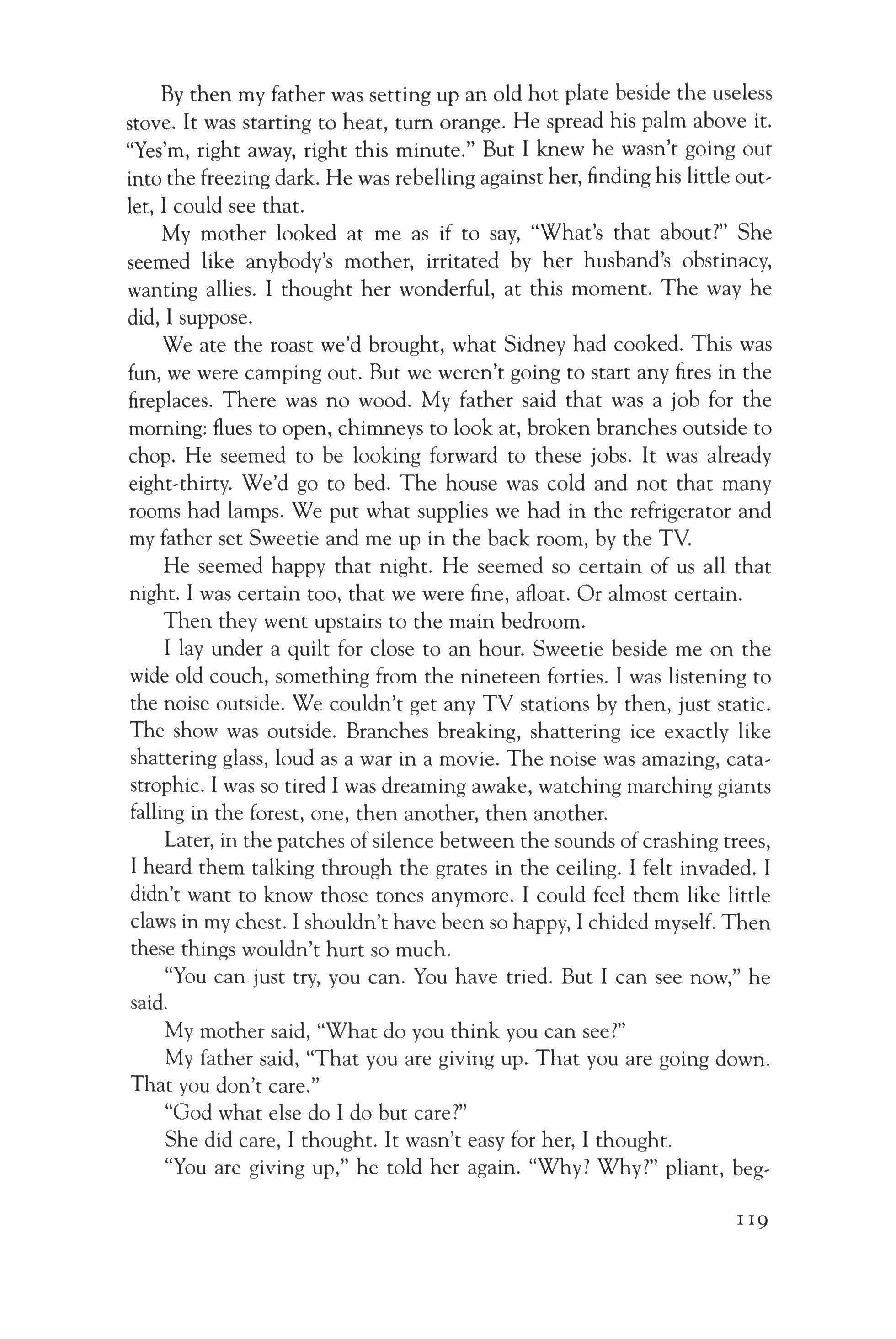
By then my father was setting up an old hot plate beside the useless stove. It was starting to heat, tum orange. He spread his palm above it. "Yes'm, right away, right this minute." But I knew he wasn't going out into the freezing dark. He was rebelling against her, finding his little outlet, I could see that.
My mother looked at me as if to say, "What's that about?" She seemed like anybody's mother, irritated by her husband's obstinacy, wanting allies. I thought her wonderful, at this moment. The way he did, I suppose.
We ate the roast we'd brought, what Sidney had cooked. This was fun, we were camping out. But we weren't going to start any fires in the fireplaces. There was no wood. My father said that was a job for the morning: flues to open, chimneys to look at, broken branches outside to chop. He seemed to be looking forward to these jobs. It was already eight-thirty. We'd go to bed. The house was cold and not that many rooms had lamps. We put what supplies we had in the refrigerator and my father set Sweetie and me up in the back room, by the TV.
He seemed happy that night. He seemed so certain of us all that night. I was certain too, that we were fine, afloat. Or almost certain.
Then they went upstairs to the main bedroom.
I lay under a quilt for close to an hour. Sweetie beside me on the wide old couch, something from the nineteen forties. I was listening to the noise outside. We couldn't get any TV stations by then, just static. The show was outside. Branches breaking, shattering ice exactly like shattering glass, loud as a war in a movie. The noise was amazing, catastrophic. I was so tired I was dreaming awake, watching marching giants falling in the forest, one, then another, then another.
Later, in the patches of silence between the sounds of crashing trees, I heard them talking through the grates in the ceiling. I felt invaded. I didn't want to know those tones anymore. I could feel them like little claws in my chest. I shouldn't have been so happy, I chided myself. Then these things wouldn't hurt so much.
"You can just try, you can. You have tried. But I can see now," he said.
My mother said, "What do you think you can see?"
My father said, "That you are giving up. That you are going down. That you don't care."
"God what else do I do but care?"
She did care, I thought. It wasn't easy for her, I thought.
"You are giving up," he told her again. "Why? Why?" pliant, beg-
119
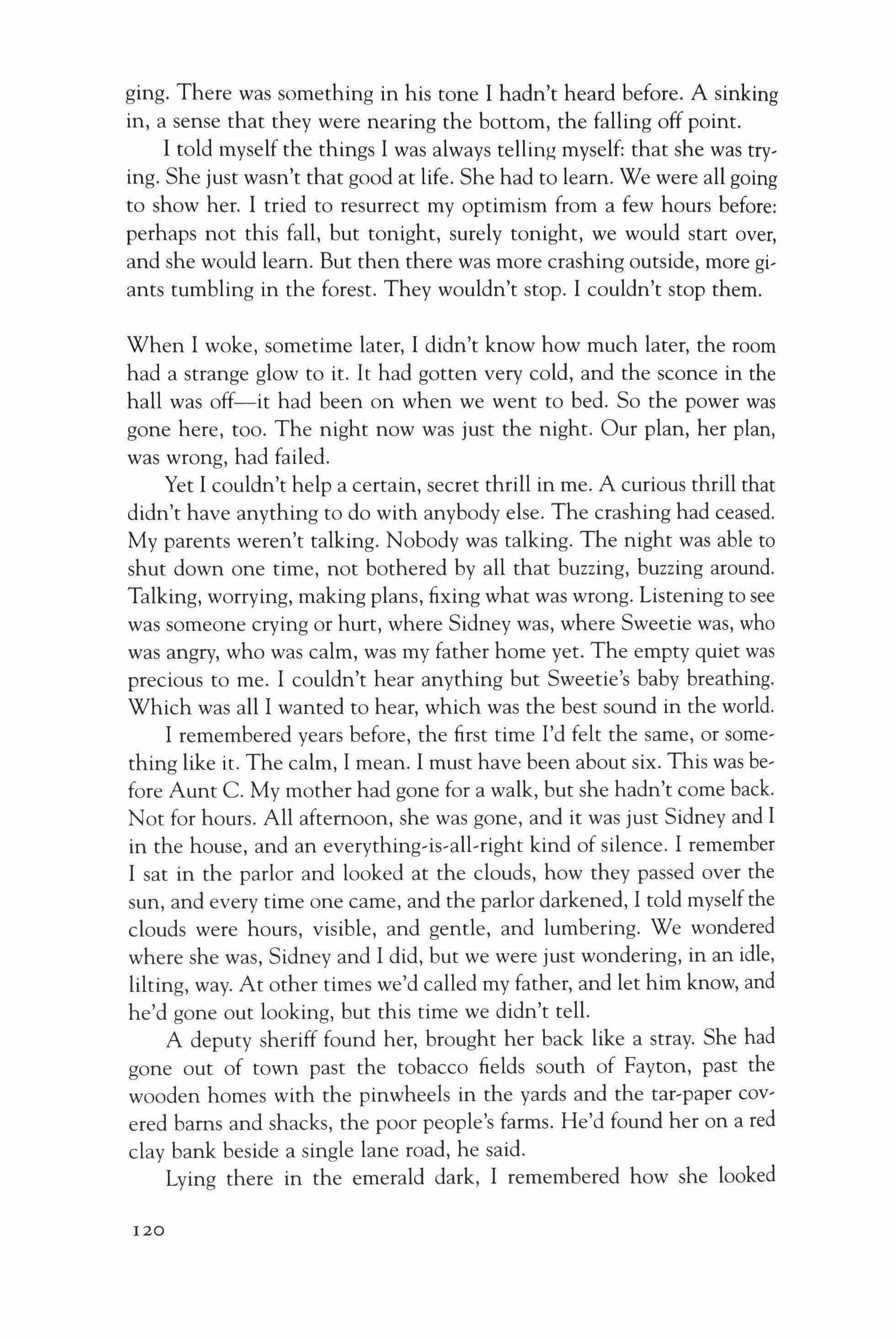
ging. There was something in his tone I hadn't heard before. A sinking in, a sense that they were nearing the bottom, the falling off point.
I told myself the things I was always telling myself: that she was trying. She just wasn't that good at life. She had to learn. We were all going to show her. I tried to resurrect my optimism from a few hours before: perhaps not this fall, but tonight, surely tonight, we would start over, and she would learn. But then there was more crashing outside, more giants tumbling in the forest. They wouldn't stop. I couldn't stop them.
When I woke, sometime later, I didn't know how much later, the room had a strange glow to it. It had gotten very cold, and the sconce in the hall was off-it had been on when we went to bed. So the power was gone here, too. The night now was just the night. Our plan, her plan, was wrong, had failed.
Yet I couldn't help a certain, secret thrill in me. A curious thrill that didn't have anything to do with anybody else. The crashing had ceased. My parents weren't talking. Nobody was talking. The night was able to shut down one time, not bothered by all that buzzing, buzzing around. Talking, worrying, making plans, fixing what was wrong. Listening to see was someone crying or hurt, where Sidney was, where Sweetie was, who was angry, who was calm, was my father home yet. The empty quiet was precious to me. I couldn't hear anything but Sweetie's baby breathing. Which was all I wanted to hear, which was the best sound in the world.
I remembered years before, the first time I'd felt the same, or something like it. The calm, I mean. I must have been about six. This was before Aunt C. My mother had gone for a walk, but she hadn't come back. Not for hours. All afternoon, she was gone, and it was just Sidney and I in the house, and an everything-is-all-right kind of silence. I remember I sat in the parlor and looked at the clouds, how they passed over the sun, and every time one came, and the parlor darkened, I told myselfthe clouds were hours, visible, and gentle, and lumbering. We wondered where she was, Sidney and I did, but we were just wondering, in an idle, lilting, way. At other times we'd called my father, and let him know, and he'd gone out looking, but this time we didn't tell.
A deputy sheriff found her, brought her back like a stray. She had gone out of town past the tobacco fields south of Fayton, past the wooden homes with the pinwheels in the yards and the tar-paper covered barns and shacks, the poor people's farms. He'd found her on a red clay bank beside a single lane road, he said.
Lying there in the emerald dark, I remembered how she looked
120

when she was returned to us. Captured like a wild thing, coming in and stomping on the pleasure of the afternoon, destroying it. She didn't want to be with us, I knew it, even then.
I knew that living lacked mostly all savor for her, except when she was in one of her rages, or humming to Chopin, or when she first saw something beautiful. She especially liked things so extreme in their beauty you might call them spectacular or ugly. Beauty like that. Nothing else. Nothing in between. And nothing sentimental. Beauty did hold her. She was desolate without it. But mostly she did not find it. The kind she needed was very, very rare. Practically, you would think, impossible. Sometimes I think I have spent my whole life since trying to find that rare beauty for her, the kind she needed. She left me with her craving for it.
From above, I heard her say, "I will not. I won't." It seemed especially final to me.
And my father said, "Well then that does it."
And my heart sank. Heaven had been so close that night.
"Now, in the middle of the night?" she asked.
My father saying, "Yes, yes." He wanted to go back. He felt we'd be too isolated. Back to the house in town.
"I'd rather die," she said. "I would. I would rather die. Do you hear me?"
That is what she said. He heard her. So did I.
"I would rather die than go back to that house."
She said it three times.
When I got up about five, I could see my breath. Sweetie was still sleeping, making tiny baby snores. I went into the bathroom to try to flush, but it didn't work. Pipes frozen. So things were worse. I wrapped her in a blanket and found the room behind the kitchen, the one with the brick floor. From there, I looked out upon my grandmother's old formal garden, in that first light.
The sides of the garden were still defined by boxwoods not trimmed in years, but they grew very slowly, so they still held their shape. In the center was an oval bed of tall, hard-leafed camellias, pinker than any roses. Each was coated in ice, hard as china flowers. At the back there were two beds for bulbs with brick boundary walls two feet high, and beyond that, a stand of dwarf pines, weighed down by ice: green princes bowing for me, I thought.
121

Past all that, something spectacular. I could only catch a glimpse. Open land, which was the clearest blue-white, a dazzling splendor of ice. lt was the brightest world I had ever seen. It was almost too bright to see. I felt pierced by the part of it that was visible, and I longed to go into it, to see it all.
I heard my mother then, coming up behind me. She said, "This place is lost. All the trees will have to come down. Come over here, look." She pointed out the grove of pecans at the back of the house, the ones with the sweetest meats. There used to be a whole line of them. A seventy-five-year-old grove, good bearers, now desperate amputees. She showed me the ugly mess, the destruction the storm had brought. I almost said to her, but look at that field to the east, that pure field of ice. If you want to see something beautiful, you'll come see that, with me.
I was going to say it. In fact, I think everything would have been different, this would be a very different story if I had said it, if she and I had taken a walk through it, but when she touched my shoulder, came near me with her tuberose scent, I pulled away. I cringed. I went looking for my father.
In the shallow fireplace in the downstairs parlor, using wood from freshly fallen trees, that was too wet, that bled reddish sticky sap, he was trying to start a fire, and getting nowhere. Sweetie was on the rag rug in front of the thing, having the last of the milk. "Well this is it," my mother said. "There is no way out."
She seemed to enjoy saying that, taunting him.
On the transistor radio I heard there was no school from way up in the mountains all the way to Myrtle. In the piedmont of the state, in the stately part of the state-those dignified places as I thought of them then, with winding roads and slight hills-they had snow. Fayton didn't rate that. Fayton was just a Federal disaster area.
Later on, my father found two men from a mile up the road to help him move the car, which had frozen where he'd parked it. They gave him some sand in bags, a great treasure, and they pried his Ford from the ice. He came in after, around ten, red in the face from his exertions, his long walk, to announce that he'd heard there was coal to be had, and that the main highway was passable.
He said he was taking me.
He never took me, before, like that.
It occurred to me that if I went somewhere with him, if I was alone with him, I might do the right thing for once and he would see me.
But also, I couldn't be gone so long without Sweetie.
122
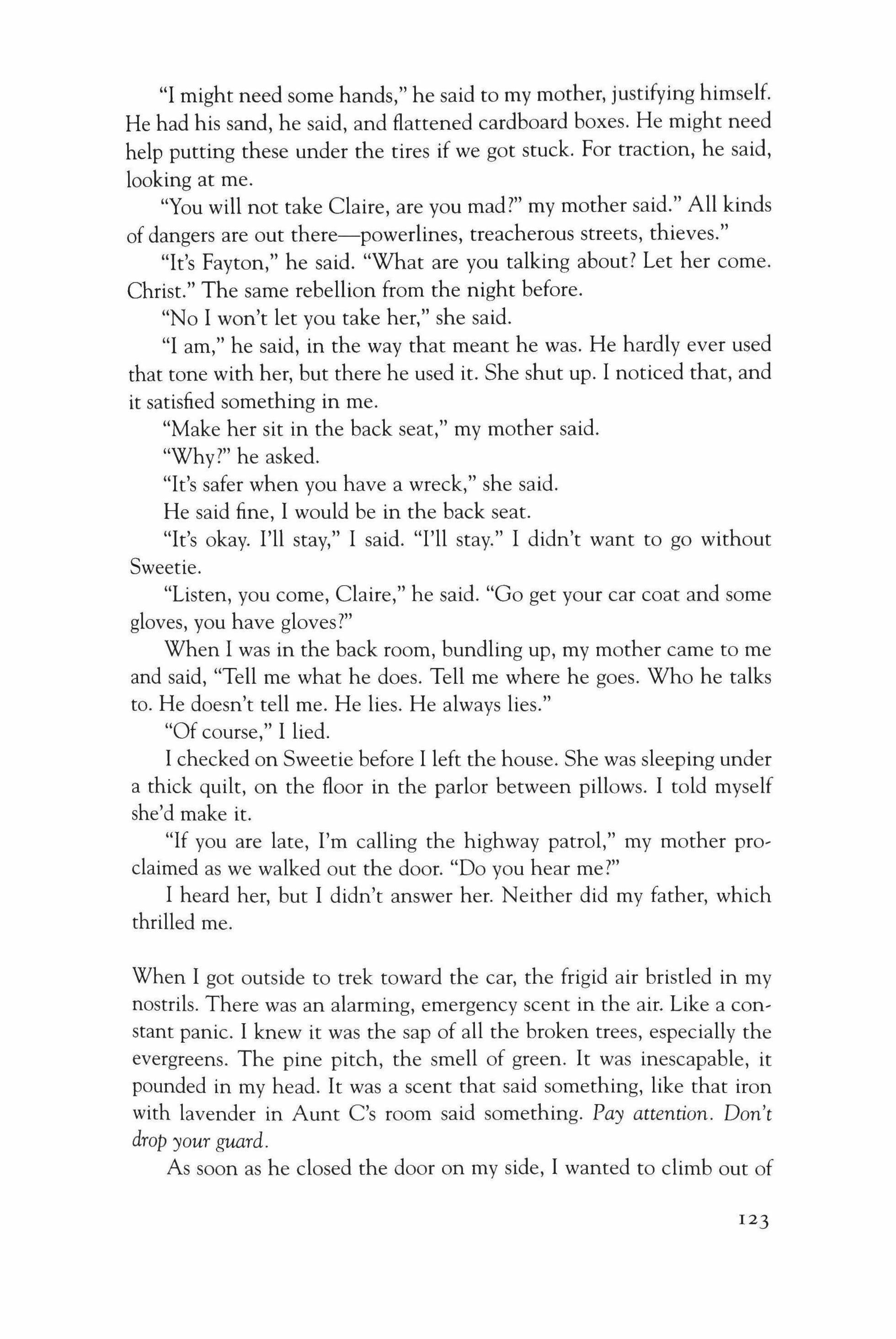
"I might need some hands," he said to my mother, justifying himself. He had his sand, he said, and flattened cardboard boxes. He might need help putting these under the tires if we got stuck. For traction, he said, looking at me.
"You will not take Claire, are you mad?" my mother said." All kinds of dangers are out there-powerlines, treacherous streets, thieves."
"It's Fayton," he said. "What are you talking about? Let her come. Christ." The same rebellion from the night before.
"No I won't let you take her," she said.
"I am," he said, in the way that meant he was. He hardly ever used that tone with her, but there he used it. She shut up. I noticed that, and it satisfied something in me.
"Make her sit in the back seat," my mother said. "Why?" he asked.
"It's safer when you have a wreck," she said. He said fine, I would be in the back seat.
"It's okay. I'll stay," I said. "I'll stay." I didn't want to go without Sweetie.
"Listen, you come, Claire," he said. "Go get your car coat and some gloves, you have gloves?"
When I was in the back room, bundling up, my mother came to me and said, "Tell me what he does. Tell me where he goes. Who he talks to. He doesn't tell me. He lies. He always lies."
"Of course," I lied.
I checked on Sweetie before I left the house. She was sleeping under a thick quilt, on the floor in the parlor between pillows. I told myself she'd make it.
"If you are late, I'm calling the highway patrol," my mother pro� claimed as we walked out the door. "Do you hear me?"
I heard her, but I didn't answer her. Neither did my father, which thrilled me.
When I got outside to trek toward the car, the frigid air bristled in my nostrils. There was an alarming, emergency scent in the air. Like a constant panic. I knew it was the sap of all the broken trees, especially the evergreens. The pine pitch, the smell of green. It was inescapable, it pounded in my head. It was a scent that said something, like that iron with lavender in Aunt C's room said something. Pay attention. Don't drop your guard.
As soon as he closed the door on my side, I wanted to climb out of
123
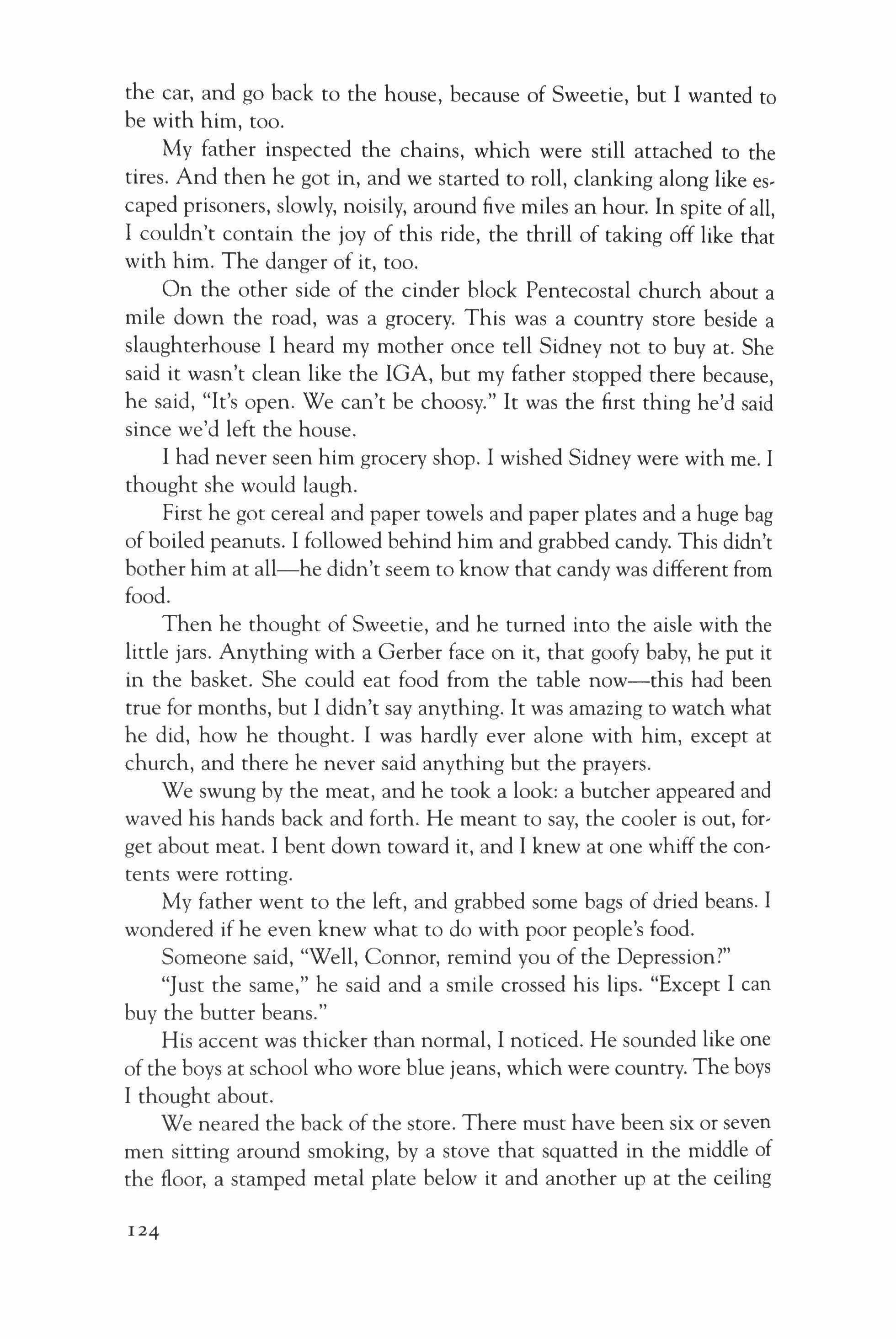
the car, and go back to the house, because of Sweetie, but I wanted to be with him, too.
My father inspected the chains, which were still attached to the tires. And then he got in, and we started to roll, clanking along like escaped prisoners, slowly, noisily, around five miles an hour. In spite of all, I couldn't contain the joy of this ride, the thrill of taking off like that with him. The danger of it, too.
On the other side of the cinder block Pentecostal church about a mile down the road, was a grocery. This was a country store beside a slaughterhouse I heard my mother once tell Sidney not to buy at. She said it wasn't clean like the IGA, but my father stopped there because, he said, "It's open. We can't be choosy." It was the first thing he'd said since we'd left the house.
I had never seen him grocery shop. I wished Sidney were with me. I thought she would laugh.
First he got cereal and paper towels and paper plates and a huge bag of boiled peanuts. I followed behind him and grabbed candy. This didn't bother him at all-he didn't seem to know that candy was different from food.
Then he thought of Sweetie, and he turned into the aisle with the little jars. Anything with a Gerber face on it, that goofy baby, he put it in the basket. She could eat food from the table now-this had been true for months, but I didn't say anything. It was amazing to watch what he did, how he thought. I was hardly ever alone with him, except at church, and there he never said anything but the prayers.
We swung by the meat, and he took a look: a butcher appeared and waved his hands back and forth. He meant to say, the cooler is out, forget about meat. I bent down toward it, and I knew at one whiff the contents were rotting.
My father went to the left, and grabbed some bags of dried beans. I wondered if he even knew what to do with poor people's food.
Someone said, "Well, Connor, remind you of the Depression?"
"Just the same," he said and a smile crossed his lips. "Except I can buy the butter beans."
His accent was thicker than normal, I noticed. He sounded like one of the boys at school who wore blue jeans, which were country. The boys I thought about.
We neared the back of the store. There must have been six or seven men sitting around smoking, by a stove that squatted in the middle of the floor, a stamped metal plate below it and another up at the ceiling
124
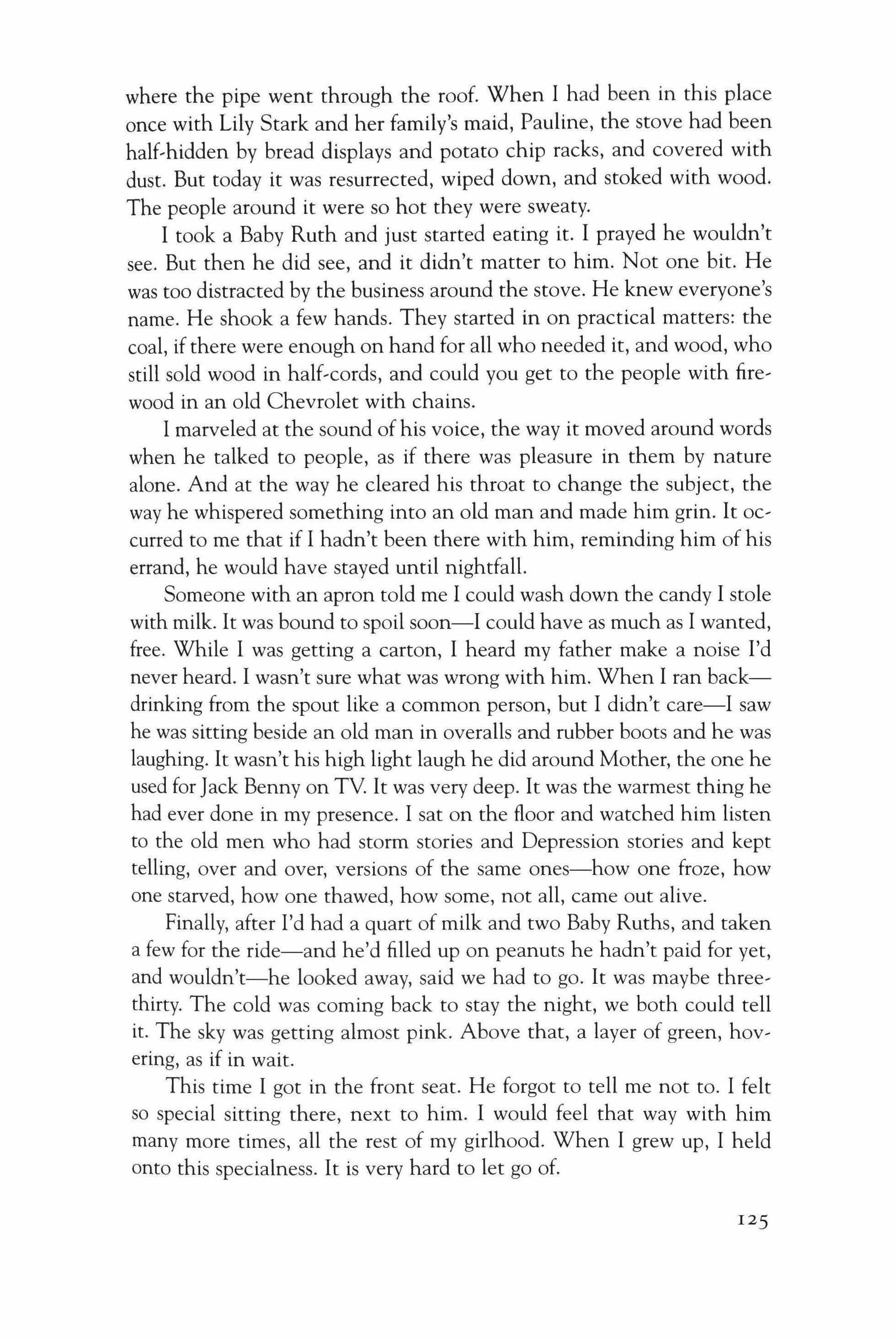
where the pipe went through the roof. When I had been in this place once with Lily Stark and her family's maid, Pauline, the stove had been half-hidden by bread displays and potato chip racks, and covered with dust. But today it was resurrected, wiped down, and stoked with wood. The people around it were so hot they were sweaty.
I took a Baby Ruth and just started eating it. I prayed he wouldn't see. But then he did see, and it didn't matter to him. Not one bit. He was too distracted by the business around the stove. He knew everyone's name. He shook a few hands. They started in on practical matters: the coal, if there were enough on hand for all who needed it, and wood, who still sold wood in half-cords, and could you get to the people with firewood in an old Chevrolet with chains.
I marveled at the sound of his voice, the way it moved around words when he talked to people, as if there was pleasure in them by nature alone. And at the way he cleared his throat to change the subject, the way he whispered something into an old man and made him grin. It occurred to me that if I hadn't been there with him, reminding him of his errand, he would have stayed until nightfall.
Someone with an apron told me I could wash down the candy I stole with milk. It was bound to spoil soon-I could have as much as I wanted, free. While I was getting a carton, I heard my father make a noise I'd never heard. I wasn't sure what was wrong with him. When I ran backdrinking from the spout like a common person, but I didn't care-I saw he was sitting beside an old man in overalls and rubber boots and he was laughing. It wasn't his high light laugh he did around Mother, the one he used for Jack Benny on TV. It was very deep. It was the warmest thing he had ever done in my presence. I sat on the floor and watched him listen to the old men who had storm stories and Depression stories and kept telling, over and over, versions of the same ones-how one froze, how one starved, how one thawed, how some, not all, came out alive.
Finally, after I'd had a quart of milk and two Baby Ruths, and taken a few for the ride-and he'd filled up on peanuts he hadn't paid for yet, and wouldn't-he looked away, said we had to go. It was maybe threethirty. The cold was coming back to stay the night, we both could tell it. The sky was getting almost pink. Above that, a layer of green, hovering, as if in wait.
This time I got in the front seat. He forgot to tell me not to. I felt so special sitting there, next to him. I would feel that way with him many more times, all the rest of my girlhood. When I grew up, I held onto this specialness. It is very hard to let go of.
I25
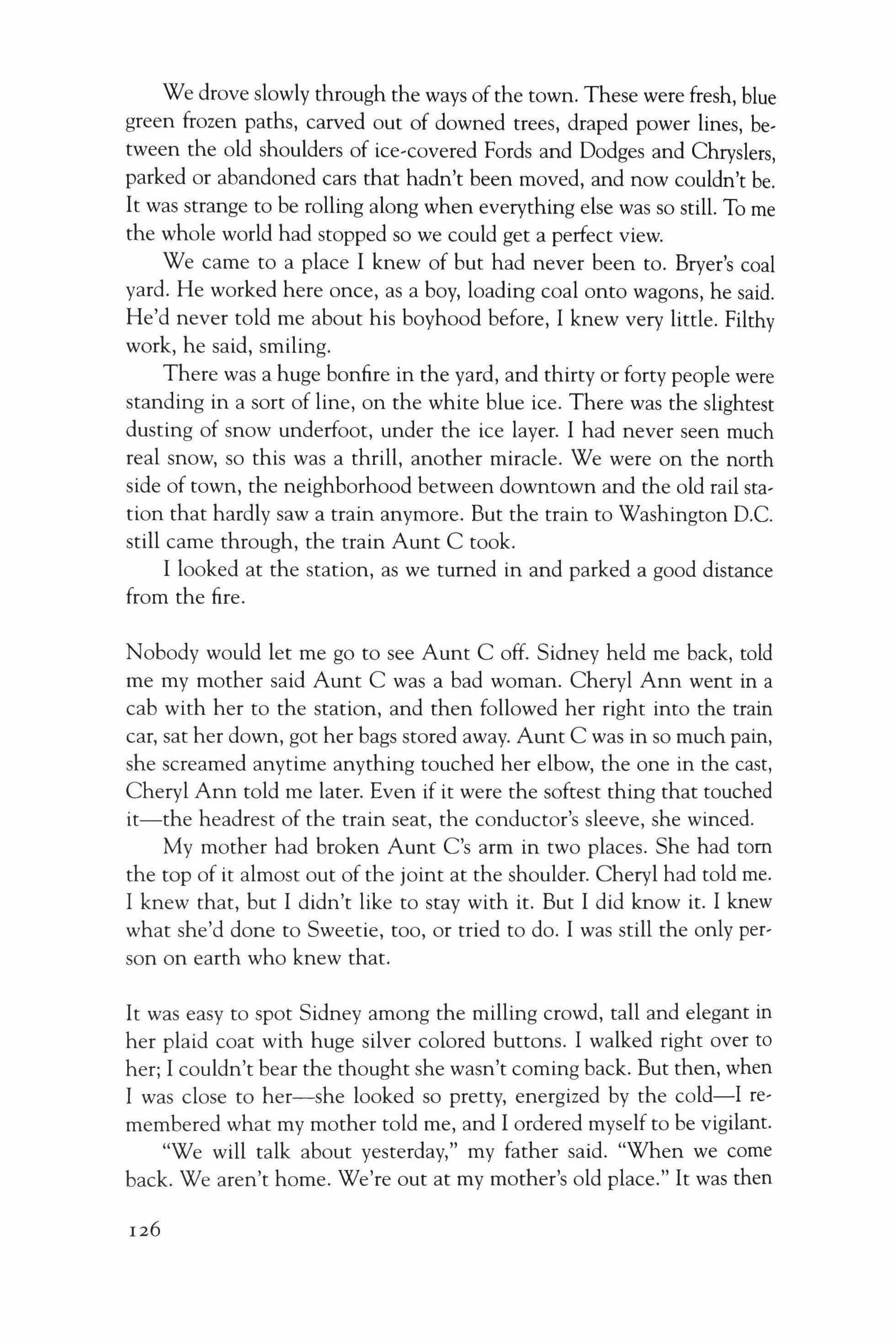
We drove slowly through the ways of the town. These were fresh, blue green frozen paths, carved out of downed trees, draped power lines, between the old shoulders of ice-covered Fords and Dodges and Chryslers, parked or abandoned cars that hadn't been moved, and now couldn't be. It was strange to be rolling along when everything else was so still. To me the whole world had stopped so we could get a perfect view.
We came to a place I knew of but had never been to. Bryer's coal yard. He worked here once, as a boy, loading coal onto wagons, he said. He'd never told me about his boyhood before, I knew very little. Filthy work, he said, smiling.
There was a huge bonfire in the yard, and thirty or forty people were standing in a sort of line, on the white blue ice. There was the slightest dusting of snow underfoot, under the ice layer. I had never seen much real snow, so this was a thrill, another miracle. We were on the north side of town, the neighborhood between downtown and the old rail station that hardly saw a train anymore. But the train to Washington o.c. still came through, the train Aunt C took.
I looked at the station, as we turned in and parked a good distance from the fire.
Nobody would let me go to see Aunt C off. Sidney held me back, told me my mother said Aunt C was a bad woman. Cheryl Ann went in a cab with her to the station, and then followed her right into the train car, sat her down, got her bags stored away. Aunt C was in so much pain, she screamed anytime anything touched her elbow, the one in the cast, Cheryl Ann told me later. Even if it were the softest thing that touched it-the headrest of the train seat, the conductor's sleeve, she winced.
My mother had broken Aunt C's arm in two places. She had tom the top of it almost out of the joint at the shoulder. Cheryl had told me. I knew that, but I didn't like to stay with it. But I did know it. I knew what she'd done to Sweetie, too, or tried to do. I was still the only person on earth who knew that.
It was easy to spot Sidney among the milling crowd, tall and elegant in her plaid coat with huge silver colored buttons. I walked right over to her; I couldn't bear the thought she wasn't coming back. But then, when I was close to her-she looked so pretty, energized by the cold-I remembered what my mother told me, and I ordered myself to be vigilant.
"We will talk about yesterday," my father said. "When we come back. We aren't home. We're out at my mother's old place." It was then
126
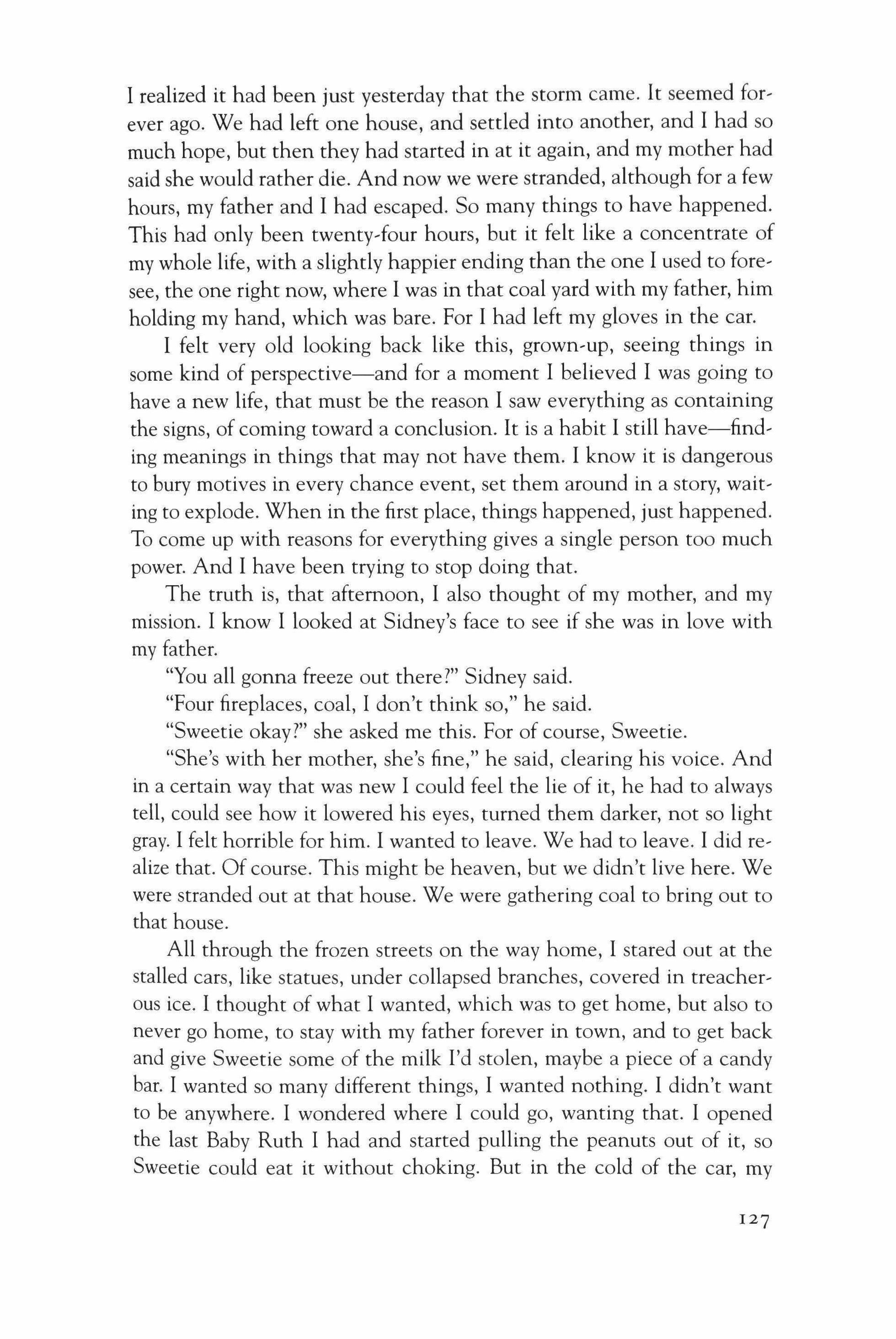
I realized it had been just yesterday that the storm came. It seemed forever ago. We had left one house, and settled into another, and I had so much hope, but then they had started in at it again, and my mother had said she would rather die. And now we were stranded, although for a few hours, my father and I had escaped. So many things to have happened. This had only been twenty-four hours, but it felt like a concentrate of my whole life, with a slightly happier ending than the one I used to foresee, the one right now, where I was in that coal yard with my father, him holding my hand, which was bare. For I had left my gloves in the car.
I felt very old looking back like this, grown�up, seeing things in some kind of perspective-and for a moment I believed I was going to have a new life, that must be the reason I saw everything as containing the signs, of coming toward a conclusion. It is a habit I still have-a-finding meanings in things that may not have them. I know it is dangerous to bury motives in every chance event, set them around in a story, waiting to explode. When in the first place, things happened, just happened. To come up with reasons for everything gives a single person too much power. And I have been trying to stop doing that.
The truth is, that afternoon, I also thought of my mother, and my mission. I know I looked at Sidney's face to see if she was in love with my father.
"You all gonna freeze out there?" Sidney said.
"Four fireplaces, coal, I don't think so," he said.
"Sweetie okay?" she asked me this. For of course, Sweetie.
"She's with her mother, she's fine," he said, clearing his voice. And in a certain way that was new I could feel the lie of it, he had to always tell, could see how it lowered his eyes, turned them darker, not so light gray. I felt horrible for him. I wanted to leave. We had to leave. I did realize that. Of course. This might be heaven, but we didn't live here. We were stranded out at that house. We were gathering coal to bring out to that house.
All through the frozen streets on the way home, I stared out at the stalled cars, like statues, under collapsed branches, covered in treacherous ice. I thought of what I wanted, which was to get home, but also to never go home, to stay with my father forever in town, and to get back and give Sweetie some of the milk I'd stolen, maybe a piece of a candy bar. I wanted so many different things, I wanted nothing. I didn't want to be anywhere. I wondered where I could go, wanting that. I opened the last Baby Ruth I had and started pulling the peanuts out of it, so Sweetie could eat it without choking. But in the cold of the car, my
127
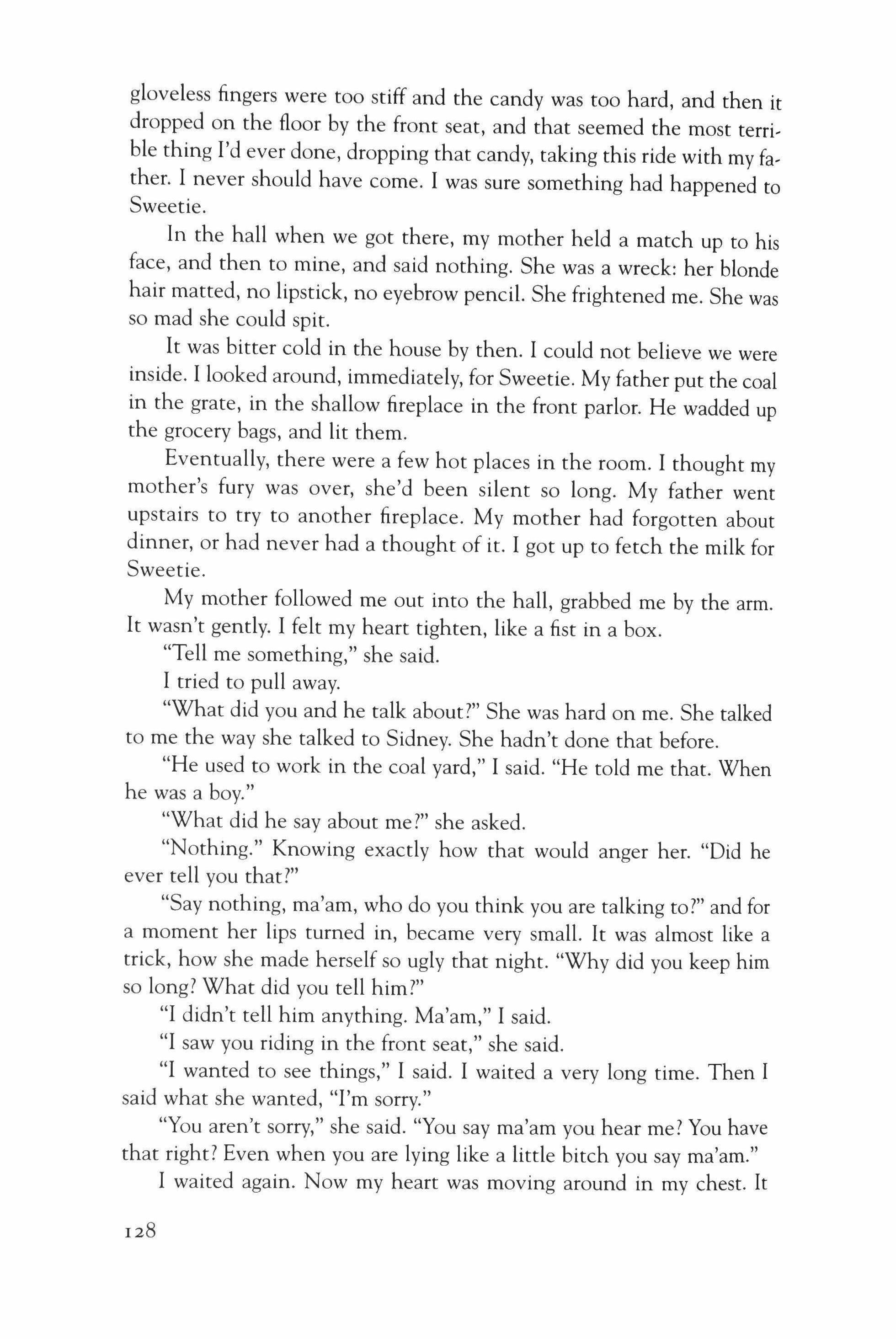
gloveless fingers were too stiff and the candy was too hard, and then it dropped on the floor by the front seat, and that seemed the most terrible thing I'd ever done, dropping that candy, taking this ride with my father. I never should have come. I was sure something had happened to Sweetie.
In the hall when we got there, my mother held a match up to his face, and then to mine, and said nothing. She was a wreck: her blonde hair matted, no lipstick, no eyebrow pencil. She frightened me. She was so mad she could spit.
It was bitter cold in the house by then. I could not believe we were inside. I looked around, immediately, for Sweetie. My father put the coal in the grate, in the shallow fireplace in the front parlor. He wadded up the grocery bags, and lit them.
Eventually, there were a few hot places in the room. I thought my mother's fury was over, she'd been silent so long. My father went upstairs to try to another fireplace. My mother had forgotten about dinner, or had never had a thought of it. I got up to fetch the milk for Sweetie.
My mother followed me out into the hall, grabbed me by the arm. It wasn't gently. I felt my heart tighten, like a fist in a box.
"Tell me something," she said.
I tried to pull away.
"What did you and he talk about?" She was hard on me. She talked to me the way she talked to Sidney. She hadn't done that before.
"He used to work in the coal yard," I said. "He told me that. When he was a boy."
"What did he say about me?" she asked.
"Nothing." Knowing exactly how that would anger her. "Did he ever tell you that?"
"Say nothing, ma'am, who do you think you are talking to?" and for a moment her lips turned in, became very small. It was almost like a trick, how she made herself so ugly that night. "Why did you keep him so long? What did you tell him?"
"I didn't tell him anything. Ma'am," I said.
"I saw you riding in the front seat," she said.
"I wanted to see things," I said. I waited a very long time. Then I said what she wanted, "I'm sorry."
"You aren't sorry," she said. "You say ma'am you hear me? You have that right? Even when you are lying like a little bitch you say ma'am."
I waited again. Now my heart was moving around in my chest. It
128
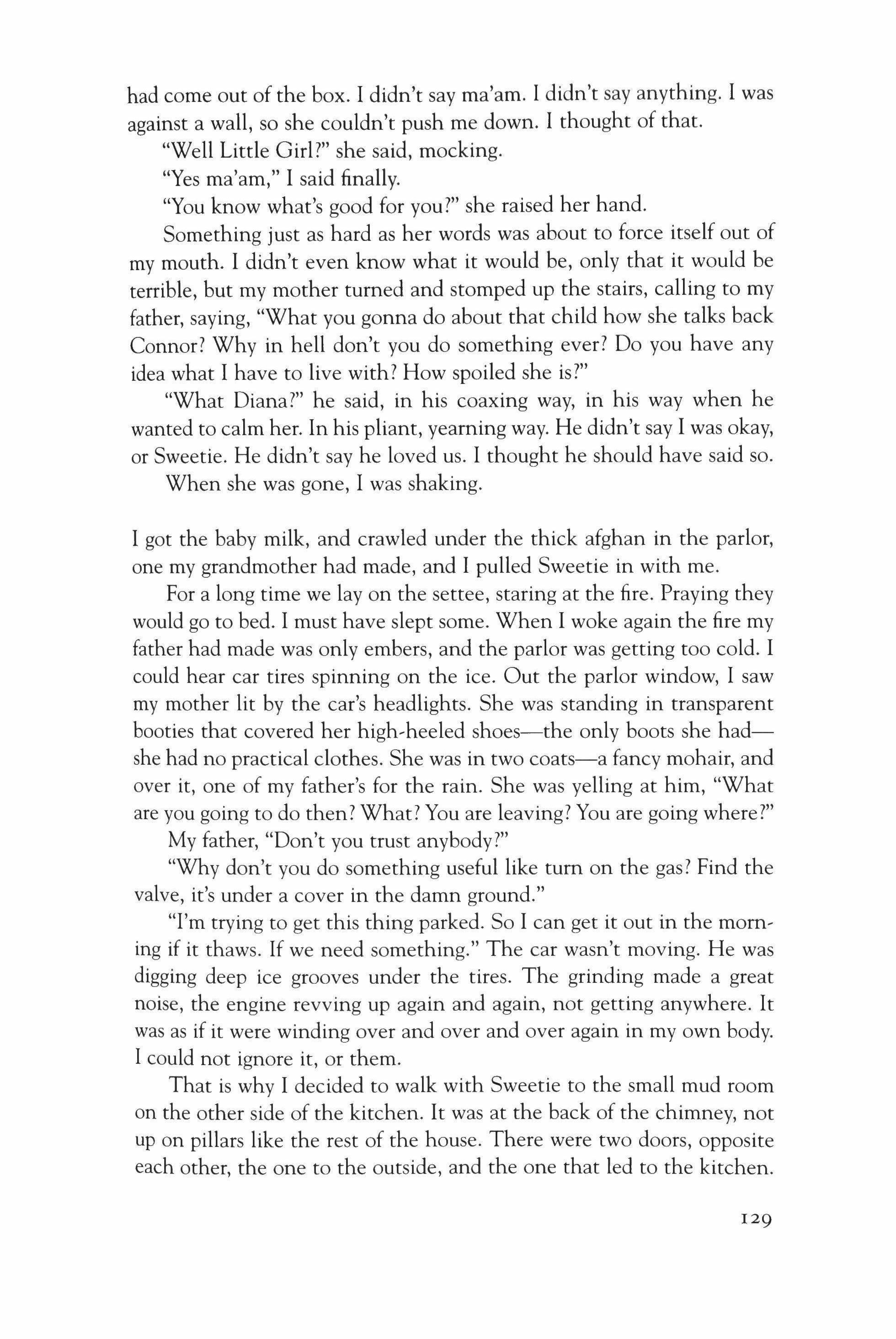
had come out of the box. I didn't say ma'am. I didn't say anything. I was against a wall, so she couldn't push me down. I thought of that.
"Well Little Girl?" she said, mocking.
"Yes ma'am," I said finally.
"You know what's good for you?" she raised her hand. Something just as hard as her words was about to force itself out of my mouth. I didn't even know what it would be, only that it would be terrible, but my mother turned and stomped up the stairs, calling to my father, saying, "What you gonna do about that child how she talks back Connor? Why in hell don't you do something ever? Do you have any idea what I have to live with? How spoiled she is?"
"What Diana?" he said, in his coaxing way, in his way when he wanted to calm her. In his pliant, yearning way. He didn't say I was okay, or Sweetie. He didn't say he loved us. I thought he should have said so.
When she was gone, I was shaking.
I got the baby milk, and crawled under the thick afghan in the parlor, one my grandmother had made, and I pulled Sweetie in with me.
For a long time we lay on the settee, staring at the fire. Praying they would go to bed. I must have slept some. When I woke again the fire my father had made was only embers, and the parlor was getting too cold. I could hear car tires spinning on the ice. Out the parlor window, I saw my mother lit by the car's headlights. She was standing in transparent booties that covered her high-heeled shoes-the only boots she hadshe had no practical clothes. She was in two coats-a fancy mohair, and over it, one of my father's for the rain. She was yelling at him, "What are you going to do then? What? You are leaving? You are going where?"
My father, "Don't you trust anybody?"
"Why don't you do something useful like turn on the gas? Find the valve, it's under a cover in the damn ground."
"I'm trying to get this thing parked. So I can get it out in the morning if it thaws. If we need something." The car wasn't moving. He was digging deep ice grooves under the tires. The grinding made a great noise, the engine revving up again and again, not getting anywhere. It was as if it were winding over and over and over again in my own body. I could not ignore it, or them.
That is why I decided to walk with Sweetie to the small mud room on the other side of the kitchen. It was at the back of the chimney, not up on pillars like the rest of the house. There were two doors, opposite each other, the one to the outside, and the one that led to the kitchen.
129
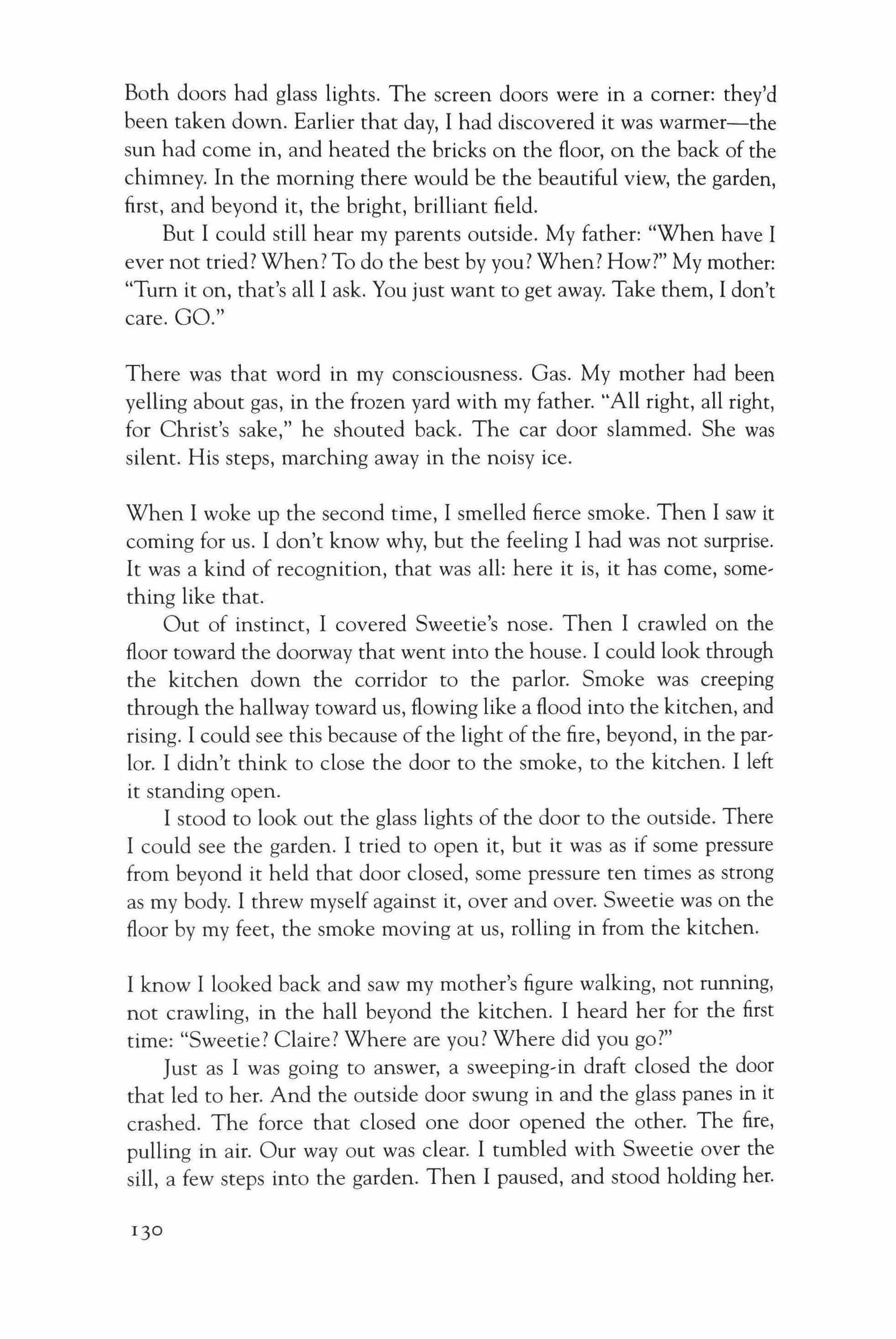
Both doors had glass lights. The screen doors were in a comer: they'd been taken down. Earlier that day, I had discovered it was warmer-the sun had come in, and heated the bricks on the floor, on the back of the chimney. In the morning there would be the beautiful view, the garden, first, and beyond it, the bright, brilliant field.
But I could still hear my parents outside. My father: "When have I ever not tried? When? To do the best by you? When? How?" My mother: "Tum it on, that's all I ask. You just want to get away. Take them, I don't care. GO."
There was that word in my consciousness. Gas. My mother had been yelling about gas, in the frozen yard with my father. "All right, all right, for Christ's sake," he shouted back. The car door slammed. She was silent. His steps, marching away in the noisy ice.
When I woke up the second time, I smelled fierce smoke. Then I saw it coming for us. I don't know why, but the feeling I had was not surprise. It was a kind of recognition, that was all: here it is, it has come, something like that.
Out of instinct, I covered Sweetie's nose. Then I crawled on the floor toward the doorway that went into the house. I could look through the kitchen down the corridor to the parlor. Smoke was creeping through the hallway toward us, flowing like a flood into the kitchen, and rising. I could see this because of the light of the fire, beyond, in the parlor. I didn't think to close the door to the smoke, to the kitchen. I left it standing open.
I stood to look out the glass lights of the door to the outside. There I could see the garden. I tried to open it, but it was as if some pressure from beyond it held that door closed, some pressure ten times as strong as my body. I threw myself against it, over and over. Sweetie was on the floor by my feet, the smoke moving at us, rolling in from the kitchen.
I know I looked back and saw my mother's figure walking, not running, not crawling, in the hall beyond the kitchen. I heard her for the first time: "Sweetie? Claire? Where are you? Where did you go?"
Just as I was going to answer, a sweeping-in draft closed the door that led to her. And the outside door swung in and the glass panes in it crashed. The force that closed one door opened the other. The fire, pulling in air. Our way out was clear. I tumbled with Sweetie over the sill, a few steps into the garden. Then I paused, and stood holding her.
130

She was limp and dear as a doll, and not on fire. And I was not on fire. We both could breathe.
I ran with her to the far end of the garden and put her down in one of the old flowerbeds with a brick border that would fence her in. Then I looked back and faced the house. All the downstairs rooms were involved; the parlor was burning. The kitchen was still all right, but darkening. The smoke cleared for a moment when the flames pulled up with the new air.
That's when I saw my mother a second time within. She was a shadow, stumbling. It was clear she didn't know the way out, or couldn't see her way to it. If she'd just get down on her knees, I remember thinking, she might have a chance. She is so proud, I remember thinking. I did think all those things, those normal things. She won't crawl, and she should.
Later they told me that happens in fires, people lose their minds in smoke, can't make a simple decision. That this can't be helped. No matter what they know. No matter who calls to them, tells them what to do.
But the fact which is mine, and always will be mine is this: She called me.
"Claire? I can't see. Connor? Claire!"
I felt something hitting my head and face just then: Icicles melting off the trees above me in the fire's heat, crashing down on the frozen camellias, the coated boxwoods. Solid shards catching light, dazzlingcrimson, cadmium, oranges, even flame-blues. Reflecting the fire, and cold, gloriously cold.
I didn't answer her.
Turning, ducking my head, I glimpsed the open field past the garden. The one that had been too bright to see in the morning. The moon was shining on it, and above I saw the clearest, most extraordinary sky. All was luminous and purple-blue. An entire field of ice, under a river of stars, and beyond it all, at the horizon, broken trees like brushstrokes, the slightest, whispered difference, between sky and earth. I bent down under the dwarf pines, took a few steps into that field, for it was beautiful. My mother would love to see this, I know I thought that. But then I thought something else: it belongs to me, just that gesture, that selfencompassing gesture, and is that evil or is it natural. I still don't know.
It felt as if the ice came up to me. It crept from the ground to my slippers, then to my calves in my leggings, then my nightdress and my car coat, and my grandmother's afghan that I was still gripping around my shoulders. It covered me, a transparent gleaming. And for a few mo-
131
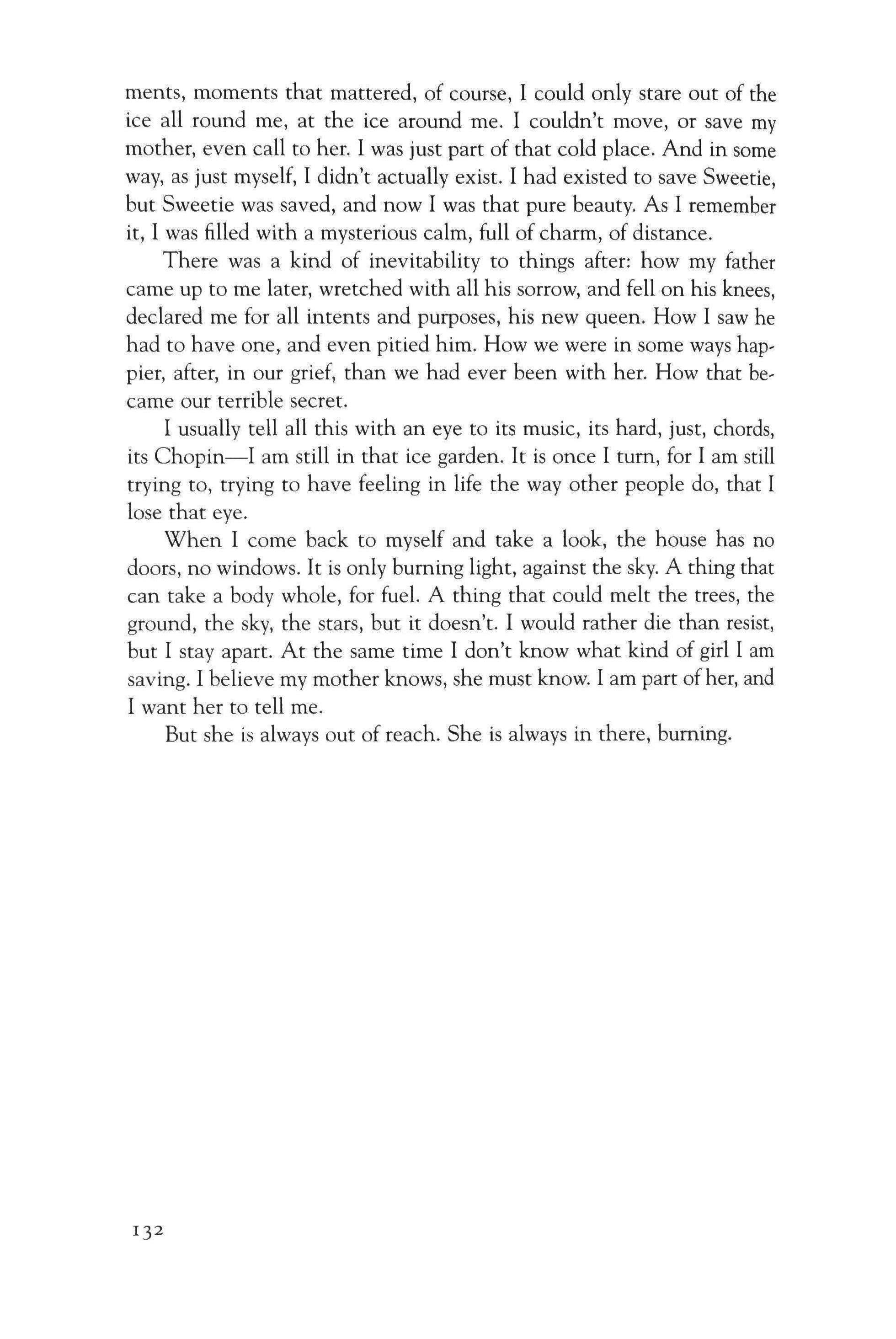
ments, moments that mattered, of course, I could only stare out of the ice all round me, at the ice around me. I couldn't move, or save my mother, even call to her. I was just part of that cold place. And in some way, as just myself, I didn't actually exist. I had existed to save Sweetie, but Sweetie was saved, and now I was that pure beauty. As I remember it, I was filled with a mysterious calm, full of charm, of distance.
There was a kind of inevitability to things after: how my father came up to me later, wretched with all his sorrow, and fell on his knees, declared me for all intents and purposes, his new queen. How I saw he had to have one, and even pitied him. How we were in some ways happier, after, in our grief, than we had ever been with her. How that became our terrible secret.
I usually tell all this with an eye to its music, its hard, just, chords, its Chopin-l am still in that ice garden. It is once I tum, for I am still trying to, trying to have feeling in life the way other people do, that I lose that eye.
When I come back to myself and take a look, the house has no doors, no windows. It is only burning light, against the sky. A thing that can take a body whole, for fuel. A thing that could melt the trees, the ground, the sky, the stars, but it doesn't. I would rather die than resist, but I stay apart. At the same time I don't know what kind of girl I am saving. I believe my mother knows, she must know. I am part ofher, and I want her to tell me.
But she is always out of reach. She is always in there, burning.
132
Adam Schuitema
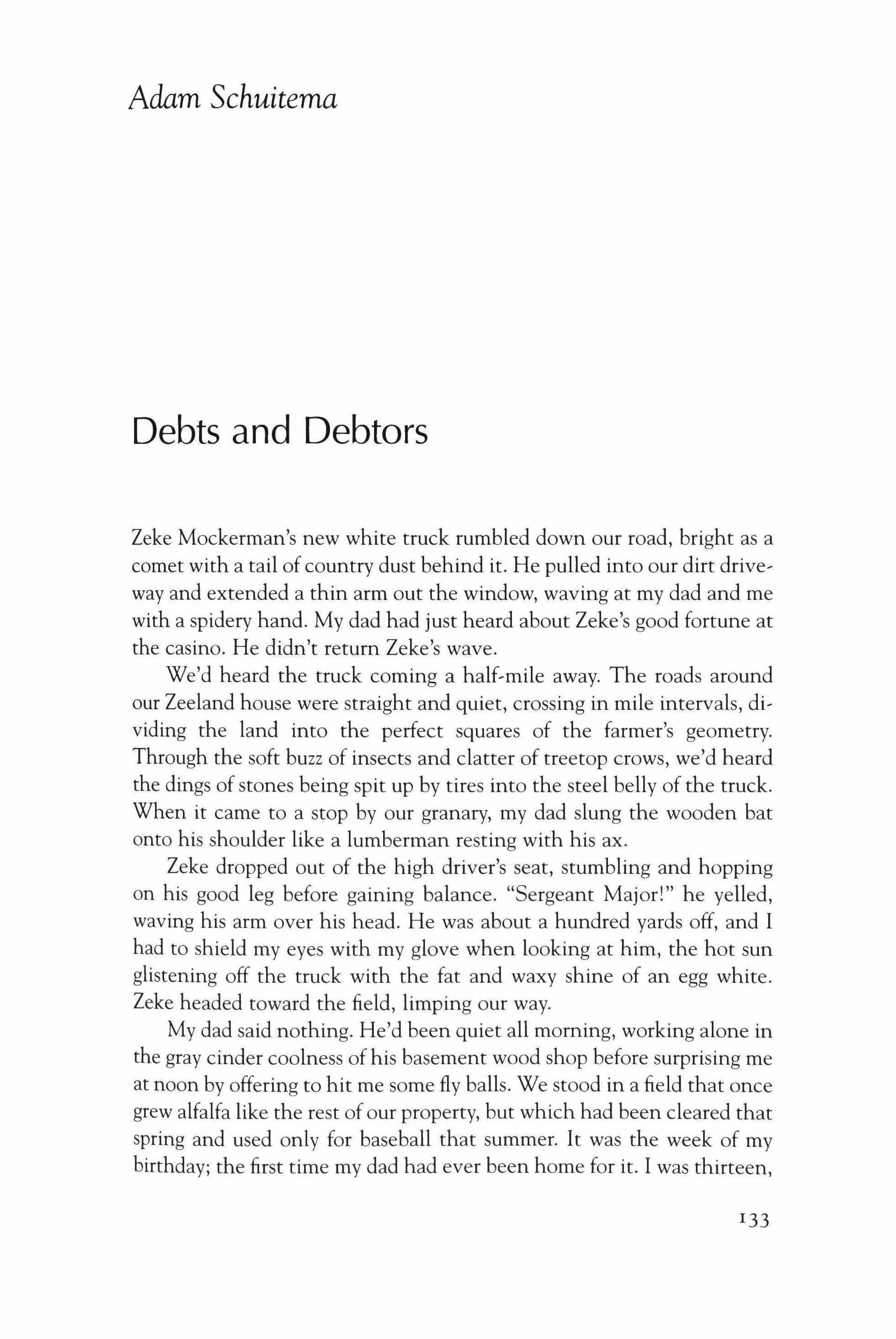
Debts and Debtors
Zeke Mockerman's new white truck rumbled down our road, bright as a comet with a tail of country dust behind it. He pulled into our dirt driveway and extended a thin arm out the window, waving at my dad and me with a spidery hand. My dad had just heard about Zeke's good fortune at the casino. He didn't return Zeke's wave.
We'd heard the truck coming a half-mile away. The roads around our Zeeland house were straight and quiet, crossing in mile intervals, dividing the land into the perfect squares of the farmer's geometry. Through the soft buzz of insects and clatter of treetop crows, we'd heard the dings of stones being spit up by tires into the steel belly of the truck. When it came to a stop by our granary, my dad slung the wooden bat onto his shoulder like a lumberman resting with his ax.
Zeke dropped out of the high driver's seat, stumbling and hopping on his good leg before gaining balance. "Sergeant Major!" he yelled, waving his arm over his head. He was about a hundred yards off, and I had to shield my eyes with my glove when looking at him, the hot sun glistening off the truck with the fat and waxy shine of an egg white. Zeke headed toward the field, limping our way.
My dad said nothing. He'd been quiet all morning, working alone in the gray cinder coolness of his basement wood shop before surprising me at noon by offering to hit me some fly balls. We stood in a field that once grew alfalfa like the rest of our property, but which had been cleared that spring and used only for baseball that summer. It was the week of my birthday; the first time my dad had ever been home for it. I was thirteen,
133

had grown six inches that year, and even back then I realized the field was still being used to grow and harvest something: a ball player.
I looked away from Zeke and looked at my dad. "Come on," I called. "One more." I punched the leather palm of my glove, making it snap beneath my knuckles. "Deep this time. No lazy pop crap."
"One more," he said, still watching Zeke. He clenched the handle of the bat, tensing the ribbons of muscle that ran up his forearms. He turned to me. "One more, and then scoot on inside for a bit. Or take a bike ride."
In high school they called him Cannonball because of his all-state pitching arm, and to that day, when he was fifty, his closest friends called him by that same name, referring now to his body type: short, stocky, but powerful. His build, along with his short-cropped hair, were his only stereotypical features, the only ways a person would know he'd been a Marine.
The heat was unmoving on that breezeless afternoon, typical of summer in the middle of some field, where the wind had all the room in the world to swish back and forth against our skin, but never did. Zeke was halfway to us, moving slowly. I looked over my shoulder and trotted through the tire ruts and weedy waves of the uneven field, scratching my legs on thistles and rough grasses because I wore shorts. My dad wore blue jeans and a short-sleeve plaid shirt-same as always-and his chest had a U-shaped sweat stain dipping down to his round stomach. His blue Vanderwood Plumbing hat was dark and wet just above the bill. He usually refused to play ball in the middle of the day because of the heat, waiting instead for the sun to approach the horizon and duck behind the steel column of power lines that cut east through our fields. The heat seemed to bother him more each summer, along with his pain. He had problems with his sciatic nerve, and pain ran like a current down his right hip and leg. He always stood in the shade of an apple tree while he swung the bat, and over the summer his feet wore that patch of field down to bald dirt. If I made an errant throw back to him, he'd mumble something, step out of the shade, and limp to the ball.
He tossed the ball to eye level, and the bat slid from his shoulder with the ease and grace of ice on ice. The swing made the familiar cracking sound of nearly all his swings, fully connecting with the ball. I used the glove to block out the sun, the way he'd taught me, before hauling the ball in easily, one-handed.
"No showboatin, Jackie," my dad said. "Use your right hand to snap the webbing shut."
134

"Barry Bonds does it all the time."
He approached me. "And some might accuse him of bein a showboater." He winked. "Ten hot-shot catches ain't worth that one God almighty dropped ball that'll come when there's a runner on third and everybody's watchin."
I stared at the ground, nodded, and dripped a long string of spit from my lips, aiming for an egg-shaped stone half-buried in the dirt.
"Look at me," he said. I looked. "It's comin." He smiled, held the bat out like a fencer's foil, and playfully poked me in the ribs. "It's been a happy summer knowin I don't have to hold back anymore when I pitch to you."
"Hold back anymore," I said mockingly. "You never held back."
"Yeah, you keep thinkin that. Last summer if I'd a rifled one up and in, you'd a bailed sure as shoot. But now you stand in there. Takes more than a little discipline."
I looked down at the earth again, embarrassed but smiling. He never withheld his praise, but always dressed it up in enough humor that it never wedged too much awkwardness between us.
"I wanna work on my pitching," I said. We'd started to draw strike zones on the back side of our granary with a piece of chalk, and he'd stand behind me, coaching me on my curve ball.
"After dinner." My dad looked up. "Go head on in now. I gotta talk with Zeke."
Zeke stepped toward us, happily-some in town would say stupidly-grinning at me. "Playin ball?"
"Were," said my dad. He slung the bat back onto his shoulder, gripping the handle like he was wringing out a towel. This was what he'd wanted, the reason why he'd invited me to play and sweat under the midday sun. For Zeke. For effect. There was no mistaking now the bat's use as a dangerous prop for the coming interrogation.
He removed one hand from the bat and stroked the underside of his chin. I would see him do this when balancing the checkbook late at night, when trapped in heavy traffic, or when I wouldn't do what he asked. Then he removed his hat to wipe his forehead, exposing his short gray hair. Normally, these days in June were when he'd spend two weeks in Twentynine Palms, in the Mohave Desert, for mountain warfare training ATD. This was the time of year when he'd go to the barber and get his hair cut even shorter than usual, "high and tight." And though he'd retired from the Reserves a few months earlier, that June he still asked the barber for the same cut.
135
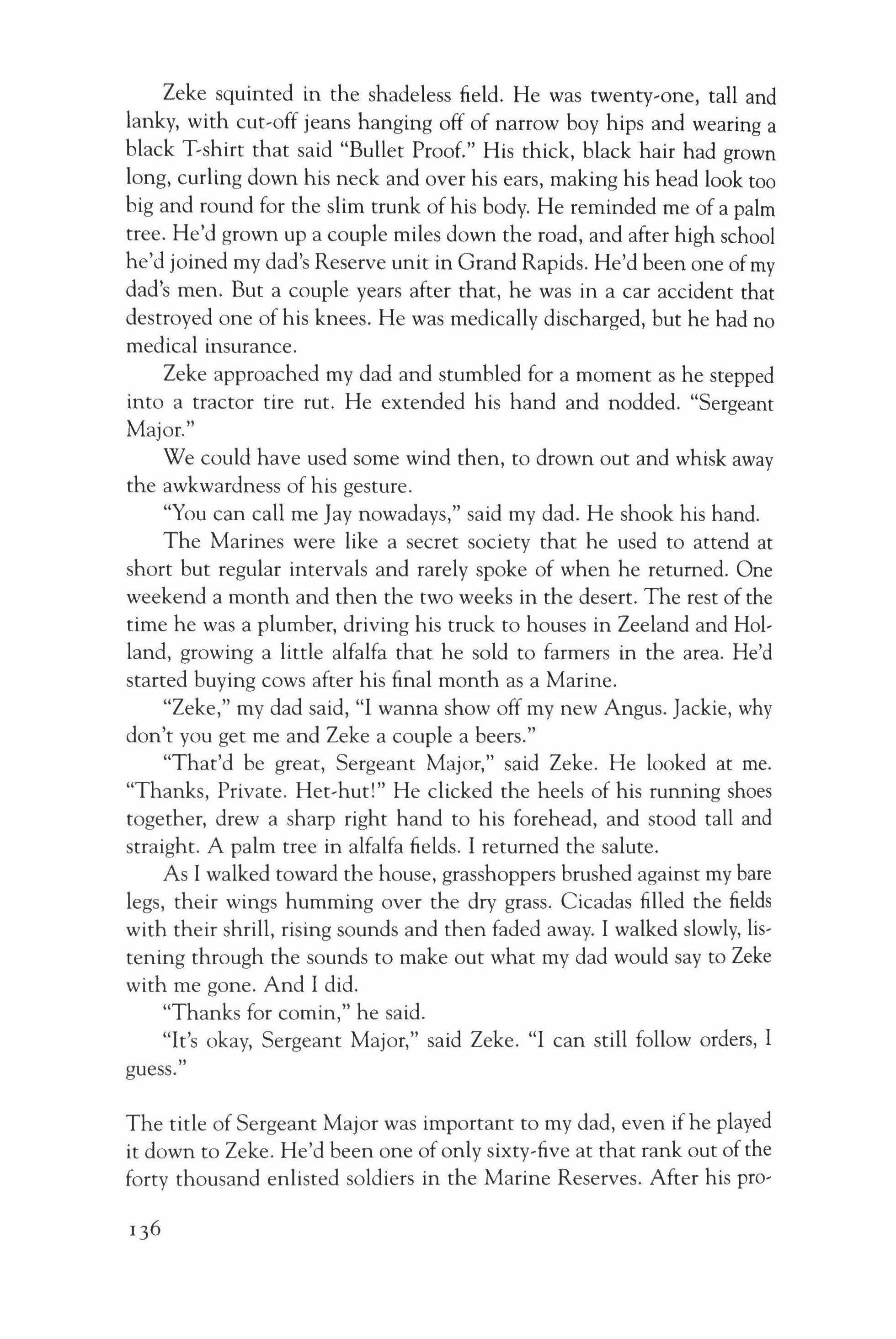
Zeke squinted in the shadeless field. He was twenty-one, tall and lanky, with cut-off jeans hanging off of narrow boy hips and wearing a black T�shirt that said "Bullet Proof." His thick, black hair had grown long, curling down his neck and over his ears, making his head look too big and round for the slim trunk of his body. He reminded me of a palm tree. He'd grown up a couple miles down the road, and after high school he'd joined my dad's Reserve unit in Grand Rapids. He'd been one of my dad's men. But a couple years after that, he was in a car accident that destroyed one of his knees. He was medically discharged, but he had no medical insurance.
Zeke approached my dad and stumbled for a moment as he stepped into a tractor tire rut. He extended his hand and nodded. "Sergeant Major."
We could have used some wind then, to drown out and whisk away the awkwardness of his gesture.
"You can call me Jay nowadays," said my dad. He shook his hand.
The Marines were like a secret society that he used to attend at short but regular intervals and rarely spoke of when he returned. One weekend a month and then the two weeks in the desert. The rest of the time he was a plumber, driving his truck to houses in Zeeland and Holland, growing a little alfalfa that he sold to farmers in the area. He'd started buying cows after his final month as a Marine.
"Zeke," my dad said, "I wanna show off my new Angus. Jackie, why don't you get me and Zeke a couple a beers."
"That'd be great, Sergeant Major," said Zeke. He looked at me. "Thanks, Private. Her-hut!" He clicked the heels of his running shoes together, drew a sharp right hand to his forehead, and stood tall and straight. A palm tree in alfalfa fields. I returned the salute.
As I walked toward the house, grasshoppers brushed against my bare legs, their wings humming over the dry grass. Cicadas filled the fields with their shrill, rising sounds and then faded away. I walked slowly, listening through the sounds to make out what my dad would say to Zeke with me gone. And I did.
"Thanks for comin," he said.
"It's okay, Sergeant Major," said Zeke. "I can still follow orders, I guess."
The title of Sergeant Major was important to my dad, even if he played it down to Zeke. He'd been one of only sixty-five at that rank out of the forty thousand enlisted soldiers in the Marine Reserves. After his pro�
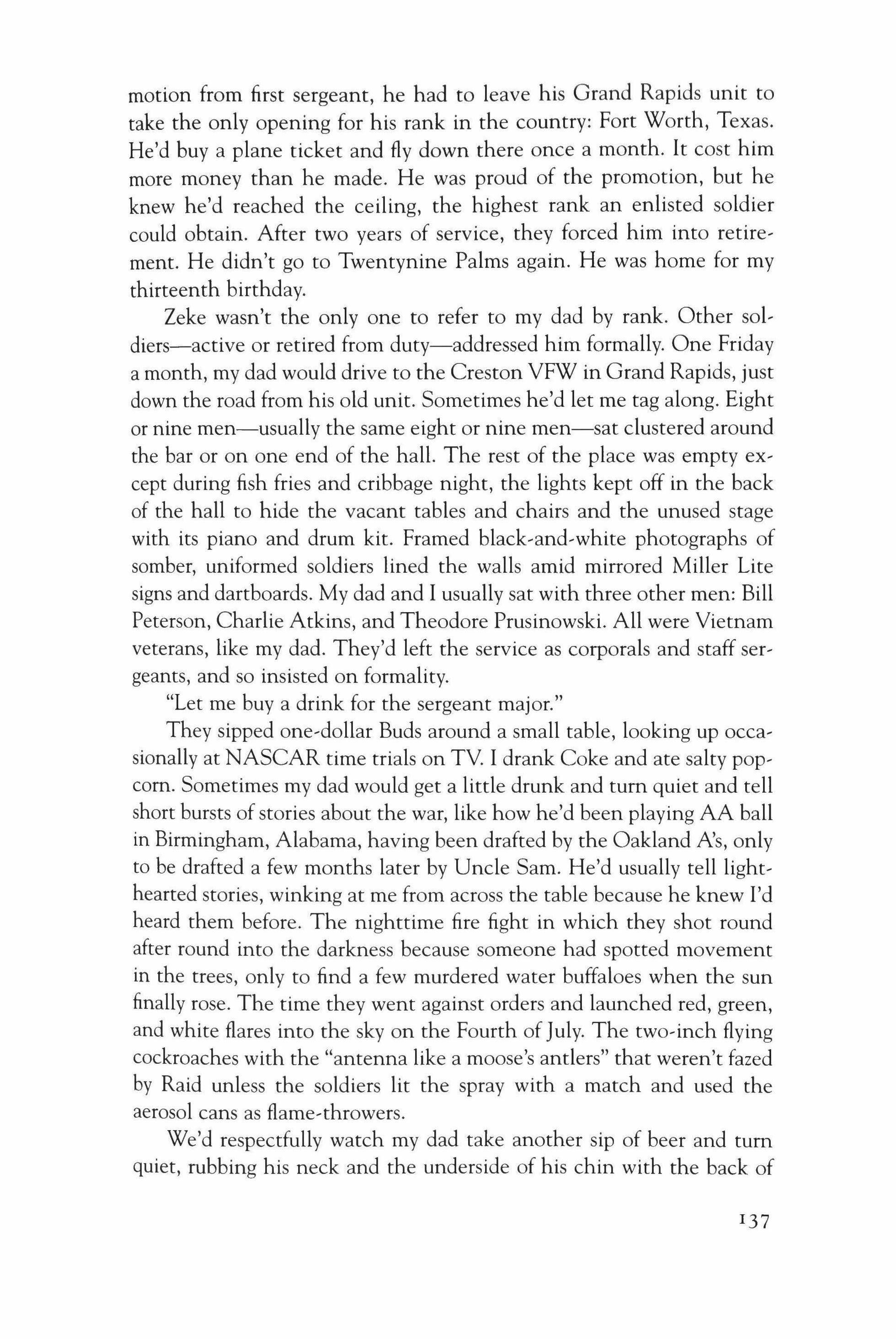
motion from first sergeant, he had to leave his Grand Rapids unit to take the only opening for his rank in the country: Fort Worth, Texas. He'd buy a plane ticket and fly down there once a month. It cost him more money than he made. He was proud of the promotion, but he knew he'd reached the ceiling, the highest rank an enlisted soldier could obtain. After two years of service, they forced him into retirement. He didn't go to Twentynine Palms again. He was home for my thirteenth birthday.
Zeke wasn't the only one to refer to my dad by rank. Other soldiers-active or retired from duty-addressed him formally. One Friday a month, my dad would drive to the Creston VFW in Grand Rapids, just down the road from his old unit. Sometimes he'd let me tag along. Eight or nine men-usually the same eight or nine men-sat clustered around the bar or on one end of the hall. The rest of the place was empty except during fish fries and cribbage night, the lights kept off in the back of the hall to hide the vacant tables and chairs and the unused stage with its piano and drum kit. Framed black-and-white photographs of somber, uniformed soldiers lined the walls amid mirrored Miller Lite signs and dartboards. My dad and I usually sat with three other men: Bill Peterson, Charlie Atkins, and Theodore Prusinowski. All were Vietnam veterans, like my dad. They'd left the service as corporals and staff sergeants, and so insisted on formality.
"Let me buy a drink for the sergeant major."
They sipped one-dollar Buds around a small table, looking up occasionally at NASCAR time trials on TV. I drank Coke and ate salty popcorn. Sometimes my dad would get a little drunk and tum quiet and tell short bursts of stories about the war, like how he'd been playing AA ball in Birmingham, Alabama, having been drafted by the Oakland Ns, only to be drafted a few months later by Uncle Sam. He'd usually tell lighthearted stories, winking at me from across the table because he knew I'd heard them before. The nighttime fire fight in which they shot round after round into the darkness because someone had spotted movement in the trees, only to find a few murdered water buffaloes when the sun finally rose. The time they went against orders and launched red, green, and white flares into the sky on the Fourth of july. The two-inch flying cockroaches with the "antenna like a moose's antlers" that weren't fazed by Raid unless the soldiers lit the spray with a match and used the aerosol cans as flame-throwers.
We'd respectfully watch my dad take another sip of beer and tum quiet, rubbing his neck and the underside of his chin with the back of
137

his hand. It would always seem like he was about to tell one more story, but instead he'd smile gently, content to end on a lighter note. And the other three vets would keep nodding, saying nothing but probably understanding the silent story, the one I'd learned that Christmas Eve from my cousin Bobby.
We were at my grandparents'. My dad and uncles were playing poker in the basement, the women drank rum and Cokes in the living room, and Bobby and I stood in the back alley, knee deep in snow, not wearing jackets, using the lids of aluminum garbage cans as shields and trying to thwart each other's snowballs. During a truce, as he scooped up new snow in his red hands, Bobby said, "My dad told me something about your dad. About the war."
"What?" I dropped my arms to my side, the garbage can lid resting against my thigh.
"Don't you know?"
"Know what?"
"He told me not to say anything, but I thought you already knew. Forget it."
"What'd he say?"
"No."
He threw a snowball at me, which I deflected with a bare hand. Bobby was only a year younger than me, but we were at the age where each year made a major difference in terms of height and weight. I rushed him, tackled him, and pressed his face into snow.
"You hole licker. Tell me." And that's when I learned how my dad had killed someone, not from the distance afforded by a bullet, but with the butt of his rifle, caving in a man's skull.
Bill Peterson, Charlie Atkins, and Theodore Prusinowski probably told their own secret stories to themselves, or told them telepathically to each other at the table. In the dim light of the windowless club, they nodded in agreement at something unspoken, leaving me thirsty, eating salty popcorn, the only one not knowing.
So my dad stuck to the funny tales, and his best was about an eighteen-year-old private with horrific teeth who'd been poor and never went to a dentist while growing up. During their two weeks in Twentynine Palms, my dad had persuaded the commanding officer to let the private have leave. The base dentist in Twentynine Palms never had much to do and excitedly treated this private like an experiment, a showcase of all his dental talents. The private never spent any time during those two weeks firing mortar rounds or sleeping on the desert sands. He stayed
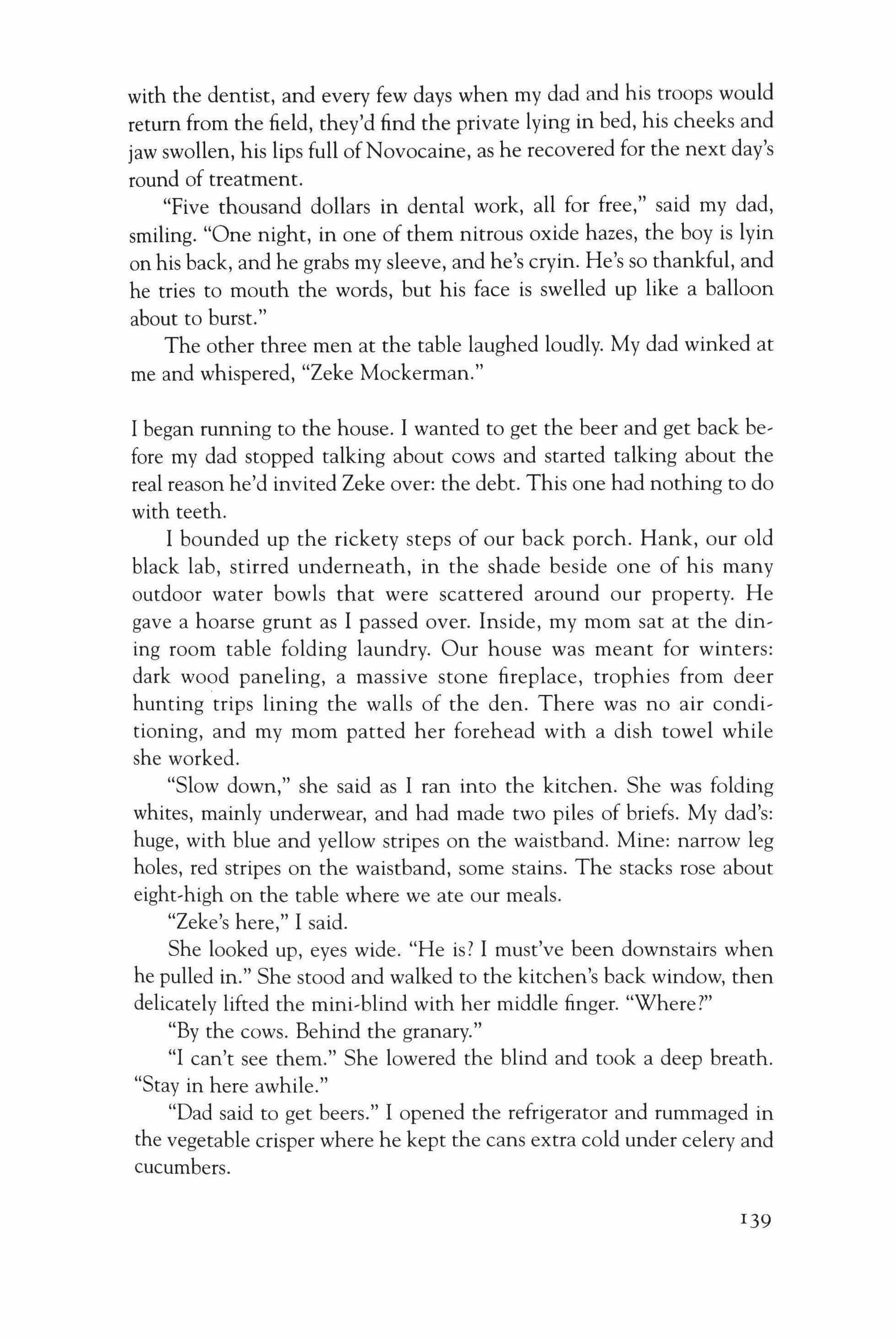
with the dentist, and every few days when my dad and his troops would return from the field, they'd find the private lying in bed, his cheeks and jaw swollen, his lips full ofNovocaine, as he recovered for the next day's round of treatment.
"Five thousand dollars in dental work, all for free," said my dad, smiling. "One night, in one of them nitrous oxide hazes, the boy is lyin on his back, and he grabs my sleeve, and he's cryin. He's so thankful, and he tries to mouth the words, but his face is swelled up like a balloon about to burst."
The other three men at the table laughed loudly. My dad winked at me and whispered, "Zeke Mockerman."
I began running to the house. I wanted to get the beer and get back before my dad stopped talking about cows and started talking about the real reason he'd invited Zeke over: the debt. This one had nothing to do with teeth.
I bounded up the rickety steps of our back porch. Hank, our old black lab, stirred underneath, in the shade beside one of his many outdoor water bowls that were scattered around our property. He gave a hoarse grunt as I passed over. Inside, my mom sat at the dining room table folding laundry. Our house was meant for winters: dark wood paneling, a massive stone fireplace, trophies from deer hunting trips lining the walls of the den. There was no air conditioning, and my mom patted her forehead with a dish towel while she worked.
"Slow down," she said as I ran into the kitchen. She was folding whites, mainly underwear, and had made two piles of briefs. My dad's: huge, with blue and yellow stripes on the waistband. Mine: narrow leg holes, red stripes on the waistband, some stains. The stacks rose about eight-high on the table where we ate our meals.
"Zeke's here," I said.
She looked up, eyes wide. "He is? I must've been downstairs when he pulled in." She stood and walked to the kitchen's back window, then delicately lifted the mini-blind with her middle finger. "Where?"
"By the cows. Behind the granary."
"I can't see them." She lowered the blind and took a deep breath. "Stay in here awhile."
"Dad said to get beers." I opened the refrigerator and rummaged in the vegetable crisper where he kept the cans extra cold under celery and cucumbers.
139
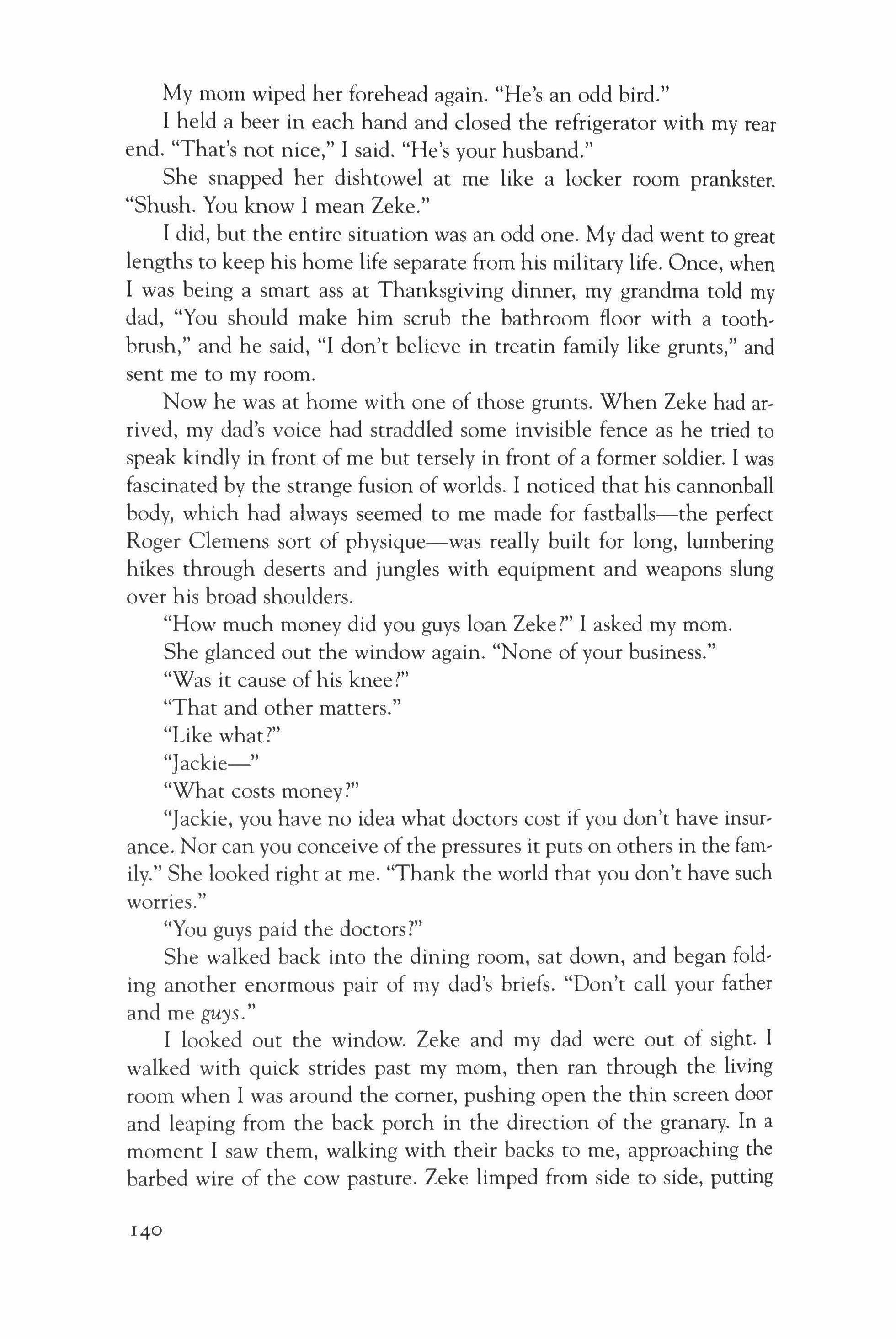
My mom wiped her forehead again. "He's an odd bird."
I held a beer in each hand and closed the refrigerator with my rear end. "That's not nice," I said. "He's your husband."
She snapped her dishtowel at me like a locker room prankster. "Shush. You know I mean Zeke."
I did, but the entire situation was an odd one. My dad went to great lengths to keep his home life separate from his military life. Once, when I was being a smart ass at Thanksgiving dinner, my grandma told my dad, "You should make him scrub the bathroom floor with a toothbrush," and he said, "I don't believe in treatin family like grunts," and sent me to my room.
Now he was at home with one of those grunts. When Zeke had arrived, my dad's voice had straddled some invisible fence as he tried to speak kindly in front of me but tersely in front of a former soldier. I was fascinated by the strange fusion of worlds. I noticed that his cannonball body, which had always seemed to me made for fastballs-the perfect Roger Clemens sort of physique-was really built for long, lumbering hikes through deserts and jungles with equipment and weapons slung over his broad shoulders.
"How much money did you guys loan Zeke?" I asked my mom.
She glanced out the window again. "None of your business."
"Was it cause of his knee?"
"That and other matters."
"Like what?"
"Jackie-"
"What costs money?"
"Jackie, you have no idea what doctors cost if you don't have insurance. Nor can you conceive of the pressures it puts on others in the family." She looked right at me. "Thank the world that you don't have such wornes.
"You guys paid the doctors?"
She walked back into the dining room, sat down, and began folding another enormous pair of my dad's briefs. "Don't call your father and me guys."
I looked out the window. Zeke and my dad were out of sight. I walked with quick strides past my mom, then ran through the living room when I was around the comer, pushing open the thin screen door and leaping from the back porch in the direction of the granary. In a moment I saw them, walking with their backs to me, approaching the barbed wire of the cow pasture. Zeke limped from side to side, putting
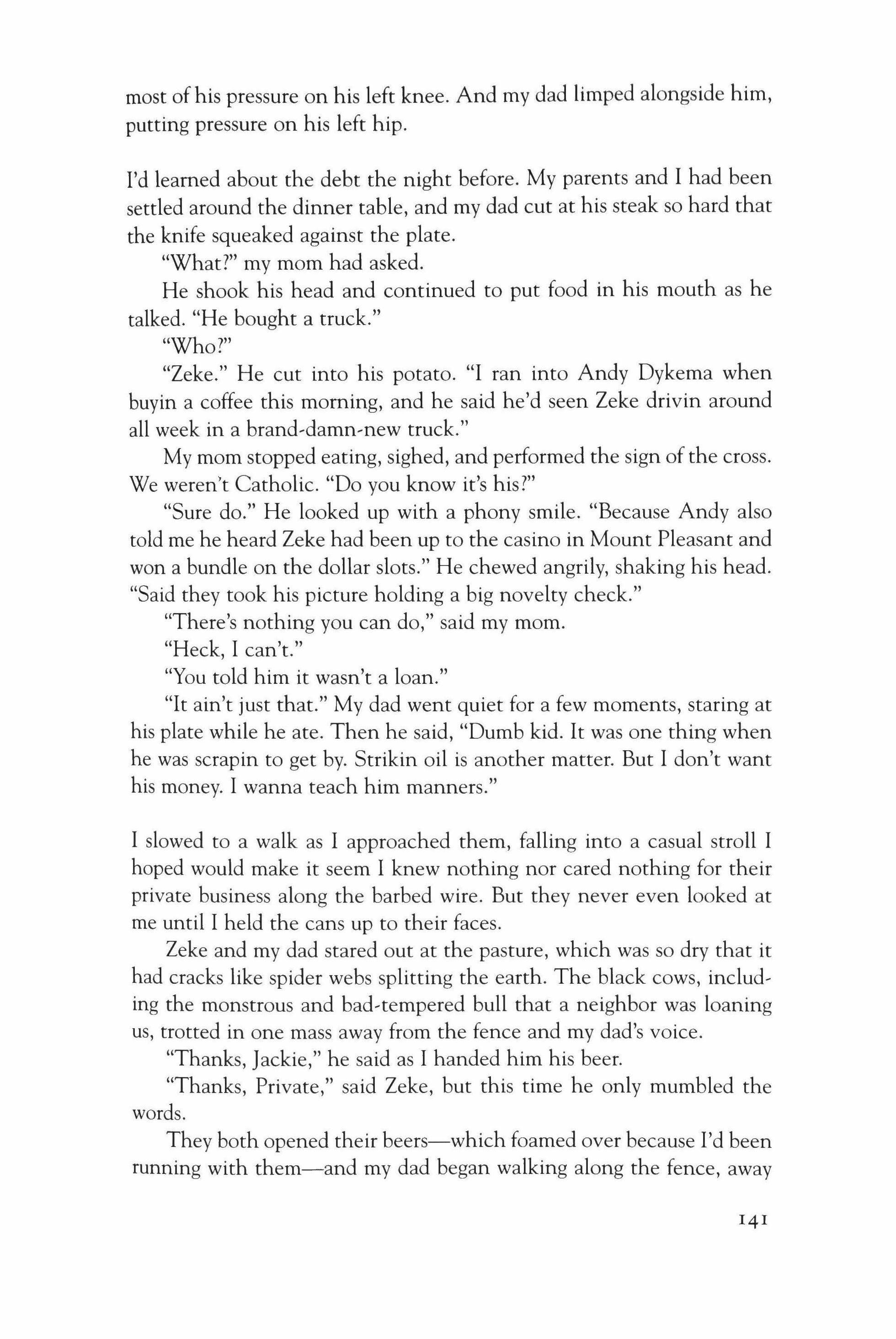
most ofhis pressure on his left knee. And my dad limped alongside him, putting pressure on his left hip.
I'd learned about the debt the night before. My parents and I had been settled around the dinner table, and my dad cut at his steak so hard that the knife squeaked against the plate.
"What?" my mom had asked.
He shook his head and continued to put food in his mouth as he talked. "He bought a truck."
"Who?"
"Zeke." He cut into his potato. "I ran into Andy Dykema when buyin a coffee this morning, and he said he'd seen Zeke drivin around all week in a brand-damn-new truck."
My mom stopped eating, sighed, and performed the sign of the cross. We weren't Catholic. "Do you know it's his?"
"Sure do." He looked up with a phony smile. "Because Andy also told me he heard Zeke had been up to the casino in Mount Pleasant and won a bundle on the dollar slots." He chewed angrily, shaking his head. "Said they took his picture holding a big novelty check."
"There's nothing you can do," said my mom.
"Heck, I can't."
"You told him it wasn't a loan."
"It ain't just that." My dad went quiet for a few moments, staring at his plate while he ate. Then he said, "Dumb kid. It was one thing when he was serapin to get by. Strikin oil is another matter. But I don't want his money. I wanna teach him manners."
I slowed to a walk as I approached them, falling into a casual stroll I hoped would make it seem I knew nothing nor cared nothing for their private business along the barbed wire. But they never even looked at me until I held the cans up to their faces.
Zeke and my dad stared out at the pasture, which was so dry that it had cracks like spider webs splitting the earth. The black cows, including the monstrous and bad-tempered bull that a neighbor was loaning us, trotted in one mass away from the fence and my dad's voice.
"Thanks, Jackie," he said as I handed him his beer.
"Thanks, Private," said Zeke, but this time he only mumbled the words.
They both opened their beers-which foamed over because I'd been running with them-and my dad began walking along the fence, away
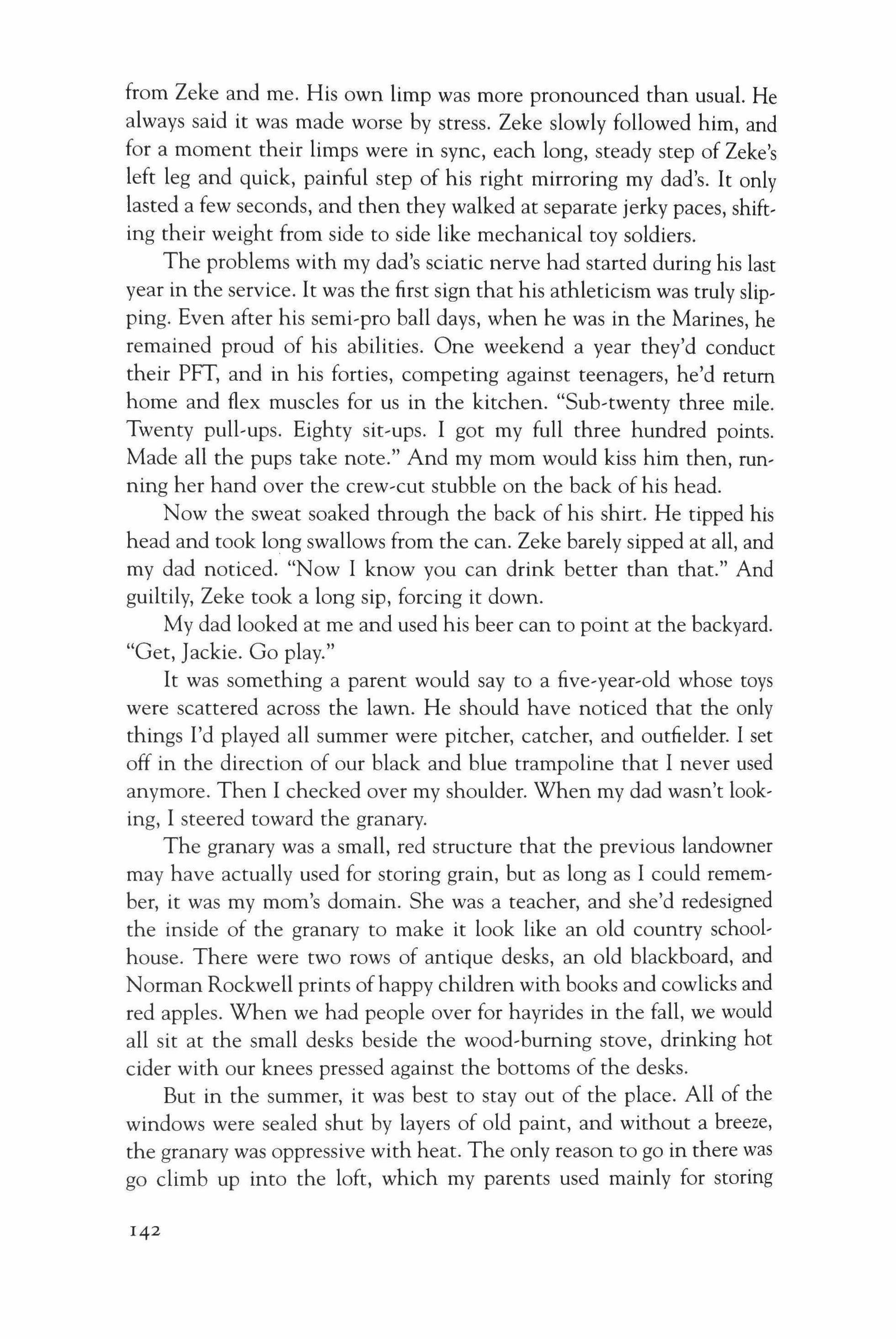
from Zeke and me. His own limp was more pronounced than usual. He always said it was made worse by stress. Zeke slowly followed him, and for a moment their limps were in sync, each long, steady step of Zeke's left leg and quick, painful step of his right mirroring my dad's. It only lasted a few seconds, and then they walked at separate jerky paces, shifting their weight from side to side like mechanical toy soldiers.
The problems with my dad's sciatic nerve had started during his last year in the service. It was the first sign that his athleticism was truly slipping. Even after his semi-pro ball days, when he was in the Marines, he remained proud of his abilities. One weekend a year they'd conduct their PIT, and in his forties, competing against teenagers, he'd return home and flex muscles for us in the kitchen. "Sub-twenty three mile. Twenty pull-ups. Eighty sit-ups. I got my full three hundred points. Made all the pups take note." And my mom would kiss him then, running her hand over the crew-cut stubble on the back of his head.
Now the sweat soaked through the back of his shirt. He tipped his head and took long swallows from the can. Zeke barely sipped at all, and my dad noticed. "Now I know you can drink better than that." And guiltily, Zeke took a long sip, forcing it down.
My dad looked at me and used his beer can to point at the backyard. "Get, Jackie. Go play."
It was something a parent would say to a five-year-old whose toys were scattered across the lawn. He should have noticed that the only things I'd played all summer were pitcher, catcher, and outfielder. I set off in the direction of our black and blue trampoline that I never used anymore. Then I checked over my shoulder. When my dad wasn't looking, I steered toward the granary.
The granary was a small, red structure that the previous landowner may have actually used for storing grain, but as long as I could remember, it was my mom's domain. She was a teacher, and she'd redesigned the inside of the granary to make it look like an old country schoolhouse. There were two rows of antique desks, an old blackboard, and Norman Rockwell prints ofhappy children with books and cowlicks and red apples. When we had people over for hayrides in the fall, we would all sit at the small desks beside the wood-burning stove, drinking hot cider with our knees pressed against the bottoms of the desks.
But in the summer, it was best to stay out of the place. All of the windows were sealed shut by layers of old paint, and without a breeze, the granary was oppressive with heat. The only reason to go in there was go climb up into the loft, which my parents used mainly for storing

boxes of baby clothes, Christmas decorations, and artifacts from their youth. Once I climbed up there looking for my dad's old catcher's mitt, and instead found a box of Marine gear. There had been a tightly rolled green sleeping bag, green flak jacket, green socks, green canteens. There'd also been a camouflaged helmet, and when I put it on, the weight of it bent my neck and pulled my head to the side. I dug around looking for any knives or grenades, but never found any, and never really expected to. I asked my dad about the box of equipment. The next day it was gone.
When I walked inside, the heat was like something I could poke at with my fingers. I walked to the far wall, next to the wood-burning stove. My dad and Zeke were on the other side of that wall. I crouched down and tried to look through slits in the old red planks. I couldn't see anything, but I could start to make out their voices. I stared down at the cement floor, trying to discern the words, and as I stared, I watched drops of sweat fall and splatter on the ground, making wet constellations on the cement. I was at the age where I was just beginning to sweat the way a man does, the way my dad did, and I liked it.
"Don't give me that, Zeke."
I pressed my ear to the wood. It was warm, the sun bleeding all the way through from the outside.
"I'm sorry, Sergeant Major, but that's what you said."
"You're not listening." My dad paused. "Why should that surprise me? Why should it?"
"Am I supposed to answer?"
My dad chuckled but didn't sound happy. I wished I could see his face. "N0, you can answer to other things."
"Like what?"
"Like what. Like that moneybags on wheels out there."
"My truck?"
"Your new-as-spit F-250."
"I needed a new car."
"Oh, I know you did."
The small wet spots on the cement accumulated until there was only one large spot as the sweat rolled out from under my hairline, down my forehead, and off my nose.
"Is that supposed to mean something, too?" asked Zeke.
"Yeah, it means maybe if you hadn't been stoned you wouldn't have slipped off the road into an irrigation ditch and into a tree, you'd still be driving your old car, you wouldn't be walking like an old man, and you
143

wouldn't be here at all today because you never would have needed any of my money."
"There we go," said Zeke. "You should've just said that when I got here, Sergeant Major."
"Don't call me that anymore, Zeke."
"I don't owe you anything, sir. I don't even need to call you 'sir.'"
"At this point, I'd rather you didn't."
"I don't believe you, Sergeant Major. The second I set foot on your farm you were making our relationship clear. Goddamn, you should've just held me up like a bank robber."
"Oh, Jesus Christ."
"You could've used that baseball bat you got there to break my kneecaps."
"Your knees are bad enough." I could hear my dad sigh. "My hand on the Bible, I have never met a person who pisses in the wind the way you do. You're twenty-one years old. Do you know what I was doin on my twenty-first birthday?"
"Were you in Nam, Sergeant Major?"
"Yes I was, smart ass. And you wanna know what else happened to me when I was twenty-one?"
"That's probably when you got engaged, sir. And now this can become a lecture about my little girl and how I'm not married to her mom and how I've ruined my little girl's life by not bein around. Right?"
I turned and looked in the direction of the voices, though I was only staring at knots in the grain of pine planks. I didn't know Zeke had a daughter.
"We'll get to that," said my dad. "In fact, yes, I did ask Sal to marry me when I was twenty-one, I wrote a letter and mailed it from the war and asked her to marry me. But do you know what made me decide, on that day, to ask her and mail that letter?"
"No, sir. I'm completely dumbfounded."
My dad laughed again. "There's no argument to that. I asked her because I needed something to look forward to. I was feelin like the shit of the earth. Earlier that day there was an ambush."
"Sir?"
I wanted to see Zeke then. I couldn't tell if he sounded sincere or was mocking my dad. I tried to peek through the planks again, but I saw nothing.
144

"And it became hand-to-hand, and it turns out all that training paid off," said my dad. "Somebody died, and as you can see, it wasn't me."
I pulled my ear away from the wall and sat up, bumping an antique tea kettle that was sitting on the wood-burning stove. I froze, wondering if they'd heard me, but also wondering why my dad had shared his secret, especially with Zeke.
"And at twenty-one, I was flat gone, in every possible way. It didn't matter that the guy was tryin to kill me, too. I mean, it mattered at that exact moment. But when it was over, it didn't really matter."
I waited for Zeke to say something, but he didn't.
"God, I cried all the time. I thought the other guys would give me hell for that, but they just kept their distance, which was sort of worse. Twentv-fuckin-one."
Zeke spoke quietly. "Sir, I'm not sure what to say."
"I know," said my dad. "I'm tellin you some stuff you probably don't need to know. You've been through shit, too. Different shit, but here you are. And I invited you here so I can try to drive into your brain the idea of this gift. At twenty-one, you have a second chance-from God himself-and you're fucking it up. You fucked it up."
"I'm leaving, sir."
"Now's not the time to run, Zeke."
"This is shit, sir. I have always been grateful for your help, and I have always thanked you and been kind to you and your family. Is this cause of the truck? Fine, I'll sell it tomorrow and write you a check."
I folded my legs to sit Indian style and ran my hands through my hair. My hands turned wet, and I wiped them on my shirt.
"Hold up, hot shot," said my dad. "I asked you here to open your eyes, not twist your goddamn arm. I'm not the one who most needs all this money you just won."
"Then who?"
"Christ, you have to ask? Your daughter. How's your child support these days? You told me a month ago that she needs glasses but Shannon can't afford them. And suddenly you get this gift from the skies. You need a car? Fine. Buy a used Taurus and use the rest to buy some glasses for your girl."
They were both silent for a few moments. Then Zeke spoke, almost in a whisper. I pressed my ear all the way against the wood again.
"I've never won anything. So I bought myself a present. So?"
"So everything," said my dad. "So set up a college fund for your
145

daughter. Let her and Jackie go to school and not be plumbers and construction workers."
I shook my head. I had no plans for college. I was going straight from high school to the minors.
"Twenty-fucking-one. You don't got a clue, and I'm sick of pointing out the obvious to you. You could've started over and set stuff straight. Man-if it was me? Man, I'd have given anything."
There was a long stretch of silence, and as much as I wanted to hear the rest, I stood up, thirsty. The air felt too thick to breathe. My shirt was damp and stuck to my back. I began to walk to the door when I heard my dad speak. I paused and listened again.
"What're we gonna do?"
"I don't know, sir."
"What're we gonna do? We gotta settle this. I don't want it to end like it is now, with both of us feelin like we lost at something."
I could hear footsteps over the brittle grass approaching the granary wall. There was a sound on the wall itself, someone touching the wood.
"The world doesn't wanna watch a fistfight between an old E-9 with a bum leg and a skinny E-2 with one to match," said my dad. His voice was loud, coming from just the other side of the wall. He laughed. "You wanna playa game?"
"What game?" asked Zeke.
"Jackie!"
I jumped.
My dad called again. "Jackie!"
I stepped to the granary door, opened it slowly, and walked quietly to the comer of the structure so that my dad wouldn't know where I'd been.
"What?"
"Sir, what's gain on?"
My dad was swinging the bat now, warming up. "Jackie, go getWhy are you sweatin so much? Go get a tennis ball, some chalk, and one of Hank's water bowls."
"With water in it?"
"Yeah. And grab your mitt, too. Hurry up."
I turned and ran back toward the house, the tall grasses of the field scratching my legs. There was still no wind, and in the summer stillness there was nothing but the crunching of dryness under my feet and insects, always invisible, speaking from the earth and the sky.
A dark slit in the mini blinds disappeared as I approached the porch.
146
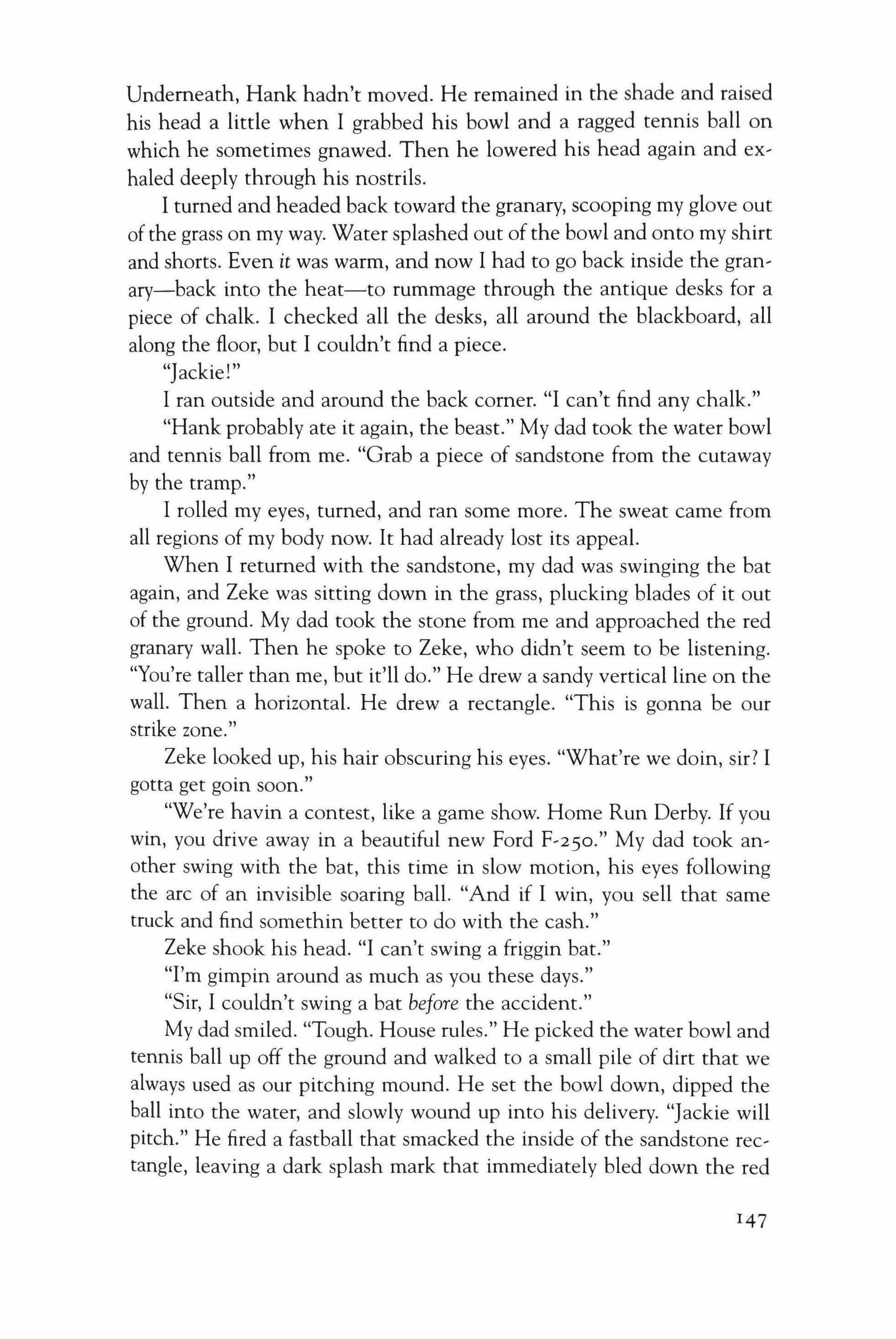
Underneath, Hank hadn't moved. He remained in the shade and raised his head a little when I grabbed his bowl and a ragged tennis ball on which he sometimes gnawed. Then he lowered his head again and ex, haled deeply through his nostrils.
I turned and headed back toward the granary, scooping my glove out ofthe grass on my way. Water splashed out ofthe bowl and onto my shirt and shorts. Even it was warm, and now I had to go back inside the gran, ary-back into the heat-to rummage through the antique desks for a piece of chalk. I checked all the desks, all around the blackboard, all along the floor, but I couldn't find a piece.
"Jackie!"
I ran outside and around the back comer. "I can't find any chalk."
"Hank probably ate it again, the beast." My dad took the water bowl and tennis ball from me. "Grab a piece of sandstone from the cutaway by the tramp."
I rolled my eyes, turned, and ran some more. The sweat carne from all regions of my body now. It had already lost its appeal.
When I returned with the sandstone, my dad was swinging the bat again, and Zeke was sitting down in the grass, plucking blades of it out of the ground. My dad took the stone from me and approached the red granary wall. Then he spoke to Zeke, who didn't seem to be listening. "You're taller than me, but it'll do." He drew a sandy vertical line on the wall. Then a horizontal. He drew a rectangle. "This is gonna be our strike zone."
Zeke looked up, his hair obscuring his eyes. "What're we doin, sir? I gotta get gain soon."
"We're havin a contest, like a game show. Horne Run Derby. If you win, you drive away in a beautiful new Ford F'250." My dad took an, other swing with the bat, this time in slow motion, his eyes following the arc of an invisible soaring ball. "And if I win, you sell that same truck and find somethin better to do with the cash."
Zeke shook his head. "I can't swing a friggin bat."
"I'm gimpin around as much as you these days."
"Sir, I couldn't swing a bat before the accident."
My dad smiled. "Tough. House rules." He picked the water bowl and tennis ball up off the ground and walked to a small pile of dirt that we always used as our pitching mound. He set the bowl down, dipped the ball into the water, and slowly wound up into his delivery. "Jackie will pitch." He fired a fastball that smacked the inside of the sandstone rectangle, leaving a dark splash mark that immediately bled down the red
147

wall. "We get three swings each. Whoever hits a pitch over the barbed wire and into the cow pasture the farthest wins. You don't have to swing if it's out of the strike zone, but if the ball hits the wall and there's a big wet spot there in the square, it's an out. So look sharp."
Zeke stood up, wiping grass off his jean shorts and shaking his head again.
My dad handed him the bat. "Like in any ball game, the visitor's up first."
Zeke limped over to the granary, lazily swinging the bat with one hand at a grasshopper that fluttered in front of his path. "This is bogus."
"You wanna Indian leg wrestle instead?"
I slipped my glove over my left hand. The leather was hot, inside and out. Zeke now stood beside the rectangle in one of the worst stances I'd ever seen. His knees weren't bent, he leaned slightly backward, and the bat hung loosely in his grip.
My dad stepped out of the way. "Nice and easy, Jackie. No heat."
I dipped the ball into the water and went into my motion. I tried to take the whole scenario seriously, but the sight of Zeke made it tough.
His at-bat was an exercise in apathy. He didn't swing at my first pitch, and the ball left a magnificent splatter mark within the rectangle.
"One out," said my dad. He was smiling in a way that was uncomfortable to watch.
Zeke swung wearily at my second pitch, but by the time he reacted the ball had already hit the wall and was rolling in the grass.
"That's two," said my dad. "Come on, Zeke. There's thousands of dollars on the line here."
"I didn't agree to anything." He gripped the bat tightly this time. His eyes focused firmly on me as I delivered the third pitch. And though he took a serious cut at it, he still missed, the momentum of his swing twisting his legs up. He flipped the bat end-over-end and then rubbed his knee. "Bogus."
"And that makes three," said my dad. He sounded disappointed. There was no challenge left. At this point he could have bunted and technically won the contest. But as he picked up the bat and walked to the sandstone rectangle, I knew he wasn't thinking about the truck or the money or the loan anymore. He was thinking about AA ball in Birmingham, being a teenager, and hitting four-hundred-foot blasts like no other pitcher in the league.
As he stepped up to the invisible plate and gripped the bat, he looked again like the Marine after his PIT, flexing muscles for my mom
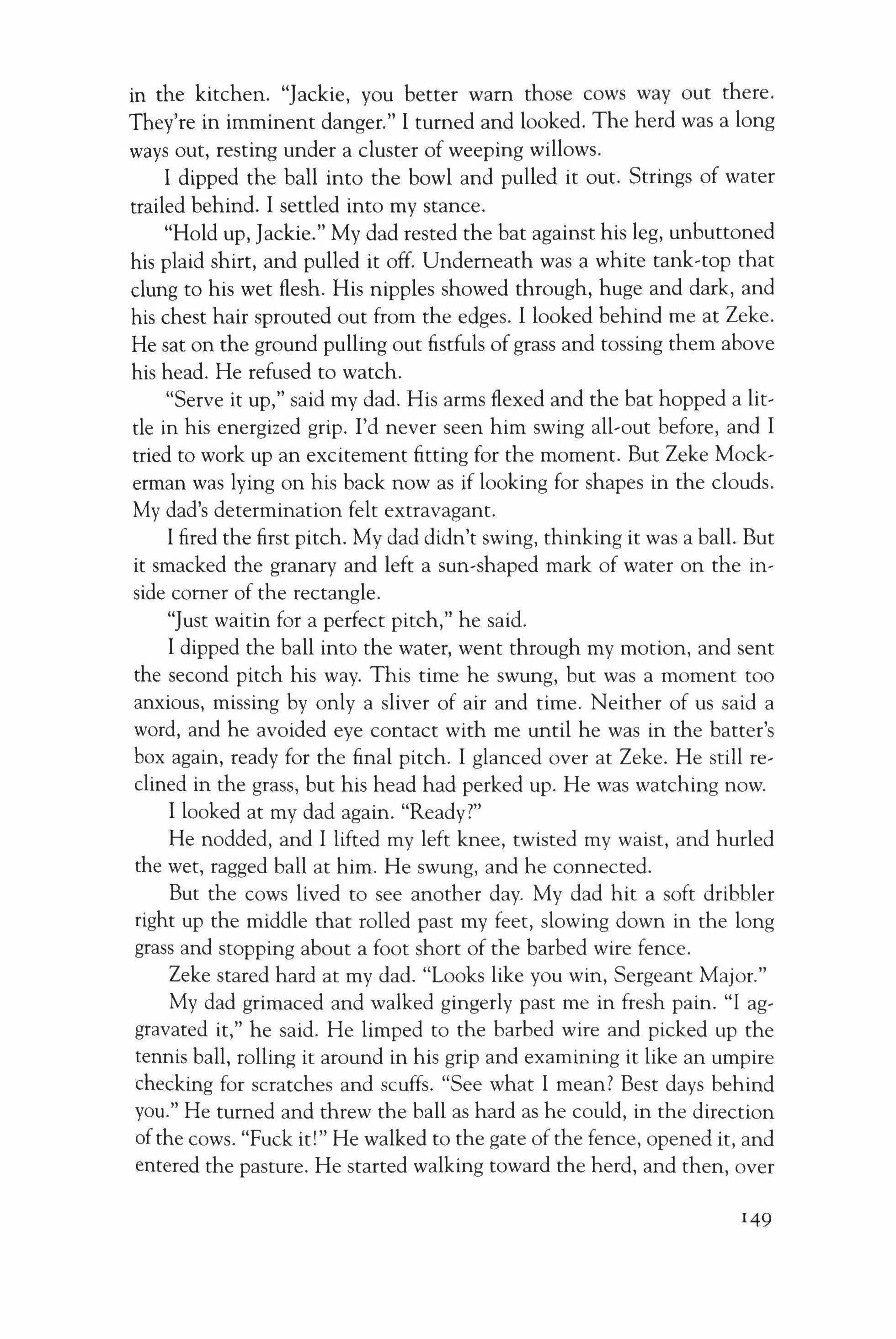
in the kitchen. "Jackie, you better warn those cows way out there. They're in imminent danger." I turned and looked. The herd was a long ways out, resting under a cluster of weeping willows.
I dipped the ball into the bowl and pulled it out. Strings of water trailed behind. I settled into my stance.
"Hold up, Jackie." My dad rested the bat against his leg, unbuttoned his plaid shirt, and pulled it off. Underneath was a white tank-top that clung to his wet flesh. His nipples showed through, huge and dark, and his chest hair sprouted out from the edges. I looked behind me at Zeke. He sat on the ground pulling out fistfuls of grass and tossing them above his head. He refused to watch.
"Serve it up," said my dad. His arms flexed and the bat hopped a little in his energized grip. I'd never seen him swing all-out before, and I tried to work up an excitement fitting for the moment. But Zeke Mockerman was lying on his back now as if looking for shapes in the clouds. My dad's determination felt extravagant.
I fired the first pitch. My dad didn't swing, thinking it was a ball. But it smacked the granary and left a sun-shaped mark of water on the inside corner of the rectangle.
"Just waitin for a perfect pitch," he said.
I dipped the ball into the water, went through my motion, and sent the second pitch his way. This time he swung, but was a moment too anxious, missing by only a sliver of air and time. Neither of us said a word, and he avoided eye contact with me until he was in the batter's box again, ready for the final pitch. I glanced over at Zeke. He still reclined in the grass, but his head had perked up. He was watching now.
I looked at my dad again. "Ready?"
He nodded, and I lifted my left knee, twisted my waist, and hurled the wet, ragged ball at him. He swung, and he connected.
But the cows lived to see another day. My dad hit a soft dribbler right up the middle that rolled past my feet, slowing down in the long grass and stopping about a foot short of the barbed wire fence.
Zeke stared hard at my dad. "Looks like you win, Sergeant Major."
My dad grimaced and walked gingerly past me in fresh pain. "I aggravated it," he said. He limped to the barbed wire and picked up the tennis ball, rolling it around in his grip and examining it like an umpire checking for scratches and scuffs. "See what I mean? Best days behind you." He turned and threw the ball as hard as he could, in the direction ofthe cows. "Fuck it!" He walked to the gate of the fence, opened it, and entered the pasture. He started walking toward the herd, and then, over
149
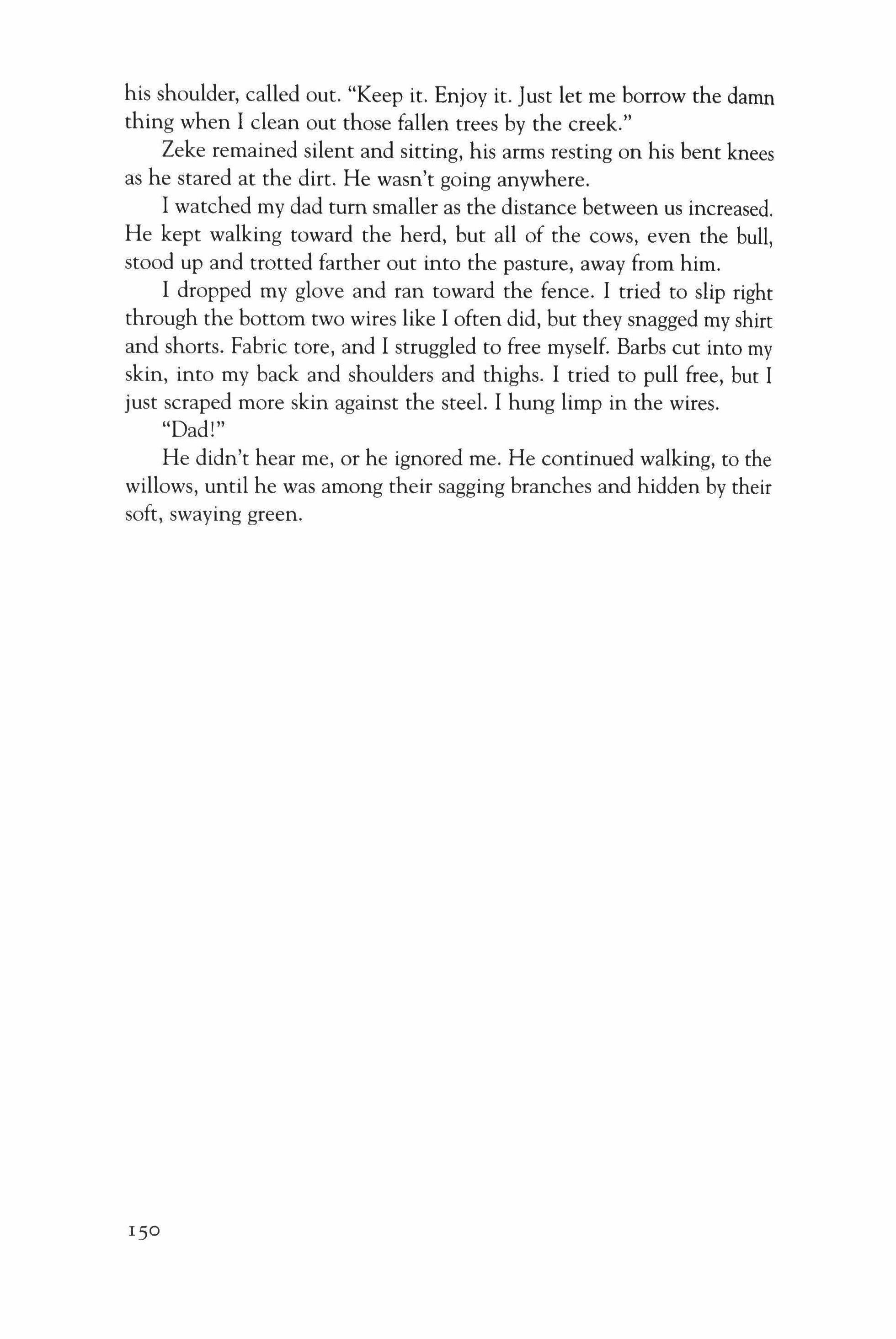
his shoulder, called out. "Keep it. Enjoy it. Just let me borrow the damn thing when I clean out those fallen trees by the creek."
Zeke remained silent and sitting, his arms resting on his bent knees as he stared at the dirt. He wasn't going anywhere.
I watched my dad tum smaller as the distance between us increased. He kept walking toward the herd, but all of the cows, even the bull, stood up and trotted farther out into the pasture, away from him.
I dropped my glove and ran toward the fence. I tried to slip right through the bottom two wires like I often did, but they snagged my shirt and shorts. Fabric tore, and I struggled to free myself. Barbs cut into my skin, into my back and shoulders and thighs. I tried to pull free, but I just scraped more skin against the steel. I hung limp in the wires.
"Dad!"
He didn't hear me, or he ignored me. He continued walking, to the willows, until he was among their sagging branches and hidden by their soft, swaying green.
Carolyn Alessio
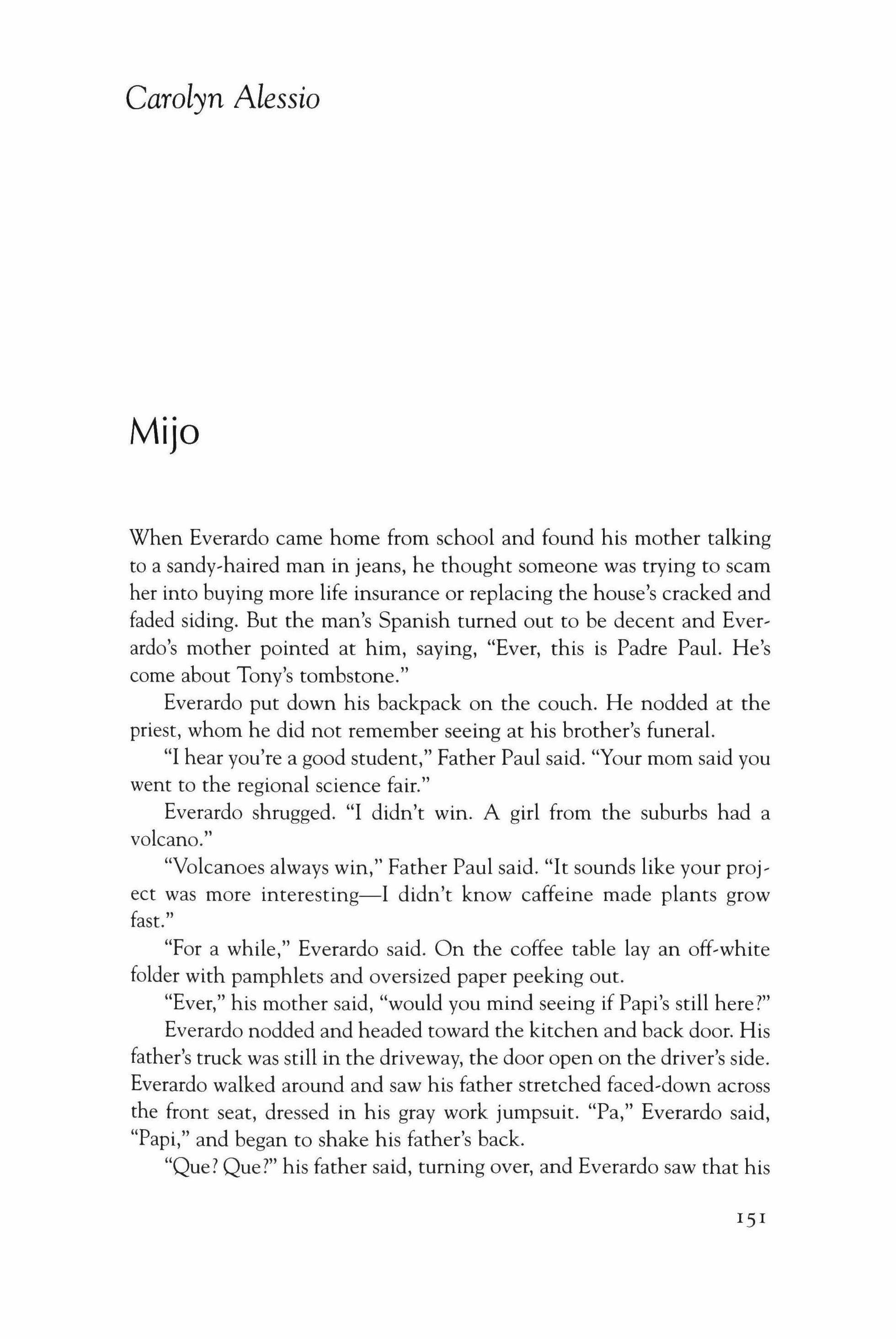
Mijo
When Everardo came home from school and found his mother talking to a sandy-haired man in jeans, he thought someone was trying to scam her into buying more life insurance or replacing the house's cracked and faded siding. But the man's Spanish turned out to be decent and Everardo's mother pointed at him, saying, "Ever, this is Padre Paul. He's come about Tony's tombstone."
Everardo put down his backpack on the couch. He nodded at the priest, whom he did not remember seeing at his brother's funeral.
"I hear you're a good student," Father Paul said. "Your mom said you went to the regional science fair."
Everardo shrugged. "I didn't win. A girl from the suburbs had a volcano."
"Volcanoes always win," Father Paul said. "It sounds like your project was more interesting-I didn't know caffeine made plants grow fast."
"For a while," Everardo said. On the coffee table lay an off-white folder with pamphlets and oversized paper peeking out.
"Ever," his mother said, "would you mind seeing if Papi's still here?"
Everardo nodded and headed toward the kitchen and back door. His father's truck was still in the driveway, the door open on the driver's side. Everardo walked around and saw his father stretched faced-down across the front seat, dressed in his gray work jumpsuit. "Pa," Everardo said, "Papi," and began to shake his father's back.
"Que? Que?" his father said, turning over, and Everardo saw that his
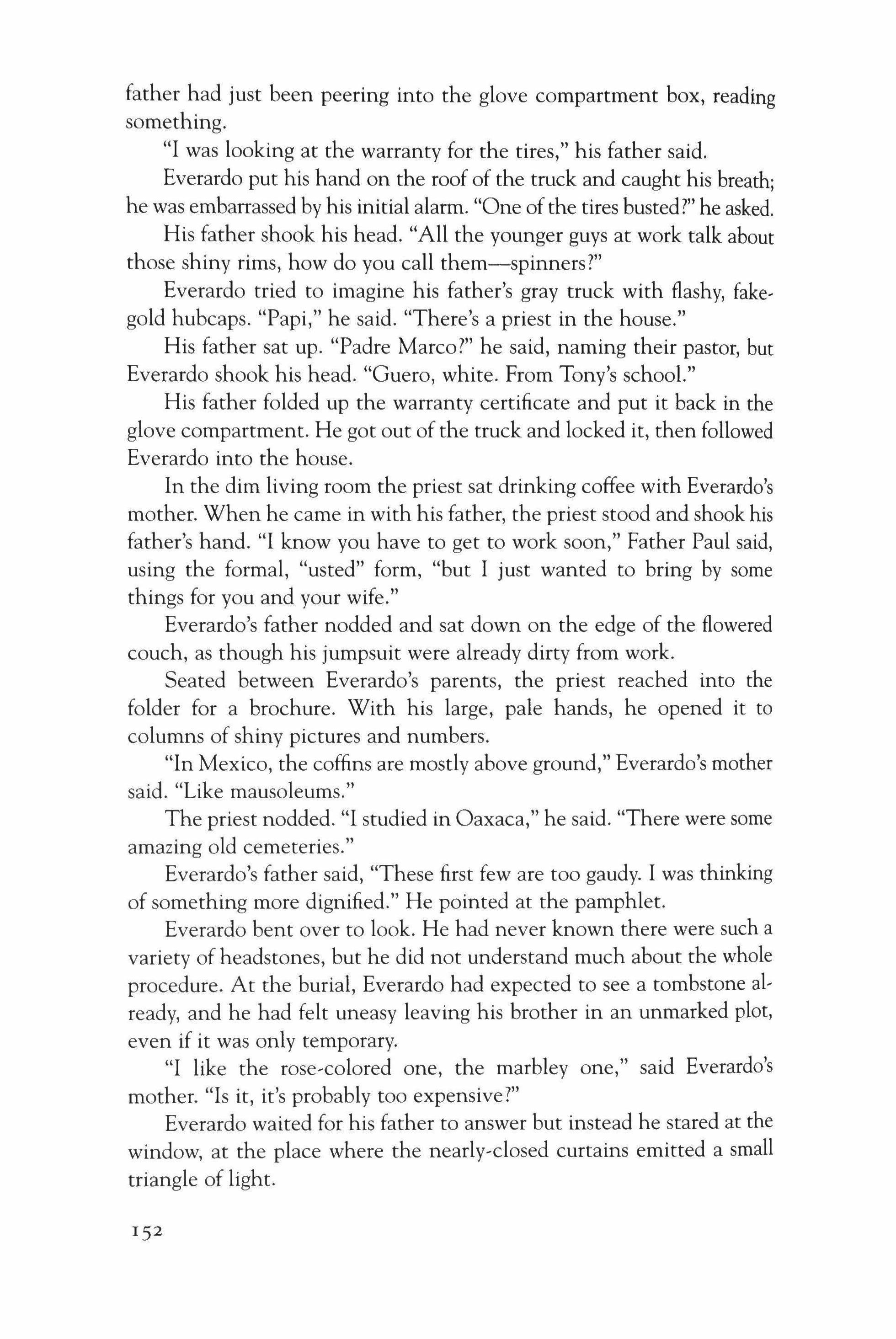
father had just been peering into the glove compartment box, reading something.
"I was looking at the warranty for the tires," his father said.
Everardo put his hand on the roof of the truck and caught his breath; he was embarrassed by his initial alarm. "One ofthe tires busted?" he asked. His father shook his head. "All the younger guys at work talk about those shiny rims, how do you call them-spinners?"
Everardo tried to imagine his father's gray truck with flashy, fakegold hubcaps. "Papi," he said. "There's a priest in the house."
His father sat up. "Padre Marco?" he said, naming their pastor, but Everardo shook his head. "Guero, white. From Tony's school."
His father folded up the warranty certificate and put it back in the glove compartment. He got out of the truck and locked it, then followed Everardo into the house.
In the dim living room the priest sat drinking coffee with Everardo's mother. When he came in with his father, the priest stood and shook his father's hand. "I know you have to get to work soon," Father Paul said, using the formal, "usted" form, "but I just wanted to bring by some things for you and your wife."
Everardo's father nodded and sat down on the edge of the flowered couch, as though his jumpsuit were already dirty from work.
Seated between Everardo's parents, the priest reached into the folder for a brochure. With his large, pale hands, he opened it to columns of shiny pictures and numbers.
"In Mexico, the coffins are mostly above ground," Everardo's mother said. "Like mausoleums."
The priest nodded. "I studied in Oaxaca," he said. "There were some amazing old cemeteries."
Everardo's father said, "These first few are too gaudy. I was thinking of something more dignified." He pointed at the pamphlet.
Everardo bent over to look. He had never known there were such a variety of headstones, but he did not understand much about the whole procedure. At the burial, Everardo had expected to see a tombstone already, and he had felt uneasy leaving his brother in an unmarked plot, even if it was only temporary.
"I like the rose-colored one, the marbley one," said Everardo's mother. "Is it, it's probably too expensive?"
Everardo waited for his father to answer but instead he stared at the window, at the place where the nearly-closed curtains emitted a small triangle of light.
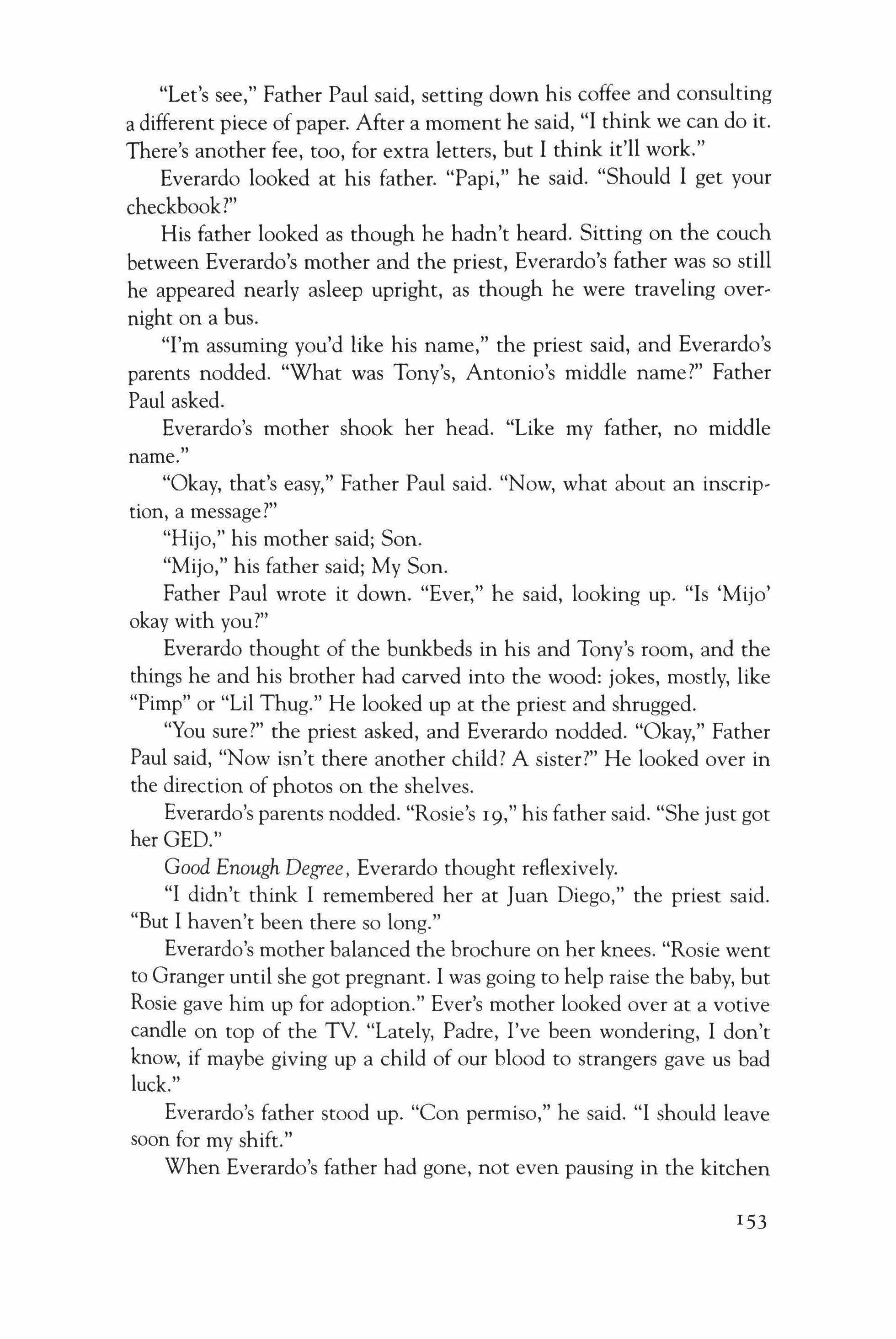
"Let's see," Father Paul said, setting down his coffee and consulting a different piece of paper. After a moment he said, "I think we can do it. There's another fee, too, for extra letters, but I think it'll work."
Everardo looked at his father. "Papi," he said. "Should I get your checkbook?"
His father looked as though he hadn't heard. Sitting on the couch between Everardo's mother and the priest, Everardo's father was so still he appeared nearly asleep upright, as though he were traveling over, night on a bus.
"I'm assuming you'd like his name," the priest said, and Everardo's parents nodded. "What was Tony's, Antonio's middle name?" Father Paul asked.
Everardo's mother shook her head. "Like my father, no middle name."
"Okay, that's easy," Father Paul said. "Now, what about an inscription, a message?"
"Hijo,' his mother said; Son.
"Mijo," his father said; My Son.
Father Paul wrote it down. "Ever," he said, looking up. "Is 'Mijo' okay with you?"
Everardo thought of the bunkbeds in his and Tony's room, and the things he and his brother had carved into the wood: jokes, mostly, like "Pimp" or "Lil Thug." He looked up at the priest and shrugged.
"You sure?" the priest asked, and Everardo nodded. "Okay," Father Paul said, "Now isn't there another child? A sister?" He looked over in the direction of photos on the shelves.
Everardo's parents nodded. "Rosie's 19," his father said. "She just got her GED."
Good Enough Degree, Everardo thought reflexively.
"I didn't think I remembered her at Juan Diego," the priest said. "But I haven't been there so long."
Everardo's mother balanced the brochure on her knees. "Rosie went to Granger until she got pregnant. I was going to help raise the baby, but Rosie gave him up for adoption." Ever's mother looked over at a votive candle on top of the TV. "Lately, Padre, I've been wondering, I don't know, if maybe giving up a child of our blood to strangers gave us bad luck."
Everardo's father stood up. "Con permiso," he said. "I should leave soon for my shift."
When Everardo's father had gone, not even pausing in the kitchen
153
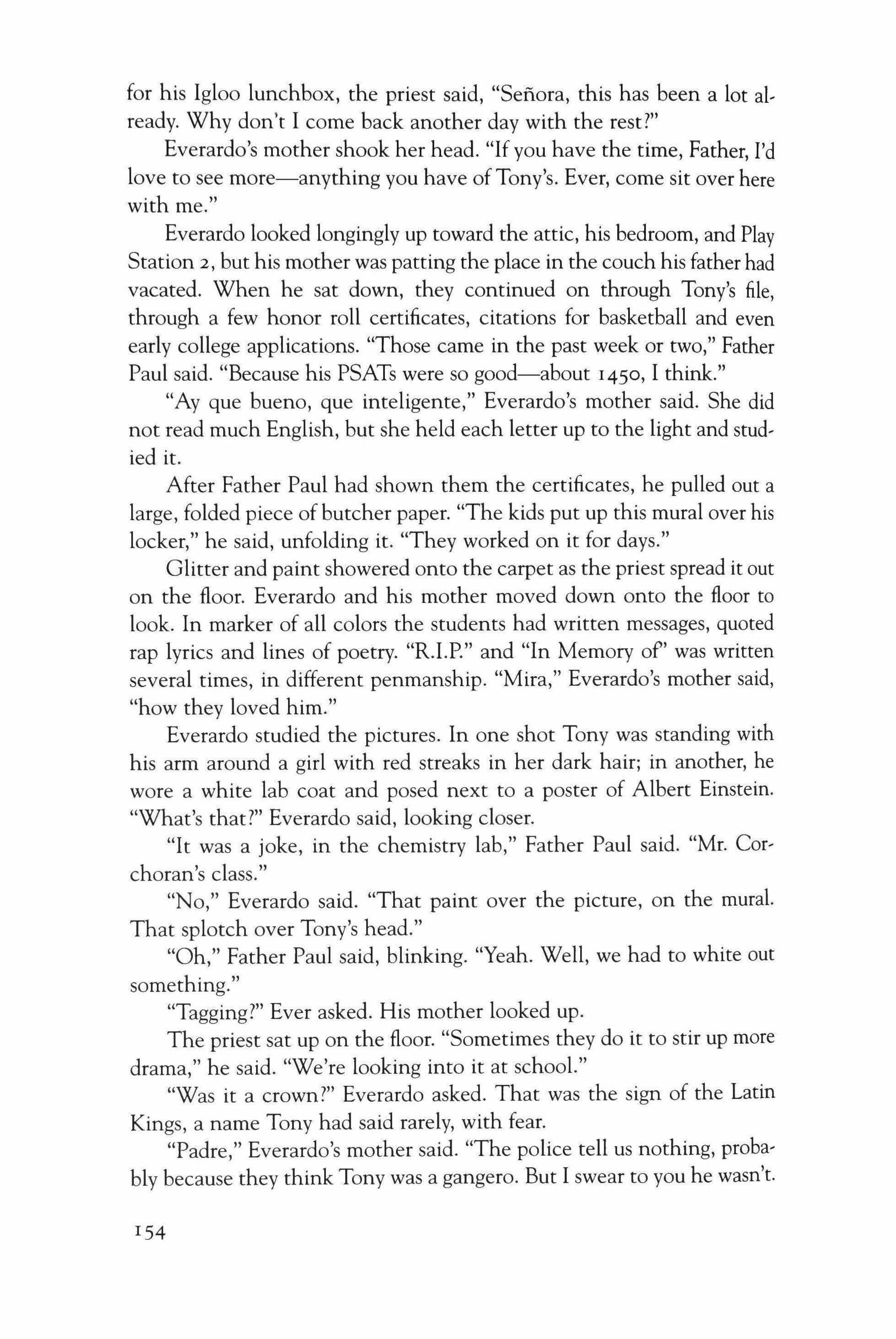
for his Igloo lunchbox, the priest said, "Senora, this has been a lot already. Why don't I come back another day with the rest?"
Everardo's mother shook her head. "If you have the time, Father, I'd love to see more-anything you have of Tony's. Ever, come sit over here with me."
Everardo looked longingly up toward the attic, his bedroom, and Play Station 2, but his mother was patting the place in the couch his father had vacated. When he sat down, they continued on through Tony's file, through a few honor roll certificates, citations for basketball and even early college applications. "Those came in the past week or two," Father Paul said. "Because his PSATs were so good-about 1450, I think."
"Ay que bueno, que inteligente," Everardo's mother said. She did not read much English, but she held each letter up to the light and studied it.
After Father Paul had shown them the certificates, he pulled out a large, folded piece of butcher paper. "The kids put up this mural over his locker," he said, unfolding it. "They worked on it for days."
Glitter and paint showered onto the carpet as the priest spread it out on the floor. Everardo and his mother moved down onto the floor to look. In marker of all colors the students had written messages, quoted rap lyrics and lines of poetry. "R.I.P." and "In Memory of' was written several times, in different penmanship. "Mira," Everardo's mother said, "how they loved him."
Everardo studied the pictures. In one shot Tony was standing with his arm around a girl with red streaks in her dark hair; in another, he wore a white lab coat and posed next to a poster of Albert Einstein. "What's that?" Everardo said, looking closer.
"It was a joke, in the chemistry lab," Father Paul said. "Mr. Corchoran's class."
"No," Everardo said. "That paint over the picture, on the muraL That splotch over Tony's head."
"Oh," Father Paul said, blinking. "Yeah. Well, we had to white out something."
"Tagging?" Ever asked. His mother looked up.
The priest sat up on the floor. "Sometimes they do it to stir up more drama," he said. "We're looking into it at school."
"Was it a crown?" Everardo asked. That was the sign of the Latin Kings, a name Tony had said rarely, with fear.
"Padre," Everardo's mother said. "The police tell us nothing, probably because they think Tony was a gangero. But I swear to you he wasn't.
154
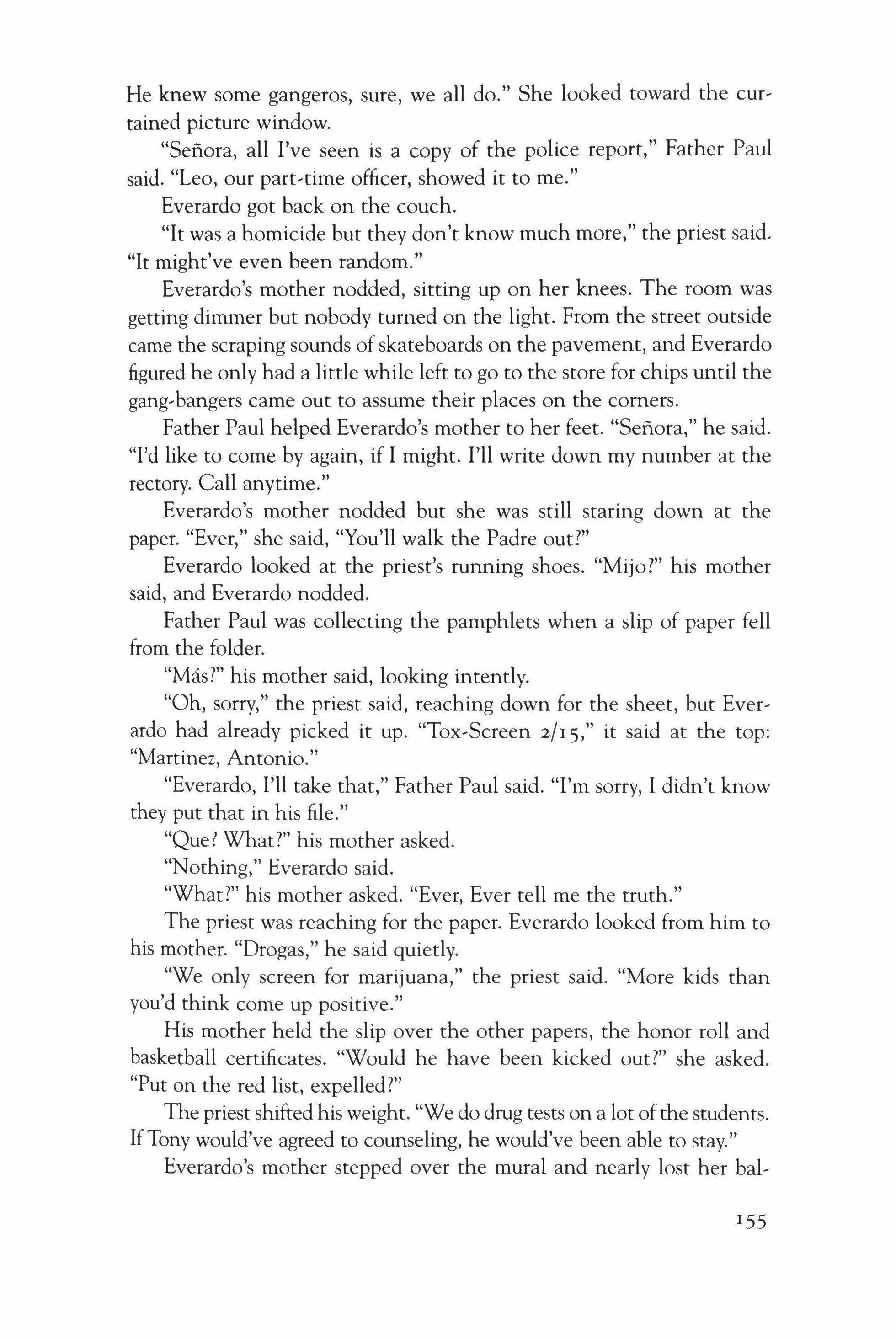
He knew some gangeros, sure, we all do." She looked toward the cur' tained picture window.
"Senora, all I've seen is a copy of the police report," Father Paul said. "Leo, our part-time officer, showed it to me."
Everardo got back on the couch.
"It was a homicide but they don't know much more," the priest said. "It might've even been random."
Everardo's mother nodded, sitting up on her knees. The room was getting dimmer but nobody turned on the light. From the street outside came the scraping sounds ofskateboards on the pavement, and Everardo figured he only had a little while left to go to the store for chips until the gang-bangers came out to assume their places on the comers.
Father Paul helped Everardo's mother to her feet. "Se:fi.ora," he said. "I'd like to come by again, if I might. I'll write down my number at the rectory. Call anytime."
Everardo's mother nodded but she was still staring down at the paper. "Ever," she said, "You'll walk the Padre out?"
Everardo looked at the priest's running shoes. "Mijo?" his mother said, and Everardo nodded.
Father Paul was collecting the pamphlets when a slip of paper fell from the folder.
"Mas?" his mother said, looking intently.
"Oh, sorry," the priest said, reaching down for the sheet, but Ever, ardo had already picked it up. "Tox-Screen 2/15," it said at the top: "Martinez, Antonio."
"Everardo, I'll take that," Father Paul said. "I'm sorry, I didn't know they put that in his file."
"Que? What?" his mother asked.
"Nothing," Everardo said.
"What?" his mother asked. "Ever, Ever tell me the truth."
The priest was reaching for the paper. Everardo looked from him to his mother. "Drogas," he said quietly.
"We only screen for marijuana," the priest said. "More kids than you'd think come up positive."
His mother held the slip over the other papers, the honor roll and basketball certificates. "Would he have been kicked out?" she asked. "Put on the red list, expelled?"
The priest shifted his weight. "We do drug tests on a lot ofthe students. IfTony would've agreed to counseling, he would've been able to stay."
Everardo's mother stepped over the mural and nearly lost her bal-
155
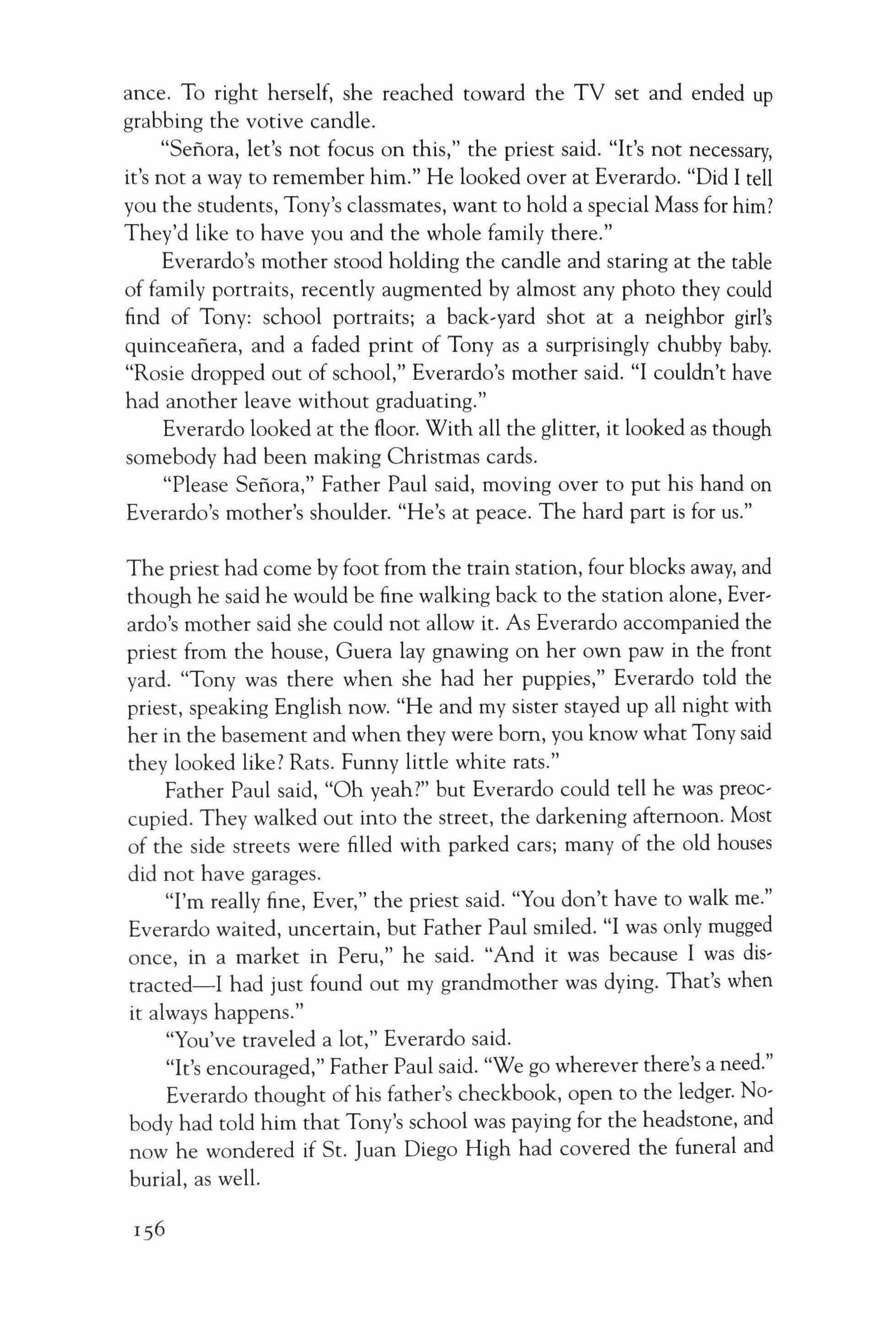
ance. To right herself, she reached toward the TV set and ended up grabbing the votive candle.
"Senora, let's not focus on this," the priest said. "It's not necessary, it's not a way to remember him." He looked over at Everardo. "Did I tell you the students, Tony's classmates, want to hold a special Mass for him? They'd like to have you and the whole family there."
Everardo's mother stood holding the candle and staring at the table of family portraits, recently augmented by almost any photo they could find of Tony: school portraits; a back-yard shot at a neighbor girl's quinceafiera, and a faded print of Tony as a surprisingly chubby baby. "Rosie dropped out of school," Everardo's mother said. "I couldn't have had another leave without graduating."
Everardo looked at the floor. With all the glitter, it looked as though somebody had been making Christmas cards.
"Please Senora," Father Paul said, moving over to put his hand on Everardo's mother's shoulder. "He's at peace. The hard part is for us."
The priest had come by foot from the train station, four blocks away, and though he said he would be fine walking back to the station alone, Everardo's mother said she could not allow it. As Everardo accompanied the priest from the house, Guera lay gnawing on her own paw in the front yard. "Tony was there when she had her puppies," Everardo told the priest, speaking English now. "He and my sister stayed up all night with her in the basement and when they were born, you know what Tony said they looked like? Rats. Funny little white rats."
Father Paul said, "Oh yeah?" but Everardo could tell he was preoccupied. They walked out into the street, the darkening afternoon. Most of the side streets were filled with parked cars; many of the old houses did not have garages.
"I'm really fine, Ever," the priest said. "You don't have to walk me." Everardo waited, uncertain, but Father Paul smiled. "I was only mugged once, in a market in Peru," he said. "And it was because I was distracted-I had just found out my grandmother was dying. That's when it always happens."
"You've traveled a lot," Everardo said.
"It's encouraged," Father Paul said. "We go wherever there's a need."
Everardo thought of his father's checkbook, open to the ledger. Nobody had told him that Tony's school was paying for the headstone, and now he wondered if St. Juan Diego High had covered the funeral and burial, as well.
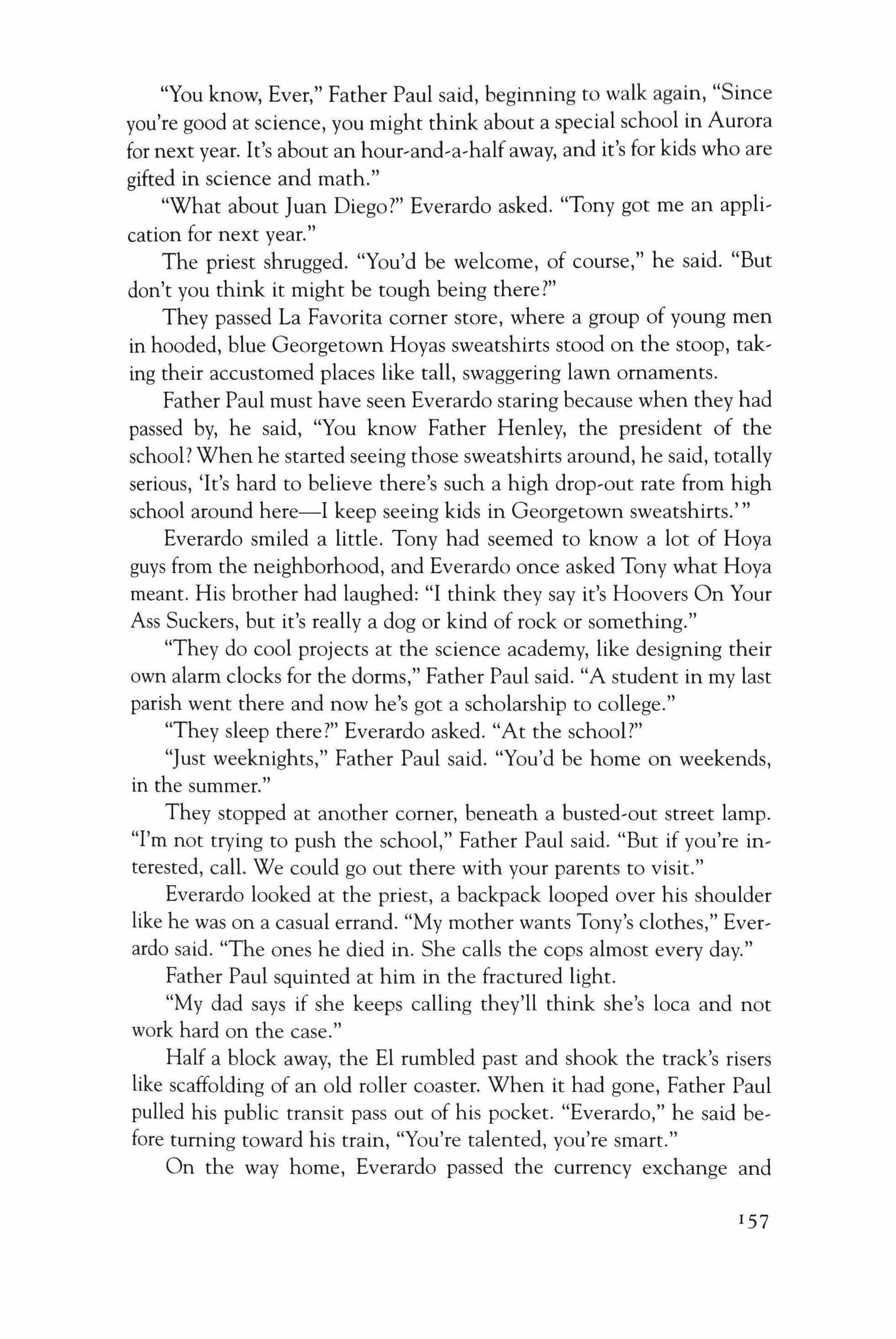
"You know, Ever," Father Paul said, beginning to walk again, "Since you're good at science, you might think about a special school in Aurora for next year. It's about an hour-and-a-half away, and it's for kids who are gifted in science and math."
"What about Juan Diego?" Everardo asked. "Tony got me an application for next year."
The priest shrugged. "You'd be welcome, of course," he said. "But don't you think it might be tough being there?"
They passed La Favorita comer store, where a group of young men in hooded, blue Georgetown Hoyas sweatshirts stood on the stoop, taking their accustomed places like tall, swaggering lawn ornaments.
Father Paul must have seen Everardo staring because when they had passed by, he said, "You know Father Henley, the president of the school? When he started seeing those sweatshirts around, he said, totally serious, 'It's hard to believe there's such a high drop-out rate from high school around here-I keep seeing kids in Georgetown sweatshirts.'''
Everardo smiled a little. Tony had seemed to know a lot of Hoya guys from the neighborhood, and Everardo once asked Tony what Hoya meant. His brother had laughed: "I think they say it's Hoovers On Your Ass Suckers, but it's really a dog or kind of rock or something."
"They do cool projects at the science academy, like designing their own alarm clocks for the dorms," Father Paul said. "A student in my last parish went there and now he's got a scholarship to college."
"They sleep there?" Everardo asked. "At the school?"
"Just weeknights," Father Paul said. "You'd be home on weekends, in the summer."
They stopped at another comer, beneath a busted-out street lamp. "I'm not trying to push the school," Father Paul said. "But if you're interested, call. We could go out there with your parents to visit."
Everardo looked at the priest, a backpack looped over his shoulder like he was on a casual errand. "My mother wants Tony's clothes," Everardo said. "The ones he died in. She calls the cops almost every day."
Father Paul squinted at him in the fractured light.
"My dad says if she keeps calling they'll think she's loca and not work hard on the case."
Half a block away, the EI rumbled past and shook the track's risers like scaffolding of an old roller coaster. When it had gone, Father Paul pulled his public transit pass out of his pocket. "Everardo," he said before turning toward his train, "You're talented, you're smart."
On the way home, Everardo passed the currency exchange and 157
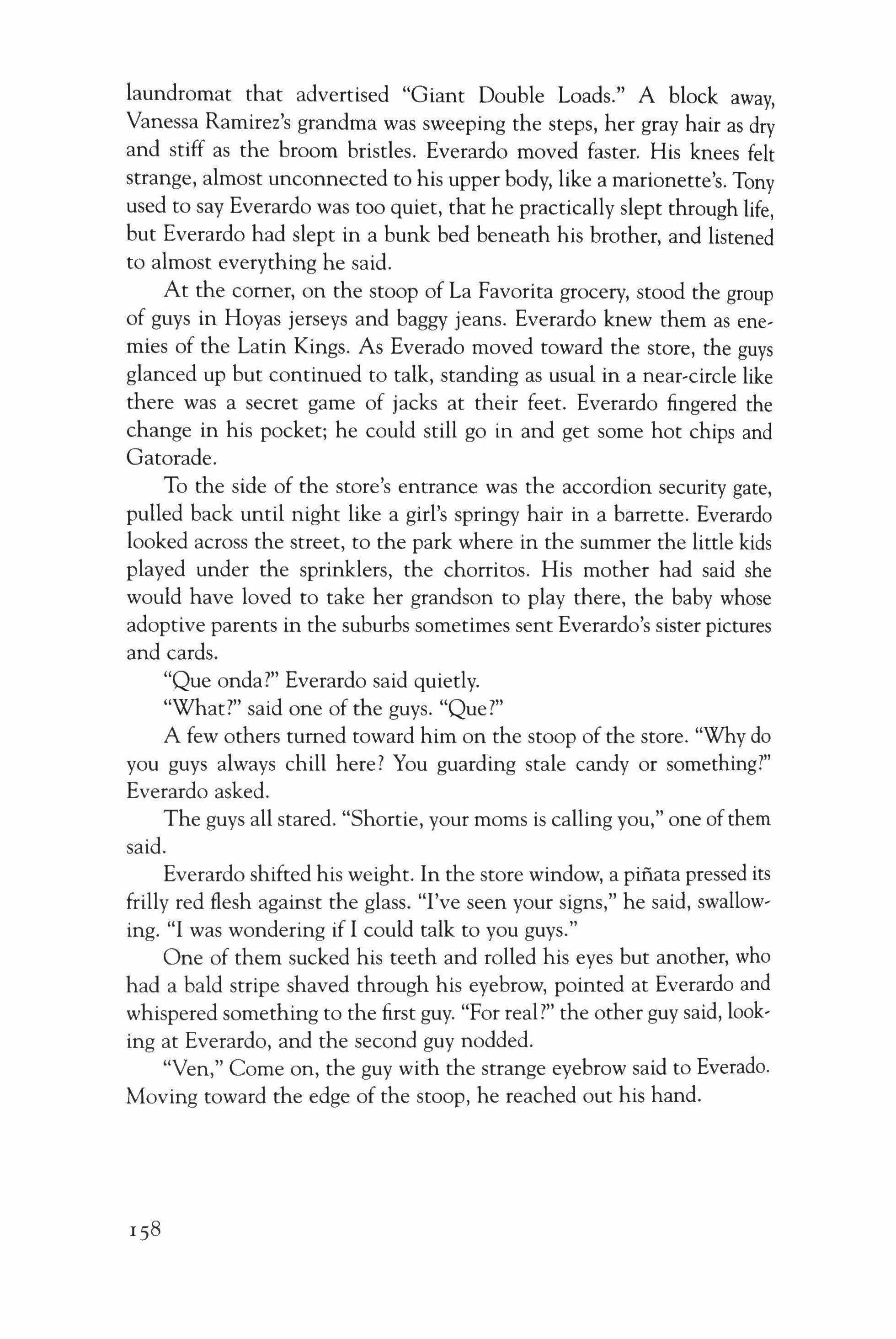
laundromat that advertised "Giant Double Loads." A block away, Vanessa Ramirez's grandma was sweeping the steps, her gray hair as dry and stiff as the broom bristles. Everardo moved faster. His knees felt strange, almost unconnected to his upper body, like a marionette's. Tony used to say Everardo was too quiet, that he practically slept through life, but Everardo had slept in a bunk bed beneath his brother, and listened to almost everything he said.
At the comer, on the stoop of La Favorita grocery, stood the group of guys in Hoyas jerseys and baggy jeans. Everardo knew them as enemies of the Latin Kings. As Everado moved toward the store, the guys glanced up but continued to talk, standing as usual in a near-circle like there was a secret game of jacks at their feet. Everardo fingered the change in his pocket; he could still go in and get some hot chips and Gatorade.
To the side of the store's entrance was the accordion security gate, pulled back until night like a girl's springy hair in a barrette. Everardo looked across the street, to the park where in the summer the little kids played under the sprinklers, the chorritos. His mother had said she would have loved to take her grandson to play there, the baby whose adoptive parents in the suburbs sometimes sent Everardo's sister pictures and cards.
"Que onda?" Everardo said quietly.
"What?" said one of the guys. "Que?"
A few others turned toward him on the stoop of the store. "Why do you guys always chill here? You guarding stale candy or something?" Everardo asked.
The guys all stared. "Shortie, your moms is calling you," one ofthem said.
Everardo shifted his weight. In the store window, a pinata pressed its frilly red flesh against the glass. "I've seen your signs," he said, swallowing. "I was wondering if I could talk to you guys."
One of them sucked his teeth and rolled his eyes but another, who had a bald stripe shaved through his eyebrow, pointed at Everardo and whispered something to the first guy. "For real?" the other guy said, looking at Everardo, and the second guy nodded.
"Yen," Come on, the guy with the strange eyebrow said to Everado. Moving toward the edge of the stoop, he reached out his hand.
D. Redwood
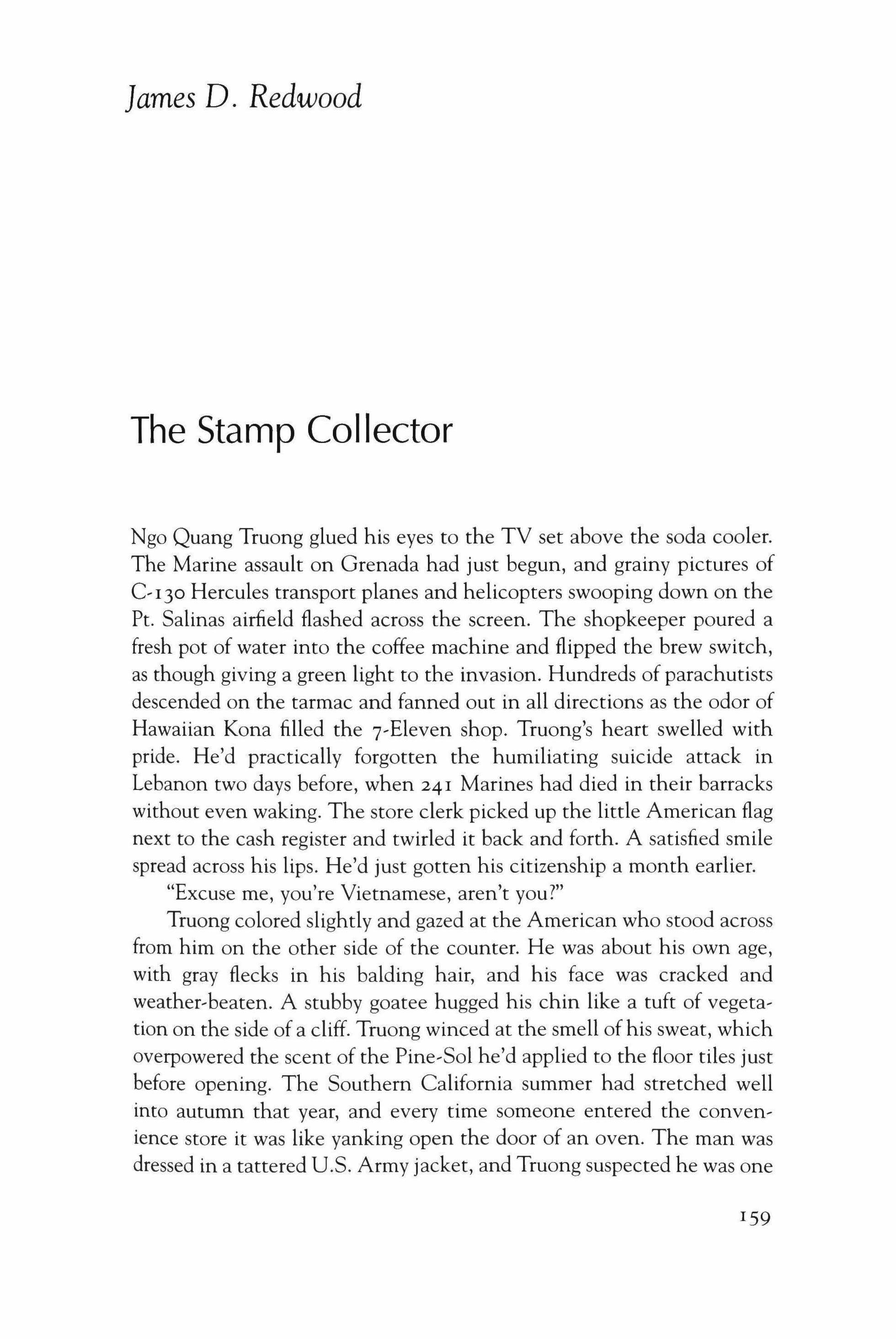
The Stamp Collector
Ngo Quang Truong glued his eyes to the TV set above the soda cooler. The Marine assault on Grenada had just begun, and grainy pictures of C-130 Hercules transport planes and helicopters swooping down on the Pt. Salinas airfield flashed across the screen. The shopkeeper poured a fresh pot of water into the coffee machine and flipped the brew switch, as though giving a green light to the invasion. Hundreds of parachutists descended on the tarmac and fanned out in all directions as the odor of Hawaiian Kona filled the 7-Eleven shop. Truong's heart swelled with pride. He'd practically forgotten the humiliating suicide attack in Lebanon two days before, when 241 Marines had died in their barracks without even waking. The store clerk picked up the little American flag next to the cash register and twirled it back and forth. A satisfied smile spread across his lips. He'd just gotten his citizenship a month earlier.
"Excuse me, you're Vietnamese, aren't you?"
Truong colored slightly and gazed at the American who stood across from him on the other side of the counter. He was about his own age, with gray flecks in his balding hair, and his face was cracked and weather-beaten. A stubby goatee hugged his chin like a tuft of vegetation on the side of a cliff. Truong winced at the smell of his sweat, which overpowered the scent of the Pine-Sol he'd applied to the floor tiles just before opening. The Southern California summer had stretched well into autumn that year, and every time someone entered the convenience store it was like yanking open the door of an oven. The man was dressed in a tattered u.S. Army jacket, and Truong suspected he was one
]
ames
159

of those unhappy veterans who drifted from place to place trying to escape their memories of the war. His war.
"Yes," he reluctantly admitted, his voice barely audible above the racket caused by the landing planes and helicopters. "I help you?"
The man nodded and reached into the pocket of his oil-stained jeans. He pulled out a letter and shoved it face up across the counter. Thuong em, it began. A love letter.
"I hope so," the American said. "I'd like you to translate this. I can pay."
He didn't look as though he could, but Truong picked the letter up nonetheless and read the first sentence. Darling, I will be true to you forever The paper was yellow, old, and brittle. The ink was of very poor quality, and had almost faded in spots. A North Vietnamese love letter.
"Where you get?" he asked.
The American glanced down at his feet, then up again. The hollows of his cheeks caved in as though he had trouble breathing.
"I got it off a man I killed. vc. I've had it for a long time, and-"
Just then the bell jangled above the door, and two boys in their early teens dashed into the 7-Eleven. Ngo Quang Truong's face darkened. The boys were riding skateboards, and the smaller one, Vi, Truong's nephew, had a Dodgers baseball cap reversed on his head. They popped in and out of the brightly-lit aisles stuffed with canned goods, snacks, and toiletries, skirted the bakery display and the ice cream freezer, and had almost made it to the magazine racks when Truong grabbed Vi's arm.
"You bad boy. No skateboard here! You know. Di ve. Hieu khong? Go home!"
The boy wiggled out of Truong's grasp and squared off in front of him. He jacked his skateboard up onto his arm. His friend kept going.
"It's a free country, Uncle! Remember? The U.S. of A!"
Truong lunged for him again, but Vi ducked behind a potato chip rack. The store clerk scowled at him.
"Bad boy, I say. Your mother no like."
"Your mother no like," Vi teased, from the safety of his shelter.
"Doesn't, Uncle. Or won't."
Truong's face went hot with embarrassment. Out ofthe comer ofhis eye, he spotted the other boy, Jimmy, stretching on tiptoes toward the top shelfof the magazine section, where the shopkeeper kept the shrinkwrapped Playboys and Penthouses. Truong bounded toward him, waving his arms about.
160
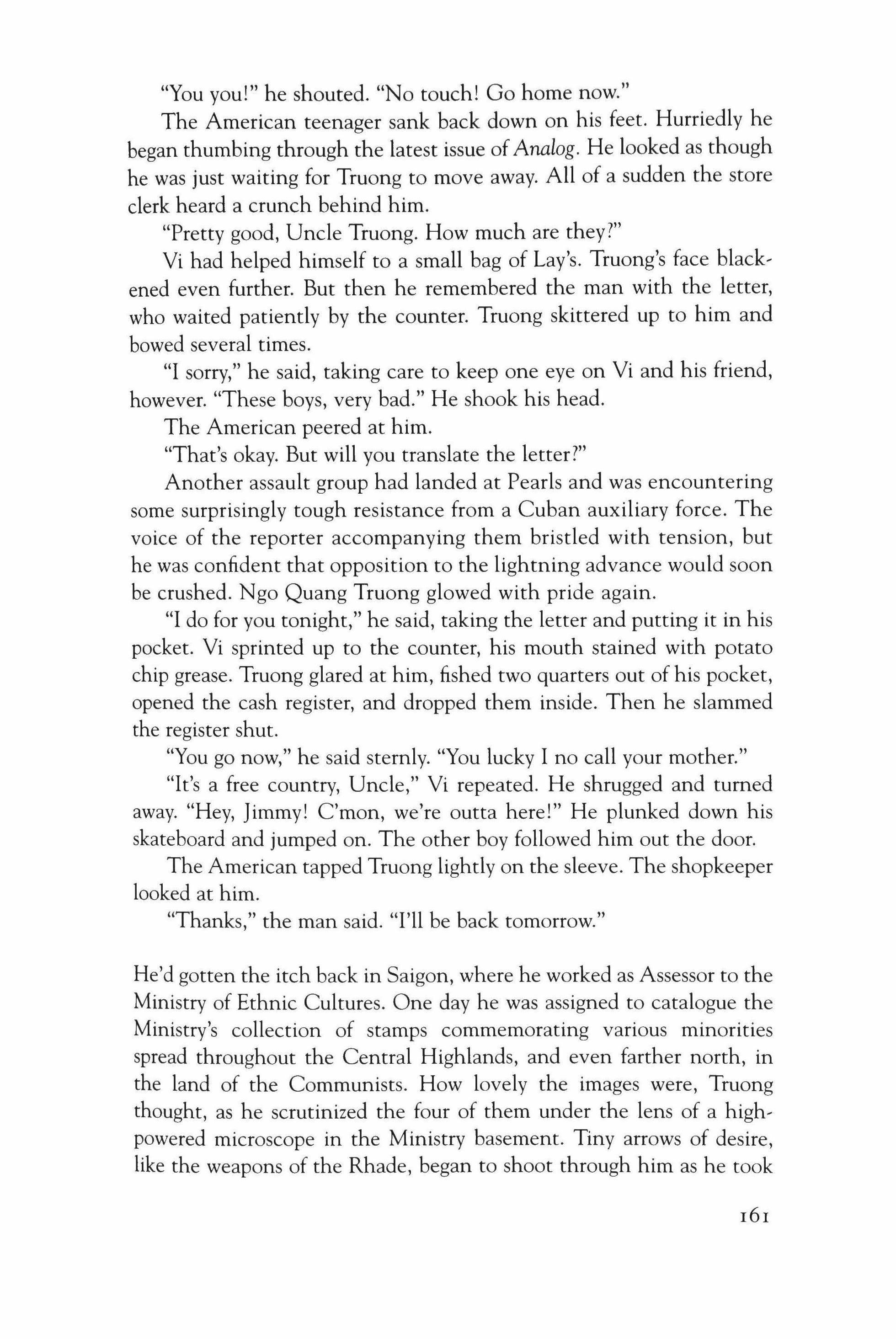
"You you!" he shouted. "No touch! Go home now."
The American teenager sank back down on his feet. Hurriedly he began thumbing through the latest issue ofAnalog. He looked as though he was just waiting for Truong to move away. All of a sudden the store clerk heard a crunch behind him.
"Pretty good, Uncle Truong. How much are they?"
Vi had helped himself to a small bag of Lay's. Truong's face blackened even further. But then he remembered the man with the letter, who waited patiently by the counter. Truong skittered up to him and bowed several times.
"I sorry," he said, taking care to keep one eye on Vi and his friend, however. "These boys, very bad." He shook his head.
The American peered at him.
"That's okay. But will you translate the letter?"
Another assault group had landed at Pearls and was encountering some surprisingly tough resistance from a Cuban auxiliary force. The voice of the reporter accompanying them bristled with tension, but he was confident that opposition to the lightning advance would soon be crushed. Ngo Quang Truong glowed with pride again.
"I do for you tonight," he said, taking the letter and putting it in his pocket. Vi sprinted up to the counter, his mouth stained with potato chip grease. Truong glared at him, fished two quarters out of his pocket, opened the cash register, and dropped them inside. Then he slammed the register shut.
"You go now," he said sternly. "You lucky I no call your mother."
"It's a free country, Uncle," Vi repeated. He shrugged and turned away. "Hey, Jimmy! C'mon, we're outta here!" He plunked down his skateboard and jumped on. The other boy followed him out the door.
The American tapped Truong lightly on the sleeve. The shopkeeper looked at him.
"Thanks," the man said. "I'll be back tomorrow."
He'd gotten the itch back in Saigon, where he worked as Assessor to the Ministry of Ethnic Cultures. One day he was assigned to catalogue the Ministry's collection of stamps commemorating various minorities spread throughout the Central Highlands, and even farther north, in the land of the Communists. How lovely the images were, Truong thought, as he scrutinized the four of them under the lens of a highpowered microscope in the Ministry basement. Tiny arrows of desire, like the weapons of the Rhade, began to shoot through him as he took
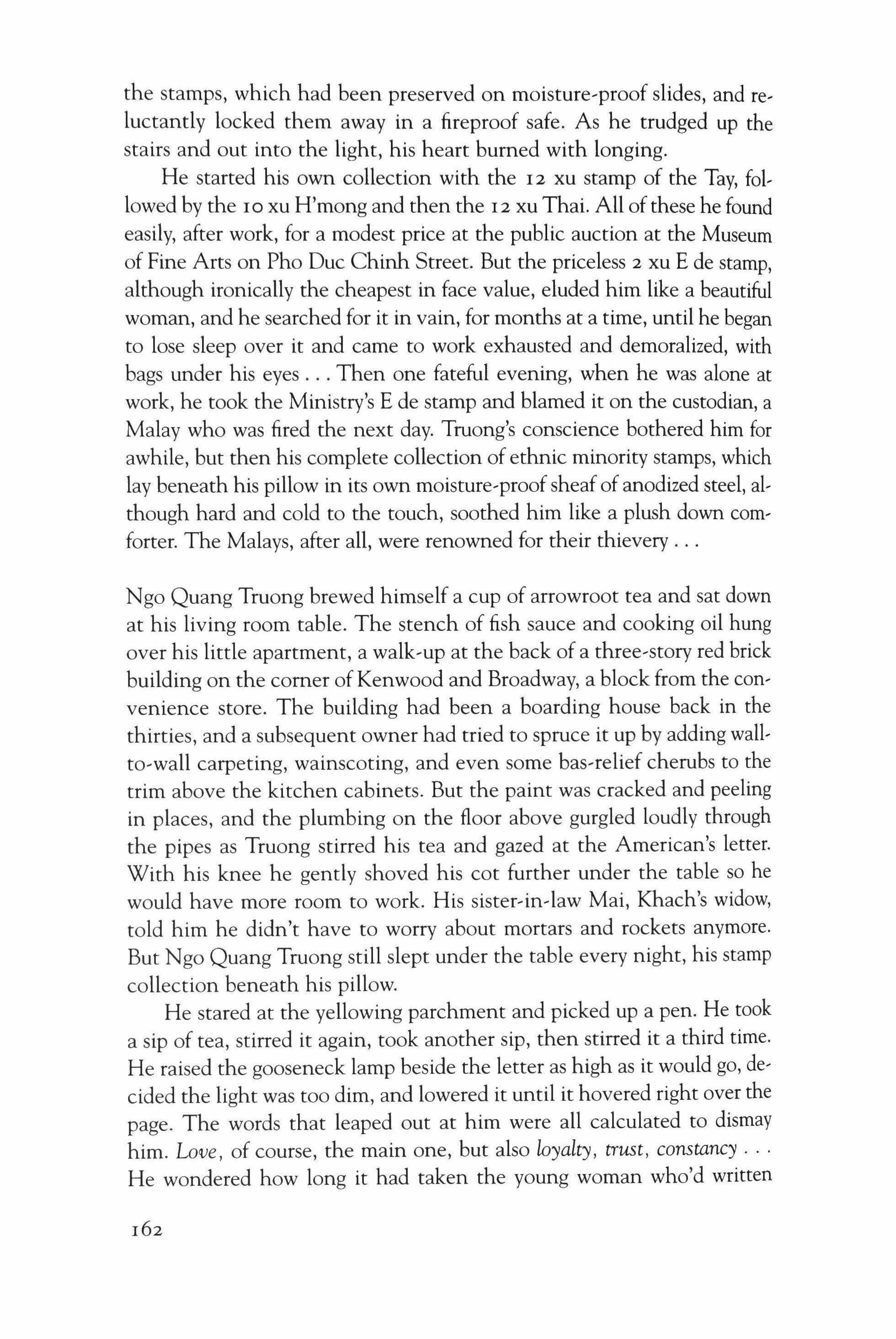
the stamps, which had been preserved on moisture-proof slides, and reluctantly locked them away in a fireproof safe. As he trudged up the stairs and out into the light, his heart burned with longing.
He started his own collection with the 12 xu stamp of the Tay, followed by the 10 xu H'mong and then the 12 xu Thai. All ofthese he found easily, after work, for a modest price at the public auction at the Museum of Fine Arts on Pho Duc Chinh Street. But the priceless 2 xu E de stamp, although ironically the cheapest in face value, eluded him like a beautiful woman, and he searched for it in vain, for months at a time, until he began to lose sleep over it and came to work exhausted and demoralized, with bags under his eyes
Then one fateful evening, when he was alone at work, he took the Ministry's E de stamp and blamed it on the custodian, a Malay who was fired the next day. Truong's conscience bothered him for awhile, but then his complete collection of ethnic minority stamps, which lay beneath his pillow in its own moisture-proof sheafof anodized steel, although hard and cold to the touch, soothed him like a plush down comforter. The Malays, after all, were renowned for their thievery
Ngo Quang Truong brewed himself a cup of arrowroot tea and sat down at his living room table. The stench of fish sauce and cooking oil hung over his little apartment, a walk-up at the back of a three-story red brick building on the corner of Kenwood and Broadway, a block from the convenience store. The building had been a boarding house back in the thirties, and a subsequent owner had tried to spruce it up by adding wallto-wall carpeting, wainscoting, and even some bas-relief cherubs to the trim above the kitchen cabinets. But the paint was cracked and peeling in places, and the plumbing on the floor above gurgled loudly through the pipes as Truong stirred his tea and gazed at the American's letter. With his knee he gently shoved his cot further under the table so he would have more room to work. His sister-in-law Mai, Khach's widow, told him he didn't have to worry about mortars and rockets anymore. But Ngo Quang Truong still slept under the table every night, his stamp collection beneath his pillow. He stared at the yellowing parchment and picked up a pen. He took a sip of tea, stirred it again, took another sip, then stirred it a third time. He raised the gooseneck lamp beside the letter as high as it would go, decided the light was too dim, and lowered it until it hovered right over the page. The words that leaped out at him were all calculated to dismay him. Love, of course, the main one, but also loyalty, trust, constancy He wondered how long it had taken the young woman who'd written
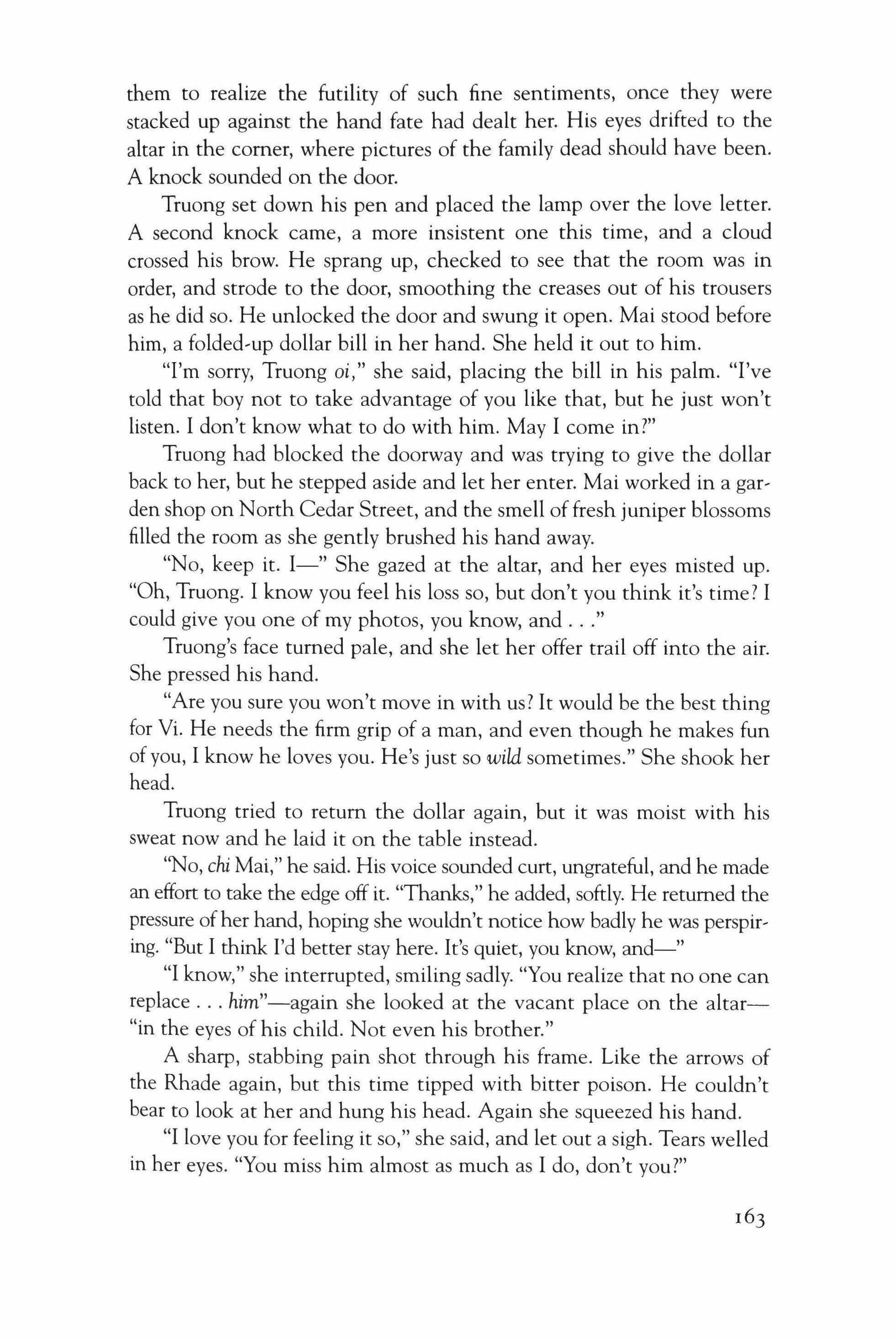
them to realize the futility of such fine sentiments, once they were stacked up against the hand fate had dealt her. His eyes drifted to the altar in the comer, where pictures of the family dead should have been. A knock sounded on the door.
Truong set down his pen and placed the lamp over the love letter. A second knock came, a more insistent one this time, and a cloud crossed his brow. He sprang up, checked to see that the room was in order, and strode to the door, smoothing the creases out of his trousers as he did so. He unlocked the door and swung it open. Mai stood before him, a folded-up dollar bill in her hand. She held it out to him.
"I'm sorry, Truong oi," she said, placing the bill in his palm. "I've told that boy not to take advantage of you like that, but he just won't listen. I don't know what to do with him. May I come in?"
Truong had blocked the doorway and was trying to give the dollar back to her, but he stepped aside and let her enter. Mai worked in a garden shop on North Cedar Street, and the smell offresh juniper blossoms filled the room as she gently brushed his hand away.
"No, keep it. 1-" She gazed at the altar, and her eyes misted up. "Oh, Truong. I know you feel his loss so, but don't you think it's time? I could give you one of my photos, you know, and Truong's face turned pale, and she let her offer trail off into the air. She pressed his hand.
"Are you sure you won't move in with us? It would be the best thing for Vi. He needs the firm grip of a man, and even though he makes fun of you, I know he loves you. He's just so wild sometimes." She shook her head.
Truong tried to return the dollar again, but it was moist with his sweat now and he laid it on the table instead.
''No, chi Mai," he said. His voice sounded curt, ungrateful, and he made an effort to take the edge off it. "Thanks," he added, softly. He returned the pressure ofher hand, hoping she wouldn't notice how badly he was perspiring. "But I think I'd better stay here. It's quiet, you know, and-"
"I know," she interrupted, smiling sadly. "You realize that no one can replace him"-again she looked at the vacant place on the altar"in the eyes of his child. Not even his brother."
A sharp, stabbing pain shot through his frame. Like the arrows of the Rhade again, but this time tipped with bitter poison. He couldn't bear to look at her and hung his head. Again she squeezed his hand.
"I love you for feeling it so," she said, and let out a sigh. Tears welled in her eyes. "You miss him almost as much as I do, don't you?"

He let the question remain unanswered, and his gaze darted involuntarily to the love letter, which peeped from the base of the lamp. Mai spotted it.
"What's that?" she asked, straining her eyes. Truong picked it up, but his hands were shaking so much he passed it off to her without a word.
"My!" she exclaimed. "A love letter! Where did you get this?" She gave him an arch look.
Truong forced a wan smile to his lips.
"It's not mine. An American came into the store today and asked me to translate it. So I said I would. Tonight."
Mai flashed him another sad smile.
"Oh, brother-in-law, you should find yourself a good woman here. It's been eight years, after all. I
She set the letter down on the table. Her glance returned to the altar.
"I will remain true to his memory, of course, but with you it's different."
She eagerly scanned his face, and Truong struggled to retain his composure. He could no longer trust himself to speak.
"Thanks," she whispered, and pressed his hand one last time. "Thanks for remaining true to him as well."
While he waited for the American the next afternoon, Ngo Quang Truong gazed at the TV again, but his enthusiasm for the new war had faded. Cocky GI's were predicting the imminent fall of the capital, St. George's, but the pictures of General Hudson Austin's troops being led away in chains only depressed him. A young reporter dressed in a brand new bush shirt and spotless white trousers crowed about how "America had kicked the Vietnam syndrome at last," and the shopkeeper smiled sourly. War was a complicated business, constantly testing human "loyalty, trust, and constancy." Truong repeated the words from the love letter in his pocket as though he had a lump in his throat, and when the reporter announced that President Reagan would give a major speech to the nation at 9 P.M., he merely grimaced. His little American flag lay untouched next to the cash register.
"Did you finish it?"
Truong pointed the remote at the TV and snapped the set off. The American glanced up at the blank screen.
"Why'd you tum it off?" he asked, his mouth curved down in disap-

pointment. "Aren't you glad we're whipping them?" He came close and eyed the Vietnamese suspiciously. Ngo Quang Truong held his breath at his smell. "You are a loyal American now, aren't you?"
Truong flinched at the word "loyal," and his only reply was to turn the TV back on. The network had already returned to a soap opera. A man in a bar cupped a glass of whiskey in his hands and complained to the bartender about his wife, who was cheating on him.
"You just can't trust anyone," the man whined, taking a deep drink. The bartender nodded and wiped the mahogany counter in front ofhim.
Ngo Quang Truong quickly turned the TV off again.
"You did translate the letter, didn't you?"
Truong's eyes met the American's again, but he found it difficult to speak.
"Yes, 1-"
He halted, and the American nodded as though he'd read his mind. He reached in his pocket and pulled out a crisp twenty-dollar bill folded over several times. He carefully unfolded it and smoothed it out on the counter. The odor of new money contrasted strangely with the man's smell. "I told you I could pay." He shoved the bill across to Truong.
The Vietnamese stared at it and reddened with shame. But he reached under the counter and grabbed the translated love letter. Dear Friend, it now began, it grieve me to write this, but you so far away and the night so cold. I afraid we can no go on like this He passed the letter across to the American. The G.!. picked the translation up and scrutinized it, and Ngo Quang Truong fidgeted while he stumbled through it. When the man was finished, he glanced down at the counter, where the twenty-dollar bill rested against the American flag. He narrowed his eyes suspiciously again.
"Aren't you going to take it?"
The front door swung open, and a chunky Glendale policeman stepped inside, followed by a blast of hot air and the smell of sizzling macadam. The cop was streaming with sweat. He nodded to the shopkeeper and proceeded at once to the soft drink cooler. His waistband radio crackled, and as he reached down to flick it off, Vi and his friend Jimmy entered the store. Ngo Quang Truong's mouth pinched up with worry. Vi must have gotten a lecture from his mother, for he avoided his uncle's eyes as he followed his companion to the back of the shop. The lump rose in the store clerk's throat again. Apparently they hadn't noticed the cop, either. Just then something pushed up against his fingers.
"Hey, if you don't want it, man The American's hand started to
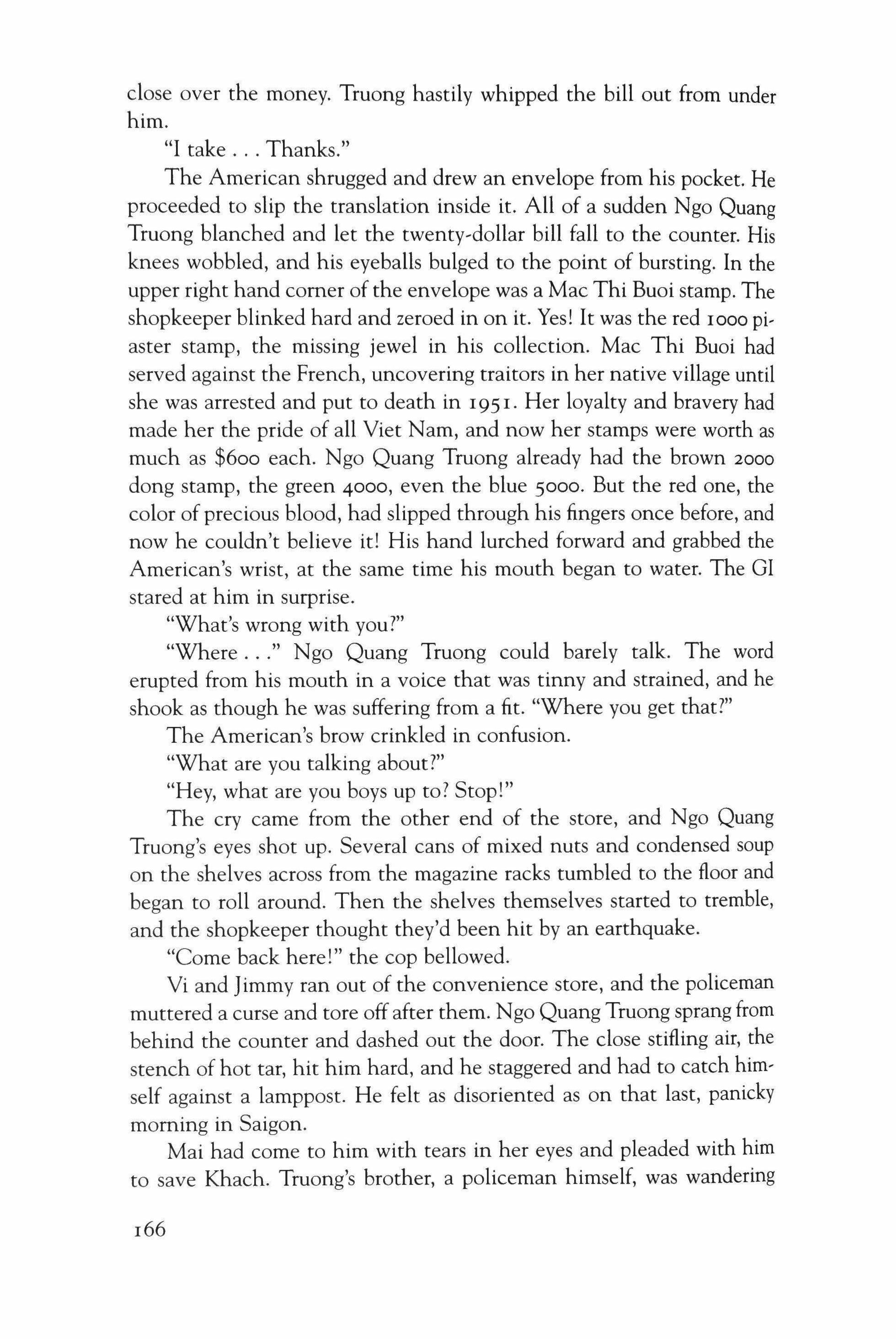
close over the money. Truong hastily whipped the bill out from under him.
"I take Thanks."
The American shrugged and drew an envelope from his pocket. He proceeded to slip the translation inside it. All of a sudden Ngo Quang Truong blanched and let the twenty-dollar bill fall to the counter. His knees wobbled, and his eyeballs bulged to the point of bursting. In the upper right hand comer of the envelope was a Mac Thi Buoi stamp. The shopkeeper blinked hard and zeroed in on it. Yes! It was the red 1000 piaster stamp, the missing jewel in his collection. Mac Thi Buoi had served against the French, uncovering traitors in her native village until she was arrested and put to death in 1951. Her loyalty and bravery had made her the pride of all Viet Nam, and now her stamps were worth as much as $600 each. Ngo Quang Truong already had the brown 2000 dong stamp, the green 4000, even the blue 5000. But the red one, the color of precious blood, had slipped through his fingers once before, and now he couldn't believe it! His hand lurched forward and grabbed the American's wrist, at the same time his mouth began to water. The GI stared at him in surprise.
"What's wrong with you?"
"Where Ngo Quang Truong could barely talk. The word erupted from his mouth in a voice that was tinny and strained, and he shook as though he was suffering from a fit. "Where you get that?"
The American's brow crinkled in confusion.
"What are you talking about?"
"Hey, what are you boys up to? Stop!"
The cry came from the other end of the store, and Ngo Quang Truong's eyes shot up. Several cans of mixed nuts and condensed soup on the shelves across from the magazine racks tumbled to the floor and began to roll around. Then the shelves themselves started to tremble, and the shopkeeper thought they'd been hit by an earthquake.
"Come back here!" the cop bellowed.
Vi and Jimmy ran out of the convenience store, and the policeman muttered a curse and tore offafter them. Ngo QuangTruong sprang from behind the counter and dashed out the door. The close stifling air, the stench of hot tar, hit him hard, and he staggered and had to catch himself against a lamppost. He felt as disoriented as on that last, panicky morning in Saigon.
Mai had come to him with tears in her eyes and pleaded with him to save Khach. Truong's brother, a policeman himself, was wandering
166
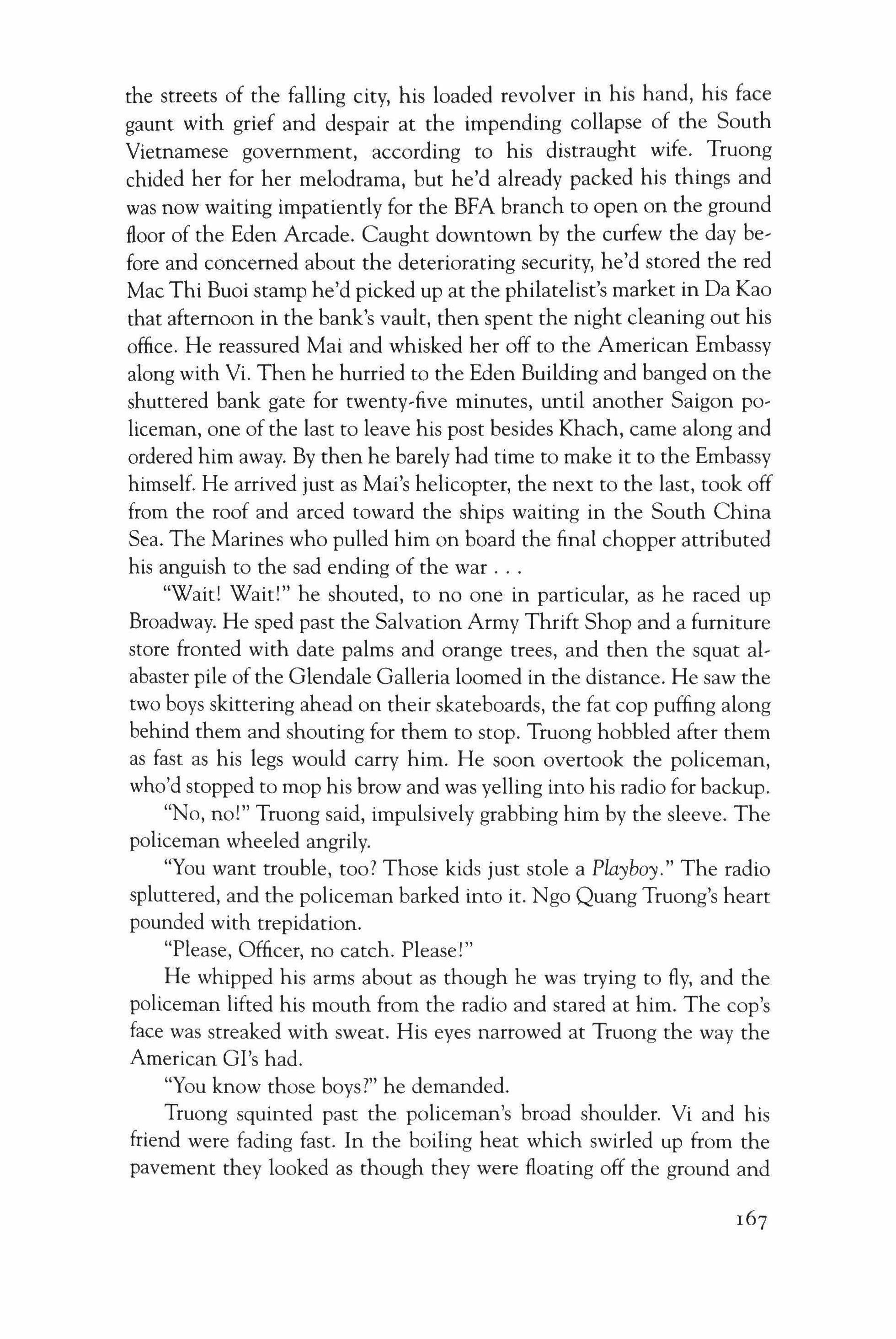
the streets of the falling city, his loaded revolver in his hand, his face gaunt with grief and despair at the impending collapse of the South Vietnamese government, according to his distraught wife. Truong chided her for her melodrama, but he'd already packed his things and was now waiting impatiently for the BFA branch to open on the ground floor of the Eden Arcade. Caught downtown by the curfew the day before and concerned about the deteriorating security, he'd stored the red Mac Thi Buoi stamp he'd picked up at the philatelist's market in Da Kao that afternoon in the bank's vault, then spent the night cleaning out his office. He reassured Mai and whisked her off to the American Embassy along with Vi. Then he hurried to the Eden Building and banged on the shuttered bank gate for twenty-five minutes, until another Saigon policeman, one of the last to leave his post besides Khach, came along and ordered him away. By then he barely had time to make it to the Embassy himself. He arrived just as Mai's helicopter, the next to the last, took off from the roof and arced toward the ships waiting in the South China Sea. The Marines who pulled him on board the final chopper attributed his anguish to the sad ending of the war
"Wait! Wait!" he shouted, to no one in particular, as he raced up Broadway. He sped past the Salvation Army Thrift Shop and a furniture store fronted with date palms and orange trees, and then the squat alabaster pile of the Glendale Galleria loomed in the distance. He saw the two boys skittering ahead on their skateboards, the fat cop puffing along behind them and shouting for them to stop. Truong hobbled after them as fast as his legs would carry him. He soon overtook the policeman, who'd stopped to mop his brow and was yelling into his radio for backup.
"No, no!" Truong said, impulsively grabbing him by the sleeve. The policeman wheeled angrily.
"You want trouble, too? Those kids just stole a Playboy." The radio spluttered, and the policeman barked into it. Ngo Quang Truong's heart pounded with trepidation.
"Please, Officer, no catch. Please!"
He whipped his arms about as though he was trying to fly, and the policeman lifted his mouth from the radio and stared at him. The cop's face was streaked with sweat. His eyes narrowed at Truong the way the American GI's had.
"You know those boys?" he demanded.
Truong squinted past the policeman's broad shoulder. Vi and his friend were fading fast. In the boiling heat which swirled up from the pavement they looked as though they were floating off the ground and
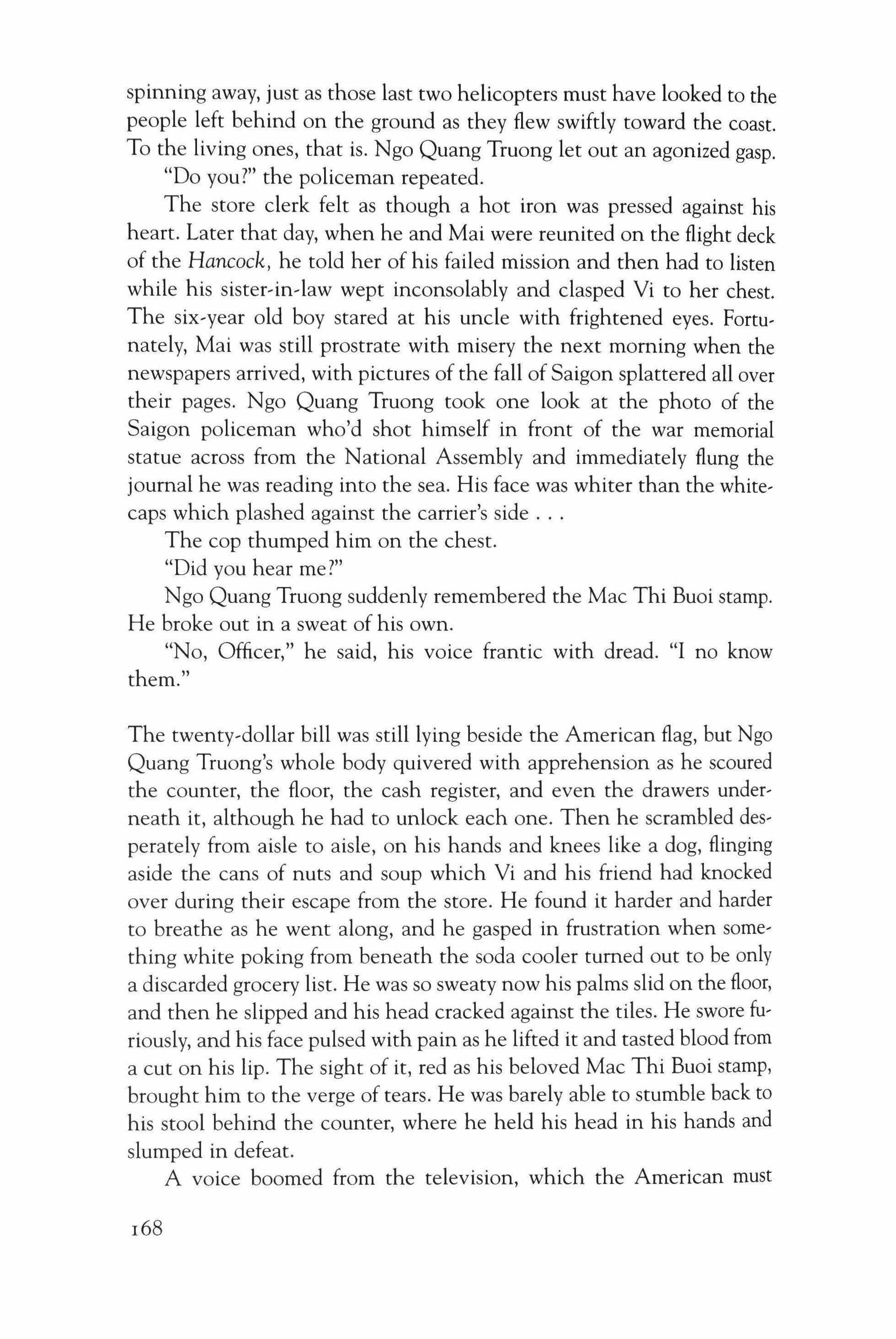
spinning away, just as those last two helicopters must have looked to the people left behind on the ground as they flew swiftly toward the coast. To the living ones, that is. Ngo Quang Truong let out an agonized gasp.
"Do you?" the policeman repeated.
The store clerk felt as though a hot iron was pressed against his heart. Later that day, when he and Mai were reunited on the flight deck of the Hancock, he told her of his failed mission and then had to listen while his sister-in-law wept inconsolably and clasped Vi to her chest. The six-year old boy stared at his uncle with frightened eyes. Fortunately, Mai was still prostrate with misery the next morning when the newspapers arrived, with pictures of the fall of Saigon splattered all over their pages. Ngo Quang Truong took one look at the photo of the Saigon policeman who'd shot himself in front of the war memorial statue across from the National Assembly and immediately flung the journal he was reading into the sea. His face was whiter than the whitecaps which plashed against the carrier's side
The cop thumped him on the chest.
"Did you hear me?"
Ngo Quang Truong suddenly remembered the Mac Thi Buoi stamp. He broke out in a sweat of his own.
"No, Officer," he said, his voice frantic with dread. "I no know them."
The twenty-dollar bill was still lying beside the American flag, but Ngo Quang Truong's whole body quivered with apprehension as he scoured the counter, the floor, the cash register, and even the drawers underneath it, although he had to unlock each one. Then he scrambled desperately from aisle to aisle, on his hands and knees like a dog, flinging aside the cans of nuts and soup which Vi and his friend had knocked over during their escape from the store. He found it harder and harder to breathe as he went along, and he gasped in frustration when something white poking from beneath the soda cooler turned out to be only a discarded grocery list. He was so sweaty now his palms slid on the floor, and then he slipped and his head cracked against the tiles. He swore furiously, and his face pulsed with pain as he lifted it and tasted blood from a cut on his lip. The sight of it, red as his beloved Mac Thi Buoi stamp, brought him to the verge of tears. He was barely able to stumble back to his stool behind the counter, where he held his head in his hands and slumped in defeat.
A voice boomed from the television, which the American must
168

have turned on again while he waited for Truong to return. The shopkeeper glanced up. A reporter stood in front of a bullet-riddled statue of Maurice Bishop in the middle of St. George's. In breathless tones he announced that the general in charge of the invasion was about to describe the brilliant strategy by which the Americans were winning the war. The words had little effect on Ngo Quang Truong, whose head was still throbbing. But a body lay in plain view beside the statue, and a dolorous spasm shook the store clerk when he spotted it. The newsman chattered on about the one-sided battle for Grenada, and Truong wondered why he hadn't noticed the dead man sprawled almost at his feet. Flies buzzed about the corpse, which was beginning to bloat and blacken in the hot tropical sun, and Ngo Quang Truong shivered all over, as though the stench of decay had seeped right through the television. Don't just stand there! Why don't you do something? Take it away, for God's sake!
The shopkeeper felt as though a sledgehammer pounded on his brain, and the tears came for real now. The blood he had not spilled raced painfully to his temples. He wiped his eyes and raised them to the TV again. The statue was still there, as was the reporter, but not the body. It had simply disappeared, back to the darkest regions of Ngo Quang Truong's mind. With unsteady hands he reached for the remote and turned off the television.
Herman de Coninck
Translated from the Dutch by
Laure�Anne Bosselaar and Kurt Brown
-for Laura and Tom
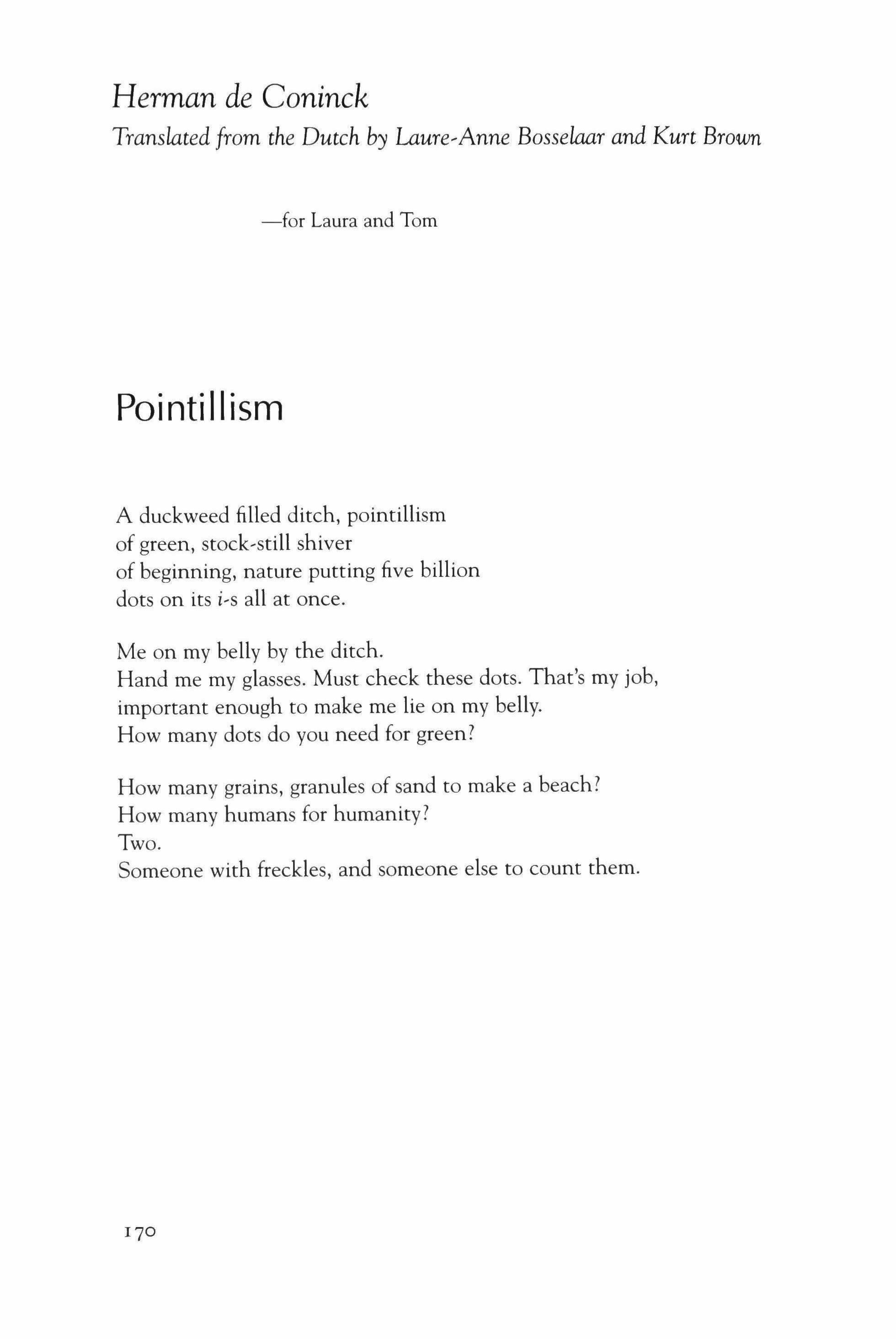
Pointi IIism
A duckweed filled ditch, pointillism of green, stock-still shiver of beginning, nature putting five billion dots on its i-s all at once.
Me on my belly by the ditch. Hand me my glasses. Must check these dots. That's my job, important enough to make me lie on my belly. How many dots do you need for green?
How many grains, granules of sand to make a beach? How many humans for humanity? Two.
Someone with freckles, and someone else to count them.
170
"Hop, in the curtains, hop on the tabletop. "
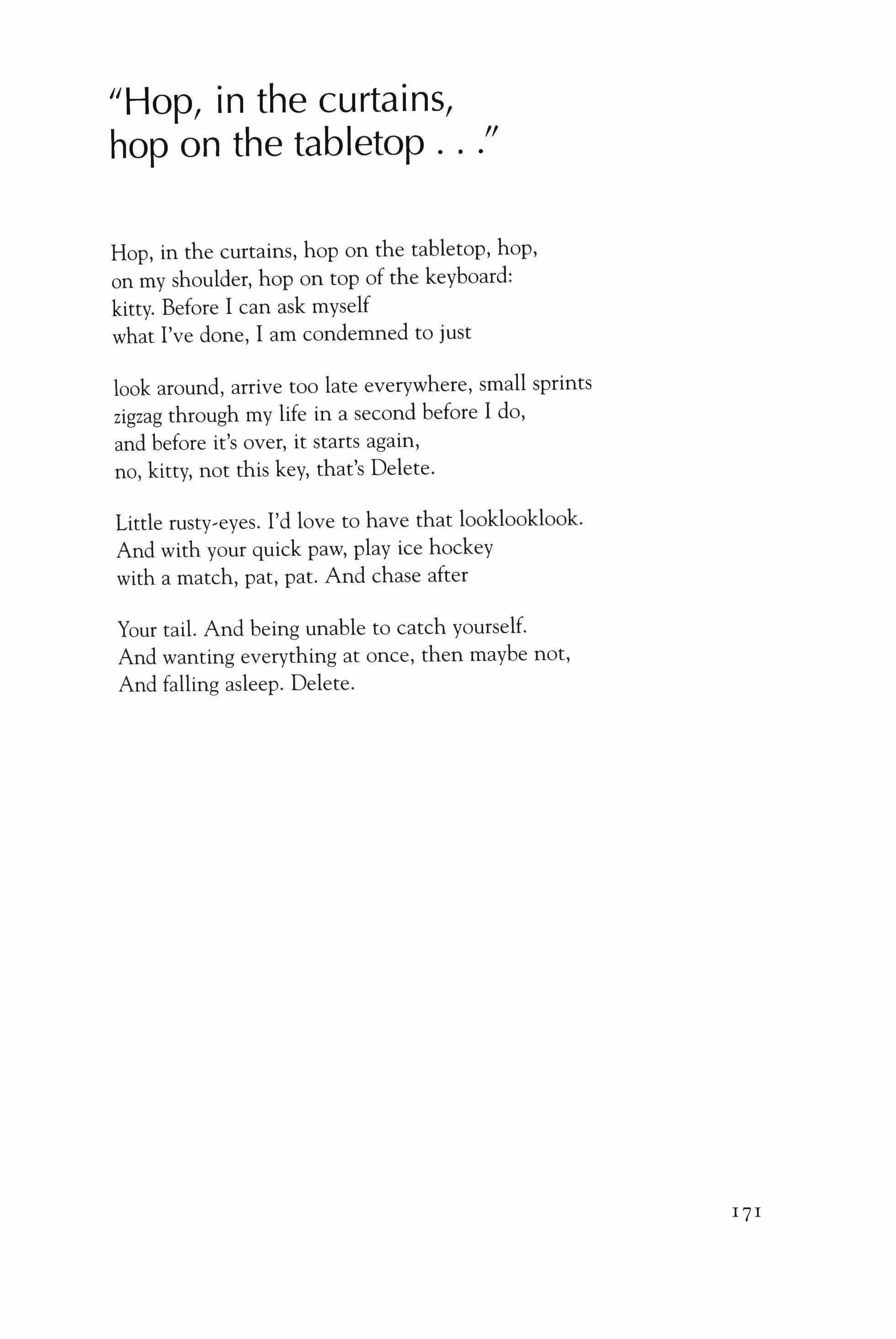
Hop, in the curtains, hop on the tabletop, hop, on my shoulder, hop on top of the keyboard: kitty. Before I can ask myself what I've done, I am condemned to just look around, arrive too late everywhere, small sprints zigzag through my life in a second before I do, and before it's over, it starts again, no, kitty, not this key, that's Delete.
Little rusty-eyes. I'd love to have that looklooklook. And with your quick paw, play ice hockey with a match, pat, pat. And chase after Your tail. And being unable to catch yourself. And wanting everything at once, then maybe not, And falling asleep. Delete.
"I come from far away "
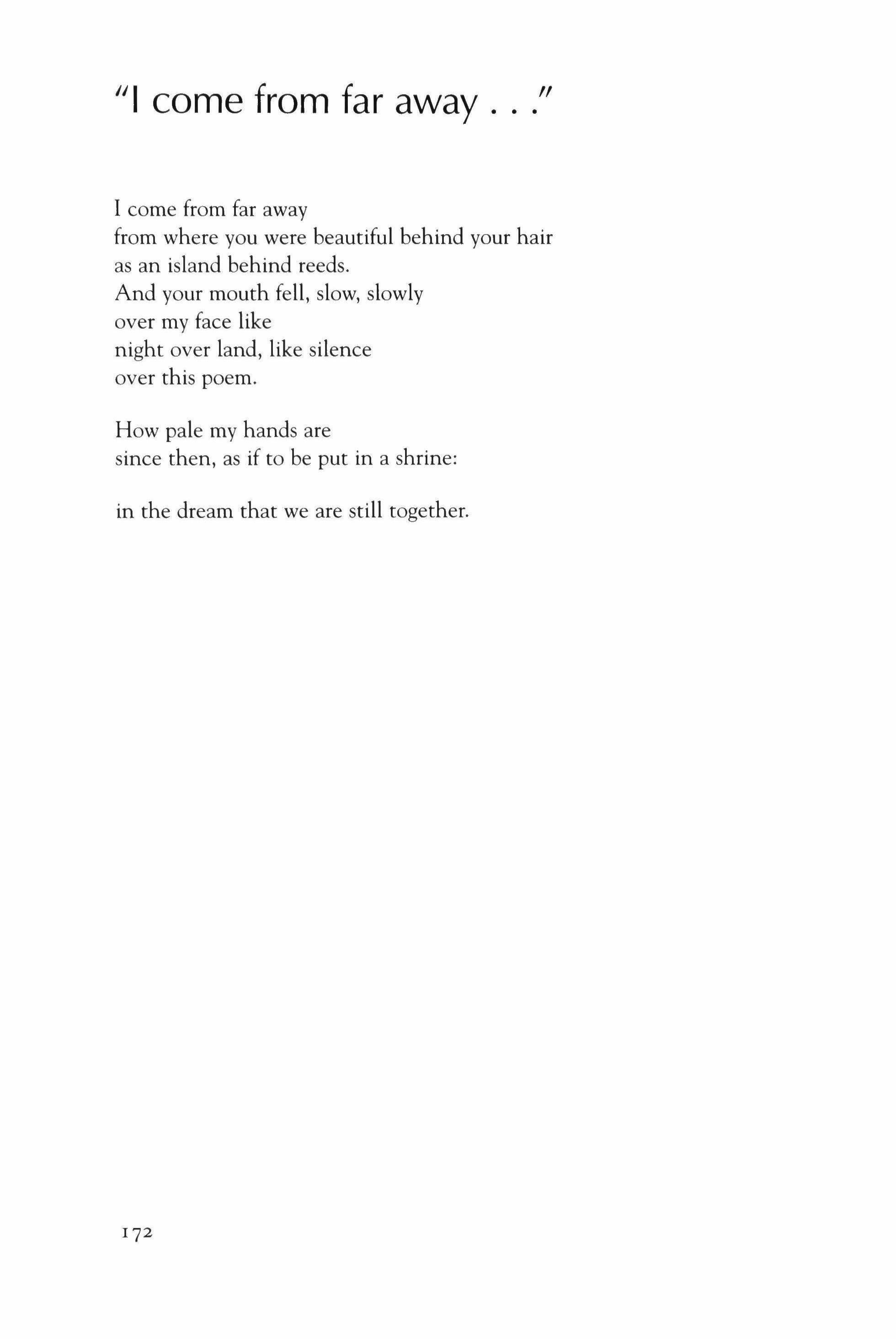
I come from far away from where you were beautiful behind your hair as an island behind reeds. And your mouth fell, slow, slowly over my face like night over land, like silence over this poem. How pale my hands are since then, as if to be put in a shrine: in the dream that we are still together.
Around and About
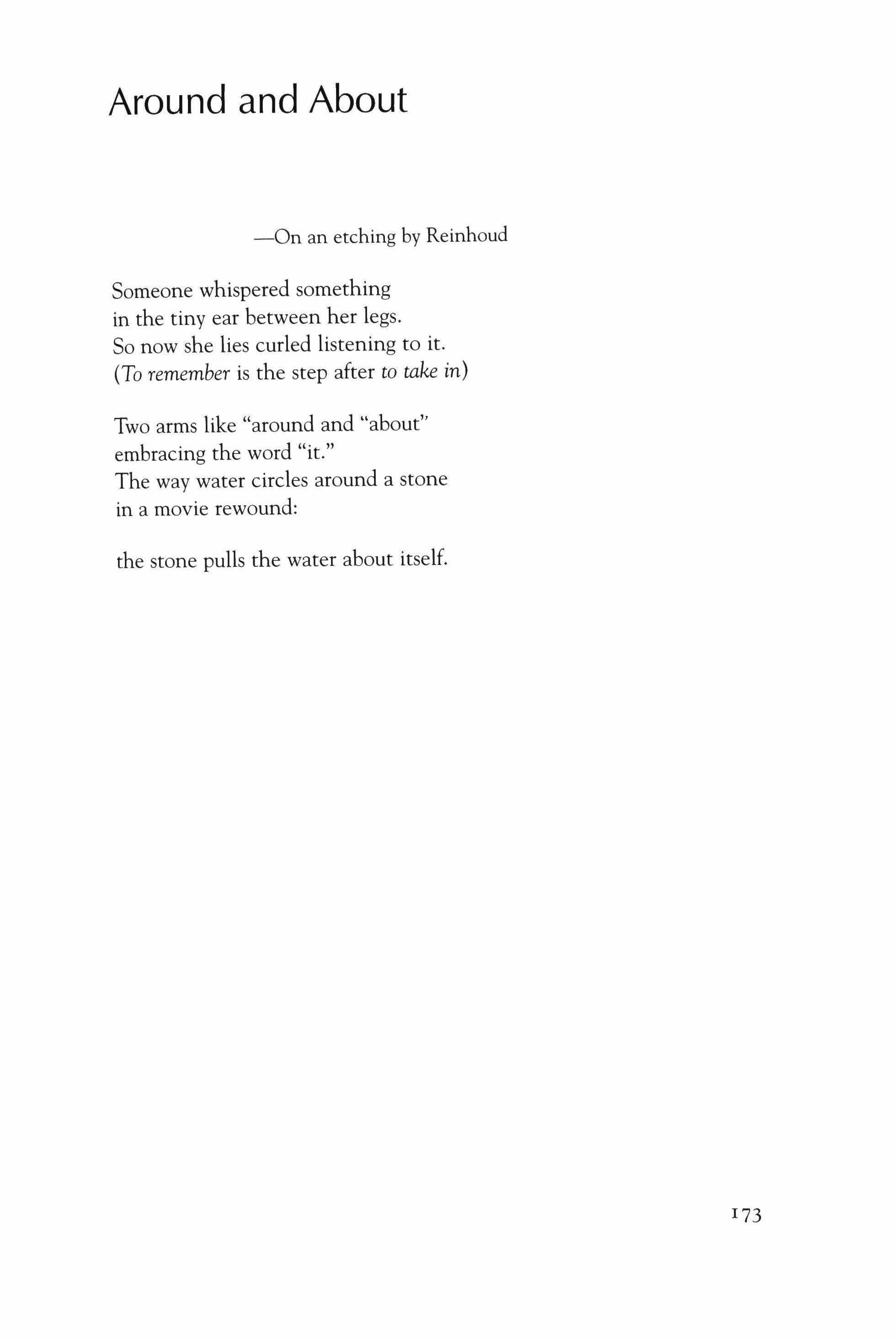
-On an etching by
Reinhoud
Someone whispered something in the tiny ear between her legs. So now she lies curled listening to it.
(To remember is the step after to take in)
Two arms like "around and "about" embracing the word "it."
The way water circles around a stone in a movie rewound: the stone pulls the water about itself.
173

"Choose
me "
Choose me. Choose me out of the whole population of the world. You can hesitate a little about the other guys, but then choose me.
Rumors, wordly wisdom no one really wants, old uncle Louie's jokes, put your arms around this, it's yours. You can have it all.
I'll get you, get to have you every day and may even love your daughter. Let's-all of us-marry.
174
David Barber
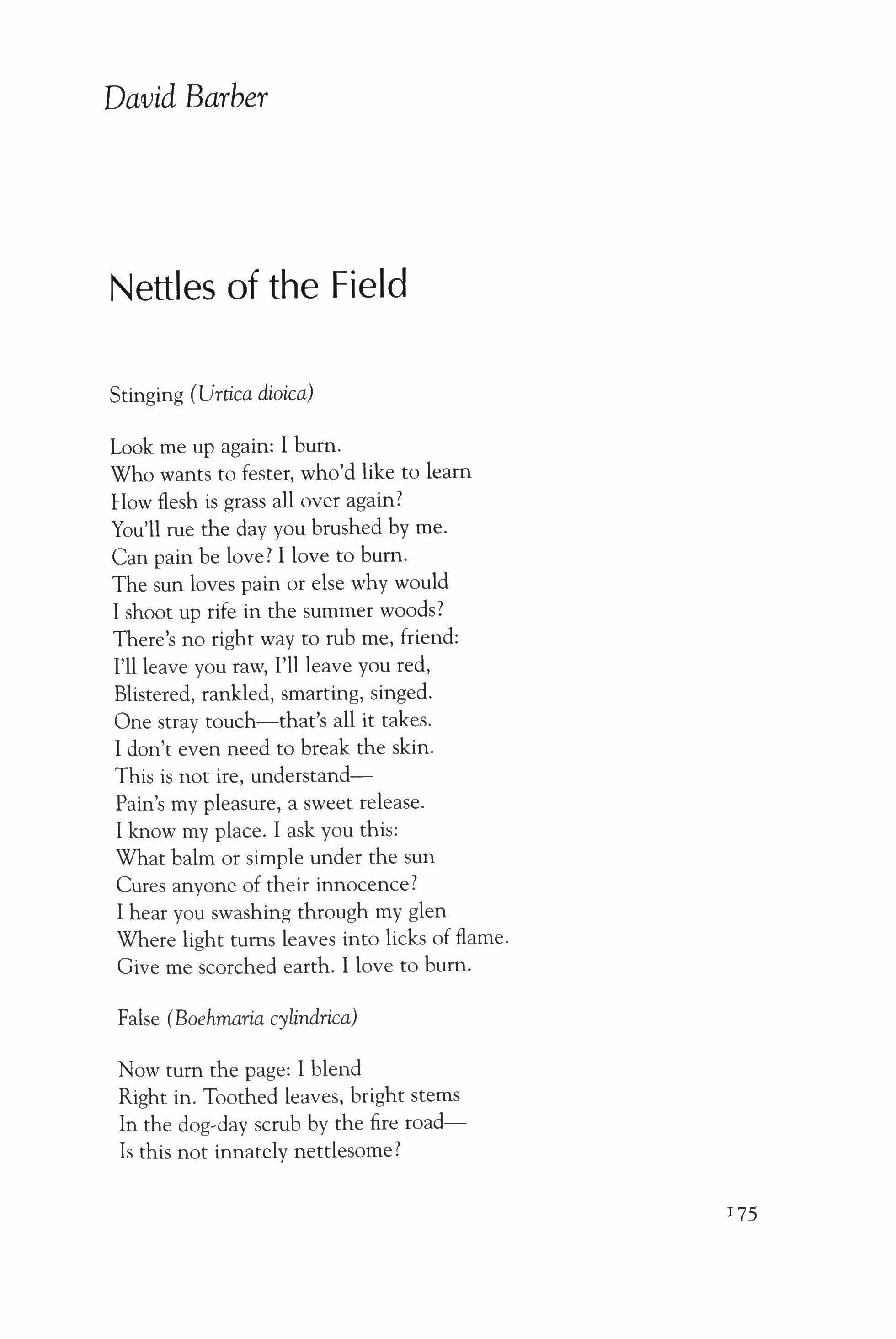
Nettles of the Field
Stinging (Urtica dioica)
Look me up again: I bum.
Who wants to fester, who'd like to learn
How flesh is grass all over again? You'll rue the day you brushed by me. Can pain be love? I love to bum.
The sun loves pain or else why would 1 shoot up rife in the summer woods?
There's no right way to rub me, friend: I'll leave you raw, I'll leave you red, Blistered, rankled, smarting, singed. One stray touch-that's all it takes.
I don't even need to break the skin. This is not ire, understandPain's my pleasure, a sweet release.
I know my place. I ask you this: What balm or simple under the sun Cures anyone of their innocence?
1 hear you swashing through my glen Where light turns leaves into licks of flame. Give me scorched earth. I love to bum.
False (Boehmaria cylindrica)
Now tum the page: I blend Right in. Toothed leaves, bright stems In the dog-day scrub by the fire roadIs this not innately nettlesome?
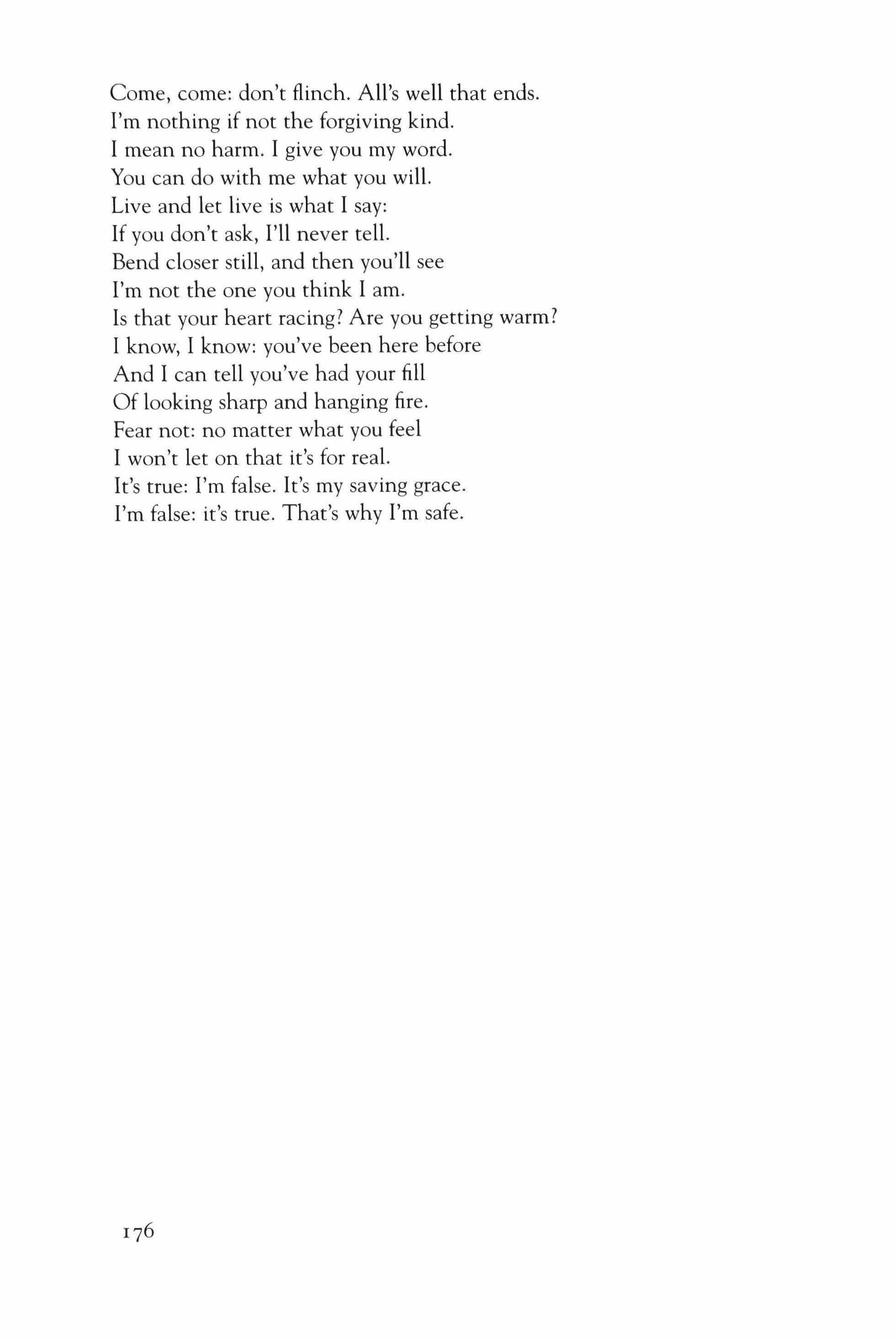
Come, come: don't flinch. All's well that ends.
I'm nothing if not the forgiving kind. I mean no harm. I give you my word. You can do with me what you will. Live and let live is what I say: If you don't ask, I'll never tell. Bend closer still, and then you'll see I'm not the one you think I am. Is that your heart racing? Are you getting warm? I know, I know: you've been here before And I can tell you've had your fill Of looking sharp and hanging fire. Fear not: no matter what you feel I won't let on that it's for real.
It's true: I'm false. It's my saving grace. I'm false: it's true. That's why I'm safe.
176
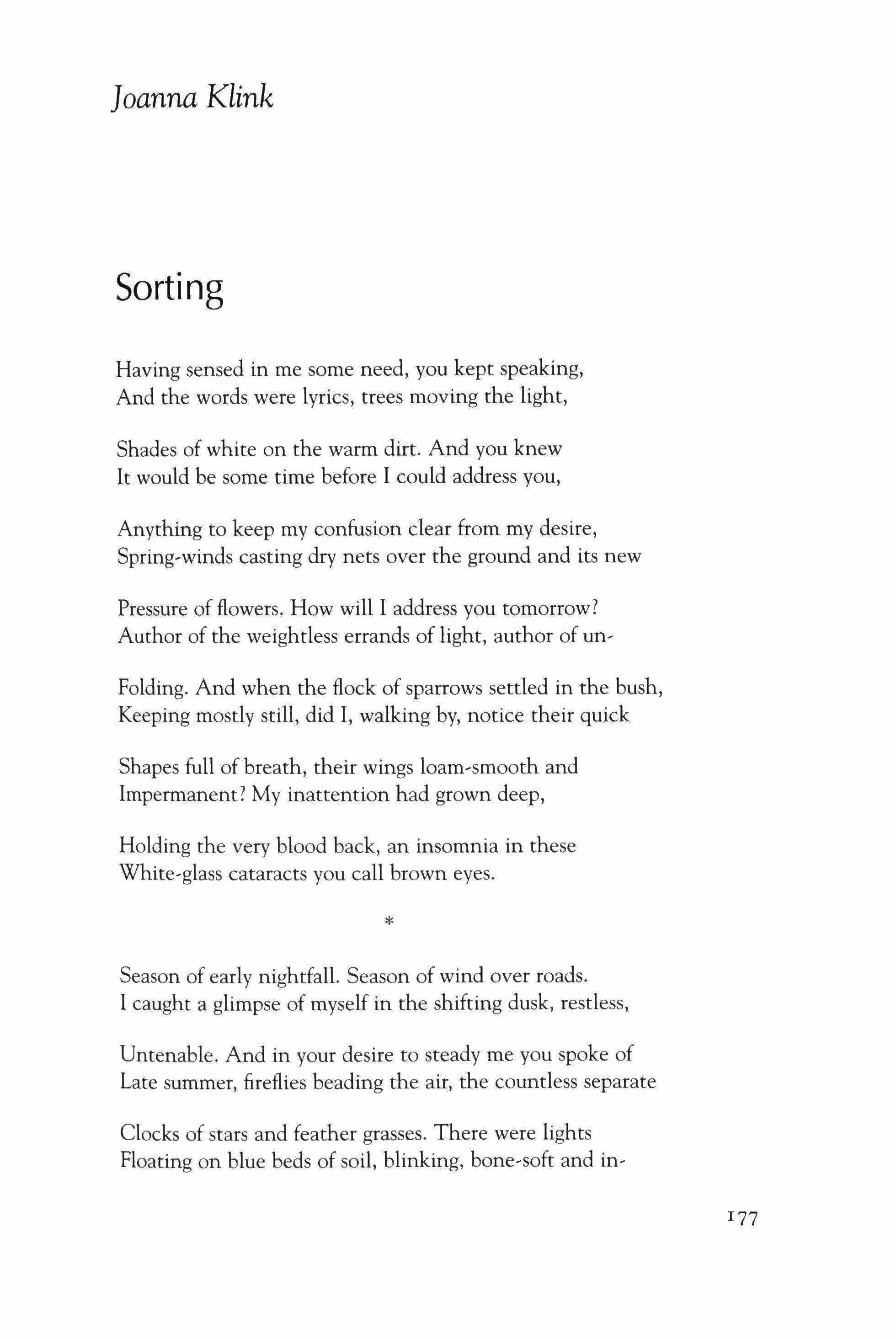
Sorting
Having sensed in me some need, you kept speaking, And the words were lyrics, trees moving the light,
Shades of white on the warm dirt. And you knew It would be some time before I could address you,
Anything to keep my confusion clear from my desire, Spring-winds casting dry nets over the ground and its new
Pressure of flowers. How will I address you tomorrow? Author of the weightless errands of light, author of un-
Folding. And when the flock of sparrows settled in the bush, Keeping mostly still, did I, walking by, notice their quick
Shapes full of breath, their wings loam-smooth and Impermanent? My inattention had grown deep,
Holding the very blood back, an insomnia in these White-glass cataracts you call brown eyes.
*
Season of early nightfall. Season of wind over roads. I caught a glimpse of myself in the shifting dusk, restless,
Untenable. And in your desire to steady me you spoke of Late summer, fireflies beading the air, the countless separate
Clocks of stars and feather grasses. There were lights Floating on blue beds of soil, blinking, bone-soft and in-
]oanna Klink
Scrutable. What things are worth attention? I wanted to say The sparrows swept from the bush, although I did not see them.

You within the season of my day, tapwater and shoes, The rain that will surely break by evening. Surely I never thought
You would accompany me here, where I feel most separate, A core of ether pulling away as the night-clouds sink and
Dissolve into fields-inconceivable that you would stay close To such errancy, as an eye follows a shore-bird at evening
In some spectral graph of flight, wing-clipped and stuttering, Or carried to the outskirts of black seawaves in song, nocti-
Lucence, flushed from the thickening imbalance of the earthAnd nothing was there save the lift of your arms, a sound of air
At the edge of vacancy-though I did see shadows Sift through fine blue grasses and maps of stars pricked
In the filament dusk, the cool center of your gaze sweep across My aimless hands, and found I could write these things down,
The yard's flickering lights, faint glass,bum of summer, Tearing something briefly from our skin, this clean air,
The weeds and roses, a grief released into darkness as if it had Never wholly been our own, your hands against my face,
Telling me it will amount to something, at least for these minutes, Unwavering among the shapeless flowers, a hundred shadows
Moving over the grass gathering nothing but words-indigo, nightNothing but the whole of your voice traveling toward me.
*
178
Chana Bloch
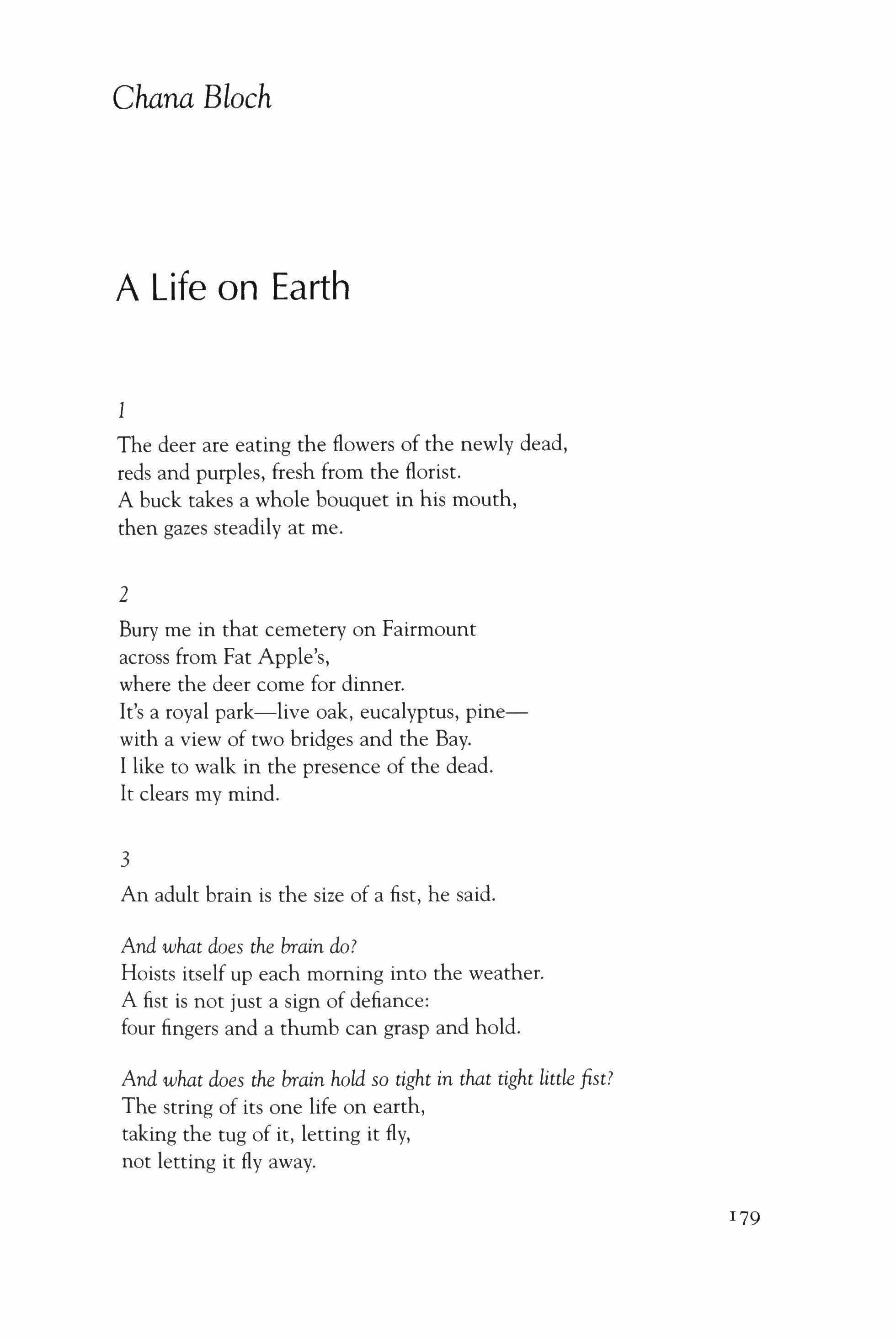
A Life on Earth
The deer are eating the flowers of the newly dead, reds and purples, fresh from the florist. A buck takes a whole bouquet in his mouth, then gazes steadily at me.
2
Bury me in that cemetery on Fairmount across from Fat Apple's, where the deer come for dinner. It's a royal park-live oak, eucalyptus, pinewith a view of two bridges and the Bay. I like to walk in the presence of the dead. It clears my mind.
3
An adult brain is the size of a fist, he said.
And what does the brain do?
Hoists itself up each morning into the weather. A fist is not just a sign of defiance: four fingers and a thumb can grasp and hold.
And what does the brain hold so tight in that tight little fist? The string of its one life on earth, taking the tug of it, letting it fly, not letting it flyaway.
179

Last time we talked about the afterlife, all of us ended up snapping: "Arrogance!" "Ignorance!" "Wishful thinking!"
"Someday, I'll be a little pile of dust," said Elihu to Job with his narrow smile. "And you'll be a beam of light."
5 My hand reads the history of each face I touch, a Fahrenheit print on my palm, stamped across my life-lines. Whatever my hand absorbs will tum into mulch -tales of the human to fatten a plot of grass. The end is bones in their calcium refusal to tum into anything else.
6
A dribble of dirt, of clods drumming on wood.
We walked in a circle. The shovel went hand to hand, The coffin lid a narrow door we were pelting shut.
We stood in a silence and stared at the dirt.
I took home the final hard percussive thud.
4
180
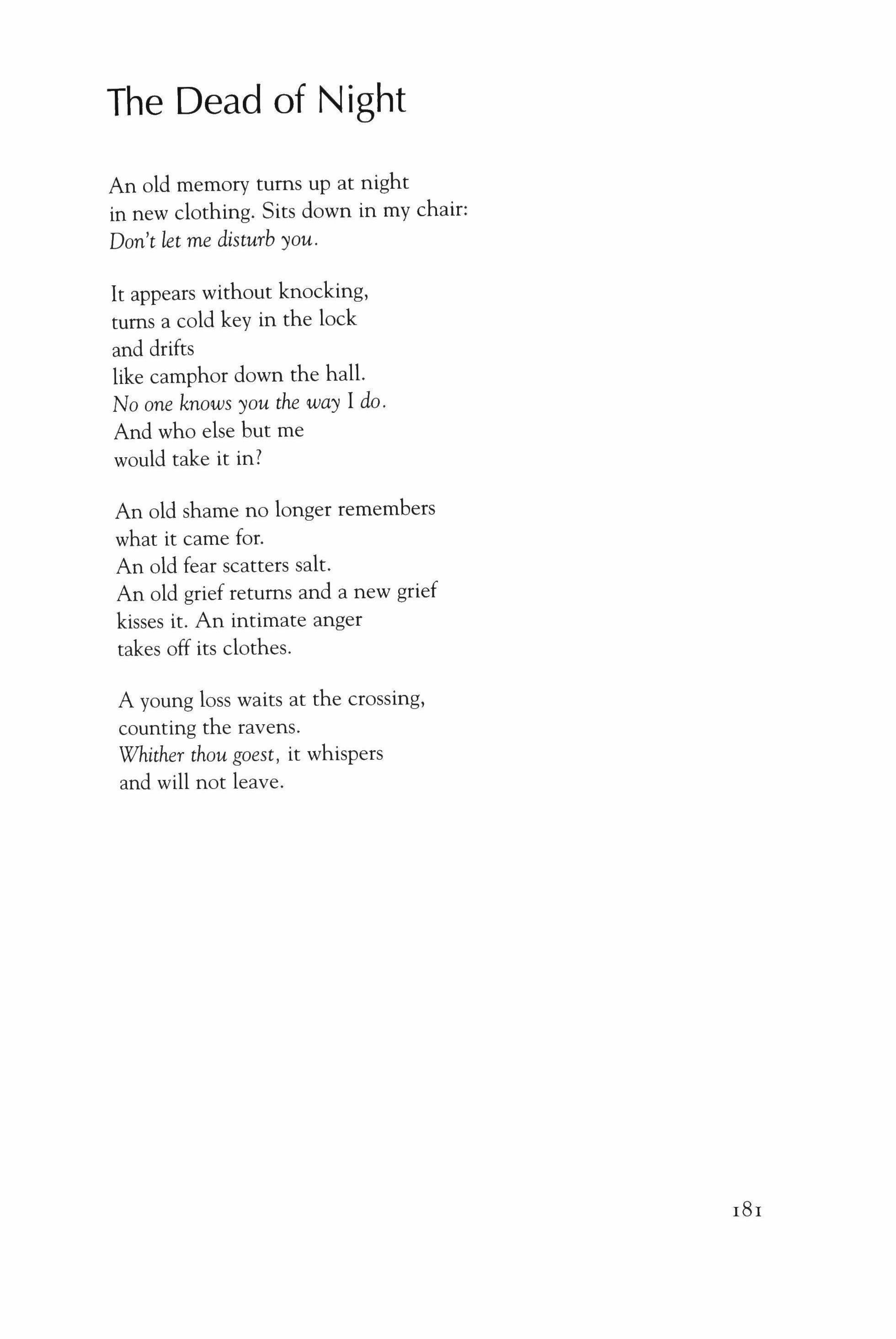
The Dead of Night
An old memory turns up at night in new clothing. Sits down in my chair: Don't let me disturb you.
It appears without knocking, turns a cold key in the lock and drifts like camphor down the hall. No one knows you the way I do. And who else but me would take it in?
An old shame no longer remembers what it came for. An old fear scatters salt. An old grief returns and a new grief kisses it. An intimate anger takes off its clothes.
A young loss waits at the crossing, counting the ravens. Whither thou goest, it whispers and will not leave.
181
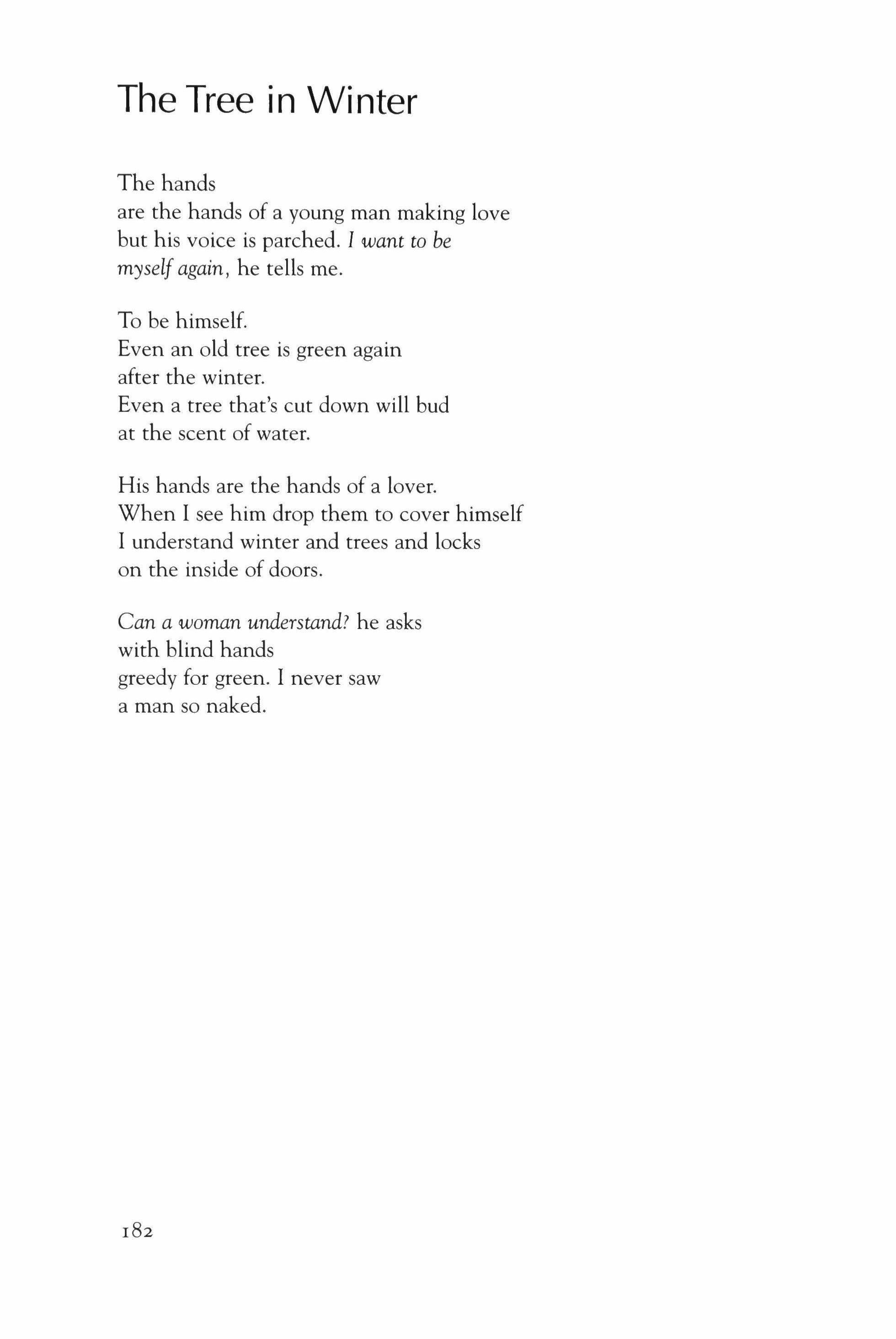
The Tree in Winter
The hands are the hands of a young man making love but his voice is parched. I want to be myselfagain, he tells me.
To be himself. Even an old tree is green again after the winter. Even a tree that's cut down will bud at the scent of water. His hands are the hands of a lover. When I see him drop them to cover himself I understand winter and trees and locks on the inside of doors.
Can a woman understand? he asks with blind hands greedy for green. I never saw a man so naked.
Garth Greenwell
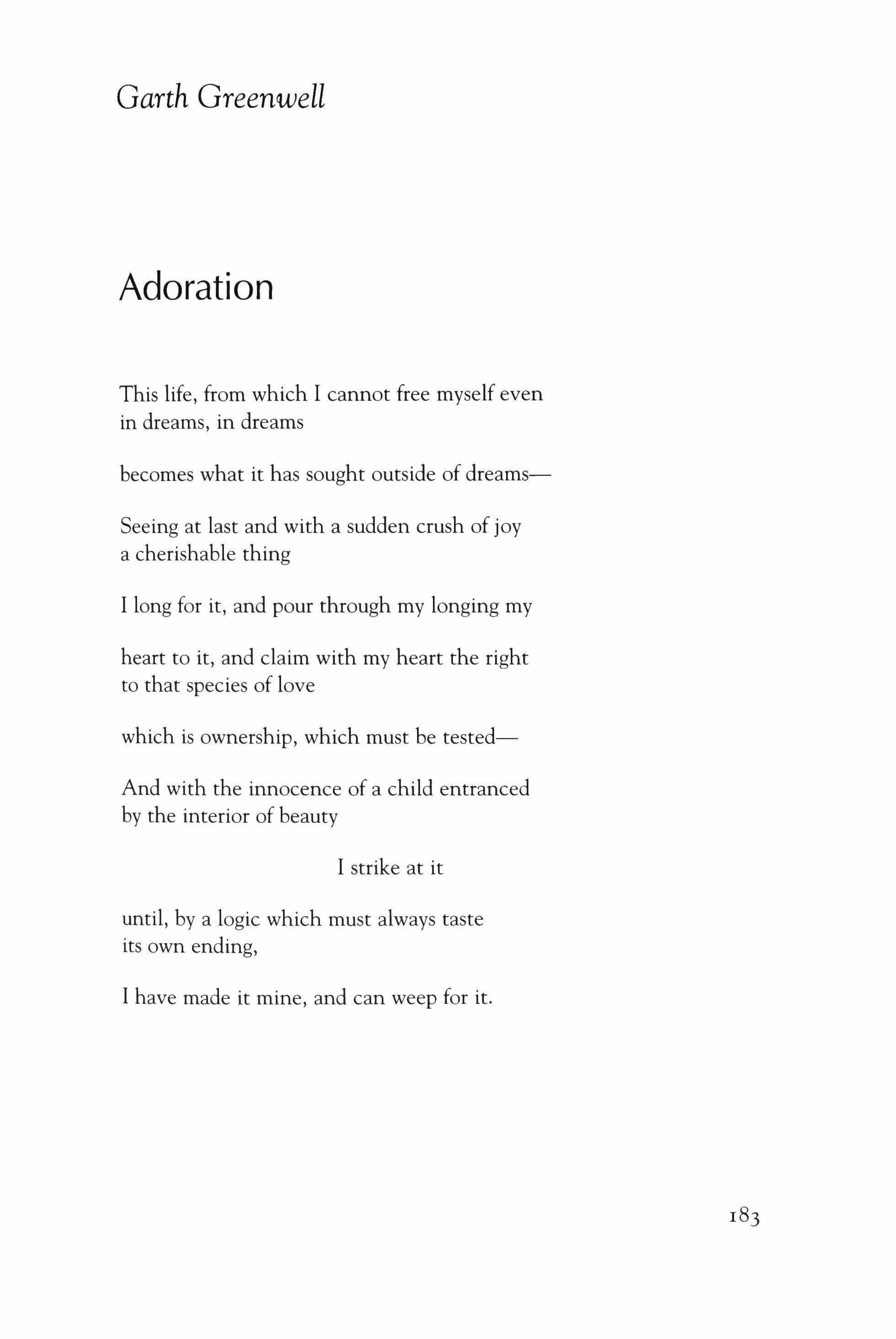
Adoration
This life, from which I cannot free myself even in dreams, in dreams becomes what it has sought outside of dreams-
Seeing at last and with a sudden crush of joy a cherishable thing
I long for it, and pour through my longing my heart to it, and claim with my heart the right to that species of love which is ownership, which must be testedAnd with the innocence of a child entranced by the interior of beauty
I strike at it until, by a logic which must always taste its own ending, I have made it mine, and can weep for it.
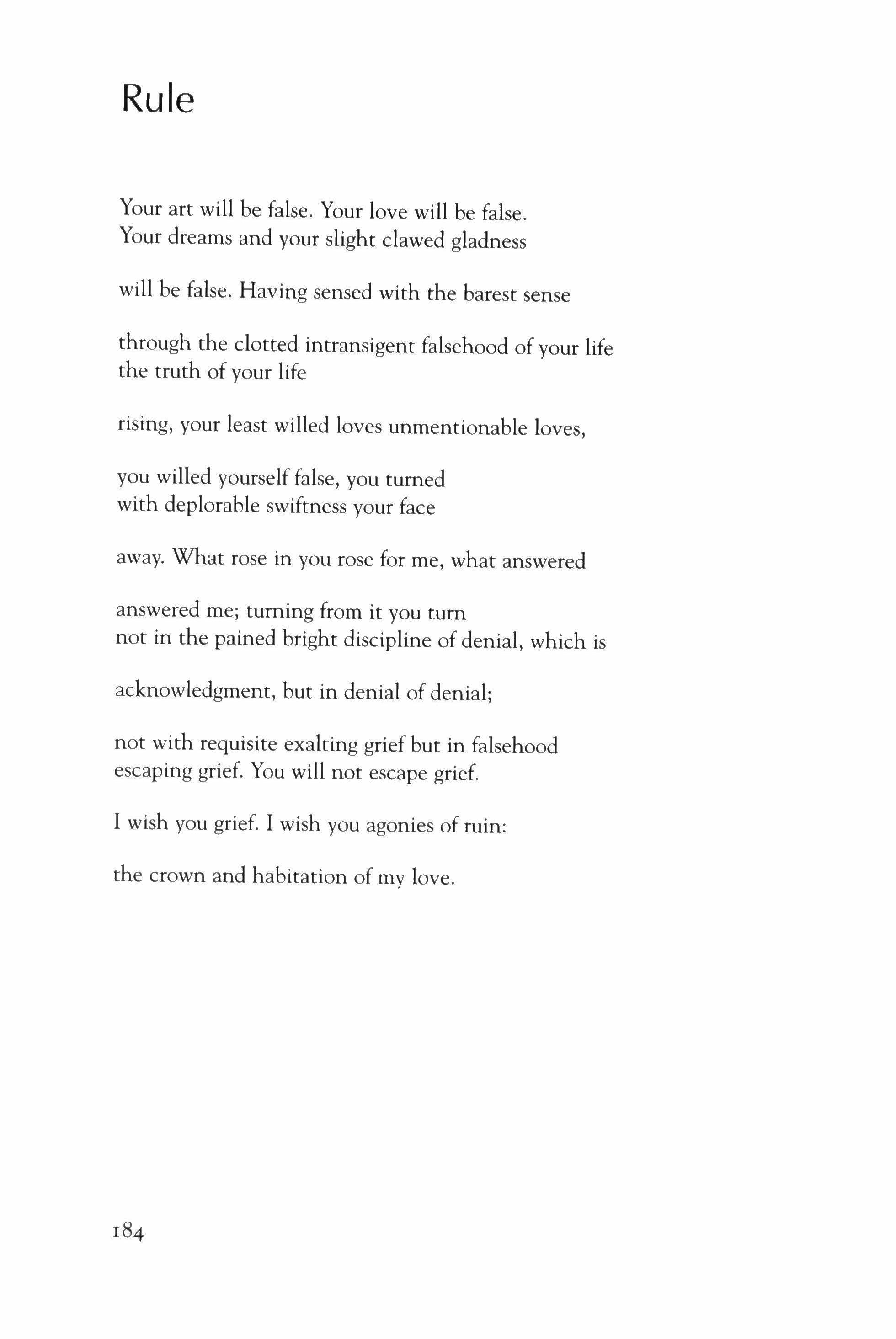
Your art will be false. Your love will be false. Your dreams and your slight clawed gladness will be false. Having sensed with the barest sense through the clotted intransigent falsehood of your life the truth of your life rising, your least willed loves unmentionable loves, you willed yourself false, you turned with deplorable swiftness your face away. What rose in you rose for me, what answered answered me; turning from it you tum not in the pained bright discipline of denial, which is acknowledgment, but in denial of denial; not with requisite exalting grief but in falsehood escaping grief. You will not escape grief. I wish you grief. I wish you agonies of ruin: the crown and habitation of my love.
Rule
Jason Brown

Life During Peacetime
I can tell by the way she stands that my mother wants me to ride the bike she bought for my birthday. It is a shame to think of a new bike rusting against the side of the carriage house, so I sit on the saddle and coast down the slope of the driveway toward her. At one point, I can't remember when, I learned how to balance in motion.
I have other toys-a kite, plastic cars-that she bought. For some reason, handing things to me is distasteful to her, so she usually leaves them in my room or outside the back door for me to find. If she is standing in the window or sitting in one of the chairs looking down over the river, I will sometimes push a toy car along the granite slab that once served as the foundation for the small bam before it burned down. I have no way of knowing if she derives any satisfaction from seeing me do such things, or if she sees me at all.
I am supposed to start fourth grade in the fall, going to school for the first time, but I already know what it will be like to wait in line by the drinking fountain for Mrs. Nason to signal it is time to walk down the hall toward the lunchroom. I already hate the smell of steam rising off the asphalt playground after a thunderstorm and the dry smell of chalk in the damp classroom and the antiseptic smell of the boys' bathroom. My mother has given me books at home until now, and I don't see why anything has to change, but she says I have to go-everyone has to at some point-even though she worries my father might come home while I'm away. I might miss him.
He's not coming home, I say when I ride past her.
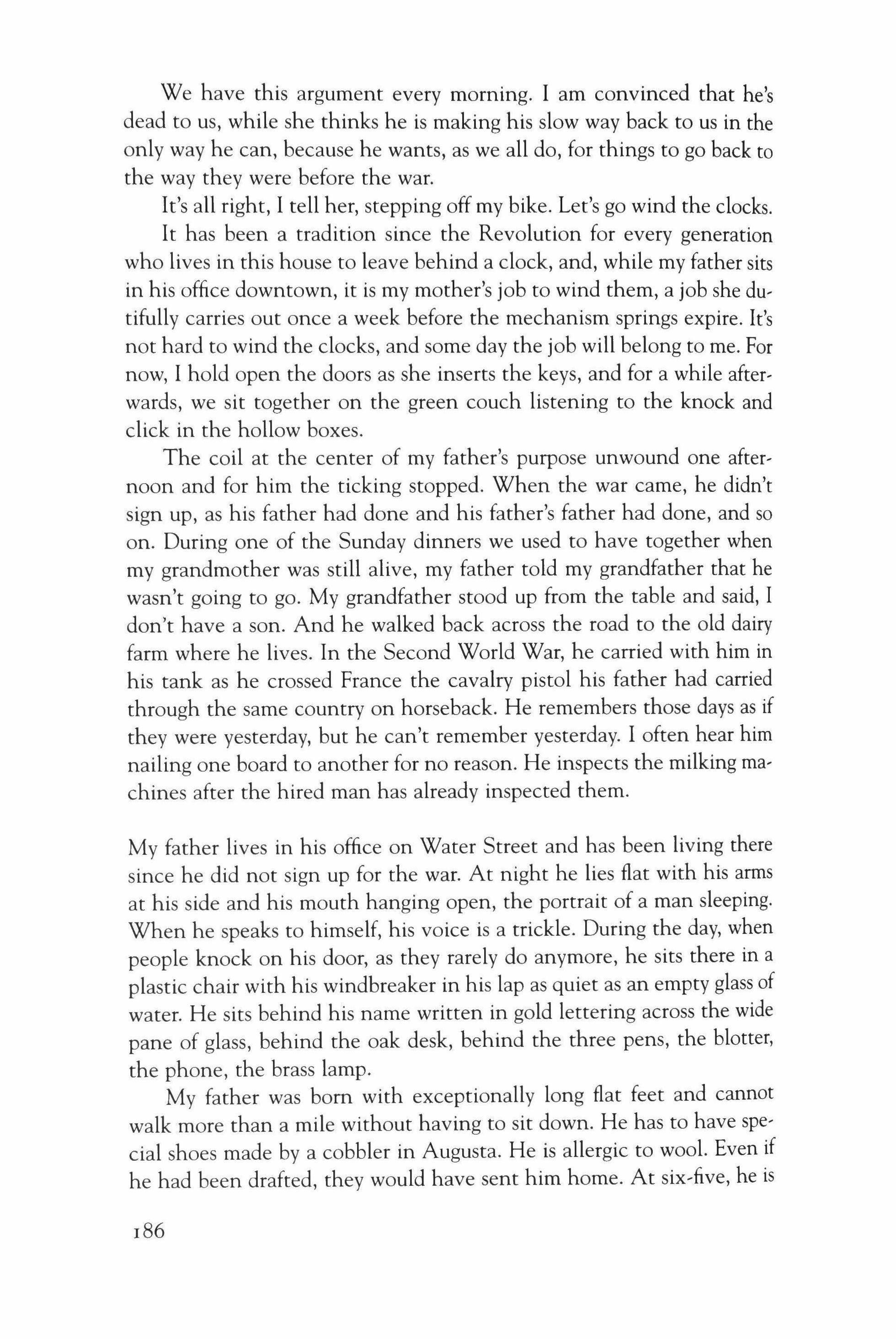
We have this argument every morning. I am convinced that he's dead to us, while she thinks he is making his slow way back to us in the only way he can, because he wants, as we all do, for things to go back to the way they were before the war.
It's all right, I tell her, stepping off my bike. Let's go wind the clocks. It has been a tradition since the Revolution for every generation who lives in this house to leave behind a clock, and, while my father sits in his office downtown, it is my mother's job to wind them, a job she dutifully carries out once a week before the mechanism springs expire. It's not hard to wind the clocks, and some day the job will belong to me. For now, I hold open the doors as she inserts the keys, and for a while afterwards, we sit together on the green couch listening to the knock and click in the hollow boxes.
The coil at the center of my father's purpose unwound one afternoon and for him the ticking stopped. When the war came, he didn't sign up, as his father had done and his father's father had done, and so on. During one of the Sunday dinners we used to have together when my grandmother was still alive, my father told my grandfather that he wasn't going to go. My grandfather stood up from the table and said, I don't have a son. And he walked back across the road to the old dairy farm where he lives. In the Second World War, he carried with him in his tank as he crossed France the cavalry pistol his father had carried through the same country on horseback. He remembers those days as if they were yesterday, but he can't remember yesterday. I often hear him nailing one board to another for no reason. He inspects the milking machines after the hired man has already inspected them.
My father lives in his office on Water Street and has been living there since he did not sign up for the war. At night he lies flat with his arms at his side and his mouth hanging open, the portrait of a man sleeping. When he speaks to himself, his voice is a trickle. During the day, when people knock on his door, as they rarely do anymore, he sits there in a plastic chair with his windbreaker in his lap as quiet as an empty glass of water. He sits behind his name written in gold lettering across the wide pane of glass, behind the oak desk, behind the three pens, the blotter, the phone, the brass lamp.
My father was born with exceptionally long flat feet and cannot walk more than a mile without having to sit down. He has to have special shoes made by a cobbler in Augusta. He is allergic to wool. Even if he had been drafted, they would have sent him home. At six-five, he is
186
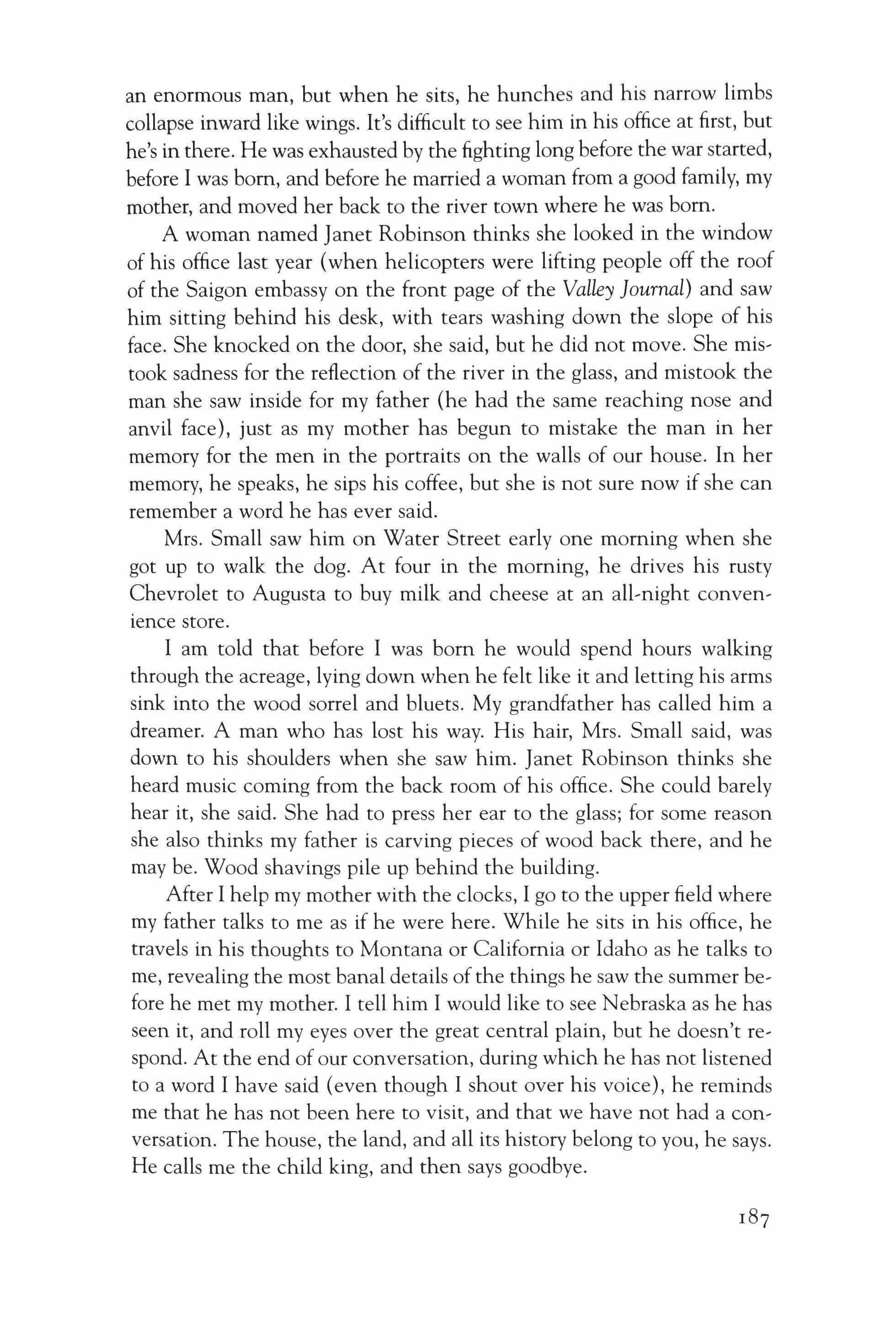
an enormous man, but when he sits, he hunches and his narrow limbs collapse inward like wings. It's difficult to see him in his office at first, but he's in there. He was exhausted by the fighting long before the war started, before I was born, and before he married a woman from a good family, my mother, and moved her back to the river town where he was born.
A woman named Janet Robinson thinks she looked in the window of his office last year (when helicopters were lifting people off the roof of the Saigon embassy on the front page of the Valley Journal) and saw him sitting behind his desk, with tears washing down the slope of his face. She knocked on the door, she said, but he did not move. She mistook sadness for the reflection of the river in the glass, and mistook the man she saw inside for my father (he had the same reaching nose and anvil face), just as my mother has begun to mistake the man in her memory for the men in the portraits on the walls of our house. In her memory, he speaks, he sips his coffee, but she is not sure now if she can remember a word he has ever said.
Mrs. Small saw him on Water Street early one morning when she got up to walk the dog. At four in the morning, he drives his rusty Chevrolet to Augusta to buy milk and cheese at an all-night convenience store.
I am told that before I was born he would spend hours walking through the acreage, lying down when he felt like it and letting his arms sink into the wood sorrel and bluets. My grandfather has called him a dreamer. A man who has lost his way. His hair, Mrs. Small said, was down to his shoulders when she saw him. Janet Robinson thinks she heard music coming from the back room of his office. She could barely hear it, she said. She had to press her ear to the glass; for some reason she also thinks my father is carving pieces of wood back there, and he may be. Wood shavings pile up behind the building.
After I help my mother with the clocks, I go to the upper field where my father talks to me as if he were here. While he sits in his office, he travels in his thoughts to Montana or California or Idaho as he talks to me, revealing the most banal details of the things he saw the summer be, fore he met my mother. I tell him I would like to see Nebraska as he has seen it, and roll my eyes over the great central plain, but he doesn't re, spond. At the end of our conversation, during which he has not listened to a word I have said (even though I shout over his voice), he reminds me that he has not been here to visit, and that we have not had a con, versation. The house, the land, and all its history belong to you, he says. He calls me the child king, and then says goodbye.
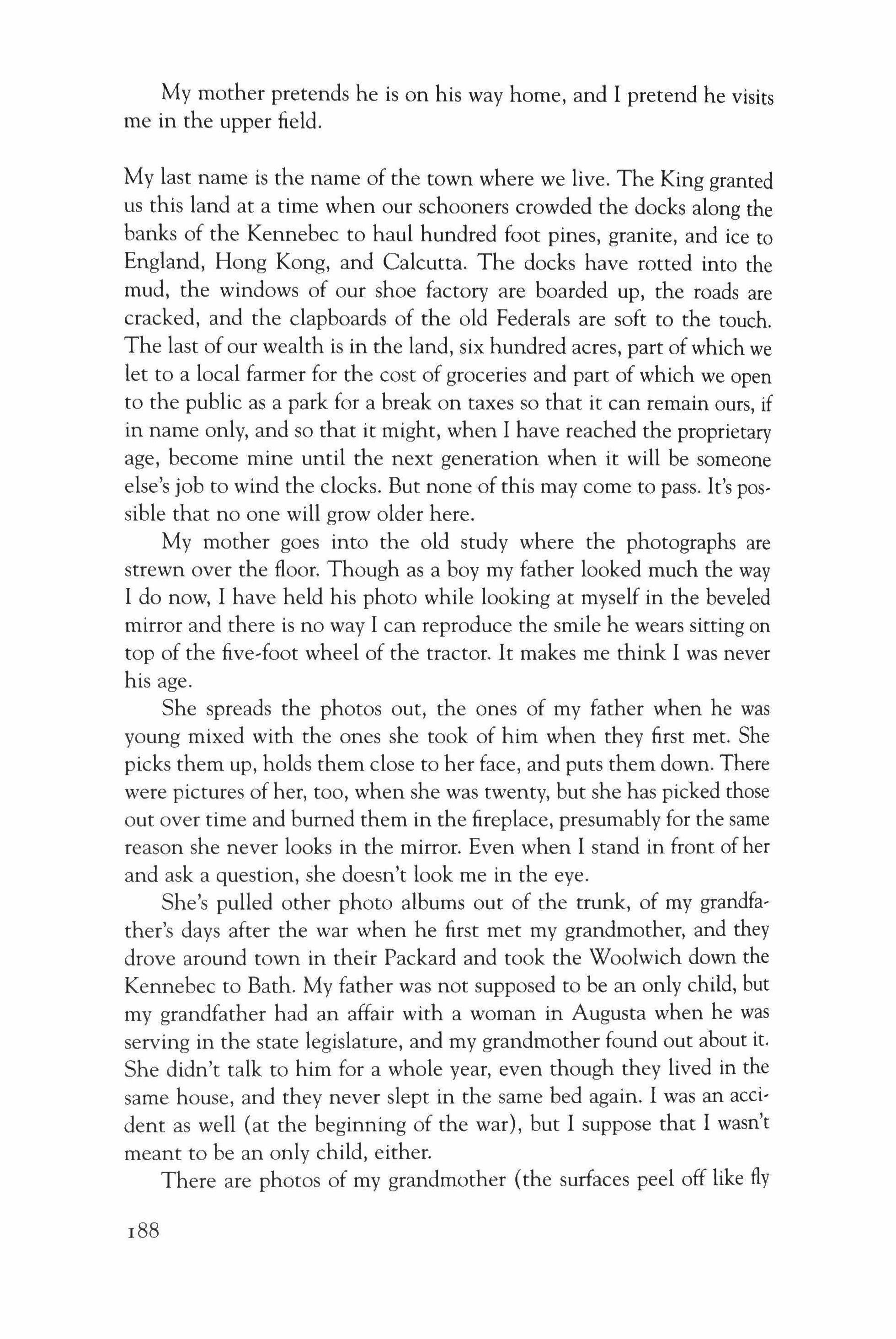
My mother pretends he is on his way home, and I pretend he visits me in the upper field.
My last name is the name of the town where we live. The King granted us this land at a time when our schooners crowded the docks along the banks of the Kennebec to haul hundred foot pines, granite, and ice to England, Hong Kong, and Calcutta. The docks have rotted into the mud, the windows of our shoe factory are boarded up, the roads are cracked, and the clapboards of the old Federals are soft to the touch. The last of our wealth is in the land, six hundred acres, part of which we let to a local farmer for the cost of groceries and part of which we open to the public as a park for a break on taxes so that it can remain ours, if in name only, and so that it might, when I have reached the proprietary age, become mine until the next generation when it will be someone else's job to wind the clocks. But none of this may come to pass. It's possible that no one will grow older here.
My mother goes into the old study where the photographs are strewn over the floor. Though as a boy my father looked much the way I do now, I have held his photo while looking at myself in the beveled mirror and there is no way I can reproduce the smile he wears sitting on top of the five-foot wheel of the tractor. It makes me think I was never his age.
She spreads the photos out, the ones of my father when he was young mixed with the ones she took of him when they first met. She picks them up, holds them close to her face, and puts them down. There were pictures of her, too, when she was twenty, but she has picked those out over time and burned them in the fireplace, presumably for the same reason she never looks in the mirror. Even when I stand in front of her and ask a question, she doesn't look me in the eye.
She's pulled other photo albums out of the trunk, of my grandfather's days after the war when he first met my grandmother, and they drove around town in their Packard and took the Woolwich down the Kennebec to Bath. My father was not supposed to be an only child, but my grandfather had an affair with a woman in Augusta when he was serving in the state legislature, and my grandmother found out about it. She didn't talk to him for a whole year, even though they lived in the same house, and they never slept in the same bed again. I was an accident as well (at the beginning of the war), but I suppose that I wasn't meant to be an only child, either.
There are photos of my grandmother (the surfaces peel off like fly
188

wings), and a tin photo of my great-grandfather sitting in a chair on the lawn (which has since overgrown with thistle and bayberry) just after he returned from the war. He sits in the chair as if in the saddle of a horse, his beard covering all but his stolid eyes. I often carry the tintype around in my pocket. If I tum it in the direct light, the image disappears. I carry several photos with me-I don't know why-and occasionally I exchange the ones I have for others in the pile, depending on how I feel.
Maybe I carry them because there are no photos of me anywhere in the house. I do worry that I might not be here at all.
My favorite picture is of my father when he was younger than I am now, sitting in a wicker chair with his eyes peacefully closed and his legs crossed and hands folded in his lap like an old man.
My mother turns and says I should stop sneaking up behind her, act my age, and busy myself with the toys she has bought for me. She covers up what she has been doing, as if embarrassed, goes downstairs to put a record on the phonograph, and sits in a wicker chair leaned up against the edge of the house near the open window. She falls asleep by the time the record finishes and doesn't hear the needle scratching over the middle of the disk. The sound reminds me of certain moments in old movies when an actor enters a room where someone they love has died.
I stand over her while she sleeps and ask her to stop waiting for my father, but she often stays up all night reading novels and can't be woken in the afternoons. Someone has to be awake in case he does come home, so I run outside to drag a branch along the jagged surface of the old stone wall, clicking off the seconds and holding my breath when I see barbed wire passing right through the middle of a tree trunk. It's bad luck otherwise.
I hear a car braking down the road, and the voices of kids from town handed through the leaves, but I see no one except the man now climbing to the upper field, a very fat man who used to be mayor before I was born. He ambles up the slope each day at this time, stopping every five or six steps to breathe. After a few minutes standing in the middle of the field, looking down the hill to the sluice and below that to the stream, he lies down and rests the back of his hand over his eyes. The starlings seem drunk in the grass. The yarrow and aster are past their bloom and the thrush's flute, so welcome a month ago, has started to strain. I think I can hear the webbed feet of the ducks pushing through the current of the river below the lower field.
My mother comes outside and rubs her eyes, looking into the old pool, which has been dry and cracked since long before I was born.
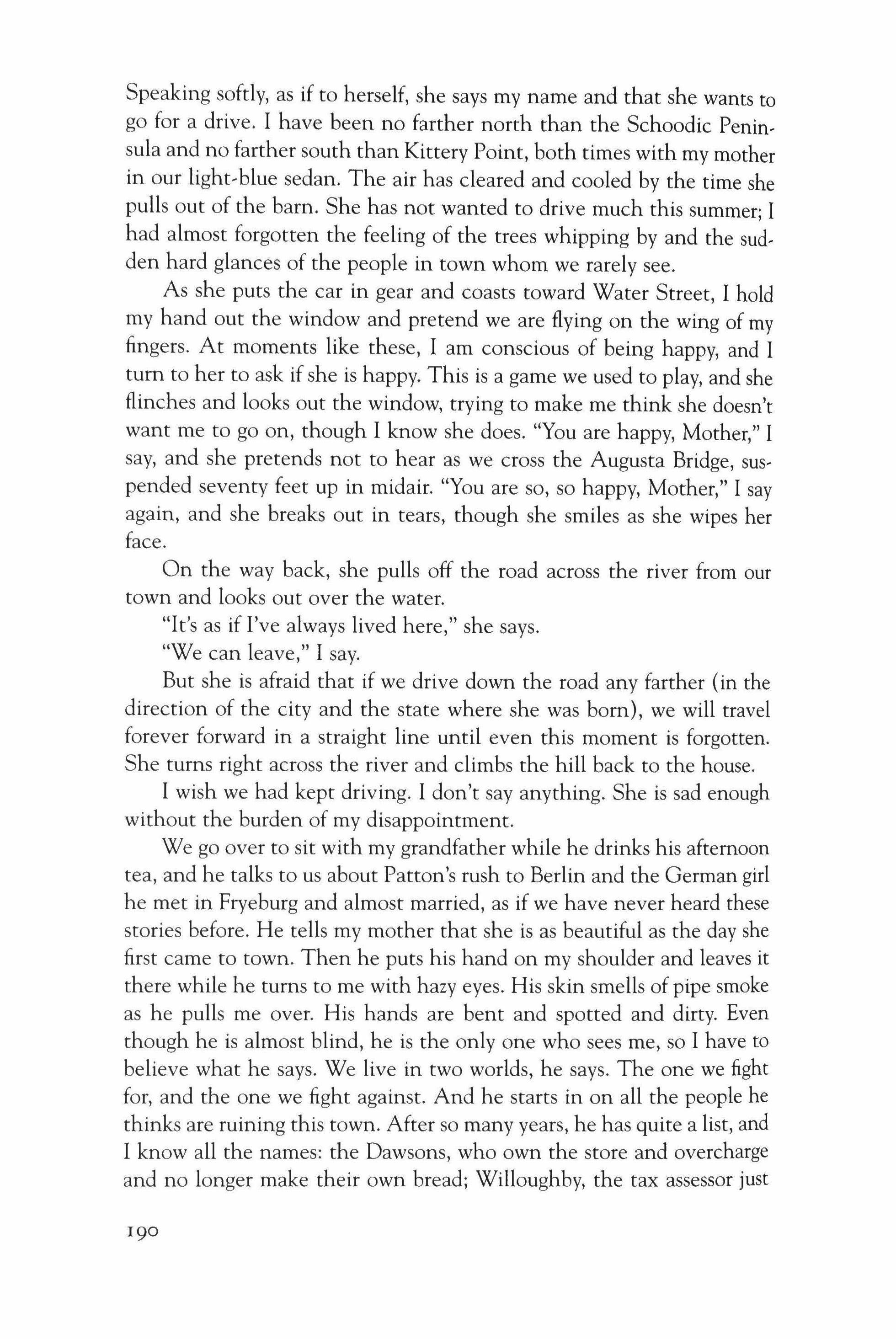
Speaking softly, as if to herself, she says my name and that she wants to go for a drive. I have been no farther north than the Schoodic Peninsula and no farther south than Kittery Point, both times with my mother in our light-blue sedan. The air has cleared and cooled by the time she pulls out of the barn. She has not wanted to drive much this summer; I had almost forgotten the feeling of the trees whipping by and the sudden hard glances of the people in town whom we rarely see.
As she puts the car in gear and coasts toward Water Street, I hold my hand out the window and pretend we are flying on the wing of my fingers. At moments like these, I am conscious of being happy, and I turn to her to ask if she is happy. This is a game we used to play, and she flinches and looks out the window, trying to make me think she doesn't want me to go on, though I know she does. "You are happy, Mother," I say, and she pretends not to hear as we cross the Augusta Bridge, suspended seventy feet up in midair. "You are so, so happy, Mother," I say again, and she breaks out in tears, though she smiles as she wipes her face.
On the way back, she pulls off the road across the river from our town and looks out over the water.
"It's as if I've always lived here," she says.
"We can leave," I say.
But she is afraid that if we drive down the road any farther (in the direction of the city and the state where she was born), we will travel forever forward in a straight line until even this moment is forgotten. She turns right across the river and climbs the hill back to the house.
I wish we had kept driving. I don't say anything. She is sad enough without the burden of my disappointment.
We go over to sit with my grandfather while he drinks his afternoon tea, and he talks to us about Patton's rush to Berlin and the German girl he met in Fryeburg and almost married, as if we have never heard these stories before. He tells my mother that she is as beautiful as the day she first came to town. Then he puts his hand on my shoulder and leaves it there while he turns to me with hazy eyes. His skin smells of pipe smoke as he pulls me over. His hands are bent and spotted and dirty. Even though he is almost blind, he is the only one who sees me, so I have to believe what he says. We live in two worlds, he says. The one we fight for, and the one we fight against. And he starts in on all the people he thinks are ruining this town. After so many years, he has quite a list, and I know all the names: the Dawsons, who own the store and overcharge and no longer make their own bread; Willoughby, the tax assessor just

down the road; the Nasons; Mrs. Molloy; the MacDonalds, both of them; and so on. Someone wants to build a new school, someone lets their kids chase his cows through the field, someone's father said to my grandfather in a town meeting thirty-five years ago that he was a fool.
As my mother and I walk back across the road, I think that someday, if I am fortunate, I will have a few friends and sometimes, coming home with them after school, will think of myself as one of them. But even then as I walk along, led down the slope of the valley by the dark chimneys against the metal sky, it will be impossible not to remember this time, standing above the house with my fingertips resting on the high grass as I look up and see a single-engine plane bank over the river, disappear in the late afternoon glare, and reappear downriver, heading east toward Richmond. There is something in this moment beyond the sight of the plane's white wings turning in the currents that recalls a time I can't quite reach, leaving me with the sense that I have been here before.
I walk through the side door and pass the portraits in the dark stairwell leading up to the third floor, where discarded furniture is stored in the spare rooms, the spindles and legs cluttered together like piles of weapons from a defeated army. No one ever painted portraits of mothers, grandmothers, daughters or the boys who died young (no one will ever paint me), but we live here, too, in the contours of the buckling plaster.
My mother goes back to bed downstairs, and I sit in an armless rocking chair to wait for her to get up. I listen for the door in case I have to speak for her if someone knocks-I've learned to speak as adults do. Today I hear only the strange calls of the cicadas in the grass; my mother also hears them as she closes her eyes and pulls the frayed white sheet up around her neck. We wait so long for summer this far north that it seems to last forever when it arrives, bloating the air with the smell of wet mud at low tide. My mother is tired; I am tired, too, but I need to slow every moment of daylight against the coming dusk, when it will feel as though the river is everywhere all around me while what little I remember-the last year, the last two years-will expand to fill more than the history of my name in this town. Even now, there is still time left (after the heat has silenced the birds and if the train is not coming and if the river is at the tum of the tide and if the breeze is still) for it to be quiet before dark. I can hear my grandfather mowing the small lawn in front of his house with his rusty push mower, but then he stops, and the cicadas are silent.
When he forgets that I am listening and talks as if to himself, this is what my father tells me in the upper field: There's an old man who lives
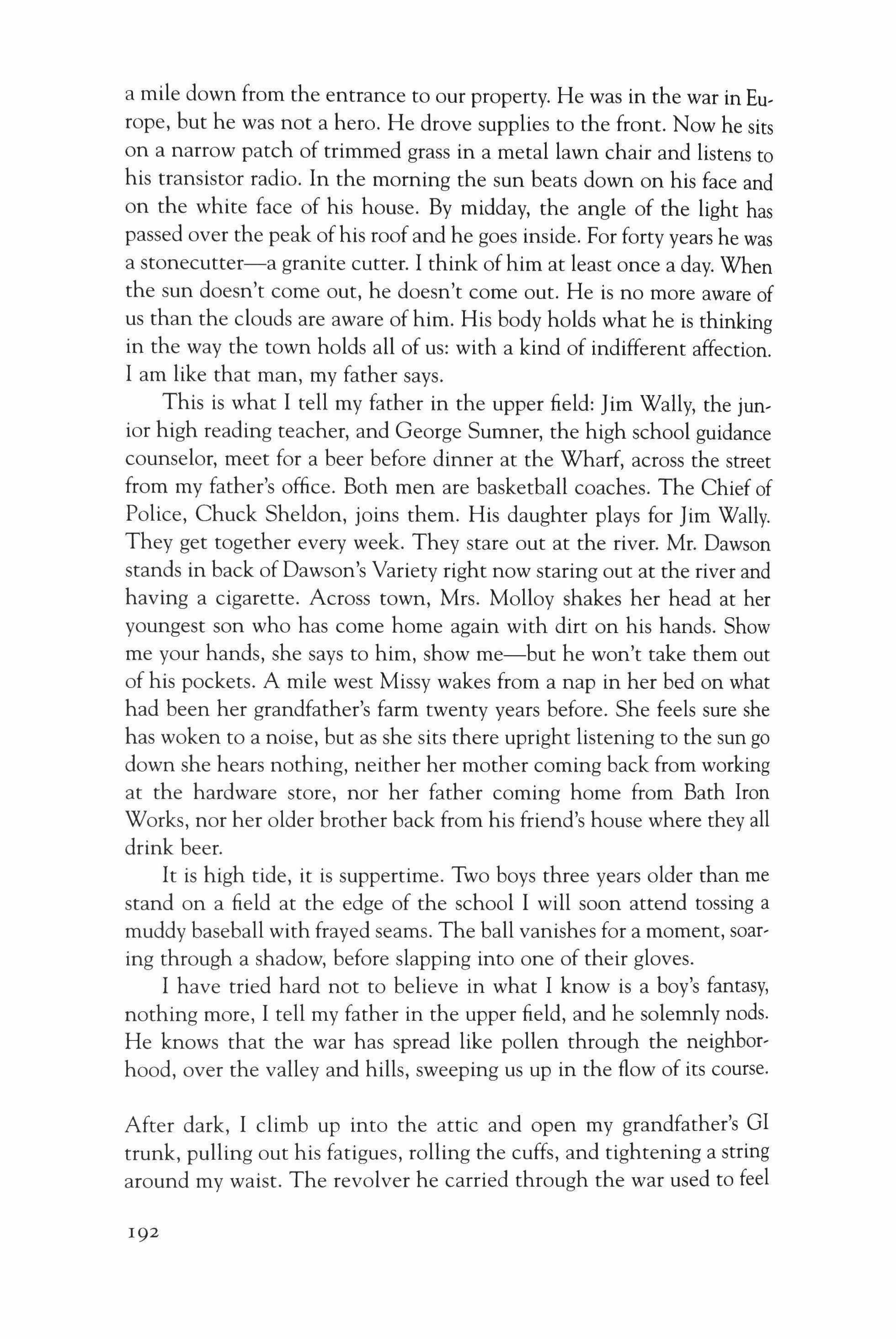
a mile down from the entrance to our property. He was in the war in Europe, but he was not a hero. He drove supplies to the front. Now he sits on a narrow patch of trimmed grass in a metal lawn chair and listens to his transistor radio. In the morning the sun beats down on his face and on the white face of his house. By midday, the angle of the light has passed over the peak ofhis roof and he goes inside. For forty years he was a stonecutter-a granite cutter. I think of him at least once a day. When the sun doesn't come out, he doesn't come out. He is no more aware of us than the clouds are aware of him. His body holds what he is thinking in the way the town holds all of us: with a kind of indifferent affection. I am like that man, my father says.
This is what I tell my father in the upper field: Jim Wally, the junior high reading teacher, and George Sumner, the high school guidance counselor, meet for a beer before dinner at the Wharf, across the street from my father's office. Both men are basketball coaches. The Chief of Police, Chuck Sheldon, joins them. His daughter plays for Jim Wally. They get together every week. They stare out at the river. Mr. Dawson stands in back of Dawson's Variety right now staring out at the river and having a cigarette. Across town, Mrs. Molloy shakes her head at her youngest son who has come home again with dirt on his hands. Show me your hands, she says to him, show me-but he won't take them out of his pockets. A mile west Missy wakes from a nap in her bed on what had been her grandfather's farm twenty years before. She feels sure she has woken to a noise, but as she sits there upright listening to the sun go down she hears nothing, neither her mother coming back from working at the hardware store, nor her father coming home from Bath Iron Works, nor her older brother back from his friend's house where they all drink beer.
It is high tide, it is suppertime. Two boys three years older than me stand on a field at the edge of the school I will soon attend tossing a muddy baseball with frayed seams. The ball vanishes for a moment, soaring through a shadow, before slapping into one of their gloves.
I have tried hard not to believe in what I know is a boy's fantasy, nothing more, I tell my father in the upper field, and he solemnly nods. He knows that the war has spread like pollen through the neighborhood, over the valley and hills, sweeping us up in the flow of its course.
After dark, I climb up into the attic and open my grandfather's 01 trunk, pulling out his fatigues, rolling the cuffs, and tightening a string around my waist. The revolver he carried through the war used to feel
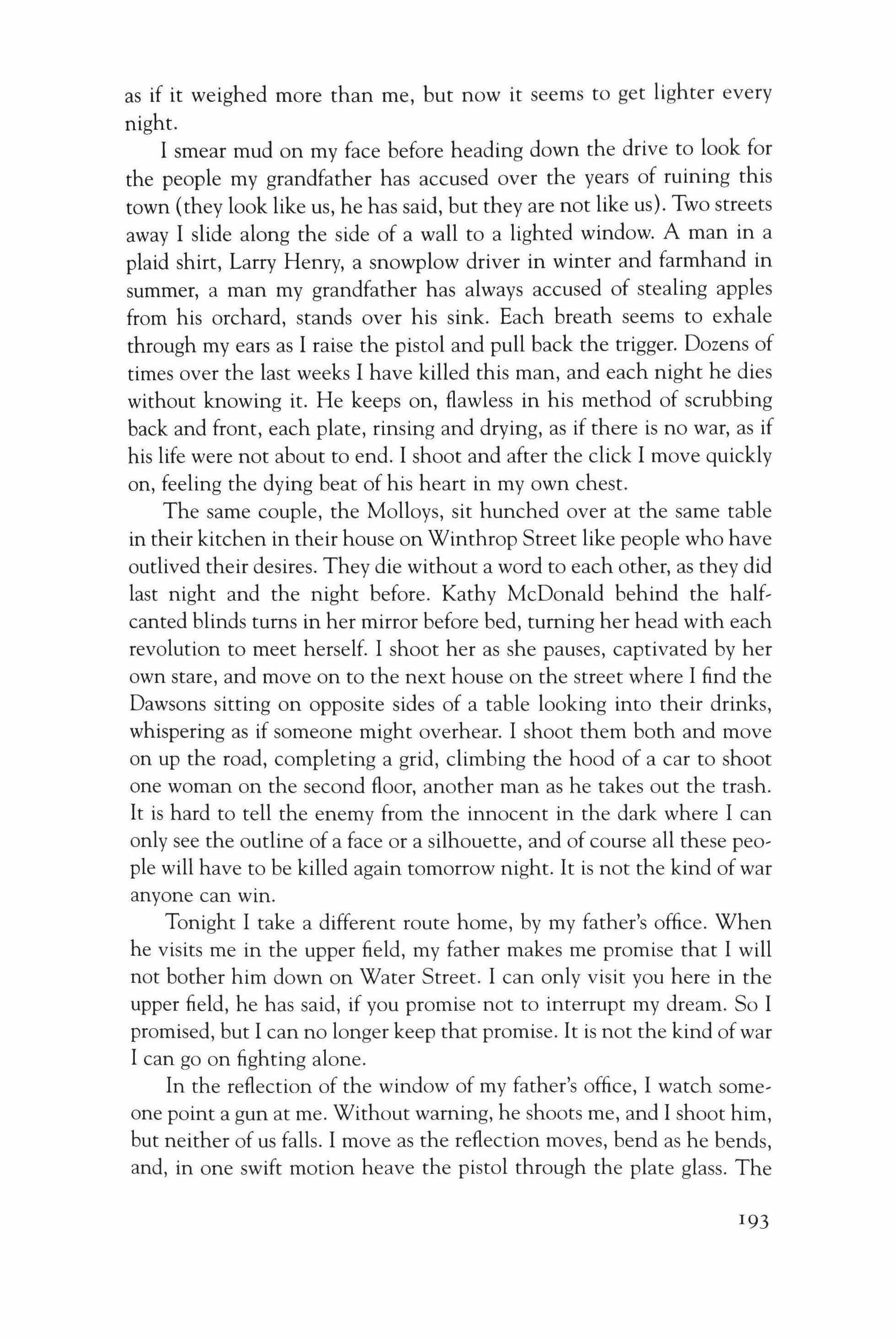
as if it weighed more than me, but now it seems to get lighter every night.
I smear mud on my face before heading down the drive to look for the people my grandfather has accused over the years of ruining this town (they look like us, he has said, but they are not like us). Two streets away I slide along the side of a wall to a lighted window. A man in a plaid shirt, Larry Henry, a snowplow driver in winter and farmhand in summer, a man my grandfather has always accused of stealing apples from his orchard, stands over his sink. Each breath seems to exhale through my ears as I raise the pistol and pull back the trigger. Dozens of times over the last weeks I have killed this man, and each night he dies without knowing it. He keeps on, flawless in his method of scrubbing back and front, each plate, rinsing and drying, as if there is no war, as if his life were not about to end. I shoot and after the click I move quickly on, feeling the dying beat of his heart in my own chest.
The same couple, the Molloys, sit hunched over at the same table in their kitchen in their house on Winthrop Street like people who have outlived their desires. They die without a word to each other, as they did last night and the night before. Kathy McDonald behind the halfcanted blinds turns in her mirror before bed, turning her head with each revolution to meet herself. I shoot her as she pauses, captivated by her own stare, and move on to the next house on the street where I find the Dawsons sitting on opposite sides of a table looking into their drinks, whispering as if someone might overhear. I shoot them both and move on up the road, completing a grid, climbing the hood of a car to shoot one woman on the second floor, another man as he takes out the trash. It is hard to tell the enemy from the innocent in the dark where I can only see the outline of a face or a silhouette, and of course all these people will have to be killed again tomorrow night. It is not the kind of war anyone can win.
Tonight I take a different route home, by my father's office. When he visits me in the upper field, my father makes me promise that I will not bother him down on Water Street. I can only visit you here in the upper field, he has said, if you promise not to interrupt my dream. So I promised, but I can no longer keep that promise. It is not the kind of war I can go on fighting alone.
In the reflection of the window of my father's office, I watch someone point a gun at me. Without warning, he shoots me, and I shoot him, but neither of us falls. I move as the reflection moves, bend as he bends, and, in one swift motion heave the pistol through the plate glass. The
193

shatter tumbles down the empty street and echoes with the snap of a distant shot. When I pull away from the gaping hole, a small shard sticks in the top of my wrist, and a black trickle flows down between my knuckles.
My father, who has been waiting all this time for an attack, comes out of the back room to see glass spread over his desk and the blue metal of his grandfather's pistol lying on the floor. He recognizes the gun, even if he doesn't recognize me. His hands shake. He is dirty and unshaven. He can't remember how the fighting started anymore than I can, but he has been fighting all along, I can see, rising and falling and rising, without rest, behind the locked door of his office.
The days are peaceful here in Vaughn, I try to explain to my father, in case he has forgotten, but after the sun falls over the western hill, all the people we have known in the daylight fight against us. I would gladly think otherwise, I say to him, but I cannot. I ask him to tell me to think otherwise, but he doesn't, and the distant voices of our enemies, whispered in bedrooms all over town, become the gathering threads of a current that pulls us east toward the mouth of the river.
194
Mitch Wieland
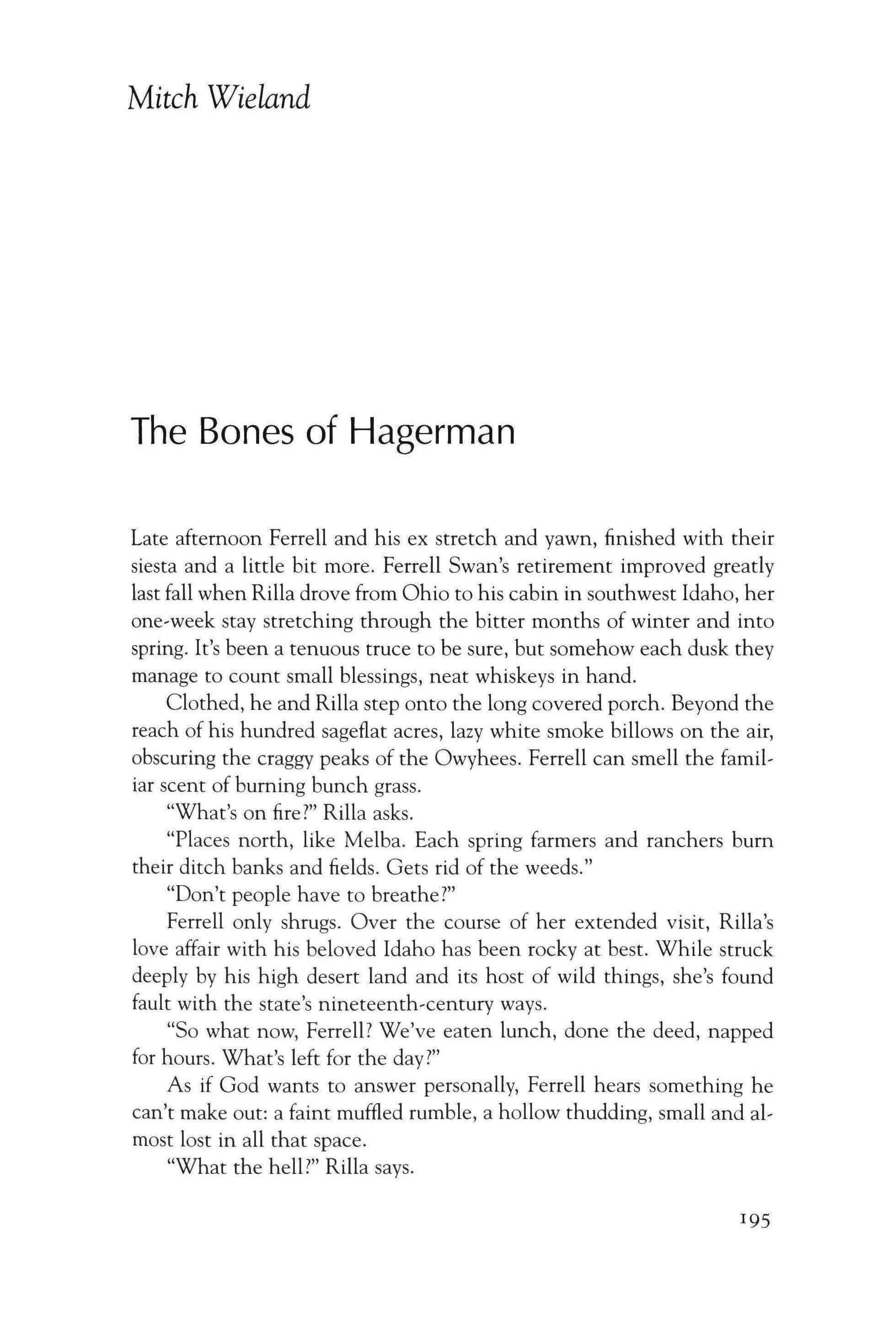
The Bones of Hagerman
Late afternoon Ferrell and his ex stretch and yawn, finished with their siesta and a little bit more. Ferrell Swan's retirement improved greatly last fall when Rilla drove from Ohio to his cabin in southwest Idaho, her one-week stay stretching through the bitter months of winter and into spring. It's been a tenuous truce to be sure, but somehow each dusk they manage to count small blessings, neat whiskeys in hand.
Clothed, he and Rilla step onto the long covered porch. Beyond the reach of his hundred sageflat acres, lazy white smoke billows on the air, obscuring the craggy peaks of the Owyhees. Ferrell can smell the familiar scent of burning bunch grass.
"What's on fire?" Rilla asks.
"Places north, like Melba. Each spring farmers and ranchers bum their ditch banks and fields. Gets rid of the weeds."
"Don't people have to breathe?"
Ferrell only shrugs. Over the course of her extended visit, Rilla's love affair with his beloved Idaho has been rocky at best. While struck deeply by his high desert land and its host of wild things, she's found fault with the state's nineteenth-century ways.
"So what now, Ferrell? We've eaten lunch, done the deed, napped for hours. What's left for the day?"
As if God wants to answer personally, Ferrell hears something he can't make out: a faint muffled rumble, a hollow thudding, small and almost lost in all that space.
"What the hell?" Rilla says.
195
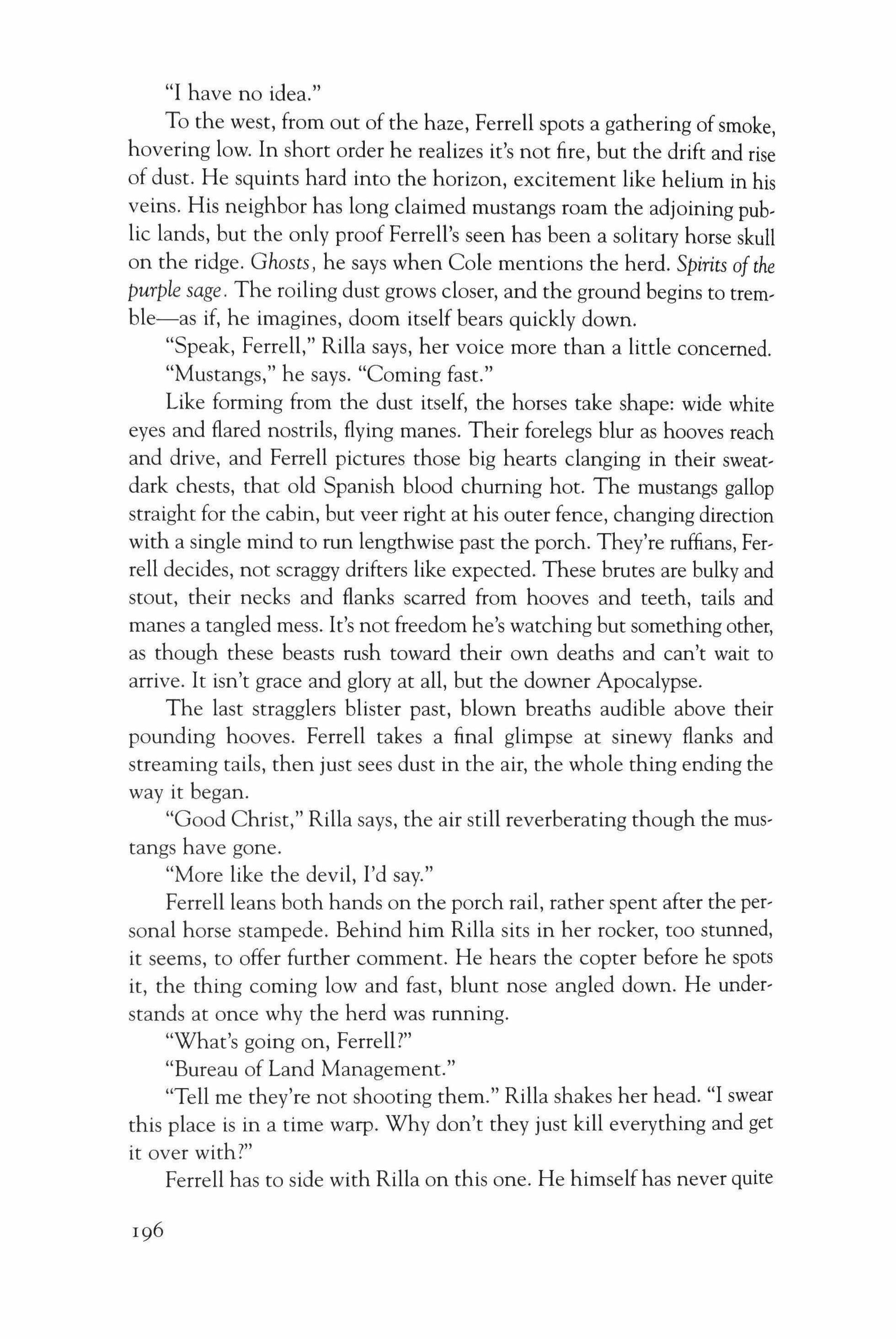
"I have no idea."
To the west, from out of the haze, Ferrell spots a gathering of smoke, hovering low. In short order he realizes it's not fire, but the drift and rise of dust. He squints hard into the horizon, excitement like helium in his veins. His neighbor has long claimed mustangs roam the adjoining public lands, but the only proof Ferrell's seen has been a solitary horse skull on the ridge. Ghosts, he says when Cole mentions the herd. Spirits of the purple sage. The roiling dust grows closer, and the ground begins to tremble-as if, he imagines, doom itself bears quickly down.
"Speak, Ferrell," Rilla says, her voice more than a little concerned.
"Mustangs," he says. "Coming fast."
Like forming from the dust itself, the horses take shape: wide white eyes and flared nostrils, flying manes. Their forelegs blur as hooves reach and drive, and Ferrell pictures those big hearts clanging in their sweatdark chests, that old Spanish blood churning hot. The mustangs gallop straight for the cabin, but veer right at his outer fence, changing direction with a single mind to run lengthwise past the porch. They're ruffians, Ferrell decides, not scraggy drifters like expected. These brutes are bulky and stout, their necks and flanks scarred from hooves and teeth, tails and manes a tangled mess. It's not freedom he's watching but something other, as though these beasts rush toward their own deaths and can't wait to arrive. It isn't grace and glory at all, but the downer Apocalypse.
The last stragglers blister past, blown breaths audible above their pounding hooves. Ferrell takes a final glimpse at sinewy flanks and streaming tails, then just sees dust in the air, the whole thing ending the way it began.
"Good Christ," Rilla says, the air still reverberating though the mustangs have gone.
"More like the devil, I'd say."
Ferrell leans both hands on the porch rail, rather spent after the personal horse stampede. Behind him Rilla sits in her rocker, too stunned, it seems, to offer further comment. He hears the copter before he spots it, the thing coming low and fast, blunt nose angled down. He understands at once why the herd was running.
"What's going on, Ferrell?"
"Bureau of Land Management."
"Tell me they're not shooting them." Rilla shakes her head. "I swear this place is in a time warp. Why don't they just kill everything and get it over with?"
Ferrell has to side with Rilla on this one. He himselfhas never quite
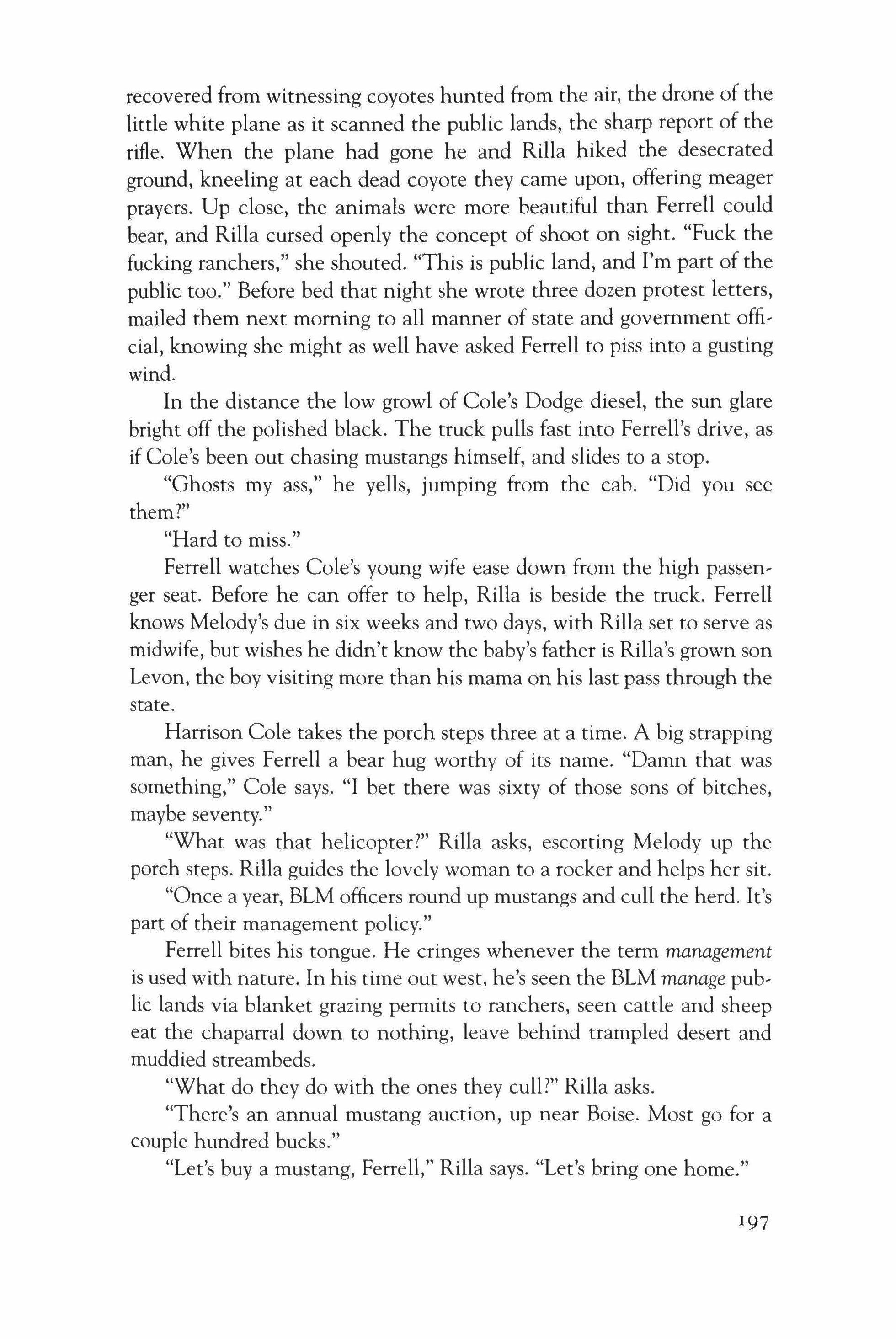
recovered from witnessing coyotes hunted from the air, the drone of the little white plane as it scanned the public lands, the sharp report of the rifle. When the plane had gone he and Rilla hiked the desecrated ground, kneeling at each dead coyote they came upon, offering meager prayers. Up close, the animals were more beautiful than Ferrell could bear, and Rilla cursed openly the concept of shoot on sight. "Fuck the fucking ranchers," she shouted. "This is public land, and I'm part of the public too." Before bed that night she wrote three dozen protest letters, mailed them next morning to all manner of state and government official, knowing she might as well have asked Ferrell to piss into a gusting wind.
In the distance the low growl of Cole's Dodge diesel, the sun glare bright off the polished black. The truck pulls fast into Ferrell's drive, as if Cole's been out chasing mustangs himself, and slides to a stop.
"Ghosts my ass," he yells, jumping from the cab. "Did you see them?"
"Hard to miss."
Ferrell watches Cole's young wife ease down from the high passenger seat. Before he can offer to help, Rilla is beside the truck. Ferrell knows Melody's due in six weeks and two days, with Rilla set to serve as midwife, but wishes he didn't know the baby's father is Rilla's grown son Levon, the boy visiting more than his mama on his last pass through the state.
Harrison Cole takes the porch steps three at a time. A big strapping man, he gives Ferrell a bear hug worthy of its name. "Damn that was something," Cole says. "I bet there was sixty of those sons of bitches, maybe seventy."
"What was that helicopter?" Rilla asks, escorting Melody up the porch steps. Rilla guides the lovely woman to a rocker and helps her sit.
"Once a year, BLM officers round up mustangs and cull the herd. It's part of their management policy."
Ferrell bites his tongue. He cringes whenever the term management is used with nature. In his time out west, he's seen the BLM manage pub, lie lands via blanket grazing permits to ranchers, seen cattle and sheep eat the chaparral down to nothing, leave behind trampled desert and muddied streambeds.
"What do they do with the ones they cull?" Rilla asks.
"There's an annual mustang auction, up near Boise. Most go for a couple hundred bucks."
"Let's buy a mustang, Ferrell," Rilla says. "Let's bring one home."
197

"But you haven't ridden in years."
"But I rode for years, Ferrell. It's not like you forget."
Ferrell gazes across the empty miles stretching from his porch. He sees himself tall in the saddle, riding the range like outlaws of old. It's never dawned on him to actually buy a horse, to roam at will the vistas he so dearly loves. From the cobwebby shelves of his mind comes Ferrell's long dead father, how the man watched every cowboy matinee ever shown, all those TV westerns where heroes drew first and bad guys died without bleeding. His father, despite his fascination with horses and the West, never once climbed into a saddle.
"Well, Ferrell?" Rilla says. "Will you buy a girl a mustang?"
"Can you teach a boy to ride?"
As for bloodlines both Ferrell's grandfathers were farmers, as were his legion of uncles, tough men who worked brutal hours, their bodies busted up bad from life in the fields. In high school, Ferrell's daddy chose the vocational route, figured standing all day at a drill press or lathe beat hustling butt on the farm, beat bucking tons of hay, or plowing from first light to good dark. But his daddy was a flesh and blood contradiction, and despite his denial of the farmer's life, he dreamed daily of the West, of cowboys riding beneath the high hot sun. At the time it was beyond Ferrell how the poor man could transform a cattle drive into something other than days of heatstroke and an aching ass.
"At least a tractor won't buck you off," Ferrell said once at dinner. "A John Deere won't kick you dead."
"You don't understand the way of the saddle."
"And you do?"
"I've learned much from the old boob tube."
"You're romanticizing those stupid shows," Ferrell said, a notion recently picked up from his ninth grade literature class. "You've seen too many Roy Rogers flicks."
His dad looked down at his plate. "You'll have dreams someday," he said. "You'll understand what sustenance they provide."
Five days after the mustang roundup, Ferrell drives the seventy miles to Boise with Rilla at his side. Having his ex in the truck recalls her enthusiastic teenage years, all those mornings taking Rilla to school in his beat-up Ford, the dizzying things she did in the shadows of the cab. Most days he can't believe the decades he's known this woman, how many deeply private acts have passed between them.
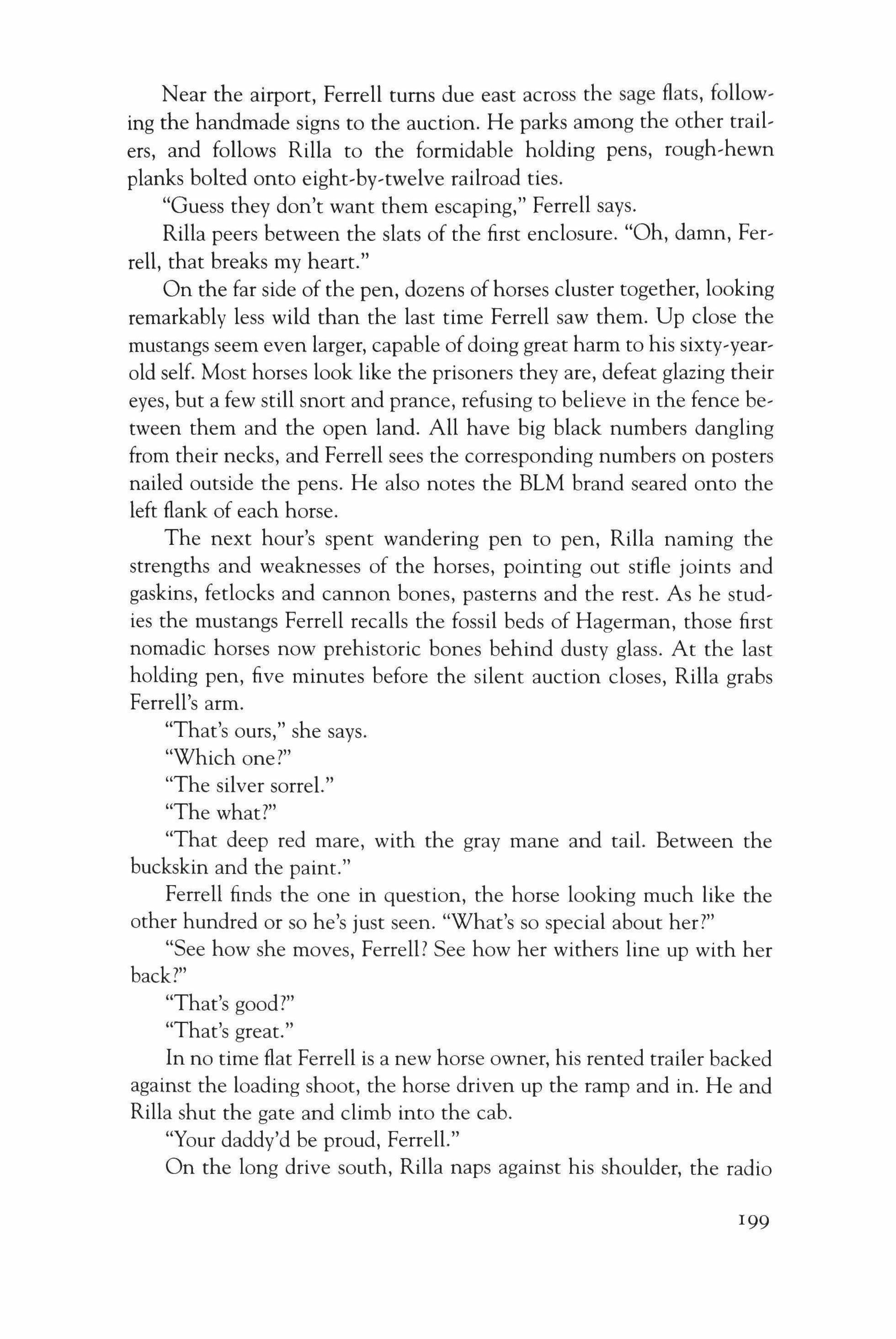
Near the airport, Ferrell turns due east across the sage flats, following the handmade signs to the auction. He parks among the other trailers, and follows Rilla to the formidable holding pens, rough-hewn planks bolted onto eight-by-twelve railroad ties.
"Guess they don't want them escaping," Ferrell says.
Rilla peers between the slats of the first enclosure. "Oh, damn, Ferrell, that breaks my heart."
On the far side of the pen, dozens of horses cluster together, looking remarkably less wild than the last time Ferrell saw them. Up close the mustangs seem even larger, capable ofdoing great harm to his sixty-yearold self. Most horses look like the prisoners they are, defeat glazing their eyes, but a few still snort and prance, refusing to believe in the fence between them and the open land. All have big black numbers dangling from their necks, and Ferrell sees the corresponding numbers on posters nailed outside the pens. He also notes the BLM brand seared onto the left flank of each horse.
The next hour's spent wandering pen to pen, Rilla naming the strengths and weaknesses of the horses, pointing out stifle joints and gaskins, fetlocks and cannon bones, pasterns and the rest. As he studies the mustangs Ferrell recalls the fossil beds of Hagerman, those first nomadic horses now prehistoric bones behind dusty glass. At the last holding pen, five minutes before the silent auction closes, Rilla grabs Ferrell's arm.
"That's ours," she says.
"Which one?"
"The silver sorrel."
"The what?"
"That deep red mare, with the gray mane and tail. Between the buckskin and the paint."
Ferrell finds the one in question, the horse looking much like the other hundred or so he's just seen. "What's so special about her?"
"See how she moves, Ferrell? See how her withers line up with her back?"
"That's good?"
"That's great."
In no time flat Ferrell is a new horse owner, his rented trailer backed against the loading shoot, the horse driven up the ramp and in. He and Rilla shut the gate and climb into the cab.
"Your daddy'd be proud, Ferrell."
On the long drive south, Rilla naps against his shoulder, the radio
199
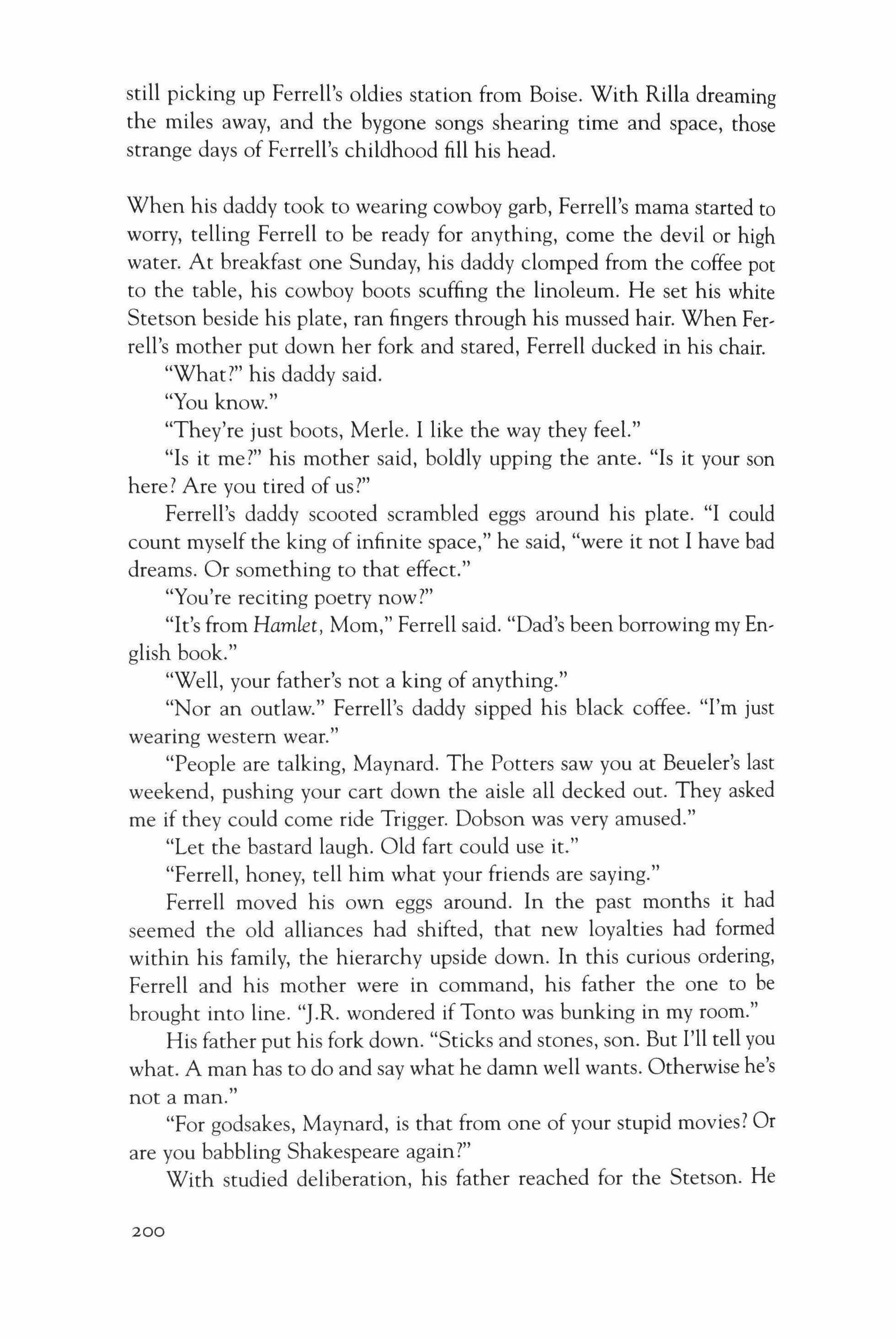
still picking up Ferrell's oldies station from Boise. With Rilla dreaming the miles away, and the bygone songs shearing time and space, those strange days of Ferrell's childhood fill his head.
When his daddy took to wearing cowboy garb, Ferrell's mama started to worry, telling Ferrell to be ready for anything, come the devil or high water. At breakfast one Sunday, his daddy clamped from the coffee pot to the table, his cowboy boots scuffing the linoleum. He set his white Stetson beside his plate, ran fingers through his mussed hair. When Ferrell's mother put down her fork and stared, Ferrell ducked in his chair.
"What?" his daddy said.
"You know."
"They're just boots, Merle. I like the way they feel."
"Is it me?" his mother said, boldly upping the ante. "Is it your son here? Are you tired of us?"
Ferrell's daddy scooted scrambled eggs around his plate. "I could count myself the king of infinite space," he said, "were it not I have bad dreams. Or something to that effect."
"You're reciting poetry now?"
"It's from Hamlet, Mom," Ferrell said. "Dad's been borrowing my English book."
"Well, your father's not a king of anything."
"Nor an outlaw." Ferrell's daddy sipped his black coffee. "I'm just wearing western wear."
"People are talking, Maynard. The Potters saw you at Beueler's last weekend, pushing your cart down the aisle all decked out. They asked me if they could come ride Trigger. Dobson was very amused."
"Let the bastard laugh. Old fart could use it."
"Ferrell, honey, tell him what your friends are saying."
Ferrell moved his own eggs around. In the past months it had seemed the old alliances had shifted, that new loyalties had formed within his family, the hierarchy upside down. In this curious ordering, Ferrell and his mother were in command, his father the one to be brought into line. "J.R. wondered if Tonto was bunking in my room."
His father put his fork down. "Sticks and stones, son. But I'll tell you what. A man has to do and say what he damn well wants. Otherwise he's not a man."
"For godsakes, Maynard, is that from one of your stupid movies? Or are you babbling Shakespeare again?"
With studied deliberation, his father reached for the Stetson. He
200
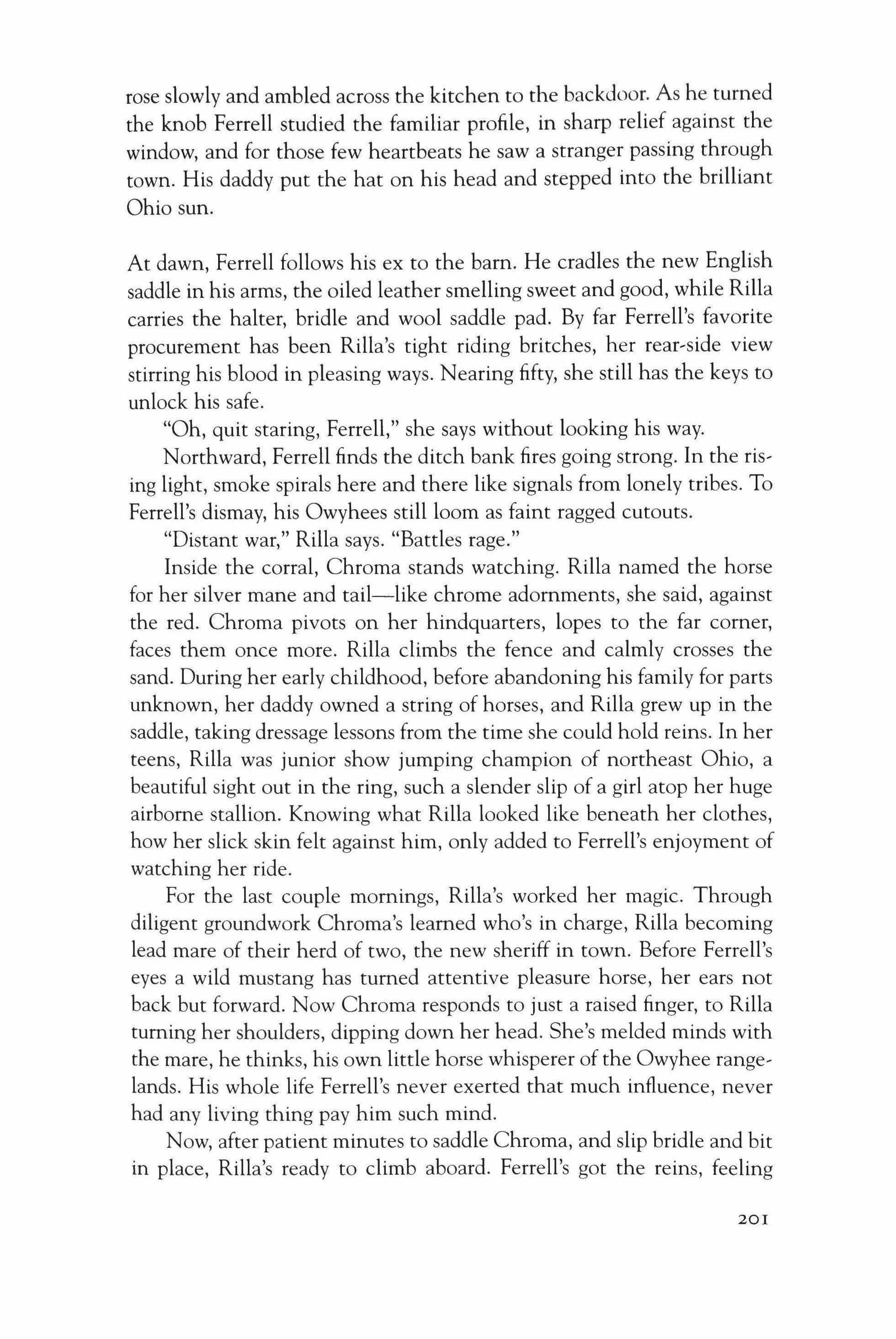
rose slowly and ambled across the kitchen to the backdoor. As he turned the knob Ferrell studied the familiar profile, in sharp relief against the window, and for those few heartbeats he saw a stranger passing through town. His daddy put the hat on his head and stepped into the brilliant Ohio sun.
At dawn, Ferrell follows his ex to the barn. He cradles the new English saddle in his arms, the oiled leather smelling sweet and good, while Rilla carries the halter, bridle and wool saddle pad. By far Ferrell's favorite procurement has been Rilla's tight riding britches, her rear-side view stirring his blood in pleasing ways. Nearing fifty, she still has the keys to unlock his safe.
"Oh, quit staring, Ferrell," she says without looking his way.
Northward, Ferrell finds the ditch bank fires going strong. In the rising light, smoke spirals here and there like signals from lonely tribes. To Ferrell's dismay, his Owyhees still loom as faint ragged cutouts.
"Distant war," Rilla says. "Battles rage."
Inside the corral, Chroma stands watching. Rilla named the horse for her silver mane and tail-like chrome adornments, she said, against the red. Chroma pivots on her hindquarters, lopes to the far corner, faces them once more. Rilla climbs the fence and calmly crosses the sand. During her early childhood, before abandoning his family for parts unknown, her daddy owned a string of horses, and Rilla grew up in the saddle, taking dressage lessons from the time she could hold reins. In her teens, Rilla was junior show jumping champion of northeast Ohio, a beautiful sight out in the ring, such a slender slip of a girl atop her huge airborne stallion. Knowing what Rilla looked like beneath her clothes, how her slick skin felt against him, only added to Ferrell's enjoyment of watching her ride.
For the last couple mornings, Rilla's worked her magic. Through diligent groundwork Chroma's learned who's in charge, Rilla becoming lead mare of their herd of two, the new sheriff in town. Before Ferrell's eyes a wild mustang has turned attentive pleasure horse, her ears not back but forward. Now Chroma responds to just a raised finger, to Rilla turning her shoulders, dipping down her head. She's melded minds with the mare, he thinks, his own little horse whisperer of the Owyhee rangelands. His whole life Ferrell's never exerted that much influence, never had any living thing pay him such mind.
Now, after patient minutes to saddle Chroma, and slip bridle and bit in place, Rilla's ready to climb aboard. Ferrell's got the reins, feeling
201

small beside the strongly muscled chest. The sparkling bridle headband transforms the mustang into royalty come to visit their lowly ranch.
"She looks like a princess, Rilla."
"Oh, she is," Rilla says, leading the horse in a few tight circles. She sets the reins in place and it's all systems go. "Look out, Ferrell. She'll probably move the second my butt hits the saddle. I'll bet she just loves to go."
Rilla slips a boot in the silver stirrup, and drum rolls play inside Ferrell's head. Then she rises to the saddle, the horse takes off, and Rilla is an angel with her wings restored. Ferrell resists going romantic on the moment, getting too dam sentimental, but he can't fight it off: Rilla is goddamn beautiful up there, and violins have begun to play. She signals to the horse in some way Ferrell can't see, and Chroma gears up into a canter, practically floats around the corral. His ex circles him in a wide orbit, her flying ponytail a miniature version of Chroma's own. Rilla's face flushes with joy, and the mare's flanks shine with sweat, but still they ride, around and around where Ferrell stands in the center as a fiery sun.
In the months before his departure, Ferrell's daddy built himself a room in their damp basement, just to the right of the tidy workbench. He started one night after supper, the hammering downstairs like he fought some dungeon monster, and the room was framed and drywalled when Ferrell left for school in the morning. By the time the bus dropped him off, his daddy had the door hung and locked, and his mother was nowhere in the house. Ferrell didn't know what else to do but knock. His daddy answered the door with paint specks in his hair.
"You seen Mom?"
His daddy gaped at him, as if he didn't quite know of whom Ferrell spoke. "She's at your grandmother's," he said at last.
"Did she say when she'd be back?"
"When hell grows cold and frosty."
His daddy turned back into the room, and Ferrell followed before the door could close. Inside he found white walls and pale blue shag, an army cot and portable television. Left of the door, their red ice chest sat beneath the folding card table with a hot plate and toaster. The room smelled of paint and new carpet and his daddy's own potent sweat.
"Want a beer?" his daddy said.
"So you're living down here?"
"I wouldn't call it living, but this is my new abode."
"In the basement?"
202
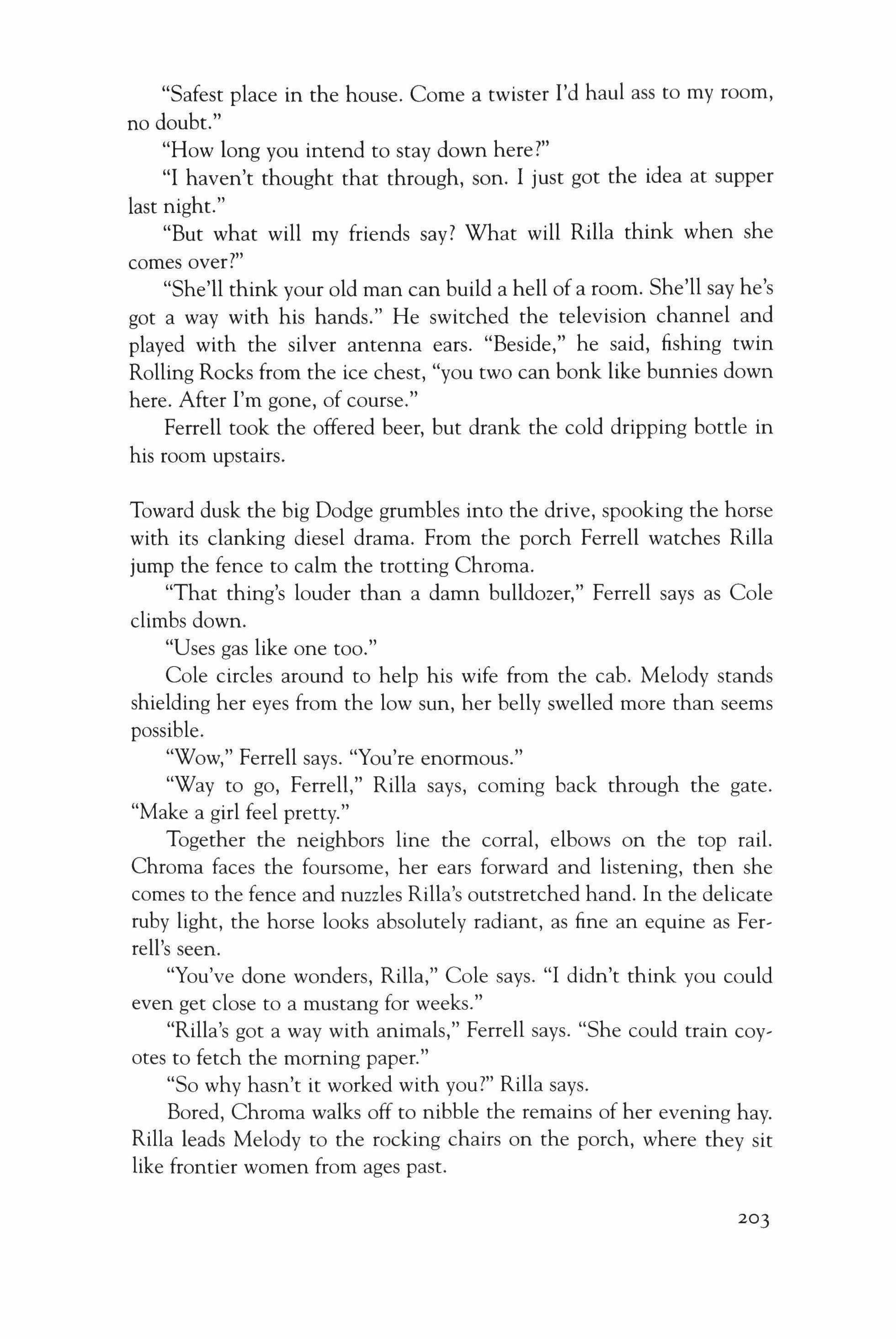
"Safest place in the house. Come a twister I'd haul ass to my room, no doubt."
"How long you intend to stay down here?"
"I haven't thought that through, son. I just got the idea at supper last night."
"But what will my friends say? What will Rilla think when she comes over?"
"She'll think your old man can build a hell of a room. She'll say he's got a way with his hands." He switched the television channel and played with the silver antenna ears. "Beside," he said, fishing twin Rolling Rocks from the ice chest, "you two can bonk like bunnies down here. After I'm gone, of course."
Ferrell took the offered beer, but drank the cold dripping bottle in his room upstairs.
Toward dusk the big Dodge grumbles into the drive, spooking the horse with its clanking diesel drama. From the porch Ferrell watches Rilla jump the fence to calm the trotting Chroma.
"That thing's louder than a damn bulldozer," Ferrell says as Cole climbs down.
"Uses gas like one too."
Cole circles around to help his wife from the cab. Melody stands shielding her eyes from the low sun, her belly swelled more than seems possible.
"Wow," Ferrell says. "You're enormous."
"Way to go, Ferrell," Rilla says, coming back through the gate. "Make a girl feel pretty."
Together the neighbors line the corral, elbows on the top rail. Chroma faces the foursome, her ears forward and listening, then she comes to the fence and nuzzles Rilla's outstretched hand. In the delicate ruby light, the horse looks absolutely radiant, as fine an equine as Ferrell's seen.
"You've done wonders, Rilla," Cole says. "I didn't think you could even get close to a mustang for weeks."
"Rilla's got a way with animals," Ferrell says. "She could train coyotes to fetch the morning paper."
"So why hasn't it worked with you?" Rilla says.
Bored, Chroma walks off to nibble the remains of her evening hay. Rilla leads Melody to the rocking chairs on the porch, where they sit like frontier women from ages past.
203
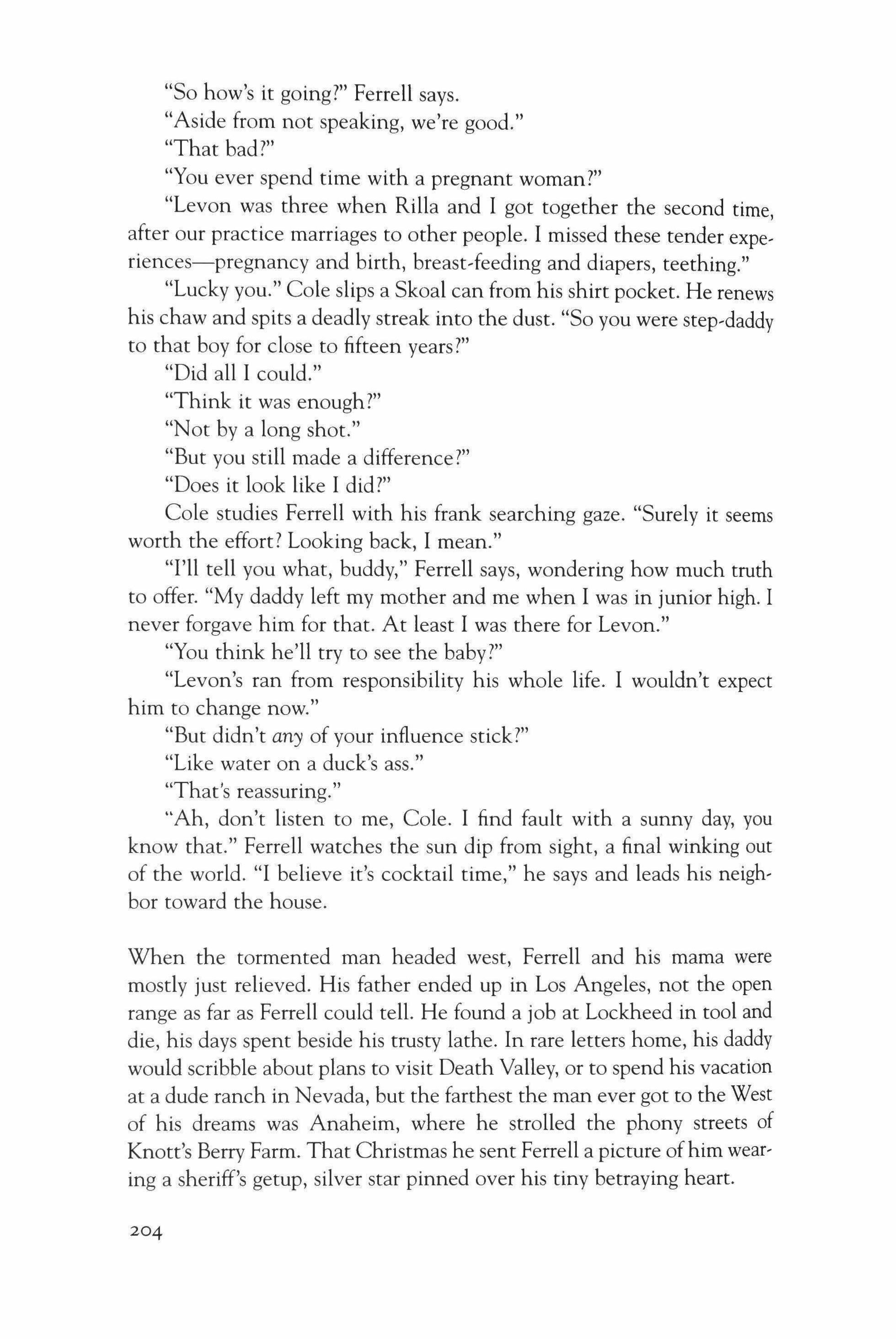
"So how's it going?" Ferrell says.
"Aside from not speaking, we're good."
"That bad?"
"You ever spend time with a pregnant woman?"
"Levon was three when Rilla and I got together the second time, after our practice marriages to other people. I missed these tender experiences-pregnancy and birth, breast-feeding and diapers, teething."
"Lucky you." Cole slips a Skoal can from his shirt pocket. He renews his chaw and spits a deadly streak into the dust. "So you were step-daddy to that boy for close to fifteen years?"
"Did all I could."
"Think it was enough?"
"Not by a long shot."
"But you still made a difference?"
"Does it look like I did?"
Cole studies Ferrell with his frank searching gaze. "Surely it seems worth the effort? Looking back, I mean."
"I'll tell you what, buddy," Ferrell says, wondering how much truth to offer. "My daddy left my mother and me when I was in junior high. I never forgave him for that. At least I was there for Levon."
"You think he'll try to see the baby?"
"Levon's ran from responsibility his whole life. I wouldn't expect him to change now."
"But didn't any of your influence stick?"
"Like water on a duck's ass."
"That's reassuring."
"Ah, don't listen to me, Cole. I find fault with a sunny day, you know that." Ferrell watches the sun dip from sight, a final winking out of the world. "I believe it's cocktail time," he says and leads his neighbor toward the house.
When the tormented man headed west, Ferrell and his mama were mostly just relieved. His father ended up in Los Angeles, not the open range as far as Ferrell could tell. He found a job at Lockheed in tool and die, his days spent beside his trusty lathe. In rare letters home, his daddy would scribble about plans to visit Death Valley, or to spend his vacation at a dude ranch in Nevada, but the farthest the man ever got to the West of his dreams was Anaheim, where he strolled the phony streets of Knott's Berry Farm. That Christmas he sent Ferrell a picture ofhim wearing a sheriff's getup, silver star pinned over his tiny betraying heart. 204
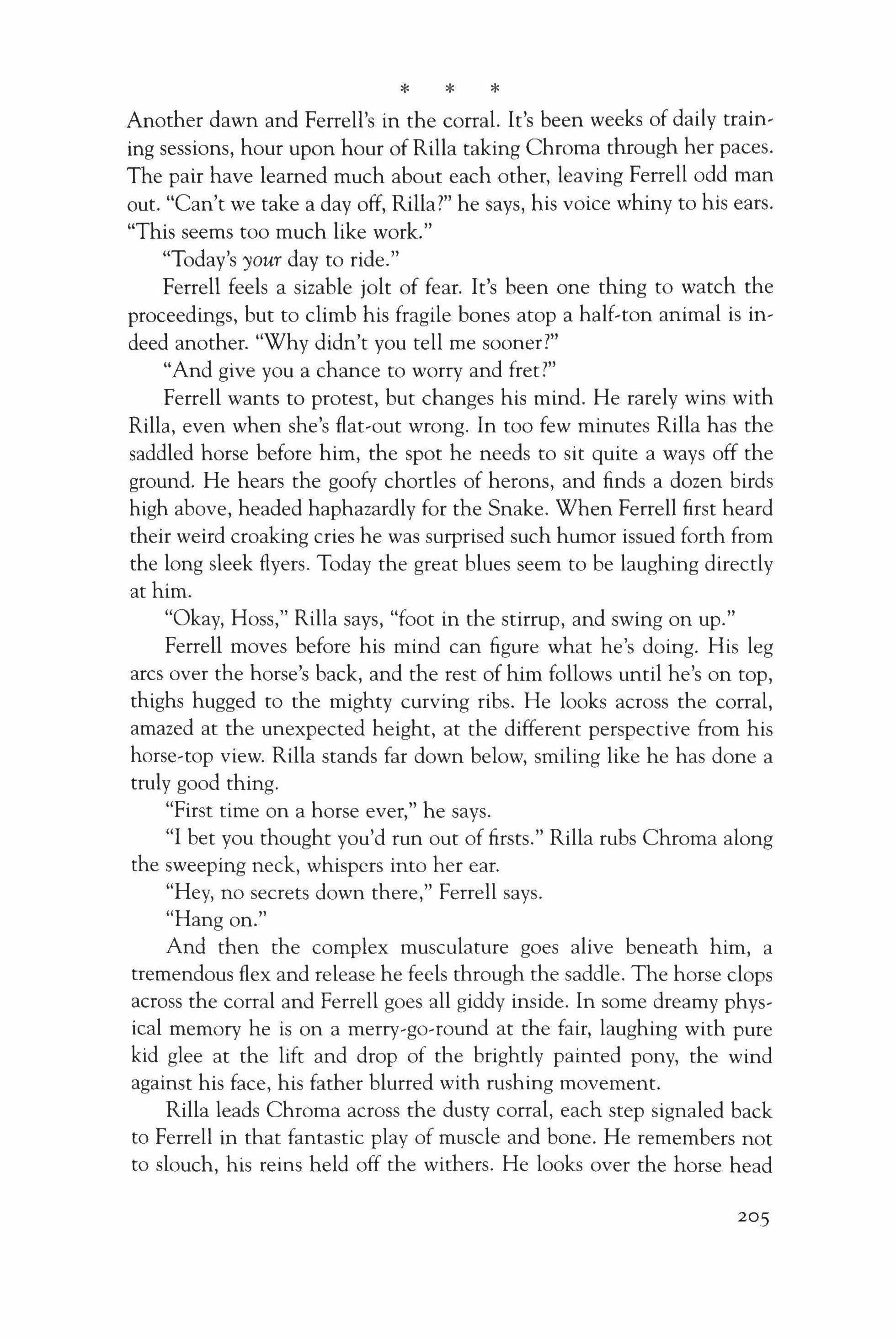
Another dawn and Ferrell's in the corral. It's been weeks of daily training sessions, hour upon hour of Rilla taking Chroma through her paces. The pair have learned much about each other, leaving Ferrell odd man out. "Can't we take a day off, Rilla?" he says, his voice whiny to his ears. "This seems too much like work."
"Today's your day to ride."
Ferrell feels a sizable jolt of fear. It's been one thing to watch the proceedings, but to climb his fragile bones atop a half-ton animal is indeed another. "Why didn't you tell me sooner?"
"And give you a chance to worry and fret?"
Ferrell wants to protest, but changes his mind. He rarely wins with Rilla, even when she's flat-out wrong. In too few minutes Rilla has the saddled horse before him, the spot he needs to sit quite a ways off the ground. He hears the goofy chortles of herons, and finds a dozen birds high above, headed haphazardly for the Snake. When Ferrell first heard their weird croaking cries he was surprised such humor issued forth from the long sleek flyers. Today the great blues seem to be laughing directly at him.
"Okay, Hoss," Rilla says, "foot in the stirrup, and swing on up."
Ferrell moves before his mind can figure what he's doing. His leg arcs over the horse's back, and the rest of him follows until he's on top, thighs hugged to the mighty curving ribs. He looks across the corral, amazed at the unexpected height, at the different perspective from his horse-top view. Rilla stands far down below, smiling like he has done a truly good thing.
"First time on a horse ever," he says.
"I bet you thought you'd run out of firsts." Rilla rubs Chroma along the sweeping neck, whispers into her ear.
"Hey, no secrets down there," Ferrell says.
"Hang on."
And then the complex musculature goes alive beneath him, a tremendous flex and release he feels through the saddle. The horse clops across the corral and Ferrell goes all giddy inside. In some dreamy physical memory he is on a merry-go-round at the fair, laughing with pure kid glee at the lift and drop of the brightly painted pony, the wind against his face, his father blurred with rushing movement.
Rilla leads Chroma across the dusty corral, each step signaled back to Ferrell in that fantastic play of muscle and bone. He remembers not to slouch, his reins held off the withers. He looks over the horse head
* * *
205
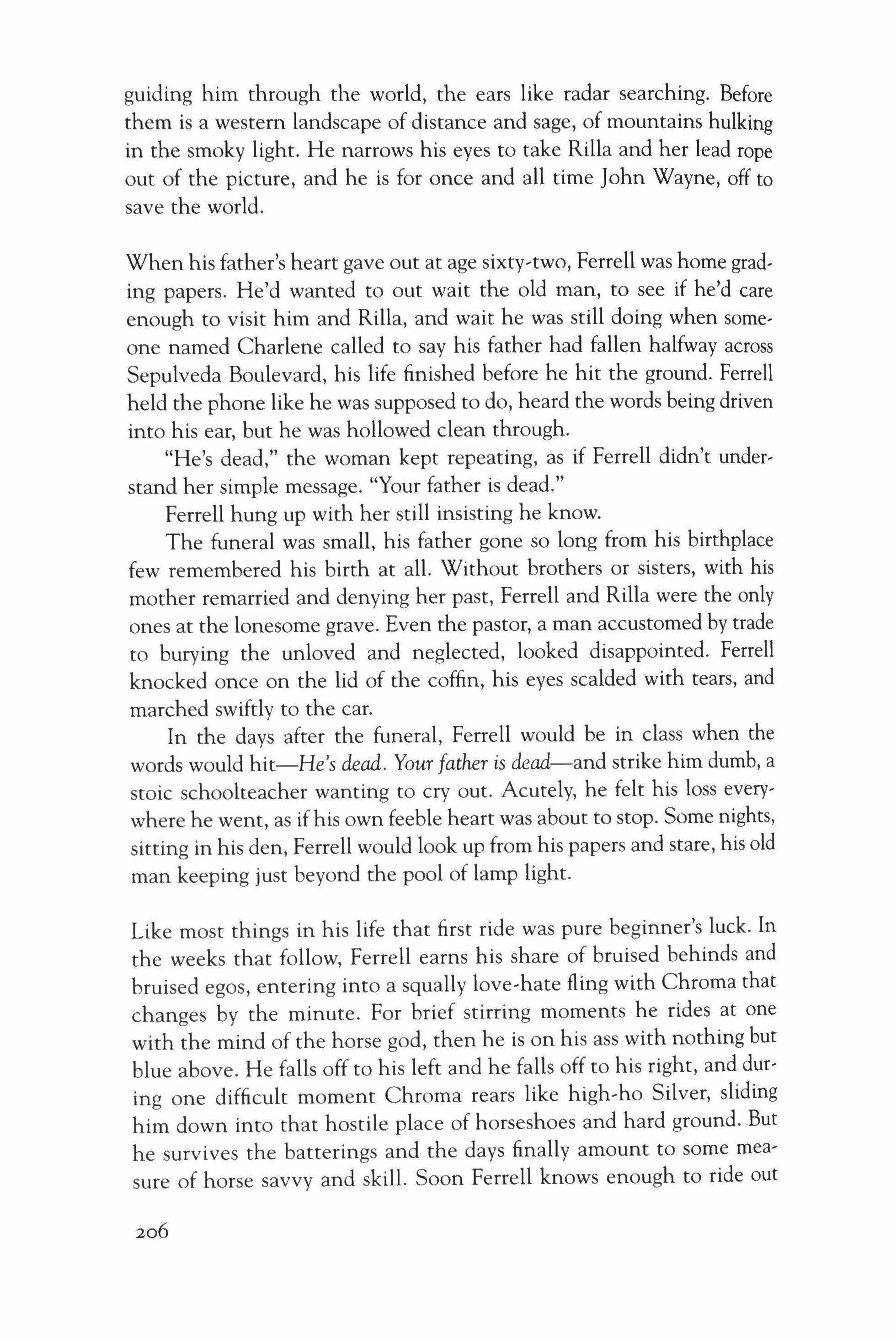
guiding him through the world, the ears like radar searching. Before them is a western landscape of distance and sage, of mountains hulking in the smoky light. He narrows his eyes to take Rilla and her lead rope out of the picture, and he is for once and all time John Wayne, off to save the world.
When his father's heart gave out at age sixty-two, Ferrell was home grading papers. He'd wanted to out wait the old man, to see if he'd care enough to visit him and Rilla, and wait he was still doing when someone named Charlene called to say his father had fallen halfway across Sepulveda Boulevard, his life finished before he hit the ground. Ferrell held the phone like he was supposed to do, heard the words being driven into his ear, but he was hollowed clean through.
"He's dead," the woman kept repeating, as if Ferrell didn't understand her simple message. "Your father is dead."
Ferrell hung up with her still insisting he know.
The funeral was small, his father gone so long from his birthplace few remembered his birth at all. Without brothers or sisters, with his mother remarried and denying her past, Ferrell and Rilla were the only ones at the lonesome grave. Even the pastor, a man accustomed by trade to burying the unloved and neglected, looked disappointed. Ferrell knocked once on the lid of the coffin, his eyes scalded with tears, and marched swiftly to the car.
In the days after the funeral, Ferrell would be in class when the words would hit-He's dead. Your father is dead-and strike him dumb, a stoic schoolteacher wanting to cry out. Acutely, he felt his loss everywhere he went, as ifhis own feeble heart was about to stop. Some nights, sitting in his den, Ferrell would look up from his papers and stare, his old man keeping just beyond the pool of lamp light.
Like most things in his life that first ride was pure beginner's luck. In the weeks that follow, Ferrell earns his share of bruised behinds and bruised egos, entering into a squally love-hate fling with Chroma that changes by the minute. For brief stirring moments he rides at one with the mind of the horse god, then he is on his ass with nothing but blue above. He falls off to his left and he falls off to his right, and during one difficult moment Chroma rears like high-he Silver, sliding him down into that hostile place of horseshoes and hard ground. But he survives the batterings and the days finally amount to some measure of horse savvy and skill. Soon Ferrell knows enough to ride out
206
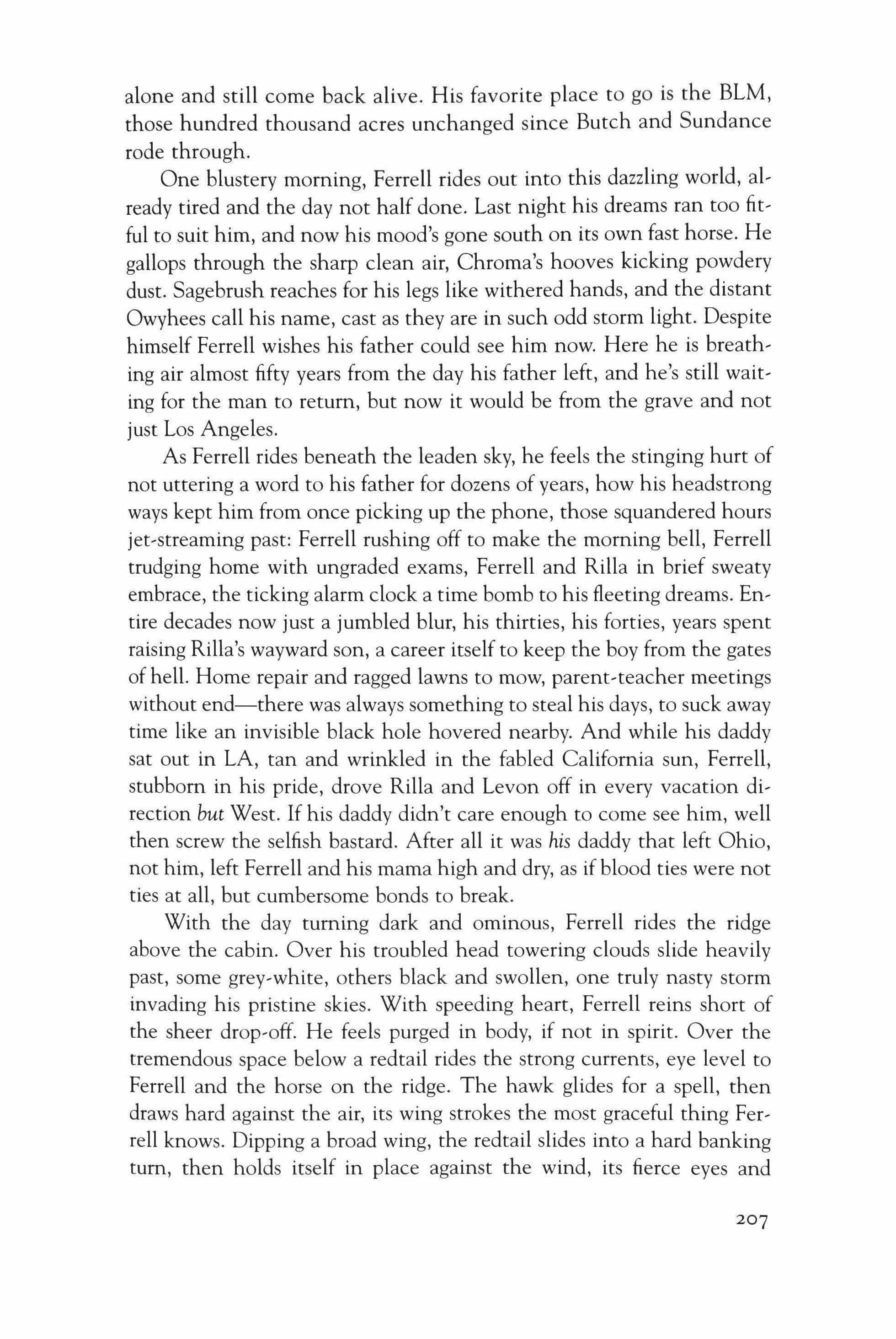
alone and still come back alive. His favorite place to go is the BLM, those hundred thousand acres unchanged since Butch and Sundance rode through.
One blustery morning, Ferrell rides out into this dazzling world, already tired and the day not half done. Last night his dreams ran too fitful to suit him, and now his mood's gone south on its own fast horse. He gallops through the sharp clean air, Chroma's hooves kicking powdery dust. Sagebrush reaches for his legs like withered hands, and the distant Owyhees call his name, cast as they are in such odd storm light. Despite himself Ferrell wishes his father could see him now. Here he is breathing air almost fifty years from the day his father left, and he's still waiting for the man to return, but now it would be from the grave and not just Los Angeles.
As Ferrell rides beneath the leaden sky, he feels the stinging hurt of not uttering a word to his father for dozens of years, how his headstrong ways kept him from once picking up the phone, those squandered hours jet-streaming past: Ferrell rushing off to make the morning bell, Ferrell trudging home with ungraded exams, Ferrell and Rilla in brief sweaty embrace, the ticking alarm clock a time bomb to his fleeting dreams. Entire decades now just a jumbled blur, his thirties, his forties, years spent raising Rilla's wayward son, a career itself to keep the boy from the gates of hell. Home repair and ragged lawns to mow, parent-teacher meetings without end-there was always something to steal his days, to suck away time like an invisible black hole hovered nearby. And while his daddy sat out in LA, tan and wrinkled in the fabled California sun, Ferrell, stubborn in his pride, drove Rilla and Levon off in every vacation direction but West. If his daddy didn't care enough to come see him, well then screw the selfish bastard. After all it was his daddy that left Ohio, not him, left Ferrell and his mama high and dry, as if blood ties were not ties at all, but cumbersome bonds to break.
With the day turning dark and ominous, Ferrell rides the ridge above the cabin. Over his troubled head towering clouds slide heavily past, some grey-white, others black and swollen, one truly nasty storm invading his pristine skies. With speeding heart, Ferrell reins short of the sheer drop-off. He feels purged in body, if not in spirit. Over the tremendous space below a redtail rides the strong currents, eye level to Ferrell and the horse on the ridge. The hawk glides for a spell, then draws hard against the air, its wing strokes the most graceful thing Ferrell knows. Dipping a broad wing, the redtail slides into a hard banking turn, then holds itself in place against the wind, its fierce eyes and
207

hooked beak pointed straight at Ferrell Swan. If he were Nez Perce he'd believe he was seeing some sign just now, an omen from the Great Spirit about the tricky hours to come. Hell, he might as well think so anyway, his Anglo blood be damned.
Ferrell tucks his head and rides, downright buffeted by the wind. He leans into the gusts as if invisible hands push back. At the mouth of the ravine he guides the horse down and the wind dies. As he descends the trail, steep slopes rise on either side, scary sage and strewn rocks, an alien world where he doesn't belong. In this forbidden place he thinks of Melody's child, fatherless already and not even born, then thinks of poor Levan, his own daddy run off when Rilla still carried him around. And what about Rilla and him, her daddy gone when she was just a girl, his taking longer but finding the door? For the moment the world seems crammed with sons and daughters but no fathers. He imagines men everywhere disappeared from villages and towns, from outlying homesteads and packed cities, an entire gang of slackers and bums, riding the badlands while their families soldier on.
Ahead Ferrell spots what he's come to see: the bright white bones of the lone mustang. He found the skeleton soon after buying the property, when home was a tent and a propane stove. Over the years the spot has become eerily sacred, a pilgrimage to make when he needs restoring. The skull's dark sockets watch Chroma approach. Ferrell dismounts and leaves the horse to graze the cheat grass. He kneels at the bones, a confounding puzzle of leg shafts and arching ribs, pelvis halves the size of hubcaps. He recalls, as he can't help but do, when Rilla first trekked over with him last fall, how she slipped the skull over her own head, filled that vacant realm with thoughts once more, the sockets with eyes full of menace and desire. Wearing the skull like a sort of demented mask, she told him she was the mistress of the horse god, that she made men beg for things only she understood. Rilla pretended to be joking but Ferrell wasn't fooled: the creature before him meant business, wanted his soul for untame purposes.
Now Ferrell himself lifts the skull from its scattered bones. The thing weighs more than he imagined, dense as stone in his hands. He looks straight into the sockets as if to see something there, perhaps wise eyes searching his weary face. He raises the skull over his head like an ornate helmet, but it doesn't fit. When he lowers the skull to his chest, Ferrell hears the slow shaking of thunder, then spidery lightning threads the dark wisps of rain hung from the clouds. If Ferrell weren't a believer in the supernatural, this would be a good place to begin. He kneels in the
208
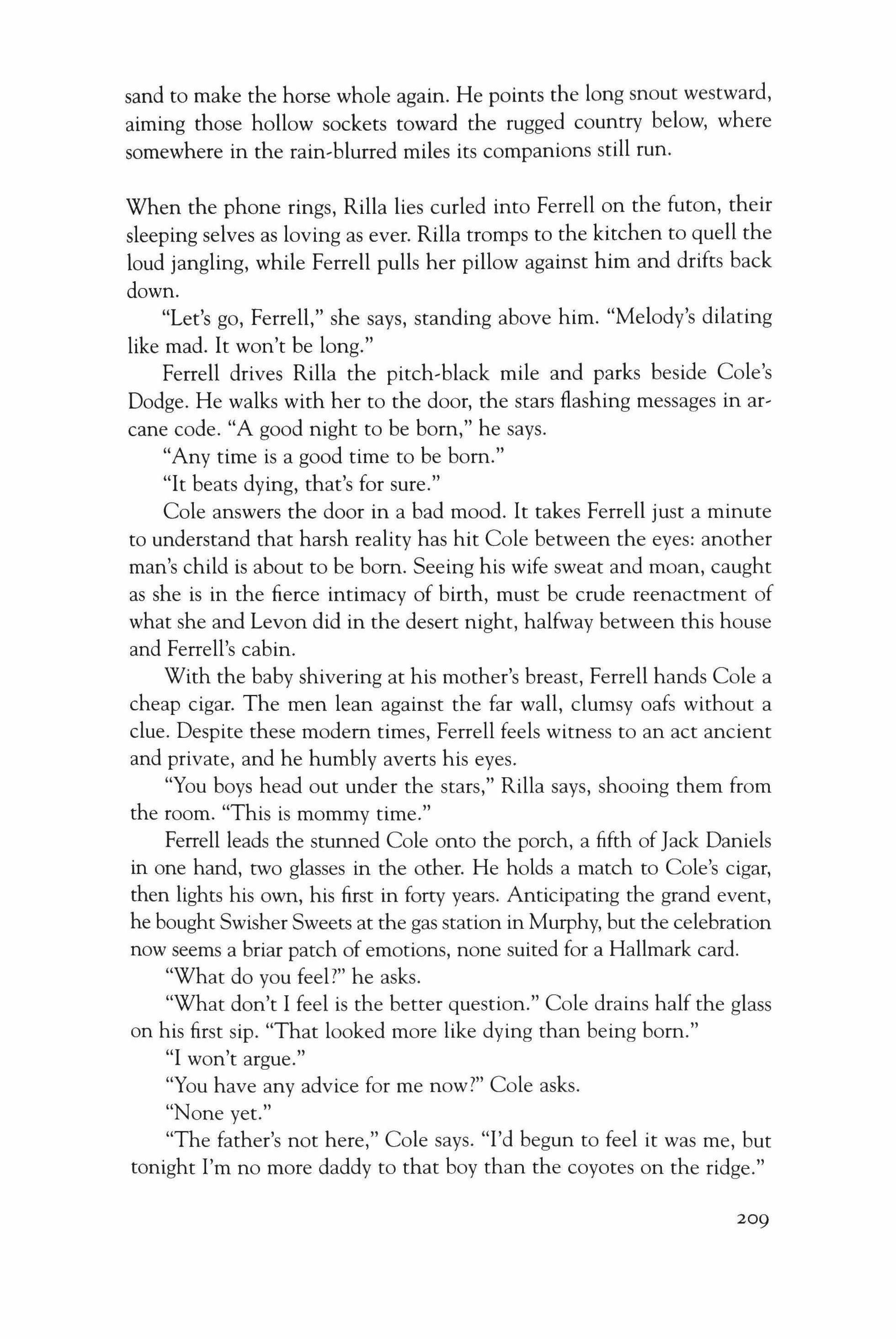
sand to make the horse whole again. He points the long snout westward, aiming those hollow sockets toward the rugged country below, where somewhere in the rain-blurred miles its companions still run.
When the phone rings, Rilla lies curled into Ferrell on the futon, their sleeping selves as loving as ever. Rilla tromps to the kitchen to quell the loud jangling, while Ferrell pulls her pillow against him and drifts back down.
"Let's go, Ferrell," she says, standing above him. "Melody's dilating like mad. It won't be long."
Ferrell drives Rilla the pitch-black mile and parks beside Cole's Dodge. He walks with her to the door, the stars flashing messages in arcane code. "A good night to be born," he says.
"Any time is a good time to be born."
"It beats dying, that's for sure."
Cole answers the door in a bad mood. It takes Ferrell just a minute to understand that harsh reality has hit Cole between the eyes: another man's child is about to be born. Seeing his wife sweat and moan, caught as she is in the fierce intimacy of birth, must be crude reenactment of what she and Levon did in the desert night, halfway between this house and Ferrell's cabin.
With the baby shivering at his mother's breast, Ferrell hands Cole a cheap cigar. The men lean against the far wall, clumsy oafs without a clue. Despite these modern times, Ferrell feels witness to an act ancient and private, and he humbly averts his eyes.
"You boys head out under the stars," Rilla says, shooing them from the room. "This is mommy time."
Ferrell leads the stunned Cole onto the porch, a fifth ofJack Daniels in one hand, two glasses in the other. He holds a match to Cole's cigar, then lights his own, his first in forty years. Anticipating the grand event, he bought Swisher Sweets at the gas station in Murphy, but the celebration now seems a briar patch of emotions, none suited for a Hallmark card.
"What do you feel?" he asks.
"What don't I feel is the better question." Cole drains half the glass on his first sip. "That looked more like dying than being born."
"I won't argue."
"You have any advice for me now?" Cole asks.
"None yet."
"The father's not here," Cole says. "I'd begun to feel it was me, but tonight I'm no more daddy to that boy than the coyotes on the ridge."
209
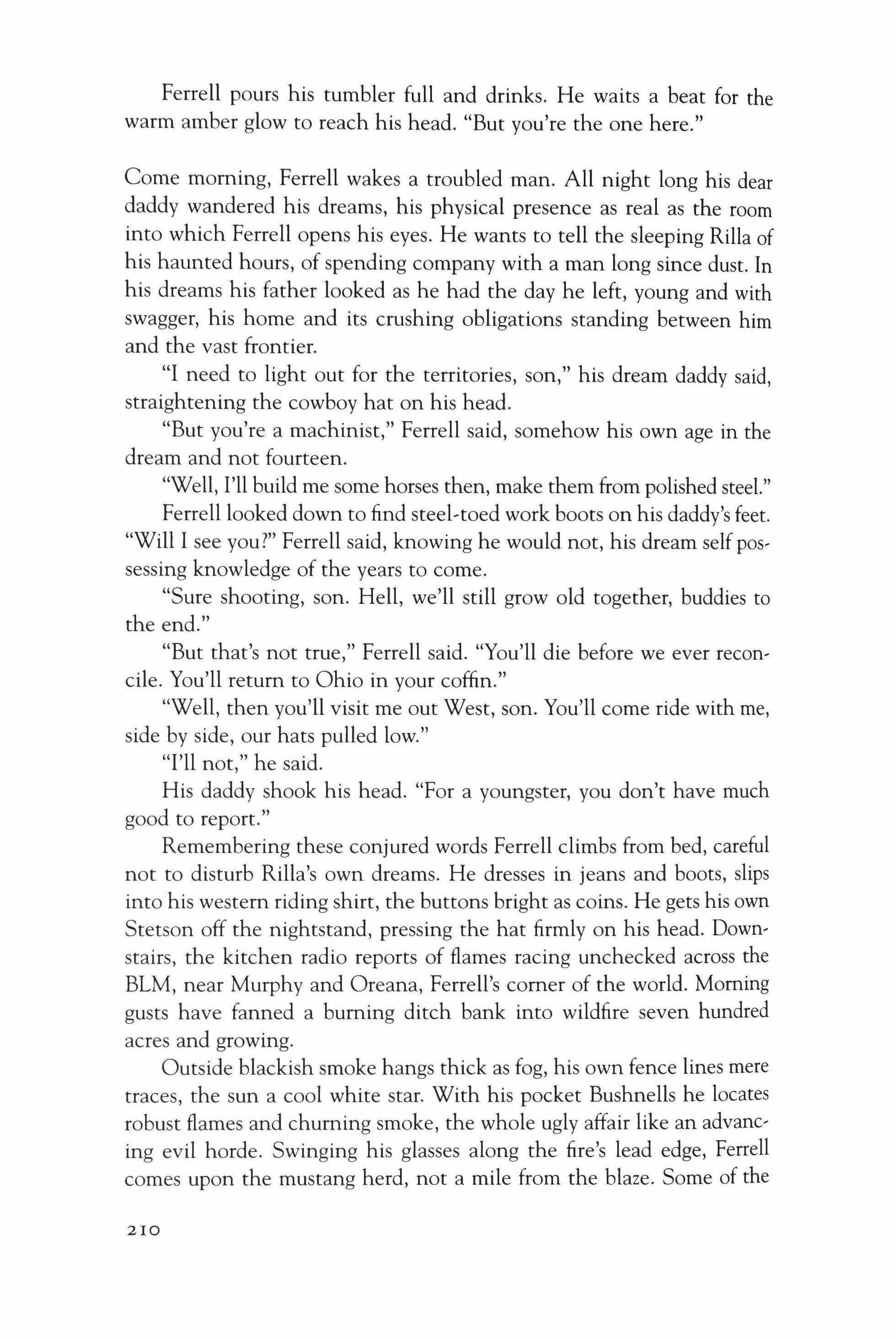
Ferrell pours his tumbler full and drinks. He waits a beat for the warm amber glow to reach his head. "But you're the one here."
Come morning, Ferrell wakes a troubled man. All night long his dear daddy wandered his dreams, his physical presence as real as the room into which Ferrell opens his eyes. He wants to tell the sleeping Rilla of his haunted hours, of spending company with a man long since dust. In his dreams his father looked as he had the day he left, young and with swagger, his home and its crushing obligations standing between him and the vast frontier.
"I need to light out for the territories, son," his dream daddy said, straightening the cowboy hat on his head.
"But you're a machinist," Ferrell said, somehow his own age in the dream and not fourteen.
"Well, I'll build me some horses then, make them from polished steel."
Ferrell looked down to find steel-toed work boots on his daddy's feet. "Will I see you?" Ferrell said, knowing he would not, his dream self possessing knowledge of the years to come.
"Sure shooting, son. Hell, we'll still grow old together, buddies to the end."
"But that's not true," Ferrell said. "You'll die before we ever reconcile. You'll return to Ohio in your coffin."
"Well, then you'll visit me out West, son. You'll come ride with me, side by side, our hats pulled low."
"I'll not," he said.
His daddy shook his head. "For a youngster, you don't have much good to report."
Remembering these conjured words Ferrell climbs from bed, careful not to disturb Rilla's own dreams. He dresses in jeans and boots, slips into his western riding shirt, the buttons bright as coins. He gets his own Stetson off the nightstand, pressing the hat firmly on his head. Downstairs, the kitchen radio reports of flames racing unchecked across the BLM, near Murphy and Oreana, Ferrell's comer of the world. Morning gusts have fanned a burning ditch bank into wildfire seven hundred acres and growing.
Outside blackish smoke hangs thick as fog, his own fence lines mere traces, the sun a cool white star. With his pocket Bushnells he locates robust flames and churning smoke, the whole ugly affair like an advancing evil horde. Swinging his glasses along the fire's lead edge, Ferrell comes upon the mustang herd, not a mile from the blaze. Some of the
210
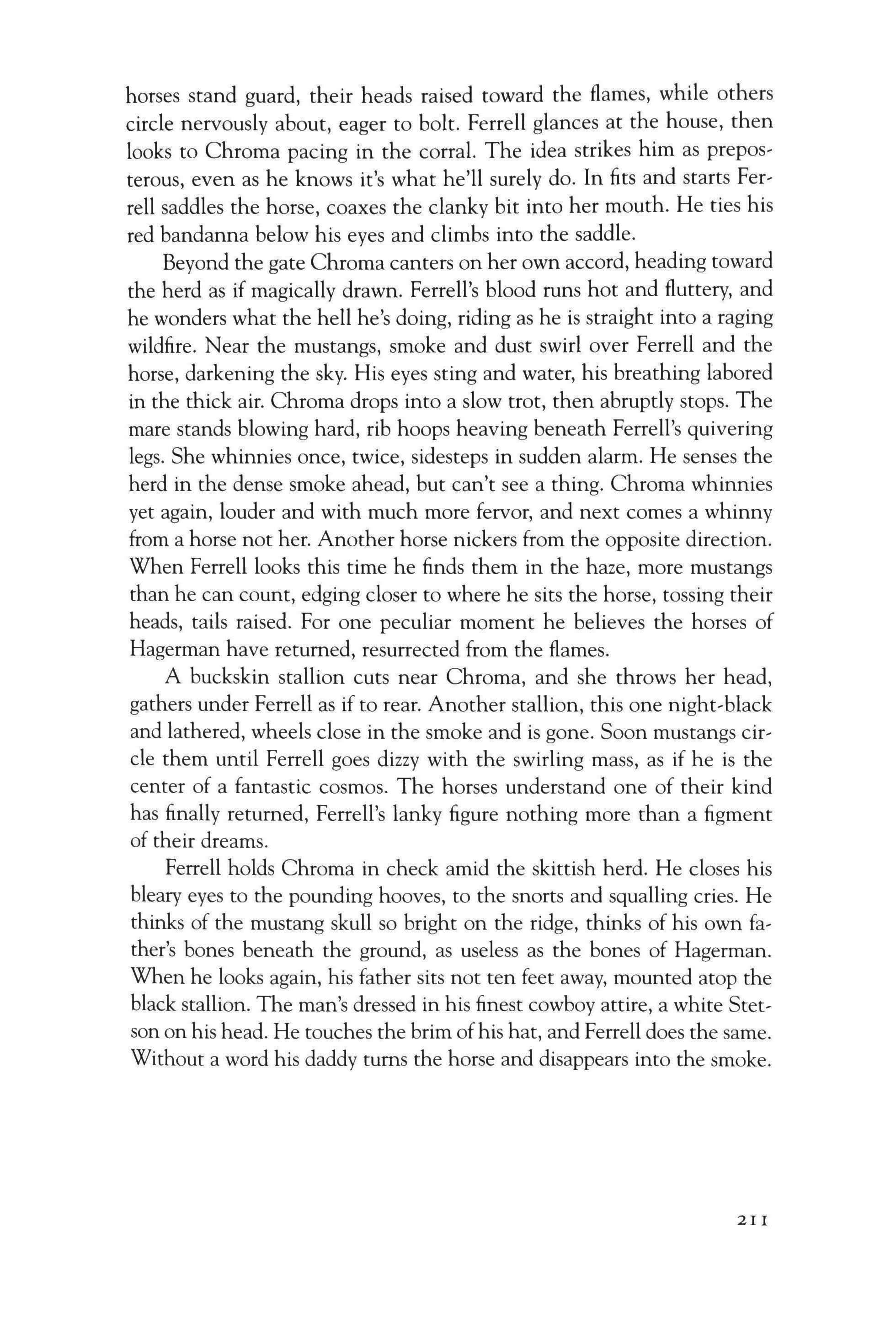
horses stand guard, their heads raised toward the flames, while others circle nervously about, eager to bolt. Ferrell glances at the house, then looks to Chroma pacing in the corral. The idea strikes him as preposterous, even as he knows it's what he'll surely do. In fits and starts Ferrell saddles the horse, coaxes the clanky bit into her mouth. He ties his red bandanna below his eyes and climbs into the saddle.
Beyond the gate Chroma canters on her own accord, heading toward the herd as if magically drawn. Ferrell's blood runs hot and fluttery, and he wonders what the hell he's doing, riding as he is straight into a raging wildfire. Near the mustangs, smoke and dust swirl over Ferrell and the horse, darkening the sky. His eyes sting and water, his breathing labored in the thick air. Chroma drops into a slow trot, then abruptly stops. The mare stands blowing hard, rib hoops heaving beneath Ferrell's quivering legs. She whinnies once, twice, sidesteps in sudden alarm. He senses the herd in the dense smoke ahead, but can't see a thing. Chroma whinnies yet again, louder and with much more fervor, and next comes a whinny from a horse not her. Another horse nickers from the opposite direction. When Ferrell looks this time he finds them in the haze, more mustangs than he can count, edging closer to where he sits the horse, tossing their heads, tails raised. For one peculiar moment he believes the horses of Hagerman have returned, resurrected from the flames.
A buckskin stallion cuts near Chroma, and she throws her head, gathers under Ferrell as if to rear. Another stallion, this one night-black and lathered, wheels close in the smoke and is gone. Soon mustangs circle them until Ferrell goes dizzy with the swirling mass, as if he is the center of a fantastic cosmos. The horses understand one of their kind has finally returned, Ferrell's lanky figure nothing more than a figment of their dreams.
Ferrell holds Chroma in check amid the skittish herd. He closes his bleary eyes to the pounding hooves, to the snorts and squalling cries. He thinks of the mustang skull so bright on the ridge, thinks of his own father's bones beneath the ground, as useless as the bones of Hagerman. When he looks again, his father sits not ten feet away, mounted atop the black stallion. The man's dressed in his finest cowboy attire, a white Stetson on his head. He touches the brim ofhis hat, and Ferrell does the same. Without a word his daddy turns the horse and disappears into the smoke.
211
Molly McQuade
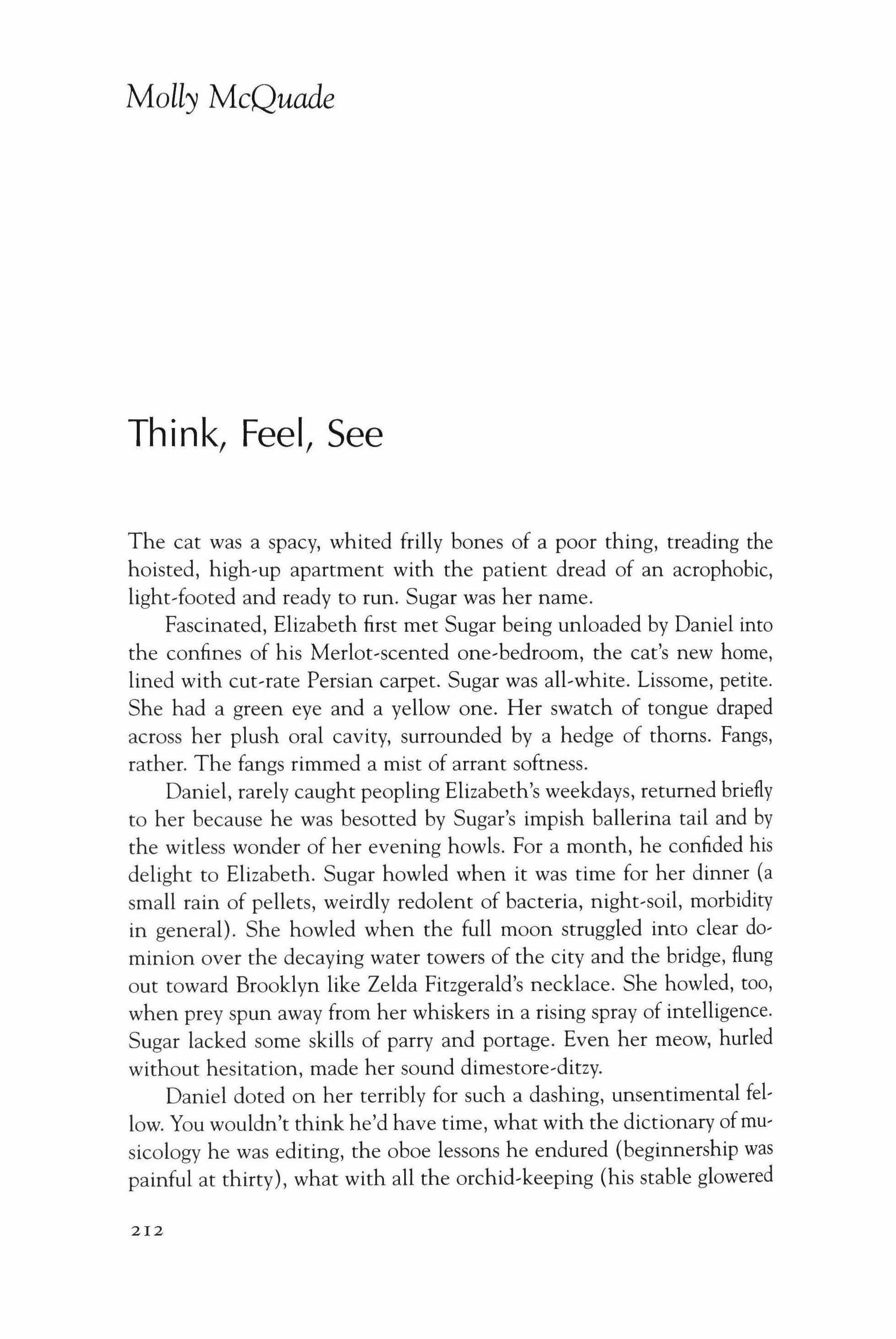
Think, Feel, See
The cat was a spacy, whited frilly bones of a poor thing, treading the hoisted, high-up apartment with the patient dread of an acrophobic, light-footed and ready to run. Sugar was her name.
Fascinated, Elizabeth first met Sugar being unloaded by Daniel into the confines of his Merlot-scented one-bedroom, the eat's new home, lined with cut-rate Persian carpet. Sugar was all-white. Lissome, petite. She had a green eye and a yellow one. Her swatch of tongue draped across her plush oral cavity, surrounded by a hedge of thorns. Fangs, rather. The fangs rimmed a mist of arrant softness.
Daniel, rarely caught peopling Elizabeth's weekdays, returned briefly to her because he was besotted by Sugar's impish ballerina tail and by the witless wonder of her evening howls. For a month, he confided his delight to Elizabeth. Sugar howled when it was time for her dinner (a small rain of pellets, weirdly redolent of bacteria, night-soil, morbidity in general). She howled when the full moon struggled into clear dominion over the decaying water towers of the city and the bridge, flung out toward Brooklyn like Zelda Fitzgerald's necklace. She howled, too, when prey spun away from her whiskers in a rising spray of intelligence. Sugar lacked some skills of parry and portage. Even her meow, hurled without hesitation, made her sound dimestore-ditzy.
Daniel doted on her terribly for such a dashing, unsentimental fellow. You wouldn't think he'd have time, what with the dictionary of musicology he was editing, the oboe lessons he endured (beginnership was painful at thirty), what with all the orchid-keeping (his stable glowered
212
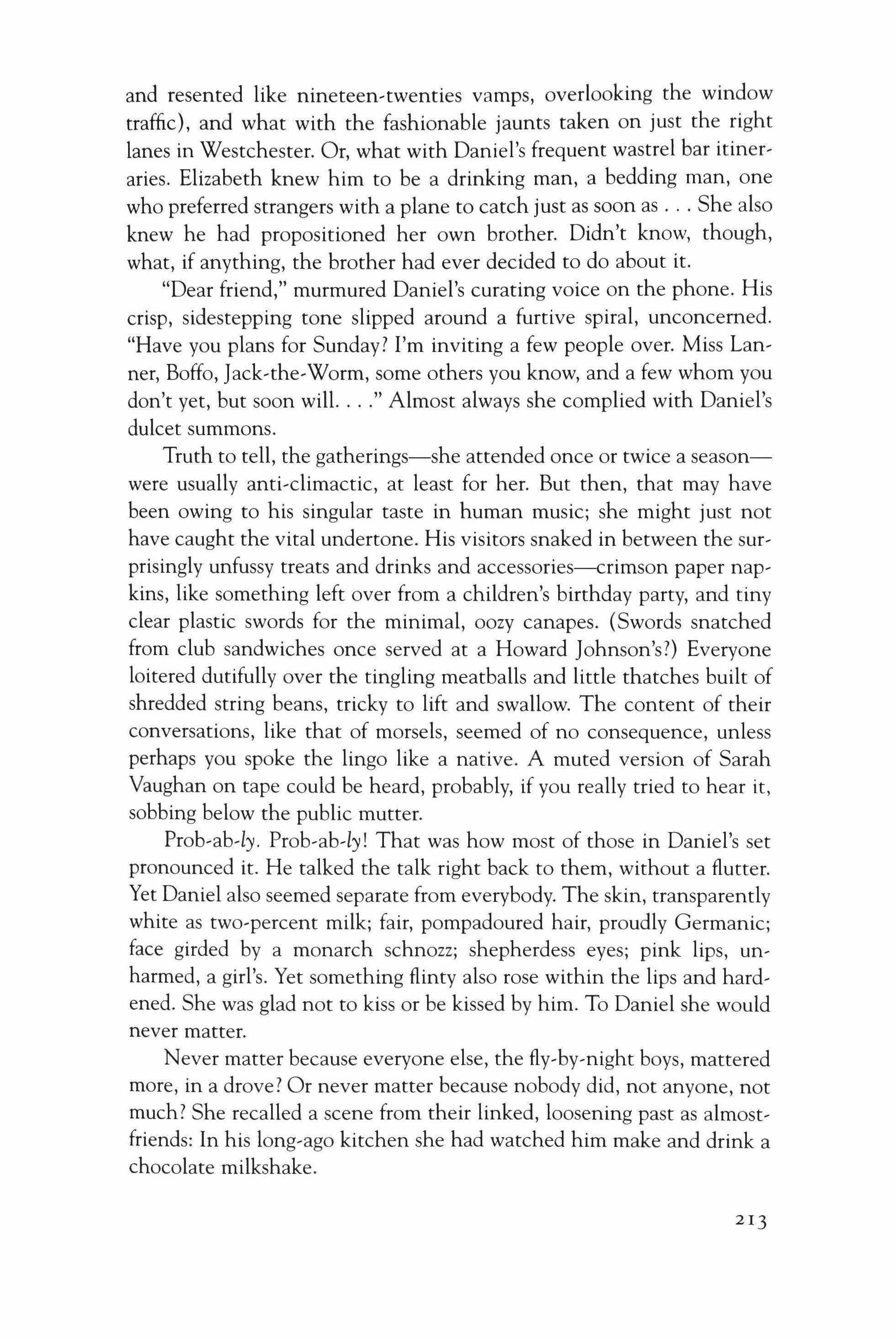
and resented like nineteen-twenties vamps, overlooking the window traffic}, and what with the fashionable jaunts taken on just the right lanes in Westchester. Or, what with Daniel's frequent wastrel bar itineraries. Elizabeth knew him to be a drinking man, a bedding man, one who preferred strangers with a plane to catch just as soon as She also knew he had propositioned her own brother. Didn't know, though, what, if anything, the brother had ever decided to do about it.
"Dear friend," murmured Daniel's curating voice on the phone. His crisp, sidestepping tone slipped around a furtive spiral, unconcerned. "Have you plans for Sunday? I'm inviting a few people over. Miss Lanner, Boffo, Jack-the-Worm, some others you know, and a few whom you don't yet, but soon will Almost always she complied with Daniel's dulcet summons.
Truth to tell, the gatherings-she attended once or twice a seasonwere usually anti-climactic, at least for her. But then, that may have been owing to his singular taste in human music; she might just not have caught the vital undertone. His visitors snaked in between the surprisingly unfussy treats and drinks and accessories---crimson paper napkins, like something left over from a children's birthday party, and tiny clear plastic swords for the minimal, oozy canapes. (Swords snatched from club sandwiches once served at a Howard Johnson's?) Everyone loitered dutifully over the tingling meatballs and little thatches built of shredded string beans, tricky to lift and swallow. The content of their conversations, like that of morsels, seemed of no consequence, unless perhaps you spoke the lingo like a native. A muted version of Sarah Vaughan on tape could be heard, probably, if you really tried to hear it, sobbing below the public mutter.
Prob-ab-ly. Prob-ab-ly! That was how most of those in Daniel's set pronounced it. He talked the talk right back to them, without a flutter. Yet Daniel also seemed separate from everybody. The skin, transparently white as two-percent milk; fair, pompadoured hair, proudly Germanic; face girded by a monarch schnozz; shepherdess eyes; pink lips, unharmed, a girl's. Yet something flinty also rose within the lips and hardened. She was glad not to kiss or be kissed by him. To Daniel she would never matter.
Never matter because everyone else, the fly-by-night boys, mattered more, in a drove? Or never matter because nobody did, not anyone, not much? She recalled a scene from their linked, loosening past as almostfriends: In his long-ago kitchen she had watched him make and drink a chocolate milkshake.
213
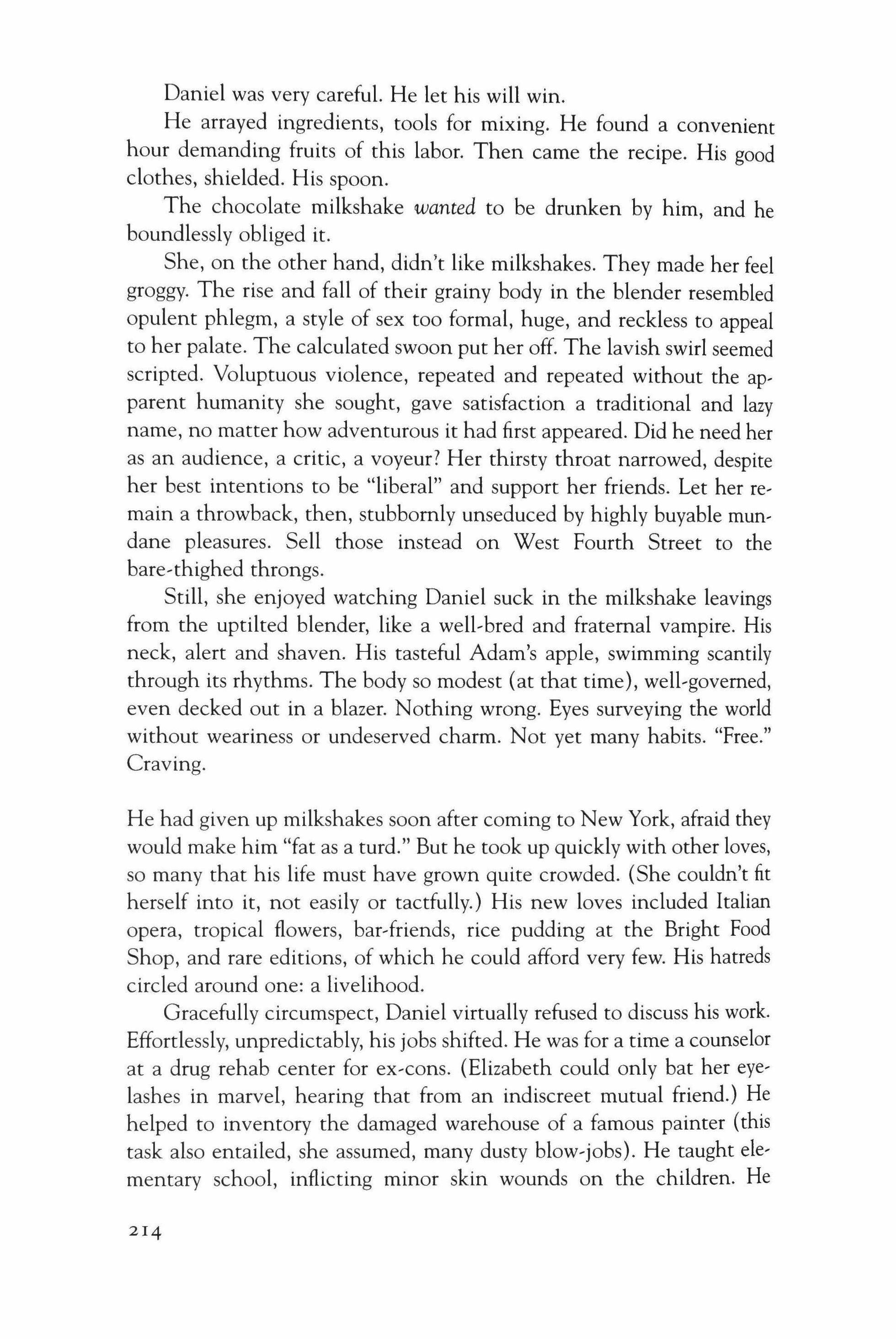
Daniel was very careful. He let his will win.
He arrayed ingredients, tools for mixing. He found a convenient hour demanding fruits of this labor. Then came the recipe. His good clothes, shielded. His spoon.
The chocolate milkshake wanted to be drunken by him, and he boundlessly obliged it.
She, on the other hand, didn't like milkshakes. They made her feel groggy. The rise and fall of their grainy body in the blender resembled opulent phlegm, a style of sex too formal, huge, and reckless to appeal to her palate. The calculated swoon put her off. The lavish swirl seemed scripted. Voluptuous violence, repeated and repeated without the apparent humanity she sought, gave satisfaction a traditional and lazy name, no matter how adventurous it had first appeared. Did he need her as an audience, a critic, a voyeur? Her thirsty throat narrowed, despite her best intentions to be "liberal" and support her friends. Let her remain a throwback, then, stubbornly unseduced by highly buyable mundane pleasures. Sell those instead on West Fourth Street to the bare-thighed throngs.
Still, she enjoyed watching Daniel suck in the milkshake leavings from the uptilted blender, like a well-bred and fraternal vampire. His neck, alert and shaven. His tasteful Adam's apple, swimming scantily through its rhythms. The body so modest (at that time), well-governed, even decked out in a blazer. Nothing wrong. Eyes surveying the world without weariness or undeserved charm. Not yet many habits. "Free."
Craving.
He had given up milkshakes soon after coming to New York, afraid they would make him "fat as a turd." But he took up quickly with other loves, so many that his life must have grown quite crowded. (She couldn't fit herself into it, not easily or tactfully.) His new loves included Italian opera, tropical flowers, bar-friends, rice pudding at the Bright Food Shop, and rare editions, of which he could afford very few. His hatreds circled around one: a livelihood.
Gracefully circumspect, Daniel virtually refused to discuss his work. Effortlessly, unpredictably, his jobs shifted. He was for a time a counselor at a drug rehab center for ex-cons. (Elizabeth could only bat her eyelashes in marvel, hearing that from an indiscreet mutual friend.) He helped to inventory the damaged warehouse of a famous painter (this task also entailed, she assumed, many dusty blow-jobs). He taught elementary school, inflicting minor skin wounds on the children. He
214
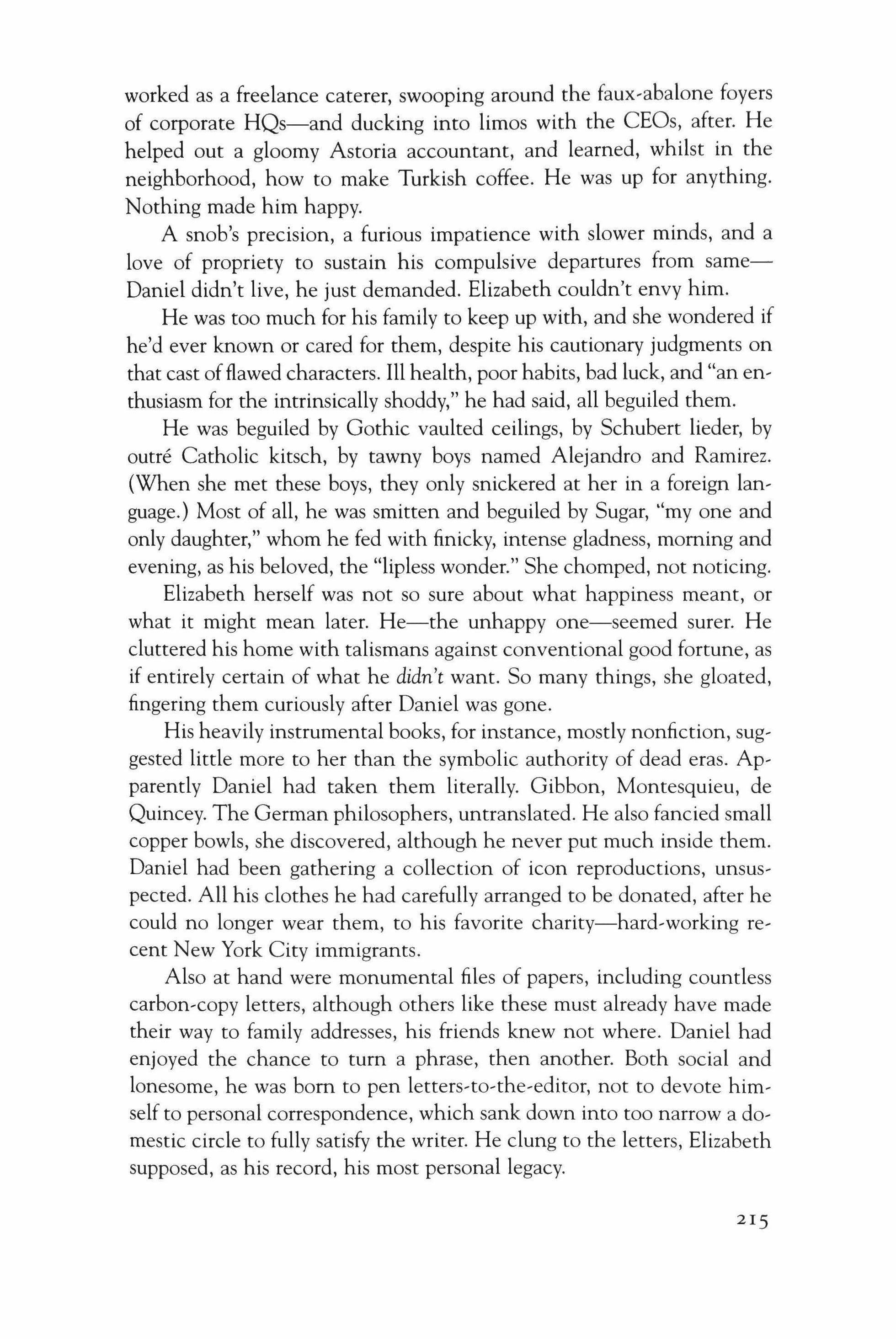
worked as a freelance caterer, swooping around the faux-abalone foyers of corporate HQs-and ducking into limos with the CEOs, after. He helped out a gloomy Astoria accountant, and learned, whilst in the neighborhood, how to make Turkish coffee. He was up for anything. Nothing made him happy.
A snob's precision, a furious impatience with slower minds, and a love of propriety to sustain his compulsive departures from sameDaniel didn't live, he just demanded. Elizabeth couldn't envy him.
He was too much for his family to keep up with, and she wondered if he'd ever known or cared for them, despite his cautionary judgments on that cast offlawed characters. III health, poor habits, bad luck, and "an enthusiasm for the intrinsically shoddy," he had said, all beguiled them.
He was beguiled by Gothic vaulted ceilings, by Schubert lieder, by outre Catholic kitsch, by tawny boys named Alejandro and Ramirez. (When she met these boys, they only snickered at her in a foreign Ianguage.) Most of all, he was smitten and beguiled by Sugar, "my one and only daughter," whom he fed with finicky, intense gladness, morning and evening, as his beloved, the "lipless wonder." She chomped, not noticing.
Elizabeth herself was not so sure about what happiness meant, or what it might mean later. He-the unhappy one-seemed surer. He cluttered his home with talismans against conventional good fortune, as if entirely certain of what he didn't want. So many things, she gloated, fingering them curiously after Daniel was gone.
His heavily instrumental books, for instance, mostly nonfiction, suggested little more to her than the symbolic authority of dead eras. Apparently Daniel had taken them literally. Gibbon, Montesquieu, de Quincey. The German philosophers, untranslated. He also fancied small copper bowls, she discovered, although he never put much inside them. Daniel had been gathering a collection of icon reproductions, unsuspected. All his clothes he had carefully arranged to be donated, after he could no longer wear them, to his favorite charity-hard-working recent New York City immigrants.
Also at hand were monumental files of papers, including countless carbon-copy letters, although others like these must already have made their way to family addresses, his friends knew not where. Daniel had enjoyed the chance to turn a phrase, then another. Both social and lonesome, he was born to pen letters-to-the-editor, not to devote himself to personal correspondence, which sank down into too narrow a domestic circle to fully satisfy the writer. He clung to the letters, Elizabeth supposed, as his record, his most personal legacy.
215
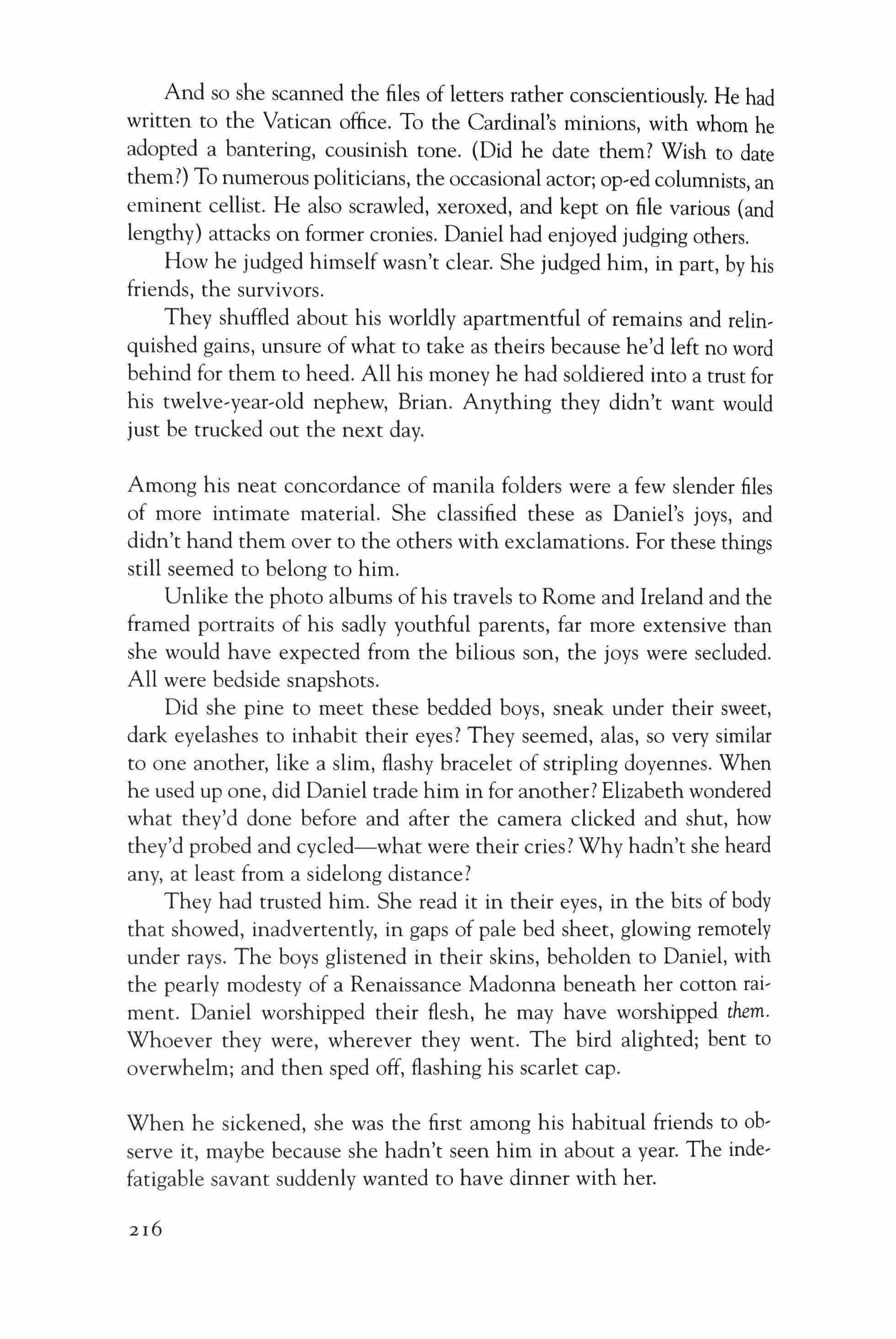
And so she scanned the files of letters rather conscientiously. He had written to the Vatican office. To the Cardinal's minions, with whom he adopted a bantering, cousinish tone. (Did he date them? Wish to date them?) To numerous politicians, the occasional actor; op-ed columnists, an eminent cellist. He also scrawled, xeroxed, and kept on file various (and lengthy) attacks on former cronies. Daniel had enjoyed judging others.
How he judged himself wasn't clear. She judged him, in part, by his friends, the survivors.
They shuffled about his worldly apartmentful of remains and relinquished gains, unsure of what to take as theirs because he'd left no word behind for them to heed. All his money he had soldiered into a trust for his twelve-year-old nephew, Brian. Anything they didn't want would just be trucked out the next day.
Among his neat concordance of manila folders were a few slender files of more intimate material. She classified these as Daniel's joys, and didn't hand them over to the others with exclamations. For these things still seemed to belong to him.
Unlike the photo albums ofhis travels to Rome and Ireland and the framed portraits of his sadly youthful parents, far more extensive than she would have expected from the bilious son, the joys were secluded. All were bedside snapshots.
Did she pine to meet these bedded boys, sneak under their sweet, dark eyelashes to inhabit their eyes? They seemed, alas, so very similar to one another, like a slim, flashy bracelet of stripling doyennes. When he used up one, did Daniel trade him in for another? Elizabeth wondered what they'd done before and after the camera clicked and shut, how they'd probed and cycled-what were their cries? Why hadn't she heard any, at least from a sidelong distance?
They had trusted him. She read it in their eyes, in the bits of body that showed, inadvertently, in gaps of pale bed sheet, glowing remotely under rays. The boys glistened in their skins, beholden to Daniel, with the pearly modesty of a Renaissance Madonna beneath her cotton raiment. Daniel worshipped their flesh, he may have worshipped them. Whoever they were, wherever they went. The bird alighted; bent to overwhelm; and then sped off, flashing his scarlet cap.
When he sickened, she was the first among his habitual friends to observe it, maybe because she hadn't seen him in about a year. The indefatigable savant suddenly wanted to have dinner with her.
216
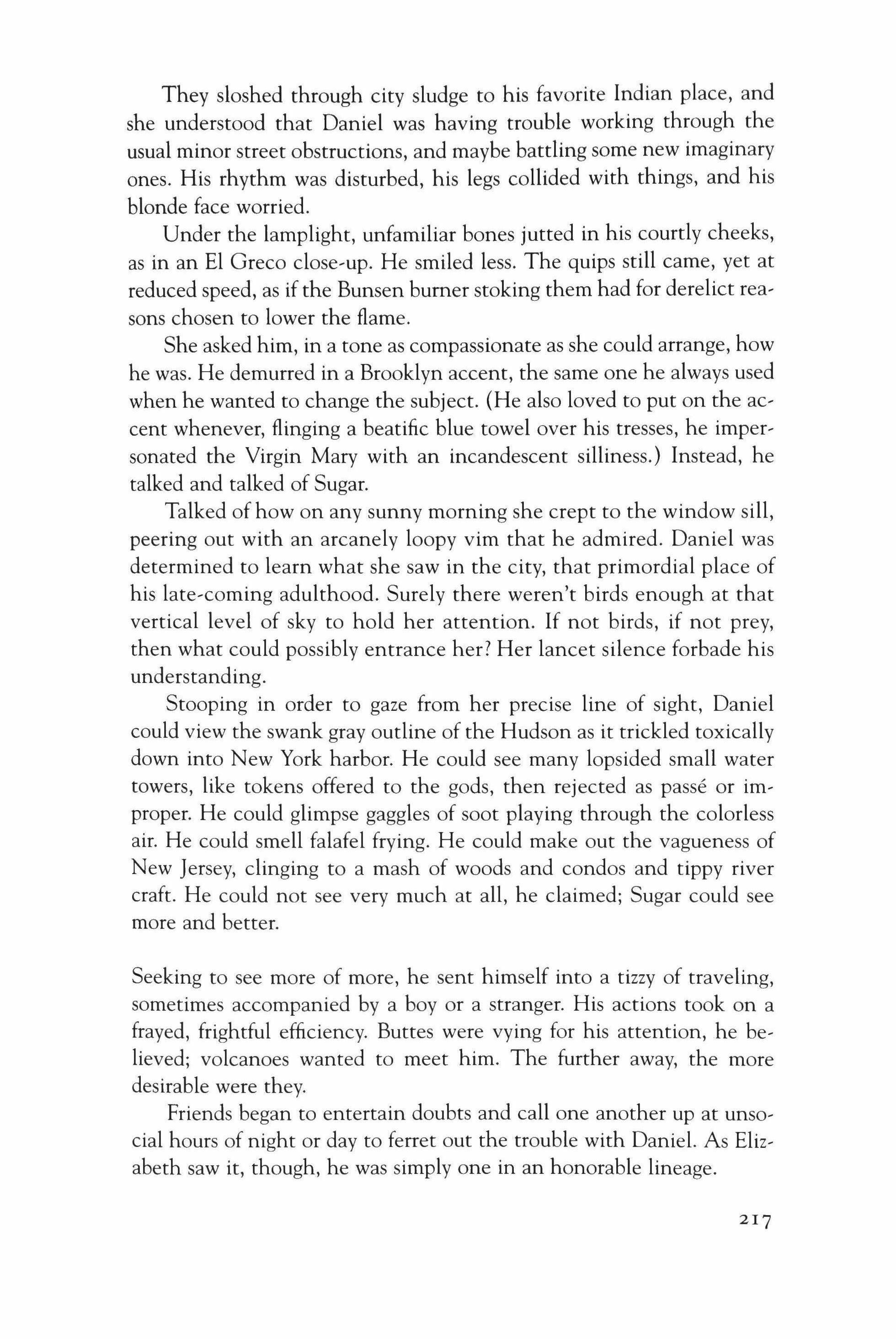
They sloshed through city sludge to his favorite Indian place, and she understood that Daniel was having trouble working through the usual minor street obstructions, and maybe battling some new imaginary ones. His rhythm was disturbed, his legs collided with things, and his blonde face worried.
Under the lamplight, unfamiliar bones jutted in his courtly cheeks, as in an El Greco close-up. He smiled less. The quips still came, yet at reduced speed, as if the Bunsen burner stoking them had for derelict reasons chosen to lower the flame.
She asked him, in a tone as compassionate as she could arrange, how he was. He demurred in a Brooklyn accent, the same one he always used when he wanted to change the subject. (He also loved to put on the accent whenever, flinging a beatific blue towel over his tresses, he impersonated the Virgin Mary with an incandescent silliness.) Instead, he talked and talked of Sugar.
Talked of how on any sunny morning she crept to the window sill, peering out with an arcanely loopy vim that he admired. Daniel was determined to learn what she saw in the city, that primordial place of his late-corning adulthood. Surely there weren't birds enough at that vertical level of sky to hold her attention. If not birds, if not prey, then what could possibly entrance her? Her lancet silence forbade his understanding.
Stooping in order to gaze from her precise line of sight, Daniel could view the swank gray outline of the Hudson as it trickled toxically down into New York harbor. He could see many lopsided small water towers, like tokens offered to the gods, then rejected as passe or improper. He could glimpse gaggles of soot playing through the colorless air. He could smell falafel frying. He could make out the vagueness of New Jersey, clinging to a mash of woods and condos and tippy river craft. He could not see very much at all, he claimed; Sugar could see more and better.
Seeking to see more of more, he sent himself into a tizzy of traveling, sometimes accompanied by a boy or a stranger. His actions took on a frayed, frightful efficiency. Buttes were vying for his attention, he believed; volcanoes wanted to meet him. The further away, the more desirable were they.
Friends began to entertain doubts and call one another up at unsocial hours of night or day to ferret out the trouble with Daniel. As Elizabeth saw it, though, he was simply one in an honorable lineage.
217
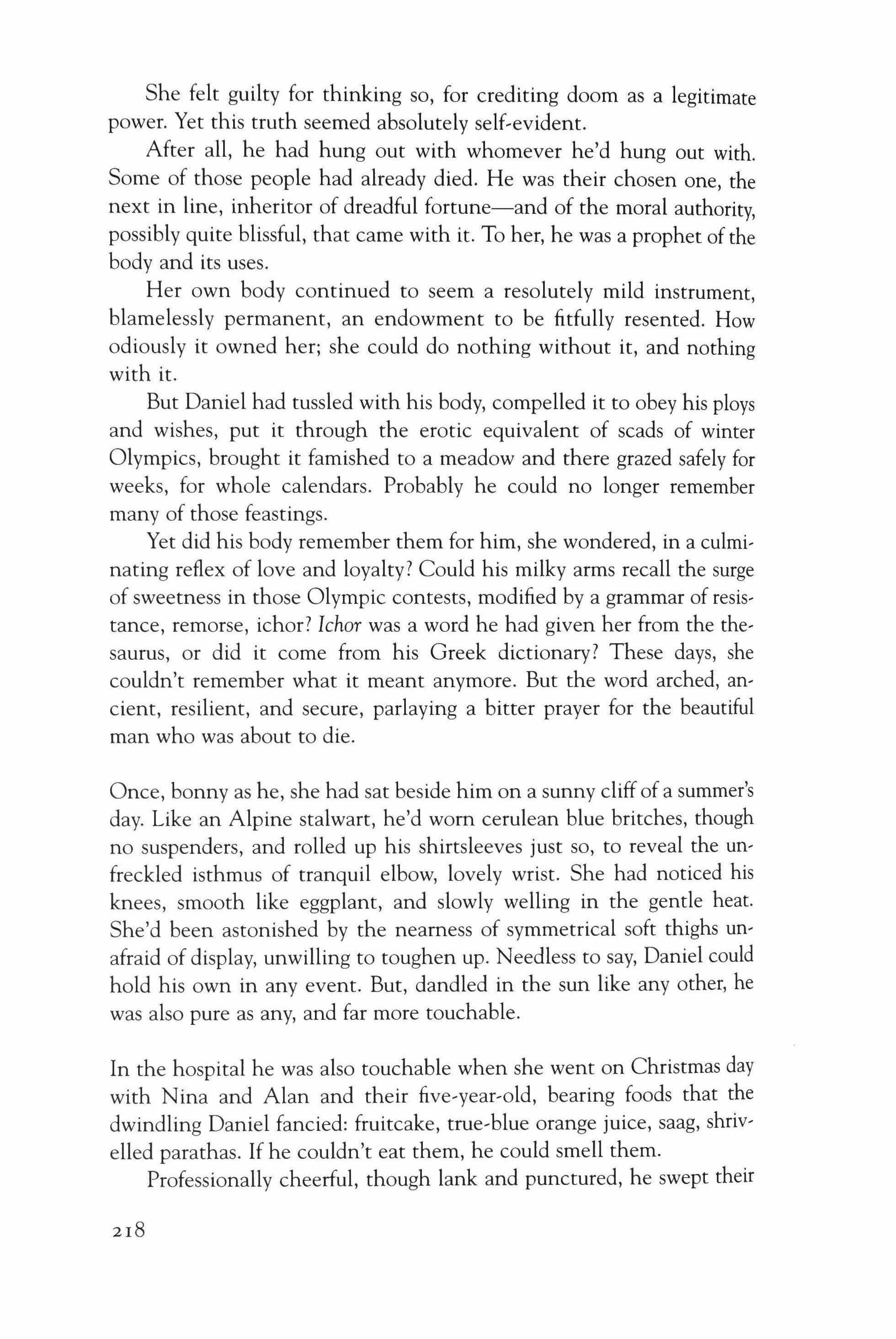
She felt guilty for thinking so, for crediting doom as a legitimate power. Yet this truth seemed absolutely self-evident.
After all, he had hung out with whomever he'd hung out with. Some of those people had already died. He was their chosen one, the next in line, inheritor of dreadful fortune-and of the moral authority, possibly quite blissful, that came with it. To her, he was a prophet of the body and its uses.
Her own body continued to seem a resolutely mild instrument, blamelessly permanent, an endowment to be fitfully resented. How odiously it owned her; she could do nothing without it, and nothing with it.
But Daniel had tussled with his body, compelled it to obey his ploys and wishes, put it through the erotic equivalent of scads of winter Olympics, brought it famished to a meadow and there grazed safely for weeks, for whole calendars. Probably he could no longer remember many of those feastings.
Yet did his body remember them for him, she wondered, in a culminating reflex of love and loyalty? Could his milky arms recall the surge of sweetness in those Olympic contests, modified by a grammar of resistance, remorse, ichor? Ichor was a word he had given her from the thesaurus, or did it come from his Greek dictionary? These days, she couldn't remember what it meant anymore. But the word arched, ancient, resilient, and secure, parlaying a bitter prayer for the beautiful man who was about to die.
Once, bonny as he, she had sat beside him on a sunny cliffof a summer's day. Like an Alpine stalwart, he'd worn cerulean blue britches, though no suspenders, and rolled up his shirtsleeves just so, to reveal the unfreckled isthmus of tranquil elbow, lovely wrist. She had noticed his knees, smooth like eggplant, and slowly welling in the gentle heat. She'd been astonished by the nearness of symmetrical soft thighs unafraid of display, unwilling to toughen up. Needless to say, Daniel could hold his own in any event. But, dandled in the sun like any other, he was also pure as any, and far more touchable.
In the hospital he was also touchable when she went on Christmas day with Nina and Alan and their five-year-old, bearing foods that the dwindling Daniel fancied: fruitcake, true-blue orange juice, saag, shrivelled parathas. If he couldn't eat them, he could smell them.
Professionally cheerful, though lank and punctured, he swept their
218
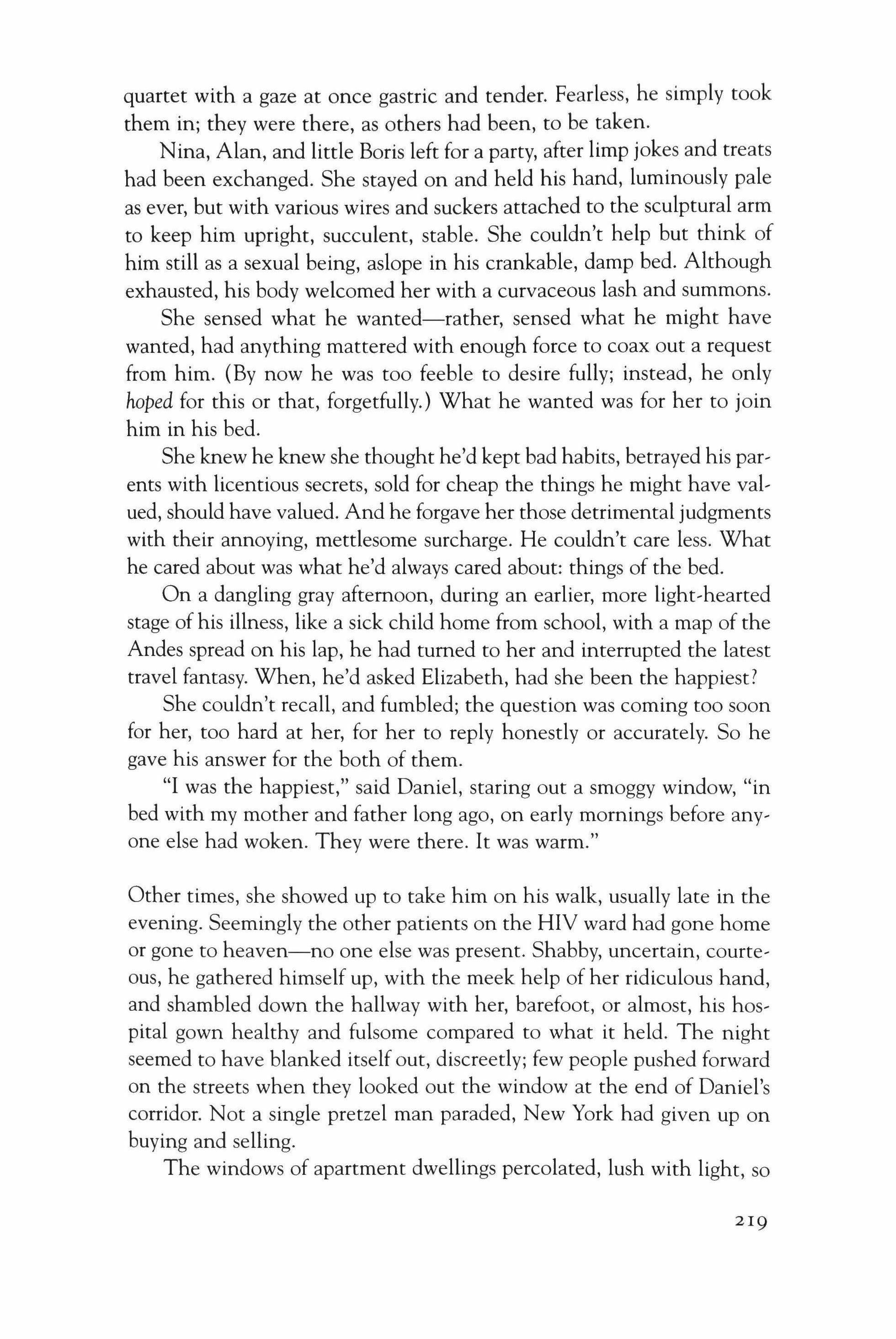
quartet with a gaze at once gastric and tender. Fearless, he simply took them in; they were there, as others had been, to be taken.
Nina, Alan, and little Boris left for a party, after limp jokes and treats had been exchanged. She stayed on and held his hand, luminously pale as ever, but with various wires and suckers attached to the sculptural arm to keep him upright, succulent, stable. She couldn't help but think of him still as a sexual being, aslope in his crankable, damp bed. Although exhausted, his body welcomed her with a curvaceous lash and summons.
She sensed what he wanted-rather, sensed what he might have wanted, had anything mattered with enough force to coax out a request from him. (By now he was too feeble to desire fully; instead, he only hoped for this or that, forgetfully.) What he wanted was for her to join him in his bed.
She knew he knew she thought he'd kept bad habits, betrayed his parents with licentious secrets, sold for cheap the things he might have valued, should have valued. And he forgave her those detrimental judgments with their annoying, mettlesome surcharge. He couldn't care less. What he cared about was what he'd always cared about: things of the bed.
On a dangling gray afternoon, during an earlier, more light-hearted stage of his illness, like a sick child home from school, with a map of the Andes spread on his lap, he had turned to her and interrupted the latest travel fantasy. When, he'd asked Elizabeth, had she been the happiest?
She couldn't recall, and fumbled; the question was coming too soon for her, too hard at her, for her to reply honestly or accurately. So he gave his answer for the both of them.
"I was the happiest," said Daniel, staring out a smoggy window, "in bed with my mother and father long ago, on early mornings before anyone else had woken. They were there. It was warm."
Other times, she showed up to take him on his walk, usually late in the evening. Seemingly the other patients on the HIV ward had gone home or gone to heaven-no one else was present. Shabby, uncertain, courteous, he gathered himself up, with the meek help of her ridiculous hand, and shambled down the hallway with her, barefoot, or almost, his hospital gown healthy and fulsome compared to what it held. The night seemed to have blanked itself out, discreetly; few people pushed forward on the streets when they looked out the window at the end of Daniel's corridor. Not a single pretzel man paraded, New York had given up on buying and selling.
The windows of apartment dwellings percolated, lush with light, so
2I9
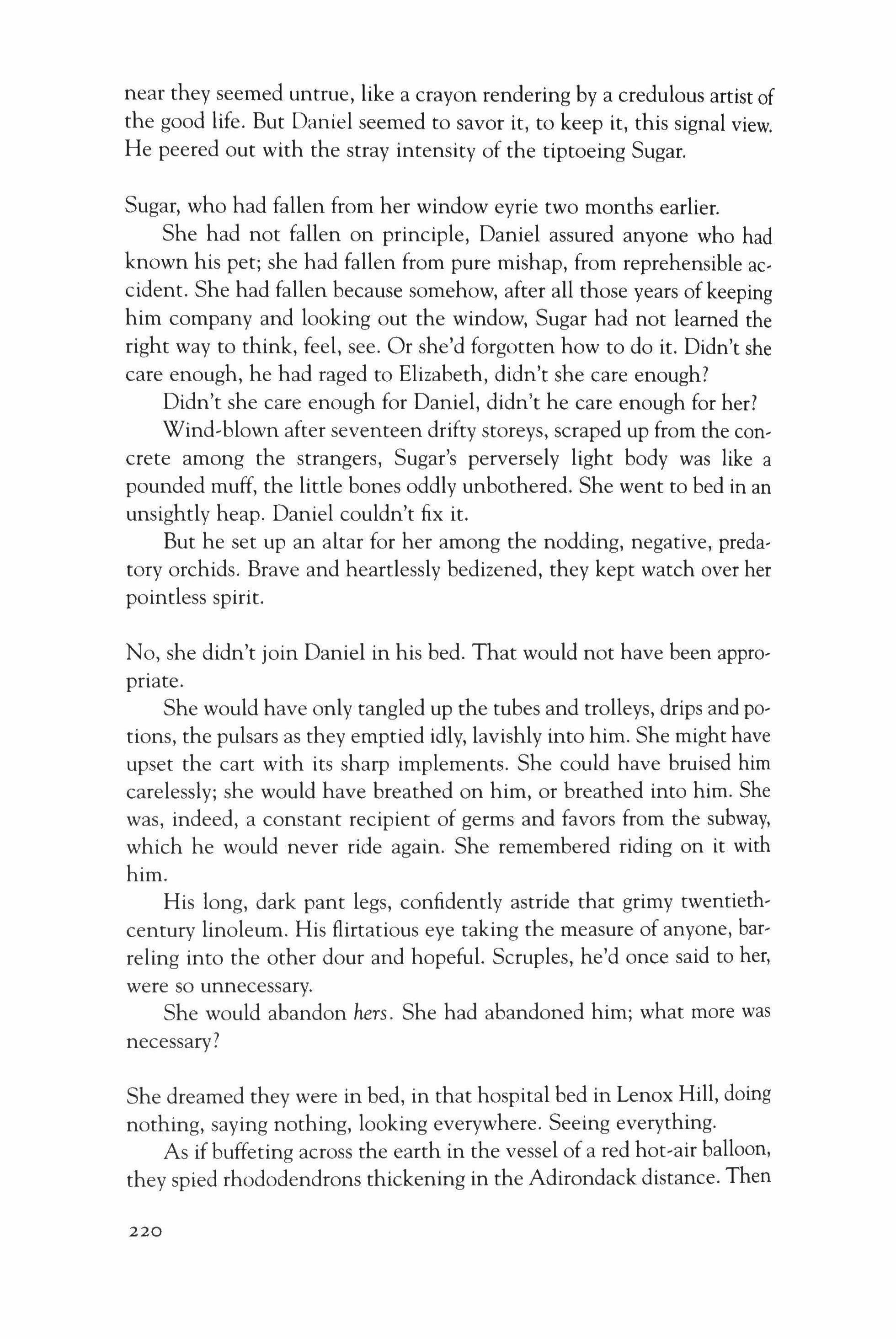
near they seemed untrue, like a crayon rendering by a credulous artist of the good life. But Daniel seemed to savor it, to keep it, this signal view. He peered out with the stray intensity of the tiptoeing Sugar.
Sugar, who had fallen from her window eyrie two months earlier.
She had not fallen on principle, Daniel assured anyone who had known his pet; she had fallen from pure mishap, from reprehensible accident. She had fallen because somehow, after all those years of keeping him company and looking out the window, Sugar had not learned the right way to think, feel, see. Or she'd forgotten how to do it. Didn't she care enough, he had raged to Elizabeth, didn't she care enough?
Didn't she care enough for Daniel, didn't he care enough for her?
Wind-blown after seventeen drifty storeys, scraped up from the concrete among the strangers, Sugar's perversely light body was like a pounded muff, the little bones oddly unbothered. She went to bed in an unsightly heap. Daniel couldn't fix it.
But he set up an altar for her among the nodding, negative, predatory orchids. Brave and heartlessly bedizened, they kept watch over her pointless spirit.
No, she didn't join Daniel in his bed. That would not have been appropriate.
She would have only tangled up the tubes and trolleys, drips and potions, the pulsars as they emptied idly, lavishly into him. She might have upset the cart with its sharp implements. She could have bruised him carelessly; she would have breathed on him, or breathed into him. She was, indeed, a constant recipient of germs and favors from the subway, which he would never ride again. She remembered riding on it with him.
His long, dark pant legs, confidently astride that grimy twentiethcentury linoleum. His flirtatious eye taking the measure of anyone, barreling into the other dour and hopeful. Scruples, he'd once said to her, were so unnecessary.
She would abandon hers. She had abandoned him; what more was necessary?
She dreamed they were in bed, in that hospital bed in Lenox Hill, doing nothing, saying nothing, looking everywhere. Seeing everything.
As if buffeting across the earth in the vessel of a red hot-air balloon, they spied rhododendrons thickening in the Adirondack distance. Then
220
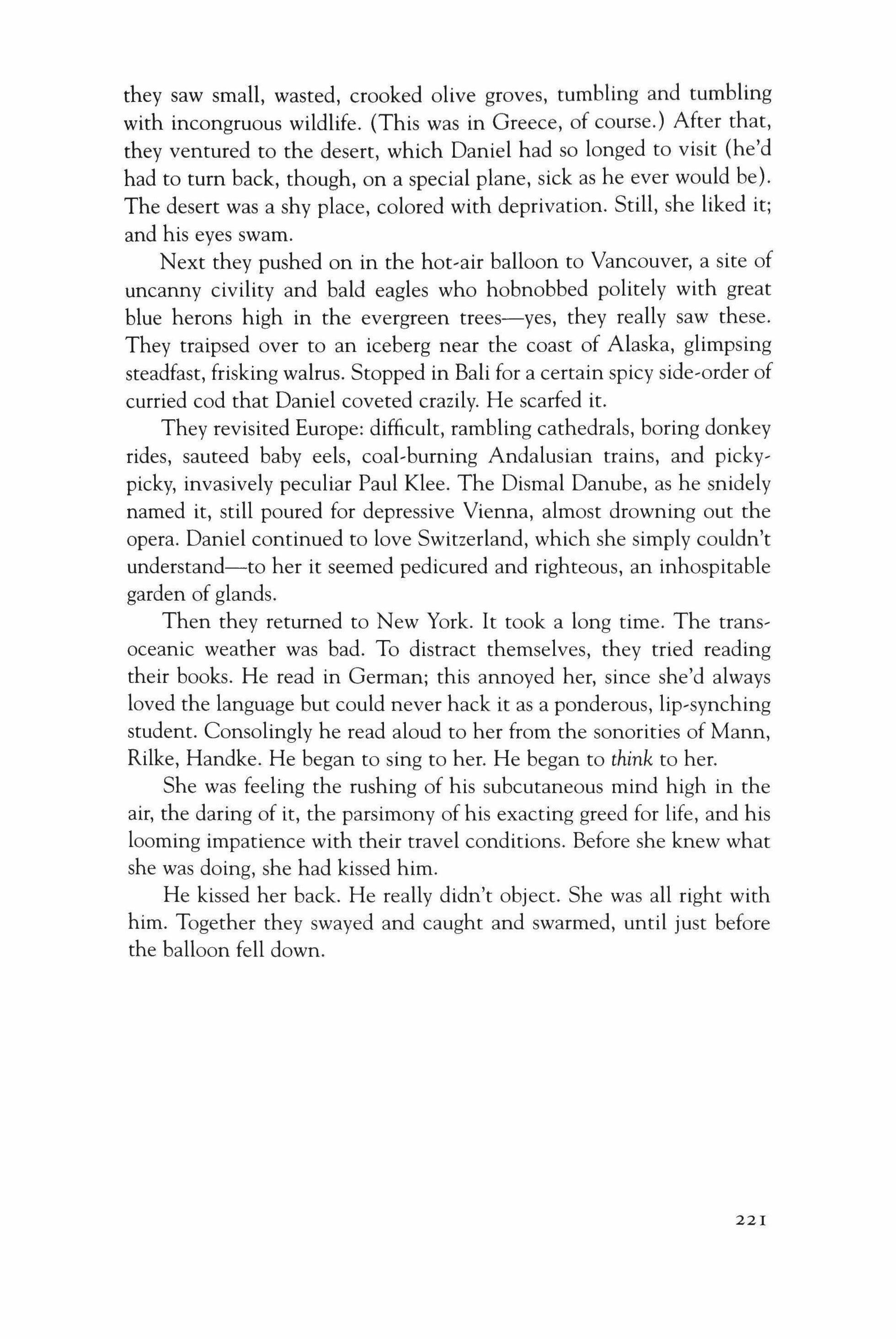
they saw small, wasted, crooked olive groves, tumbling and tumbling with incongruous wildlife. (This was in Greece, of course.) After that, they ventured to the desert, which Daniel had so longed to visit (he'd had to turn back, though, on a special plane, sick as he ever would be). The desert was a shy place, colored with deprivation. Still, she liked it; and his eyes swam.
Next they pushed on in the hot-air balloon to Vancouver, a site of uncanny civility and bald eagles who hobnobbed politely with great blue herons high in the evergreen trees-yes, they really saw these. They traipsed over to an iceberg near the coast of Alaska, glimpsing steadfast, frisking walrus. Stopped in Bali for a certain spicy side-order of curried cod that Daniel coveted crazily. He scarfed it.
They revisited Europe: difficult, rambling cathedrals, boring donkey rides, sauteed baby eels, coal-burning Andalusian trains, and pickypicky, invasively peculiar Paul Klee. The Dismal Danube, as he snidely named it, still poured for depressive Vienna, almost drowning out the opera. Daniel continued to love Switzerland, which she simply couldn't understand-to her it seemed pedicured and righteous, an inhospitable garden of glands.
Then they returned to New York. It took a long time. The transoceanic weather was bad. To distract themselves, they tried reading their books. He read in German; this annoyed her, since she'd always loved the language but could never hack it as a ponderous, lip-synching student. Consolingly he read aloud to her from the sonorities of Mann, Rilke, Handke. He began to sing to her. He began to think to her.
She was feeling the rushing of his subcutaneous mind high in the air, the daring of it, the parsimony of his exacting greed for life, and his looming impatience with their travel conditions. Before she knew what she was doing, she had kissed him.
He kissed her back. He really didn't object. She was all right with him. Together they swayed and caught and swarmed, until just before the balloon fell down.
221
Inspiration (on being asked)

Each day I've climbed up here and faced down the leaves and buds pushing at my window, or looked down on white pines whirling in their fibonacci dance. And each day I've felt like stone, or a stone in my mouth, or at the tip of each finger; hidebound when I wanted to be endless. So today I again try being endless. No luck. I've no idea how it feels, or how to start. Maybe I need a crisis like sitting on a railing, OK, a fence, overlooking a deep gully, about to collapse, forcing me to jump. I jump. I snap my neck. Crisis over. End of story. Time for a break. But no. I'm lucky. The fence has led me to an old porch and rocking-chair, The war's over, but my father's still away at sea. I don't know him. He hasn't yet pulled us up and moved us south. There's a meerschaum clamped in my grandfather's mouth. In one hand's the ounce of twist he sent me for, and in the other
Brian Swann
222
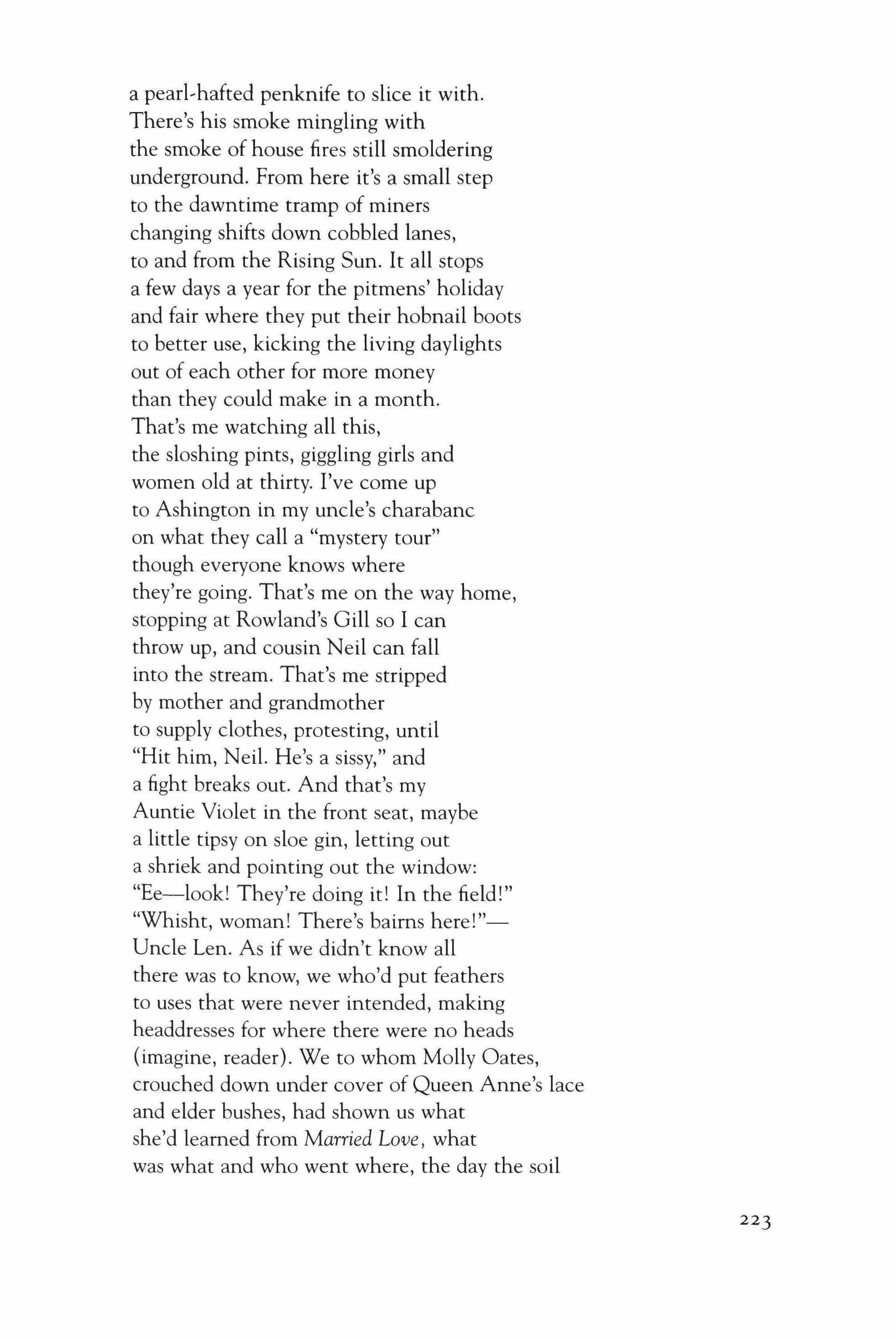
a pearl-hafted penknife to slice it with. There's his smoke mingling with the smoke of house fires still smoldering underground. From here it's a small step to the dawntime tramp of miners changing shifts down cobbled lanes, to and from the Rising Sun. It all stops a few days a year for the pitmens' holiday and fair where they put their hobnail boots to better use, kicking the living daylights out of each other for more money than they could make in a month. That's me watching all this, the sloshing pints, giggling girls and women old at thirty. I've come up to Ashington in my uncle's charabanc on what they call a "mystery tour" though everyone knows where they're going. That's me on the way home, stopping at Rowland's Gill so I can throw up, and cousin Neil can fall into the stream. That's me stripped by mother and grandmother to supply clothes, protesting, until "Hit him, Neil. He's a sissy," and a fight breaks out. And that's my Auntie Violet in the front seat, maybe a little tipsy on sloe gin, letting out a shriek and pointing out the window: "Ee-look! They're doing it! In the field!" "Whisht, woman! There's bairns here!"Uncle Len. As if we didn't know all there was to know, we who'd put feathers to uses that were never intended, making headdresses for where there were no heads (imagine, reader). We to whom Molly Oates, crouched down under cover of Queen Anne's lace and elder bushes, had shown us what she'd learned from Married Love, what was what and who went where, the day the soil
223
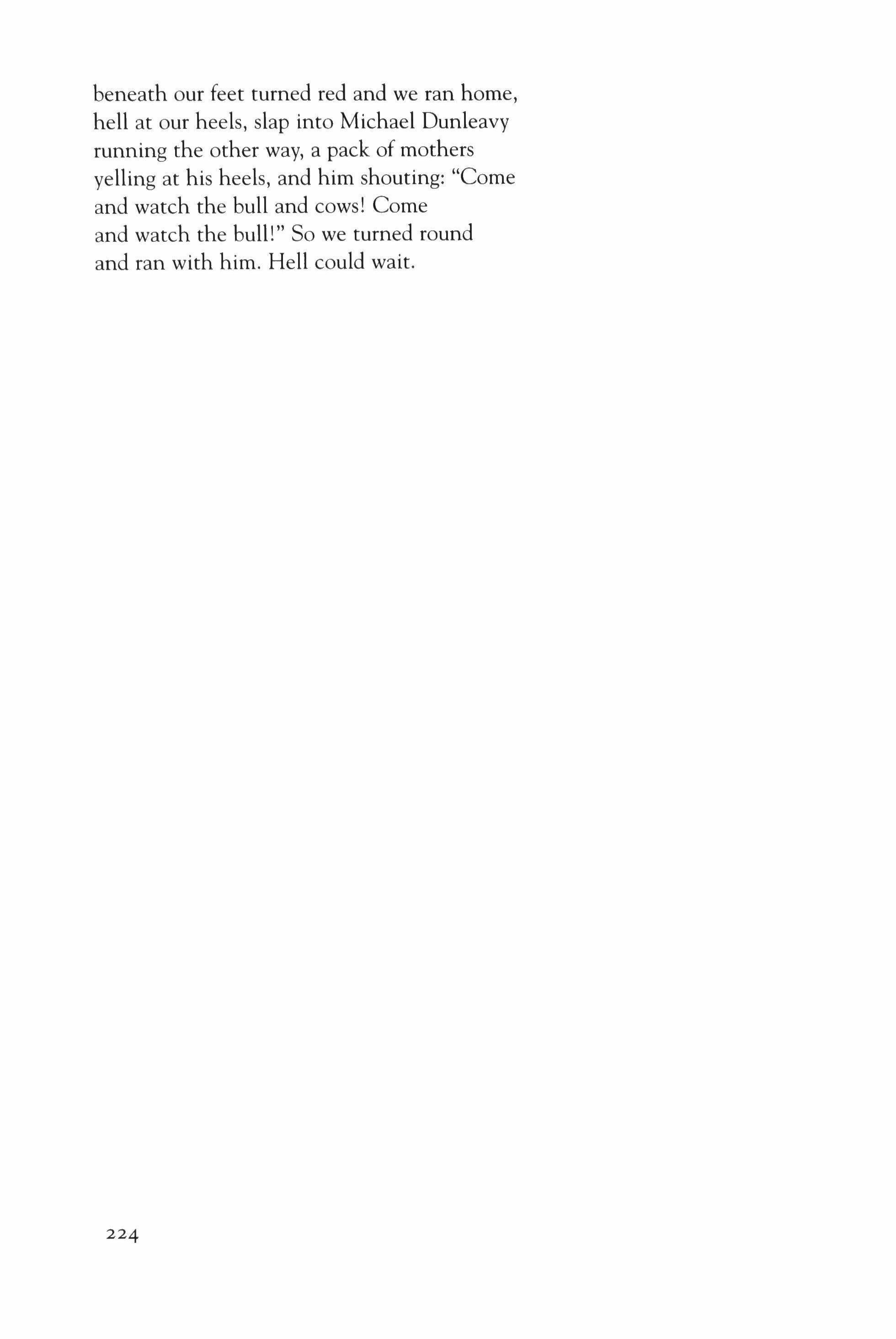
beneath our feet turned red and we ran home, hell at our heels, slap into Michael Dunleavy running the other way, a pack of mothers yelling at his heels, and him shouting: "Come and watch the bull and cows! Come and watch the bull!" So we turned round and ran with him. Hell could wait.
224
Harriet]. Melrose

The Unveiling
A gentle rake reveals the green noses of tulips, angular pokes of iris, strands of the dwarfs.
They peak from a blanket of dead, wet leaves, uninviting on its surface.
It's time to prune the spirea, now beige and dormant but ready to leaf out and bloom.
The lilac displays its buds. The hydrangea carries last season's flowers. The garden's ready for mulch. Nine hundred
cubic feet of mulch have disappeared into this bed as years have gone by. Fifteen years go quickly. It's too early for monk's head, my favorite. The ligularia still hides. Will the delphinium reappear?
I've already lost two. It's a mystery what thrives and what fails.
225
What She Knows

Sometimes she thinks she's forgotten her own stories. And she feels like a ghost, or maybe, a mist or fog. Her closest friends don't know her.
The woman they know bakes pastries and throws parties. She listens to grief because she can, because it doesn't scare her. She thumbs her nose at her own bleakness.
What she knows is Autumn Sun Gold coneflowers mark midsummer.
Anemone's second bloom means a neighbor pruned its first burst of pink.
Lilac obedience plants herald the autumnal equinox.
No one knows she was taken in restraints to a mental hospital at fifteen,
Or how, after that, her parents gave her baby away, how they sterilized her,
And how she didn't find out until the rape exam ten years later.
What does it matter what they know?
Snow soon covers the garden. Only seed cones, prairie grass remain.
Whiteness, silence, breath, and the song of a few hardy cardinals.
226
Irises
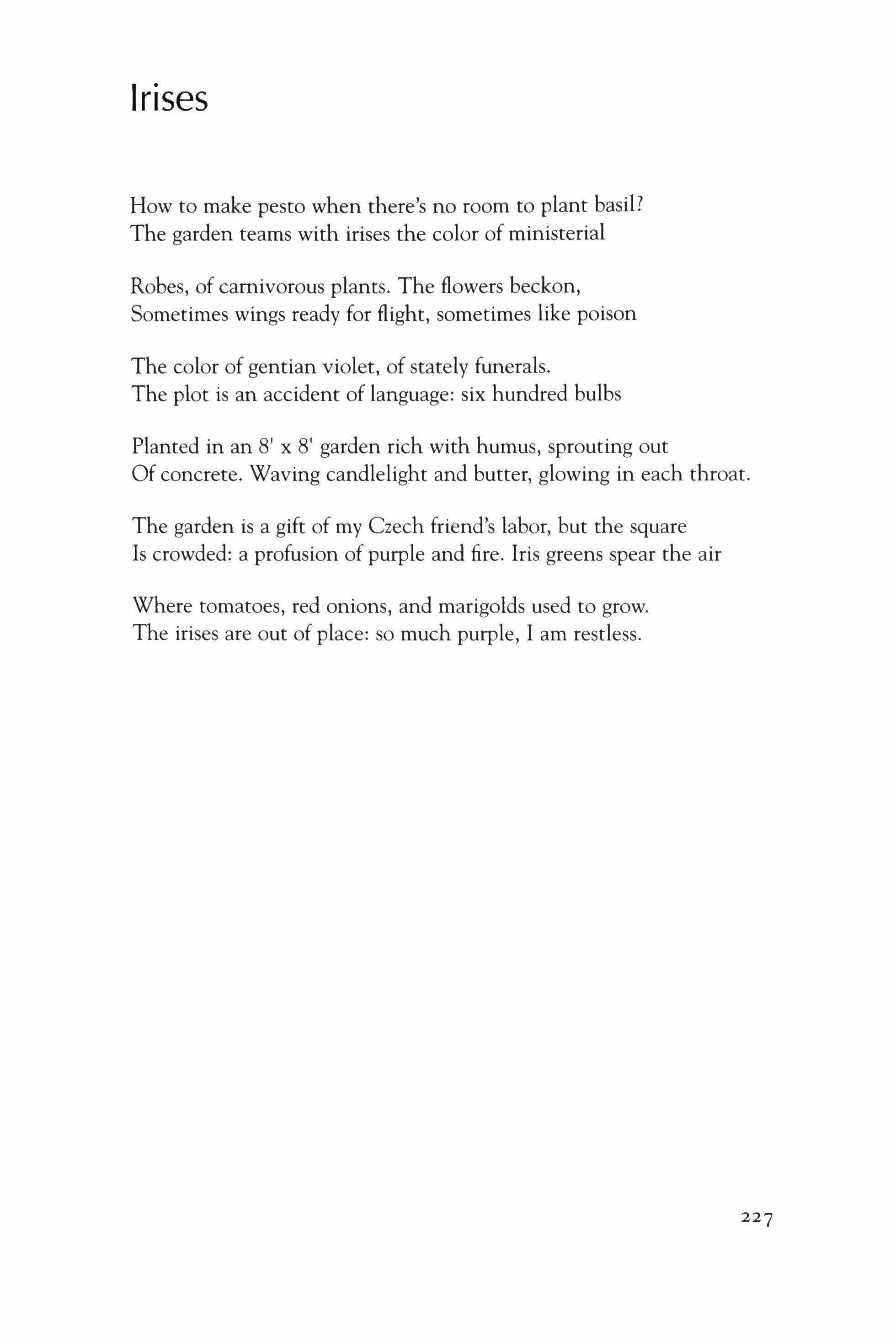
How to make pesto when there's no room to plant basil?
The garden teams with irises the color of ministerial
Robes, of carnivorous plants. The flowers beckon, Sometimes wings ready for flight, sometimes like poison
The color of gentian violet, of stately funerals. The plot is an accident of language: six hundred bulbs
Planted in an 8' x 8' garden rich with humus, sprouting out Of concrete. Waving candlelight and butter, glowing in each throat.
The garden is a gift of my Czech friend's labor, but the square Is crowded: a profusion of purple and fire. Iris greens spear the air
Where tomatoes, red onions, and marigolds used to grow. The irises are out of place: so much purple, I am restless.
227
Specks
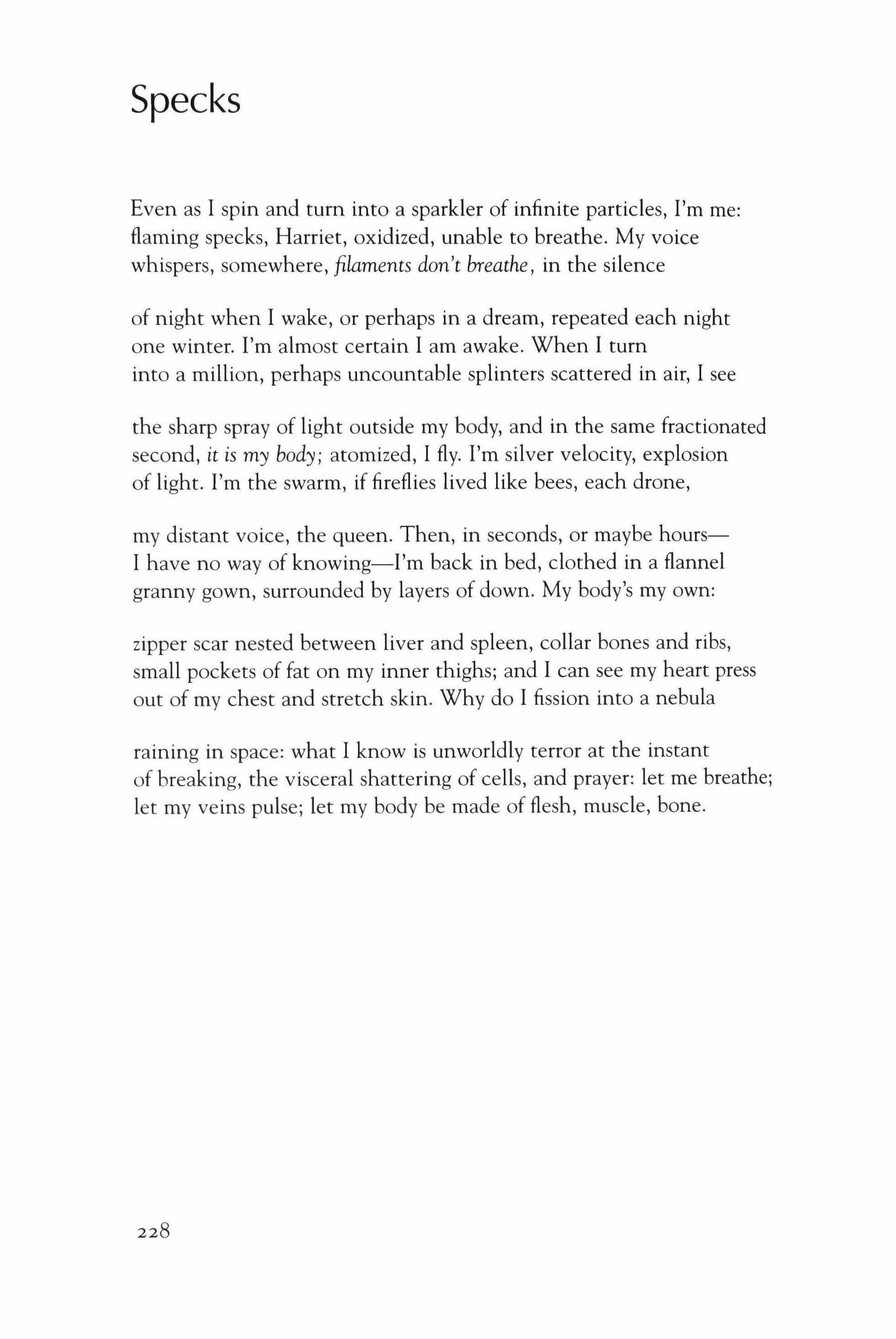
Even as I spin and turn into a sparkler of infinite particles, I'm me: flaming specks, Harriet, oxidized, unable to breathe. My voice whispers, somewhere, filaments don't breathe, in the silence
of night when I wake, or perhaps in a dream, repeated each night one winter. I'm almost certain I am awake. When I turn into a million, perhaps uncountable splinters scattered in air, I see
the sharp spray of light outside my body, and in the same fractionated second, it is my body; atomized, I fly. I'm silver velocity, explosion of light. I'm the swarm, if fireflies lived like bees, each drone, my distant voice, the queen. Then, in seconds, or maybe hoursI have no way of knowing-I'm back in bed, clothed in a flannel granny gown, surrounded by layers of down. My body's my own:
zipper scar nested between liver and spleen, collar bones and ribs, small pockets of fat on my inner thighs; and I can see my heart press out of my chest and stretch skin. Why do I fission into a nebula
raining in space: what I know is unworldly terror at the instant of breaking, the visceral shattering of cells, and prayer: let me breathe; let my veins pulse; let my body be made of flesh, muscle, bone.
228
Roy]acobstein

Referral
Digitized, the photo arrives through cyberspace-and there she is: your daughter, in bountiful cap of natal hair.
Black eyes fixed on the unseen photographer's flash, tiny garnet lips poised to arc into smile, she exudes the utter confidence of the newly born, and your milkless breasts swell and you wonder do they have fuchsia in Cambodia, and frangipani, and if so, what are they called, with what syllables pronounced, how soon will you learn them, and how well.
229
Ceremony
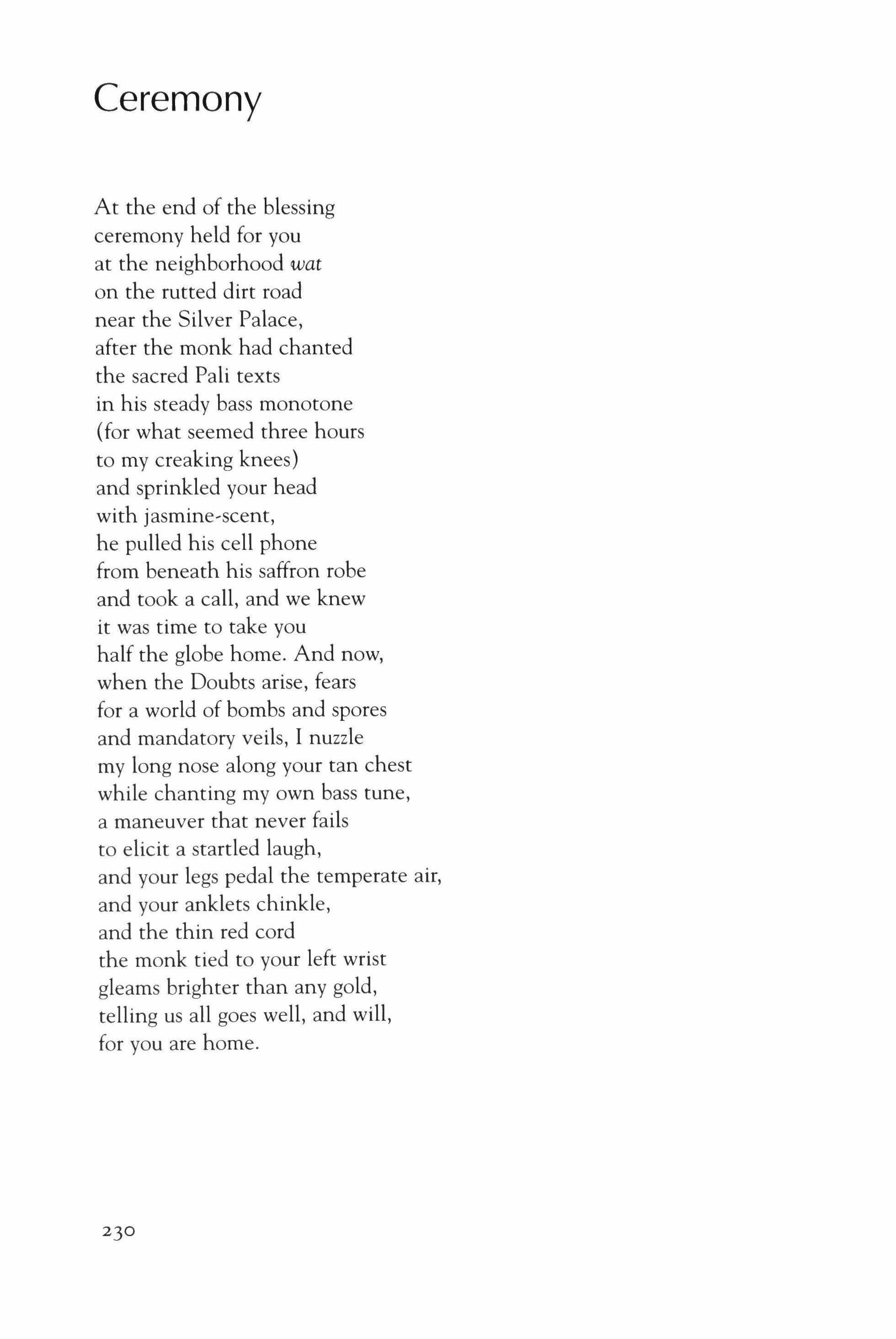
At the end of the blessing ceremony held for you at the neighborhood wat on the rutted dirt road near the Silver Palace, after the monk had chanted the sacred Pali texts in his steady bass monotone (for what seemed three hours to my creaking knees) and sprinkled your head with jasmine-scent, he pulled his cell phone from beneath his saffron robe and took a call, and we knew it was time to take you half the globe home. And now, when the Doubts arise, fears for a world of bombs and spores and mandatory veils, I nuzzle my long nose along your tan chest while chanting my own bass tune, a maneuver that never fails to elicit a startled laugh, and your legs pedal the temperate air, and your anklets chinkle, and the thin red cord the monk tied to your left wrist gleams brighter than any gold, telling us all goes well, and will, for you are home.
23°
First Egg
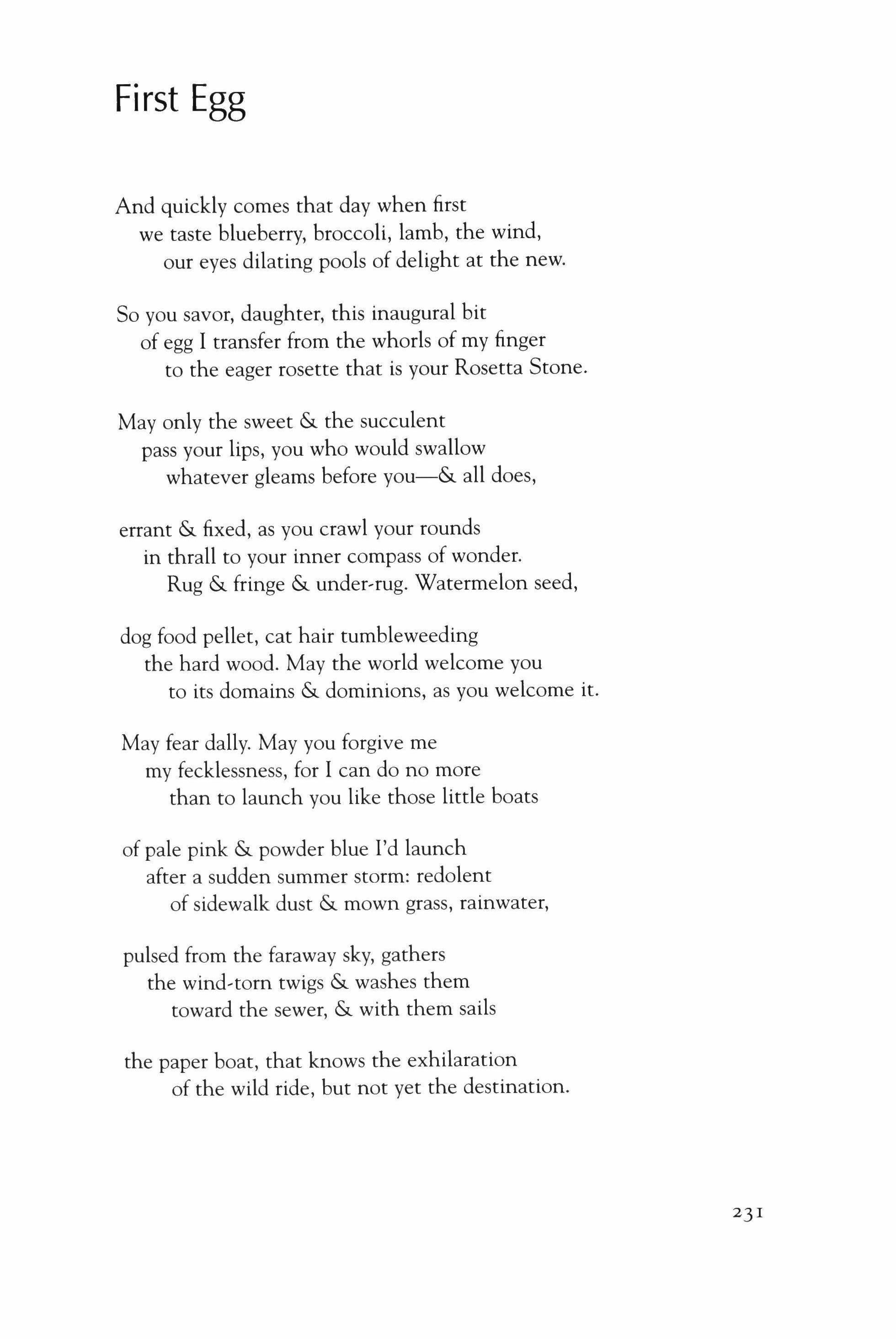
And quickly comes that day when first we taste blueberry, broccoli, lamb, the wind, our eyes dilating pools of delight at the new.
So you savor, daughter, this inaugural bit of egg I transfer from the whorls of my finger to the eager rosette that is your Rosetta Stone.
May only the sweet & the succulent pass your lips, you who would swallow whatever gleams before you-& all does,
errant & fixed, as you crawl your rounds in thrall to your inner compass of wonder. Rug & fringe & under-rug. Watermelon seed,
dog food pellet, cat hair tumbleweeding the hard wood. May the world welcome you to its domains & dominions, as you welcome it.
May fear dally. May you forgive me my fecklessness, for I can do no more than to launch you like those little boats
of pale pink & powder blue I'd launch after a sudden summer storm: redolent of sidewalk dust & mown grass, rainwater,
pulsed from the faraway sky, gathers the wind-torn twigs & washes them toward the sewer, & with them sails
the paper boat, that knows the exhilaration of the wild ride, but not yet the destination.
23I
Papaya
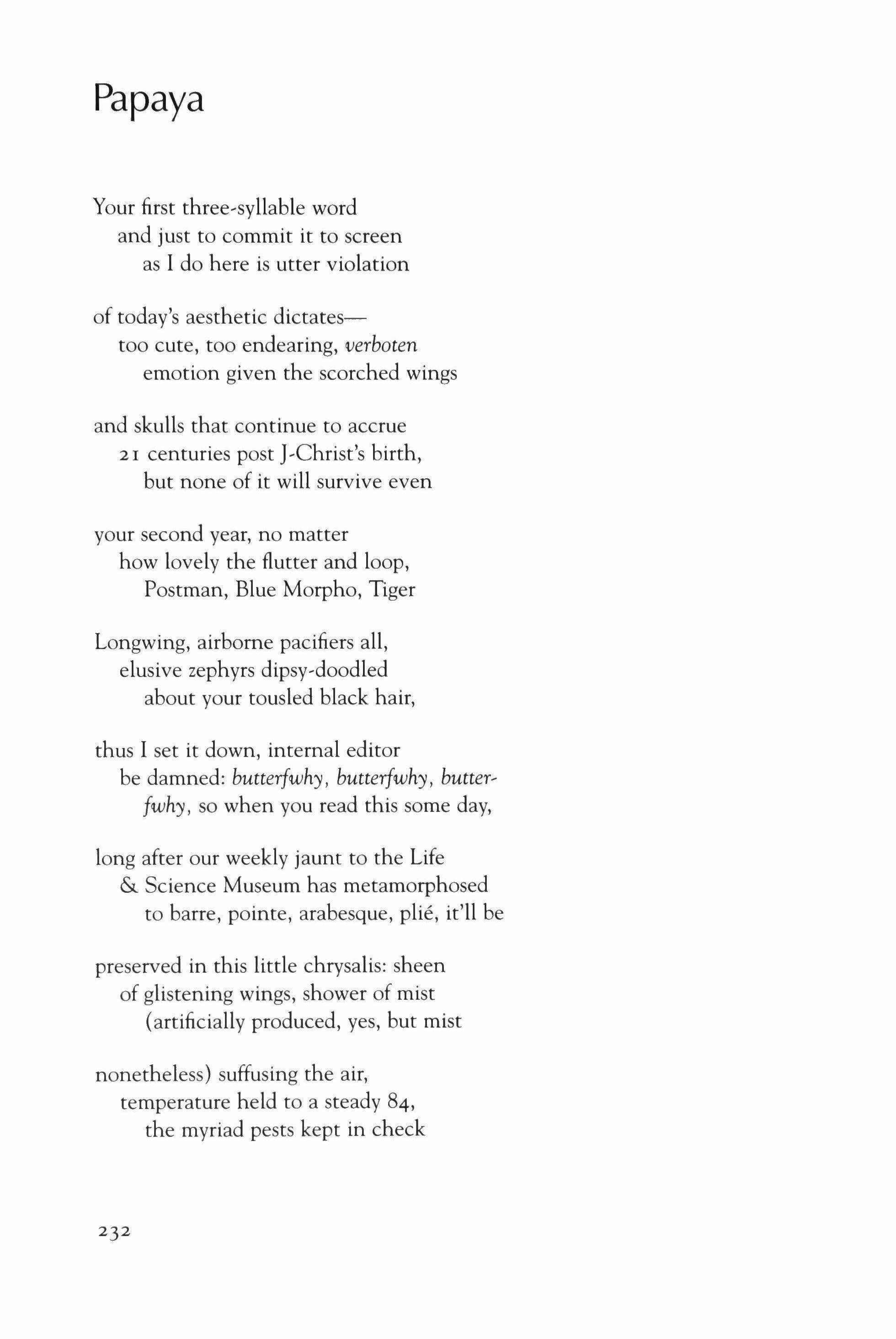
Your first three-syllable word and just to commit it to screen as I do here is utter violation of today's aesthetic dictatestoo cute, too endearing, verboten emotion given the scorched wings and skulls that continue to accrue 2 I centuries post J-Christ's birth, but none of it will survive even your second year, no matter how lovely the flutter and loop, Postman, Blue Morpho, Tiger
Longwing, airborne pacifiers all, elusive zephyrs dipsy-doodled about your tousled black hair, thus I set it down, internal editor be damned: butterfwhy, butterfwhy, butter� fwhy, so when you read this some day,
long after our weekly jaunt to the Life & Science Museum has metamorphosed to barre, pointe, arabesque, plie, it'll be preserved in this little chrysalis: sheen of glistening wings, shower of mist (artificially produced, yes, but mist nonetheless) suffusing the air, temperature held to a steady 84, the myriad pests kept in check
232

by the darting, Crayola-green ground fowl you tirelessly pursue, the slices of papaya, giving succor still.
233
Bruce Bond

Flag
These nights in all their smoke and armor, the great concussions of bad faith thumping the horizon, the epileptic flash inside the cloud giving it depth, reach, weight to pull as we move about our drowsy city.
I keep seeing my mother's room at dusk, small, fading, lit by the ice of television glass; how brief a life, how long the hours, how fretful the mother who picks the spice grain by grain from a plate of meat, who presses her palms against her eyes as if to bury the world in the world.
Any wonder I too tum the pages of my linens, bathed in ink, that I sink my face in my pillow and read. And whose world is it that leans so close to blowout the stray candles of my words,
234

to pare the evening horror down to human size, to the crumpling
sound of spring rain; whose hand is this that cracks the window of a book,
its Buddha hemmed in flags of fire, a hub in the mind's wide wheel of fire.
Be in the world but not of it, says the book-or is it the other waybe lodged in the ring of flames so deep there's no retreating.
I could be somewhere between this wakefulness and another country,
in the no fly zone of near-sleep where ceilings buckle, sigh, click
into place, where the clock bleeds a little nightlight, humming,
where over and over the wind gives its briefing to the alders,
and who am I to talk, I say, as if God burned the letters that we sent.
My flag is not my flag draped on the face of a tyrant statue.
Its colors are no brighter than a song I sang badly as a boy.
No song, says the world, not now. No mooning over a troubled covenant.
No song for the beast of the literal heart thrashing in its irons.
235

And then it comes to me: my father's weariness at the end of day, eyes glazed, his body bearing what I could not fathom.
It is 1954; somewhere still ash settles on a village in Korea. Bombs shake the Nevada sand. Birds drop out of the sky in cinders.
Be in the world but not of it, says the body, the eye, the ring of flames.
My father blankets the grass, tunes the somber radio and falls asleep, drowned in violinshello in there, we whisper-
that gentle snore like a cleft chain dragging across the ocean floor.
The Rice Bird

Sister Robert of the fifth grade assigned us to make an image of a bird by gluing colored rice to a board. Holding little art, and always having rice for dinner, I could not think but ask my mother's friend, the neighbor downstairs, to help me.
A bird made of rice, she sighed. Without a yes, we dove into her kitchen. I watched her first explain how it might take shape on the board, then give up the teaching to devour the task herself, talking to herself as she glued the dyed grains on her sketch.
A mosaic oriole or jay, except the colors had gone to that side of nature nature ignoredthe fervent phoenix and the aureate dove.
The bird was perched on a branch that trembled in her memory alone, And now, she said giving me a creature byzantine with light and pointillist drunk, Take this bird to your teacher. I was dumb,
Ricardo Pau Llosa
237
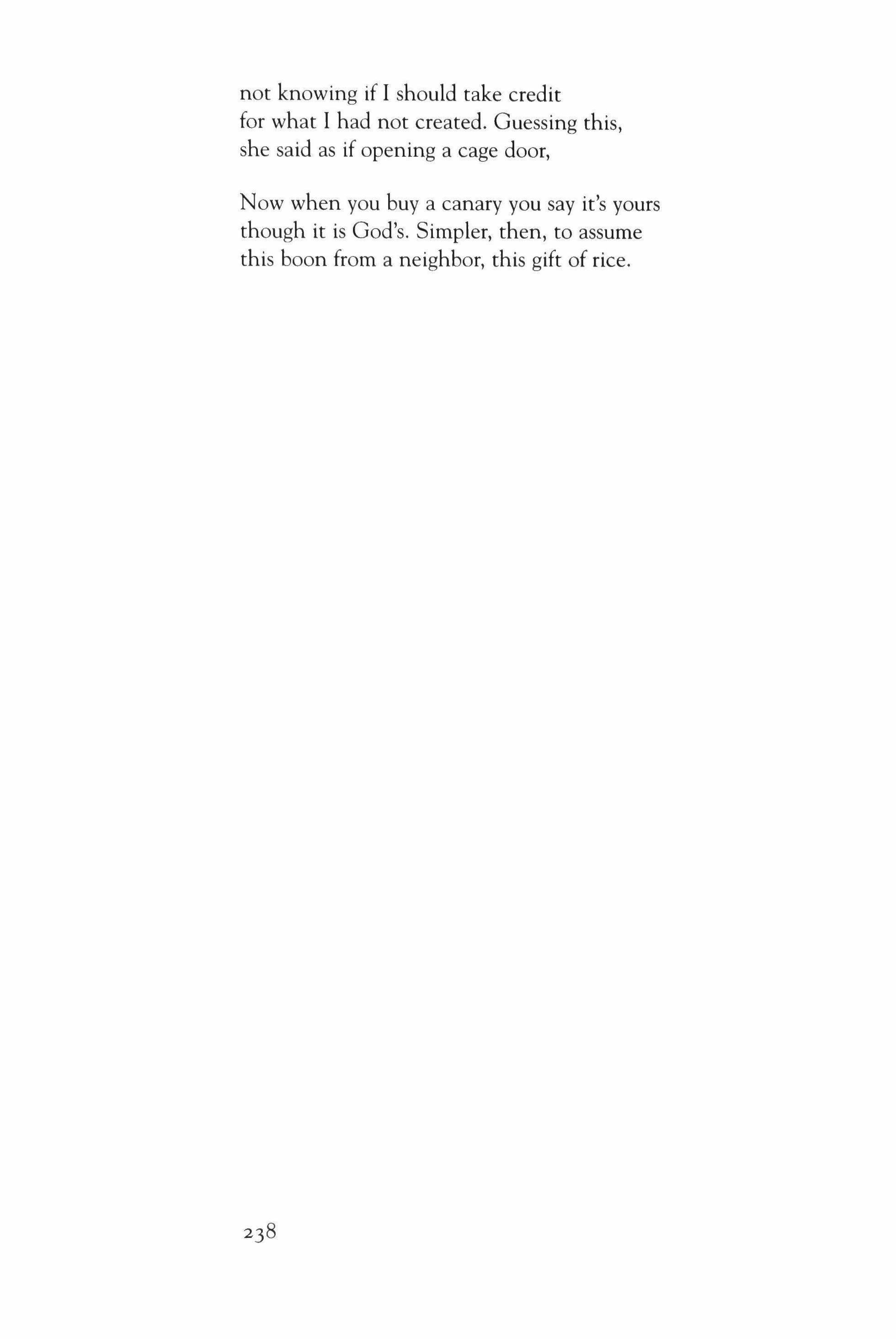
not knowing if I should take credit for what I had not created. Guessing this, she said as if opening a cage door,
Now when you buy a canary you say it's yours though it is God's. Simpler, then, to assume this boon from a neighbor, this gift of rice.

Hunters in the Snow
After Bruegel
From and toward the bitter white they trudge, down the breasted slope to the angled squares of roofs and the green banners of stiff ponds dotted with skaters. The hunters are like the bonfire at the inn's door, of that proud element, and not the fluid cracked by season or the air that lets a scissors of a bird tum and dip.
Where is the earth? The gaunt dogs sniff for it, the trees are anchored in it, absent beneath the fallen season that has skirted and drowned the tired ground. All that fruit and grain, all the trembling shades. This is the time to shut away and let men find the world without it. Let them think they feel the ground beneath the anvil of boot. They know the brown black trees are its ripped streamers.
Finally, hulked and gunned, and ready for tavern and whore, they swell to know they are earth. But in the coughed vapors, they are the air too. In sweat, piss and spittle, the water. All four elements reel within thembeast but master.
And something else, not the shot soul but what the baked village so daintily speaks. The dwellers gather, yet they dot distances that cannot reduce mountain or the flood gray of sky. Even the village is too small to be noticed by the soaring bird. Yet what else returns home
239
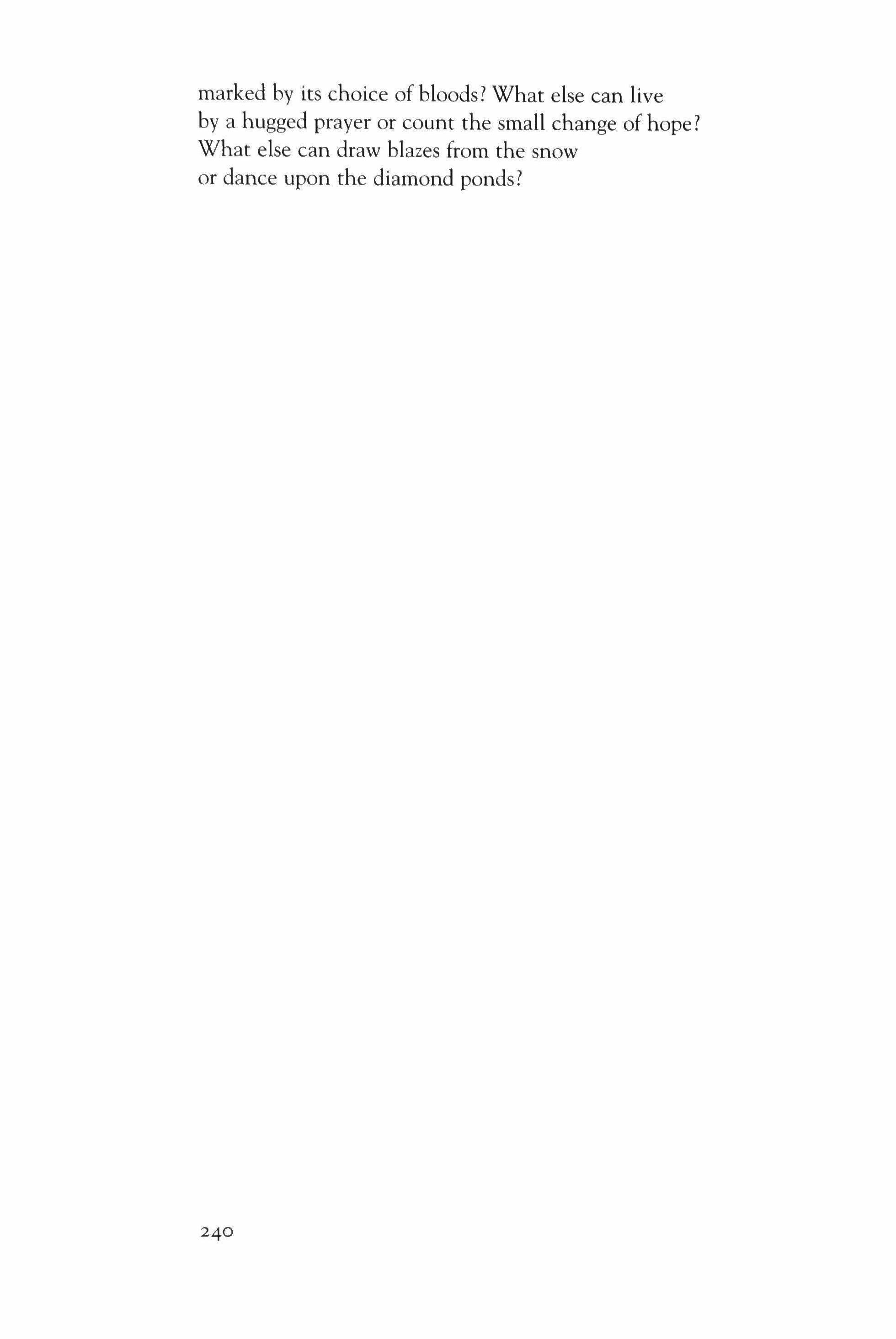
marked by its choice of bloods? What else can live by a hugged prayer or count the small change of hope? What else can draw blazes from the snow or dance upon the diamond ponds?
Peter Johnson
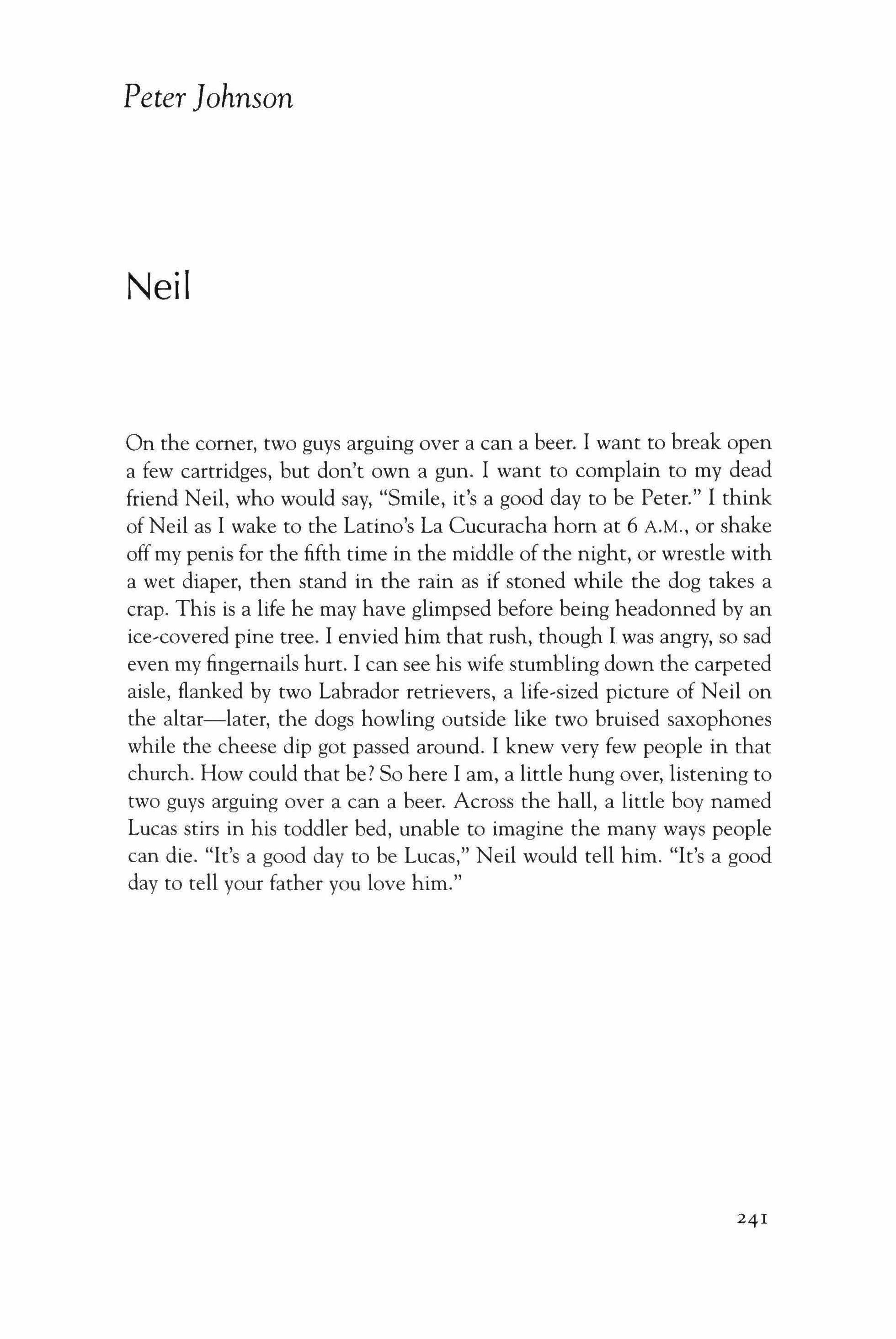
Neil
On the comer, two guys arguing over a can a beer. I want to break open a few cartridges, but don't own a gun. I want to complain to my dead friend Neil, who would say, "Smile, it's a good day to be Peter." I think of Neil as I wake to the Latino's La Cucuracha hom at 6 A.M., or shake off my penis for the fifth time in the middle of the night, or wrestle with a wet diaper, then stand in the rain as if stoned while the dog takes a crap. This is a life he may have glimpsed before being headonned by an ice-covered pine tree. I envied him that rush, though I was angry, so sad even my fingernails hurt. I can see his wife stumbling down the carpeted aisle, flanked by two Labrador retrievers, a life-sized picture of Neil on the altar-later, the dogs howling outside like two bruised saxophones while the cheese dip got passed around. I knew very few people in that church. How could that be? So here I am, a little hung over, listening to two guys arguing over a can a beer. Across the hall, a little boy named Lucas stirs in his toddler bed, unable to imagine the many ways people can die. "It's a good day to be Lucas," Neil would tell him. "It's a good day to tell your father you love him."
And Nothing Else Matters

On 1�395 between Occum and Preston the interstate ablaze with foliage, a heavy metal ballad swelling the speakers of my SUV, I weep like the middle-aged fool I am. In Hartford, my wife called to say Sue Anne overdosed in a motel in North Carolina when she was supposed to be alive in a motel in White Plains. Supposedly because of a man, which is another way of saying Fate. Supposedly because of her mother, which is another way of saying Love. Whoever is sick will become well. Whoever is well will become sick. If I credit this passage to Aquinas, will it console you? Will you drive to North Carolina and empty Sue Anne's belongings into a cardboard box? Will you collapse at the next rest stop, very much like this one, where a family of pine trees, very much like these, bends from the weight of the wind, paying homage to a god much kinder than ours?
Happy

In spite of persistent rumors, let me assure you I'm happy. Happy as my well-fed pug and blue-eyed infant. Happy as the Brazilian beauty in a red thong cavorting half-naked on the Travel Channel. Happier than the local loony screaming at the same tree every morning, convinced it's an enemy from a past life. I'm happy I can say, "Don't go away I've got the baddest poem right here in my back pocket," and no one thinks I'm nuts. Happy for artificial putting greens, yellow buses that swallow up children yet no one gets hurt. Happy for tuna fish and the piano player at Nordstrom who asked me to sing along. Crusty sand dunes, orchids, a solitary grayish cloud frozen in the sky-I'm happy for them. Happy for the rust-colored bottom of a rap diva, for the ant-sized beauty mark on my wife's bum. Happy a fifty-two-year-old man can dance and play air guitar in his boxer shorts while his teenage son laughs himself silly. Even happy for Plan A, though I'll never understand it, and for the chance, no, pleasure, to spend a few idle moments inside this here ellipsis
243
The Great Fugue
for Ruth and Don Beatty, for Ella and Tom Rhoads, and for Lorraine and Paul Sensenig
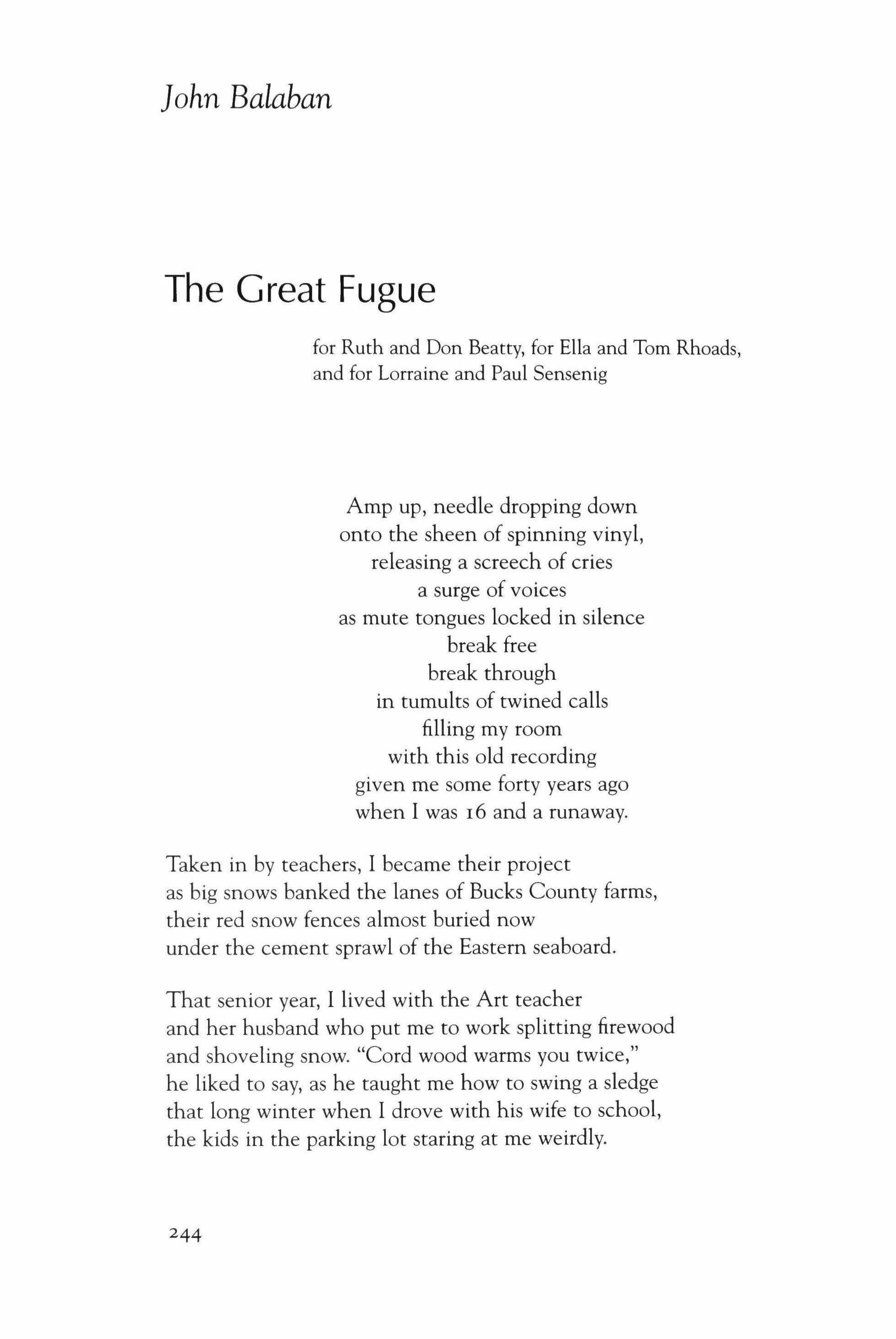
Amp up, needle dropping down onto the sheen of spinning vinyl, releasing a screech of cries a surge of voices as mute tongues locked in silence break free break through in tumults of twined calls filling my room with this old recording given me some forty years ago when I was 16 and a runaway.
Taken in by teachers, I became their project as big snows banked the lanes of Bucks County farms, their red snow fences almost buried now under the cement sprawl of the Eastern seaboard.
That senior year, I lived with the Art teacher and her husband who put me to work splitting firewood and shoveling snow. "Cord wood warms you twice," he liked to say, as he taught me how to swing a sledge that long winter when I drove with his wife to school, the kids in the parking lot staring at me weirdly.
]ohn Balaban
244
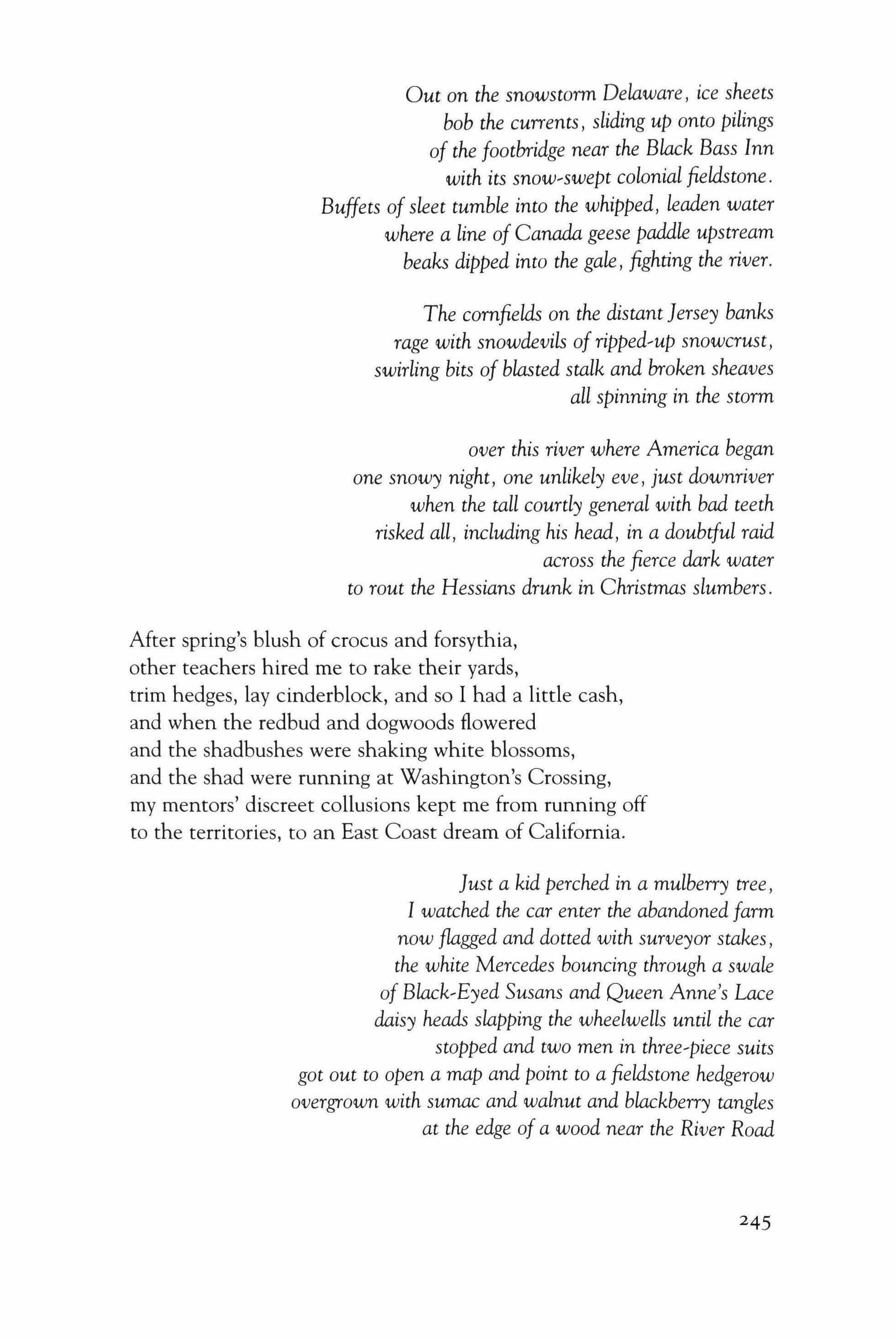
Out on the snowstorm Delaware, ice sheets bob the currents, sliding up onto pilings of the footbridge near the Black Bass Inn with its snow-swept colonial fieldstone. Buffets of sleet tumble into the whipped, leaden water where a line of Canada geese paddle upstream beaks dipped into the gale, fighting the river.
The cornfields on the distant Jersey banks rage with snowdevils ofripped�up snowcrust, swirling bits of blasted stalk and broken sheaves all spinning in the storm
over this river where America began one snowy night, one unlikely eve, just downriver when the tall courtly general with bad teeth risked all, including his head, in a doubtful raid across the fierce dark water to rout the Hessians drunk in Christmas slumbers.
After spring's blush of crocus and forsythia, other teachers hired me to rake their yards, trim hedges, lay cinderblock, and so I had a little cash, and when the redbud and dogwoods flowered and the shadbushes were shaking white blossoms, and the shad were running at Washington's Crossing, my mentors' discreet collusions kept me from running off to the territories, to an East Coast dream of California.
Just a kid perched in a mulberry tree, I watched the car enter the abandoned farm now flagged and dotted with surveyor stakes, the white Mercedes bouncing through a swale of Black�Eyed Susans and Queen Anne's Lace daisy heads slapping the wheelwells until the car stopped and two men in three�piece suits got out to open a map and point to a fieldstone hedgerow overgrown with sumac and walnut and blackberry tangles at the edge of a wood near the River Road 245
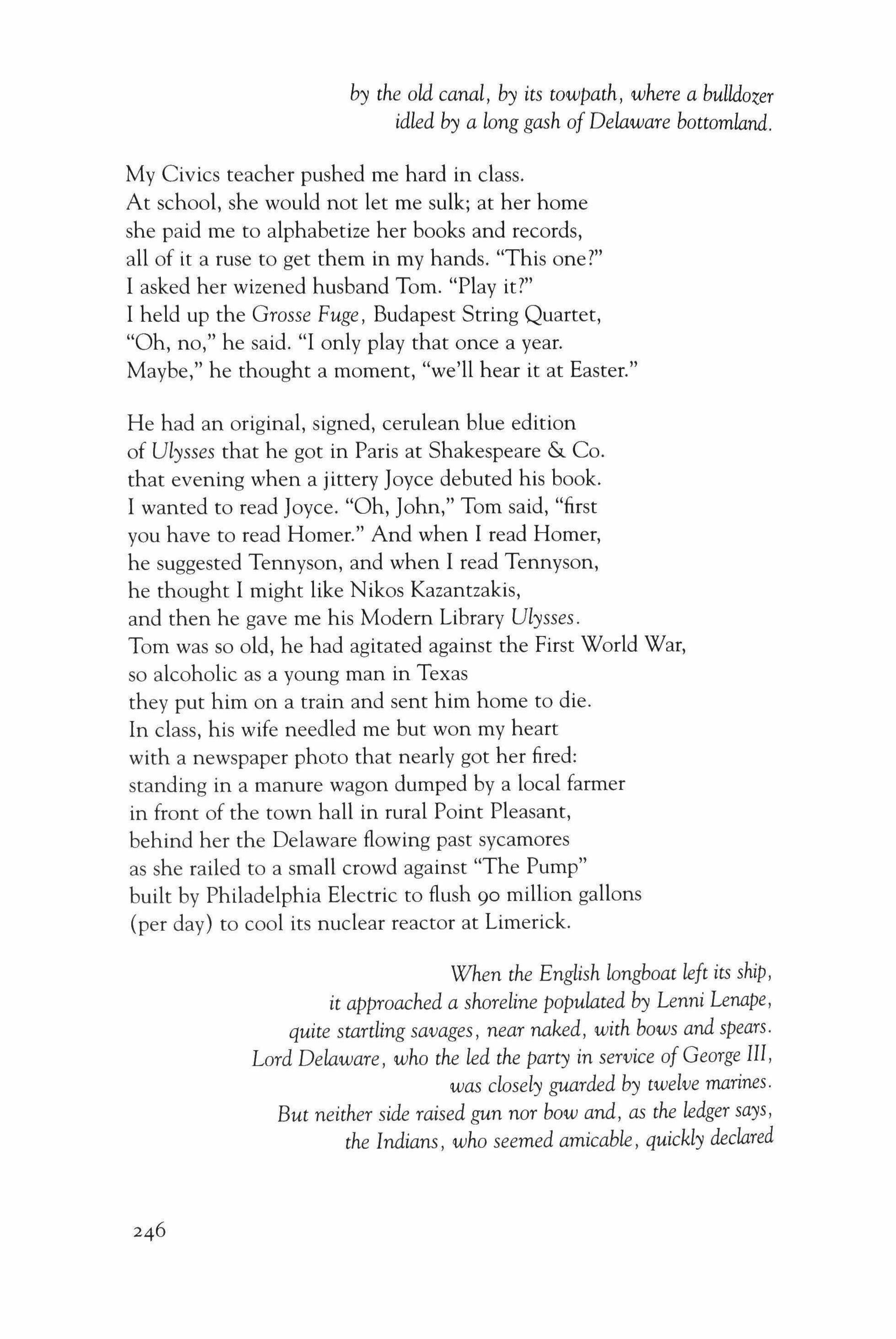
by the old canal, by its towpath, where a bulldozer idled by a long gash of Delaware bottomland.
My Civics teacher pushed me hard in class. At school, she would not let me sulk; at her home she paid me to alphabetize her books and records, all of it a ruse to get them in my hands. "This one?" I asked her wizened husband Tom. "Play it?"
I held up the Grosse Fuge, Budapest String Quartet, "Oh, no," he said. "I only play that once a year. Maybe," he thought a moment, "we'll hear it at Easter."
He had an original, signed, cerulean blue edition of Ulysses that he got in Paris at Shakespeare & Co. that evening when a jittery Joyce debuted his book. I wanted to read Joyce. "Oh, John," Tom said, "first you have to read Homer." And when I read Homer, he suggested Tennyson, and when I read Tennyson, he thought I might like Nikos Kazantzakis, and then he gave me his Modern Library Ulysses. Tom was so old, he had agitated against the First World War, so alcoholic as a young man in Texas they put him on a train and sent him home to die. In class, his wife needled me but won my heart with a newspaper photo that nearly got her fired: standing in a manure wagon dumped by a local farmer in front of the town hall in rural Point Pleasant, behind her the Delaware flowing past sycamores as she railed to a small crowd against "The Pump" built by Philadelphia Electric to flush 90 million gallons (per day) to cool its nuclear reactor at Limerick.
When the English longboat left its ship, it approached a shoreline populated by Lenni Lenape, quite startling savages, near naked, with bows and spears. Lord Delaware, who the led the party in service of George III, was closely guarded by twelve marines. But neither side raised gun nor bow and, as the ledger says, the Indians, who seemed amicable, quickly declared
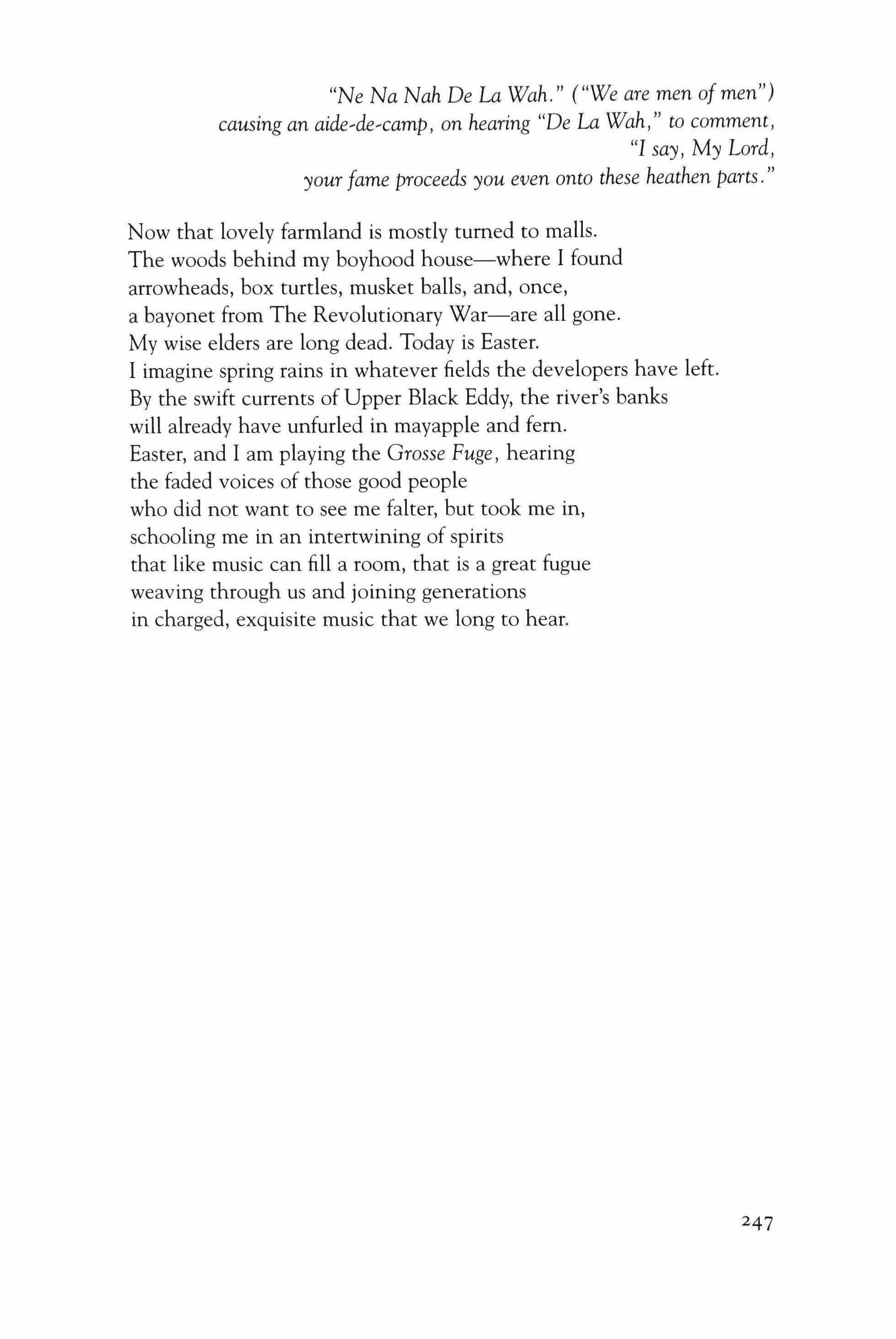
"Ne Na Nah De La Wah." ("We are men of men") causing an aide�de�camp, on hearing "De La Wah," to comment, "I say, My Lord, your fame proceeds you even onto these heathen parts.
Now that lovely farmland is mostly turned to malls. The woods behind my boyhood house-where I found arrowheads, box turtles, musket balls, and, once, a bayonet from The Revolutionary War-are all gone. My wise elders are long dead. Today is Easter. I imagine spring rains in whatever fields the developers have left. By the swift currents of Upper Black Eddy, the river's banks will already have unfurled in mayapple and fern. Easter, and I am playing the Grosse Fuge, hearing the faded voices of those good people who did not want to see me falter, but took me in, schooling me in an intertwining of spirits that like music can fill a room, that is a great fugue weaving through us and joining generations in charged, exquisite music that we long to hear.
247
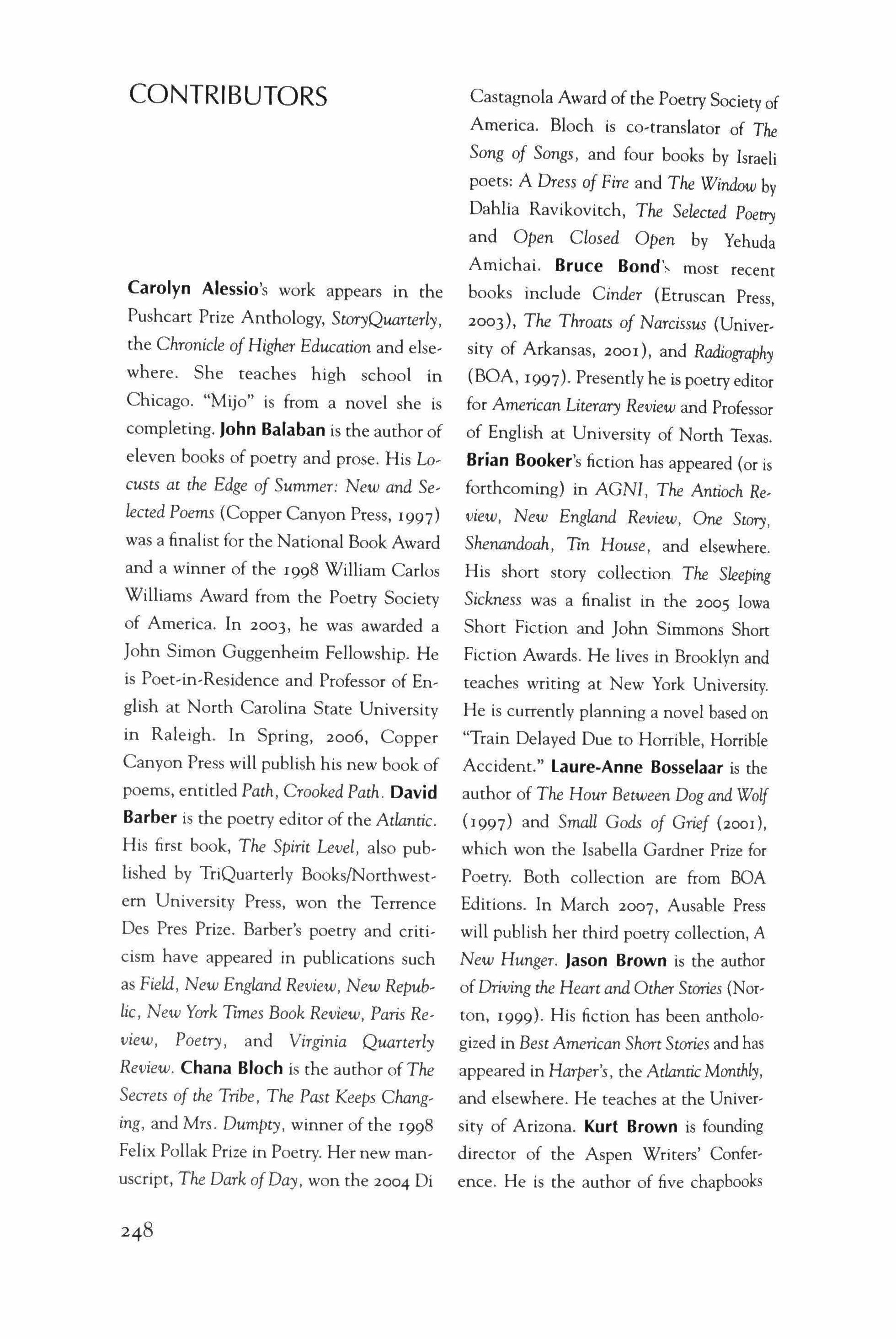
Carolyn Alessio's work appears in the Pushcart Prize Anthology, StoryQuarterly, the Chronicle of Higher Education and elsewhere. She teaches high school in Chicago. "Mijo" is from a novel she is completing. John Balaban is the author of eleven books of poetry and prose. His Locusts at the Edge of Summer: New and Selected Poems (Copper Canyon Press, 1997) was a finalist for the National Book Award and a winner of the 1998 William Carlos Williams Award from the Poetry Society of America. In 2003, he was awarded a John Simon Guggenheim Fellowship. He is Poet-in-Residence and Professor of English at North Carolina State University in Raleigh. In Spring, 2006, Copper Canyon Press will publish his new book of poems, entitled Path, Crooked Path. David Barber is the poetry editor of the Atlantic. His first book, The Spirit Level, also published by TriQuarterly Books/Northwestem University Press, won the Terrence Des Pres Prize. Barber's poetry and criticism have appeared in publications such as Field, New England Review, New Republic, New York TImes Book Review, Paris Review, Poetry, and Virginia Quarterly Review. Chana Bloch is the author of The Secrets of the Tribe, The Past Keeps Changing, and Mrs. Dumpty, winner of the 1998 Felix Pollak Prize in Poetry. Her new manuscript, The Dark ofDay, won the 2004 Dr
Castagnola Award of the Poetry SOCiety of America. Bloch is co-translator of The Song of Songs, and four books by Israeli poets: A Dress of Fire and The Window by Dahlia Ravikovitch, The Selected Poetry and Open Closed Open by Yehuda Amichai. Bruce Bond's most recent books include Cinder (Etruscan Press, 2003), The Throats of Narcissus (University of Arkansas, 2001), and Radiography (BOA, 1997). Presently he is poetry editor for American Literary Review and Professor of English at University of North Texas. Brian Booker's fiction has appeared (or is forthcoming) in AGNI, The Antioch Review, New England Review, One Stary, Shenandoah, TIn House, and elsewhere. His short story collection The Sleeping Sickness was a finalist in the 2005 Iowa Short Fiction and John Simmons Short Fiction Awards. He lives in Brooklyn and teaches writing at New York University. He is currently planning a novel based on "Train Delayed Due to Horrible, Horrible Accident." Laure-Anne Bosselaar is the author of The Hour Between Dog and Wolf (1997) and Small Gods of Grief (2001), which won the Isabella Gardner Prize for Poetry. Both collection are from BOA Editions. In March 2007, Ausable Press will publish her third poetry collection, A New Hunger. Jason Brown is the author ofDriving the Heart and Other Stories (Norton, 1999). His fiction has been anthologized in Best American Short Stories and has appeared in Harper's, the Atlantic Monthly, and elsewhere. He teaches at the University of Arizona. Kurt Brown is founding director of the Aspen Writers' Conference. He is the author of five chapbooks
CONTRIBUTORS

and four full-length poetry collections. His latest collection, From Here, is due out in 2007. Elena Karina Byrne is a teacher, Poetry Moderator for the Los Angeles Times Festival of Books, and former twelve-year Regional Director of the Poetry Society of America. She curates the reading series for University of Southern California's Doheny Memorial Library, and the Ruskin Art Club. Her recent publications include the Yale Review, Chelsea, the Paris Review, Am.erican Poetry Review, Poetry, Ploughshares, Colorado Review, Painted Bride Quarterly, Denver Quarterly, Hotel Amerika, the Journal, and Best American Poetry 2005. Her first book is The Flammable Bird (Zoo Press, 2002). She has completed another, Masque, and is working on a collection of essays, Poetry and Insignificance. Danielle Chapman's reviews appear regularly in Poetry magazine. Moira Crone is the author of the novel Period ofConfinement and three collections of short stories, including Dream State (University Press of Mississippi, paperback, 1998) and The Winnebago Mysteries and Other Stories (Fiction Collective 2, 1982). "The Ice Garden" won the 2004 William Faulkner/Wisdom Prize and is collected in What Gets into Us (University Press of Mississippi, 2006). Kathleen de Azevedo's work has appeared in many publications including the Los Angeles Times, Other Voices, Gulf Coast, Greensboro Review, Michigan Quarterly Review, Green Mountains Review and Boston Review. Tropicalismo, her novel about Brazilian immigrants in the U.S., is slated to be published by the University of Arizona Press and will be released this year. She re-
ceived a fellowship from Stanford University's Center of Latin American Studies to research Literature de Cordel, folklore poetry of Northeast Brazil. She was born in Rio de Janeiro, Brazil. Herman de Coninck (1944-1997), poet, essayist, and critic, was editor of the literary magazine Nieuw Wereld Tijdschrift and the Flemish weekly Humo. His poetry collections include Onbegonnen werk, Enkelvoud, Schoolslag, and the posthumously published Vingerafdrukken. Bruce Jay Friedman is the author of seven novels, including Stem and Mother's Kisses; several plays, including "Steambath" and "Splash"; and four collections of short fiction. He lives in New York City. Jonathan Fink teaches at Emory University. His poems have appeared in Poetry, the New England Review, the Virginia Quarterly Review, Slate, and elsewhere. Garth Greenwell is a Mellon Fellow at Harvard University, where he studies English Literature. His poems have appeared in Salmagundi, Boston Review, and Pleiades. Barbara Hamby's third book of poems is Babel (University of Pittsburgh Press, 2004). She has had poems recently in Ploughshares, the Yale Review, and the Paris Review. She teaches in the creative writing department at Florida State University. Bob Hicok's fifth book, The Clumsy Living, will be published by Pittsburgh University Press in 2007. Roy Jacobstein is a physician working in developing countries on women's reproductive health and family planning. His book, Ripe (University of Wisconsin Press, 2002), was a finalist for the Academy of American Poets' Walt Whitman Award
249
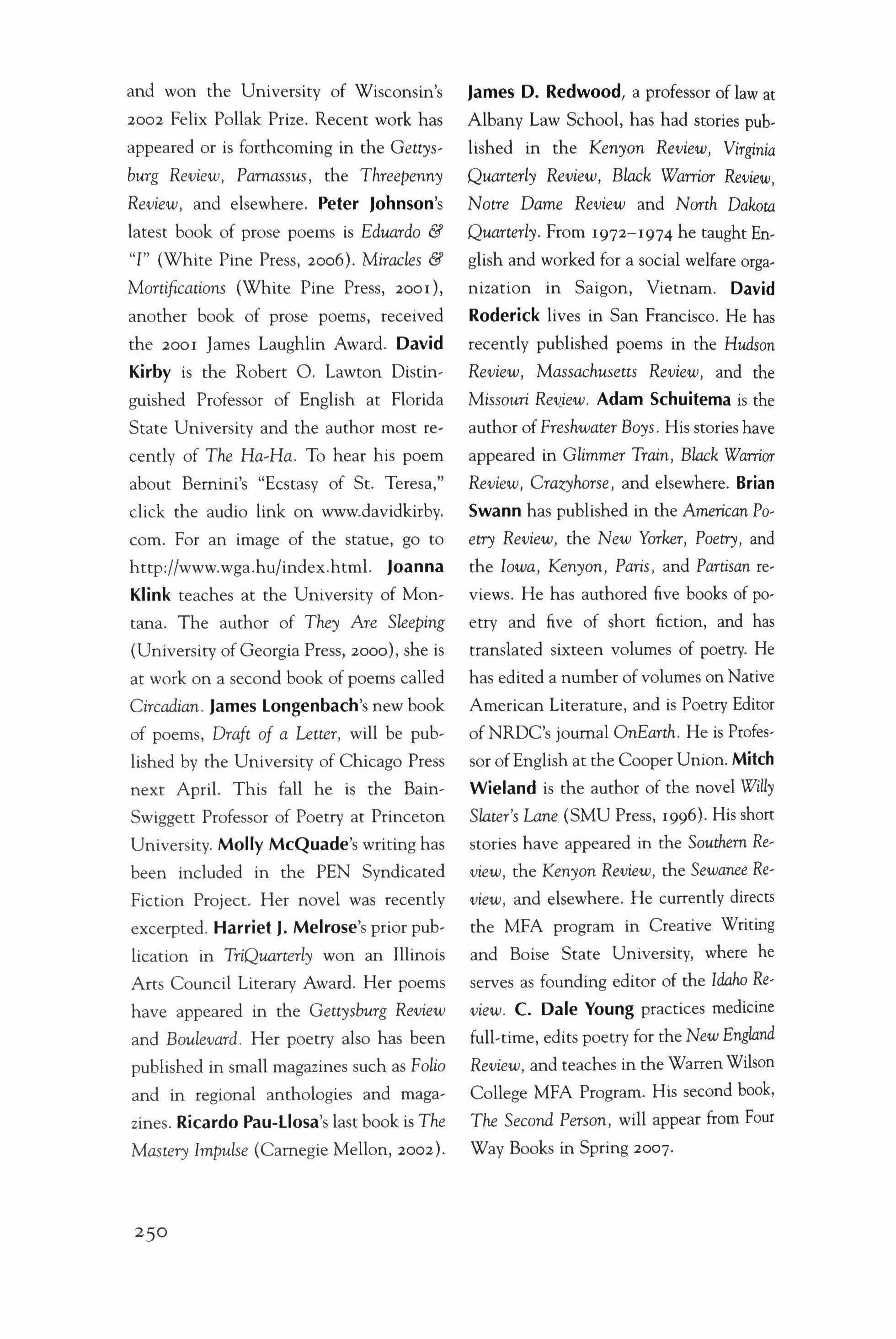
and won the University of Wisconsin's 2002 Felix Pollak Prize. Recent work has appeared or is forthcoming in the Gettysburg Review, Pamassus, the Threepenny Review, and elsewhere. Peter Johnson's latest book of prose poems is Eduardo & "I" (White Pine Press, 2006). Miracles & Mortifications (White Pine Press, 2001), another book of prose poems, received the 2001 James Laughlin Award. David Kirby is the Robert O. Lawton Distinguished Professor of English at Florida State University and the author most recently of The Ha-Ha. To hear his poem about Bernini's "Ecstasy of St. Teresa," click the audio link on www.davidkirby, com. For an image of the statue, go to http://www.wga.hu/index.htrnl. Joanna Klink teaches at the University of Montana. The author of They Are Sleeping (University of Georgia Press, 2000), she is at work on a second book of poems called Circadian. James Longenbach's new book of poems, Draft of a Letter, will be published by the University of Chicago Press next April. This fall he is the BainSwiggett Professor of Poetry at Princeton University. Molly Mcquade's writing has been included in the PEN Syndicated Fiction Project. Her novel was recently excerpted. Harriet J. Melrose's prior publication in TriQuarterly won an Illinois Arts Council Literary Award. Her poems have appeared in the Gettysburg Review and Boulevard. Her poetry also has been published in small magazines such as Folio and in regional anthologies and magazines. Ricardo Pau-Llosa's last book is The Mastery Impulse (Carnegie Mellon, 2002).
James D. Redwood, a professor of law at Albany Law School, has had stories published in the Kenyon Review, Virginia Quarterly Review, Black Warrior Review, Notre Dame Review and North Dakota Quarterly. From 1972-1974 he taught English and worked for a social welfare organization in Saigon, Vietnam. David Roderick lives in San Francisco. He has recently published poems in the Hudson Review, Massachusetts Review, and the Missouri Re�iew. Adam Schuitema is the author ofFreshwater Boys. His stories have appeared in Glimmer Train, Black Warrior Review, Crazyhorse, and elsewhere. Brian Swann has published in the American Poetry Review, the New Yorker, Poetry, and the Iowa, Kenyon, Paris, and Partisan reviews. He has authored five books of poetry and five of short fiction, and has translated sixteen volumes of poetry. He has edited a number of volumes on Native American Literature, and is Poetry Editor of NRDC's journal OnEarth. He is Professor ofEnglish at the Cooper Union. Mitch Wieland is the author of the novel Willy Slater's Lane (SMU Press, 1996). His short stories have appeared in the Southern Review, the Kenyon Review, the Sewanee Review, and elsewhere. He currently directs the MFA program in Creative Writing and Boise State University, where he serves as founding editor of the Idaho Review. C. Dale Young practices medicine full-time, edits poetry for the New England Review, and teaches in the Warren Wilson College MFA Program. His second book, The Second Person, will appear from Four Way Books in Spring 2007.
Subscriptions
Three issues per year. Individuals: one year $24; two years $44; life $600. Institutions: one year $36; two years $68. Overseas: $5 per year additional. Price of back issues varies. Sample copies $5. Address correspondence and subscriptions to TriQuarterly, Northwestern University, 629 Noyes St., Evanston, IL 60208-4210. Phone (847) 491-7614.
Submissions
The editors invite submissions of fiction, poetry and literary essays, which must be postmarked between October I and March 3 I; manuscripts postmarked between April I and September 30 will not be read. No manuscripts will be returned unless accompanied by a stamped, self-addressed envelope. All manuscripts accepted for publication become the property of TriQuarterly, unless otherwise indicated.
Reprints
Reprints of issues I - 17 of TriQuarterly are available in full format from Kraus Reprint Company, Route 100, Millwood, NY 10546, and all issues in microfilm from Universiry Microfilms International, 300 North Zeeb Road, Ann Arbor, MI 48106.
Indexing
TriQuarterly is indexed in the Humanities Index (H. W. Wilson Co.), the American Humanities Index (Whitson Publishing Co.), Historical Abstracts, MLA, EBSCO Publishing (Peabody, MA) and Information Access Co. (Foster City, CAl.
Distributors
Our national distributors to retail trade are Ingram Periodicals (La Vergne, TN); B. DeBoer (Nutley, NJ); Ubiquity (Brooklyn, NY); Armadillo (Los Angeles, CAl.
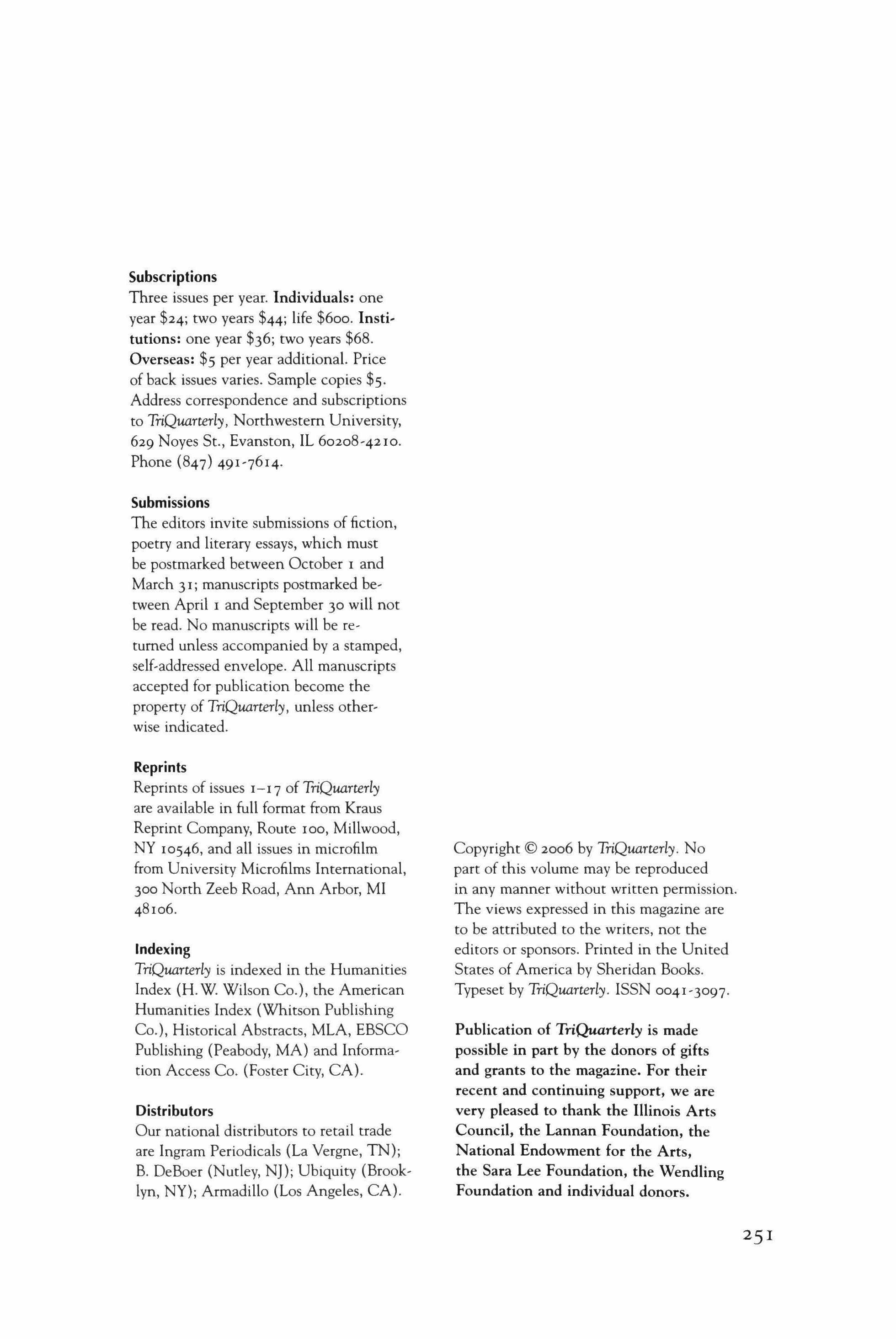
Copyright © 2006 by TriQuarterly. No part of this volume may be reproduced in any manner without written permission. The views expressed in this magazine are to be attributed to the writers, not the editors or sponsors. Printed in the United States of America by Sheridan Books. Typeset by TriQuarterly. ISSN 0041-3097.
Publication of TriQuarterly is made possible in part by the donors of gifts and grants to the magazine. For their recent and continuing support, we are very pleased to thank the Illinois Arts Council, the Lannan Foundation, the National Endowment for the Arts, the Sara Lee Foundation, the Wendling Foundation and individual donors.

Jdaho Review
T.he
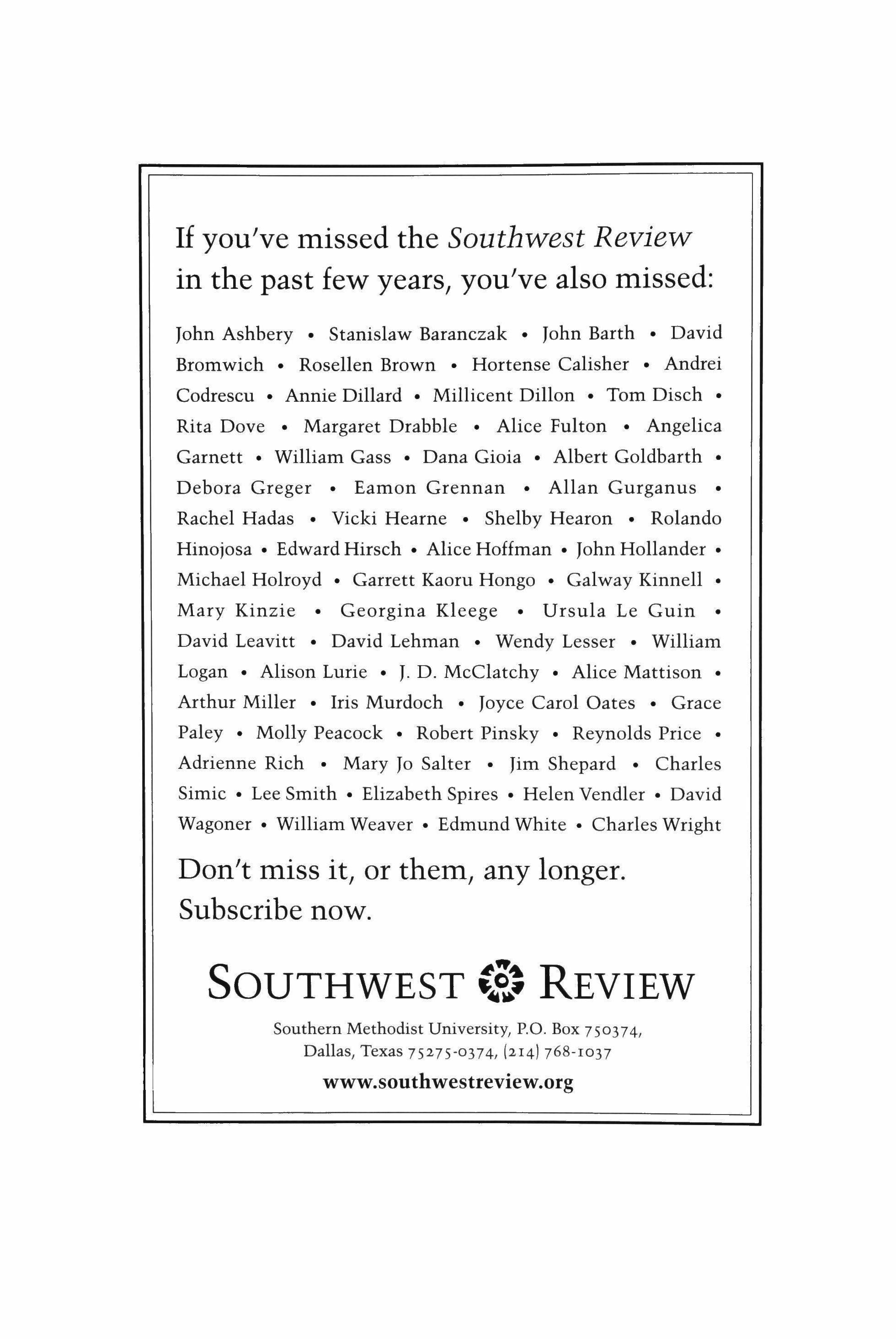
If you've missed the Southwest Review in the past few years, you've also missed:
John Ashbery Stanislaw Baranczak John Barth David
Bromwich Rosellen Brown Hortense Calisher Andrei
Codrescu Annie Dillard Millicent Dillon Tom Disch
Rita Dove Margaret Drabble Alice Fulton Angelica
Garnett William Gass Dana Gioia Albert Goldbarth
Debora Greger Eamon Grennan Allan Gurganus
Rachel Hadas Vicki Hearne Shelby Hearon Rolando
Hinojosa. Edward Hirsch Alice Hoffrnan John Hollander
Michael Holroyd Garrett Kaoru Hongo Galway Kinnell
Mary Kinzie Georgina Kleege Ursula Le Guin
David Leavitt David Lehman Wendy Lesser William
Logan Alison Lurie J. D. McClatchy Alice Mattison
Arthur Miller Iris Murdoch Joyce Carol Oates Grace
Paley Molly Peacock Robert Pinsky Reynolds Price
Adrienne Rich Mary Jo Salter Jim Shepard Charles
Simic Lee Smith > Elizabeth Spires. Helen Vendler David Wagoner William Weaver Edmund White Charles Wright
Don't miss it, or them, any longer. Subscribe now. SOUTHWEST (.�� REVIEW Southern Methodist University, P.O. Box 750374, Dallas, Texas 75275-0374, (214) 768-1037 www.southwestreview.org
"What a wealth of accomplishment! This book, this selection of poems and translations, is no less than essential."
-Hayden Carruth

Revealing the full breadth of Hamill's poetic genius, this extraordinary collection brings together the best work from his thirteen books of original poetry and from his numerous critically acclaimed works of translation, as well as a number of new, previously unpublished poems.
Shambhala Publications
To order call (888) 424-2329 or visit www.shambhala.com
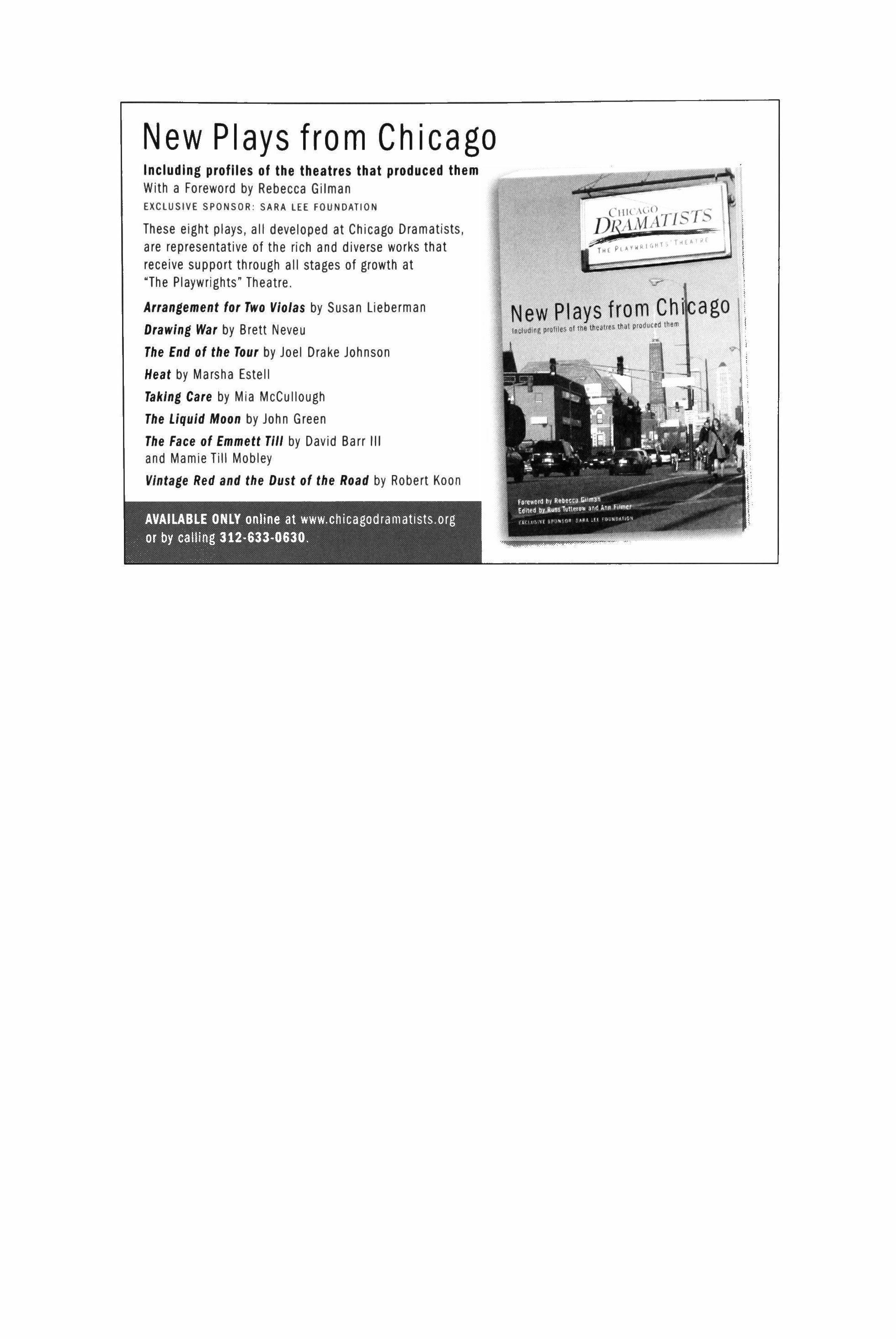
New Plays from Chicago
Including profiles of the theatres that produced them
With a Foreword by Rebecca Gilman
EXCLUSIVE SPONSOR: SARA LEE FOUNOATION
These eight plays, all developed at Chicago Dramatists, are representative of the rich and diverse works that receive support through all stages of growth at 'The Playwrights" Theatre.
Arrangement for Two Violas by Susan Lieberman
Drawing War by Brett Neveu
The End of the Tour by Joel Drake Johnson
Heat by Marsha Estell
Taking Care by Mia McCullough
The Liquid Moon by John Green
The Face of Emmett TIll by David Barr III and Mamie Till Mobley
Vintage Red and the Dust of the Road by Robert Koon
AVAILABLE ONLY online at www cntcagodremansts org or by calling 312·633·0630
colurnbia.edu/cu/cup

The Velvet Lounge
On Late Chicago Jazz
Gerald Majer
"The Velvet Lounge is a book like none other [a] remarkable odyssey through the world oflate Chicago jazz a haunted, vertiginous account ofboth the music and the lives it was made from. This is finally a book about soulno, about the soul - rapt by essence and experiment. Majer writes with an exhilarating passion and a rare elegance, and his book is sure to be a classic."
-J. D. McClatchy,
author of Hazmat: Poems
A,
to
COLUMB
Refer
us

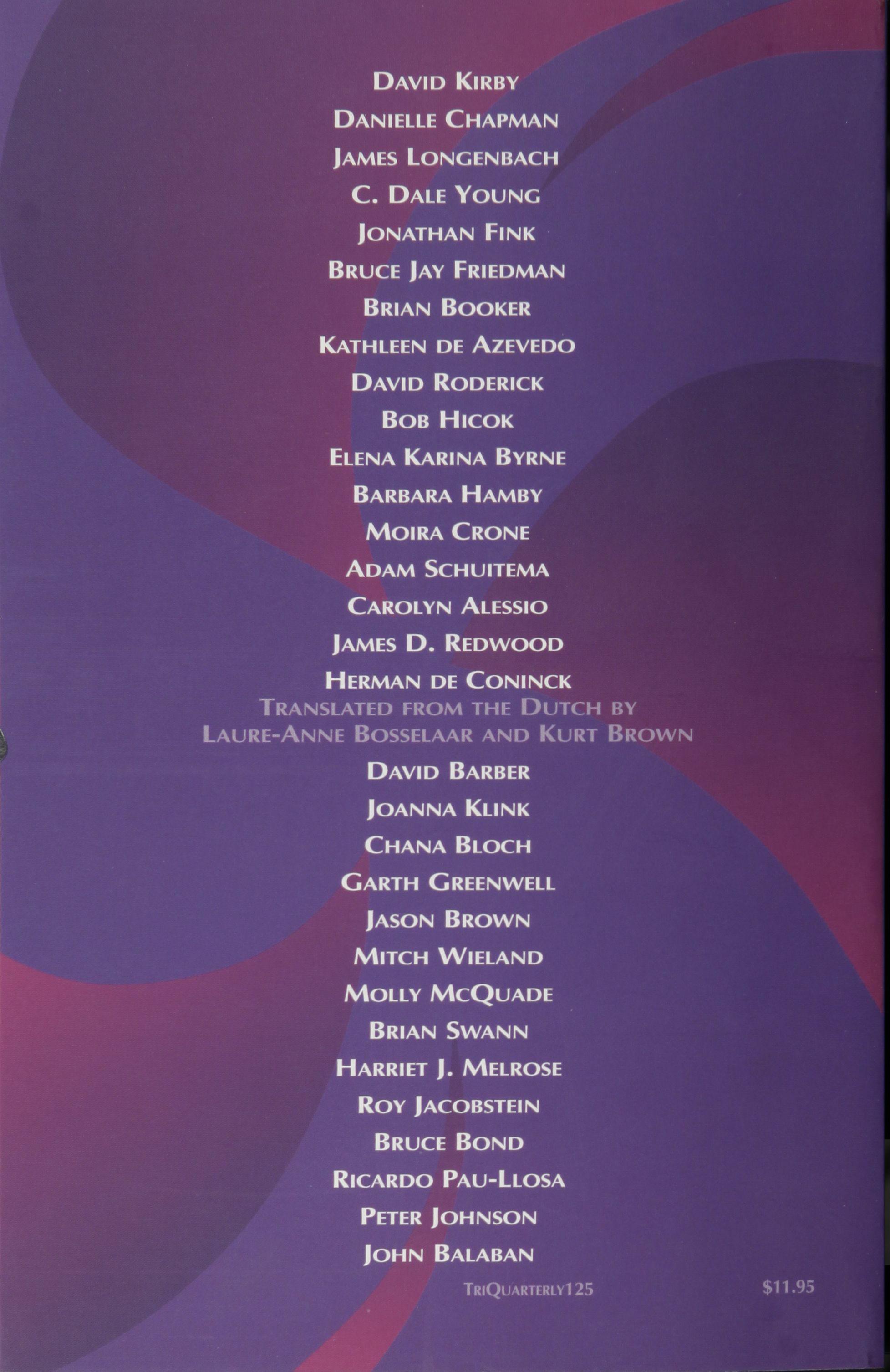





 Charles Newman
Charles Newman





























































































































































































































































